|
|
|
|
#801 |
|
Senior Member
|
Winners announced for 2017 presidential prizes for young culture professionals and for writing and art for children and young people
Vladimir Putin signed executive orders awarding the 2017 presidential prizes for young culture professionals and the 2017 presidential prizes for writing and art for children and young people. March 19, 2018 - 12:40 - The Kremlin, Moscow 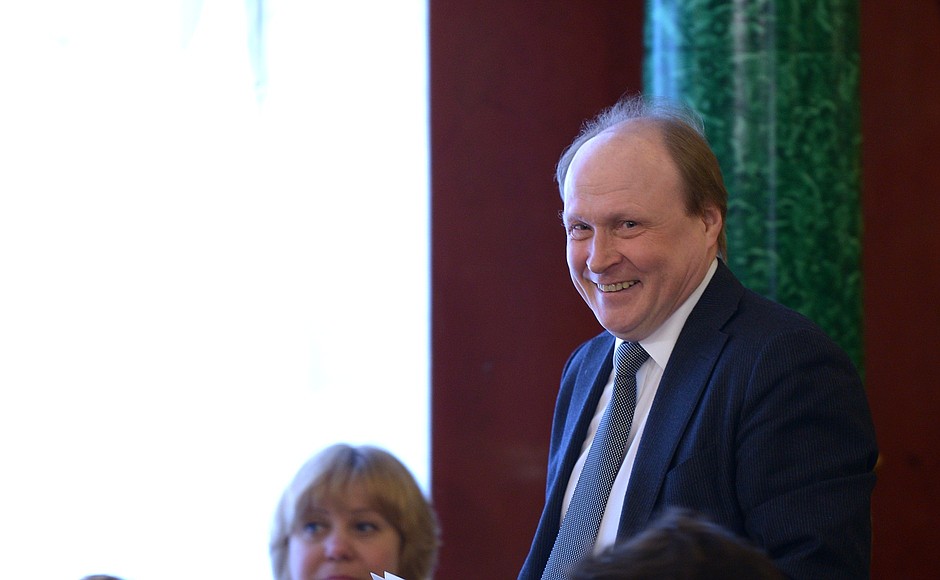 Presidential Adviser Vladimir Tolstoy announced the winners at a special briefing. Three young culture professionals from Moscow and the Voronezh Region won the 2017 prize for their projects in animation, choreography and museology. Animated film director and artist Dina Velikovskaya has been awarded the prize for her contribution to the development of Russian animation. Her debut film, The Bridge, shot while she was studying at the Gerasimov State Institute of Cinematography, instantly elevated her to the ranks of the masters. Every new film she makes – reverent, penetrating studies of people’s relationships and values – is an important event in the animation world and garners prizes at the most popular international festivals. 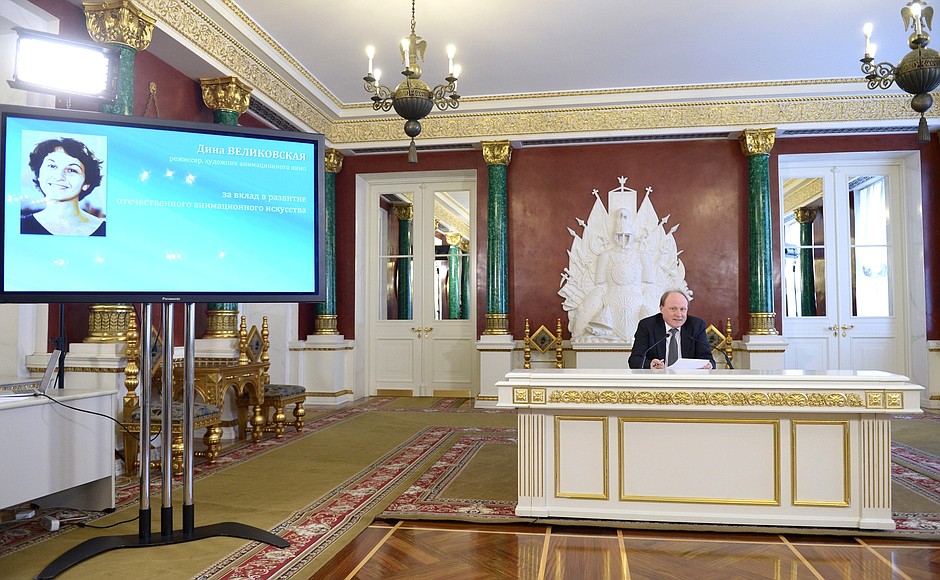 Sofya Kondratyeva, deputy director of research, head of the Museology Department at the Divnogorye Natural Architectural-Archeological Museum-Reserve, has been awarded the prize for creating and implementing innovative museum projects. Sofya Kondratyeva, Candidate of Science (History), has been working at the Divnogorye Museum-Reserve since 2009. The projects she prepared combine a serious scientific approach, advanced technology and attention to different museum audiences. They were praised both by specialists and visitors. She works tirelessly to promote historical and cultural heritage and deal with the most pressing challenges related to instilling environmental, artistic and moral values. Soloist of the State Academic Bolshoi Theatre Denis Rodkin has been awarded the prize for his contribution to preserving, promoting and popularising the achievements of Russian choreography. Denis Rodkin’s successful career began when the graduate of the choreography school at the Moscow State Academic Theatre of Dance Gzhel was invited to join the Bolshoi Theatre company. Thanks to his creative and artistic professionalism, talent, hard work and pursuit of perfection, he was dancing lead roles in classical and modern ballets just three years later, becoming the leading dancer of Russia’s main theatre in 2015. In addition to his tireless creative activity, he is involved in social and philanthropic projects for children and teens. 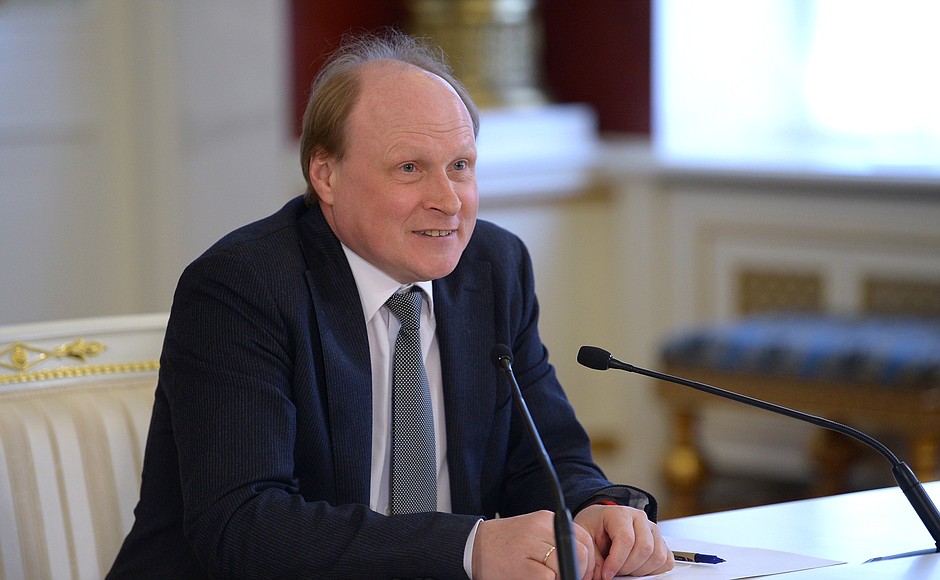 * * * Three young culture professionals from Moscow, St Petersburg and Nizhny Novgorod have been awarded the 2017 prize for writing and art for children and young people for their projects in music, theatre and arts education. Head of the St Petersburg Pushkin State Theatre Centre Vladimir Retsepter has been awarded the prize for educational activity. The Pushkin Theatre Centre he heads has been researching, publishing and touring for more than 25 years. In 2006, the graduates of Retsepter’s course created the Pushkin School Theatre. The theatre’s performances are a remarkable blend of literature, stage design, science, graphic art, traditional texts and new theatre forms. The signature directing style brings classical works closer to today’s young audience and promotes classical Russian literature, history and culture. Composer Alexei Rybnikov has been awarded the prize for his contribution to Russian music. For almost half a century works by Alexei Rybnikov for children and young people have been considered masterpieces of Russian music: his bright, lively and sincere music can be heard in over 80 films and cartoons. The iconic rock operas – Star and Death of Joaquin Murieta and Juno and Avos – are legendary in the history of Russian musical theatre. Beyond the famous musicals and rock operas, though, the composer has recently written works for young audiences performed by young musicians. 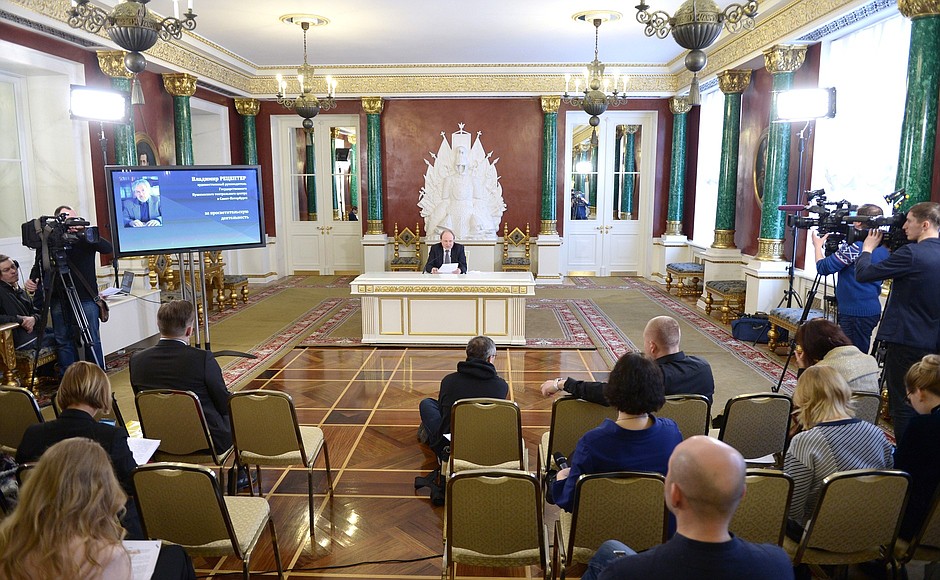 Vladimir Chikishev, director of the Nizhny Novgorod boarding school for deaf children, has been awarded the prize for implementing the School – Theatre – Home single educational space and for creating the Piano Theatre. The School – Theatre – Home innovative programme has been implemented at the boarding school for children with impaired hearing headed by Vladimir Chikishev for more than 30 years. The Piano Theatre, an important element of this project, is a unique educational model of cooperation with society, which not only brings out creative talents but expands children’s opportunities. The universal theatrical language gives them a chance to fully appreciate the world’s diversity, and creative collaboration helps them adapt to the world around them. The source of information - http://en.kremlin.ru/events/president/news/57088 Presentation of state decorations to medallists of 12th Paralympic Winter Games Vladimir Putin presented state decorations to the Russian medallists of the PyeongChang 2018 Paralympic Winter Games. The ceremony was held in the Kremlin’s St Catherine Hall. March 20, 2018 - 14:00 - The Kremlin, Moscow 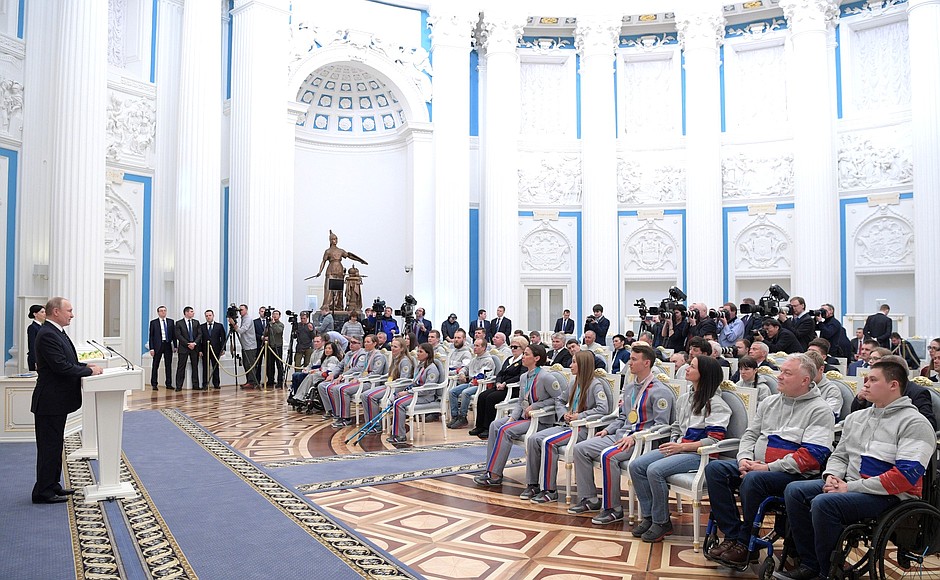 Russian athletes went to the Games as neutral Paralympic Athletes from Russia under the Paralympic flag. They won 24 medals, coming in second in the overall count. The Paralympic Games were held in PyeongChang on March 9–18. 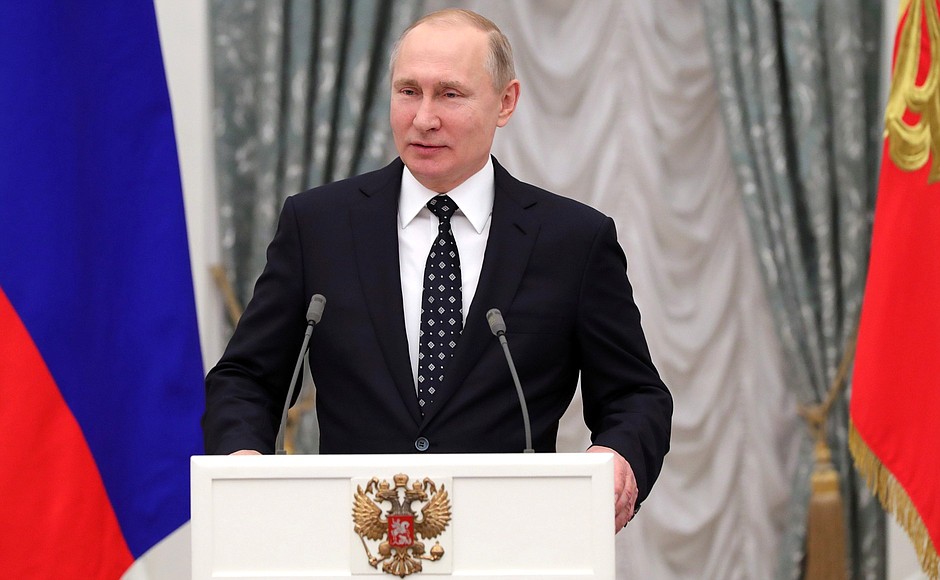 President of Russia Vladimir Putin: Good afternoon, friends. First of all, I would like to wholeheartedly congratulate you and all our athletes on their remarkable performance at the 12th Paralympic Winter Games. You demonstrated top performance and willpower, as well as reaffirmed our country’s firm standing among the leaders of global Paralympic sport. Moreover, you achieved this despite being in the minority. Speaking in sports terms, you were missing team players, and yet you competed on an equal footing with the world’s best Paralympic teams. 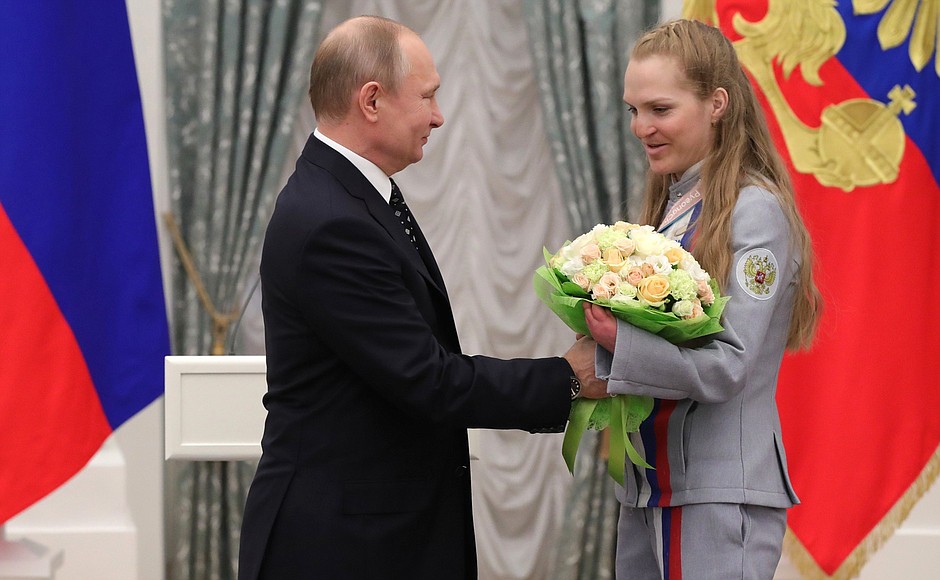 I would like to say that the whole of Russia is proud of the way you perform the Paralympic mission, which is to inspire and excite the world. You do inspire people with your resolve, optimism and energy. You show them that the force of spirit and self-confidence can overcome any difficulties and circumstances, and that no obstacle can prevent one from acting and doing good for your loved ones, for society and the country. 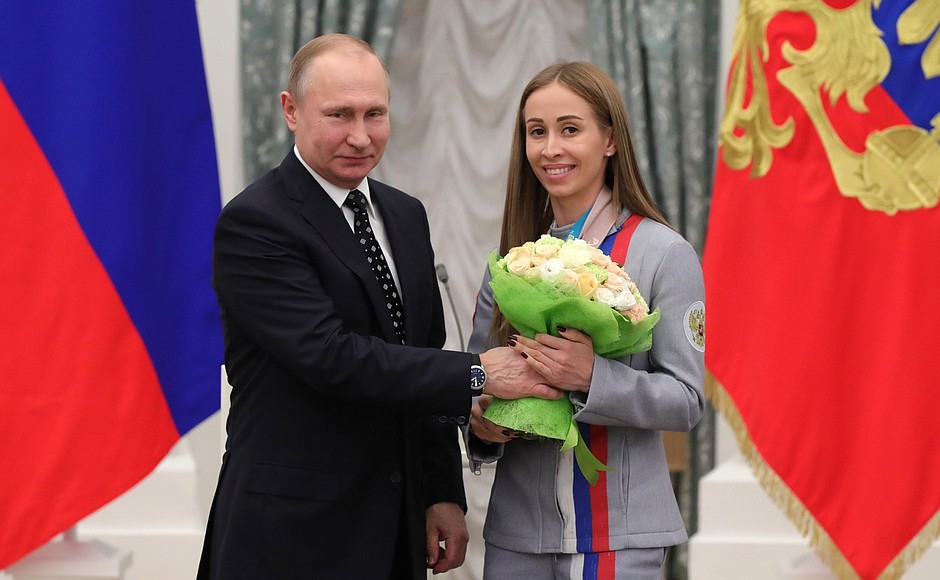 This difficult situation for global sports, including Paralympic sports, has revealed your unique personalities, your ability to take the blow and the zeal for victory with which you live. 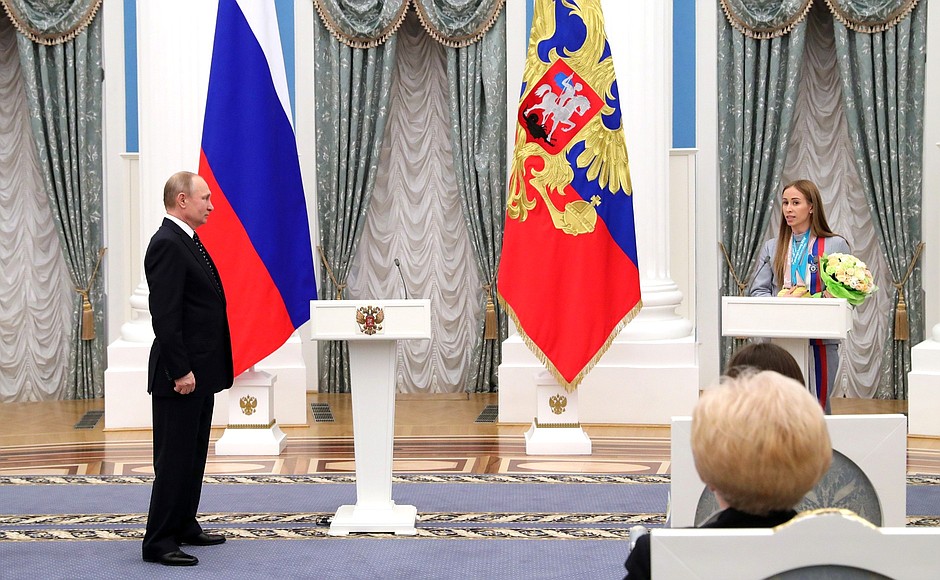 These Winter Paralympics marked 30 years since Russia took part in its first Paralympic games in 1988, and they were also the most difficult games. 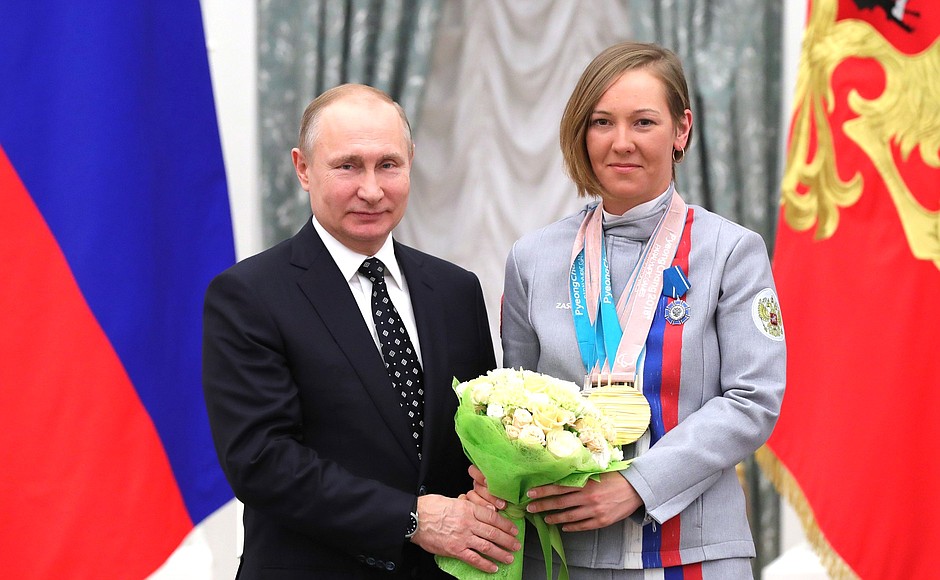 However, you did not succumb to emotional pressure or the ban on national symbols. You composed yourselves and won as many medals as you wanted to and could win. You did not do it with numbers but with abilities. We applauded your courage and your skills. 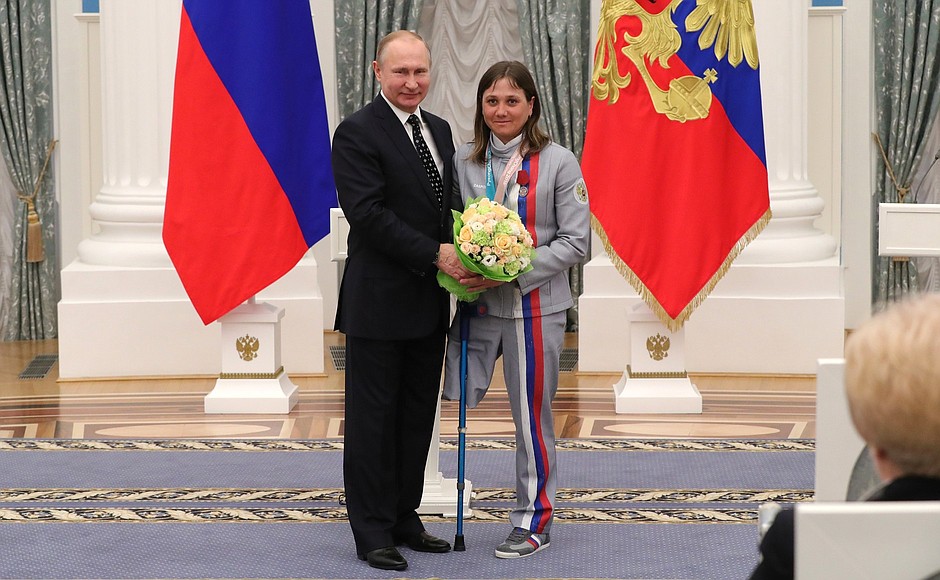 Take, for example, the extraordinary performance by our women in the mixed and open relays. They competed against national teams that included both men and women. Our Paralympic athletes had to prove their worth whenever they competed. This makes the medals they have won even more precious. 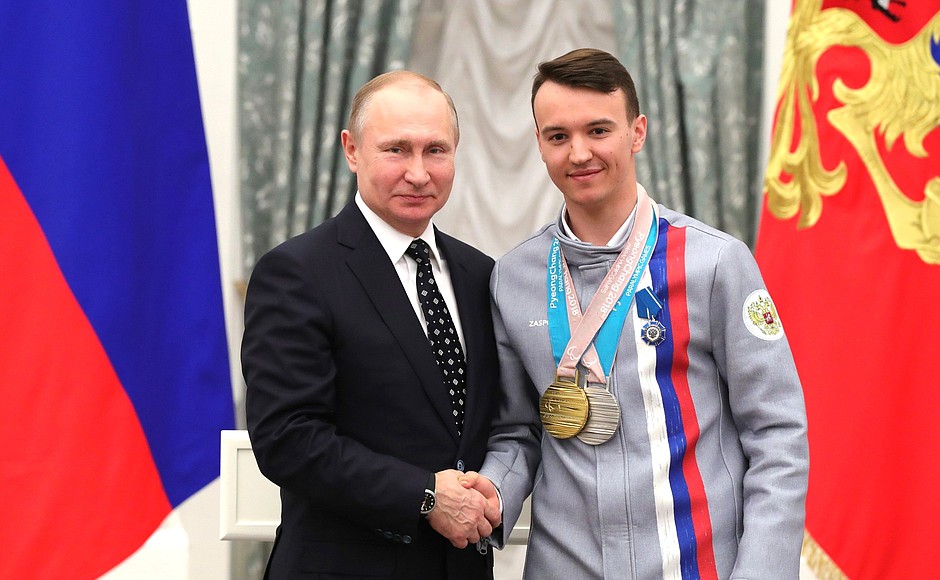 Here I would like to mention Yekaterina Rumyantseva, who competed in her first Paralympic Games, winning three gold and two silver medals. Mikhalina Lysova and her guide, Alexei Ivanov, also performed excellently. Anna Milenina and Alexei Bugayev demonstrated an unwavering will to win. 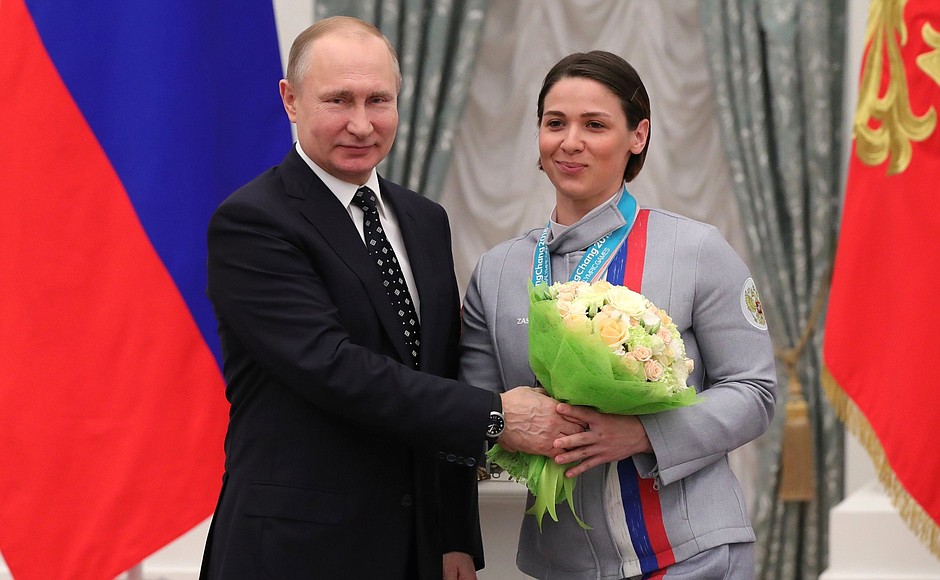 Let me emphasise that all athletes who competed in the Paralympics are worthy of our admiration and gratitude. I would like to mention those who helped our Paralympic athletes to complete this long and arduous journey to success. I would like to thank their wonderful coaches, doctors, training specialists, designers of their equipment, assistants and guides, who literally helped the athletes achieve their victories. 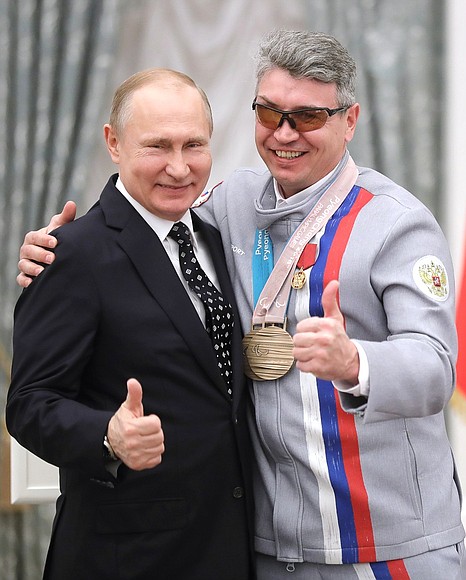 I am sure that it was not easy for you to accept that not all of your trainees took part in the Paralympics. But you should know that the whole country shares this disappointment. 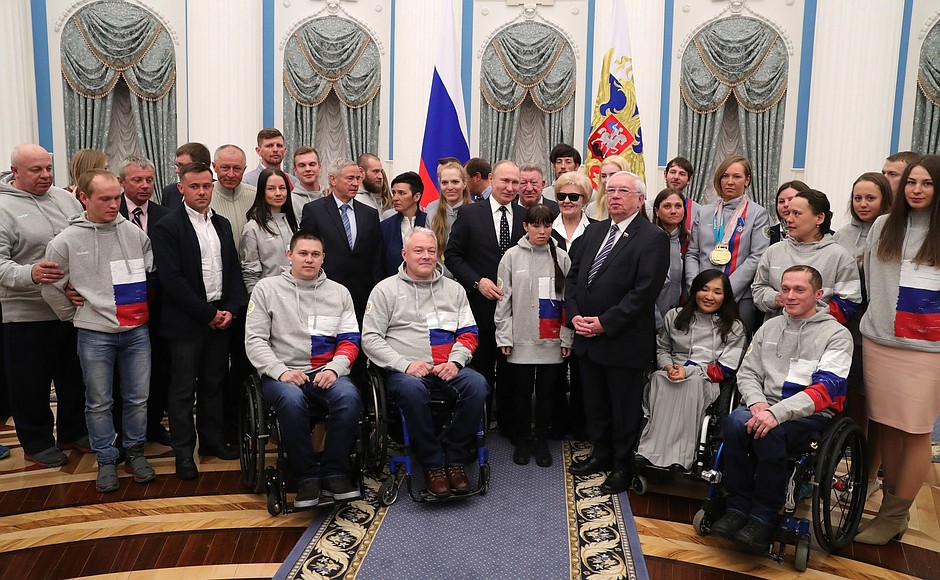 We will do everything in order to support these courageous and honest people, so they continue to inspire with their talent and perseverance everyone who finds themselves in a challenging life situation. Among other things, we will hold a number of competitions for Paralympic athletes this year. Of course, the prize money will be comparable to the awards granted to the medallists of the PyeongChang Paralympic Winter Games. 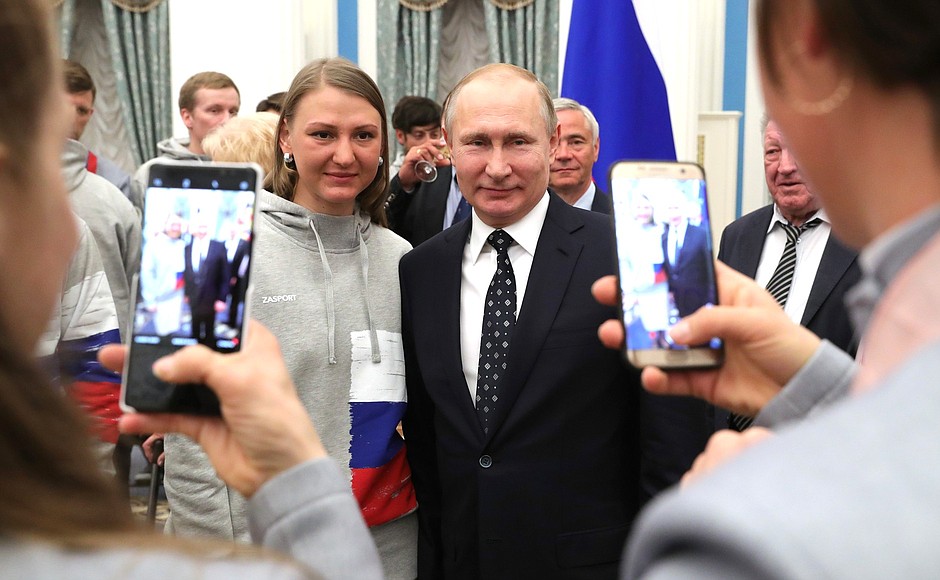 It goes without saying that we will keep fighting for Russia’s reputation in sports, and the honour of all clean athletes, promoting sports free from politics and double standards. We must prove our country’s commitment to the ideals of sport by our actions, based on the high humanitarian values and the equal opportunities principle. 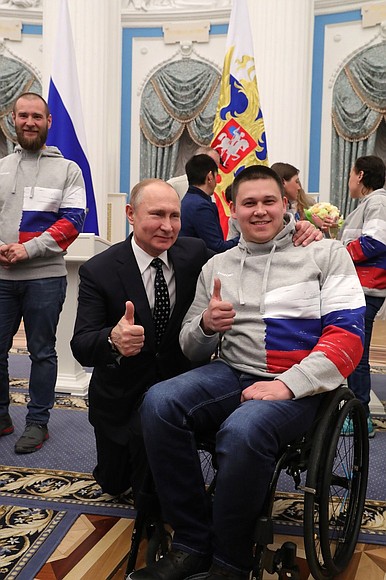 Specifically, the Russian Foreign Ministry, having successfully supported our athletes in Korea, must revive system-wide efforts of the Commission of the Russian Federation for UNESCO with a view to improving the International Convention against Doping in Sport in order to ensure that its provisions are fair and totally transparent. 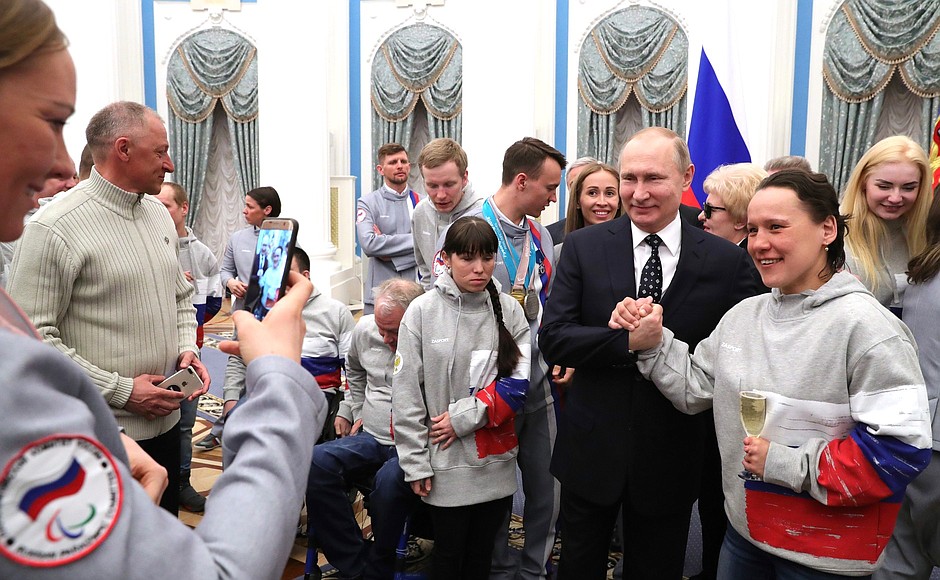 Once again, I congratulate all Paralympic athletes and their mentors on the extraordinary results at the Paralympics in Korea, and I thank them for making a major contribution to the development of sport in Russia. I thank you for serving as role models for Russian society and the whole world, showing that having a proactive attitude and dignity, as well as loving your Fatherland is essential for all of us. 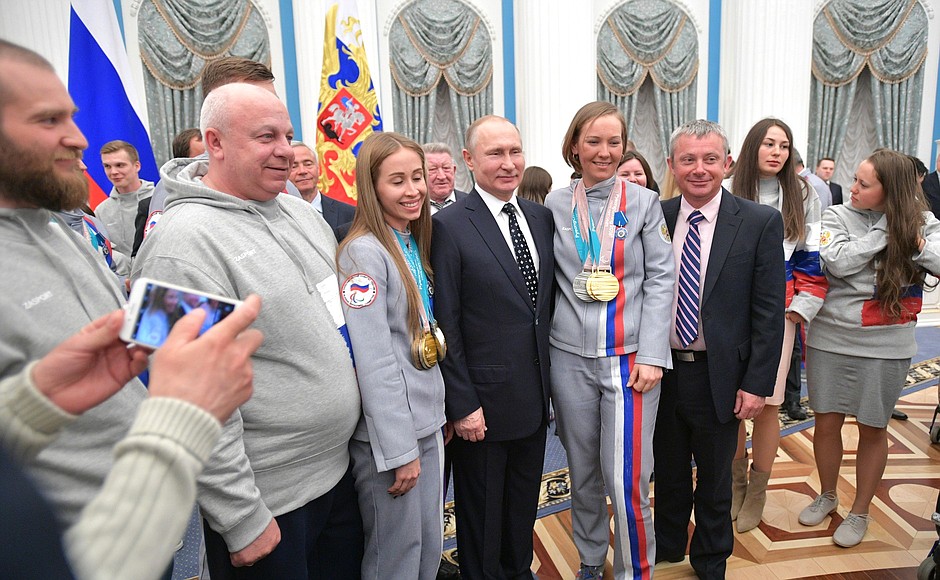 I wish you good health and fortitude and, of course, new outstanding victories. Congratulations on your success. <…> 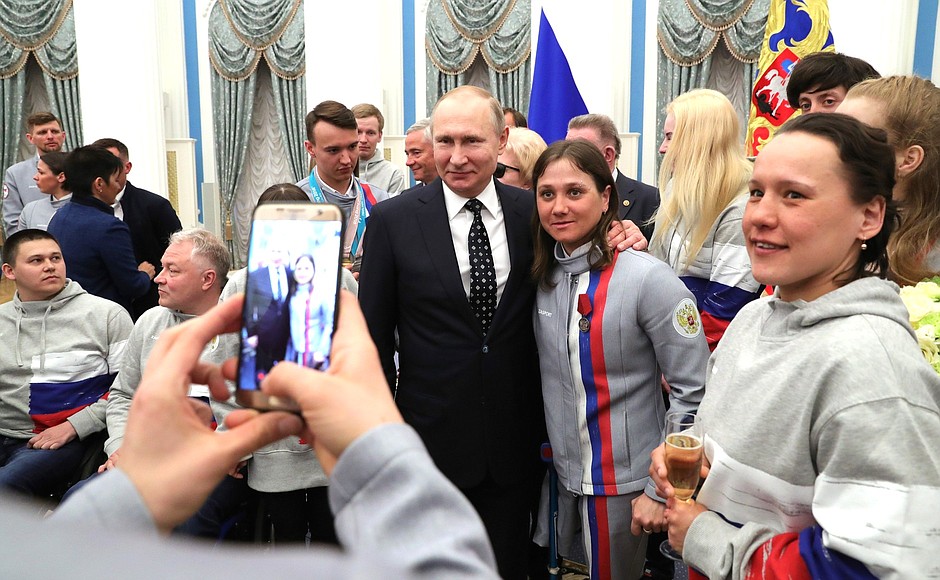 Vladimir Putin: Friends, please accept once again my sincere congratulations on your victories and on receiving the decorations today. When I was awarding one of the participants, I asked and would like to ask again, how do you do this? Of course, families, coaches and experts play a huge role, but you have something that is hugely important. As you said, it is in your hearts, your souls and in your zeal for victory. 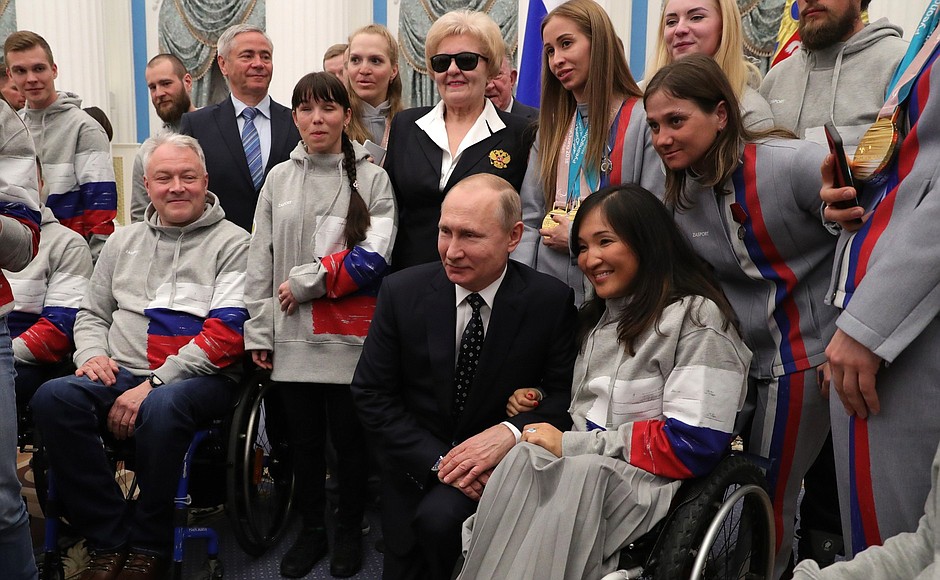 I would like to thank you for this and wish you every success. Your victories are spectacular, exciting and we respect and admire them. I wish you new victories. Thank you very much. The source of information - http://en.kremlin.ru/events/president/news/57097 Greetings on the 100th anniversary of the St Petersburg Mussorgsky State Academic Opera and Ballet Theatre – Mikhailovsky Theatre Vladimir Putin sent his greetings to the staff of the St Petersburg Mussorgsky State Academic Opera and Ballet Theatre – Mikhailovsky Theatre on the occasion of its 100th anniversary. March 21, 2018 - 09:30 The message reads, in part: “The addition of opera to your theatre a hundred years ago, back in 1918, opened a new page in the theatre’s history. I wholeheartedly congratulate you on this wonderful anniversary. The troupe of the Mikhailovsky Theatre had many brilliant artists and musicians, conductors and theatre directors, as well as tutors and teachers who made a unique contribution to our culture thanks to their talent and hard work. Today, this beautiful old building on Arts Square is home to a powerful group of creative people, both famous stars and new arrivals, who contribute their talents to classical Russian and foreign productions, as well as bold innovative projects.” The source of information - http://en.kremlin.ru/events/president/news/57104 Working meeting with Russian Ambassador to Kazakhstan Alexei Borodavkin Vladimir Putin met with the newly appointed Ambassador Extraordinary and Plenipotentiary of the Russian Federation to the Republic of Kazakhstan Alexei Borodavkin. March 21, 2018 - 13:30 - The Kremlin, Moscow 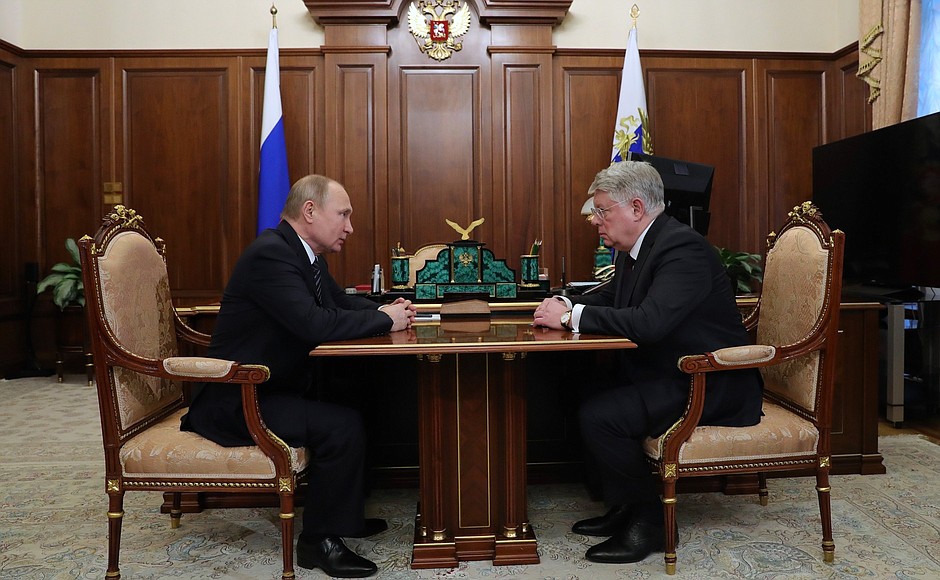 President of Russia Vladimir Putin: Mr Borodavkin, you are off to Kazakhstan. It is not only our neighbour and ally, it is a country with which we share the deepest, multifaceted relations based on trust. This mission is not only a pleasant one but at the same time a very honourable and demanding post. I suggest we speak about it in detail. 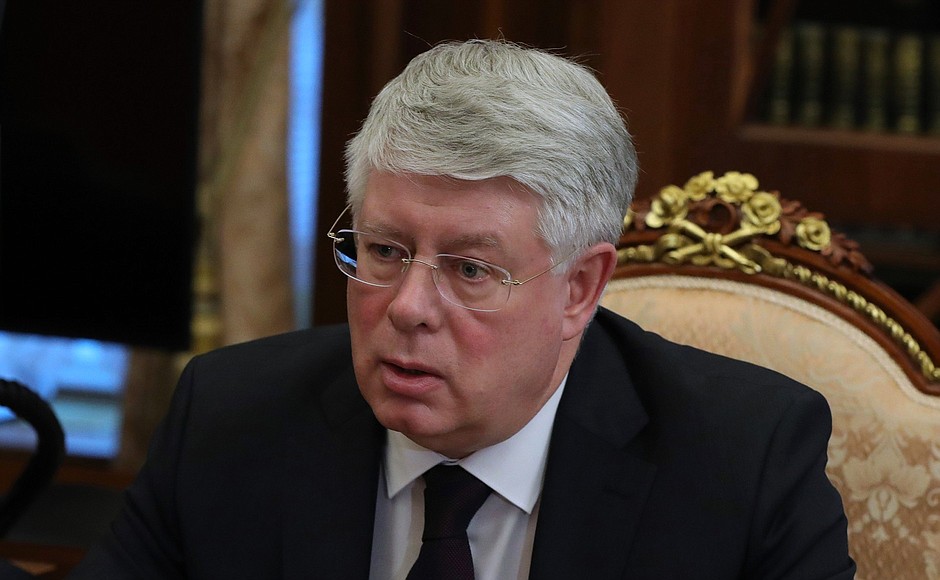 Ambassador Extraordinary and Plenipotentiary of the Russian Federation to the Republic of Kazakhstan Alexei Borodavkin: Thank you, Mr President for receiving me today and for your time. I would like to use this opportunity to congratulate you on your election as Russian President and to assure you that Russian diplomats are on your team, and we will do anything we can to provide favourable conditions in order to implement the tasks you set – to make a breakthrough in the development of the country over the next few years. I also very much appreciate and I am thankful for the trust you showed by appointing me the Russian Ambassador to Kazakhstan. I will do my best to meet your expectations. I understand the responsibility I am entrusted with. As you said, Kazakhstan is our closest ally and strategic partner. We have a huge positive agenda: cooperation both in bilateral relations and in coordinating and joint work within the EAEU, CSTO, SCO and CIS.I fully understand that we will have a lot to do in the future. The source of information - http://en.kremlin.ru/events/president/news/57103 Greetings on Nowruz Vladimir Putin sent his greetings to all Russians who celebrate Nowruz. March 21, 2018 - 16:30 The message reads, in part: “This wonderful celebration came from the depths of time to become an integral part of the historical, cultural and spiritual heritage for many peoples of our country, and a symbol of spring renewal, purification and the beginning of new life. It is gratifying that the ancient traditions of Nowruz are carefully passed on from generation to generation, so that today, just as centuries ago, cities and villages host mass celebrations, skilful craftspeople proudly show off their arts and crafts, and in every home national food is prepared to treat the guests. Of course, this is also an occasion to think about our ancestors and help those who need our assistance and support.” The source of information - http://en.kremlin.ru/events/president/news/57109 Greetings to participants and organisers of the annual national project The Best of Russia Vladimir Putin congratulated the participants and organisers of the annual national project The Best of Russia on its 10th anniversary. March 21, 2018 - 19:00 The message of greetings reads: “This large creative project brings thousands of people together from all regions and gives them a wonderful opportunity to present their work for approval by professional and amateur photographers. Talented and original, they illustrate the major events in the life of the country, the beauty of its nature and unique landmarks of history and architecture. They create a diverse, surprisingly sincere and honest image of our Motherland. And of course, those who organised and inspired this wonderful project deserve special thanks. I know that such outstanding cultural initiatives are very important today. They enrich the cultural space, promote the artistic knowledge of young people and help promote useful hobbies like photography.” The source of information - http://en.kremlin.ru/events/president/news/57113 Meeting with permanent members of the Security Council Vladimir Putin held a meeting with permanent members of the Security Council. March 22, 2018 - 18:10 - The Kremlin, Moscow 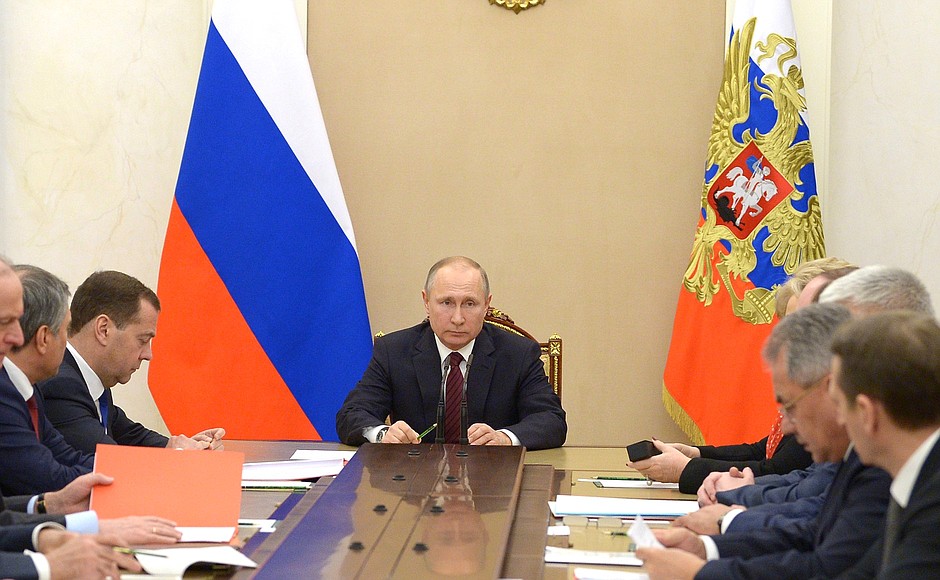 The exchange of views continued in connection with Britain’s unfriendly and provocative policy towards Russia. 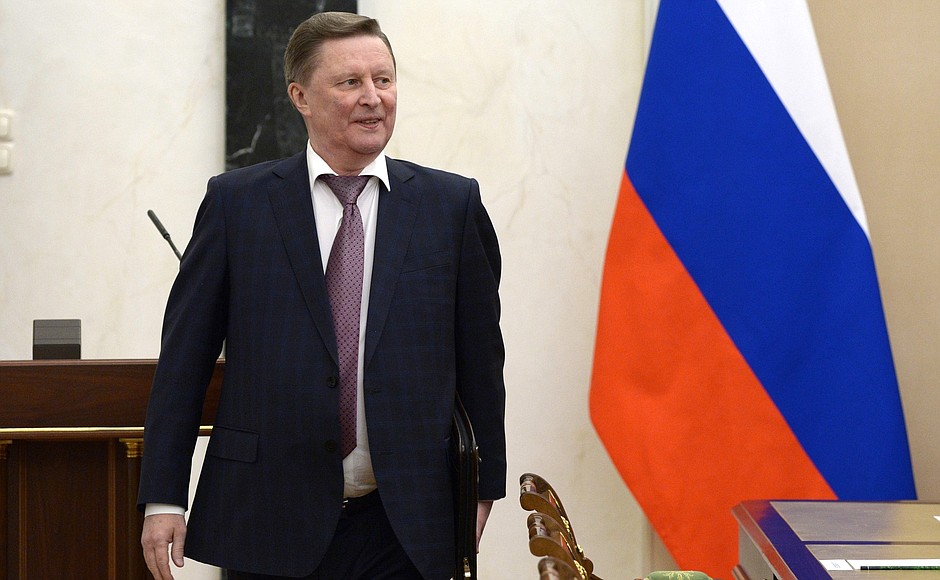 The issue of regional conflicts was addressed, in particular, the situation in Syria, where the withdrawal of the civilian population from Eastern Ghouta continues successfully. 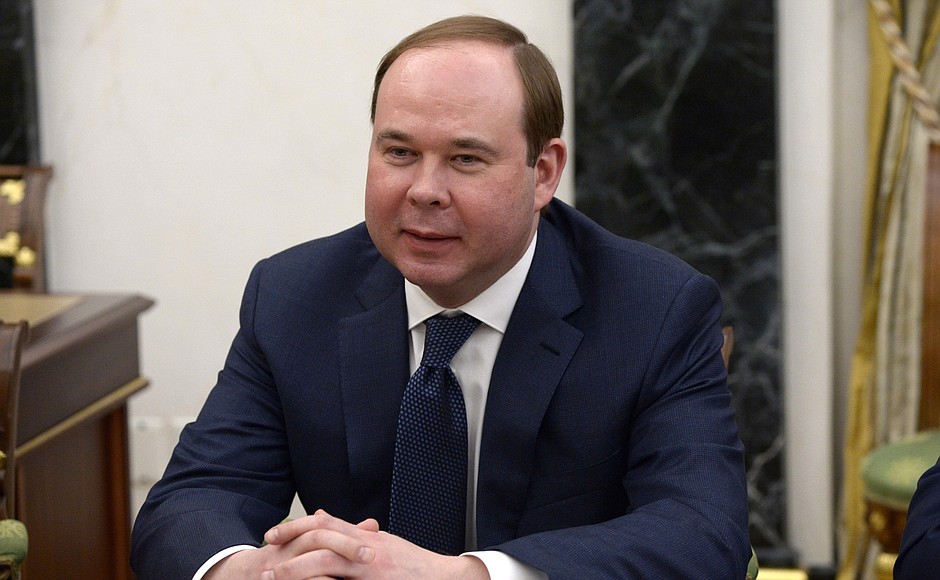 The President informed the participants in detail about the telephone conversations he had with a number of foreign heads of state and heads of international organisations, during which substantive issues of bilateral relations and international affairs were discussed. 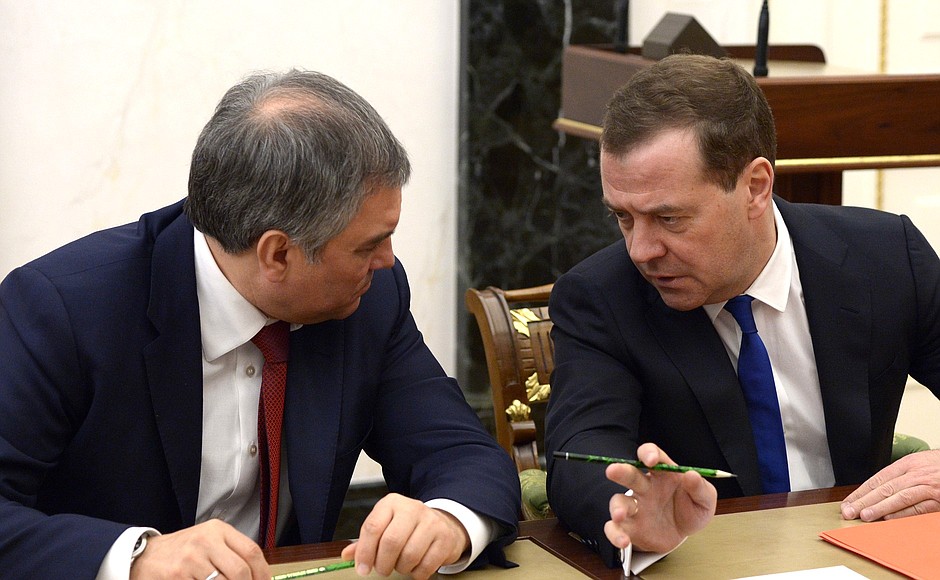 There was also a discussion of current issues on the domestic socioeconomic agenda. 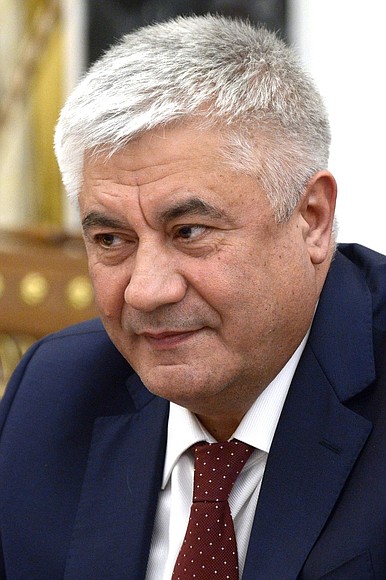 The meeting was attended by Prime Minister Dmitry Medvedev, Federation Council Speaker Valentina Matviyenko, State Duma Speaker Vyacheslav Volodin, Chief of Staff of the Presidential Executive Office Anton Vaino, Secretary of the Security Council Nikolai Patrushev, Defence Minister Sergei Shoigu, Interior Minister Vladimir Kolokoltsev, Federal Security Service Director Alexander Bortnikov, Foreign Intelligence Service Director Sergei Naryshkin, and Special Representative for Environmental Protection, Ecology and Transport Sergei Ivanov. The source of information - http://en.kremlin.ru/events/president/news/57119 On March 24, outside of Moscow Kremlin will fall into darkness for one hour to mark Earth Hour On March 24, the external lighting on the Russian President’s official residence will be turned off from 8.30 pm to 9.30 pm to mark Earth Hour. Earth Hour is an annual international event established by the World Wildlife Fund (WWF), aimed at drawing everyone’s attention to climate change. People in various countries will turn off their electrical devices and lights at the same time for one hour, and the landmark buildings in these countries will fall into darkness as well. Earth Hour is the most popular mass event in history. In 2017, it was supported by over 2 billion people in 187 countries, including the residents of 150 Russian cities. By decision of Vladimir Putin, the Moscow Kremlin joined Earth Hour in 2013. The source of information - http://en.kremlin.ru/events/president/news/57122
__________________
Where should they dig the Very Deep Pit? Piglet said that the best place would be somewhere where a Heffalump was, just before he fell into it, only about a foot farther on. (c) Alan Alexander Miln |
|
|
#802 |
|
Senior Member
|
Meeting on development prospects for civilian microelectronics
Vladimir Putin held a meeting on the prospects for the development of civilian microelectronics March 20, 2018 - 14:50 - Moscow, Kremlin 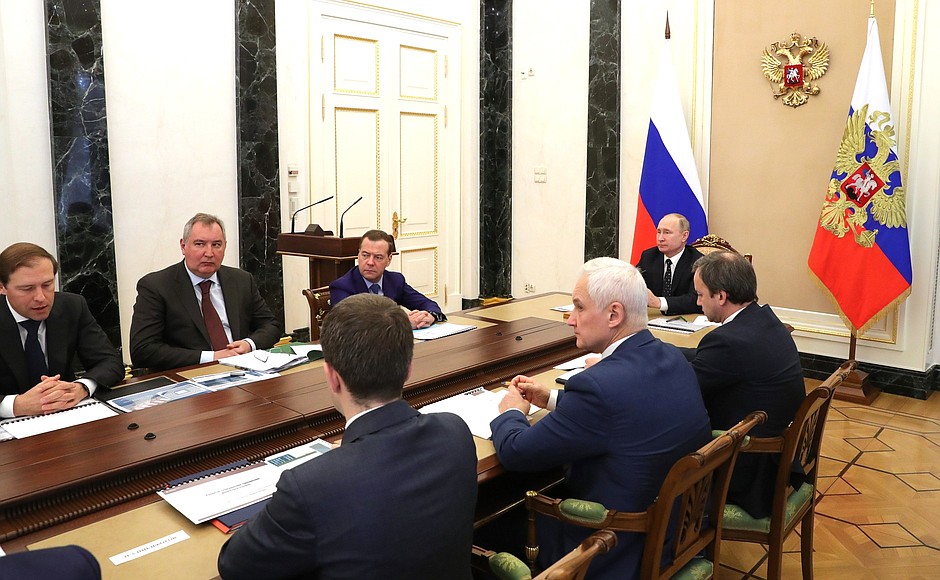 The meeting was attended by members of the Russian Government and microelectronics manufacturers. Microelectronics is one of the key sectors of industry and its development largely determines the level of the state’s innovative and social progress and the competitiveness of the economy. 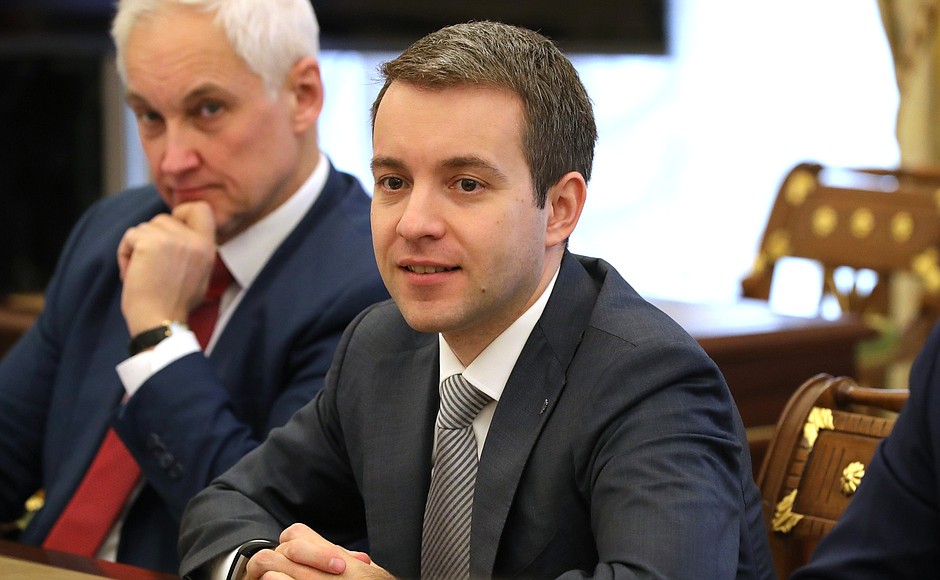 President of Russia Vladimir Putin: Good afternoon, colleagues. I suggest that today we discuss the situation in microelectronics and outline immediate and long-term goals in this sector. This sector plays a special and often the key role in the age of technological breakthroughs and digitalisation of all spheres. National achievements in microelectronics and their commercialisation form the basis of our technological and technical independence, the innovative development of our economy and the enhancement of its competitiveness. We have 55 microelectronic design centres, which design much-needed cutting edge products. There are also several production companies, such as Mikron and Angstrem, as well as companies of the Rostec corporation. However, the share of their civilian goods on the domestic market of electronic components is not big enough, regrettably, and stands at only about 12 percent. Meanwhile, the volume of the domestic civilian microelectronics market is really impressive: modest estimates put it at some 120 billion rubles. Experts believe that it will grow exponentially in the next few decades, including in light of economic digitalisation, the development of 5G communications, the Internet of Things and robotics. 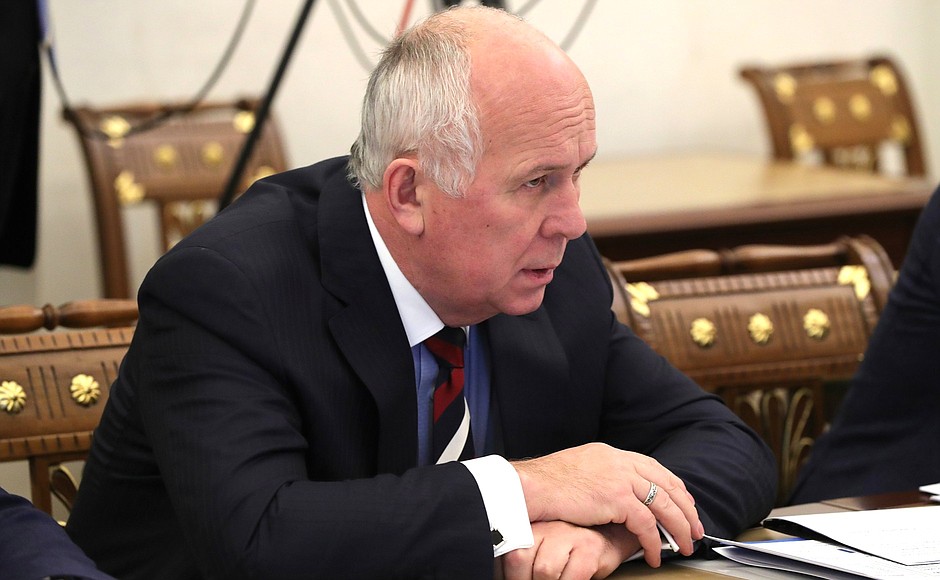 In 2013, we launched the State Programme for developing the electronics and radio electronics industry in 2013–2025. Under the programme, over 62 billion rubles have been allocated from the federal budget for solving research, technical and technological problems over the past five years. More than 35 billion rubles have been attracted from extra-budgetary sources. This was enough to enhance the sector’s competitiveness and increase the production of electronic goods 3.5 times over the past five years. I suggest that Industry and Trade Minister Maxim Manturov tell us about achievements in the field of civilian microelectronics. It is also obvious that we need a comprehensive strategy for the effective development of microelectronics, an action plan that will comprise concrete measures for strengthening the existing and creating new companies, as well as for the more active marketing of Russian products on the domestic and international markets. 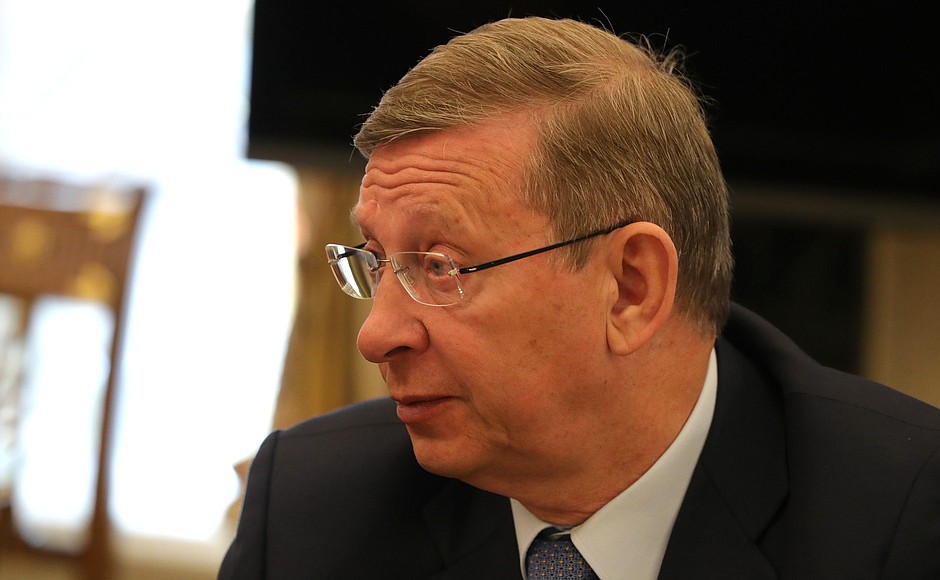 Of course, we must also consider establishing a national competency centre, which will map out priority technological spheres for the development of microelectronics. It is obvious that this sector needs government support and contracts from state companies in order to develop in a sustainable manner at the initial stages. This is why we must create mechanisms that will help us ensure that our plants work to maximum capacity. International cooperation ties are very important in this respect. Cooperation with our foreign partners will allow us to reduce the costs and the time needed to launch this production. Let us start get down to work. The source of information - http://en.kremlin.ru/events/president/news/57098 Meeting with Sberbank CEO German Gref Sberbank CEO and Chairman of the Board German Gref briefed Vladimir Putin on the bank’s performance in 2017. The situation on the mortgage and consumer lending market and financial services for small and medium-sized businesses were also discussed. March 21, 2018 - 15:10 - The Kremlin, Moscow 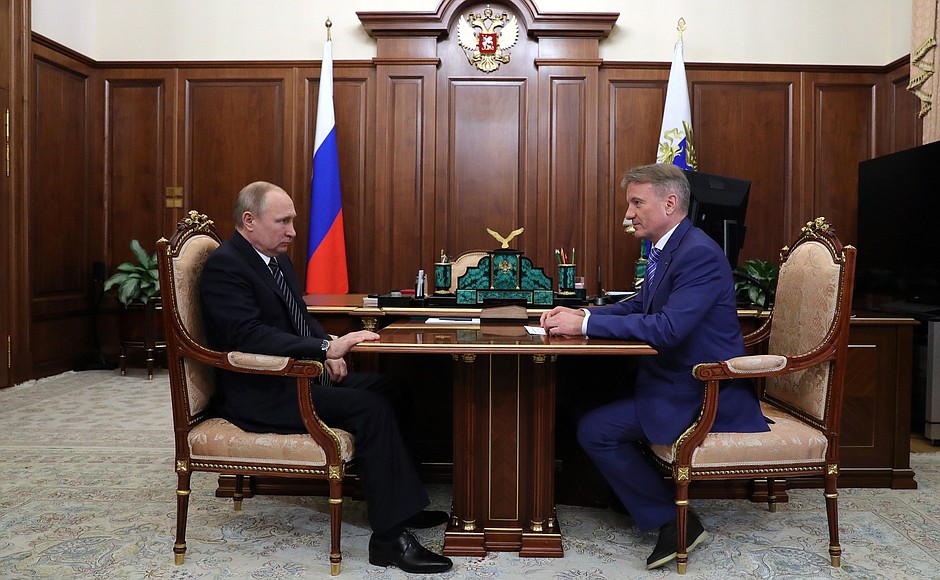 President of Russia Vladimir Putin: Mr Gref, I know that Sberbank’s performance can be described as acceptable or even good. Let us talk about this. Sberbank CEO and Chairman of the Board German Gref: We have reported to our Supervisory Board on the performance of the Sberbank Group in 2017 based on international financial reporting standards, including not only Russian companies of the group, but also its foreign assets. Our net profit for 2017 increased by over one-third compared to the year before. All of our indicators, including financial performance, are good. We also did well in terms of expenditure last year. First of all, we increased investment in technology by over 20 percent last year, whereas our overall spending in both absolute and nominal figures decreased year on year, for the first time in the bank’s history. The reduction of expenditure is a major source of our profits. We are extremely interested in increasing our profits, which are the main and, in fact, only source for increasing capital. We have not yet achieved the level of Tier 1 capital that would take us to the international level in the group of comparable banks. Nevertheless, our dividend payments will be considerable this year. We have not yet determined the precise amount, but the dividends will be really good. In principle, we have come to an agreement with the Finance Ministry regarding a gradual increase in dividend payments, which should bring our capital adequacy to a target level of 12.5 percent. In this way, we will be able to make large tax payments, and secondly, we will also make serious payments to the budget and pay good dividends to our minority shareholders. At the same time, we will increase our capital in a natural way to ensure the bank’s stability. As for lending to the economy, last year was generally fairly good. I know that you are usually interested in two categories of loans: first, everything that concerns the people, that is, mortgage loans. Last year we halved the time needed to issue a mortgage loan compared to 2016. Last year saw a sharp decline in interest rates, which of course, substantially increased the demand for mortgages. Today, we are granting loans at 7.5 percent interest rates under different preferential programmes – for young families and the like. Now we have started granting Government-subsidised loans and I hope that the loans under this programme will exceed 200 billion rubles. 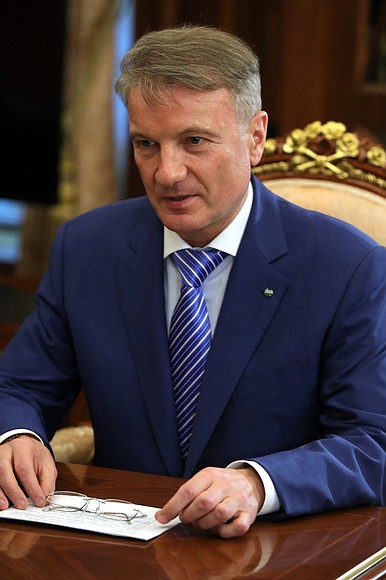 Vladimir Putin: Do you know that some experts are concerned over a big growth of consumer loans? German Gref: Mr President, we are closely watching this as well. As for mortgages, we see… Vladimir Putin: No, this is not mortgage loans. 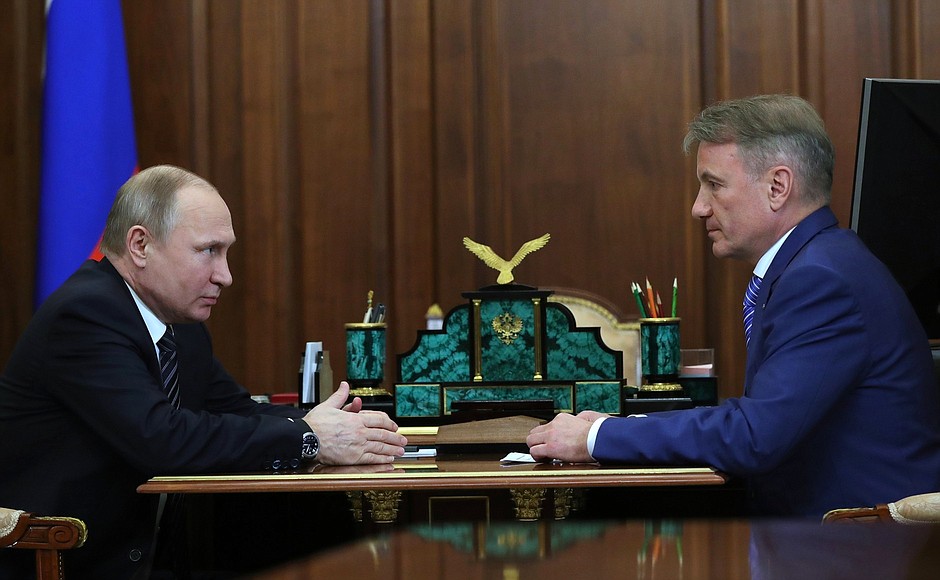 German Gref: Mortgage loans have doubled – this is absolutely safe, nothing to worry about. As for consumer loans, we compared them with ours in 2008 and those in developing countries and do not see any signs of a bubble in the consumer lending market. If we take the share of revenues made by households that is used to service loans, the situation is not critical yet. We must watch this very closely, this is true, but in our estimate the problem will not become urgent for the next two years. As for small business, a major step was taken last year when we made a decision that the opening of an account and all transactions will be free for all businesses during the first year. We developed a special product – Easy Start – and a vast number of entrepreneurs began opening accounts and using our services. On the whole we “lost” 35,000–40,000 rubles on each customer but in reality, we see that this support is needed at the start and considering fee revenues, we will stand to gain from this during the second and third years and will eventually recoup this money one way or another during the next three years. Plus, last year together with the Government we made several important steps. First, the opportunity to open an account online, without visiting the bank. The Central Bank has changed the relevant legislation and we did all we could to put this into practice. Second, in cooperation with the Taxation Service, we changed the rules – now legal entities can register without visiting registration bodies. Thus, today entrepreneurs can visit us, register their companies and open accounts with four clicks on the screen. De facto, the best international practice is three clicks. The Government has now submitted to the State Duma a law cancelling the registration fee for small companies. In this case we well also need three clicks. In other words, Russia has the opportunity to use the world’s best practices. We think this is a very important step forward for small business – it removes the barriers for using financial services and registration. Last year, we expanded the number of loan recipients considerably. In 2017 we granted 1.3 trillion rubles to small and medium-sized companies and out loan portfolio exceeded the pre-crisis level for the first time. 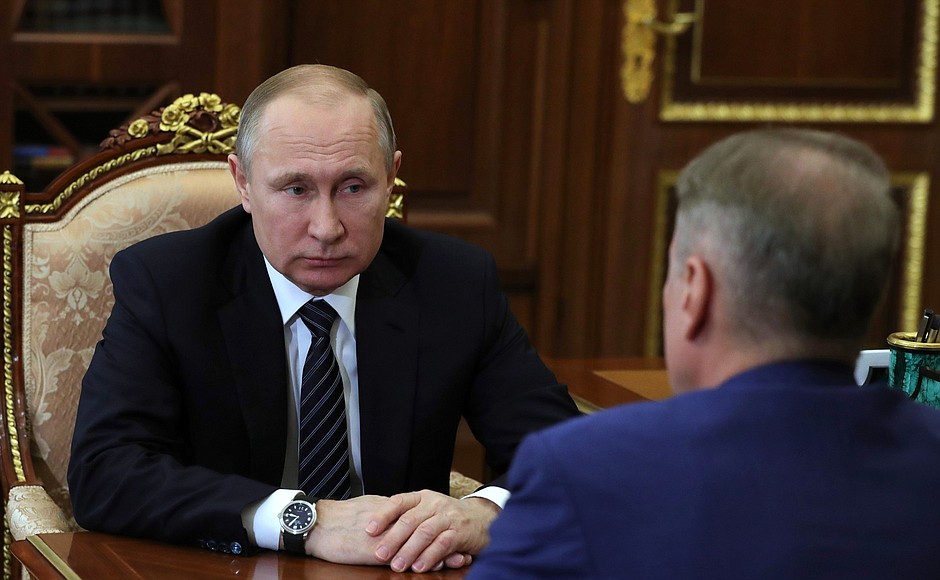 Vladimir Putin: What was the growth compared to last year? German Gref: Thirty percent over 2016. Vladimir Putin: This is decent growth. Good. The source of information - http://en.kremlin.ru/events/president/news/57105 Working meeting with Finance Minister Anton Siluanov Vladimir Putin had a working meeting with Finance Minister Anton Siluanov. The main subject of discussion was financial support for the main projects and plans announced by the President in his Address to the Federal Assembly. March 22, 2018 - 15:25 - The Kremlin, Moscow 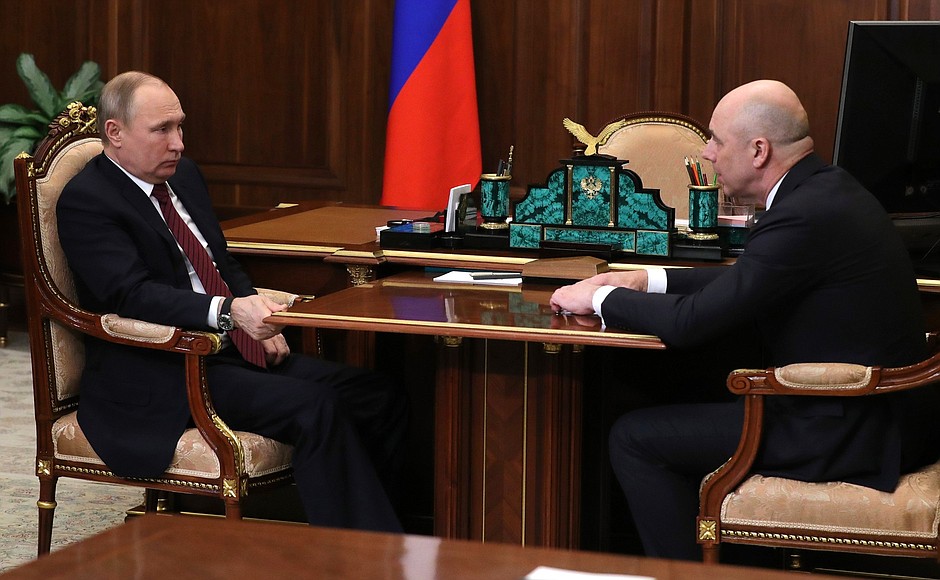 President of Russia Vladimir Putin: Mr Siluanov, today we will talk about financial support for the main areas we agreed on during the preparation of the Address and its presentation to the Federal Assembly. Finance Minister Anton Siluanov: Mr President, in your Address you set a number of tasks, including economic and budgetary ones and at present the Government is preparing proposals on implementing the instructions set out in the Address. In the Address you set the tasks of exceeding world economic growth rates, increasing investment and improving the living standards of our citizens, including support for low-income citizens and reduction of poverty by half. What are these measures? First of all, these are budgetary and tax measures. We are now drafting proposals on taxes that will allow enterprises to increase their own resource base, thereby boosting their revenues and creating investment sources. The Government will discuss these proposals in the near future. In addition, as regards tax novelties, we are drafting proposals to create equal conditions for doing business to reduce tax evasion and improve tax collection. We will use these funds – and these are big funds – to finance the tasks you set in your Address. We are also drafting proposals to simplify the operation of small business. There are many tasks as regards small business the share of which is growing in the economy today. We believe that better tax collection also creates reserves in this respect. 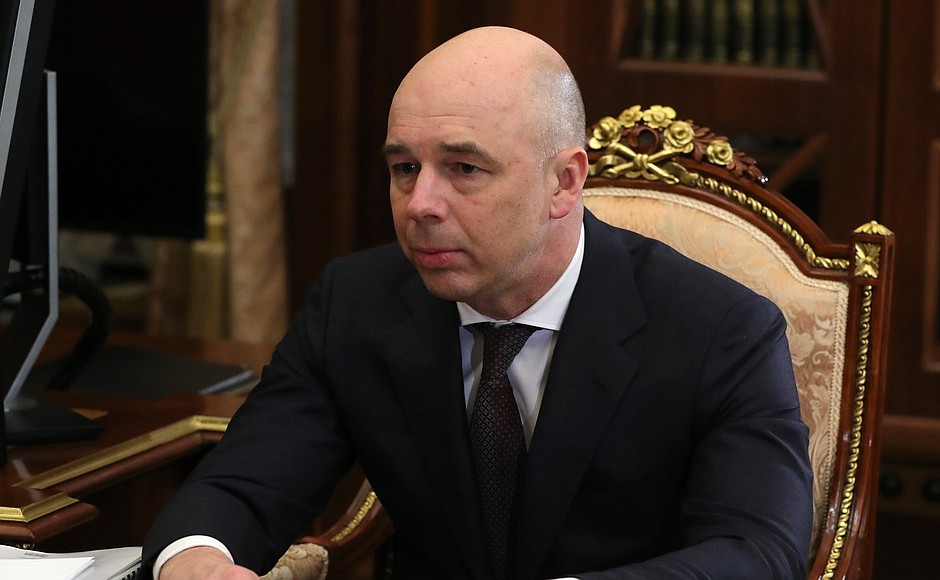 This is not a matter of increasing the tax burden. We are talking about our plans to improve tax collection. In addition, we are preparing proposals on revising and specifying benefits and incentives to see what effect they have produced. We were hoping to see certain results when we introduced them. After we analyse everything – we already have some groundwork – we will be ready to suggest that the Government should look again at the expediency of preserving certain incentives and benefits. This is also a source of funding for implementing the decisions that you outlined in your Address. What are the goals in terms of the budget? Of course, they are primarily related to infrastructure and supporting infrastructure projects as an economic driver. Healthcare and education are also among the priorities since they shape human capital. To promote infrastructure development, we propose attracting more private investment. In this area, we are ready to support these efforts with government guarantees. We will also definitely increase budget spending on infrastructure. 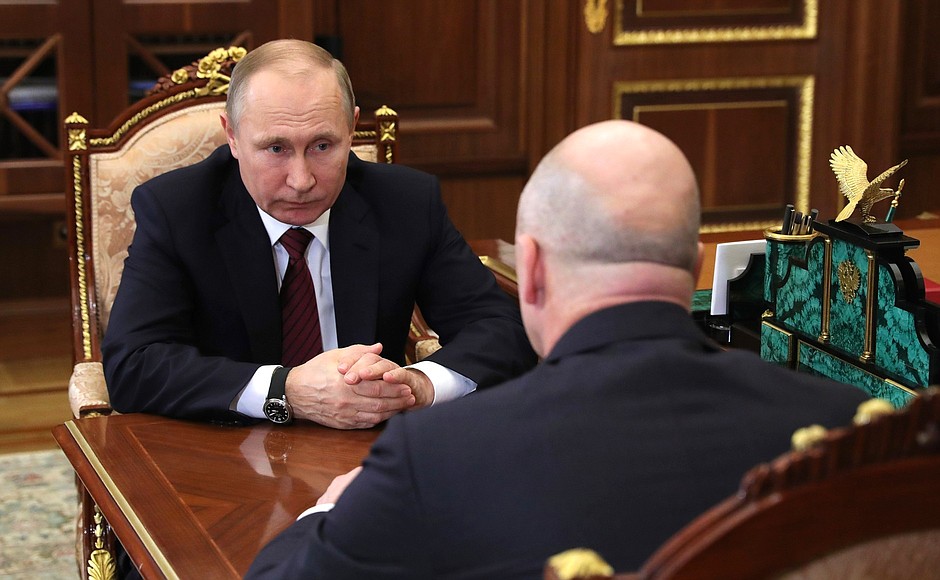 On healthcare, we propose redistributing available budget resources by designating it as a priority. We believe that more emphasis should be placed on helping those who need it most, as indicated in the Address. Today, we are still largely guided by old, often Soviet-era principles whereby financial assistance goes to everyone, but in very small portions. We believe that assistance of this kind should go entirely to people who are in need so that low-income households actually feel the benefit. We have a lot to do in terms of fine-tuning inter-budgetary relations, our financial relations with the regions, since your instructions in the Address will largely be financed by the regional, local budgets. This relates to education and healthcare. We believe that at this point we need to create conditions to make the regional budgets capable of generating revenue on their own and changing the structure of their spending based on the priorities in the key areas that were highlighted in your Address. The Government is working on these matters. We will present proposals on this in the near future, and hope that we will be able to work out most of the decisions needed to achieve the goals that were set in the Address with our parliamentarians during the spring session of this year. Vladimir Putin: Very well. The source of information - http://en.kremlin.ru/events/president/news/57118
__________________
Where should they dig the Very Deep Pit? Piglet said that the best place would be somewhere where a Heffalump was, just before he fell into it, only about a foot farther on. (c) Alan Alexander Miln |
|
|
#803 |
|
Senior Member
|
Vladimir Putin issued instructions in connection with the fire in Kemerovo
The President was briefed about the tragedy in the Kemerovo Region. He offered his condolences to the families and friends of the fire victims and wished a speedy recovery to all those injured. March 25, 2018 - 20:00 Emergencies Minister Vladimir Puchkov and Kemerovo Region Governor Aman Tuleyev have provided detailed information about the tragedy to the President. Vladimir Putin instructed the Emergencies Minister to fly to the site of the tragedy and to take measures to mobilise the necessary forces as well as equipment for dealing with it. Additional ministry forces and equipment, including robots and drones, will be dispatched to the site from Krasnoyarsk and Moscow. The President also issued instructions regarding assistance to the victims’ families and provision of the necessary medical services. The source of information - http://en.kremlin.ru/events/president/news/57131 Vladimir Putin honoured the memory of the Kemerovo fire victims The President arrived in Kemerovo, where over 60 people died in a shopping mall fire. He honoured the memory of the victims by laying flowers at an impromptu memorial outside the building. March 27, 2018 - 05:50 - Kemerovo 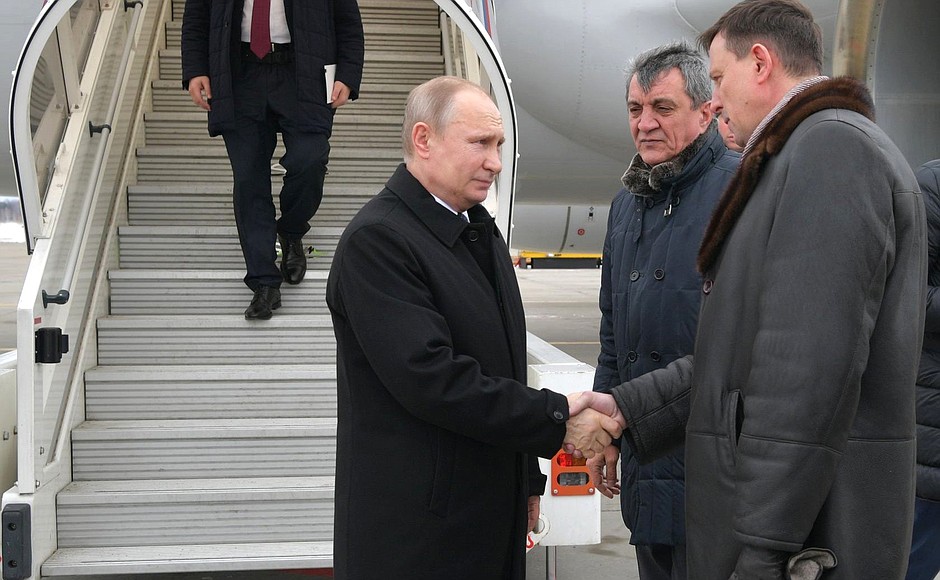 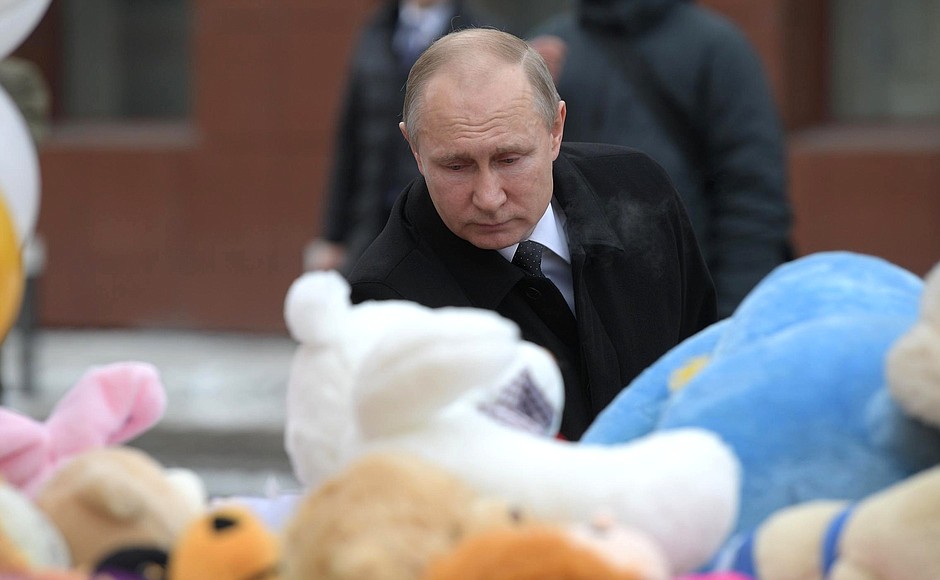 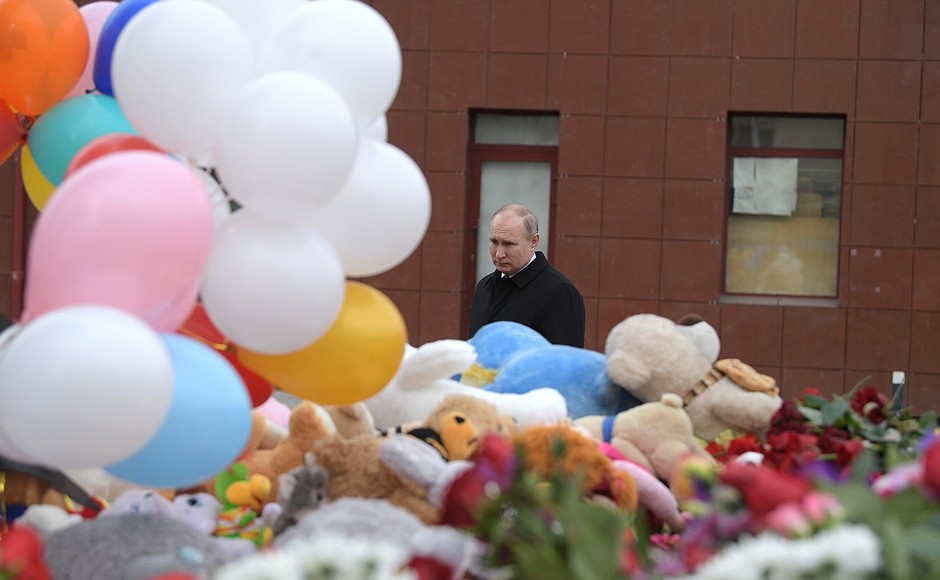 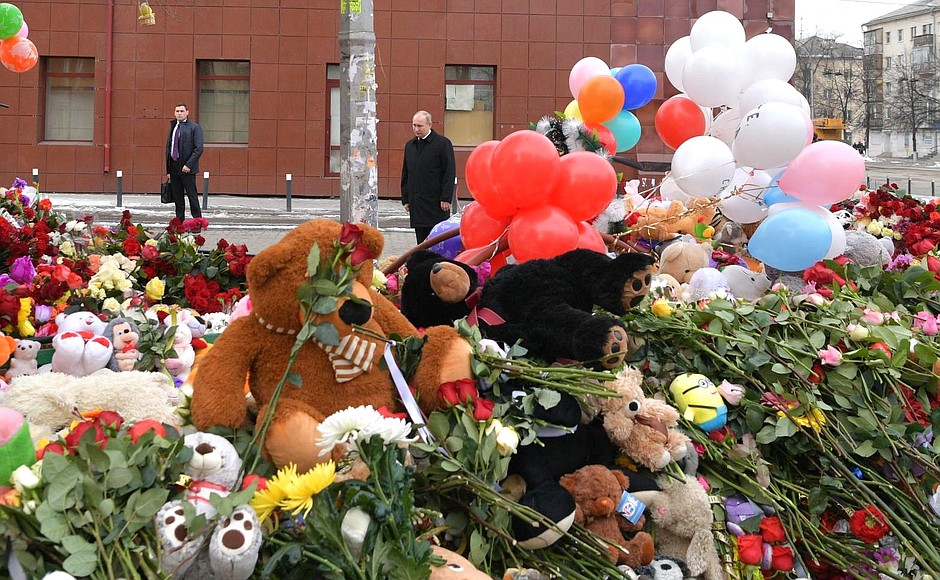 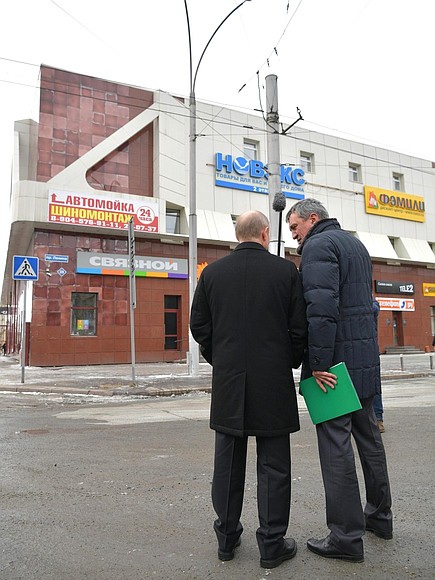 The source of information - http://en.kremlin.ru/events/president/news/57136 Meeting on relief efforts following a fire in Kemerovo The President held a meeting with Emergencies Minister Vladimir Puchkov, Healthcare Minister Veronika Skvortsova and Investigative Committee Chairman Alexander Bastrykin in Kemerovo. March 27, 2018 - 07:15 - Kemerovo 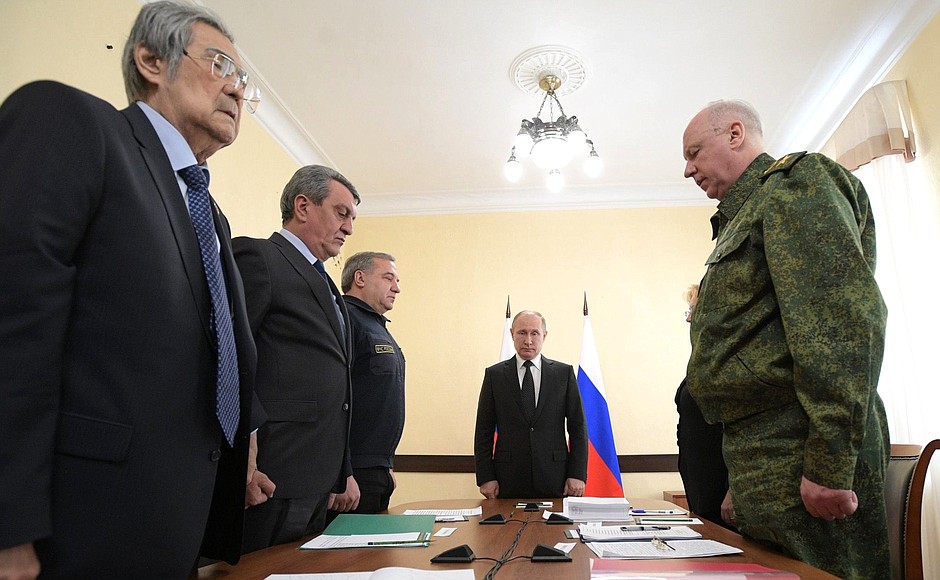 Presidential Plenipotentiary Envoy to the Siberian Federal District Sergei Menyailo and Kemerovo Region Governor Aman Tuleyev also attended the meeting. President of Russia Vladimir Putin: On March 25, a terrible tragedy happened here in Kemerovo claiming the lives of dozens of people. Before we begin our work, I want to say that the entire country is mourning together with you, with Kemerovo residents. I would like to convey my deepest and most sincere condolences to the families of those killed. Let us honour their memory with a moment of silence. Moment of silence. What is going on here? It is not a war, not an unexpected methane explosion at a mine. People, children came to a mall for entertainment. We talk about demography and now we have lost so many people. Why? Because of criminal negligence and mismanagement. How could this have happened and what were the causes? Just look at the consequences. Let us begin with the Emergencies Ministry. The Investigative Committee will later tell me how permits had been issued. How were the rescue efforts organised and what is being done now to help the victims? Mr Puchkov, please. Civil Defence, Emergencies and Disaster Relief Minister Vladimir Puchkov: Mr President, colleagues, At 4.04 pm on March 25, a deadly fire broke out at the Zimnyaya Vishnya shopping mall in Kemerovo. The roof and the floors of the third and fourth floors collapsed, and the fire covered up to 1,600 square metres in just minutes. Within seven minutes, firefighting units arrived at the site, as well as ambulances and the police, who immediately started providing assistance to people. Twenty people were brought down from the upper floors with the use of firefighting equipment; over 700 people were evacuated from the shopping mall. The task force was promptly built up with a Kemerovo Region mine rescue unit and all the units of the garrison and the city of Kemerovo and adjacent areas. These units organised the fire extinguishing and initial search and rescue measures. This task force was reinforced at the first stage with special units from the regional search and rescue detachment from Krasnoyarsk, which has been certified under the guidelines of the UN International Search and Rescue Advisory Group (INSARAG). We also deployed the Centrospas unit form Moscow and a respective unit from the Novosibirsk and Tomsk regions. The work was organised in four sections. We simultaneously conducted search and rescue and fire extinguishing measures because in some areas the temperature reached 600 degrees, there was heavy smoke, the structures were unstable and there was practically zero visibility. Vladimir Putin: When was it built? Vladimir Puchkov: The building was erected in 1968; it was rebuilt a number of times, adjusted for the needs of the retail and entertainment centre. It was registered as a small business but it conducted a broad range of retail trade activities, it had three cinemas, a swimming pool, special sections for children, and a number of other facilities. Mr President, at the second stage of the operation the task force launched and organised work in six sections. Vladimir Putin: Did the city administration issue permits for all those activities? Vladimir Puchkov: All the registration documents were issued here, in the city of Kemerovo. Vladimir Putin: That is, by the city administration. Vladimir Puchkov: The city administration. Vladimir Putin: And where is the Mayor? Why wasn’t the Mayor invited? Where is the Mayor? Vladimir Puchkov: The respective services are now resolving this issue. In 2016, an Emergencies Ministry commission arrived to inspect the premises. Documents were presented indicating that it is a small business with the annual turnover of 68 million rubles. The number of people employed was under 100. Also, recommendations were given that were not followed on, unfortunately. Vladimir Putin: When were the recommendations issued? Vladimir Puchkov: In 2016. Presidential Plenipotentiary Envoy to the Siberian Federal District Sergei Menyailo: The building was put into operation in 2013 as a retail and entertainment complex. Vladimir Puchkov: After the latest reconstruction conducted. Mr President, assistance was rendered to 129 people during the search and rescue operation. Unfortunately, 64 people died. By now we have recovered 58 bodies and keep searching for six persons who according to their relatives’, could have been in the shopping mall. Our priority is to render targeted help to all the families of the victims. Yesterday the Government of the Russian Federation made a decision, the Government signed an order allocating 76 million rubles. Each victim’s family will get 1 million rubles, the people who sustained minor injuries will get 200,000 rubles, and those with medium or grave injuries will get 400,000 rubles. At present the task force comprises a total of 800 personnel, 195 units of equipment. All fire and rescue units are in action. Vladimir Putin: What is the use of working now? The people are dead. Sixty-four people. Vladimir Puchkov: Mr President, we must find six people. Vladimir Putin: Certainly, the search operation must go on. All right. Please go ahead. Investigative Committee Chairman Alexander Bastrykin: Mr President, this is what we have managed to discover in the past 24 hours. In 2013 this was the Kemerovo Confectionery Factory, which, according to recent reports, contrary to regulations was transformed into Zimnyaya Vishnya company, a shopping mall. The main sponsors of the newly registered legal entity are Denis Shtengelov with a 78 percent stake, who resides primarily in Australia, and Igor Semenov with a 17 percent stake. The centre’s manager is Ms Suddenok, who leases the premises. We have seized a huge number of documents in the past 24 hours, which need to be thoroughly analysed. But I would like to stress that it is not really a small business. This complex, the shopping mall, has 27 lessees and about as many owners. That is, it is a whole conglomerate, a holding created with the goal of making a profit. Vladimir Putin: That is natural. But this is not the issue. The issue is how work was arranged to ensure safety. Alexander Bastrykin: Answering this question, I can say that we have detained five people (most of them are managers). These are Mr Sobolev, CTO of the owner company Kemerovo Confectionery Combine, he was responsible for fire safety. Mr Polozinenko, CEO of Sistemny Integrator, this company was charged with the maintenance of fire alarms in the shopping mall. The fire alarm has not worked since March 19, but they did not do anything to fix it. Vladimir Putin: Wait. Why didn’t it work? Alexander Bastrykin: For technical reasons. It turned off on March 19 and nobody tried to determine why since then. It was simply out of order and nobody fixed it. Vladimir Putin: So, they knew that the fire alarm was not working and they did nothing? Alexander Bastrykin: That is correct, although the company that was supposed to maintain it specialises in fire safety. The fire alarm has been out of order since March 19. But the worst thing is that there was an alarm button at the security post, and the security guard (we detained him too), his name is Antyushin, did not press it. The fire alarm was out of order, but the panic button was working and he did not press it for some reason. Vladimir Putin: He did not press it when the fire started?  Alexander Bastrykin: That is correct. We cannot give a reasonable explanation for this. He cannot explain it, this security guard. He also works for a licensed company, but he himself is not trained at all. So, the security system in general, despite all the funding and specialised companies engaged in maintaining it, was totally neglected and did not function. In addition, we found out that many doors to the spaces with young people on the fourth floor with games rooms and three cinema halls, these doors were closed – locked. Vladimir Putin: Why? Alexander Bastrykin: We are investigating this now. One of the versions is that it was done to prevent young people without tickets from entering the cinema. They locked the doors until the end of the movie, and nobody entered or left after that. The fire started at the children’s playground on the fourth floor. Experts are currently working there. They have two versions: it was either a spontaneous combustion due to an electrical wiring fault, or, which is less likely, the use of open flame. We have launched an electrotechnical, construction and engineering expertise. It will be held in St Petersburg at agencies that specialise in fire safety, and we will find the cause of this tragedy. The last thing to be mentioned today is that we did not have such things before. In this case parents left their children for a long time in the game room. A school teacher left an entire class there and went to attend to her business. When we watched the tapes (we can give you the photos and videotapes), we saw that unfortunately, this is common among parents and school staff who are responsible for children’s lives. They forget about their responsibilities and go to our shopping malls to shop while children remain under the supervision of some unknown people in unknown conditions. Vladimir Putin: It is fine given the necessary safety measures. Alexander Bastrykin: Yes. Vladimir Putin: There is nothing wrong with the people who came to shop and left their kids in a safe place given the necessary security measures are taken. Alexander Bastrykin: Mr President, wecannot find the people who were in that room where the fire broke out, who represented the mall administration. Why did the personnel lock the doors? Who was there? I would like to note that most of the staff ran away, leaving the children and their parents; those who were responsible for safety and the evacuation – they ran away. Almost all of the mall staff survived. You are absolutely right in saying: given the necessary safety measures. Here, we see the opposite. The goal was to let 50 tenants and owners do their business, while all the other things were forgotten and neglected. Vladimir Putin: Look here, it is imperative to get to the bottom of this properly. As to the owners, they should definitely turn up and take part in all that work. However, the owners just lease their properties and that is all, whereas it is the responsibility of the authorities to monitor how the work is organised and to make sure it is at the right level, this is the point. As to the owner, he just leased his property and that is it. However, the state authorities, the city authorities in this case, must first of all ensure the necessary safety level. Alexander Bastrykin: We will certainly identify the government body that authorised, permitted all that. But I have just a list of lessees, the ones that we found, they are 27 organisations of different profiles, and in fact, nobody monitored them, how they trade, how they protect all that, how they ensured safety and so on. We will sort it out, starting with the city administration that issued a permit in 2013 on transforming that confectionery factory into a shopping mall. Apparently, this was done with gross violations, including of construction norms. We will stage a construction expertise and get to the bottom of this. Vladimir Putin: Did your agency check on them? Or just two years ago and that was it? Vladimir Puchkov: Mr President of the Russian Federation, taking into account that there were 27 enterprises, all of them were small businesses that were given tax holidays. Vladimir Putin: So what? What does tax holiday have to do with that? Tax issues are tax issues whereas safety issues have nothing to do with taxes, right? Vladimir Puchkov: The are also holidays with regard to the control and oversight of small and medium-sized businesses, Mr President of the Russian Federation. Vladimir Putin: Listen, it has nothing to do with safety and security issues. What do holidays have to do with that? You are talking about tax holidays and ensuring security, these are different matters. When they name the number of victims, the first feeling one gets is not to cry but to howl. And the things being said here evoke quite different emotions, I will be honest with you. What is being done by the Healthcare Ministry? Healthcare Minister Veronika Skvortsova: Mr President, since day one about 70 patients have been received, and over 50 of them received outpatient assistance. Their condition was not grave, and they were released and are currently under outpatient monitoring. Fifteen people remain in hospital; 13 of them have toxic combustion gases and carbon monoxide poisoning with medium severity and minor injuries. As of today, their condition is relatively satisfactory with good progress. Two of them lost their children in this tragedy and experience an acute stress reaction. Psychiatrists and psychotherapists from the Serbsky Federal Medical Research Centre for Psychiatry and Narcology are working with them. Two of the patients with the gravest condition have combined injuries due to falling from the fourth floor. The most severe case is that of an 11-year-old boy who has pulmonitis, pulmonary contusion and pelvic bone fractures. He was in a medically induced coma with artificial lung ventilation. Over the past day and a half his condition has improved and he is now in a stable condition, his cerebral oedema and pleural oedema have regressed. Today another multidisciplinary team meeting of leading specialists will be held, including a paediatric anaesthesiologist and a paediatric toxicologist. We plan to let him breathe himself today. Everything is proceeding now along a positive scenario, thank God. Also there is an 18-year-old man with a head injury, traumatic brain contusion, facial bone fractures and a chest contusion. His condition has improved significantly and is now relatively satisfactory. The treatment is ongoing. Generally, he shows positive dynamics. Concurrently, a crisis centre was set up to help the families. Yesterday and last night alone 69 family members were received with acute stress reactions, hypertonic crisis, and decompensation of ischemic heart disease. A special team of medics and therapists is working with all the victims’ families. Starting yesterday, forensic experts have been actively engaged. Today, the management of the Russian Centre of Forensic Medical Expertise has arrived and DNA testing began on the bodies that cannot be identified. 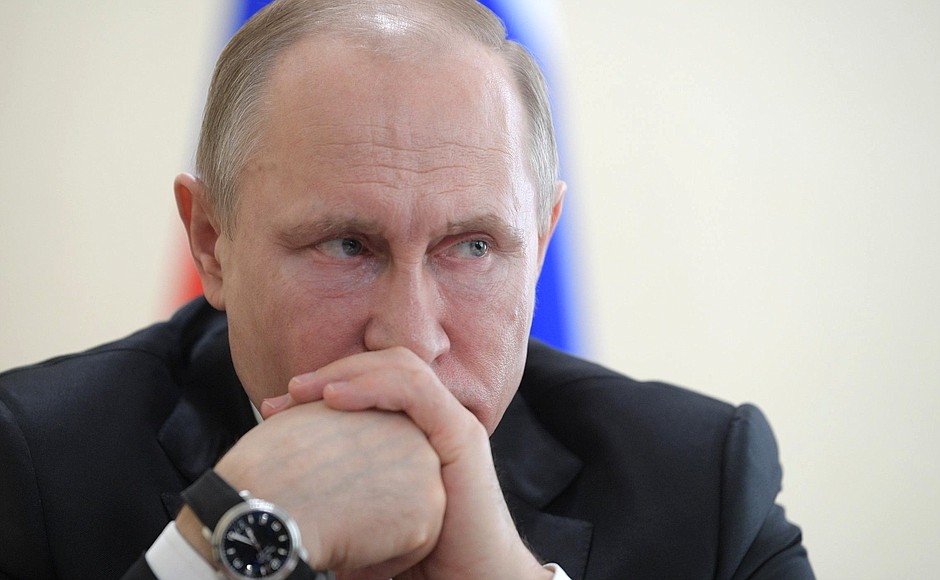 [At translation here the part of the text has been lost - Alex Him. Alexander Bastrykin: Unfortunately, we have bodies of 37 people, where it is necessary to carry out a genetic examination, otherwise they will not be identified. This will take a couple of weeks. We have already identified 17 people with the help of medics. But with respect to 37 bodies it will be necessary to carry out a special genetic study. Vladimir Putin: It is necessary to give a legal assessment of the actions of each official. Carefully study everything and give a legal assessment. You can not hide behind a tax holiday. Our trouble is that the certificate can not be obtained without money, and if you paid money then they will sign anything what you want. And officials do not care about the security of people they are not interested in it. That's why it all happens. Mr Tuleyev, how do you assess the situation? Kemerovo Region Governor Aman Tuleyev: Mr. President, you personally called me. Once again, thank you very much. I apologize personally for what happened in my region. But when I reported to you, I said that 27 people were missing. And only then this number began to grow. And after the call that the niece was dead, I already understood everything. But I did not phone you again, because the picture of the tragedy was already clear to me. The rest, you rightly said: slovenliness, negligence, connivance. All this is visible. Those with whom I met say that there was a morning performance, and there were fireworks. This is preliminary, eyewitnesses say. And from there everything went. Well, and then you know: the doors are closed, the spare exits are closed, and ventilation is at full power at the same time, and there is no smoke exhaust. Mr. Bastrykin works, we help him with everything we can. Now there are very powerful attacks on us: here, they say, this is tax holidays, business and so on. I stop it. As you said, just verbatim to stop. They were, are and will be, and business is the basis of the economy, we will develop it. But this is not a one-way street. We also have a responsibility, first of all - safety in places where children, people are crowded. Then it began, as usual. All opposition forces at the moment came to speculate on human misfortune. They go home, go to the enterprises that are located nearby, in the residential sector. Today there is somewhere about 200 people. These are not relatives of the deceased. We work with them, we say: "You can not do this, it's sacrilege, when misfortune happened, and you try to solve some of your political problems on this."] 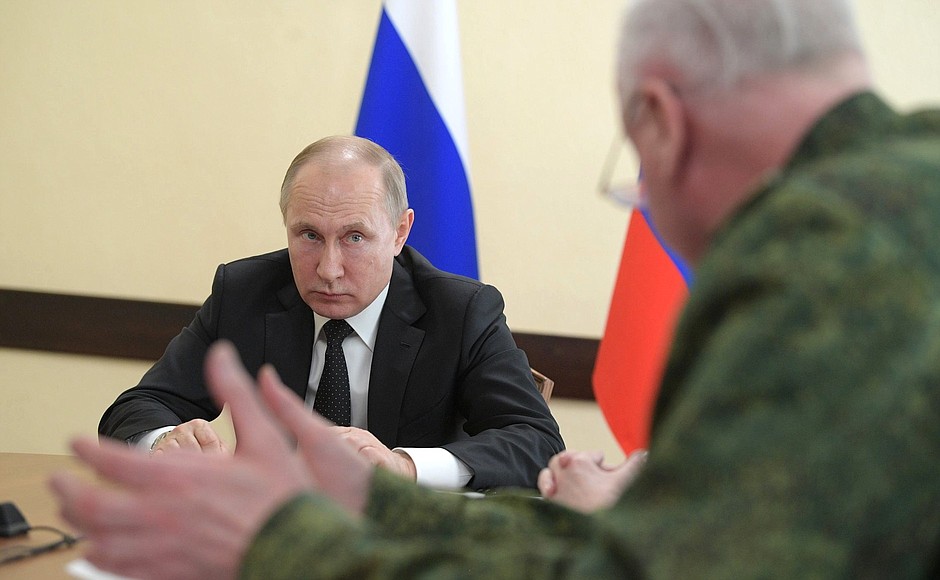 Now about the measures we are taking regarding the families. We are doing everything the way you instructed in the Raspadskaya mine case [a severe accident with a large number of casualties occurred at Raspadskaya mine in 2010]. First, each family has already been given assistance (apart from the Government) of one million rubles. Accounts were opened but that is not the point. Over 20 years have passed since my son’s death but the pain is still there. Time must pass. And not so little time that the families will be forgotten after 40 days. We will draft a programme for each family, as you taught us to do in the Raspadskaya mine case. You did all that personally. And families with children will receive assistance until the children are eighteen years old. Each family separately. I give you a firm promise on that. Next. We already began meetings with the families. I will meet with each family in person, but for now I will see those who are in a good condition, as you used to do. So now I will meet with the people who are in a good condition, and the others will follow incrementally. I will meet with all of them without exception. Some issues are already being settled on debts, on loans – on small matters. These are minor matters but they are everyday problems that people have to deal with. Each family will have a personal doctor, a psychologist, a social worker, and they are professionals with extensive experience. I promise you that everything possible will be done here. Consider it done. My task is to make sure such things do not happen, to stop these carrion crows trying to speculate on other’s grief and to achieve some murky goals. Mr President, the tragedy is immense but the experience we gained thanks to you at the Raspadskaya mine is being used to the full. Thank you. Vladimir Putin: We must do everything to help the people. Aman Tuleyev: We will. Mr President, I promise you this personally. I have never let you down and as you remember I always did what I said. Yes, the grief is enormous, I understand and I take it very personally. I will do everything, I will. Thank you. The source of information - http://en.kremlin.ru/events/president/news/57137 The President visited Kemerovo fire victims in hospital Vladimir Putin visited the Kemerovo shopping mall fire victims in the regional emergency hospital. March 27, 2018 - 08:00 - Kemerovo 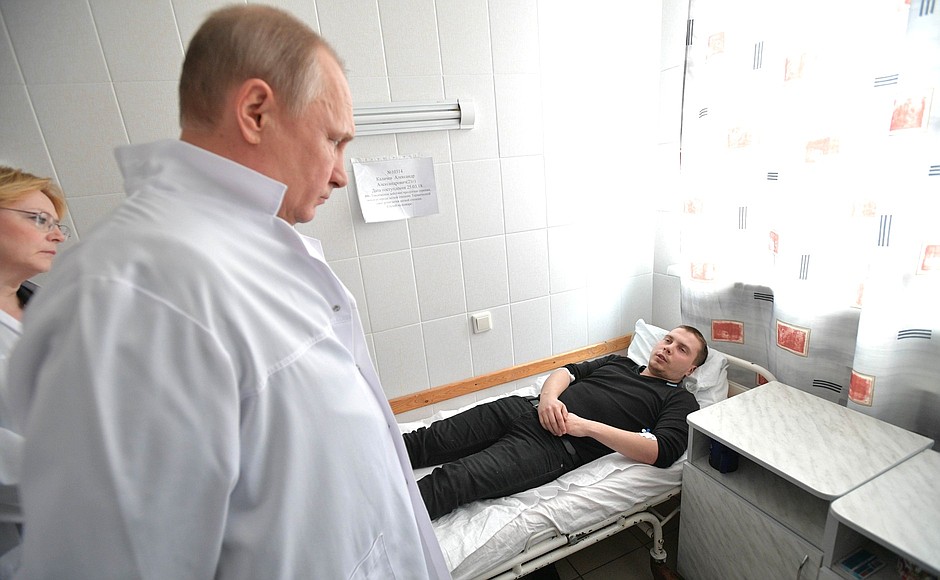 The President spoke with Ivan Zavarzin, 18, who leapt down from the fourth floor during the fire. The young man was in the shopping mall with his father. He said that in the first minutes of the fire, many people could not believe in the reality of what was happening, thinking it was a fire drill. Healthcare Minister Veronika Skvortsova reported that the young man’s father is alive, and Ivan is also on the mend. The President also met with Andrei Sergeyev, 35, Alexander Kalachev, 21, and Nikolai Lobikov, 42, who helped evacuate the people from the shopping mall in the first minutes of the fire. The head of state wished all the victims a speedy recovery and shook their hands. 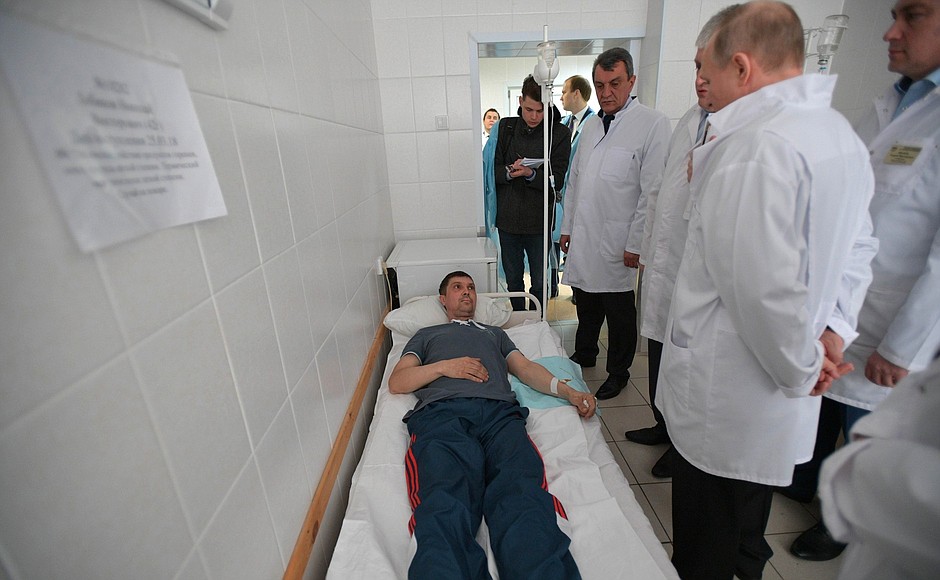 President of Russia Vladimir Putin: Good afternoon. Konstantin Sivoronov, head of the acute toxic exposure department: Emergencies Ministry employee Andrei Sergeyev took part in the relief efforts. He suffered burns and a light toxic effect of combustion products. Vladimir Putin: Did you inhale a lot? Andrei Sergeyev: Bit off more than I could chew, I wanted to do more to help. Konstantin Sivoronov: He is recovering well and will be released soon. Andrei Sergeyev: Yes, I am feeling better now. Vladimir Putin: Didn’t you have a respirator? Andrei Sergeyev: Certainly, we had our protective gear. But I spent 11 hours there in the fire. It’s nothing, though. Vladimir Putin: How do you assess the situation as a professional? What were the problems there? Andrei Sergeyev: The most obvious problem was that the area was huge. It was impossible to get to the source of fire in such conditions. And it was very hard for the people who were there to get to evacuation corridors, because the smoke moves much faster. Plastic, which is now used everywhere, burns with a black smoke and people could not orient themselves. A person who is there for the first time simply does not know where to run. Vladimir Putin: They did not know where to go. Andrei Sergeyev: That’s right. So, people went to a dead end and could not escape. They could not see anything in that black smoke. Even us, with our special gear, we did not see much and oriented ourselves by touch. Such huge areas pose a huge problem; I think it should be prohibited to build such vast spaces. Vladimir Putin: For these purposes. Andrei Sergeyev: People will not be able to leave them fast enough regardless of the number of exits. Moreover, the exits were not open for some reason. Vladimir Putin: Did you have to break down the doors? Healthcare Minister Veronika Skvortsova: They tried to steer the people towards the centre. Andrei Sergeyev: After the fire was put out, we went there to search for people. We still had hope. Vladimir Putin: You searched the rooms? Andrei Sergeyev: Of course. As soon as we could enter a room, when the danger was past and the temperature was down, we went there step by step. And when we got there, we saw this problem. Vladimir Putin: Get well soon. Konstantin Sivoronov: This is Alexander Kalachev, an employee of the shopping mall. He took part in evacuating people; he works there himself. He was admitted with a light burn of throat. He is recovering fast and will be released soon without long-term consequences for his health. Vladimir Putin: What did you do? Alexander Kalachev: I evacuated people from the third floor. Well, not really evacuated them, just guided them towards a place from which it was easy to leave the building. Vladimir Putin: Carbon monoxide poisoning? Alexander Kalachev: Well, yes. I was the last to leave, so I inhaled a bit. Vladimir Putin: Get well. Alexander Kalachev: Thank you. Konstantin Sivoronov: This is Nikolai Lobikov, he was on the fourth floor. His condition is a bit more serious, but he is still recovering. Vladimir Putin: Also inhaled a lot? Konstantin Sivoronov: Yes, but he did not lose consciousness. Nikolai Lobikov: I am recovering fast. Vladimir Putin: Get better. The source of information - http://en.kremlin.ru/events/president/news/57138 Meeting with local activists in Kemerovo Vladimir Putin met with local activists who expressed low confidence in the shopping mall fire investigation. March 27, 2018 - 08:20 - Kemerovo 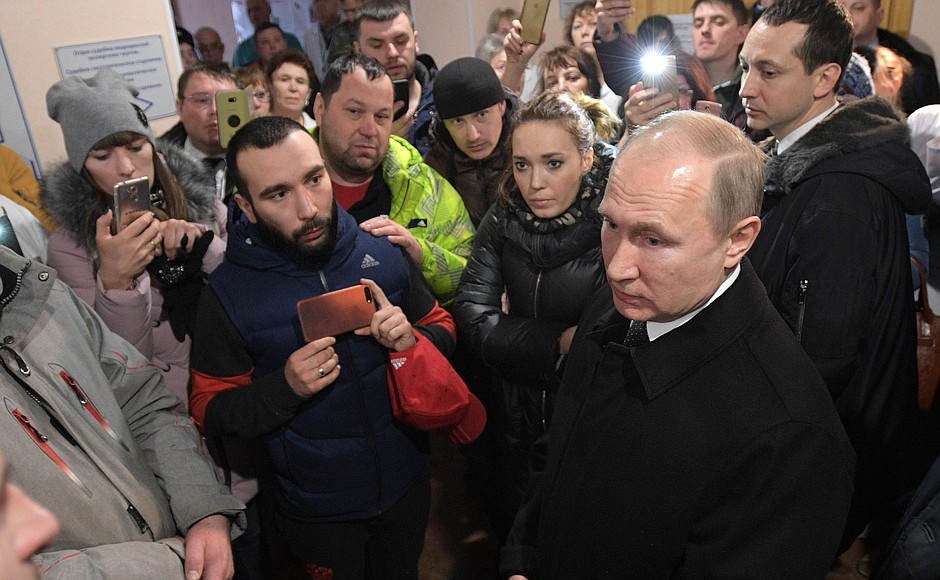 The group of activists includes family members of those killed and injured in the fire who do not trust the official data regarding the number of victims. The meeting took place in a forensic medical office where the activists arrived to compare lists of victims against the official records. The meeting was also attended by Kemerovo Mayor Ilya Seredyuk. President of Russia Vladimir Putin: (To Ilya Seredyuk.) How long have you been mayor? Kemerovo Mayor Ilya Seredyuk: Since 2016, or two years as mayor. Before that, I was deputy mayor for six years. Vladimir Putin: How come you issued the permit? Ilya Seredyuk: <…> I was head of a municipality and then returned to the city. During that period, in 2014 the permit was issued for commissioning the section where the tragedy happened. Vladimir Putin: Nothing was checked for two years. Remark: My question too, do you carry out checks at all? Vladimir Putin: There were no inspections for two years. Ilya Seredyuk: Mr President, there was an inspection. Vladimir Putin: When? In 2016? Ilya Seredyuk: The State Fire Inspection issued instructions. Vladimir Putin: In 2016. Now is 2018. Ilya Seredyuk: Instructions were given and then the building was sold. Vladimir Putin: Selling has nothing to do with it. Safety must be ensured. Sold or not sold, what does it matter? Safety must always be ensured, right? What difference does it make who the owner is? Services must operate properly to provide security. Where are these services? Remark: Mr President, if I may. It looks like even before the fire it was difficult to exit the building. There were narrow passageways and few windows. People basically got trapped. Vladimir Putin: I have just been to the hospital where I spoke to a firefighter who was rescuing people. He told me the same thing. These buildings simply shouldn’t… Even a person doing a firefighting job ended up in hospital after breathing in too much carbon monoxide. Remark: Of course, it is an outrageous tragedy. Vladimir Putin: Moreover, it turns out the doors were locked. Remark: Yes, we would like to hear comments on that as well. Those locked doors, what was that? A measure against people coming in without tickets? What if a person just wants to go to the WC? They locked up children while the children were drinking Coca Cola or something else in the cinema. They were there just for fun. The whole idea is outrageous even if there had been no fire. With the fire, I do not even want to start. It was like a gas chamber, a very similar situation because people suffocated. Vladimir Putin: An investigative team of 100 people is working here. They will look at every link in the chain, from those who issued permits to those responsible for monitoring safety and security, the private security companies whose staff were there and did not push the panic button in time, and so on and forth. They will follow the chain starting from the re-registration of the building and the permit that allowed a factory to be turned into an entertainment centre, to those who permitted those materials to be used in a facility of this purpose. This is a disgrace, no doubt about it. Remark: Can we have your word that the investigation will be strictly under control and we will find out the truth? Vladimir Putin: Do not even doubt it. Remark: And that it will be as transparent as possible? Vladimir Putin: Rest assured. Remark: And those guilty will be punished? Vladimir Putin: There’s no need to doubt that. Remark: The people want them to be brought to justice. Vladimir Putin: That will be so. Let us not jump to any conclusions right now or point fingers. These 100 investigators are working on every aspect of the incident, you can rest assured. Remark: Will it be a full investigation? Vladimir Putin: A full investigation, absolutely. The point is there are many such facilities across the country. The Emergencies Ministry has now begun to do something about it and to find things out. There are hundreds of centres like that one. Remark: Look at Laplandiya, it is falling apart. Vladimir Putin: Is there another mall here? Remark: Yes. There used to be a stadium and a sports centre with a leaking roof. It was sold. They dug out a foundation pit and created basement premises there. Vladimir Putin: How come combustible materials were allowed to be used? This is stated in the investigators’ first reports. How did this happen? Remark: Mr President, you understand that there are people who sign these documents. Vladimir Putin: Exactly. This is what I am talking about. <…> Vladimir Putin: The temperature was 600˚C degrees. Remark: It did not just happen. The building had conditions for that. Vladimir Putin: I have just said that combustible materials were used that are prohibited in spaces intended for large numbers of people. <…> Remark: You see, social media is creating a horror story. Remark: Yes, therefore we need information. Rumours are starting to spread because of lack of information. Vladimir Putin: You know it very well that social media is a murky source, unfortunately. We need to rely on the results of the actual inquiry. Remark: You see, many people do not trust the authorities these days. Vladimir Putin: Listen, a group came from Moscow. The Chairman of the Investigative Committee is here. <…> Vladimir Putin: Quality is the most important thing. Without appropriate quality no permits can be issued. This is my point. <…> Remark: The usher’s work is to stand and supervise, not to lock the doors and leave. Remark: She should have stayed inside to open the door if anybody needed to go to the bathroom. Remark: Will this person who locked the doors be identified and held accountable? Because people were making calls on their phones. Those calls were horrible. Remark: The person who locked the emergency exits. Vladimir Putin: Listen, what is there to discuss. Children. I have no words. Remark: As far as I understand, there was violation after violation. Down to the fire alarm being out of order. There was no light. The people did not know where to run in the dark. Remark: The staff did not know what to do. Vladimir Putin: The fire alarm did not go off but it could have been turned on manually, which was never done. Remark: Thank you to those people, fitness instructors, who led everybody out of the gym. They had a clear understanding of how to act in the situation. Remark: There was no security staff there, nobody. Remark: The mall staff did not help in any way. They were the first to run stomping over people’s heads. Vladimir Putin: There is a member of staff in hospital who risked his life to save others. <…> People just did not know where to go. Remark: We were told yesterday that those who cannot be identified may be reported missing. I hope it will not happen. Vladimir Putin: DNA testing will make identification possible. Remark: I mean there should not be cases when someone went there, left his car by the cinema and died in the fire but later it will be reported that he, say, went for a walk in the woods. Vladimir Putin: DNA testing is necessary here. Remark: May I ask a question? In the wake of this tragedy, my question is, will Tuleyev keep his post? Vladimir Putin: Tuleyev is not the mayor. Remark: I understand he is not the mayor. But you are well aware that… Remark: Everything that happens in the region can be traced back to him. Vladimir Putin: I understand. Remark: Mr President, the people do not want him as governor. Remark: He is the problem. By the way, the mayor is doing his job. Although he failed this time. Remark: He is the only person who met with us, who had the guts to meet with the public. Remark: He is a true citizen. Vladimir Putin: What is your name? Remark: Kostya. Vladimir Putin: Kostya, you see, a terrible tragedy happened, terrible. To make decisions of this kind… First, one should not make them on camera, for the sake of dramatic effect in the wake of a tragedy. This is the first point. Second, we must find out for certain who is to blame and for what. Once we succeed – and we will succeed – decisions will be taken. Remark: Regardless of status? Vladimir Putin: Absolutely. Status does not matter when it comes to loss of life. We lost so many children. We talk about demography, encouraging people to have more children but look how many kids we lost as a result of this incident. Remark: Thank you for coming here to support us. The source of information - http://en.kremlin.ru/events/president/news/57139 March 28 declared national day of mourning The President signed Executive Order declaring March 28 the day of mourning following the Kemerovo fire tragedy. March 27, 2018 - 13:15 The Executive Order reads: “The fire that took place on March 25, 2018 in Kemerovo, Kemerovo Region, has claimed many lives and left many people injured. Mourning those killed and conveying condolences to their families and friends, I resolve: 1. To declare March 28, 2018 a national day of mourning in the Russian Federation. 2. To lower the Russian state flags all across the country on the day of mourning. 3. To advise cultural institutions and television and radio broadcasting companies to cancel entertainment programmes on the day of mourning. 4. The Russian Government and the local governments of the Russian regions to take necessary measures to provide assistance to the families of those killed and injured. 5. This Executive Order shall enter into force upon its signing.” The source of information - http://en.kremlin.ru/events/president/news/57140 Meeting with Alexander Bastrykin and Veronika Skvortsova Vladimir Putin met with Chairman of the Investigative Committee Alexander Bastrykin and Healthcare Minister Veronika Skvortsova. March 28, 2018 - 17:15 - Novo-Ogaryovo, Moscow Region 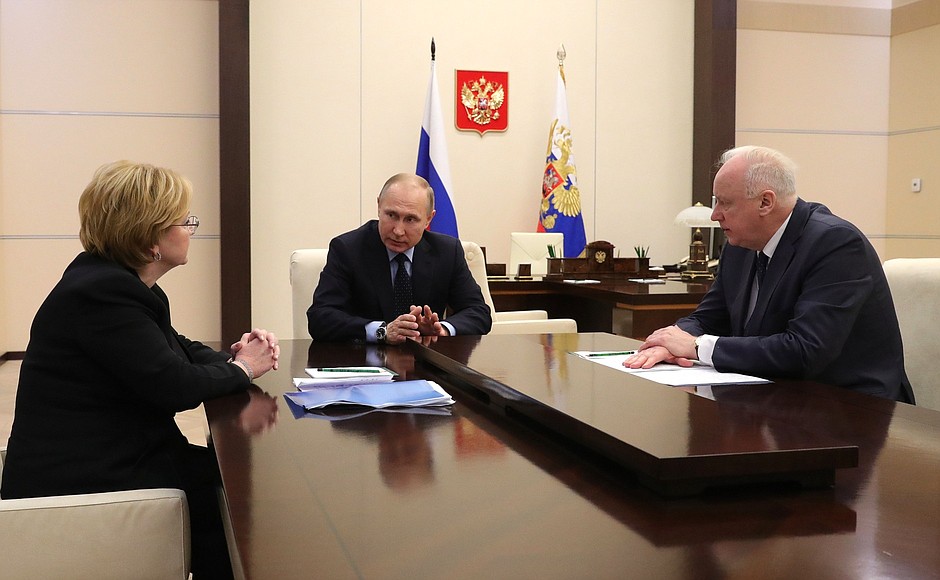 Participants in the meeting reported to the head of state on the investigation into the causes of the fire at the shopping mall in Kemerovo and measures on rendering aid to the victims. President of Russia Vladimir Putin: Ms Skvortsova, Mr Bastrykin, We went to Kemerovo yesterday and worked there because of the terrible tragedy there. Today I would like to return to this subject to clarify some details and moments and to hear your reports on your respective departments’ efforts. Let us start with Mr Bastrykin… Mr Bastrykin, how many investigators are in the city now, how many are working in Kemerovo and are appropriate specialists in Moscow being used? Chairman of the Investigative Committee Alexander Bastrykin: Mr President, our team has not been reduced by a single person. There are 104 professional investigators and forensic specialists, over 40 from the central office – the most qualified specialists from the major crimes department. The most important task, that we are almost finished with, is the inspection of the scene where the fire started. Two main scenarios have been suggested – a malfunction of the fire safety system and, the second one is set forth by the people against whom we are bringing criminal action (these are officials and specialists) – they claim that the fire was set by someone inside the building with an open flame. Our initial findings show that this version is unlikely. The more probable and credible version is the one of a failure of the fire safety system, the fire prevention and fire suppression system. We ordered forensic tests in two specialized facilities in Moscow and St Petersburg where such tests are conducted – these are the extinguishing test (on the cause of the fire): this is a construction expert evaluation on whether the building could be used as a retail centre after it ceased being a confectionery. A financial and economic evaluation will be ordered regarding the expenses that should have been allocated by the founding shareholders on the conversion of the centre. Currently, the second group of experts on economy and finance are studying the documents we confiscated from the major founding shareholders of the organisation in order to establish the legality of the building’s status and the contracts signed on all sorts of support, including of course the fire safety. We are working in close cooperation with our colleagues from the medical facilities. The Minister, apparently, will report on the medical aspect. I would like to emphasise that we are currently working with the city officials, primarily the mayor’s office; those individuals that authorised the use of the centre in 2013. We are questioning them, confronting them; seizing any documents they issued to regulate the activities of their offices. We will also give a legal and juridical evaluation of the legitimacy of the decisions taken. The final thing I wanted to report. We are carefully studying how the respective supervisory organisation and other agencies conducted preventive inspections starting when the centre opened in 2016. There are grounds to believe that it was done, to put it mildly, not quite in good faith. Even the fact I reported to you yesterday testifies to that, since the fire and alarm system had been inoperative for a week; this was known to the head of the respective security agency. No measures had been taken throughout the week to rectify faults in the system. It ultimately led to the outrageous fact, let me reiterate, that the head of the private security company, whose competence we are also checking, when it became obvious that the fire started, did not turn on the alarm system warning people that they should leave the building, whereas he himself did. Unfortunately, a significant part of the staff, who should have helped people to leave the centre, were the first to leave the building, while people were left to fend for themselves. And my final point. I plan to be in Kemerovo on Saturday, visit the headquarters, listen to the first results of the investigation, and meet with representatives of the victims, if necessary. The first such meeting has already taken place today with the involvement of our investigators. 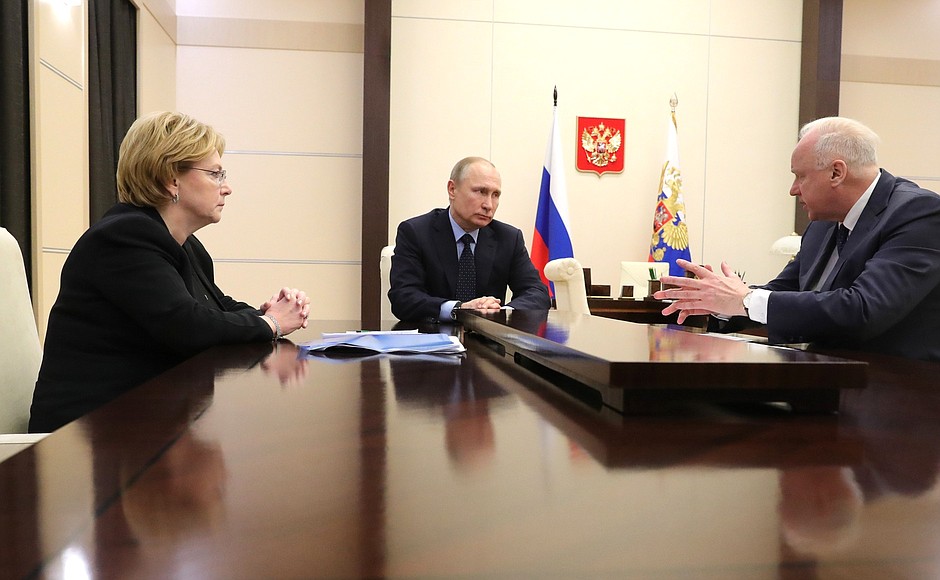 Vladimir Putin: Mr Bastrykin, it goes without saying that each scenario, every scenario without exception, must be checked. But, of course, the version about trespassers is very convenient for the current suspects. This is the first thing. Secondly, we see that regrettably false stories are appearing in the social media, including foreign ones, with a view to sowing panic mistrust and setting people against each other. Needless to say, this should not be allowed under any circumstances. However, the investigation must be comprehensive. If one of these scenarios is confirmed it should be justified with objective information, the expert reviews that you mentioned of technical equipment, construction, finances and the like. But, no matter what conclusions the investigators reach, some things are difficult to understand, as you said – why nothing was done to fix the malfunctioning alarm system, why the fire alarm button was not pressed by hand, and why the doors remained locked. There are too many “why’s” here. Yesterday I read a document on the inspection of this building in 2016. In particular, it was inspected by employees of the fire safety service. What does it say? It even sounds strange, “No remarks.” There are problems everywhere. Find this document, I will tell you where to get it, and identify who did this, who signed it. Alexander Bastrykin: Yes, Mr President. Vladimir Putin: And one more point. As usual, this investigation must be as objective as possible but it must also be transparent. If you plan to go to Kemerevo on Saturday, and hold a meeting there – the presidential envoy has already met the victims and you should meet them as well. Talk to them, hear what they think about this and how they visualize the development of the situation so you can use it during the preliminary investigation. How much time will it take to make the expert reviews that we spoke about? Alexander Bastrykin: Unfortunately, this process might take time. Judging by our experience, in-depth detailed expert investigation into the construction, financial and economic issues may take four to five months to provide us with substantial court evidence, and this is the difficulty. But we will expedite the process as much as we can, we will ask our expert colleagues to create larger groups for the expert inquiries. But as I said, it may take three to four, or up to five months. Vladimir Putin: Delegate as many people as needed to avoid delays. But the work should certainly be done at the highest professional level. Alexander Bastrykin: I would like to emphasise that our experts will be involved, of course. But the two organisations that we mentioned, in Moscow and St. Petersburg, will be independent experts. So there will be both our expert investigations and independent expert inquiries. We have our own resources for financial, construction and economic expert investigations but in order to prove the scenario that we arrived at – careless oversight of the construction sector and funding, and the poor quality of inspections, we need the independent organisations. So again, some extra time will be needed to receive their conclusions. Vladimir Putin: It is essential that everybody understands that the investigation proceeds within the legal framework and disregards the official position of those involved in this tragedy. Alexander Bastrykin: Yes, I see. 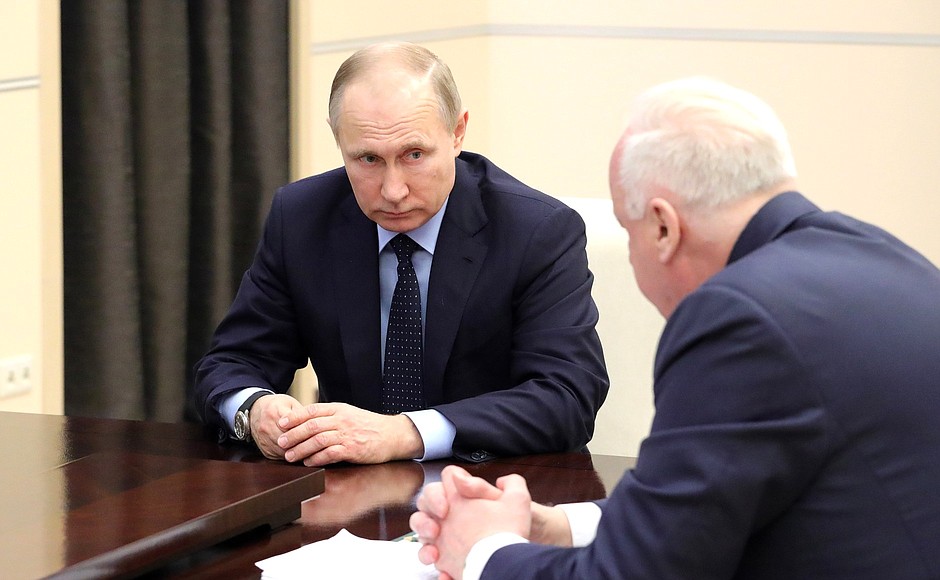 Vladimir Putin: Ms. Skvortsova, in your ministry, how are things with the casualties? This is my first question. My second question is how long will it take to do the DNA tests? You heard people ask this question yesterday. Healthcare Minister Veronika Skvortsova: Our Kemerovo colleagues, the Health Ministry staff, the Serbsky National Centre for Psychiatry and the Federal Centre for Forensic Medicine are all working hard. Twelve patients remain in the hospital. An 11-year-old boy, Seryozha Moskalenko, is in the children’s hospital, we reported about him in detail earlier. His condition has improved in the past 24 hours; he is conscious and can eat and talk. His grandmother is with him and he will be transferred from emergency care to a regular ward in the next two days. Eleven adult patients remain in the regional hospital. 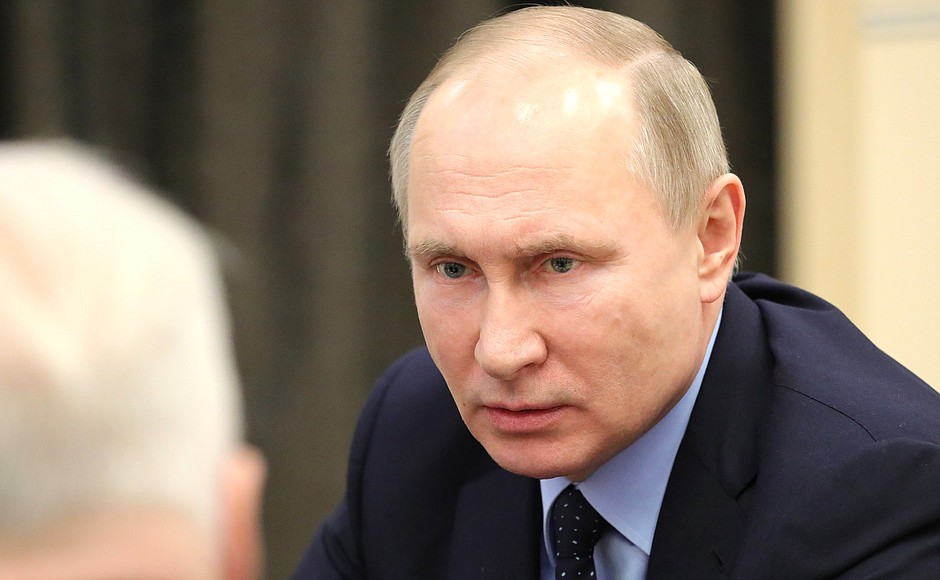 Vladimir Putin: What about Vanya whom we visited? Veronika Skvortsova: There are 11 adult patients in the hospital. This one, 18-year-old Vanya Zavarzin, is in the most serious condition. He is much better now and might be transferred to a regular ward soon. The other patients are also getting better. We are working all together toward their recovery. We are also providing psychological consultations to the patients, and will continue doing so as long as necessary. We are also providing psychological and psychiatric assistance to the victims’ families and to anyone who needs it. We have set up two crisis centres for round-the-clock psychological and psychiatric assistance and other medical assistance. We have settled the issue with the region about opening a psychosomatic department, because we expect that stress and psychological responses may cause functional physical change within a month. We have determined the leading institution, the Serbsky Centre, which will permanently monitor the state of all those in need in Kemerovo Region and provide the required assistance for as long as necessary. The third issue. Forensic experts are at work. Today they have fully identified 23 victims, 22 of which were buried by their families in Kemerovo today. Another three victims are being moved, two to Tomsk and one to Krasnoyarsk. The identification of one victim with more serious injuries caused by the fire is pending. The rest of the bodies cannot be visually identified, so we are facing very serious molecular and genetic testing. We have decided that the Serbsky State Scientific Centre for Social and Forensic Psychiatry will be responsible for this. Transport to Moscow is planned for tomorrow. The work will continue around the clock. Evidently, it will take at least 21 days. We have reduced this from 35 days but it cannot be done faster because it is very serious and exacting work. We will do our best to finish it as fast as possible. Vladimir Putin: Right. Do not delay it, do it as fast as possible indeed. Veronika Skvortsova: Yes. 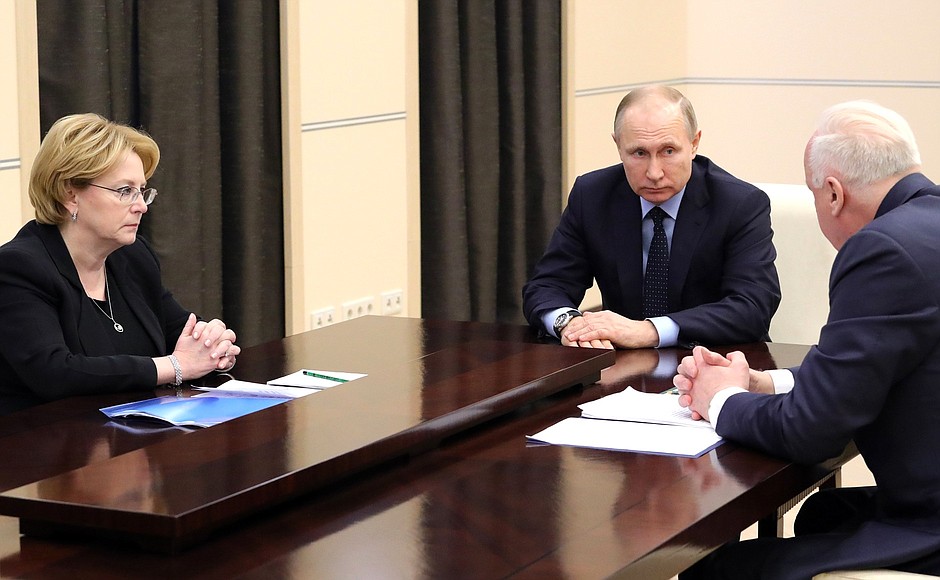 Vladimir Putin: We must answer these questions. The fire alarm system had been down for a week. Why did nobody fix it for a week? Why did they not turn it on manually, though the hand drive was in order? Why were the doors locked? Why were combustible materials used during assembly operations? There are many questions. It is easiest to shift the responsibility to criminals, though this line of enquiry should also be followed. Alexander Bastrykin: We will follow it by all means. Mr President, we are looking for witnesses, who mentioned cases of lights failing or the smell of burning wires. People had felt something was wrong. There were some problems before. However, evidently both visitors and the proprietors got used to them and paid little attention. We will certainly deal with it as a system, why all this became possible, with the participation of the monitoring organisations that I mentioned. Vladimir Putin: Report to me regularly on the investigation progress. Alexander Bastrykin: Yes, sir. The source of information - http://en.kremlin.ru/events/president/news/57144
__________________
Where should they dig the Very Deep Pit? Piglet said that the best place would be somewhere where a Heffalump was, just before he fell into it, only about a foot farther on. (c) Alan Alexander Miln |
|
|
#804 |
|
Senior Member
|
Greetings to the international conference JINR: 25 Years of a New Era
Vladimir Putin sent his greetings to the participants and guests of the high-level international conference JINR: 25 Years of a New Era. March 26, 2018 - 11:30 The message reads, in part: “Twenty-five years ago, a group of states adopted a decision on cooperation at the Joint Institute for Nuclear Research (JINR). This event opened a new page in the history of JINR and provided a powerful impetus to the development of mutually beneficial international research and technical cooperation. The experience you have accumulated and your impressive results are proof of the efficiency of the path chosen as well as the importance of rallying national resources for attaining the noble international goals. Thanks to the contribution of all the JINR member states, the institute now holds a leading place in a number of key areas of modern physics, conducting unique theoretical and experimental research and creating innovative nuclear and information technology. It is gratifying that this potential allows you to initiate promising large-scale projects, including megascience projects aimed at expanding the frontiers of knowledge and at considerably improving the quality of people’s life. I am confident that the high level of cooperation and the fruitful exchange of ideas together with achievements at the institute will help you to continue to strive towards success at the forefront of science.” The Joint Institute for Nuclear Research (JINR) is an international intergovernmental research organisation that was created on the basis of an agreement signed between 11 founding countries on March 26, 1956 and registered at the UN on February 1, 1957. Located in Dubna near Moscow, Russia, it currently comprises 18 member states. The source of information - http://en.kremlin.ru/events/president/news/57133 Russian-Qatari talks Vladimir Putin held talks at the Kremlin with Sheikh Tamim bin Hamad Al Thani, Emir of the State of Qatar, who arrived in Russia on a working visit. March 26, 2018 - 20:10 - The Kremlin, Moscow 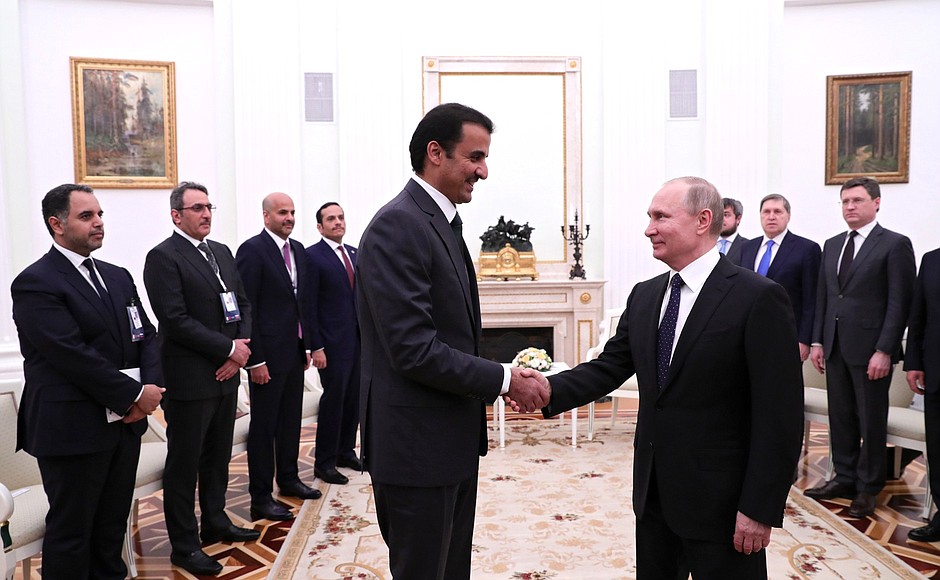 Before the meeting, the Emir of Qatar expressed his condolences to the Russian President in connection with the fire in Kemerovo which led to massive casualties. The prospects for building up bilateral cooperation in various areas and current issues on the international agenda, in particular, the situation in Syria, were discussed during the Russian-Qatari talks. Following the visit of the Emir of Qatar to Russia, an agreement on cooperation in science and education between Rosneft and the Qatar Foundation for Education, Science and Community Development was signed in the presence of the two countries’ leaders. 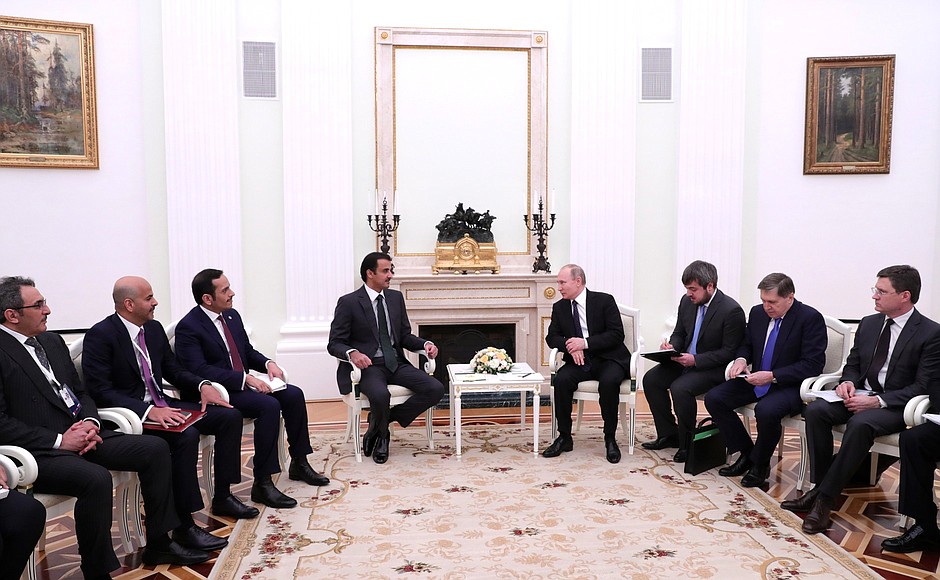 President of Russia Vladimir Putin: Your Highness, colleagues, Let me cordially welcome you to Moscow. Last time we met was almost two years ago, but the relations between our countries are constantly developing, and we maintain contact. This year marks the 30th anniversary of diplomatic relations between our countries. Over the past year, trade has grown, however, in absolute terms, it can do much better, but the trend is good. Investment cooperation is developing as well. Your Highness, we are very pleased to have you. Welcome! 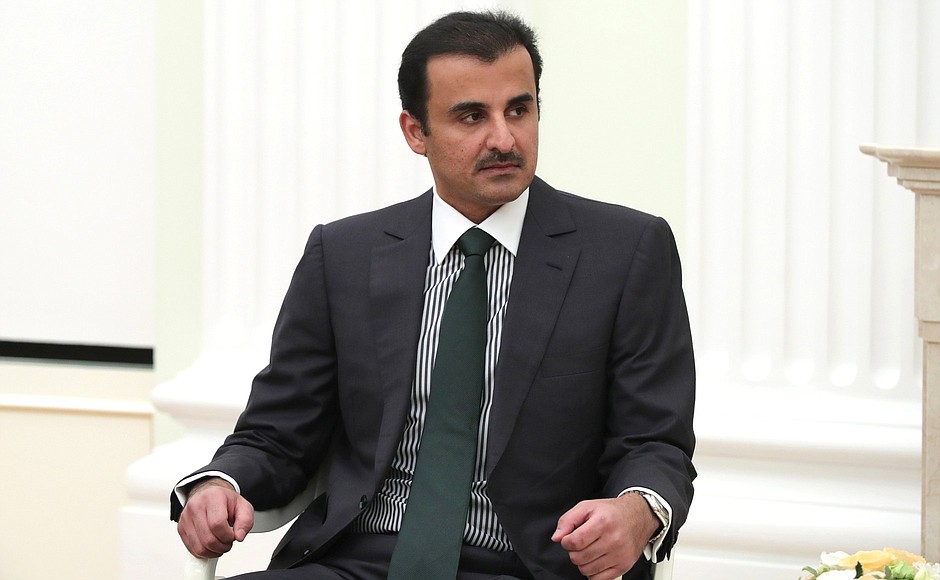 Emir of Qatar Sheikh Tamim bin Hamad Al Thani (retranslated): Thank you very much, Mr President, I am very pleased to be in Moscow, in accordance with the invitation. Indeed, as you said, last time we met was two years ago, but the relations between our countries have noticeably strengthened over these two years. 2018 is important for our two countries in terms of cultural cooperation. Today I visited one of your museums. I believe it is very important that our cultural cooperation is being developed. 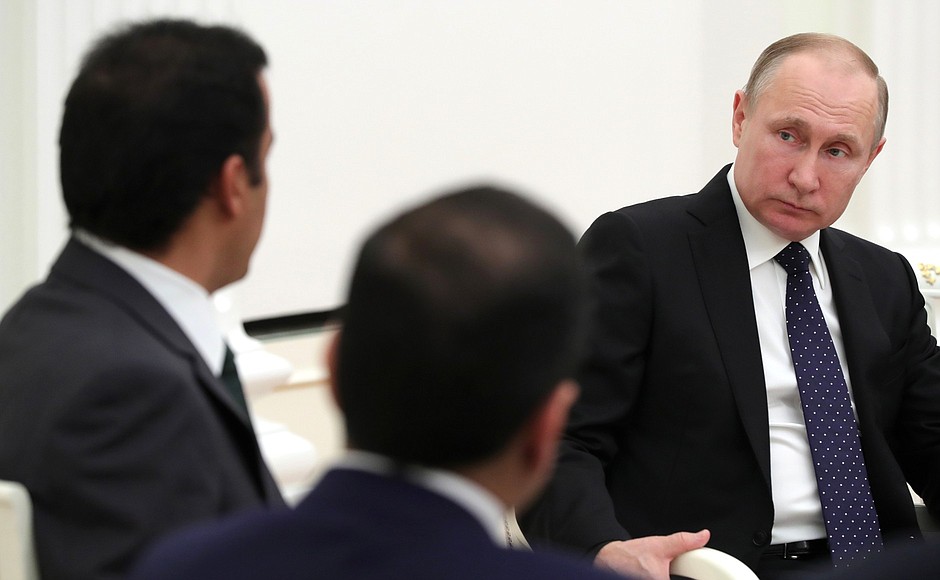 Indeed, I agree with you regarding the ambitions of our two countries. Even though we are tied by strong relations and mutual trust, we must move forward with regard to strengthening our relations across all areas – trade and other areas – so they are in line with our ambitions. We count on our Russian friends with whom we cooperate, knowing that Russia plays a significant role regarding the things that matter for the Arab world. 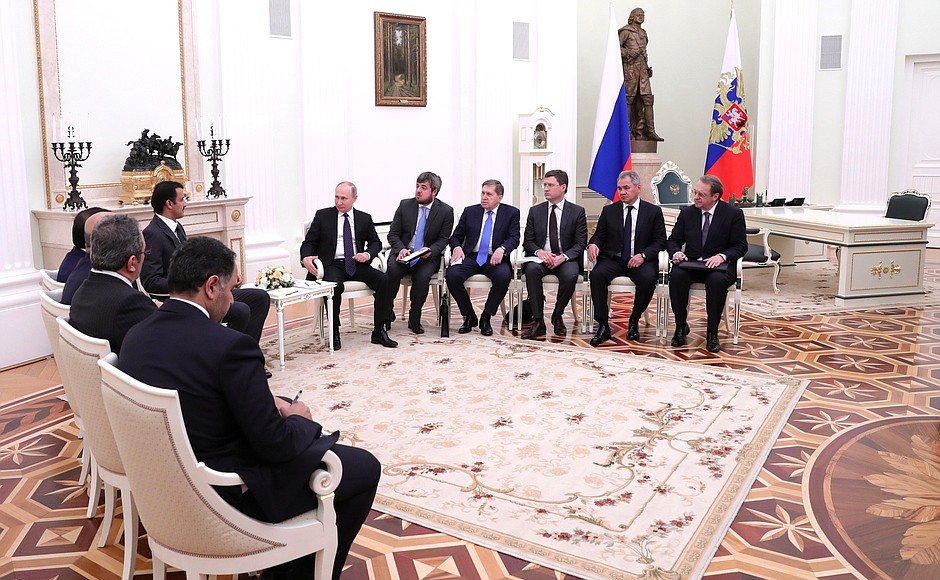 You have historical relations with the countries of the Arab world. I hereby note the role that you play in helping to resolve the problems of some of our countries. Today, I hope to discuss a number of issues concerning this subject with your Excellency. The source of information - http://en.kremlin.ru/events/president/news/57134 Telephone conversation with President of Brazil Michel Temer Vladimir Putin had a telephone conversation with President of the Federative Republic of Brazil Michel Temer at the latter’s initiative. March 26, 2018 - 21:00 Michel Temer expressed his condolences over the tragedy in the Kemerovo Region and passed on words of support to the victims’ families and friends. The two presidents reaffirmed their mutual interest in developing the range of bilateral ties and implementing the agreements reached during Mr Temer’s visit to Russia on June 20–22, 2017. They discussed in detail issues of Russian-Brazilian economic cooperation, including trade in agricultural products. Mr Temer congratulated Mr Putin on his victory in the presidential election. It was agreed to continue contact at different levels. The source of information - http://en.kremlin.ru/events/president/news/57135 Telephone conversation with President of Turkey Recep Tayyip Erdogan Vladimir Putin had a telephone conversation with President of the Republic of Turkey Recep Tayyip Erdogan. March 27, 2018 - 18:00 Recep Tayyip Erdogan expressed his deep condolences over the tragedy in Kemerovo, passed his words of support to the families and friends of the victims. Both parties stressed the importance of developing Russian-Turkish relations. The two presidents discussed preparations for the regular meeting of the High-Level Russian-Turkish Cooperation Council and the second summit of the Astana process guarantor states: Russia, Turkey and Iran. Both events will take place in early April. The source of information - http://en.kremlin.ru/events/president/news/57141 Telephone conversation with President of Vietnam Tran Dai Quang Vladimir Putin had a telephone conversation with President of the Socialist Republic of Vietnam Tran Dai Quang at the initiative of the Vietnamese side. March 28, 2018 - 18:00 Tran Dai Quang expressed condolences over the tragedy in Kemerovo and asked that his words of support be conveyed to the families and friends of the dead and injured. Mutual interest in the further consolidation of comprehensive strategic cooperation between Russia and Vietnam and the promotion of bilateral cooperation in various areas were reaffirmed. It was emphasised that this will be facilitated by the active implementation of the agreements reached at the top-level talks in June and November of 2017. Issues of successfully developing cooperation between the Eurasian Economic Community and Vietnam were discussed. Tran Dai Quang also congratulated Vladimir Putin on his victory in the presidential election. The schedule of meetings at different levels was also discussed. The source of information - http://en.kremlin.ru/events/president/news/57145 Telephone conversation with Serbian President Aleksandar Vucic On Serbia’s initiative, Vladimir Putin had a telephone conversation with President of the Republic of Serbia Aleksandar Vucic. March 28, 2018 - 18:35 Aleksandar Vucic expressed his sincere condolences over the tragedy in Kemerovo. The officials discussed matters related to the Kosovo settlement in the context of the provocative action against Director of the Serbian Government’s Office for Kosovo and Metohija, Marko Juric, taken by the Pristina authorities in Mitrovica, Kosovo, on 26 March. The Russian President expressed strong condemnation of the actions that violate UN Security Council Resolution 1244. He stressed that unfailing implementation of this resolution should underlie any Kosovo settlement. The officials also addressed current issues of the Russian-Serbian strategic partnership. Aleksandar Vucic congratulated Vladimir Putin on winning the presidential election. The source of information - http://en.kremlin.ru/events/president/news/57146 Telephone conversation with President of Belarus Alexander Lukashenko A telephone conversation was held between Vladimir Putin and President of Belarus Alexander Lukashenko, at the initiative of the Belarusian side. March 28, 2018 - 20:50 Alexander Lukashenko expressed his deepest condolences in connection with the tragic events in Kemerovo – the Belarusian people mourn together with the fraternal people of Russia. As a sign of solidarity, national flags have been lowered and recreational activities have been canceled in Belarus. Vladimir Putin thanked Mr Lukashenko for this sincere gesture of support. The source of information - http://en.kremlin.ru/events/president/news/57147 Statement by President of Russia Vladimir Putin, Federal Chancellor of Germany Angela Merkel, President of France Emmanuel Macron and President of Ukraine Petro Poroshenko March 29, 2018 - 14:00 The leaders of the Normandy format countries reaffirm their commitment to implementing all aspects of the Minsk Agreements, including security, political, humanitarian and economic issues. They will discuss possible ways of accelerating the agreements in the upcoming months. Hence, they welcome the agreement on resuming the ceasefire on the occasion of Easter as agreed by the trilateral Contact Group on March 23. The agreement will take effect on March 30. The leaders highlighted the importance of strict adherence to the ceasefire, efficient monitoring and review of compliance with the agreement by the OSCE Special Monitoring Mission. In view of the successful exchange of over 300 detainees on December 27, 2017, the leaders called for more active efforts with respect to the exchange of the remaining detainees on an all-for-all basis. The source of information - http://en.kremlin.ru/events/president/news/57149 Congratulations to President of Egypt Abdel Fattah el-Sisi on winning the presidential election Vladimir Putin sent a message of congratulations to President of the Arab Republic of Egypt Abdel Fattah el-Sisi on his re-election. March 30, 2018 - 13:15 The message reads, in part: “The election outcome has clearly confirmed the high regard the Egyptian public has for you, and the broad support for your course for solving current socioeconomic issues and strengthening stability in the country. Russia values its strategic partnership with Egypt. I hope that together, we will ensure further development of our mutually beneficial bilateral cooperation in all areas, as well as coordination of our efforts in regional and international affairs and countering global security threats and challenges. This, without doubt, meets the interests of our friendly nations.” The source of information - http://en.kremlin.ru/events/president/news/57154
__________________
Where should they dig the Very Deep Pit? Piglet said that the best place would be somewhere where a Heffalump was, just before he fell into it, only about a foot farther on. (c) Alan Alexander Miln |
|
|
#805 |
|
Senior Member
|
Meeting on economic matters
Vladimir Putin chaired a meeting on economic matters to discuss was of achieving the goals set in the Presidential Address to the Federal Assembly. Before the gathering, the participants honoured the memory of the Kemerovo fire victims in a minute of silence. March 28, 2018 - 15:00 - Novo-Ogaryovo, Moscow Region 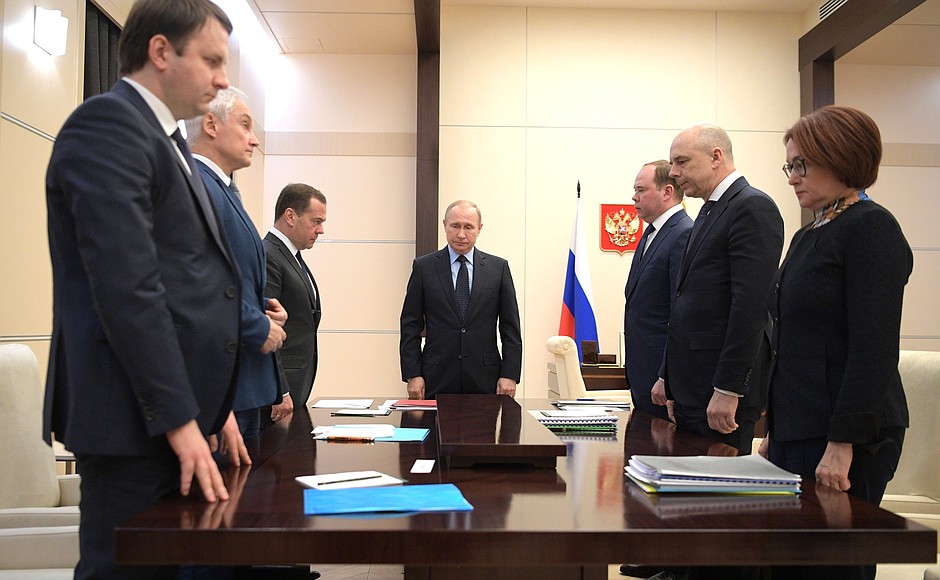 The meeting was attended by Prime Minister Dmitry Medvedev, Chief of Staff of the Presidential Executive Office Anton Vaino, Aide to the President Andrei Belousov, Finance Minister Anton Siluanov, Economic Development Minister Maxim Oreshkin and Central Bank Governor Elvira Nabiullina. 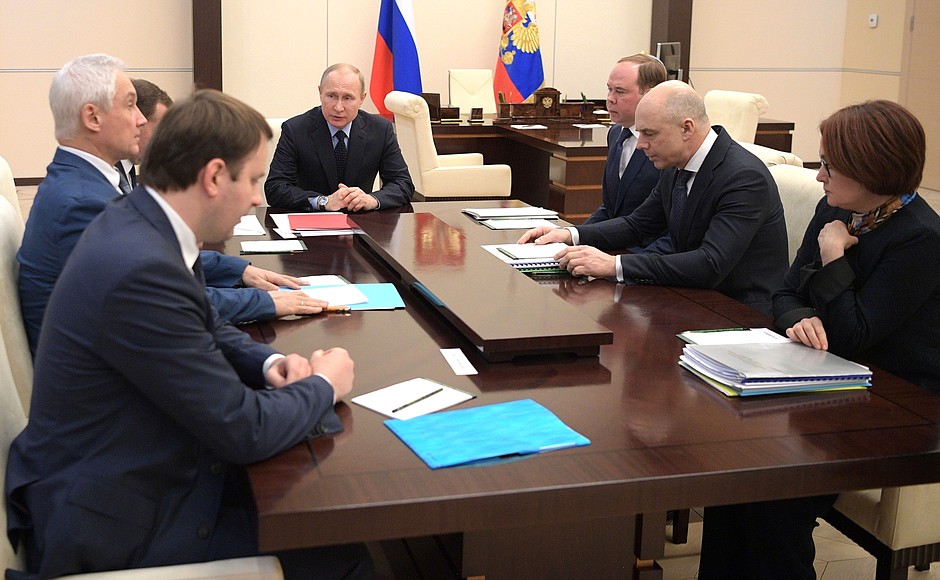 President of Russia Vladimir Putin: Colleagues, You know about the huge tragedy that happened in Kemerovo on March 25. Dozens of people, including very many children have died in a fire. I suggest that we honour their memory with a moment of silence. Minute of silence. Mr Medvedev, we have discussed the matter, and I also talked to our colleagues in Kemerovo about the need to check the activities of such shopping malls. It must not be a sporadic effort. We clearly must work regularly to ensure public safety. We must also look at the legislation and its implementation. Of course, we will not change the rules that have liberalised the economy, but the existing laws offer us an opportunity to do our best to ensure public safety. We must analyse the situation and, if we see that something is missing, we will hold consultations with our business associations and take decisions following an analysis of the available material. 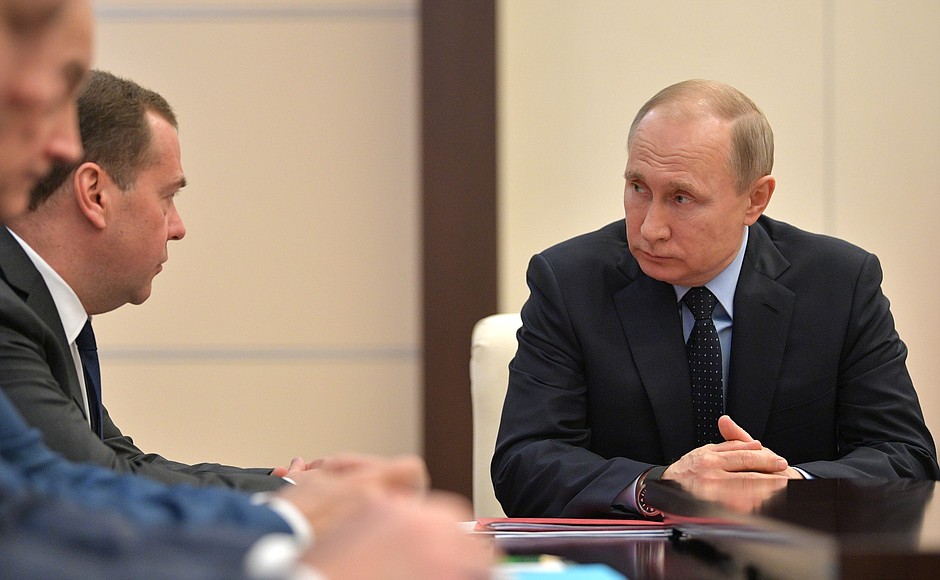 Prime Minister Dmitry Medvedev: Mr President, we will do this by all means. We will analyse the legislation and submit our proposals. Vladimir Putin: If necessary, we must also offer assistance to the families of those who have died and were injured in the fire. The territorial authorities will do whatever is necessary, but, again, if federal assistance is required, please take this into account and do everything the federal Government can do. 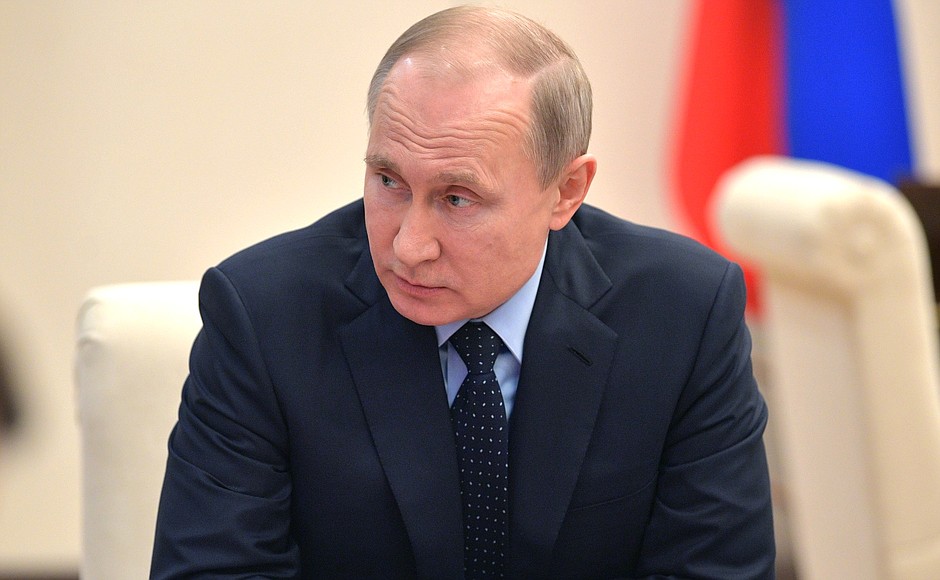 Dmitry Medvedev: A number of decisions have been already taken. We will see what else we can do. Vladimir Putin: I have invited you here today to discuss economic matters, our mid-term goals, as well as the practical aspects of the implementation of some provisions of the Presidential Address to the Federal Assembly. We must get ready to formalise the goals set out in the Presidential Address. I would like you to speak on the practical measures you propose for implementing the tasks set out in the Address. The source of information - http://en.kremlin.ru/events/president/news/57143 Meeting with Energy Minister Alexander Novak Alexander Novak reported to the President on the Energy Ministry’s performance in 2017. March 29, 2018 - 14:10 - Kremlin, Moscow 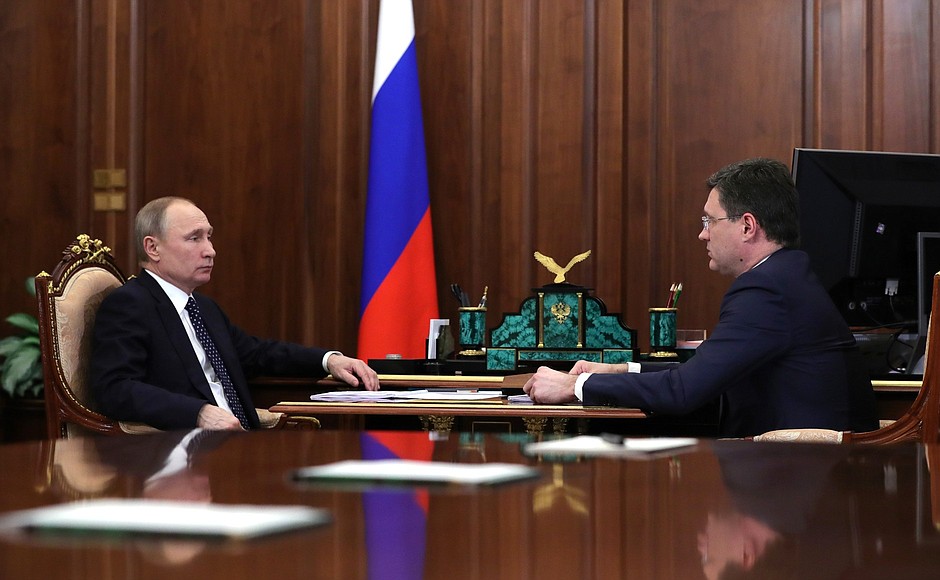 President of Russia Vladimir Putin: Let us discuss the results of the Ministry’s work. Energy Minister Alexander Novak: If I may, I will report on the 2017 performance, Mr President. First, I would like to say that last year all the fuel and energy sectors showed stable performance and reached even better results than in previous years in technical, economic, industrial and quality indicators, especially in the energy security of our domestic market as well as in reserves of energy resources such as electricity, gas, petroleum products and oil for processing. Despite tough economic challenges, illegal sanctions and difficulties with financing, we saw investment growth in 2017 as well. The total volume of investment into all sections of the fuel and energy complex was 3.5 trillion rubles, which is almost 10 percent higher than in the previous years. Vladimir Putin: Is that per year? 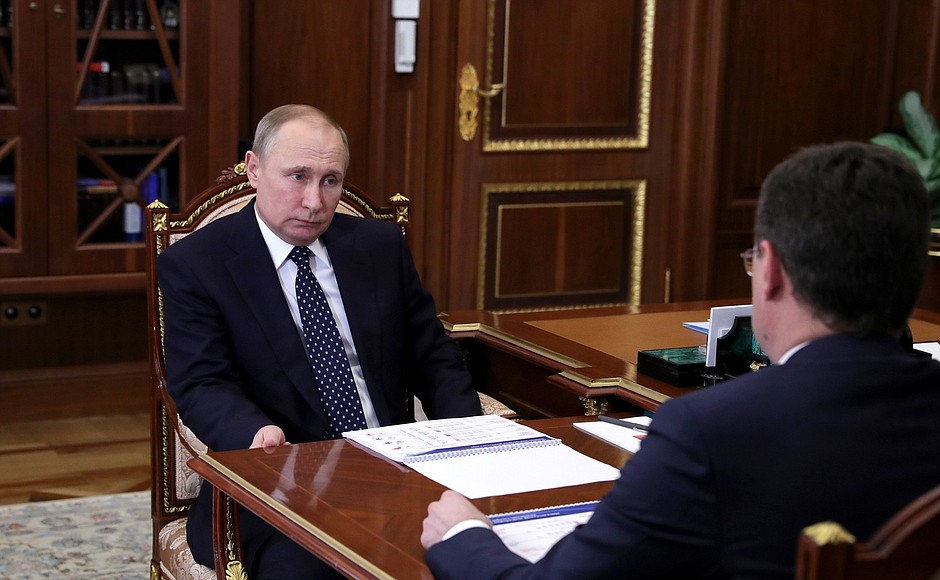 Alexander Novak: Yes, per year. Fuel and energy sectors maintain leading positions on global markets. The Russian Federation is the leader in oil production and gas export. We are in second place on the world’s coal production and in third place in terms of coal exports. This means we really play an important role in providing energy resources and ensuring energy security as well as the supply and demand balance on all markets. As for the production indicators, first of all I would like to note the high level of gas production last year: we produced 691 billion cubic metres of gas. This is a record, the best figure over the past 17 years. A growth of almost 50 billion cubic metres of gas. We also have record indicators in exports: we exported 224 billion cubic metres to various destinations, including LNG and pipeline gas to Europe as well as the new routes that are under construction now. As for the oil industry, oil production reached 546.8 million tonnes, or only 0.1 percent less than in 2016. The decline is due above all to compliance with the agreement between OPEC and non-OPEC countries to ensure a balanced oil market and stabilise global markets. Mr President, I would like to point out that this decision, which you also supported, has played a positive role not only in balancing the market but also in ensuring additional foreign currency revenues for Russia. Based on the 2017 results, and due to oil prices that increased by nearly $11 compared to 2016 and reached $54.70 per barrel on average, the Russian budget received an additional 1.2 trillion rubles, and our companies earned some 500 billion rubles more. Total oil and gas export revenues increased by some 31 billion dollars thanks to the higher prices. This also had a positive effect on our investment programmes, our companies’ stabilisation and on the budget. Speaking about the coal sector, the overall output reached 409 million tonnes. It is a record high figure for Russia. This was our strategic target for 2020. It is important that we not only satisfy domestic requirements and ensure domestic consumption, but we also have increased exports. Although global coal consumption is not growing, and coal consumption is relatively low now, Russian coal is a competitive product. The new routes we have developed, primarily in the Asia Pacific, are boosting our competitiveness and deliveries to South Korea. We have increased deliveries to Japan and have coordinated, at long last, deliveries to China. The problem had to do with China’s technological analysis of the quality of our coal. This problem has been resolved, and we deliver our coal to China now. I would like to say that, as a result of the investments I mentioned, 55 oil sector deposits came on stream last year. Key deposits include the Erginsky cluster in the Khanty-Mansi Autonomous Area with 258 million tonnes, a new deposit in Krasnoyarsk Territory – Lodochnoye of the Vankorsky cluster and Tazovskoye field in the Yamal-Nenets Autonomous Area. This shows that the sector continues to invest and to develop. Speaking of the gas sector, you have launched the first stage of the Yamal LNG Plant. This is a real milestone in the development of Russia’s gas sector. Built by a consortium involving Chinese and French partners, the first stage with a capacity of 5.5 million tonnes heralds the initial development of a cluster on the Gydan Peninsula. As per your instructions, we are now drafting a programme to expand liquefied natural gas production that will allow us to produce and liquefy up to 100 billion cubic metres of gas in this area. Today, Russia controls about five percent of global LNG markets, and we are planning to boost this share to 15–20 percent. Indeed, this is the most rapidly developing market niche that will eventually offer environmentally friendly fuel. Demand for this fuel will grow more quickly. I would also like to say that electric power stations with a rated capacity of 3.9 gigawatt were commissioned last year. The Yakut electric power station also started operating. We have continued our programme to build renewable energy sources and to finance them. While in the three years preceding 2017 we commissioned only 130 megawatt of renewable energy sources, last year alone, we commissioned 135 megawatt. It is important that the first windmill has been installed in Ulyanovsk Region. The 35-megawatt facility went on stream this past December. This, too, heralds the beginning of an ambitious windmill construction programme. Such major investors as Rosatom, Fortum, Enel have entered this sector, and foreign investors are showing interest. The main thing is that the renewable energy construction programme is designed primarily to create competencies in the Russian Federation to produce the necessary equipment. Together with the Industry and Trade Ministry we have determined, the Government has determined, the localisation percentage, and we must reach at least 65 percent of localisation. Today an entirely new Russian plant has opened in Novocheboksarsk. It will produce solar panels using Russian technology invented by members of the Russian Academy of Sciences. This technology is in the world’s top three technologies in terms of efficiency (heterostructure technology for renewable energy sources). The first stage was introduced in Altai with 100 percent localisation and domestic, Russian-made components. Mr President, I would also like to say that the transport infrastructure development programme for the Russian fuel and energy complex was also successful last year. We introduced 2,000 kilometres of pipelines and 1,225 trunk pipelines; the overall length of key ones, such as Bovanenkovo – Ukhta, is 1,260 kilometres. We continued to implement our large infrastructure projects: Power of Siberia and Turkish Stream. These are two key projects designed to diversify the delivery of our energy products. In the future, this is also North Stream 2, which will be implemented jointly with European companies. In the oil sector, an important development was the launch of two pipelines, Kuyumba – Taishet and Zapolyarye – Purpe, which connected oil fields in the north of Krasnoyarsk Territory and Yamal-Nenets Autonomous Area with our unified oil transportation system. This allowed us to join these fields and deliver their energy resources both westwards and eastwards. We also completed the expansion of the Skovorodino – Mohe pipeline, which we built in accordance with an agreement with our Chinese partners. The total capacity of this pipeline is already 30 million tonnes of oil per year. Of course, production performance is not the only indicator I want to speak about. I believe that quality and efficiency are vital for the further development of the fuel and energy system. As for individual sectors, I would like to say that we continued to extend the gas supply network and the related infrastructure. The share of consumers connected to the gas supply system has reached 68.3 percent. As for the oil sector, we continued to modernise oil refineries. We have launched eight plants and the refinery yield has increased to 81.3 percent. Vladimir Putin: Some companies still need to improve their performance. Take this into account. 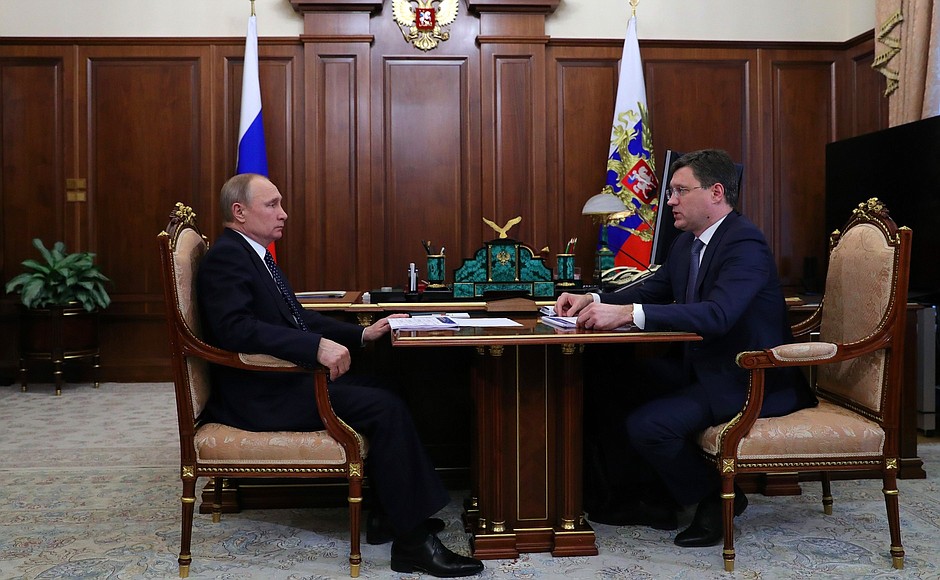 Alexander Novak: Yes, Mr President. In fact, the situation in oil refining is not simple, because the falling prices in the framework of the tax manoeuvre, which was approved in 2014, has weakened the sector’s investment appeal. In the past, we attracted some 250 billion rubles of investment into oil refining a year, whereas the current figure is 150 billion. Acting under your instructions, we are now preparing support measures at the request of companies, which should encourage the refining sector. We still need to modernise 49 plants; overall, we have modernised 78 plants and can report good performance results for 2017. It was the first year when we fully satisfied domestic requirements for Euro 5 petrol and diesel fuel. Today we supply the domestic market with low-impact petrochemicals for consumption by the public and companies. I would like to point out that systemic work is underway to enhance the efficiency of the electricity sector. It involves the consolidation of many territorial grid operators. The efficiency has improved because electricity losses have decreased by some 2 percent to 10 percent over the past five years. We continue working to reduce the number of accidents during the autumn and winter seasons. The figures are good in this sector as well: in 2017 we reduced the accident rate in the electricity sector by 3.5 percent and in the grid sector by nearly 5.3 percent. This is very important. I think a very important indicator is access to the infrastructure. This primarily applies to the population, small- and medium-sized businesses, and particularly access for concerns consumers of up to 15 kW and up to 150 kW. Much has been done in the past few years. Today Russia is 10th in the world in the simplified procedure of linking up to the electricity infrastructure. Vladimir Putin: We spoke about the suppliers and the cash flows that are involved here. We also spoke about the need to adopt decisions that would streamline this process. Alexander Novak: Mr President, your instructions on more transparent cash flows have also been fulfilled. A federal law adopted in 2015 (Federal Law 307) toughened requirements for sales companies and set guarantee requirements for the consumers of energy resources. On your instructions, 200 cash settlement centres have already been put into service and are operating with bank support. Vladimir Putin: How does this function in practice? Is it working? Alexander Novak: Of course, Mr President. The main indicators that we can operate with is the collection of payments. Today it amounts to 99.2 percent. In other words, mutual sttlements are being made and the funds are controlled not only by the Cash Settlement Centre, also through the work of guaranteeing suppliers with the Market Council. All financial indicators are tracked, there is complete monitoring in this respect. In addition to this, on your instructions a law on licensing the activities of power supply companies was adopted at the end of last year. The regulations are now being developed and during the year, these companies will be licensed. All of them will go through this procedure. Vladimir Putin: We also spoke about new technology in the electric power industry. 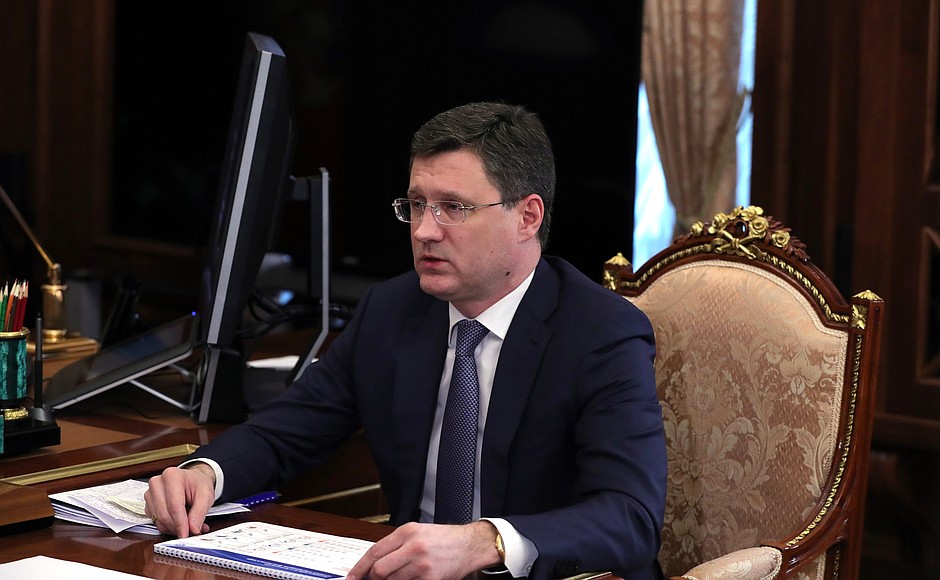 Alexander Novak: Mr President, in your Address you expressed obviously important ideas on introducing new technology in the electric power industry and other branches of the fuel and energy sector. We are dealing with this and have set ourselves the task of introducing cutting-edge technology in our areas. To achieve this, we can use such instruments as the Modernisation Council. Twenty national projects have been adopted as part of the national technology initiative. I will tell you about them. They concern all sectors. These are key projects. Digital and AI technologies are introduced. Today, we have compiled a programme that will allow our companies to streamline this work, because each of them is trying to do it independently. But we have already started out on this path. Thus, digital technologies are being applied in field development. For example, GazpromNeft has applied this technology at a field in the Khanty-Mansi Autonomous Area, fully digitalising it. It is now referred to as a ‘smart field’, with AI also taking decisions on the best oil production methods, the further development of the field, as well as on ways to increase the recovery ratio. Digital technology is being installed at oil refineries, as well as in the petrochemical sector. Sibur has recently made a presentation of such technologies. This is also important for the power sector. I am referring to smart grids and digital substations. The first digital substation has become operational in Krasnoyarsk Territory, in the city of Krasnoyarsk. It made it possible to cut the costs by about 30 percent compared to non-digital substations. This is our future. This sort of technology will be introduced increasingly more often. We must help companies create a common platform, common standards plus a common legal framework. This is what we are doing now together with our companies. In addition to this, we are implementing a large import substitution programme, which includes the use of cutting-edge technology. For example, we have completed a programme, under which a special technology was created for the Bazhenov Formation. It is a group of deposits in West Siberia with total oil productive capacity estimated at some 2.5 billion tonnes, which is a great deal. Just to show you what this means: 12 billion tonnes of oil have been produced in West Siberia since the 1950s. In other words, this can give West Siberia a new lease of life. Gazprom Neft, working together with other companies and research organisations with support from the Energy Ministry and the Industry and Trade Ministry, has created a technology for this. It will be tested at a special range in 2018 together with the other companies that will join this project. We are introducing modern rotary steerable systems for optimising directional drilling while simultaneously acquiring telemetric data. These systems are also based on domestic technology. One of the most important elements are the hydraulic fracturing fleets, which are being used in oil and gas production more and more frequently. Regrettably, this equipment is not produced commercially in Russia. We have only created a pilot plant. We are now working together with our companies and producers to create two more fleets, to be used in experimental mode. Our task is to substitute up to 80 percent of foreign technology by 2020. This can be done, and we have created some of this technology, so now we will introduce it. Vladimir Putin: Good. The source of information - http://en.kremlin.ru/events/president/news/57150 Meeting with permanent members of the Security Council Vladimir Putin held a meeting with permanent members of the Security Council. March 30, 2018 - 15:30 - The Kremlin, Moscow 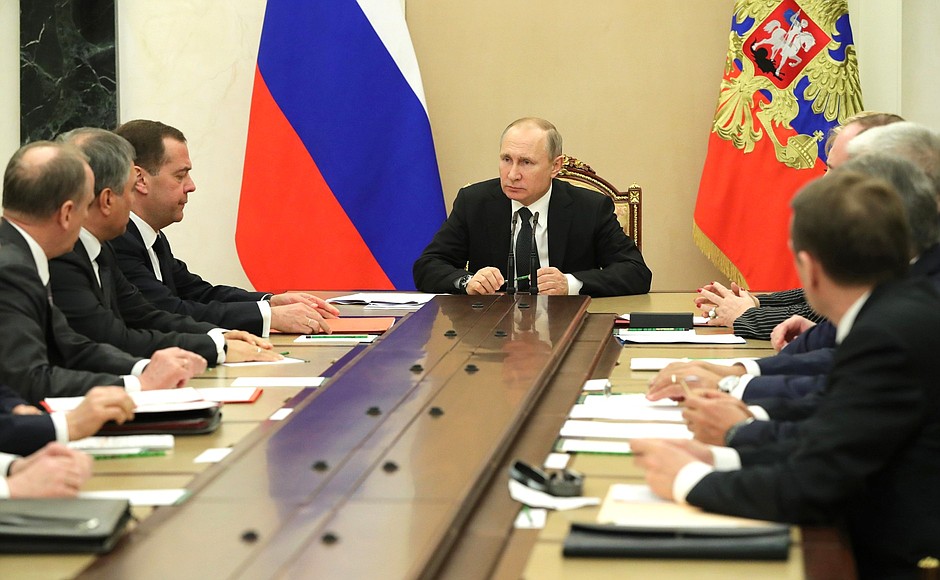 The meeting participants held a detailed exchange of opinions on foreign policy issues, including reciprocal measures against a number of states that expelled Russian diplomats and shut down consulates. 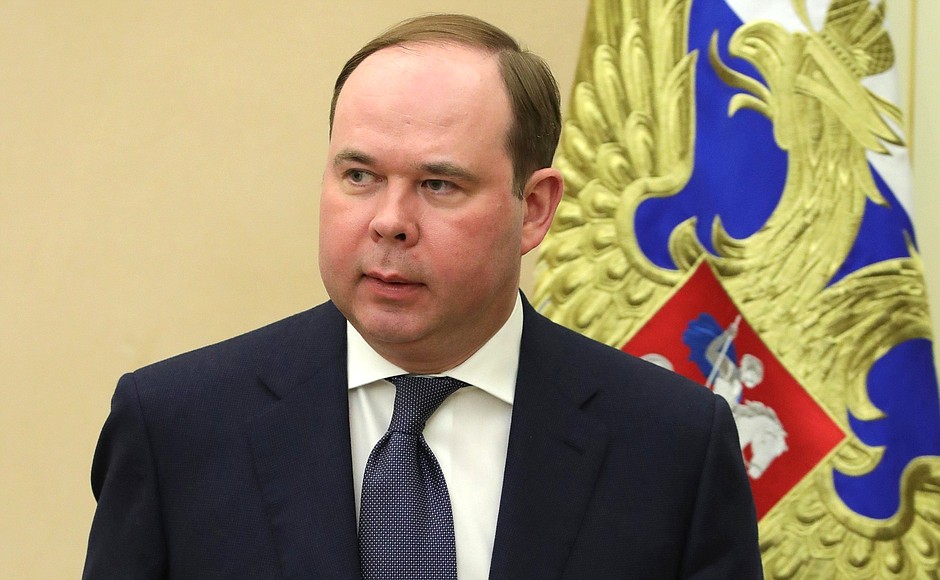 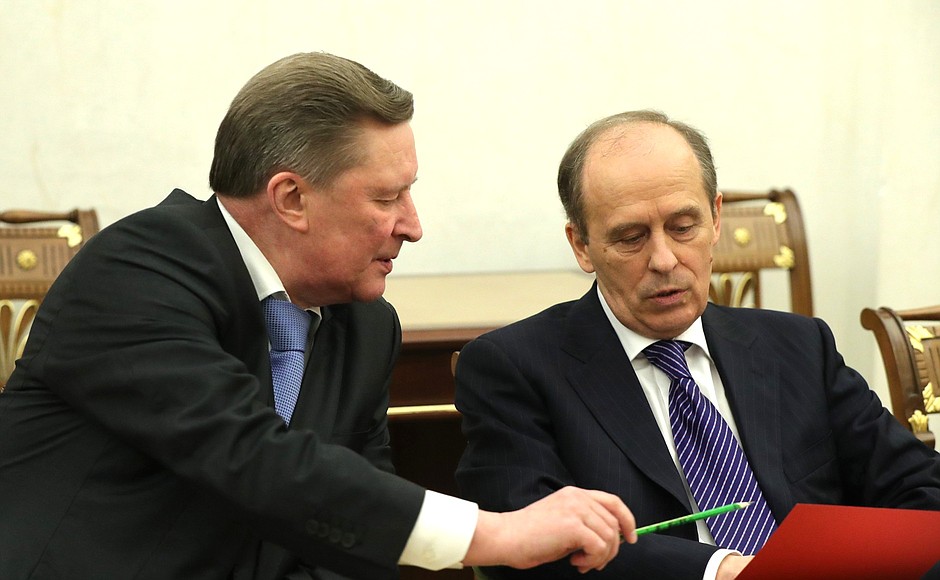 They also discussed urgent issues on the Russian domestic socioeconomic agenda. 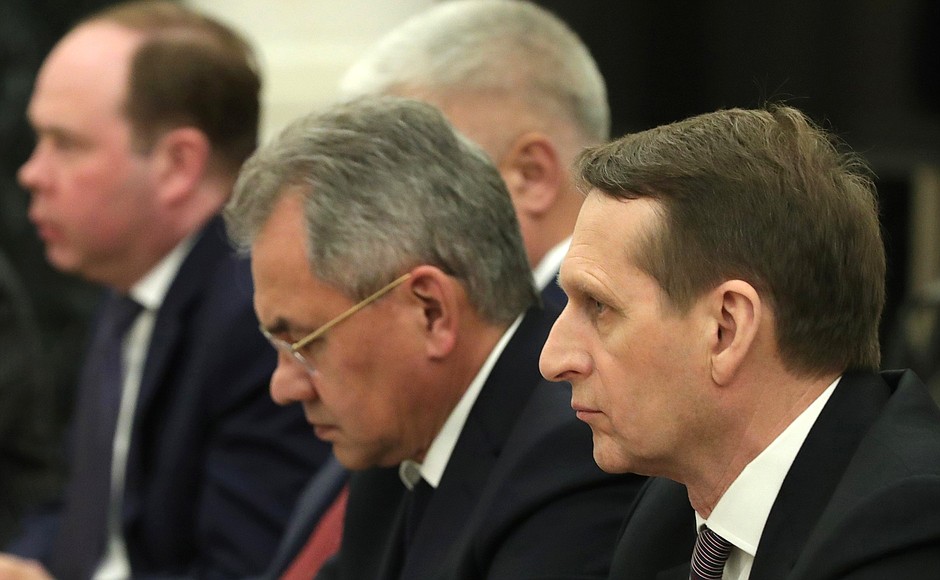 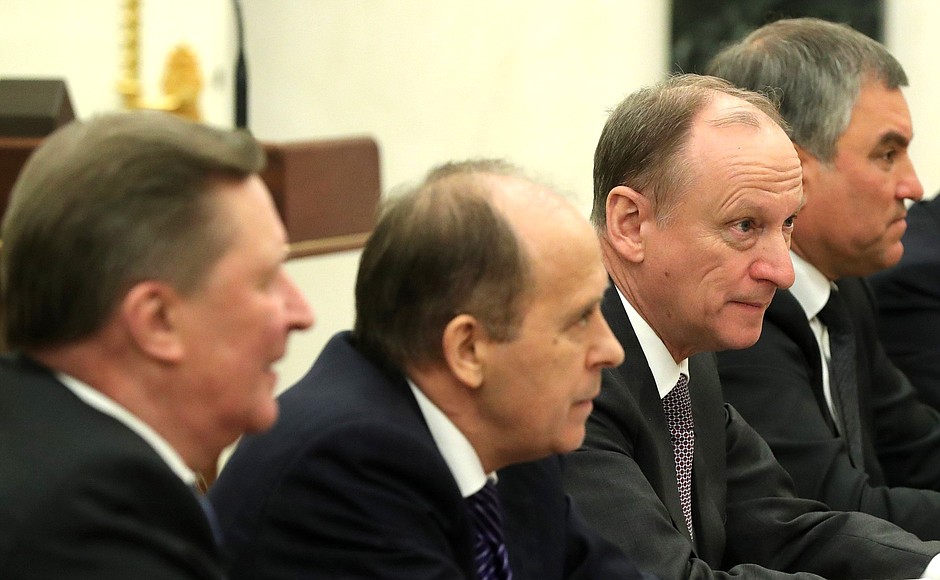 Taking part in the meeting were Prime Minister Dmitry Medvedev, Federation Council Speaker Valentina Matviyenko, State Duma Speaker Vyacheslav Volodin, Chief of Staff of the Presidential Executive Office Anton Vaino, Secretary of the Security Council Nikolai Patrushev, Interior Minister Vladimir Kolokoltsev, Defence Minister Sergei Shoigu, Director of the Federal Security Service Alexander Bortnikov, Director of the Foreign Intelligence Service Sergei Naryshkin, and Special Presidential Representative for Environmental Protection, Ecology and Transport Sergei Ivanov. The source of information - http://en.kremlin.ru/events/president/news/57155 Meeting with Transneft President Nikolai Tokarev Vladimir Putin met with Chairman of the Board of Transneft Nikolai Tokarev. The discussion focused on the company’s achievements in the past 25 years and last year’s performance. March 30, 2018 - 18:30 - Novo-Ogaryovo, Moscow Region 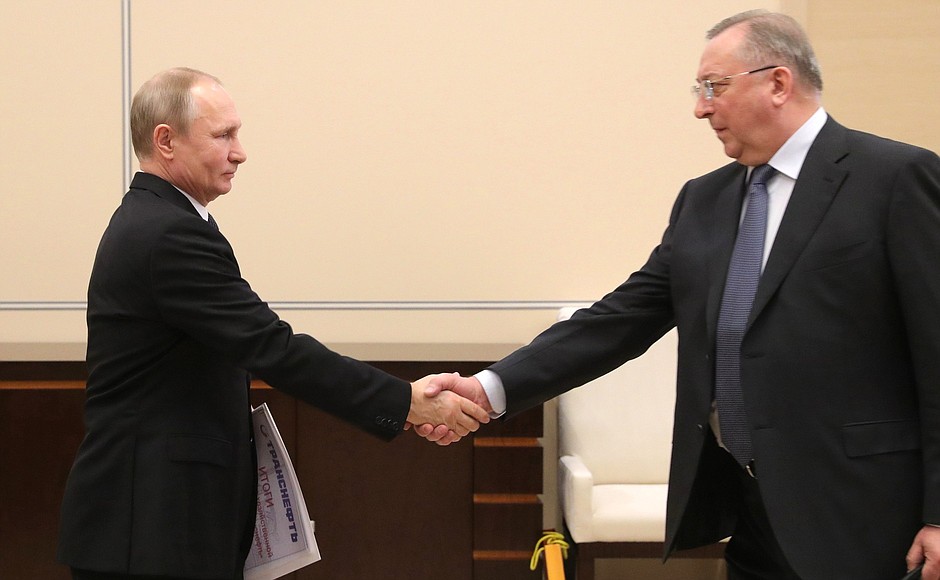 President of Russia Vladimir Putin: Mr Tokarev, this year Transneft marks its 25th anniversary. During these years, it has become the largest international company of its kind. Let us begin with this. Please tell me what the company is like today. Of course, I can tell from the documents, but I would appreciate your comments. And, of course, the results from last year. President of Transneft Nikolai Tokarev: Mr President, first of all, I would like to sincerely congratulate you on your re-election on behalf of the entire 115,000 Transneft staff and wish you success in developing and strengthening Russia. Transneft is always close by; it will always support you in this pursuit. You can count on us. Vladimir Putin: Thank you very much. 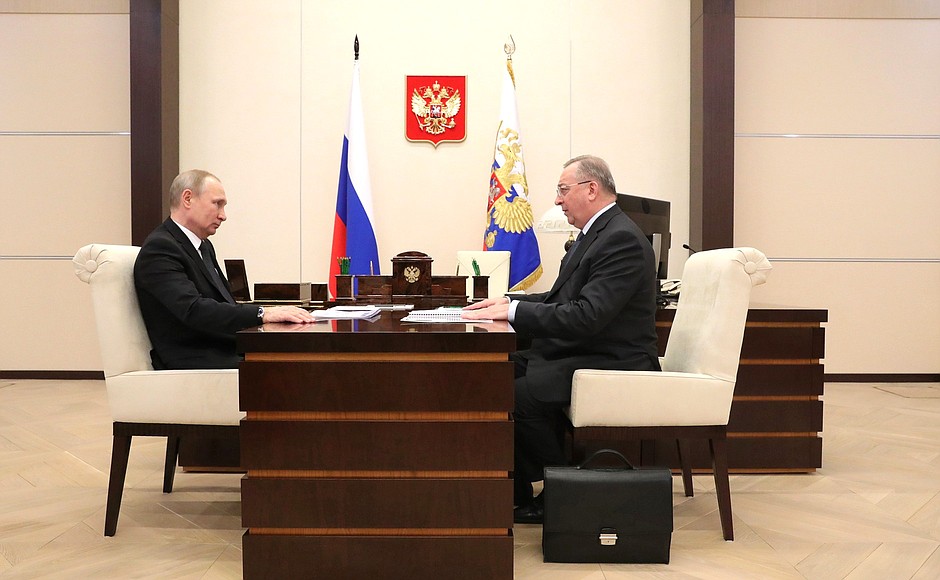 Nikolai Tokarev: Speaking about this small anniversary, of course, we have something to be proud of. We have done a lot in 25 years. Today Transneft is present in 64 Russian regions: these are the regions of our operations, eight federal districts and 115,000 employees. Over the time that passed, especially in the last 10 years, we have built 19,000 kilometres of line pipes, including 9,000 kilometres under new construction projects; and there was the replacement of line pipes, or the technical resource, that has been used – that’s another 10,000 kilometres; and 50 oil pumping stations. Vladimir Putin: Is this over last year? Nikolai Tokarev: This is over the last 10 years. Vladimir Putin: Are there about 500 in total? Nikolai Tokarev: We have 70,000 kilometres of line pipes, including about 20,000 for oil products and 50,000 kilometres of oil main lines. Vladimir Putin: Are these the pumping stations? Nikolai Tokarev: The 50 stations are the new ones. Vladimir Putin: And in total? 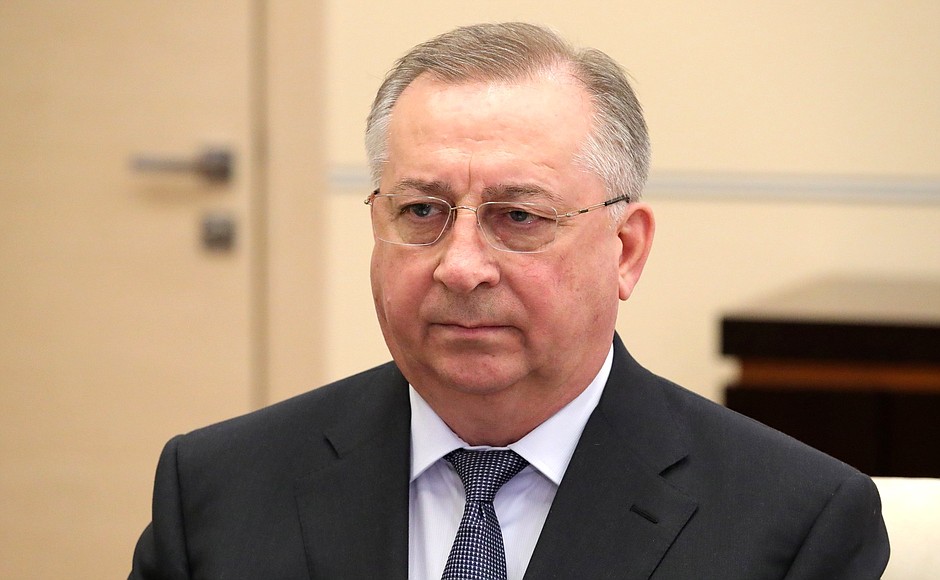 Nikolai Tokarev: There are over 500 oil pumping stations of various capacities in total. During the last 10 years, especially with the implementation of new large projects, we have created about 13,500 jobs, including 9,000 in Eastern Siberia, the Primorye, Khabarovsk and Amur territories. Thanks to your support, the most important projects include the first and second stages of Eastern Siberia–Pacific Ocean pipeline, the Baltic Pipeline System, Skovorodino–Mohe to China, Zapolyarye–Purpe, Purpe–Samotlor and Kuyumba–Taishet. There also are the new pipelines for oil products such as the North project, thanks to which we have increased transit to Primorsk by 15 million tonnes, and the South project, its first and second stages, which joined the southern oil processing plants into a single line starting with Volgograd, and today we transfer oil products that way by pipes. An important breakthrough in import replacement is a special landmark for us. We have not started this work because of the sanctions. The Board, the company’s management, made all the necessary decisions about production localisation in Russia in 2008–2009. This relates both to our plants and joint ventures we can create. We allocated money and set 26 priority areas we worked on. Today we have completed our work on 23 products from this priority list. As of today, Russia produces 93 percent of the equipment we need, which we buy. The programme stipulates that we reach 97 percent in two years, by 2020. And we will really do this, because we have the research and development reports and they give us hope. In conjunction with our Italian partners, we have built interesting enterprises in Chelyabinsk. We now fully meet industry demand for our pumps. You were in Chelyabinsk, and you saw it. A new joint venture with an Italian company will become operational in August. It will make electric motors and drives for these pumps. We are making our own molecule which we use to produce an anti-turbulent additive, which increases pumping capacity. Until now, there has been only one seller and manufacturer on the market, the US Baker Hughes. Now we are making it here in Russia with our Tatar partners. Strong gains have been achieved in energy efficiency as well. We managed to achieve savings of about 16 percent in energy consumption, that is, about 7 billion rubles, using innovative technologies and advanced modes of operation with the new equipment. We are continuing our work in this area. According to the KPMG audit, we achieved the world’s best energy consumption per unit of Transneft transport product. These are the findings of an authoritative audit company. I will not dwell on our social programmes… 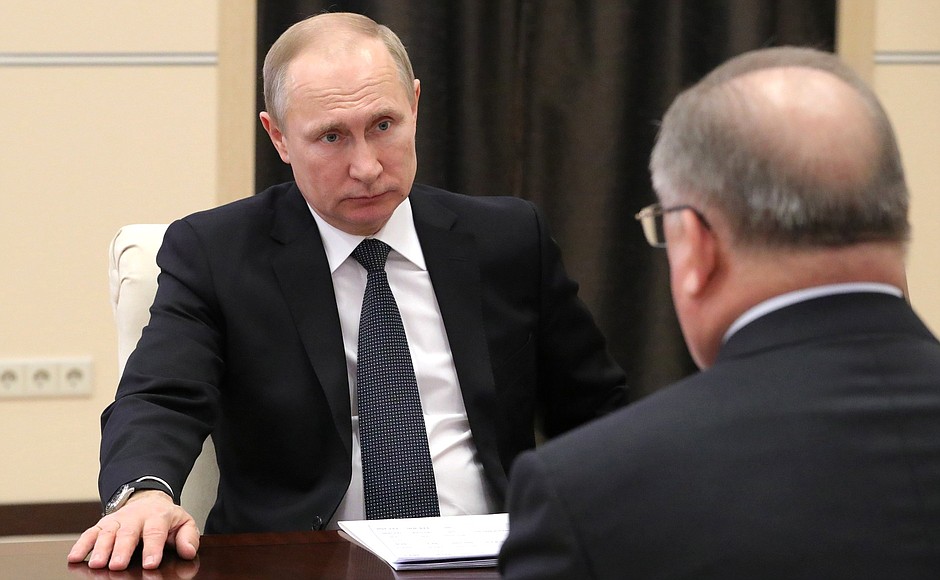 Vladimir Putin: What is the average salary? Nikolai Tokarev: The average salary is 90,000 rubles depending on the region… Vladimir Putin: Do you plan to increase salaries this year? Nikolai Tokarev: We adjusted them for inflation this year and we plan to do so almost annually. Of course, it is a little lower in Central Russia but over 100,000 rubles in the Russian Far East, eastern Siberia, and the north. We have a voluntary medical insurance programme and a solid and competitive non-government pension fund, the third largest after Gazprom and Russian Railways. So, our employees are motivated by the prospect of receiving corporate pensions. Rural schools are part of another major social programme. In the next four years we plan to repair and overhaul rural schools, install modern equipment, interactive technology and classrooms for physics, chemistry and mathematics. This programme covers 240 schools and is already underway. We are also trying to focus on other areas, such as medicine, education, culture and sports, as well as religion, so no one feels left out. Vladimir Putin: Good. The source of information - http://en.kremlin.ru/events/president/news/57156 Passover greetings Vladimir Putin congratulated Russian Jews on Passover. March 31, 2018 - 09:00 The President’s message reads: “Please accept my heartfelt greetings on Passover. This ancient holiday particularly honoured by Jews around the world reminds us of the dramatic milestone in the history of the Jewish people, the liberation from slavery and gaining freedom and dignity. It guides believers towards eternal spiritual and moral values of Judaism and ideals of kindness and justice. It is pleasing that Russia’s Jews deeply revere the testaments of their ancestors, their traditions and laws, raise their young in the spirit of adherence to the traditions of friendship, trust and mutual understanding, which the peoples of our country rightly take pride in. I will also stress the multipronged and needed activities of the Jewish community, their significant contribution to maintaining inter-religious and inter-ethnic dialogue, to the implementation of large-scale initiatives in culture and education, to acts of mercy and charity. I wish you success and prosperity.” The source of information - http://en.kremlin.ru/events/president/news/57161 Greetings to the Fourth National Convention of Student Construction Brigades Vladimir Putin sent a message of greetings to the Fourth National Convention of the National Public Youth Organisation Student Construction Brigades. March 31, 2018 - 11:00 The message reads, in part: “It is encouraging that Russian students are striving to actively participate in the life of the country, opening new horizons of activities for themselves and take up large-scale, ambitious and urgent projects with their natural flare. Students perform production targets in various sectors of the economy – in construction, fuel and energy, transport, agro-industrial complex, they work in healthcare, education and culture, properly continuing wonderful traditions of many previous generations. In this connection I will stress very extensive and crucial work of the National Public Youth Organisation Student Construction Brigades, its considerable contribution to the realisation of young people’s creative potential. After going through the reliable school and training of the student brigades, young men and women acquire professional experience and practical skills, more confidently face the future, learn to be useful to Russia.” Student Construction Brigades unites thousands of young people who work in different sectors of the economy during their study-free time. Next year, the student brigade movement will be 60 years old. In total, over 18 million people have worked in student brigades. In the 20th century, student construction brigades took part in developing virgin lands, the construction of the Baikal-Amur Mainline, establishing Russia’s oil and gas complex, building different industrial enterprises, factories and power stations. Today construction brigades take part in such large-scale projects as building the facilities for the 2012 APEC Leaders’ Meeting, 27th World Winter Universiade 2013 in Kazan, 22nd Olympic and 11th Paralympic Winter Games in Sochi, construction of and infrastructure development at the Bovanenkovo oil and gas condensate deposit in the Yamalo-Nenets Autonomous Area, Vostochny and Plesetsk space launch centres, and Russia’s nuclear power industry facilities. The source of information - http://en.kremlin.ru/events/president/news/57162
__________________
Where should they dig the Very Deep Pit? Piglet said that the best place would be somewhere where a Heffalump was, just before he fell into it, only about a foot farther on. (c) Alan Alexander Miln |
|
|
#806 |
|
Senior Member
|
I post this text so late because it was not translated completely before - Alex Him.
Meeting with healthcare sector workers During his working trip to St Petersburg, Vladimir Putin visited the Almazov National Medical Research Centre. March 16, 2018 - 16:45 - St Petersburg 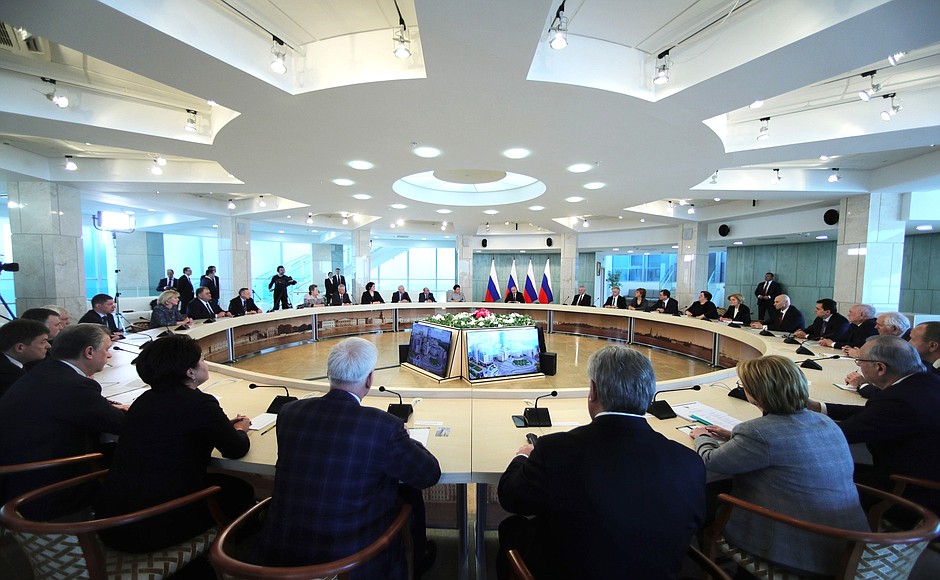 At the centre, the President met with representatives of the Russian healthcare sector, patient organisations, medical educational institutions and medical associations. The meeting participants discussed a wide range of matters regarding the Russian healthcare system. Before the meeting, the President toured the medical research centre. Director General Yevgeny Shlyakhto demonstrated to Vladimir Putin a hybrid operating theatre that is unique in Russia. It is equipped for CT scanning to be carried out during surgery. One of the advantages of hybrid surgery is the ability to perform simultaneous interventions by several teams in the same operating theatre, which reduces the duration of an operation. This method also reduces the risks of any complications and cuts the time a patient spends at a hospital. The Almazov National Medical Research Centre is one of Russia’s largest research and medical facilities as well as a multidisciplinary research and clinical centre. The centre provides multidisciplinary specialised medical help to the public, including hi-tech procedures. Additionally, the centre conducts fundamental and applied research in various fields of medicine and trains researchers and medical workers. Every year, the centre treats over 36,000 patients. Over 170,000 people are received by the centre’s outpatient clinic. President of Russia Vladimir Putin: Friends, good afternoon, I hope that you too were shown around the centre where we are today. Despite the fact that I was directly involved in its establishment and development, it still impresses me a lot. This is exactly what medicine today needs: a blend of science, education, a clinic as well as personnel training. Magnificent! It is all these things put together that produce this upscale effect. The goal of our meeting, or this medical roundtable discussion, as I put it, is the following. If you noticed, in my Address to the Federal Assembly I spoke about priority development areas for Russia and singled out several of them such as infrastructure development: transport, communications, education, science, high technology and medicine. 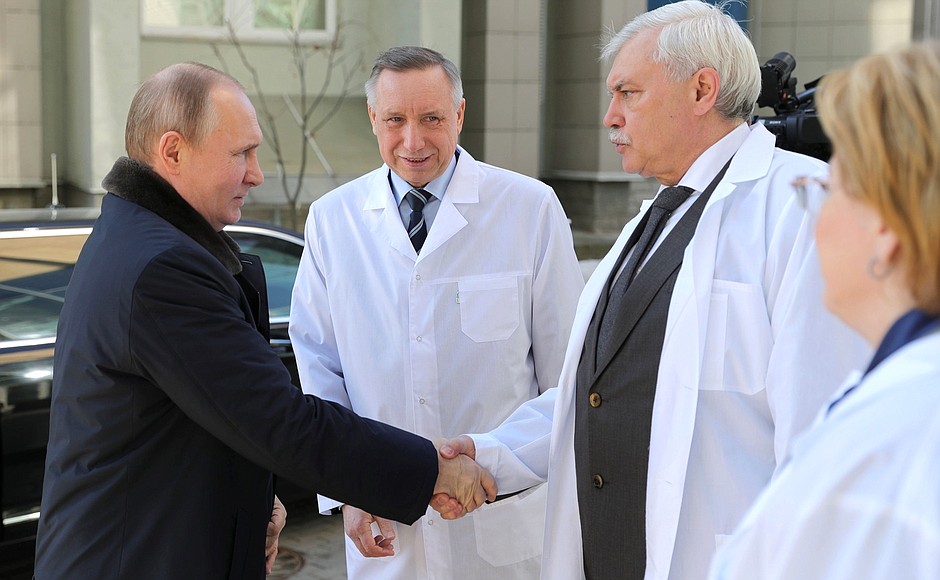 It is obvious that it is impossible to solve the main humanitarian task and the state’s mission without healthy people; it is impossible to help people to live longer and have a high-quality of life; and it is impossible to solve the key task every country has, ours included: the preservation and development of the nation. In today’s world, healthcare is becoming, or, to tell you the truth, has already become an economic category. And I do not mean the cost of sick leaves alone here. I mean that the main motivation in today’s world include advancement in science, technology, robotics and artificial intelligence. An ill person cannot solve these tasks, just cannot. In this sense, healthcare has a special mission; it becomes complex. You might have noticed that I have recently met with representatives from the transport complex in Moscow, talked with agriculture representatives and the agroindustrial complex in Krasnodar and met with representatives from the academic community in Novosibirsk. Before preparing the new edition of the 2012 executive orders, which you remember, we will need to prepare new goals based on the things we have done and the matters we are facing today. So, while meeting people from various professional fields, I wanted to meet people working in healthcare, too, with people doing practical work. I have just issued instructions to the Government and the Executive Office, and the work on specific executive orders on the areas of activity, on sectors, including healthcare, medicine, will get underway. I would like to hold a free, open conversation with you today. I would like to listen to your thoughts, your opinions and your recommendations on what we should do in the near future and how, in your opinion. If we talk about the year 2012 and these executive orders, then one of the most important components was wage levels in the healthcare sector. As you remember, the point was that doctors should receive exactly twice as much as the average in a corresponding region. I know about part-time employment problems, I know that not everything has been done, but still, progress has been made, it is noticeable, obvious. What would I like to say in this regard? If this bar were not so rigidly fixed, then we would not have achieved today’s result, because when there is no clear guidance and clear instructions about what we need to achieve, we go along general terms. As a rule, such things do not get special attention. In this connection, I would like to say and emphasise that with an increase in wages in regional economies, the Government will strive to ensure that the achieved level does not decrease but gradually rises. This is for starters. Before we begin the conversation, I would like to say the following. As you know, a new state decoration has been established in Russia – the badge of merit For Mentorship. And I am very pleased to note that such a badge is being awarded to your colleague, Rector of Samara State Medical University, Academician Gennady Kotelnikov. He is an outstanding doctor, a true teacher and a mentor who has trained more than 80 scientists in the field of medicine, 25 Doctors of Science and brought up a long line of wonderful doctors. I would like to congratulate you from the bottom of my heart. 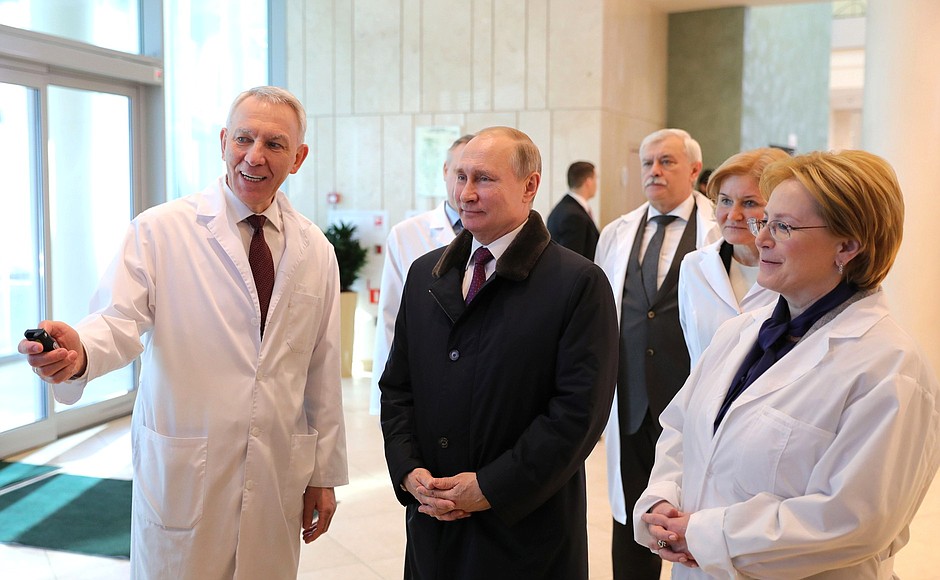 Speaker: In accordance with the Presidential Executive a badge of merit For Mentorship is presented to Gennady Kotelnikov, rector of Samara State Medical University, for his services in teaching young professionals and active mentor activities. (Applause.) Vladimir Putin: Mr Kotelinkov, I would like to congratulate you once again, thank you for your many years of work and I wish you every success. Let’s begin, please, go ahead. Yelena Kleshchenko: Good afternoon to everyone once again. I represent the Krasnodar Territory. Yelena Kleshchenko, head doctor at the Children’s Regional Clinical Hospital. First of all, Mr President, I must say that we were very encouraged about the declared Decade of Childhood. When we discussed it with colleagues, we thought it was a very good sign for our sector. I would also like to thank you for launching the unique perinatal centre construction project which is almost completed in Russia. We were in the first phase: our perinatal centre is seven years old. I believe we make a huge contribution into lowering the infant mortality rate: it was 4.3 in the Krasnodar Territory last year, and we are very proud of this. It seems to us that implementing more high technology into our field would be a breakthrough in helping children and reducing infant mortality and cases of disability. But this would require new medical buildings. I know that 17 Russian regions have no local children’s hospital at all, and children are treated at clinics for adults; this is why I am asking you, Mr President, with hope. Are there plans to build any children’s hospitals like perinatal centres? And, if you allow, another question. It is a very acute and serious topic for us: there is not enough medicine especially for children. As you know, when a pediatrician prescribes medicine, he or she writes the dose: milligrammes or millilitres per kilo of the body mass, and this body mass can be 500–600 grammes or 30–40 kilogrammes. This is why the lack of medicine for children is a grave and worrying matter for pediatricians. And I would like this problem to be discussed at the highest level. 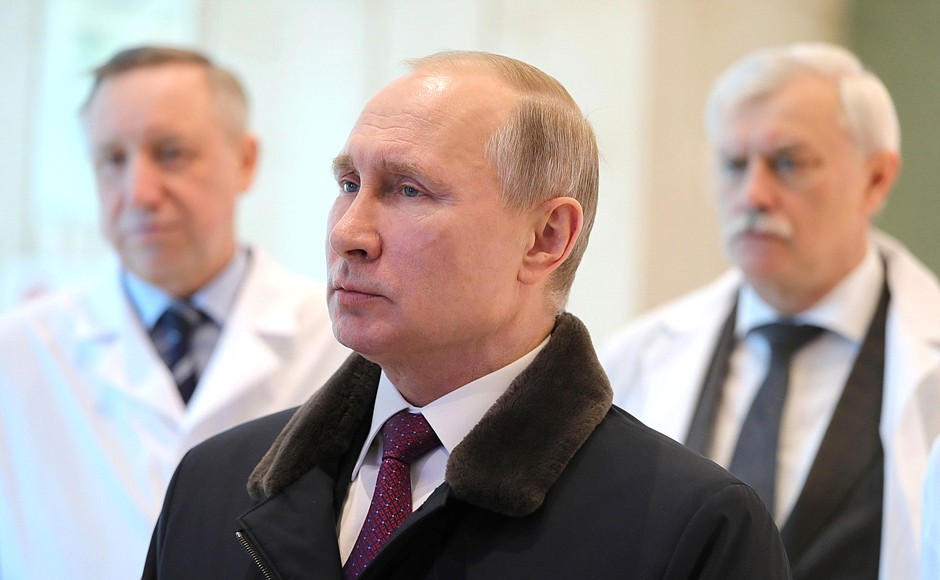 Vladimir Putin: Ms Kleshchenko, first of all, I would like you to note that the healthcare in the Krasnodar Territory is good in general. There probably are some problems, but in any case, your regional hospital can serve as a good example of how the healthcare sector must develop in the regions. You have everything there. Very good experienced specialists and good equipment. To tell you the truth, when I found out more about this, I was glad that we have got such centres in the regions. Speaking about the perinatal centre, you know that it was difficult to establish it although it has been working for seven years. At the beginning there were several mistakes, to put it mildly, that had to be corrected along the way, but we have managed it. To be quite frank with you, this is a good example demonstrating that every right and good deed has a few stumbling blocks to overcome. And we must never give up; we must move forward and achieve results. And when we set these goals, we always manage to do it. The example of your perinatal centre is very good, it proves these words. Speaking about children’s hospitals, clinics and so forth. You must have heard, I spoke about it maybe two months ago that we will allocate additional money to re-equip children’s clinics and departments at hospitals during 2018, 2019 and 2020 especially for this. This means an additional 10 billion from the federal budget during these years. On March 1, if I am not mistaken, or not very long ago anyway, the government issued the corresponding instruction. (To Healthcare Minister Veronika Skvortsova.) Ms Skvortsova, did you get that instruction out yet? It envisages 10 billion for 2018. I said and I would like to say it once again, that these funds are allocated for re-equipping children’s hospitals and departments at hospitals. You have spoken about construction. The government instruction and my instruction did not include construction. The only thing I am concerned with, and please do not get me wrong, I do not want to offend anyone, I am just afraid that this money will be used on endless construction, and not to re-equip, train specialists or fix what there already is. Unfortunately, it is very difficult to check up on such things as shrinkage, spillage and resorting. Although, we must probably think how to organise it in some cases where there is nothing yet. Maybe, we may reconstruct something, or maybe, combine hospitals already available. I do not object in general, but you must be very careful with this construction. Speaking about childhood and children, I said that additional 10 billion will be allocated. The decision for this year has been made. Now, on to subject of medicines for children. There is a federal programme called Pharma. It is strange that it does not contain a section on children’s medicines. It must be added. Do you have this section? 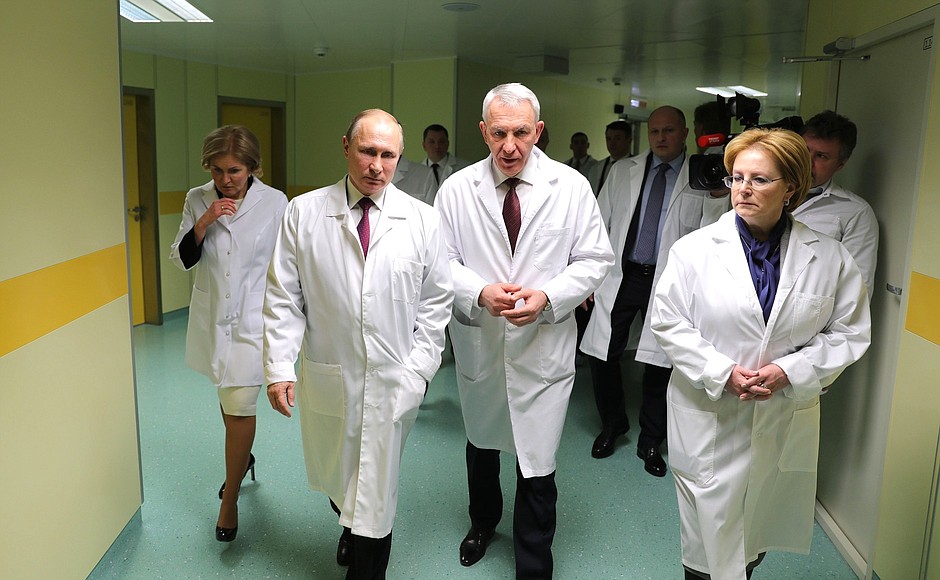 Healthcare Minister Veronika Skvortsova: There is a section on medicines for children. There are 640 registered medicines for children, including 79 developed exclusively for children. Five or six new medicines are registered every year. There are anti-viral, anti-bacterial and other types of medicines being registered. We are monitoring the registration and will extend the list every year, by all means. Vladimir Putin: I think it is necessary that doctors are promptly informed. It often happens that something new has been developed but nobody knows about it. Veronika Skvortsova: Of course, it will be done. Vladimir Putin: So, we have this area covered. It just needs to be improved. We will do as required. Please. Valentina Zherebtsova: Mr President, I would like to support my colleague. My name is Valentina Zherebtsova. I work at the Children’s Neuropsychiatry Centre in Tula. I would like to support the request for not only constructing new and equipping existing children’s hospitals but also doing the same for children’s rehabilitation centres. Even more so because in the past years, a lot has been done in this area. There are clinical protocols for monitoring patients and professional standards in place. Modern technology is widely used in children’s rehabilitation. There are early treatment and diagnosis programmes. Therefore, we are witnessing some very significant changes. Of course, providing children’s rehabilitation facilities with newer equipment and constructing new facilities is a very important matter, in my opinion. However, my question is not about that. There are entire groups of specialists who are categorised as paramedics, such as speech therapists and neuropsychologists. They are full-fledged participants of the rehabilitation programme and the rehabilitation process. Up until now, these specialists have been trained at teacher-training universities or dedicated university departments. I believe it is important to train such specialists at medical universities for subsequent employment with the medical rehabilitation system … Vladimir Putin: I agree with you. Speech therapists are trained at teacher-training universities, and they major in what I believe is called ”speech therapy teacher.“ 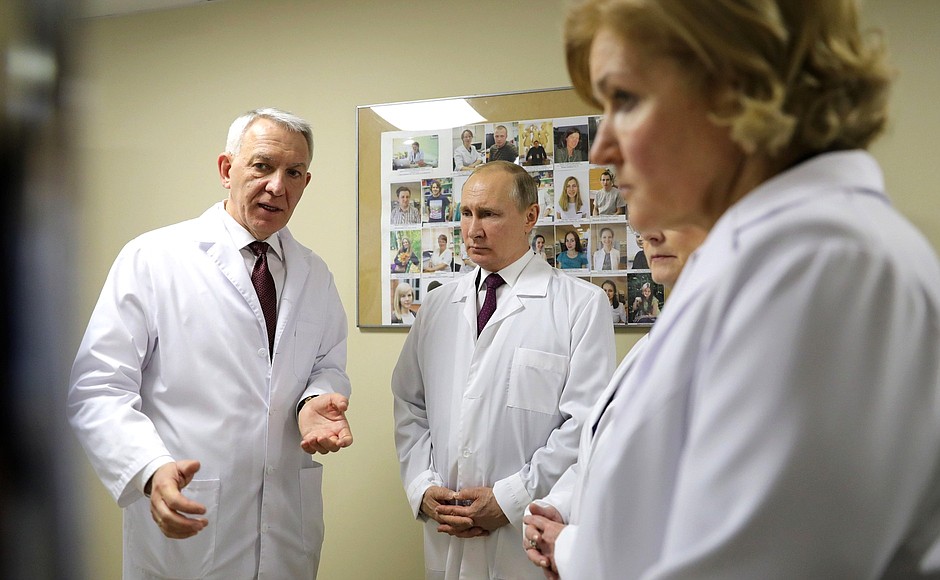 Valentina Zherebtsova: Yes, speech pathologist. Vladimir Putin: Yes. They work with otherwise healthy children to correct speech disorders. However, as far as I understand, what you just said includes work with children who have certain disorders, primarily, mental ones, or something else. Valentina Zherebtsova: Yes, it is about communication technologies for children who may never be able to speak. Vladimir Putin: Yes, but speech therapists are already being retrained at medical universities. I think certain changes can be made so that medical universities can start training them. The Ministry of Healthcare should work it through and that’s all. Veronika Skvortsova: Thank you very much, Mr President. We have been thinking about this, and we want to start training such specialists on September 1. Vladimir Putin: I believe now speech therapists are undergoing additional training at medical universities. Veronika Skvortsova: It is about providing basic medical training for neuropsychologists and aphasia specialists (speech-language pathologists who deal with secondary speech disorders caused by focal brain lesions). Vladimir Putin: I understand. However, I believe that speech therapists are now being re-trained at medical universities in order for them to be able to work with patients. Veronika Skvortsova: Yes, there are such trends. But my colleagues believe that … Vladimir Putin: They still need basic medical training? Veronika Skvortsova: Yes, basic medical training in addition to their regular training. We are ready. Vladimir Putin: Good. Please go ahead. Lyubov Agafonova: My name is Lyubov Agafonova, I am the Head Doctor at the Regional Clinical Hospital in Lipetsk. Mr President, first and foremost, allow me to thank you on behalf of the medical workers of our region and its residents for your support in implementing healthcare programmes. And a special thank you for the vascular health programme, which the region needed the most. The healthcare services we currently provide under this programme, including prevention of heart attacks and strokes, were never provided in our region before. We can now prevent heart attacks and treat strokes, thus reducing the disability status scale and saving millions of lives across Russia. And for that, a big thank you to you. 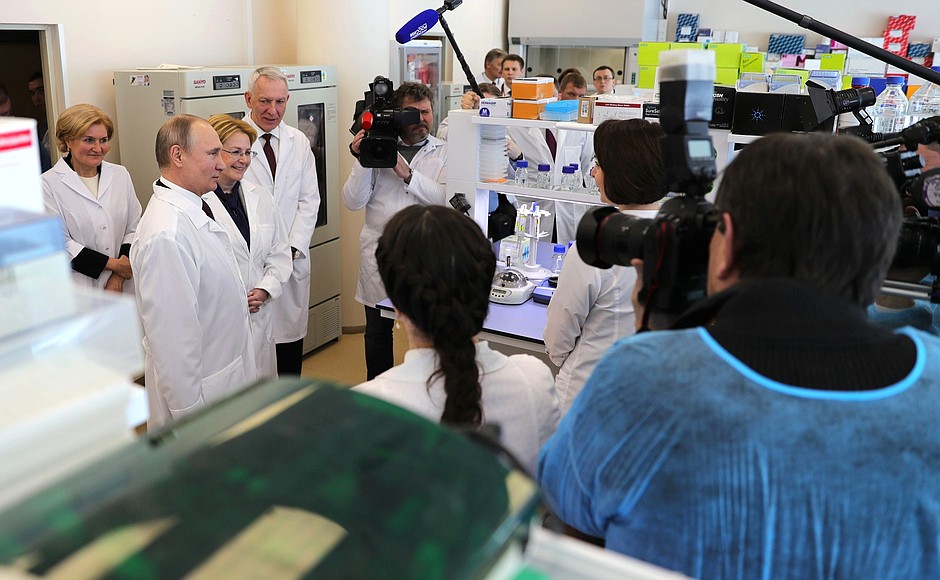 Vladimir Putin: This is something that we have achieved through your efforts, and it is people like you who make it possible. Maybe not all the objectives have been achieved so far, but overall there is some clear progress on vascular diseases. It is telling that the mortality rate of these diseases is declining. It is true that we have taken a major step forward, primarily thanks to people who work in the sector. Of course, the state did its best to provide the resources. We must thank you for making use of these opportunities in such a smart and professional manner. We will continue our efforts. There are still challenges we have to overcome, and we will keep moving forward. Please, go ahead. Arcady Stolpner: Mr President, In your Address to the Federal Assembly you mentioned cancer treatment. And you said that there was a need… Vladimir Putin: Sorry to interrupt you. This is an area where unfortunately we have yet to achieve the results people expect from us. This is true. While we have made major progress on vascular diseases, and we have achieved a breakthrough, there is also some progress in cancer treatment, but not the kind of progress we would like to see. Sorry for interrupting. Please, continue. Arcady Stolpner: In fact, I wanted to talk about the positive developments. When this disease strikes any of us, our friends or relatives, it is a tragedy. It gets even worse when dealing with cancer in children. But new methods for treating oncological diseases have been developed recently. Proton beam therapy is one example, often mentioned by Ms Skvortsova. Children are the focus groups for this therapy, and it is often the method of choice when treating cancer in children. We built the first oncological centre in Russia in this format. You said that construction can be complicated, but in fact we built it in a Europe-like timeframe: it took us four years to open it. Now we treat patients, even young ones. The city helped a lot. I must say that this was only possible because Georgy Poltavchenko [St Petersburg governor] helped us personally in certain areas, where monopolists and other issues were concerned. Based on the decisions of Mr Poltavchenko and the city administration – because the money has been allocated to treat patients with oncology – all children who need this treatment will be treated at state expense starting this year. For example, today we have ten patients: eight are being treated at no cost and two are being prepared for treatment on St Petersburg’s account. Maybe it is possible to solve this problem at the federal level too? I know that such work is being done, but maybe it could be moved accelerated. 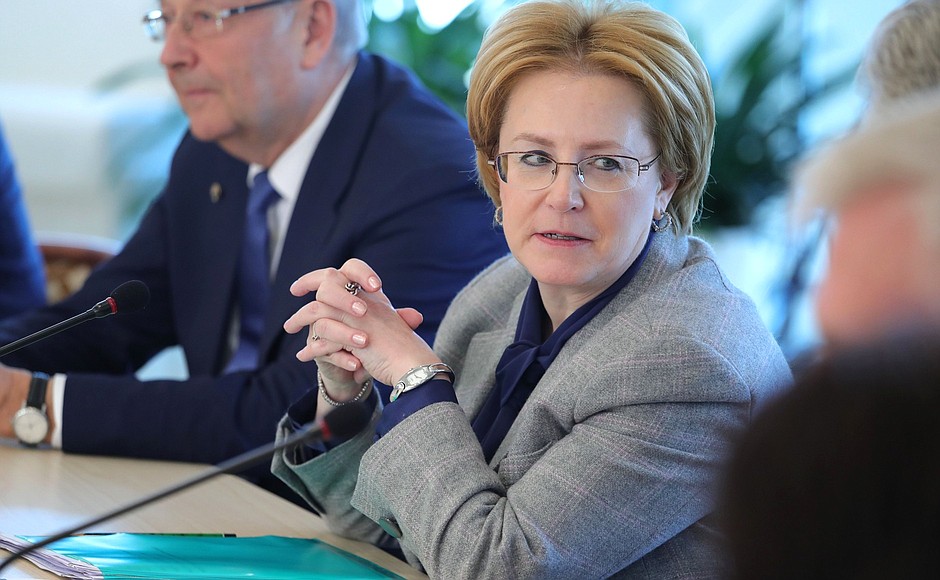 Vladimir Putin: I have focused on this, even in my Address, but of course, we will allocate money for this. But these are specific decisions; they must be made by the Healthcare Ministry. We will allocate additional resources, but it is up to the ministry to decide how to use them, with specialists of course, taking into account that special attention must be paid to oncology. I hope your words will also be considered. Arcady Stolpner: If I may I would like to add something. In fact, there are few ill children, so this problem, in this narrow area, can be resolved with relatively little money. Vladimir Putin: We both know that when the state focuses on something specific, there will be certain results, and generally these are good results. Pediatric hematology/oncology can serve as the best example. How many patients were there before we opened the Rogachev Centre and how many are there now? Alexander Rumyantsev: Let me begin with what we have now. Today the survival rate in the Russian Federation is between 80 and 90 percent. These are people who get well after an oncological disease. Mr President, I would like to thank you for your support. You always say that you like us and check on us. I would like to say that this is a great responsibility for us. Vladimir Putin: Everyone likes a doctor, especially a good one. Alexander Rumyantsev: Yes, this is a big responsibility for us. We are trying to do everything we can, because the model we have implemented along with the Healthcare Ministry is important for every Russian region. We have 59 regions, along with Belarus, Kazakhstan, Uzbekistan and Armenia, that treat patients based on the same standard protocols and under the same financial conditions. These protocols are adjusted every year due to new discoveries in medicine. What were the reasons behind this success? We are talking about every child currently living in Russia. Thanks to the centre that was built under your supervision, which is now essentially ours, we have implemented a whole series of projects. This supports the full range of morphological examinations for children. The Healthcare Ministry helped us a lot by making sure that we receive funds to provide patients with the second, the so-called morphological examination. Which means that a child, who lives somewhere else, gets diagnosed, and we conduct a second examination at our institution in order to gather full information on the child. For the first time in Russia, we have implemented a rehabilitation project for children who survived cancer. It is an incredible project, which is giving us a lot of information about special methods of rehabilitation that every child who survived cancer needs. Last May, we opened the first ever centre for rehabilitation of infants who survived cancer. No other country has a centre like this. I would like to take this opportunity to say that these models, which we use to treat children, and we have about 4,500 new patients a year, can be used to treat adults as well. Cancer in adults is a major issue, because each year, there are almost 600,000 new adult cancer patients. This is a very broad programme, which you called a principal programme, and it really is principal for the development of the entire healthcare sphere, after the treatment of cardiovascular diseases. I also take this opportunity to invite you over. You have not visited us in a long while, and we would like to show you what we have done, show some things off, and, perhaps, discuss with you some matters related to the further pursuit of our cause. Our cause is to make every child healthy again. And we would like to show you how one can organise the work, the key component of which is love, love for children. Vladimir Putin: Are you creating a rehabilitation centre? Alexander Rumyantsev: Yes. It has been in operation for four years, the progress is slow, but I want to tell you: together with their parents, a total of 2,500 children from 85 Russian regions undergo treatment in this centre every day. It is an additional trip, since the centre is located outside the city, but I think that it is worth seeing, seeing how everything is organised. Vladimir Putin: It was not always easy with this centre: the issue of location, the issue of financing. Alexander Rumyantsev: But now it is. Vladimir Putin: Thank God that it is now, I am very happy about that. I will definitely come see it. Please. Yevgeny Shlyakhto: Mr President, I am probably expressing a common opinion when I thank you for supporting our professional community. I would like to draw your attention to the fact that you focused on patients in your Address. This is a key trend in our healthcare today. Our model of healthcare is patient-oriented; we are moving away from the model that focused on the doctor to a model centred on the patient. Everything should be tailored to patients and their individual circumstances. Second, I would like to mention the specifics of Russian healthcare. Close ties with scientific research are part of our tradition, and our goal is to make them permanent. I believe that the changes taking place in Russia today are the result of breakthrough developments in creating innovative medical technologies, diagnostics, and medicines. These changes are rapid, and everyone who comes to Russia sees and recognises them. We will have an edited T-lymphocyte a year from now. This is absolutely unparalleled technology. There are already pharmaceutical companies that work with research centres and universities and create new medicines. So, this is critically important. How can all of this be promoted in the Russian regions? The Healthcare Ministry decided (and we all support this decision) to create national medical research centres. Thank you for supporting this decision. This is not about someone being more important, and someone else being less important. We need to create a healthcare network for each region with account taken for its specifics, to identify the best practices in a region, to develop them and replicate the achievements that are currently available in the world. I believe that the role of national medical centres is to unite, help, and train staff, to develop and to promote innovative technology so it becomes readily available. So, thank you very much for the directive that you signed on the importance of training at research centres, we talked about this. Last, I believe that we have vast opportunities to develop digital healthcare. Vast. We already have many decision support systems in our country. This applies to hospitals, emergency care, and patients with severe disorders, especially in remote regions. I am sure that counselling will help significantly reduce mortality rates within the next year or two. We have reduced cardiovascular mortality by 35 percent. Everyone just cannot believe that this is true. I recently attended the spring summit of the European Society of Cardiology and told them about the 35 percent, and they cannot understand how it can be possible. “How did you achieve this figure?” they asked. We still have problems, but we should reduce it by another 30–40 percent in the coming years, and we will do it. Thank you. Vladimir Putin: We spoke about the centres today, when we inspected your centre. The Healthcare Ministry created 20 such centres throughout the territory of the Russian Federation. Where are they in the Far East? In Tomsk. Where else? Veronika Skvortsova: Tomsk, Khabarovsk, Vladivostok. Vladimir Putin: Khabarovsk, Vladivostok, Siberia and the whole European part. Today we already mentioned this; now we need to link all these centres. This is first. And second, it is necessary that these centres are connected with relevant institutions in the regions. We need to create a single medical complex so that, as you rightly said, your colleague in any, even a small clinic, has the opportunity to enter a specialised network, get advice, send data on patients for monitoring and treatment purposes. I am confident that this will play a very visible, serious role. We have been talking about the digitalisation of life in general, of the economy in all its manifestations and the various spheres of our life and activity, including healthcare. So, something is already happening here, it is already noticeable, but it is not enough. We will develop a separate programme for the digitalisation of healthcare. As far as I know, the Ministry has already prepared an additional draft resolution, which will be directly related to this type of activity. We just need to speed up its adoption. Is it already with the Government or still with the Ministry? Veronika Skvortsova: By April 1, it will be considered in the Government. Vladimir Putin: So, the project has been developed and will be released in April. Veronika Skvortsova: Yes. Vladimir Putin: Please. Vladimir Goryachev: Can I say a few words? I would like to continue with childhood cardiology. Vladimir Goryachev, head doctor of the Samara Regional Clinical Cardiology Centre. I must add that 12 years ago we created a system of organised help for children with congenital heart defects at our centre. Over the succeeding five or six years the waiting list for these procedures all but disappeared. We had a history of participation in various state programmes dedicated to motherhood and childhood. I am afraid that without these programmes we would not have been able to reach this level of medical support. Today we operate on almost all children’s congenital heart defects, including new-borns with defects that were considered fatal not long ago. Now it is clear that survival is possible with 95 percent of them. I believe that we would have overcome these difficulties one way or another, but the existing programmes included additional financing, additional equipment and personnel training so we reached this level with fewer losses and in a shorter time, let me put it that way. We continue to feel your concern. Thank you very much for this. This is clear because I believe a society’s maturity is determined by how it regards its most vulnerable people: children and seniors. Primarily children, or course, because they are our future. Today we have a large programme to update polyclinics for children; let’s hope this will continue. Thank you very much, not from me of course, I am just the messenger, but from the entire paediatric community in Russia. Vladimir Putin: Thank you. Mr Goryachev, we have really done something, especially at these centres; we have already talked about several other children’s centres. This is a great level; it is really something to be proud of. It is not by chance that we are allocating an additional 10 billion each year, starting with this one, for children’s healthcare, because the situation at local children’s polyclinics and hospitals is, to put it mildly, far from perfect. By the way, this is why we must continue supporting the large centres regularly as this money is distributed (this is additional money), because we are proud of them and they must become a methodological base for developing children’s healthcare. Among other things, and maybe most importantly, we are allocating 10 billion rubles to raise the level of children’s healthcare in municipalities, at polyclinics, hospitals and paediatric departments at general hospitals. I would like to focus on this. Now we must take the next step: expand the opportunities we have in children’s healthcare today. Please, go ahead. President of the National Medical Chamber Leonid Roshal: Mr President, many thanks for convening this meeting and, in general, for much of what you have actually done for our healthcare. During our most recent meeting, you promised to increase funding for healthcare. I am pleased to note that your actions are as good as your words, and everything is going well. What you did – achieving incrementally 5 percent of GDP for healthcare needs by 2025 – is nothing short of great. We have discussed these issues with you. This is our longstanding dream. Without this, a breakthrough in healthcare can hardly be expected. Of course, we need to use this money wisely. We did not forget that it was your decision to completely re-equip healthcare facilities in Russia, which was effectively accomplished. Notably, we like to exceed our target plans, and not just with regard to the Crimean Bridge. It was nice. We will not object if you have the chance to exceed the target figures for healthcare financing in the future. We don’t want it to look like you offer a finger and we bite off your hand. We are talking based on reality. I am convinced that we are treating patients better every year, and the equipment is better, but the number of complaints increases. Frankly, this is not the case just in our country, but worldwide. Complaints about healthcare are on the rise in Germany, Great Britain, and the United States. This is because today the demands are high, off the chart occasionally. The number of complaints and criminal cases is increasing, I believe, artificially, not because we are treating our patients worse: we are treating them better every year, but the media instigates. (Leonid Roshal went on to discuss specific issues related, in particular, to medical mistakes and legal issues, staff shortages and safety of medical workers.) Along with the Healthcare Ministry, we are overhauling the training system. This is something we can really make happen. The requirements for higher education are getting tougher. We believe that doctors must engage in lifelong learning, which has never been the case in Russia. We are introducing a continuous medical training system, which should be convenient and free for doctors. We are working on professional standards and compliance with education standards; occupational clearance, which is also new for us; new approaches to performance reviews and assignment of qualification grades; and the development of clinical recommendations for treatment protocols. The National Medical Chamber has already assumed responsibility for these areas of work. Even though with the difficulties, the public-private form of managing professional healthcare is being introduced with a gradual transition to self-regulation, and we are grateful to you for supporting these undertakings. We have found common language with patient organisations. We invite them, they invite us, and we pursue the same goals. Mr President, we clearly see our challenges and know how to overcome them. I am confident that we will see to it that the people of Russia are satisfied with healthcare and doctors. Vladimir Putin: Indeed, the National Medical Chamber is an accomplished entity, congratulations, because this project is your brainchild in the broadest sense of the word. The concerns expressed by the officials of the Healthcare Ministry and its regional structures, never came true. The National Medical Chamber has become part of life and is playing an essential part as an indicator of the quality of work and protects the interests of medical workers. You mentioned this as well and expressed your concerns. I will go over them briefly. Transferring certain functions from state entities to such an authoritative non-profit organisation as the Medical Chamber is, of course, an important area of developing the National Medical Chamber. As we have already discussed, we will need to follow this path gradually as solutions to these and other issues become available. I support this. Now a few words about increasing the funding for healthcare. There is no need to curse anyone, there are no enemies here and in general there are no enemies of healthcare in the Government, including the Finance Ministry, as I have said more than once. It’s a matter of counting. If you add up healthcare funding from all sources it is over 5 percent. This is the problem. It depends on how you count it. It is simply necessary to make sure that my colleagues in the Government and all of us understand what this is about. Regarding pure budget funding, it will be much less. Some analysts believe it was 3.2 percent last year. Remark: 3.3. Vladimir Putin: I will not go into details now. Believe me, we have fought and argued over all of these issues so much. What would I like to assure you of? We will do everything we can for the funding of healthcare to be real rather than on paper. We realise how important this is and will do all we can to use even additional funds – and they are already appearing – to spend part of these additional funds on resolving healthcare problems. I said in the Address that this is a priority area, not just for effect, not to please those that need medical care or the medical community. We really believe, and I personally believe, that this is one of the most important areas of national development. We will do this by any means possible. Now a few words about growing requirements. This is always the case. Do not get mad at anyone. This is always so. When there is nothing, everything is okay. But when things start moving and something is developing, as soon as people begin to understand that there is a different life and different opportunities, they immediately look not at what they had yesterday – this is quickly forgotten – but at what they can get tomorrow. These are the lawful requirements of the people, and we should be guided by these legal requirements. You said that some specialized questionable companies, even legal ones, are emerging and extorting money from the healthcare system and medical workers. Regrettably, this is the negative side of any process that is being funded in a systematic way. As soon as money appears somewhere, parasite companies emerge and try to take a bite of the money in one way or another. But we must counter this. We will pay attention to this and try to prevent anything like this from happening. Naturally, the security of medical workers should be ensured and responsibility for damages increased. We will see how the latest decisions will work in practice and will toughen the requirements if necessary, as well as prosecution for attacks on medical workers in any form. A few words about the Accounts Chamber. The Accounts Chamber is designed to analyse the efficiency of government spending, spending budget funds, federal funds in the first place. It does not make final decisions but only keeps us informed. Decisions are made by other instances that have an opportunity to assess objectively the information they get from the Accounts Chamber. So, there should be no serious apprehensions in this respect. Go ahead please. Oleg Karpov: Oleg Karpov, director of the Pirogov Centre. Mr President, thank you very much for your words of gratitude to medical workers for which you found room in your Address to the Federal Assembly. We hear them and this is very important for us. We, everyone here, remembers the 1990s and what life was like then – regrettably, it was difficult to survive at that time. We were essentially craftsmen and saved our patients only by resorting to art and intellect. Everything has changed since the 2000s. And indeed, returning to your Address again, by adopting systematic and consistent measures and facing the problems of the industry, you took us into the orbit of technological development that allowed Russian healthcare to match European and world standards. This is true. Today we treat three to four times more patients on the same number of beds and the number of operations has increased as much. Today we treat our patients as we could not before and receive results that seemed fantastic 12 or 15 years ago. These are not just words. Here is a fact. Our centre is well developed and famous. In the early 2000s there was a pool of patients who came to us for final tests and then went abroad for medical treatment at their own expense. In a few years – and this evokes an unusual feeling of pride and joy – these patients stopped leaving. They stopped leaving because now the latest medical aid, all technology is available in Russia – the same equipment, the same standards and the same medicines. Yes, there are some exclusive medicines or equipment in some places, but they will become available. Inbound tourism is important in this respect. In our industry we have tens of thousands of patients in the federal centres alone. These are major financial injections. Our industry received about 16 billion rubles in 2016. About 3,000 foreign patients have come to our centre in two years, including 750 that arrived to be treated for multiple sclerosis. We developed our own technology for such treatment and received license for it. It is being used in several places in the world. Patients from the United States, Canada, Norway, France and Spain come to us and wait for treatment with this technology. This is a very good resource, for our earnings as well. I believe against this rapid increase in economic efficiency we should not forget that the moral and ethical factor of communication between the doctor and the patient, the medical worker and the patient also remains a priority. By tradition this was inherent in our domestic healthcare. The human factor has always played a special role and we consistently pay attention to it. And, finally, one more point, Mr President. You said in your Address that financial allocations are required for us to keep up with this rate of technological development. We are talking about this today. This is certainly the case, but probably apart from efficient government spending broader use must be made of private funds and this is what we are doing. (Oleg Karpov went on to describe the public-private partnership at the Pirogov Centre.) Now departments are jointly and actively working through public-private partnerships. We would like to ask you to keep these issues under your personal control so that they are duly completed, and we will start consistent and confident work in these areas. And the last point. Naturally, it is indicative that you are meeting with us, medical workers in the last hours of such a complicated political time. Thank you for keeping us a priority as before. Vladimir Putin: Thank you. I mentioned my recent meeting with transport workers, the agro-industrial complex, and earlier with researchers and educators. That's why our meeting is more like a staff meeting, but of course, a special one, bearing in mind that we need to articulate our goals for the next six years. So, I am sincerely saying that, of course, we constantly discuss this with the Minister and the Deputy Prime Minister who are present, and the Prime Minister and our colleagues from other ministries and departments. We do argue a lot, but listening to people who do things with their own hands is particularly valuable. That is why I meet with representatives from various industries. Of course, we must follow our domestic political schedule, but we just need to formulate our goals for the next six years. I hope – and it turns out that way – that we are talking about what we believe are the most important, interesting, promising and essential things that need to be done. You mentioned public-private partnership. Of course, this must be promoted. However, we should not forget that we must use a certain set of tools to make sure that people can have access to free medical care in our country. This is a legal requirement, and we must follow it. At the same time, of course, it is necessary to develop all alternatives, including public-private partnerships. Of course, private investors expect a return on their investment. In this regard, I fully agree with you that inbound medical tourism is extremely interesting and important, including to improve the well-being of those who work in the medical industry. The international medical tourism market is estimated at about $10.5 billion. In 2016, Russia accounted for only $250 million despite your findings; $10.5 billion was in 2016, now it is probably more. And we had just $250 million coming our way. By the way, our possibilities for this are vast. This will grow if we will act purposefully in this area. It will definitely help not only those who come for medical help to Russia from abroad, but it will also raise the overall level of our healthcare, because the standards will be fairly high. In this regard, it is important for us not only to provide high quality medical care, but to also promote rehabilitation services. We are still behind your colleagues in this area, that is why centres such as the Dima Rogachev Centre and others are making a point of this issue. Are you also contemplating a rehabilitation centre? This is critically important. This is important for your potential patients and medical tourists, both future and current. If you want them to come, you need to figure this out, but, of course, do not forget about the core activity – medical care. Now I want to get back to finance issues in general. I already mentioned it earlier, and we will definitely focus on this, not just focus, but allocate additional resources. Your ideas on public-private partnership should in no way replace state funding, but they will complement the general efforts of the state to promote healthcare. Ivan Stilidi: Mr President, I am Ivan Stilidi, acting Head of the Blokhin Russian Cancer Research Centre. I would like the words of gratitude to be more pronounced. They are from all those involved in oncology. Thank you very much for seeing that oncology has been included on the list of priority areas of the development in medicine, and in general, the state is paying much attention to it. I must say we were ready for this because everyone in the professional community who has devoted years of their life, their mind and soul is always waiting for their cause to be a priority. In this sense, oncologists have lived to see this. We were also ready for this because the full modernisation of oncological institutions began in 2009 and these steps have already produced results. Some of my colleagues are here. They are directors at national oncology centres: Andrei Kaprin from the Hertzen Centre and Alexei Belyayev from the Petrov Institute. And, of course we are now working with the fresh impetus that you have given us on developing a national anticancer programme and building a fundamental federal anticancer service. Naturally, together, we are a powerful force. I believe this new impetus should produce results. Once again thank you very much on behalf of all oncologists. Vladimir Putin: Thank you for recalling the past decisions on consolidating oncology centres and early treatment clinics. It is, of course, a pleasure to hear that you felt that at least something has been done there and that you see results. As we agreed, we will take the next step by all means possible. I have already determined this as a priority and we will work together on it. Sergei Boitsov: Sergei Boitsov, Director of the Russian National Medical Research Center of Cardiology and at the same time chief visiting specialist of the Healthcare Ministry on preventive medicine. I would like to speak primarily about preventive medicine and issues in primary care. This is what I will start with, since the issue of accessibility in this regard is most urgent. In the past three months alone, you have addressed this issue twice – during your news conference and in your Address to the Federal Assembly. The problem began to develop in the early 2000s, not now. At that time there were 43,000 first aid/obstetric stations, now there are 36,000 stations but the reduction took place in the first years of this century. In the past few years, the Healthcare Ministry tried to restore the balance and opened almost 900 stations in the last two years alone. But now we are receiving a powerful additional impetus and thank you very much Mr President – the Government of the Russian Federation has issued a resolution on making a significant financial injection of 1.2 billion on these stations alone. We have confidence that in two years or in two and a half years at most the problems will be resolved – of course, with the participation of the regions. No less important is the matter of mobile stations. They are needed for 1.7 million people in 65 regions. The number of stations is growing at a good pace: there were 1,400 mobile stations four years ago and now there are 3,500. But at least 1,800 are still needed. There has also been a financial injection of 2.2 billion. It will be possible to launch about 200 stations this year. So, thank you very much for your special attention to this issue. Another issue, which you also mentioned in your Address to the Federal Assembly, is preventive medical examinations. In 2012, the country resumed the regular large-scale system of preventive medical check-ups for the adult population. Originally, it was organised every three years. This year, we are launching a parallel campaign of oncological screening every two years. This involves preventive examinations and health centres. In total, 36 million adults have medical check-ups annually. This is not only detection of diseases and risk factors but also promoting a healthy life style, which we call our number one goal. Children as well, over 30 million children get medical check-ups annually. This also promotes a healthy life style. I would like to thank you again for your special attention to this issue. We have two requests. The first one concerns promoting the law on salt iodisation. This is a very important issue for our country. 113 countries have already adopted the salt iodisation law. This not only prevents thyroid diseases but also solves intellectual development problems. At least 15–20 percent of our population lives in iodine deficiency zones. We consume three times less iodine in Russia than necessary. At the initiative and with the active participation of academician Ivan Dedov, the Ministry of Healthcare has submitted a supplement to the law on food quality and safety. We are asking for your support, Mr President, because we do not rule out difficulty in passing this law. Similarly, a hard road lies ahead of another document, which is not a law but a strategy for promoting a healthy life style and preventing and controlling non-contagious diseases. This document involves a large number of participants, such as agencies, services, public organisations and so on, all of them having many interests. This document is also passing through several departments with difficulty. We need support here as well. Thank you very much. Vladimir Putin: Yes, everything you said is very important. I do not even know what to focus on. Prevention of non-contagious diseases. We have addressed this issue already. I know about the internal difficulties, all these traps and pitfalls, we will tackle them by all means. I agree with you, this is a very important area. As for the law or decision on iodised salt, Mr Dedov is handling this, promoting it as a person who has been working in this area all his life. This idea did not com about yesterday. We prepared a bill in 2013, but it was actually blocked due to the position of our industry that it would considerably raise the cost of production. I agree with you that we should follow up on this issue by all means. Indeed, we have a lot of regions situated quite far away from the sea and people need this. I believe that such programmes were in force and all this was produced in the USSR. We should follow up on this issue by all means because, what can I say, Mr Dedov raises these issues for good reason. This does not only concern the thyroid gland, but people’s overall health. So we will follow up on this. Good that you remembered about it. Concerning the promotion of a healthy lifestyle. This is crucial. I agree with our colleagues who say it is time to organise this in such a way that it would do more than just encourage people to take up fitness and sport – every individual is responsible for their health. That is how things are in the rest of the world. We need to steadily, easily in terms of finance build up a system that will increase peoples’ responsibility for their own health. This is the next point that you took notice of. I find it important. Next, concerning preventive screenings. You know, I do not intend to go into detail, I also mentioned in the Address that it is necessary to initiate a system of preventive screenings. We even argued about the proper term and finally agreed on exactly this phrase – preventive screening, and not something else, not “annual medical examination.” I will not go into detail; I believe you understand what this is about. But there is a difference between annual medical examination and preventive screening. Anyway, it is not that important what we call it. What is important is a different matter – what would happen next? So, if they diagnose something, what comes next? The system must be ready to respond to identified problems. And this is a different story, different funds. What does different mean? It is the healthcare system. Mr Roshal raised this point; he always raises questions of funding whenever we meet, I am even scared of him because he always brings up money. I mentioned rural and mobile health stations. We can estimate how much that costs. Not only can we count, it has already been calculated. We know how much it costs today. We know how much the informatisation and digitalisation of medicine will cost. These are accounting items, and it is all there – we will need to allocate this much in the following years to this and that. And what other things do we have funding for? This is actually professional analysis with the need to determine the top priorities at this time. You mentioned the primary level in healthcare. We funded it in due time hoping that just like with the primary level in education it would be taken on by the regions. However, this did not happen in a lot of cases. We have to go back to that again and allocate funds from the federal budget. We have to build a system of preserving the achieved level and of improving this situation in the future. These are the things to work on. All the issues you have raised are important and interesting; we will certainly be working hard on them, including the law on iodised salt. This is not a side issue, I agree with you. Please, go ahead. Ildar Khairullin: I am Ildar Khairullin, Chief Doctor at the Republic’s Oncology Clinic, in Kazan. Mr President, six years ago, in February 2012 you visited the Emergency Clinic in Naberezhnye Chelny and set a goal for this clinic to become one of Russia’s best. I can now report to you that in 2015 the clinic passed international accreditation of patient safety quality and is the first and only state clinic in Russia with a JCI standard rating. Currently, I work at the oncology clinic. Your Address set out an undoubtedly very ambitious and interesting challenge to enter the 80+ Club. And you immediately offered a solution – annual preventive screenings and proposed a national oncology programme. Undoubtedly, cancer treatment today drives healthcare development and presents a consistent approach, from the early diagnosis of malignant tumours, work within the primary network, specialist high-tech medical aid, rehabilitation and palliative care. We have everything here, and this expertise can be applied to other medical services and other non-infectious diseases. (I. Khairullin went on to speak about the oncological medical services in Tatarstan, specifically about annual medical examinations). We are grateful to the Health Ministry and Ms. Skvortsova for last year’s resolution, and we noticed the results this year in the increased funding for chemotherapy. This year, inpatient clinics received an extra 275 million roubles, which allowed us to introduce innovative chemotherapy medication in the key areas. At the same time, we are fully aware of the fact that rates for chemotherapy medication are growing steadily, new innovative target and immunity drug therapy is being developed. But the rates are unfortunately lagging behind the cost of this medication. Therefore, we need to ask you to speed up the development of domestic innovative target chemotherapy and radiotherapy medication. On the other hand, we would like you to set up an agency that would evaluate the financial efficiency of introducing a certain type of treatment or medication in terms of cost and productivity. Radiology is definitely an effective therapy for our cancer patients. This method is the most effective in terms of cost and efficiency. Nearly 50 percent of cancer patients require radiology treatment. I know that many regions have difficulties in this area. The number of radiology units and linear accelerators is still below international standards. Therefore, I would like to ask you to intensify the work to develop domestic radiology equipment, linear accelerators and replace the expensive heavy medical and diagnostic equipment in accordance with the technological cycle as part of the cancer treatment programme. These measures will definitely help achieve the targets you set in your annual Address. Vladimir Putin: Thank you. First, I would like to congratulate you on your results. These are your achievements and the achievements of your employees, and they are inspiring. We should make the most of our best practices, both in your republic and the rest of Russia. As for the specific issues you raised, the first thing we should do is review the preventive medicine data. The best way to do this is by addressing another objective first, we talked about this, digitisation and informatisation, and then it will all fall into place. That is the programme we intend to invest in. As I have just said, everything can be calculated. Believe me, we have calculated up to tens of thousands how much it will cost to implement this country-wide. We will deal with that. That was my first point. Secondly, a few words about efficient medicines and techniques. As far as I know, the Healthcare Ministry has an Expert Council. In general, medicine has become so complicated today – it is not simply breaking a pill in half and giving one to a patient for a headache and the other for stomach pain relief. We have walked around here and seen things that are directly related to the most complicated areas of science in different disciplines. Your branch is science-intensive, probably, the most science-intensive branch. Therefore, only specialists can determine what is effective and what is not. There is the Expert Council. The only thing I could probably ask the Minister is to include practicing specialists on the Expert Council. Veronika Skvortsova: Mr President, we established a special federal centre that does independent expert reviews on all areas of pharmaceutical and clinical economic effectiveness. It has been operating for the last year and a half. Mr Khairullin, we invite you to attend the council at this centre and see for yourself how all this is already working. Vladimir Putin: Ms Skvortsova, I think it may not be enough to just invite one colleague. It might be necessary to invite not only practicing experts from Tatarstan, but maybe from other clinics as well. We need to see, three or four specialists may well be included. Veronika Skvortsova: All right. Certainly. Vladimir Putin: Now a few words about domestic equipment, especially heavy equipment. We know that it is appearing, that it exists in principle. But it is perfectly obvious that the range of available equipment must be much broader. It takes a long time to develop and produce such equipment. So we are facing this task in principle. Let us get it up to date. Of course, even after our current meeting it is possible, if necessary, to formulate relevant instructions to the Government as a whole, to the Healthcare Ministry and the Ministry of Industry to be more active in their joint work than they have been so far. But I completely agree with you that we must have our own, effective, modern and promising equipment. Go ahead, please. Yury Zhulyov: Mr President, thank you so much. Let me introduce myself. I am co-Chairman of the National Patients’ Union and President of the National Hemophilia Society. My name is Yury Zhulyov. I am sorry I was so adamant in asking to be given the floor, but I am the only representative of the patient community at this table and, of course, I would like to express a number of considerations and important positions. Vladimir Putin: It is a shame but I did not know we had a patient community. Yury Zhulyov: I am glad that you know about it now and in conclusion I would like to mention again one very important undertaking that we are doing together with our colleagues. It would be strange if I did not talk about the patient-oriented model of healthcare. Incidentally, as a lawyer I would like to say that in the future we should probably pass a law on this position. There are two very important points that we are concerned about. First, this is really a view of the patient as the centre of the healthcare system, the consistency of rendering aid to a patient, starting with diagnostics and ending with rehabilitation – you were absolutely right to speak about rehabilitation problems. This is the gap between institutions, different types of aid, including the organisation of aid and routing inside a medical institution as such. I think now the Healthcare Ministry is actively and properly promoting the project “Prudent Outpatient Clinic” whereby patients feel the constant attention of medical workers and understand the step-by-step rendering of medical care. The second part is crucial. You know that technology is very important, but medicines are equally important. I would like to point out a humanitarian aspect, that is, the doctor-patient relationship. It is a central part of healthcare. To me, patient-focused care is not just a phrase or a term, but something that must be complemented with practical principles. One such principle is the doctor-patient relationship. We must move away from the boss-subordinate principle of relations to dialogue and partnership. This principle involves two very important things. First, the huge funds we invest in healthcare cannot attain their goal because patients are not fully aware of their role. Patients must have the necessary information and act as partners in the process of medical treatment. They must know the elements of the proposed treatment and its goals, as well as their role in this process. This will greatly enhance the efficiency of medical assistance. Second, the doctor must have the instruments for preventing conflicts and must have the skills of doctor-patient communication. We believe that ethical and communication aspects have been eroded in the current process of medical education. We propose that the principles of deontological ethics and doctor-patient communication be added to the mandatory educational standards. This is extremely important, because this is what we lack now. Once again, this is not just my personal opinion. I promised to conclude my report by telling you about an important annual event that the Russian Patients Association holds together with the Healthcare Ministry. It is a very important event, which Ms Skvortsova has never missed. I am referring to the Russian Congress of Patients, which is attended by delegates from the National Medical Chamber and Mr Roshal, the Civic Chamber and the Russian Popular Front. I believe that our congress is a very good platform for dialogue between the authorities, public associations, civil society and patients, a platform where we also discuss the difficult issues I have mentioned. I would like to say that in my opinion, apart from what we are discussing today, the enhanced skills of our doctors would enhance the quality of medical assistance. In conclusion, I would like to thank you because we do feel that the state is giving priority attention to healthcare, which is a state priority. The proposals you have put forth in your Address are not just fine words but a matter of life and death for many people. We look forward to seeing these proposals implemented, because we know that although much has been done we must keep moving forward to find solutions to very serious problems. Vladimir Putin: Thank you for all your work. I agree with you that we should give our attention to these things. And then we will probably not see any conflicts such as Mr Roshal mentioned. However, we must not lay all the blame on one of the parties. What we need is modern and efficient doctor-patient communication. This is certainly very important, and merely reading out the Hippocratic Oath is not enough. What we need is systemic work. We must discuss this with the Healthcare Ministry and probably also with the National Medical Chamber. It is one of the areas where we must work. I remember Mr Roshal speaking about this when he told me about the idea of a medical chamber. Leonid Roshal: Yes, it is very important to introduce conflictology both for doctors and for patients. The National Medical Chamber is working in this sphere. Vladimir Putin: This issue was raised at the very beginning, when Mr Roshal told me about the idea of creating the National Medical Chamber – he also spoke about this issue then. Please. Andrei Kaprin: Mr President, I am an oncologist, head of the National Medical Research Institute of Radiology, which includes one of Europe’s oldest institutes, the Pyotr Hertzen Institute. And I, of course, want to thank you for the attention you have been paying to oncology and for the development directions you have given us. It was a very interesting decision, implemented by the Healthcare Ministry led by Ms Skvortsova, to merge several centres into one. This association has been operating for about five years and includes the oldest institute in central Moscow and at the same time a huge institute in Obninsk. It is equipped with cutting-edge radiological equipment. Naturally, we would not be able to open such a facility as the one in Obninsk in Moscow or build similar ones in the regions. The Ministry of Industry and Trade is helping us build a centre for pre-clinical studies of new radionuclides and a line of targeted medicinal radio compounds, which our nuclear power also needs. So, we are grateful and we want to take part in such large associations, which allow us to not spend additional money on expensive equipment. For instance, we have the CyberKnife which costs 500 million rubles, and the Gamma Knife, which costs 300 million rubles. But they are not so popular that we need them everywhere. So, I want to thank you for such a sensible and careful attitude to cancer treatment and the related expenses. We are ready to continue developing our own equipment. Vladimir Putin: As for Obninsk, the decision to establish such a centre was a well-thought-out one, I mean the capacities you mentioned. Of course, in this sense, Obninsk has a huge competitive advantage, and you are making full use of it. I wish you further success. Naturally, we will support everything that was done in Obninsk and the idea of such centres. Please. Nikolai Daikhes: Thank you, Mr President. I would like to thank and support our colleagues from the patient community, because there is the issue of providing high-tech medical assistance to people with disabilities, and we are working on it now. My name is Nikolai Daikhes, I am the director of the Federal Centre of Otorhinolaryngology. We appreciate that we can speak now, for not always do narrow specialists (we do not like this term, however) have the opportunity to speak alongside oncologists and cardiologists. Last year, we performed Russia’s first bionic eye implant surgery on a patient who was completely blind. We reported on that, and you supported us then. There are several such first surgeries in the world, and Russia is in the lead. Naturally, it is very important that we combine this method with the already known method of cochlear implant surgery, which provides a sense of sound to people who are profoundly deaf. It especially concerns children. Vladimir Putin: Does it have to be performed at a very early age? Nikolai Daikhes: Preferably. And, of course, in Russia we have made a breakthrough, I will say a few words about it… Vladimir Putin: Sometime before the age of three? Nikolai Daikhes: Before theage of three, so that the child will not become deaf-mute. But it is helpful to adults too. When we make advances, we must not deprive them of such an opportunity. I mentioned people with disabilities because there are millions of people with impaired hearing and sight in Russia, and these technologies provide us with unique opportunities. The most important thing is that we can now help deaf-blind people, to whom you also provide social assistance. You are doing a lot for them, we know it. Of course, such opportunities arise here. In general, restoring impaired sensory functions is one of the most important breakthrough technologies of the 21st century medicine. And, of course, the fact that today Russia is a leader in this area – in restoring both the sight and the hearing – is a reason to rejoice. However, we regard the development of the Russian production base for such devices as our important task. We believe that we need a state programme or maybe your order to promote our cooperation with the medical industry in creating high-tech methods. Perhaps we need to create a cluster. Today we have spoken a lot about establishing large centres. We opened a centre three years ago. It is the largest centre for otorhinolaryngology and head and neck surgery in Europe and the world. Of course, we cannot compete with academician Yevgeny Shlyakhto, but it looks rather good all the same. We have branches in Khabarovsk and Astrakhan, where people receive high-tech treatment in these areas, and they do not have to go to Moscow for this. We believe it is very important for developing federal centres. (Then Nikolai Daikhes spoke about R&D cooperation with the industry.) As a member of the Russian Civic Chamber, I can say on behalf of my colleagues, not only doctors but all of them, that the next Civic Chamber forum (this year we have seven, and you will attend the final one, where we will present a report) is dedicated to the healthy way of life. There are two issues related to the patient community and all our public organisations, because they are also involved in this: oncology and inbound medical tourism, which we have spoken about today. This is also very important for us, and we will present this in the final Civic Chamber report at the end of the year. Thank you, Mr President. Vladimir Putin: I would like to congratulate you on the level you have reached and thank you for the results of your work. Please pass on my best regards to all your colleagues. As for the equipment, yes, we have talked about it, but we need the Healthcare Ministry together with the corresponding agencies and the Government, first of all the Industry Ministry, to take care of this. I will take note of this, and following our meeting, we will issue a corresponding instruction, among other things. What is important here? A lot of our enterprises are basically ready. They have even set such targets, especially defence industry enterprises that have the necessary equipment and well-trained personnel. You probably saw the second part of my Address to the Federal Assembly, which was devoted to defence. Why do we have those capabilities? We have re-equipped defence industry enterprises, investing almost three trillion rubles in recent years. Otherwise, it would have been impossible to achieve this, there would have been no equipment, but we have it as well as the personnel. What must we ensure? This is the Healthcare Ministry’s task: the consumer market. The defence industry’s task is to diversify production and gradually reach the level of at least 50 percent civil production in the near future. Some enterprises are already producing 20 to 30 percent, but we must reach at least 50 percent and even more when defence procurement goes down. Everybody is interested in this. They must have a market, because sometimes they complain that they are ready to produce this or that equipment, but nobody buys it because they prefer foreign versions. Nikolai Daikhes: Mr President, I have noted, and you heard me, that we need close cooperation. We can tell them what we need, and when we order what the institute needs and they make it, we will buy it automatically; we will do it for ourselves. Vladimir Putin: Excellent. You are right. Thank you very much for raising this issue. Let’s work on this. Everybody is interested in this, so let us work harder. Yury Lobzin: Mr President, I am a doctor treating infectious diseases, and I cannot help but say a few words about infectious diseases because we have discussed all issues here, including cancer treatment and cardiovascular diseases. All of them are very important, but we cannot forget about infectious diseases. I head the Children’s Clinical Research Centre of Infectious Diseases. I would like to thank you very much on behalf of the Centre’s employees and all doctors treating infectious diseases in children and adults. The Institute of Child Infections was eking out a miserable existence six years ago, with its buildings dating back to 1901–1902. You signed the Federal Targeted Investment Programme. Today, our Centre has turned into a modern European-class and, maybe, even world-class organisation. Its area has more than tripled from 10,000 to 36,000 square metres. The Centre’s modern expert-class systems account for 98 percent of its equipment. We provide wonderful opportunities for patients, and we treat children inside individual Meltzer boxes. We can say proudly that this is a truly modern and efficient centre. This is important for the entire country because it is the only leading centre that trains doctors from other regions. Today, we have obtained very serious results in etiological decoding and antibiotic resistance. This task has global, rather than just national, significance. I would like to thank Ms Skvortsova for attending the celebrations of our institute’s 90th anniversary last year. In her report at the World Health Assembly, she even cited research papers of the centre’s experts. Second, we are now saving children who could not be saved in the past. This year alone, we treated 17 children with extremely serious cases of meningococcal infection, acute meningitis and encephalitis with severe brain damage, and we saved 15 of them. In the past, children with acute Waterhouse-Friderichsen syndrome succumbed to the disease. Rehabilitation is the third issue. This complex has managed to preserve all three aspects, including diagnostics, intensive therapy and the rehabilitation system. Russian-made equipment accounts for 60 percent of our up-to-date equipment making it possible to restore children’s locomotor and mental functions within two months, rather than 12 to 18 months as before. Ms Skvortsova has seen such children, including a completely paralysed 12-year-old girl from Crimea. She walked away from us two months later, and she even danced before us in gratitude. Mr President, our centre now trains Russian and foreign doctors, and this is a major achievement. Eighteen months after renovation, the centre has already trained 400 doctors from other countries, and this number is quite substantial. Dr Carissa F. Etienne, Director of the Pan American Health Organisation of the World Health Organisation, visited us and asked whether she could come here more often. She said she liked our centre and noted its impressive level. Therefore, we have every reason to feel proud. Thank you once again for adopting the programme at that time. They told me that it was easier to shut down our centre than to renovate it. But it is impossible to shut it down because this is the only leading national centre that charts the strategy for treating children’s infections. There is another painful moment, if I may. Of course, this is all good, but it would be better if children did not get infections at all. Unfortunately, 85 percent of all diseases are childhood illnesses. And children die – about 50 percent of all deaths are also due to infections, and probably 25 to 30 percent of infections result in disability. In this regard, a painful issue is vaccines for prevention, which also ensure the security of our country. Vladimir Putin: Is this prevention effective in the case of infectious diseases? Yury Lobzin: Absolutely. Here’s the latest case: a dad came to the patient community – his daughter was saved from a meningococcal infection – and said: if I knew that it was possible to prevent this grave illness, when she was between life and death for two weeks, with a single vaccine, of course, I would have done it and I should have done it. But here there are problems. Vladimir Putin: But now some people prefer to avoid vaccination… Yury Lobzin: Unfortunately, Mr President, there is an anti-vaccine trend. I do not know who promotes it, where it comes from, because we have a lot of resistance against vaccinations, so if it was regulated on a national scale, it would be great. Vladimir Putin: In some countries, children are not admitted to preschools, kindergartens without vaccinations. Yury Lobzin: Yes. Yury Zhulev: Mr President, we, as the patient community, do oppose these trends. Vladimir Putin: Which trends? Yury Zhulev: When parents refuse to vaccinate their children. They endanger the lives of their children. Vladimir Putin: They endanger the lives of their own children and also other children at a school or kindergarten. Yury Zhulev: Of course, and also other children. Therefore, our Russian Patients Association is in solidarity with the Healthcare Ministry, with specialists. Everywhere, where possible, we talk about our attitude to this process. This is really a matter of security throughout the country and specific children. It is outrageous. Vladimir Putin: You raised a very important issue. And to address it, of course, we cannot use more rigid methods, some administrative orders. We badly need the interaction between specialists and public organisations. And I am very grateful to you for this. This, of course, is subject to discussion. Some administrative decisions may also be adopted. We just need to do this carefully, without administrative shouting and commands. But we need to explain it to people what are the potential results of their behaviour, what it can lead to. After all, this is always a very difficult choice, especially when it comes to children. There are examples where these vaccinations lead to adverse consequences, so we need to work carefully with people. Thank you for raising the issue. Yegor Korchagin: Mr President, I represent a large regional Siberian healthcare centre: the regional clinical hospital in Krasnoyarsk. I am the head doctor, Yegor Korchagin. We are very happy that our hospital got lucky with the upcoming 2019 Universiade and we will build an advanced surgery wing. This will create entirely new conditions for treating our patients. These include patients with burns, cardiac diseases and organ transplants. To tell the truth, this will bring medical help in our country to a new level. The hospital is to open on the eve of the Universiade. I am sure that the day when we will open this advanced wing in our city together with you is not too far off. I would like to focus on two issues that have not been discussed today. First, as Mr Roshal said, recently we received a large number of complaints, including those in the media, for allegedly poor quality medical help. In addition, there is an opinion that healthcare workers are overworked. I think there are two aspects to solving this problem: medical and sociopsycological. The first one has to do with the fact that advanced medical technology must be based on clinical recommendations designed by specialists based on tests that prove the effectiveness of these approaches. It is clear that many things in medicine depend on experience today and maybe on the readiness to tackle tasks in an unconventional way. I am absolutely certain that before doing something creative we must implement the mandatory programme, I mean comply with the procedures adopted by the medical community. The procedure for providing medical help and treatment protocols in concrete hospitals must be drafted based on these clinical recommendations. We know that Ms Skvortsova’s colleagues have drafted a document amending federal legislation and approving standard approaches to developing clinical recommendations, and I would like to ask you to approve this document in the near future. I think it would benefit the entire medical community. The second aspect of this issue is related to the things the representatives of the Civic Chamber and the patients’ community have already said. However, I am not only talking about the doctor–patient problem. There are many people working in healthcare who are not doctors, and just one rude word from a guard or a clerk can destroy all the titanic work done to save patients. I believe that we must promote the so-called national intellect technology, when personnel understand what the patient needs and respond correctly. I would like this to be supported, too. We are implementing this technology, and recently we have seen more and more gratitude from patients for our help. The second topic, which, in my opinion, also needs to be discussed – and it was reflected in your Address – is about providing medical care to people residing in remote areas. The Krasnoyarsk Territory is, perhaps, the most vivid example of the difficulties involved in organising high-quality medical care for residents scattered across a territory of over 3,000 kilometres from north to south. Clearly, we can’t build a modern multi-specialty hospital in every small village. In this regard, it is critically important to follow certain guidelines for establishing medical institutions throughout the territories. It is important to make proper arrangements in the regions and cities to make sure patients from small villages are taken to specific hospitals in a timely manner. I am glad the ambulance aviation service was supported. This service has been in existence at the regional clinical hospital in Krasnoyarsk since 1940. Perhaps, we are among the regions that are making the most of this service to provide specialised medical care to patients in the Krasnoyarsk Territory. Last year alone we used this service to save the lives of 3,500 patients, of which 530 were children. It is important. And the patients are very appreciative. Thanks to the project introduced in Russia last year to support ambulance aviation, we were able to use domestic aircraft with proper patient stability equipment. Please keep this project going, and use more light helicopters to transport patients, which will improve our results and provide fast service. Thank you very much for your attention to our sector, in particular, to regional medicine. I wish you every success. Vladimir Putin: Thank you very much. I will comment on certain points. Concerning the quality of medical care and the issues arising from it that are related to clinical guidelines, as I understand it, the Healthcare Ministry has drafted these guidelines, and they are being approved by the federal executive bodies. (Addressing Veronika Skvortsova.) When are you planning to introduce them? Veronika Skvortsova: Mr President, everything has been approved, and the main legal department produced the final document. It was submitted to the Government and will soon be reviewed by the drafting committee. Vladimir Putin: So, it will be submitted to the Duma and become federal law. So, things are moving in a rather specific and proper manner. You are right, clinical guidelines alone will not do, although they are critically important. Perhaps, they are the key to everything, at least, there will be benchmarks which can be used during performance reviews of medical institutions and specific doctors. However, you mentioned that there are also technical personnel in addition to doctors and medical staff, and everything matters here, the actions of each person matters. What can I say? This is part of our general culture. Here, the importance of culture in the broad sense of the word is so great that it cannot be overestimated. So, in addition to education, healthcare and infrastructure, we should not forget about culture, or we will fail in any industry. Of course, we must work on this, in specific industries, and your most important industry, in particular. Now about easy access to medical care. I have really spoken about this, I believe this to be very important, and we are talking about this for the third time today. We must develop paramedic centres as well as mobile medical stations. These are accounting items, I repeat, they are counted; we will work on it persistently. Now I am not speaking about concrete numbers in children’s healthcare. We have started allocating an additional 10 billion, and we will work this way. Now I am speaking without numbers, but we will work on these areas. As for aviation, it is clear that our enormous country – you spoke about the Krasnoyarsk Territory, and it is very huge, like an entire state – so we cannot do without aviation. In general, the distribution of health facilities in the region is, first of all, up to the region; the region, governors and deputies of the legislative assemblies are responsible for it. We help and we will help, let us say, with the development of ambulance and medical aviation. The only important thing is for it to be used effectively. I have visited a region recently. There is a helicopter, which was bought long ago, and nobody uses it. Why did they spend the money? Everything can be explained: petroleum is expensive, or kerosene, or maybe the personnel is not ready. They should not have bought it then; they only wasted money on it. This is why we will do everything for development, we cannot do without it in Russia, but the things we have work quite effectively. But healthcare organisers in the regions as well as the medical community must carefully monitor these things. I think that is all. Thank you very much. Did anyone want to say something? Please. Dmitry Ivanov: Mr President, I head the Paediatric Medical University, and, in addition, I am the head neonatologist in the Healthcare Ministry. My name is Dmitry Ivanov. I would like to say that the construction of perinatal centres and, to tell the truth, the unprecedented attention from the state, the Ministry and you personally to the infant and child mortality rate yield results. We have enormous potential to decrease infant mortality even more. In addition, my colleagues have already said a lot, but I think that probably if there were target indicators to lower the mortality rate, this would also have results. I think we have great resources here. Vladimir Putin: I think we have set these goals. Veronika Skvortsova: We have, and the child mortality rate has decreased 30 percent in five years. Last year it was equal for villages and cities alike for the first time; this has never happened before. So, there is progress, but Dmitry Ivanov is right, we have a lot to achieve and we have additional resources. We will continue to lower it. Vladimir Putin: He is talking about including it as an objective, am I right? Dmitry Ivanov: Yes. Further decrease. Vladimir Putin: It is true, and this is how we will do it. I completely agree with you. This is a key area in medicine in general and children’s medicine in particular. Of course… This is why we have constructed perinatal centres and this is why we will develop all children’s medicine. This is why we allocate additional resources: 10 billion per year. We will see to it. Alexandra Budova: Good afternoon, Mr President. My name is Alexandra Budova, and I am the head physician at the Murmansk Regional Clinical Hospital. I would like to join the words of gratitude from my colleagues. I know problems in our medicine from the inside. I was born into a family of doctors and have been in this profession for almost 28 years, first as a nurse's aide. I remember very well how, in the late 90s, brilliant green antiseptic and gauze bandages were brought into hospitals, and today we are already discussing proton therapy and how quickly our modern high-tech complexes are created. But what do I want to say? Medicine and healthcare can never be isolated, or in other words, it is an area that interacts with others very closely. So today I would like to express words of gratitude for what I heard in the Presidential Address to the Federal Assembly, that the government pays very serious attention to reforming and developing the education system. I saw what they do at the Sirius centre. I see how the Agency for Strategic Initiatives has worked out a system for finding talents, how we have learnt to work with these children and human resources. This is very important because our future depends on our present. I want to express separate thanks for the reincarnation and government support of the mentorship system. You know, it was always accepted in medicine from time immemorial, yet, nonetheless, it has somehow eroded. At present, this very important thing is being revived. There is no medical university in our region, but we engage medical college students in our project activities. Our hospital has created a special project: eight topics for female college students. You know, such a fresh, non-traditional and offbeat vision of some problems that we are no longer able to solve ourselves has appeared. Next week will see the final stage of this contest and I realise: what began with a formal message to revive mentorship has grown into such a proper, vivid project. So, thank you very much. You know, Russia is a country of talents. Vladimir Putin: Thank you. In conclusion, I would like to thank you again for this meeting. I want to say that it has practical meaning and practical sense, because much of what we heard today, my colleagues from the Government and I, we will certainly summarise this, put this into corresponding documents and instructions and, while working on, preparing corresponding executive orders, including in the healthcare sector, I will certainly try to take into account everything that we discussed today. I want to say again to all of you thank you very much for the results of your work, and I want to wish you every success in your so very important, so very necessary and still more and more interesting profession. Indeed, today I toured the centre, where we are now: it has fantastic things that were impossible to even dream of yesterday, to even think that this could be possible. Today, all this is being done, being done in our country, being done so interestingly, with such enthusiasm and by people, who are so passionate about their cause. All the best to you. Thank you so much. The source of information - http://en.kremlin.ru/events/president/news/57080
__________________
Where should they dig the Very Deep Pit? Piglet said that the best place would be somewhere where a Heffalump was, just before he fell into it, only about a foot farther on. (c) Alan Alexander Miln |
|
|
#807 |
|
Senior Member
|
Aman Tuleyev’s resignation has been accepted
President Putin signed the Executive Order On the Early Termination of the Authority of the Governor of Kemerovo Region, simultaneously appointing Sergei Tsivilyov as acting head of the region. April 1, 2018 - 09:25 In view of the announcement by the Governor of Kemerovo Region Aman Tuleyev that he has decided to resign from his post as Governor of Kemerovo Region, the President has resolved to accept Aman Tuleyev’s voluntary resignation and to appoint Sergei Tsivilyov Acting Governor of Kemerovo Region until a newly elected Governor is sworn in. The source of information - http://en.kremlin.ru/events/president/news/57163 Telephone conversation with Aman Tuleyev Vladimir Putin had a telephone conversation with Aman Tuleyev, who submitted a request for the early termination of his authority as Governor of Kemerovo Region. The President thanked the former governor for his longstanding work as head of the region. April 1, 2018 - 14:45 Aman Tuleyev had been heading Kemerovo Region since 1997. On April 1, the Governor submitted to the President a request for the early termination of his term as governor. The President accepted Aman Tuleyev’s resignation and appointed Deputy Governor Sergei Tsivilyov acting head of the region. The source of information - http://en.kremlin.ru/events/president/news/57169 Greetings to participants and guests of 31st Nika National Film Award ceremony Vladimri Putin sent a message of greetings to participants and guests of the 31st Nika National Film Award ceremony. April 1, 2018 - 18:00 The message reads, in part: “This prestigious awards ceremony is a great and truly festive event in cultural and public life and in the fates of the nominees. Both experienced masters and young gifted actors, film directors, camera operators and workers of other film trades dream of winning the Nika as it symbolises creative victory, success and recognition. I would like to stress the significance of the Honour and Dignity category, which bears the name of Eldar Ryazanov and is an immeasurable tribute to the giants of Russian art, true enthusiasts who contributed so much to our cinematography and our country.” The source of information - http://en.kremlin.ru/events/president/news/57168 Working meeting with Stavropol Territory Governor Vladimir Vladimirov Vladimir Vladimirov informed the President about the socioeconomic situation in the region. April 2, 2018 - 13:30 - The Kremlin, Moscow 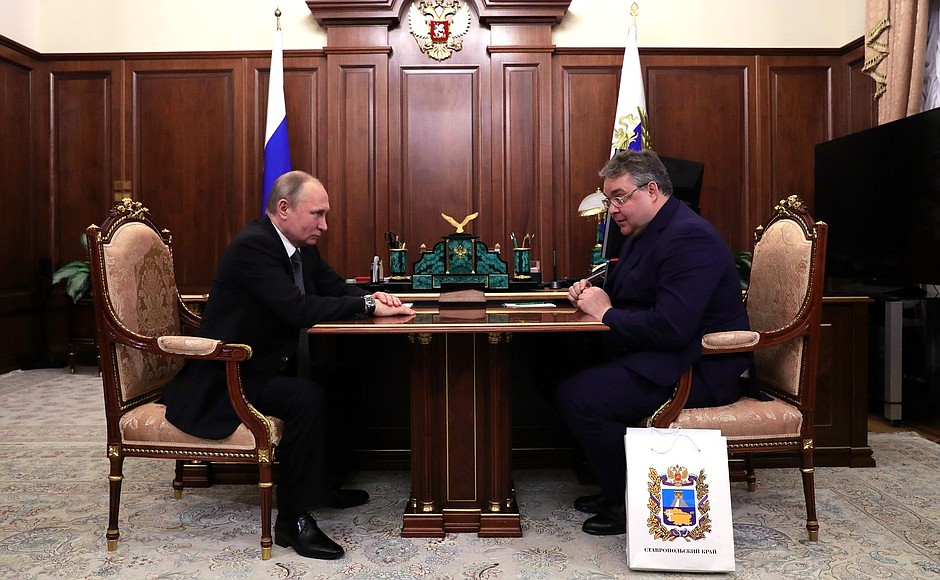 The meeting focused on the implementation of certain provisions of the Address to the Federal Assembly in Stavropol Territory. The Governor reported that the Children’s Medicine project is ready for implementation, as well as projects for a 22,000 square metre local cancer centre and a unit in a territorial hospital. As part of the Urban Environment programme, the region has landscaped more than 200 residential courtyards and 21 public areas. Some 471,000 people from big cities with populations of over 20,000 participated in selecting the facilities to be restructured or renovated. The region has its own programme of local initiatives that allows members of the public to address their requests for a sportsground or a cultural centre, a road, a park or a garden to local administrators who will then apply for competition-based funding from the territorial authority. Over the past year, some 119 such facilities were built thanks to the programme, with 198 planned for this year. 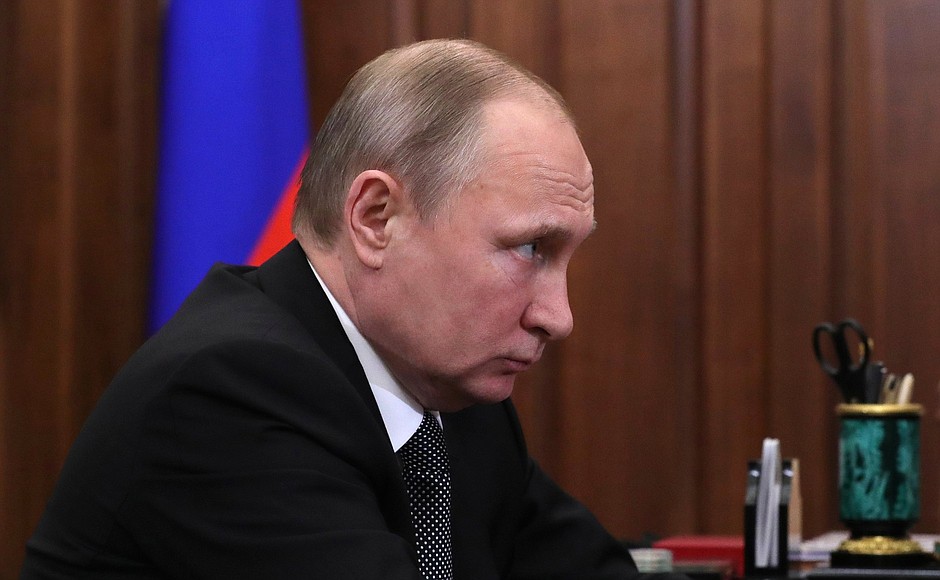 As concerns culture, Vladimir Vladimirov reported that the local officials decided to finance rural community centres. Nineteen centres have already been renovated and two have been built. The source of information - http://en.kremlin.ru/events/president/news/57173 Meeting with Central Election Commission Chairperson Ella Pamfilova Vladimir Putin met with Central Election Commission Chairperson Ella Pamfilova. April 3, 2018 - 09:45 - The Kremlin, Moscow 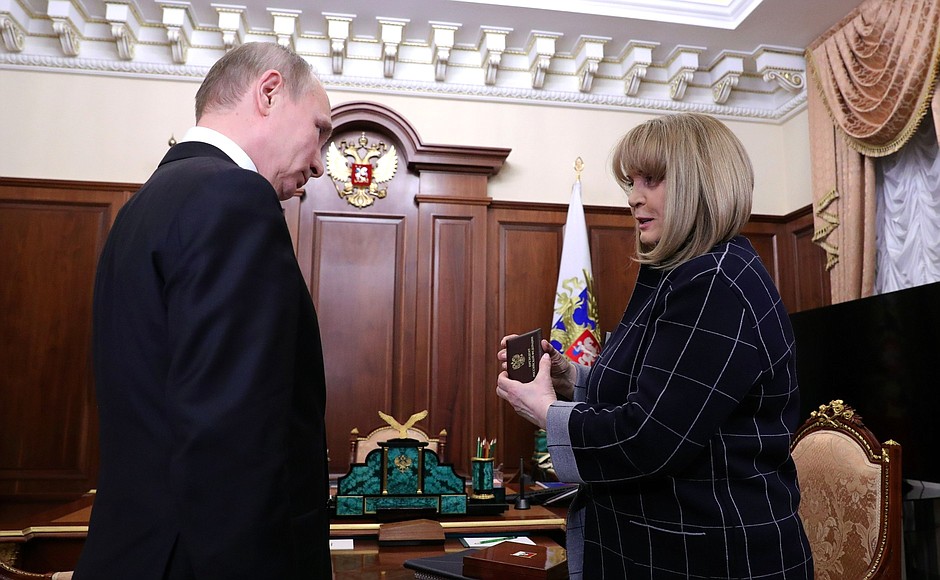 Central Election Commission Chairperson Ella Pamfilova: Mr President, I would like to congratulate you on your convincing victory at the election and to present your certificate. President of Russia Vladimir Putin: Thank you very much, Ms Pamfilova. I would like to express gratitude to all your colleagues who worked during this election campaign. It was a big nationwide job of great significance for the country. The popular opinion is that you all performed your job at the top technical and organisational level. Many people have said that it was the most transparent and honest election in our country’s history. This is certainly your personal achievement and the achievement of members of all election commissions across Russia. 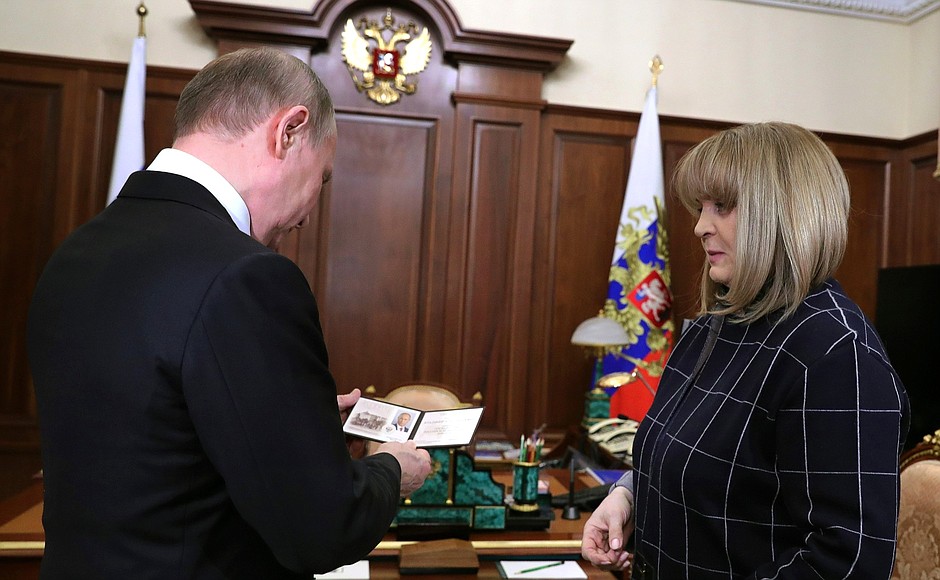 Ella Pamfilova: Thank you very much. We have completed our report, and many facts I will mention today are truly unprecedented. There is a special chapter comprising things that happened for the first time. It has the complete data. It is true that the level of public trust is unprecedented. Even the polls held after the election put your rating at 88 percent. In other words, the overwhelming majority of our citizens accept the election results as reliable. It was the first time that we reported such a high figure, 88 percent. We proposed a substantiated multi-level system of filters to preclude any violations. This has produced the desired effect. Therefore, I believe that openness at our elections was unprecedented, without par in the world. It comprised video monitoring, including at territorial election commissions, the use of the QR code, the Mobile Voter app, as well as the awareness-raising campaign. Overall, we had more than 97,000 election commissions, over 97,000 voting stations, plus 401 polling stations in 145 countries around the world. What achievements can we report? We have created highly transparent conditions for the public observers. Everything was open to their scrutiny. We never installed video monitoring systems at the territorial commissions before, and there is nothing like it anywhere in the world. We did this to ensure compliance with protocol. We also used QR codes: the computers for this were installed at nearly all commissions. It was really impressive. We had over 1,500 international observers and nearly 500,000 national observers, a record figure, because it included observes from civic chambers. 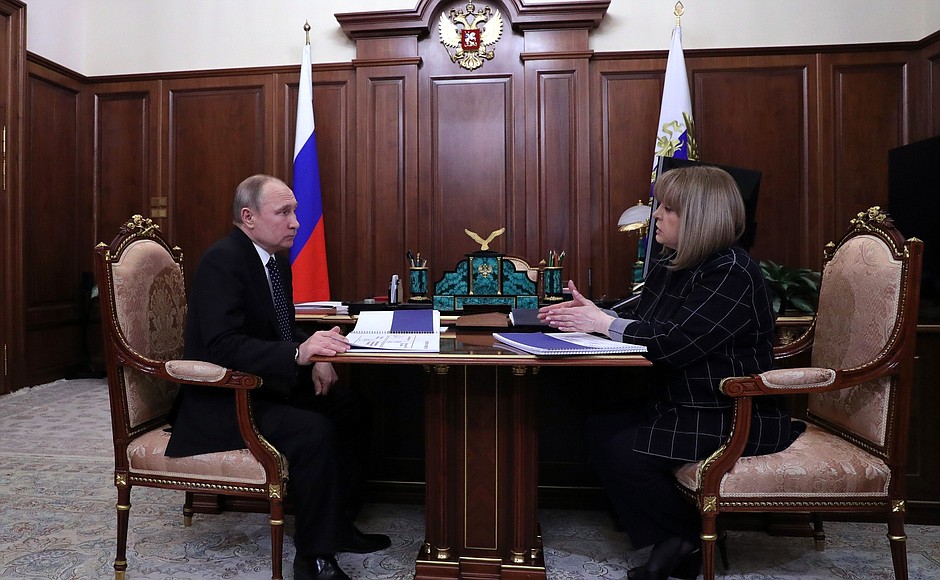 Vladimir Putin: You call them CEC volunteers, don’t you? Ella Pamfilova: Yes, we had those as well, all of them young people. This is very important, because we did a big job with our public organisations, including those that represent people with disabilities, who comprise over 12 million voters. It was vital to provide volunteer assistance to these people, many of whom wanted to cast their ballots at the polling stations. Moreover, we have increased the number of stations accessible to people with disabilities fourfold. Many people do not want to cast their ballots at home. They want to go to the election stations because elections are a festive occasion. We did our best to help them to do so. This diagram is based on QR code results. We processed 99.99 percent of the ballots by 3 am. The remaining 0.01 percent concerned data from voting stations outside Russia. In other words, we processed the ballots in half the time it took us at the 2012 election. This is a major technical achievement. The new Mobile Voter app helped attract many people who had never cast their ballots before. Russian society has become highly mobile, and many people no longer live where they are registered, or they may work elsewhere. This time they were able to vote. About 1.6 million people obtained absentee ballots during the 2012 election. If we subtract this number from the 5.69 million voters who used this mechanism, it turns out that some four million people took advantage of this opportunity. 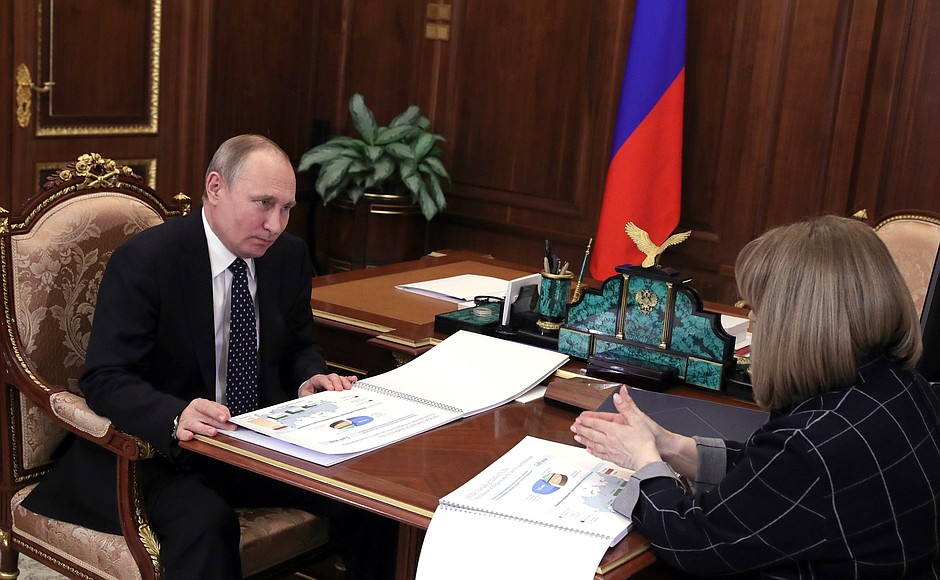 Vladimir Putin: Why is this better than absentee ballots? Ella Pamfilova: It is better than absentee ballots because we abolished two legally binding provisions during the latest election. In the past, people could only vote at those polling stations where they were registered. For example, if a person is a registered resident of Magadan but works in Kaliningrad, he had to buy a ticket, go home, get an absentee ballot, and only after that, he could go back and vote. Now this is no longer necessary. Any person could submit an application wherever he or she lives via the government services website, via integrated government services centres and territorial commissions 45 days before the election and choose the nearest voting station. All this data was entered into the Elections State Automatic System, and people could cast their ballots without any problems. Actually, this considerably increased voter turnout. We cooperated very closely with the Federal Agency for Tourism. The people working or on holiday abroad found this very convenient. As you know, an unprecedented number of Russian citizens voted abroad, an all-time high. 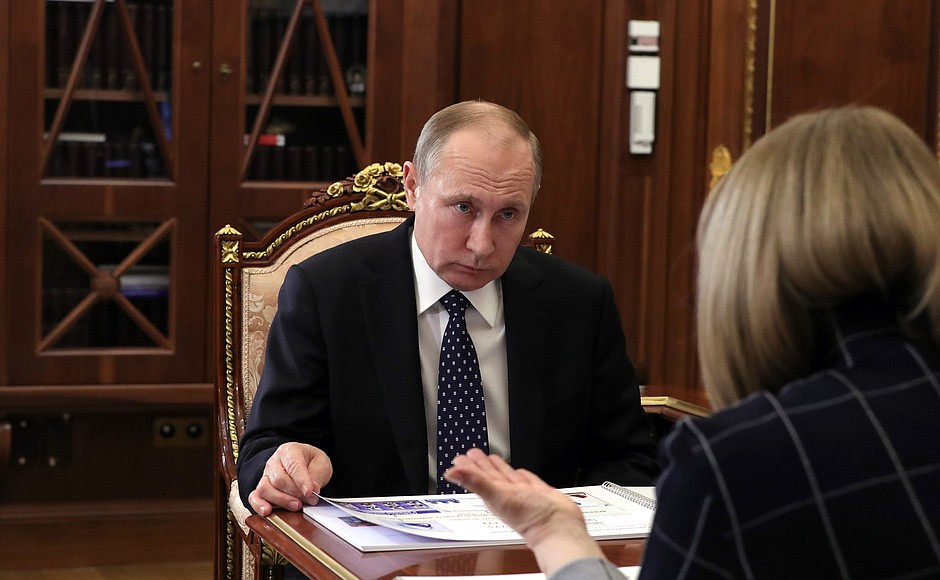 Vladimir Putin: Most importantly, this made it possible to guarantee the constitutional rights of citizens and voters. Ella Pamfilova: We tried to take into account all voter categories, including those who were running late, registering just a few days in advance – we had a special mechanism for them. All security levels were also high. Vladimir Putin: Thank you. The source of information - http://en.kremlin.ru/events/president/news/57178 Meeting of the State Council on promoting competition In the Kremlin, Vladimir Putin chaired a State Council meeting on priority areas of activity of the Russian regions to promote competition in the country. April 5, 2018 - 14:50 - The Kremlin, Moscow 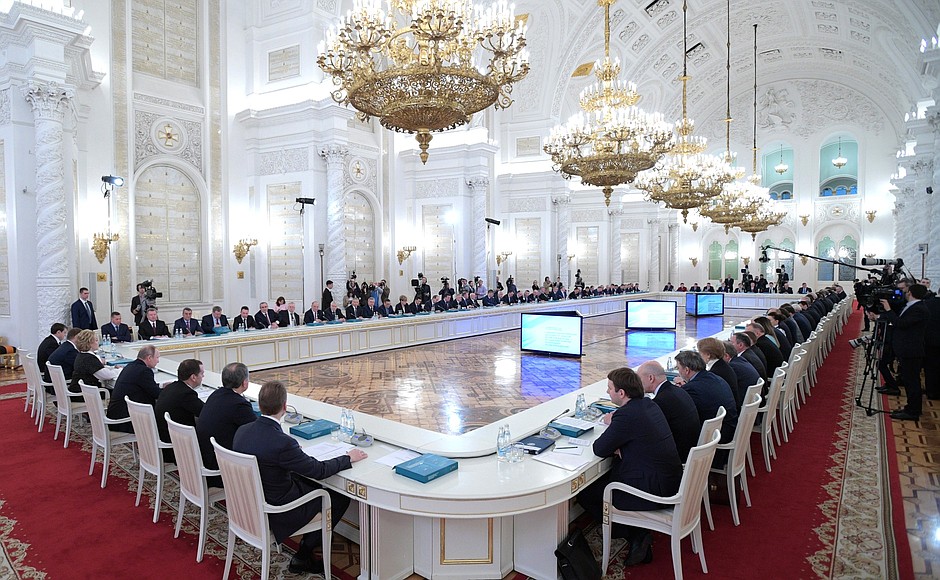 Head of the Republic of Udmurtia Alexander Brechalov, Head of the Federal Anti-Monopoly Service Igor Artemyev, Minister of Economic Development Maxim Oreshkin and Governor of the Ulyanovsk Region Sergei Morozov presented the main reports. The meeting participants discussed the measures needed to achieve the goals set forth in the Presidential Executive Order No. 618 of December 21, 2017 on State Competition Policy Guidelines. 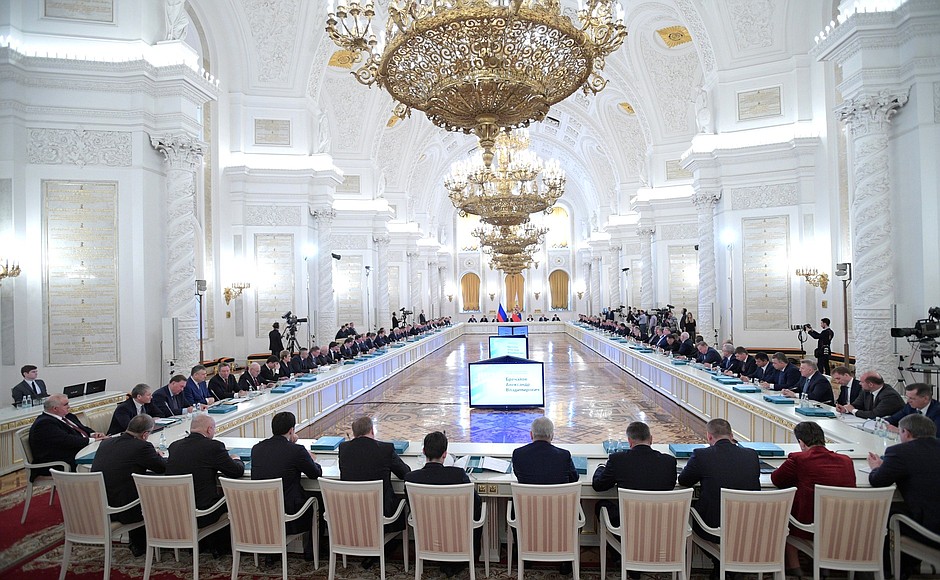 President of Russia Vladimir Putin: Good afternoon, colleagues, Today we hold the first meeting of the State Council after the presidential election. You know what ambitious tasks the country has. They require that everyone engages in their solution as effectively as possible: the civil society, businesses and government bodies must work together. And, of course, the efforts of all the Russian regions are needed. Promoting competition in Russia is the subject of our meeting. First of all, I would like to say that this is a key area of our work. We cannot do anything without solving tasks in this area; we cannot reach any goal. Let me stress once again that the fundamental importance of the competition is determined by the Russian Constitution. As I have already said, this is one of the most important areas in order to reach the goals I listed in my Address to the Federal Assembly. Fair and honest competition is a basic condition for economic and technological development as well as for the country to reform and dynamically advance in all fields of life. 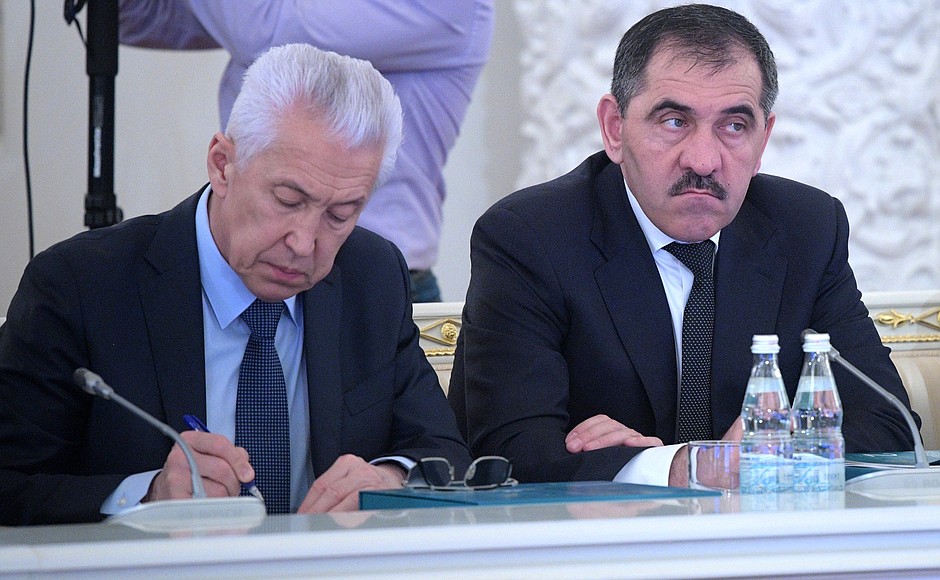 Let me begin with regulations in this sphere. In general, they are in line with international standards. Recently we have approved four packages of antimonopoly laws. The main thing is to provide the corresponding legal precedents. Unfortunately, there still are many cases when the competition law is ignored, especially by local authorities. Let’s see what we have in practical terms. Of the total number of antimonopoly law infringements in 2017, 1.2 percent falls to federal authorities, and 98.8 percent, to regional and local authorities, which means Russia is not paying enough attention to this. We think this is some kind of nonsense, nothing serious; figuratively speaking, people must care about their companies, state unitary enterprises and municipal unitary enterprises. I will talk about this later. To be quite frank with you, the damage to Russia’s economy is enormous. We cannot see or feel it, but it is huge. Currently, the Federal Anti-Monopoly Service is developing the fifth legislative package. But in addition to the legislation, the managerial logic must change, too. I believe the most important task is to introduce pro-competition approaches in government agencies. 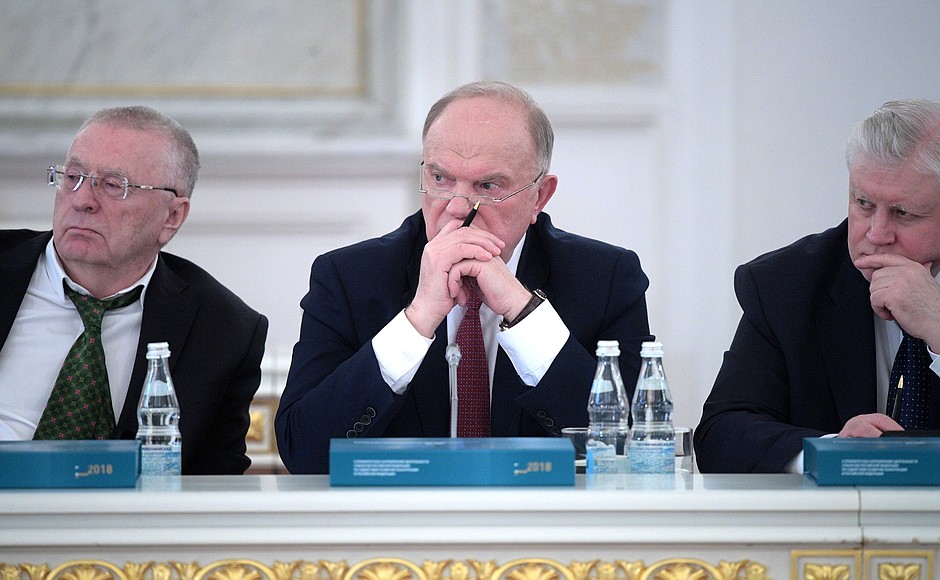 However, the approaches based on encouraging competition are very rarely used. The reason lies in a customary and long-standing bureaucratic mindset and the lack of commitment to building an economy of state or municipal procurement that would be beneficial to the region and its residents. As I said, it is easier to work with local state and municipal unitary enterprises than select efficient contractors in the competition-based market. This practice leads to higher budgetary spending and preserves outdated production and low quality. Eventually, it affects consumers, Russian citizens. It should be particularly noted that public and state-run companies are occupying the niches that could be taken by small and medium-sized businesses. They are forcing SMEs out of the markets and monopolising these markets. Therefore, cartels are growing in the industries with high competition; entrepreneurial initiative and motivation to open a business get undermined. People believe they have little chance to succeed in the markets taken up by public and state-run companies; that it is difficult to win a state or municipal order through honest competition. Public and state-run companies have very different opportunities for lobbying and funding. They can access loans much easier. They also have instruments to turn tenders in their favour and we are aware of them. For your information, in 2017 some 675 court cases on anti-competitive agreements were filed, including 360 cases on cartels. This is eight percent higher than in 2016. For the second year in a row, the construction industry is number one for this kind of violations. 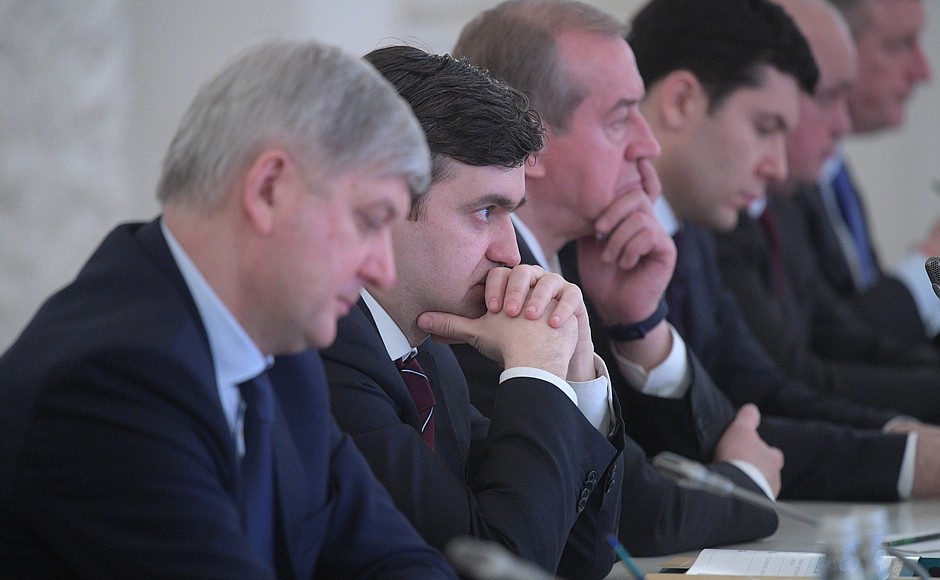 We have discussed these problems many times. We have taken a number of decisions, specifically, those that would expand the access of small businesses and socially-oriented NGOs to state and municipal orders and services. Apparently, this is not enough. I would like to hear about the current state of affairs and what specific measures you plan to take. It is also necessary to create a single register of state and municipal property with full information on rights to it, encumbrances and designated use and, while this work is in progress, to activate the identification of unrecorded or inefficiently used real estate and plots of land. This subject has been discussed for a long time, but, unfortunately, there is no real progress here so far. In this regard, I propose to discuss in detail improving the efficiency of management of state and municipal property at one of the State Council meetings. Since 2015, the regions have started to implement the competition development guidelines, approved by the Government. For a number of Russian regions, this has become a real incentive to support competition. This is so, we can see it. But in general, the country has no systemic changes for the better. In December last year, an Executive Order was issued, which stipulated competition promotion as a priority for the authorities’ work, while the National Plan for 2018–2020 outlined specific industries and the targets of competition development in them. 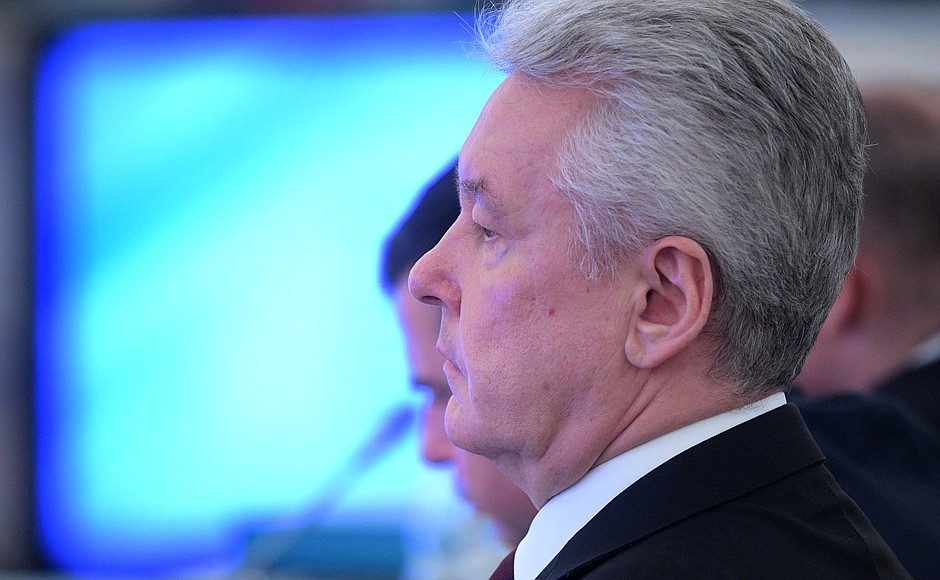 I believe that the same subject areas need to be defined for each region – of course, this work should be carried out together with the regions, taking into account their specifics and capabilities. Thus, regional teams will have clear indicators as regards the creation of a competitive environment, as well as obligations to develop private enterprises in priority markets, including new ones, digital ones, and so on. I would like to point out another important problem – the trend towards the development of so-called regional protectionism. The motives for such actions are clear: the regions try to create favourable conditions for local producers and to simplify their access to the market. Meanwhile, I would like you all to hear it now: a local producer means a Russian producer, this is extremely important. But we can see regional protectionism even in those regions that are in the forefront and show good development results. This is absolutely unacceptable. I would like to draw your attention to this. I agree that it is possible and necessary to use regional preferences for supporting business and thus to increase employment and incomes of residents and revenues of the budget. However, it is one thing when benefits are equally available for everyone but it’s another story all together when discriminatory restrictions are created for entrepreneurs from different regions or bans are imposed on the imports of goods. This directly contradicts the principle of the unity of the country’s economic space. Such overprotection is distorting the competition environment. 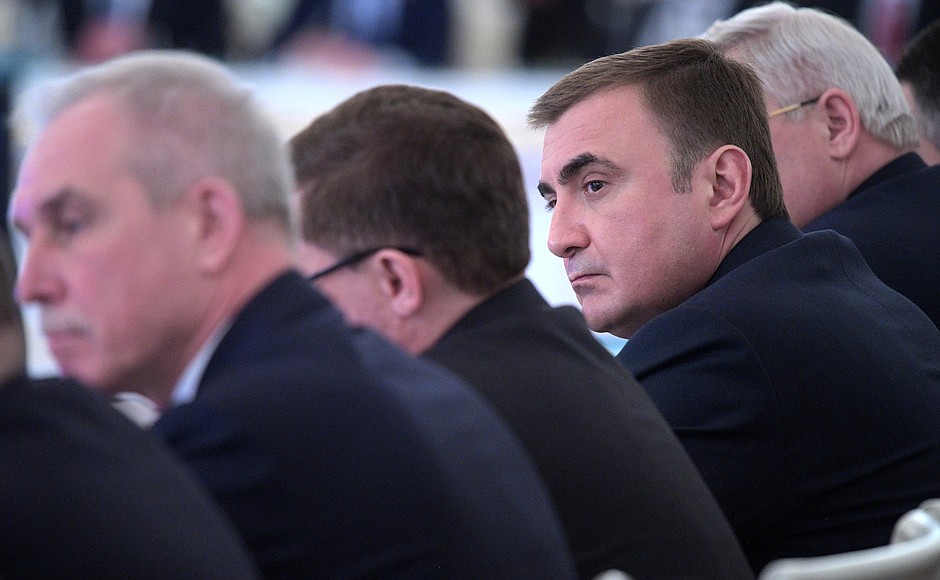 I would like to add that having got hold of these artificial advantages such companies, and you understand this full well, will become less effective in the long term and will impose on you low quality goods or services for inflated prices. I would like to make two important points in this context. First of all, each of our steps aimed at supporting industries, companies, including as part of the import replacement, should encourage the production of modern competitive goods and services that are in demand both on the domestic and international markets. The second thing I would like to point out is that it is necessary to take a general look at the markets and consider the prospects of the demand to prevent exclusive terms for projects and investors in some regions from having an adverse effect on the development of successful similar companies in other regions of the Russian Federation. It is necessary to search for and find a balance as well as ensure fair and equal competition. I am quite sure that everyone will have enough work if managers do their job properly. Let me repeat that for a breakthrough in national development it is critical to ensure economic freedoms and a high level of competition. Very much depends on the state and all levels of the authorities. But, of course, business itself is playing an enormous role in forming the business climate, the ethics of entrepreneurship and the practice of fair competition. 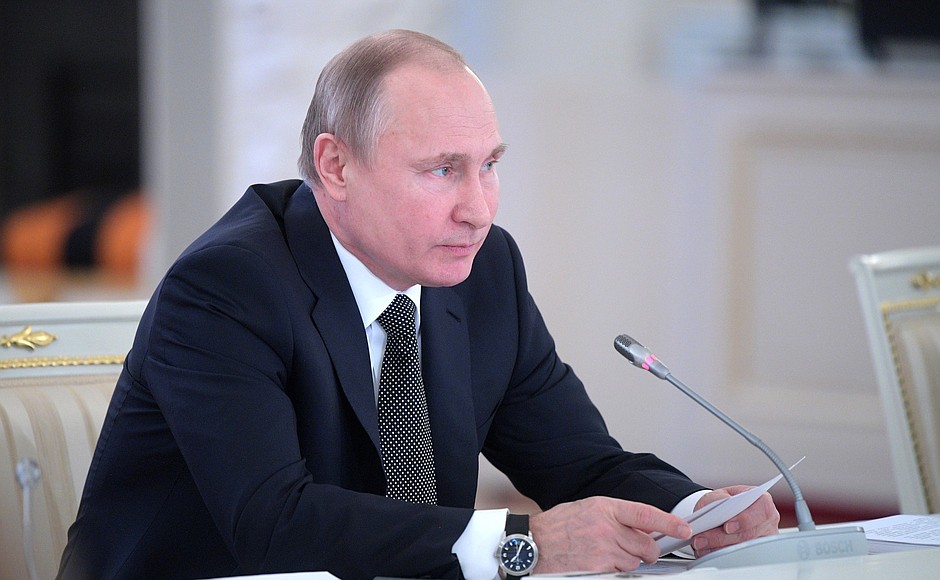 It is clear that profit is the main priority for a business but it should not be gained at any price. You know why I am talking about this today and why responsibility of business to the people and society is so important. Entrepreneurs should work honestly and conscientiously. They should not be timeservers that are only worried about their own prosperity. We have huge tasks and goals lying ahead. I believe the business community understands just how important its contribution to a breakthrough in national development is. And once again I would like to appeal to every single one of you: we cannot afford to waste any time! The source of information - http://en.kremlin.ru/events/president/news/57205 Meeting with Acting Governor of Kemerovo Region Sergei Tsivilev Vladimir Putin had a working meeting with Acting Governor of the Kemerovo Region Sergei Tsivilev. April 5, 2018 - 19:50 - The Kremlin, Moscow 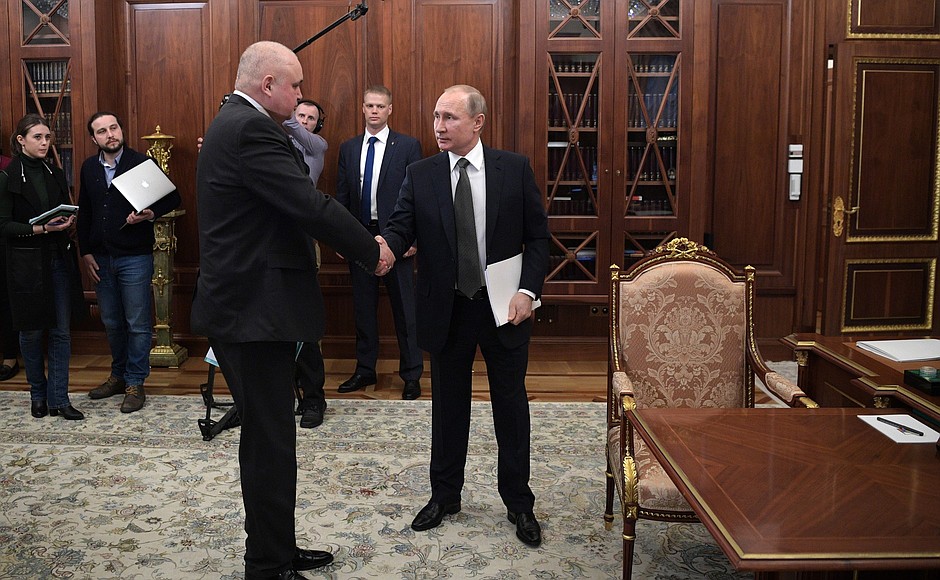 The meeting covered current issues of the region’s socioeconomic development. In addition, Sergei Tsivilev updated Vladimir Putin on the work done to provide comprehensive assistance to the families of those killed and injured in the fire at the Zimnyaya Vishnya shopping mall in Kemerovo. President of Russia Vladimir Putin: Mr Tsivilev, you happened to take office as acting head of the Kemerovo Region in troubled times, one can say, in a critical situation. But this must concentrate your mind on working efficiently and, I would say, summon up all your strengths – and you certainly have enough of them, you have revealed them in different positions. I really hope that people will consider all that when you take up this work. As to the efficiency of the regional team, according to the Russian Government estimates, not the Presidential Executive Office but the Government, it ranks 73rd place among all Russian regions in efficiency. Not a terribly good rank, it would seem, but there are apparent positive trends – financial self-sufficiency, the reliable and very stable financial policy of the previous authorities and the previous governor. All that constitutes a good foundation for efficiency in the short, medium and long term. Kemerovo is an acknowledged leader in industrial applications of coal, in iron and steel industry, full cycle. Recently we have been witnessing – in the past year and early this year (the first two months) – steady growth in industrial production, steady growth in foreign trade. This means there are positive resources that can and should be relied on in your work. I would like to listen to your initial assessments. How long have you been there? 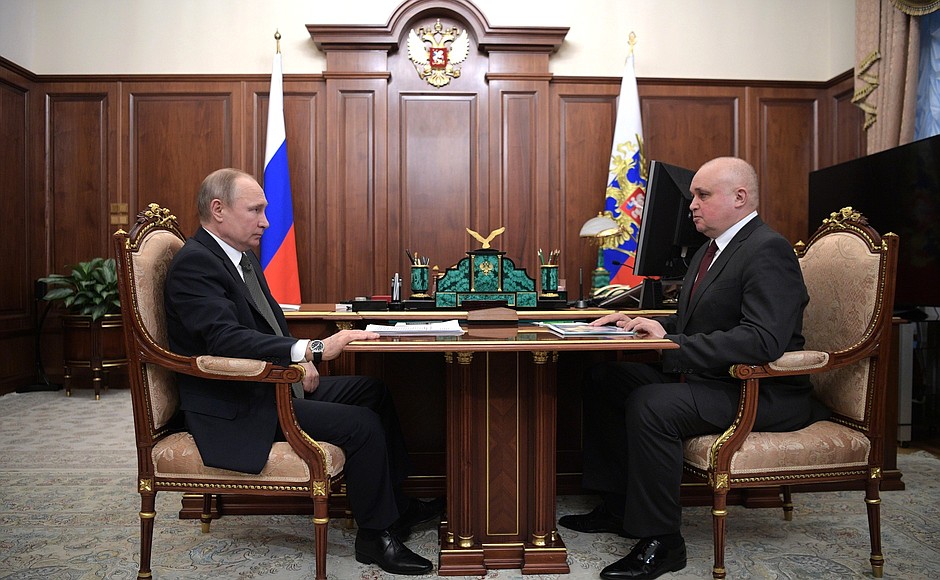 Acting Governor of the Kemerovo Region Sergei Tsivilev: A little over a month. Vladimir Putin: You already have an overall picture of what kind of a region it is, how wealthy it is, how good its prospects are. I would like to hear your assessments and your priorities as you begin your work. 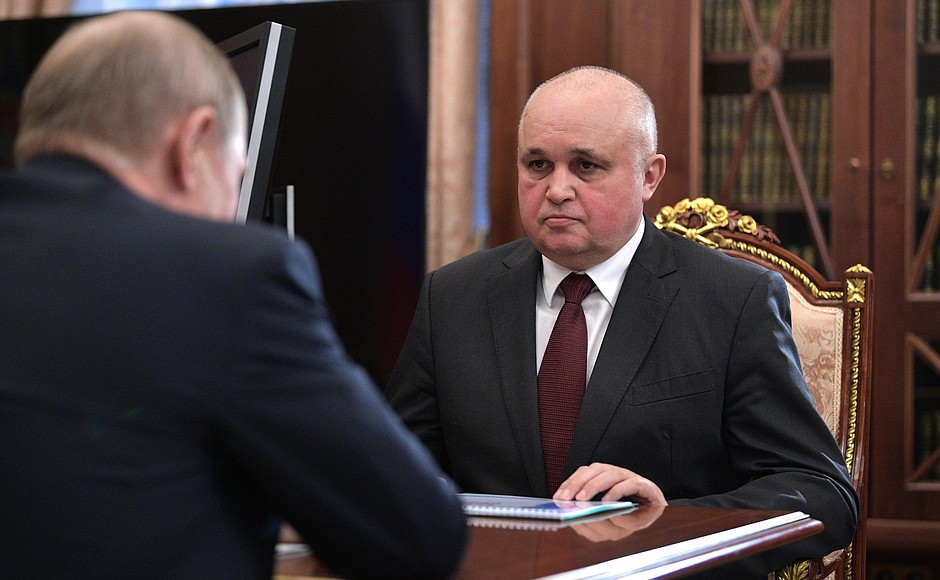 Sergei Tsivilev: Kemerovo Region is indeed unique. Firstly, it is a ‘region of six seas’, and our exports are shipped through its terminals. Last year we extracted 240 million tonnes of coal. Kemerovo Region is a strategic partner of Russian Railways because the region alone accounts for 38 percent of their freight. The greatest potential of Kemerovo Region certainly lies in its people. We now have to work with each family individually to help everyone who suffered in this tragedy. We are simultaneously taking steps so that such a tragedy never happens again. We want to make Kemerovo Region prosperous. It is a large venue for fine-tuning modern technologies of coal extraction and preparation, coal fuel chemistry. And the region’s potential is really tremendous. We intended to do everything we can to make Kemerovo Region a leader of the Russian economy. 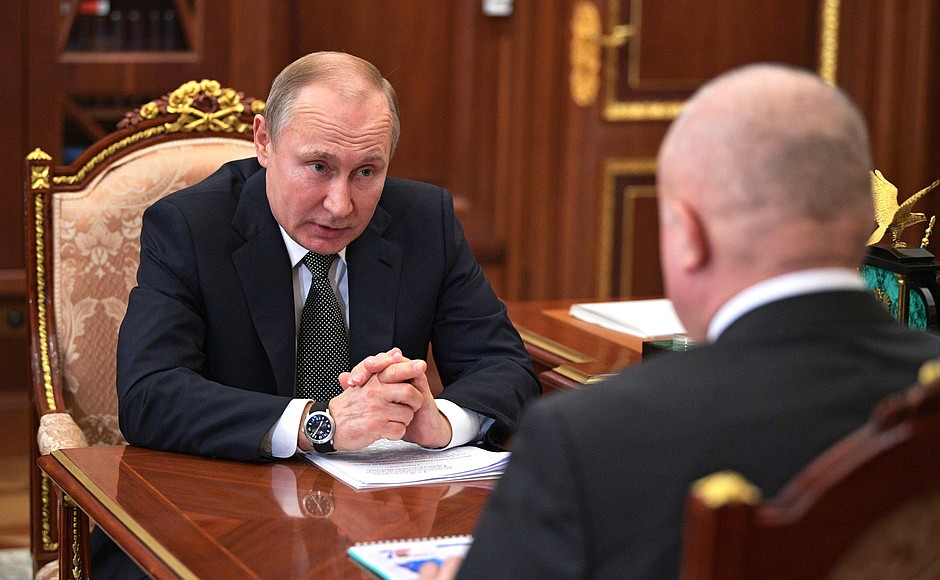 Vladimir Putin: Mr Tsivilev, the potential is indeed very good. However, apart from industrial production, apart from economic development, solving social issues should certainly be a focus. One of them – and I know that you are going to raise this issue – is relocating people from hazardous housing. We have been working constantly to address the issue though, unfortunately, not as fast as we would like. In the past two years, 1.6 billion rubles were allocated to Kemerovo from the federal budget, about 901 families have been relocated; however, the demand is much higher. This is what should be done. I ask you to focus on that together with the Government. The Government will be given appropriate instructions. This is number one. The second area that needs to be looked at is healthcare. Unfortunately, we see growing problems in Kemerovo concerning infectious diseases and tuberculosis. I would rather not discuss it but I must, because if we do not, we will not know where work is needed. What this means is that you and the Government – I will definitely issue corresponding instructions to the Healthcare Ministry – must take up those issues, and as soon as possible. I am talking not only about tuberculosis, but also HIV. And the road network. It needs work. You have mentioned that large amounts of freight are carried on Kemerovo roads. This is true. Road density is higher than the national average. Railway density is also twice the average in the Russian Federation. People are working very hard. But there is one more problem – the income level of the population is, to put it mildly, very modest. This is why everything must be done to urge economic actors and the administration to gradually raise wages both in the social sphere and in the economy. Nobody will accomplish that in Russia by force of will. It should be done through economic, market methods. The potential for that certainly exists; I mean the successful development of major industries in Kemerovo Region. And I would also like to draw your attention to one more circumstance, something that you will have to give more time to, well, not really more but as much as needed. There are more single-industry towns in Kemerovo Region than in other regions of the Russia Federation, which is why the problem of single-industry cities must be addressed. There are multiple interrelated problems, but the key one is economic diversification. There is progress in some of the cities, for example, the pharmaceutical industry is developing, the chemical industry as well. There are many projects there, some of them are already underway, and they certainly must be supported. The source of information - http://en.kremlin.ru/events/president/news/57209 Presentation of presidential prizes to young culture professionals and for writing and art for children Vladimir Putin presented 2017 Presidential Prizes to young culture professionals and 2017 Presidential Prizes for writing and art for children and young people. April 6, 2018 - 13:50 - The Kremlin, Moscow 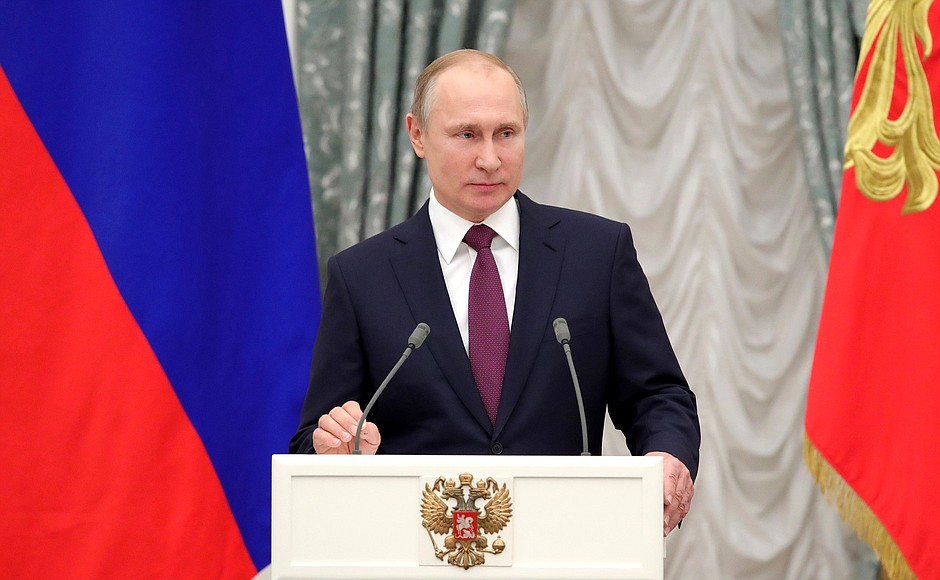 Prizes for young culture professionals have been awarded to: Dina Velikovskaya, animated film director, for her contribution to the development of Russian animation; Sofya Kondratyeva, head of the Museology Department at the Divnogorye National Architectural-Archaeological Museum-Reserve, for creating and implementing innovative museum projects; Denis Rodkin, soloist with the State Academic Bolshoi Theatre, for his contribution to preserving, promoting and popularising the achievements of Russian choreography. Prizes for writing and art for children and young people have been awarded to: Vladimir Retsepter, artistic director of the St Petersburg Pushkin State Theatre Centre, for educational activity; Alexei Rybnikov, composer, for his contribution to the development of Russian music; Vladimir Chikishev, director of the Nizhny Novgorod boarding school for deaf children, for implementing the School–Theatre–Home single educational space programme and for creating the Piano Theatre. 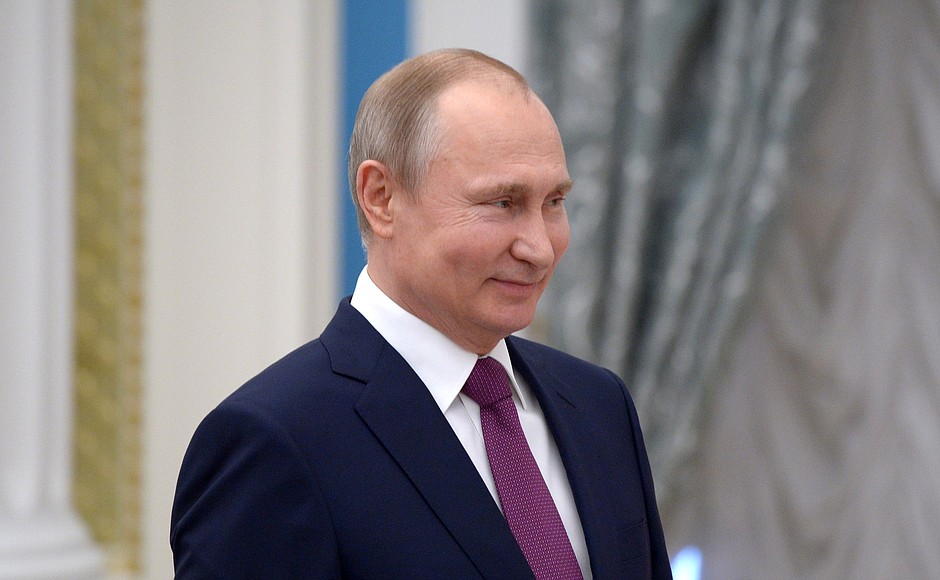 President of Russia Vladimir Putin: Good afternoon, friends. Welcome to the Kremlin and congratulations on your prizes. Today, prizes will be awarded both to young art figures and recognised professionals who created outstanding writing and art for children. 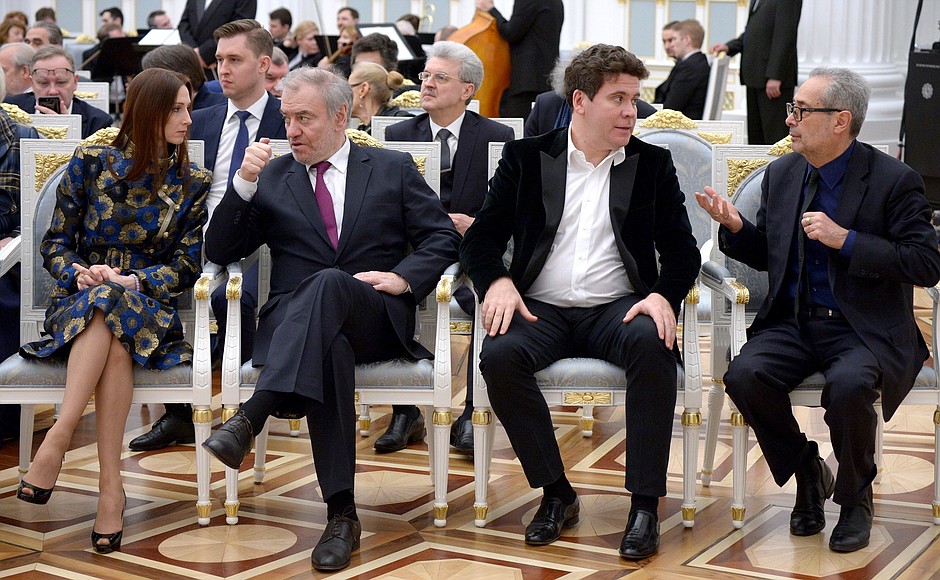 The fact that these prizes will be presented as part of one ceremony symbolises the continuity of our rich cultural traditions and, of course, the unique capability of Russian literature, art and music to awaken the feeling of beauty in the new, young generations. 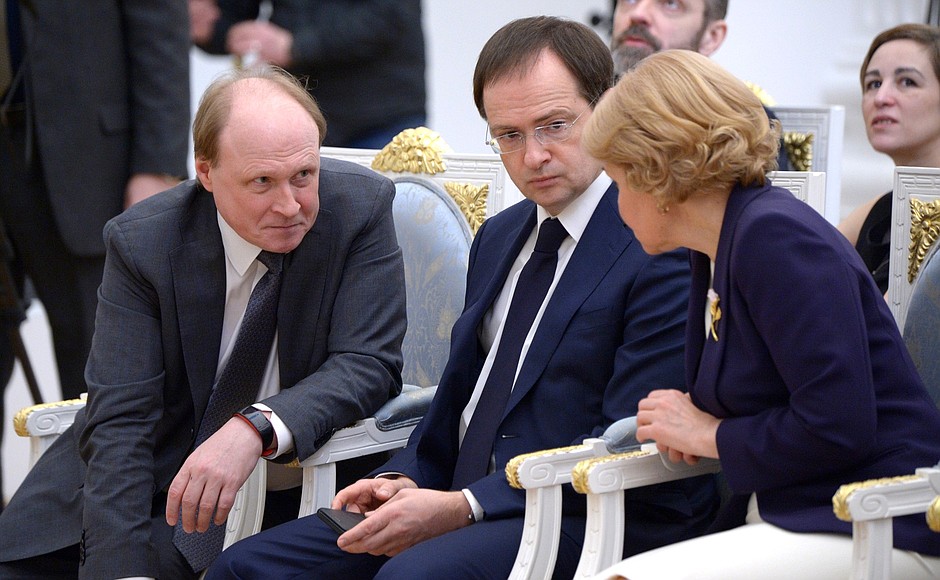 A huge role in the formation of young talents is played, without any exaggeration, by the magical, enchanting music of Alexei Rybnikov. For almost half a century his stunning melodies have been included in the golden fund of Russian art; they sound in more than 80 animated and feature films. Many became classics, and the whole country knows and loves composer Rybnikov. Alexei Rybnikov continues his creative work. The main spectators at his musical theatre are children, and the company mostly consists of young artists. 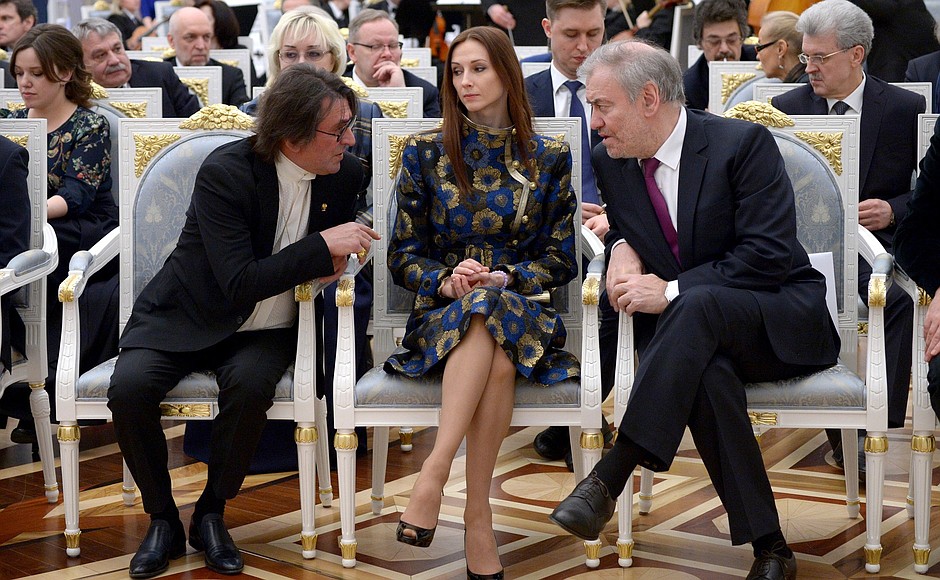 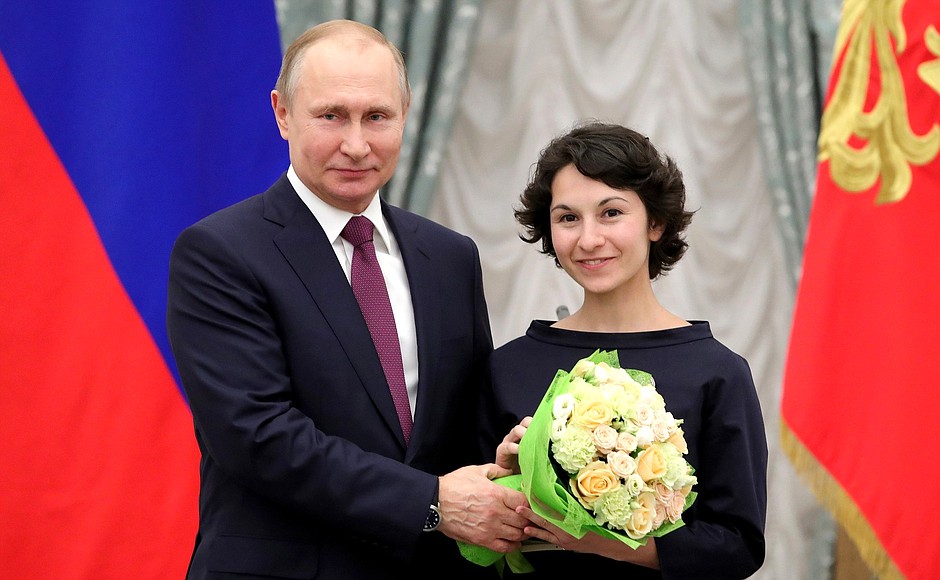 Vladimir Retsepter has headed the St Petersburg Pushkin State Theatre Centre for over 25 years. His plays are a model of the theatrical development of Russian and foreign classical drama. In fact, this is a new educational format that helps modern schoolchildren to understand the meaning of the best samples of world literature and to get answers to questions of concern for them. 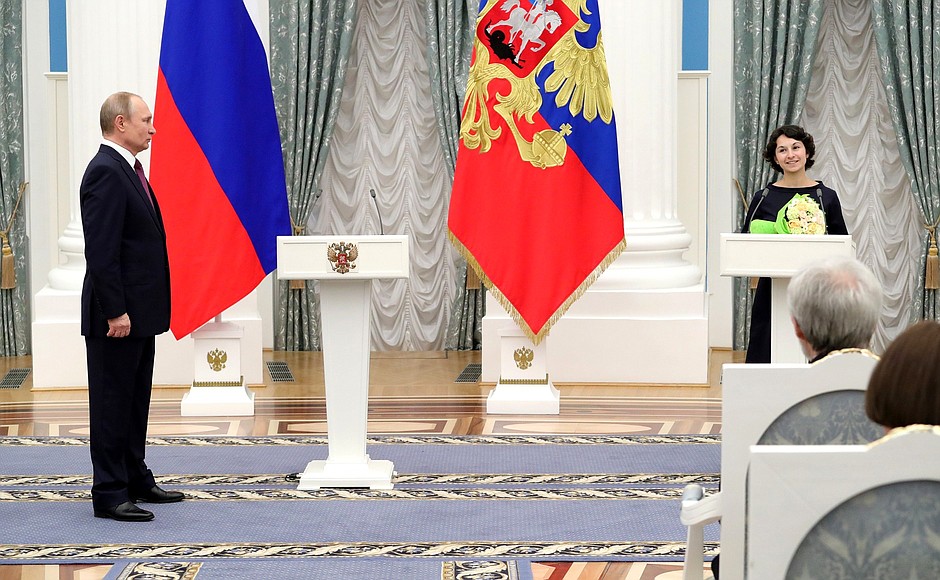 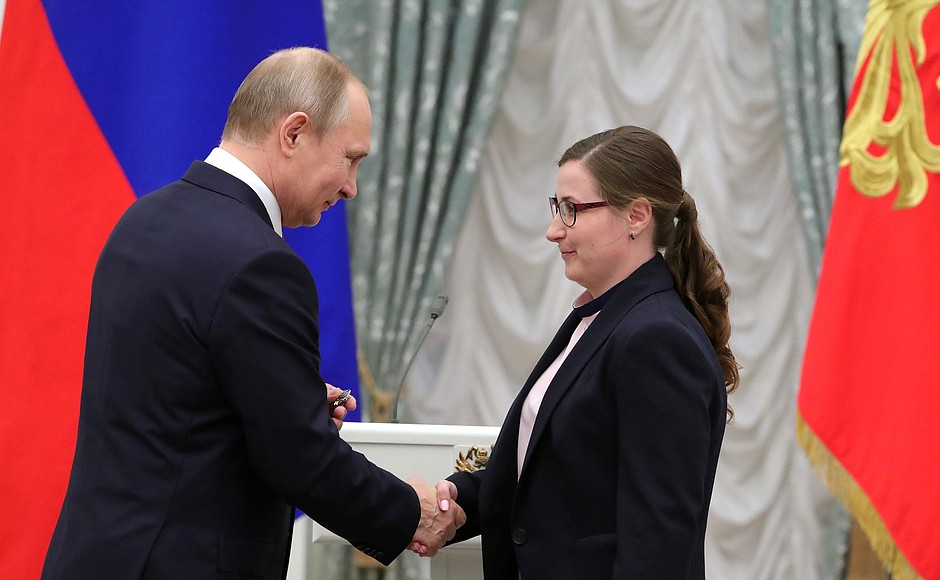 Devotion to art and unlimited spiritual generosity – this is how Vladimir Chikishev’s activity can be characterised. For 30 years, he has been helping children with hearing impairment to create, revealing their artistic nature and strengthening the desire for an active, full life. 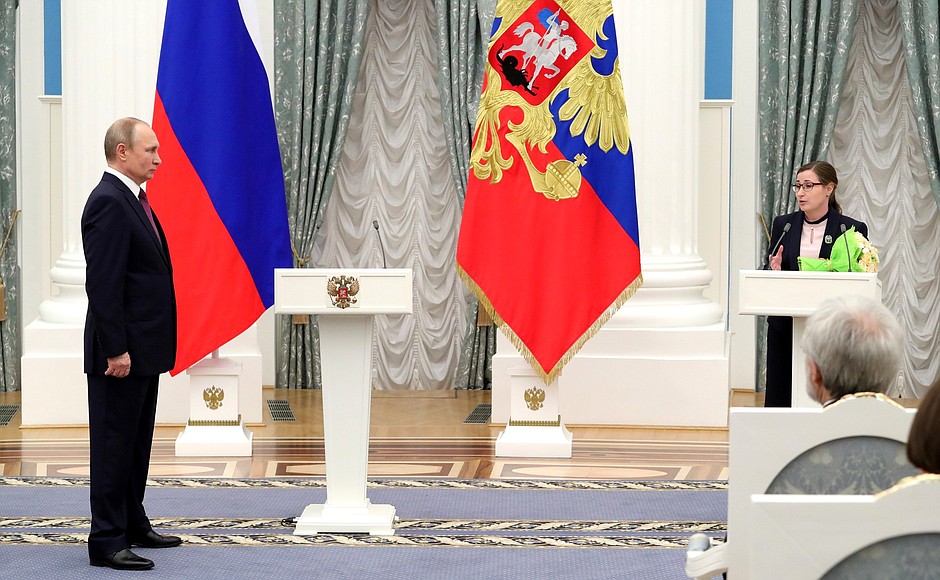 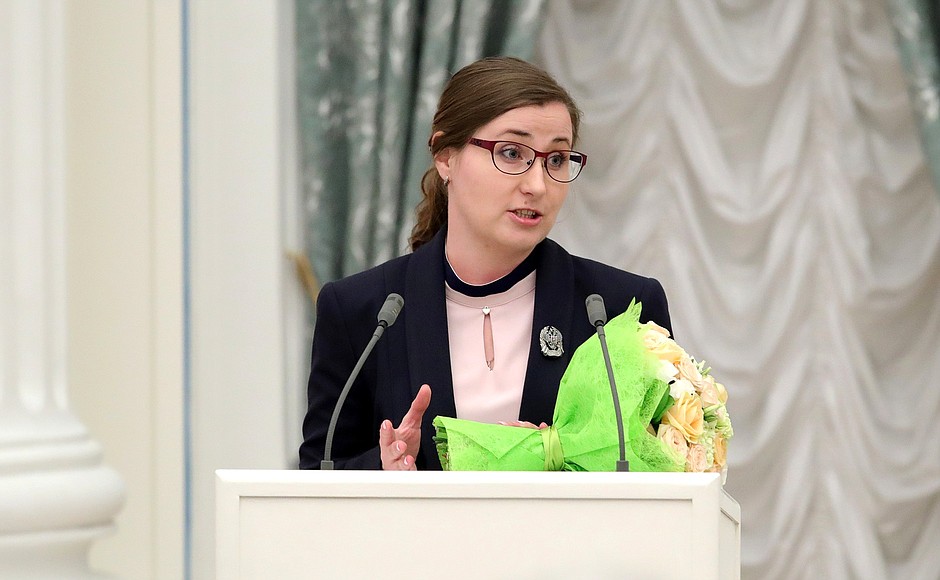 I am certain that today’s winners of prizes for young art and culture professionals also had such empathetic, passionate and experienced mentors. 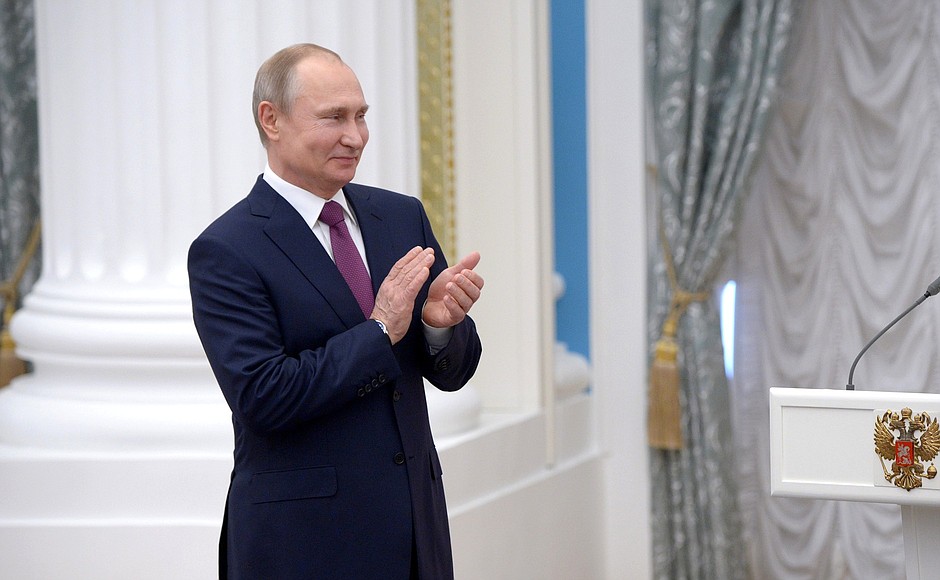 I have no doubt that VGIK teachers are proud of their talented student, animation director and artist Dina Velikovskaya. The main subject of her work is the family and relations within the family, which are sometimes very complicated. Her works show us a world of love and traditional values, which is why both adults and children enjoy them so much. 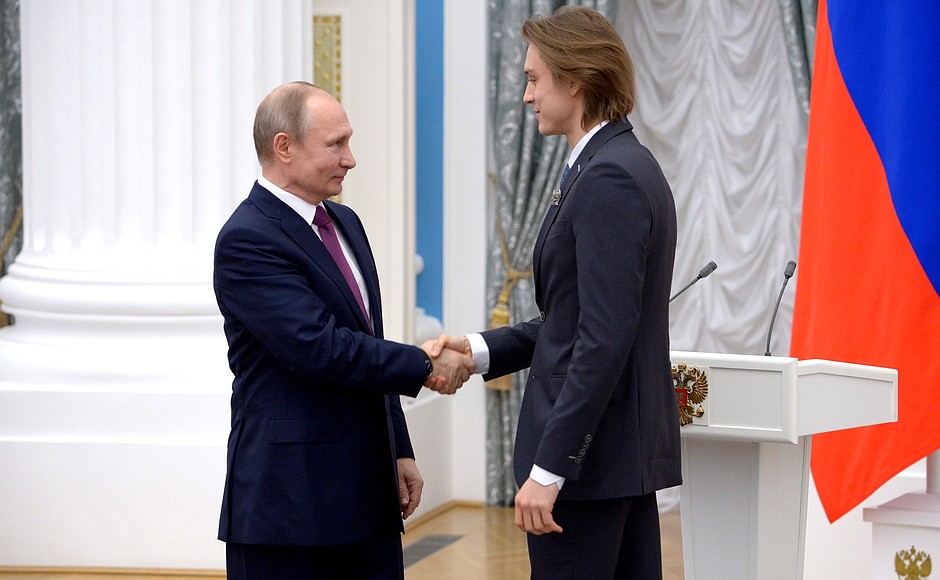 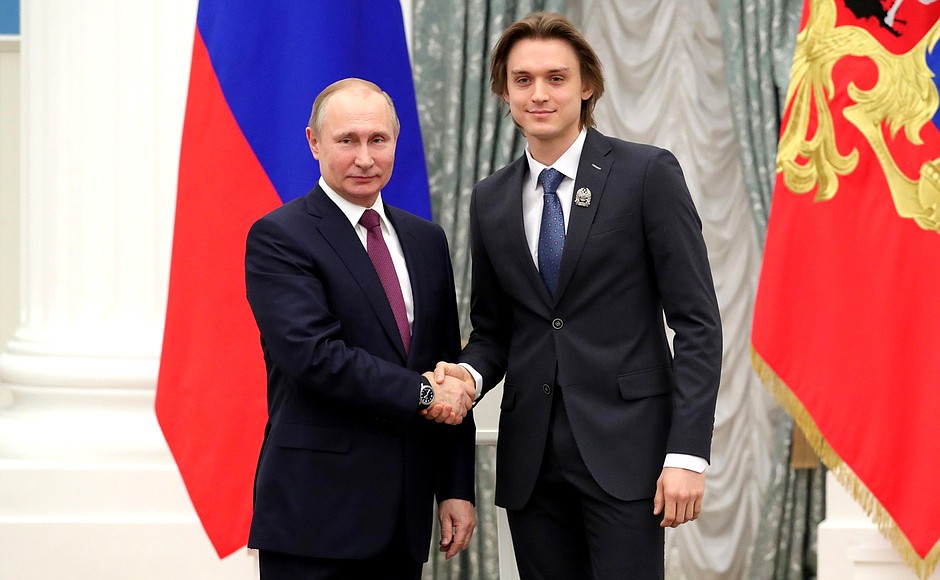 Sofya Kondratyeva is working to encourage people to feel at one with our homeland, Russia, which is our huge extended family. She has been awarded a prize for developing and implementing innovative museum projects about the Palaeolithic Age and unique underground dwelling systems. Sofya Kondratyeva not only supervises research and museum activities at the Divnogorye Museum Reserve in Voronezh but also represents Russia at the International Union of Speleology (UIS). 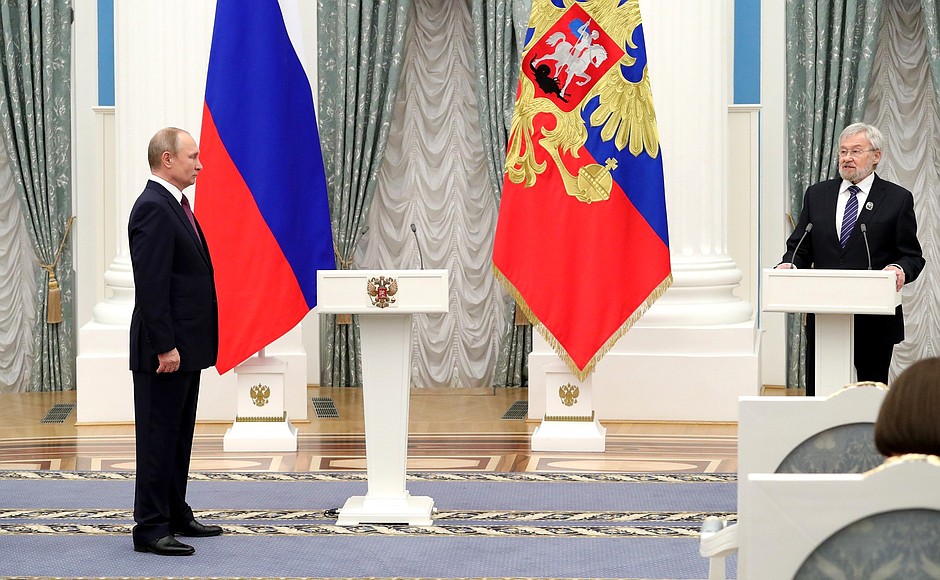 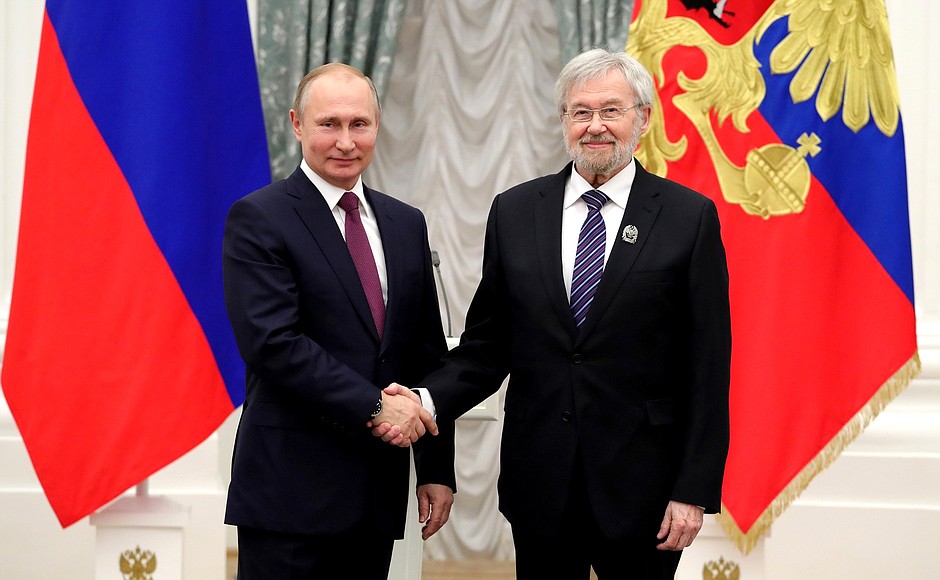 Denis Rodkin has greatly contributed to the preservation and growth of our national choreographic legacy. A principal at the famous Bolshoi Theatre, he is one of the leading ballet dancers of the new generation. His talent and skills have helped him to master both classical and modern dance. This virtuoso universalism is fresh evidence of the extremely high standards of the Russian ballet school and the enduring value of its world-famous traditions. 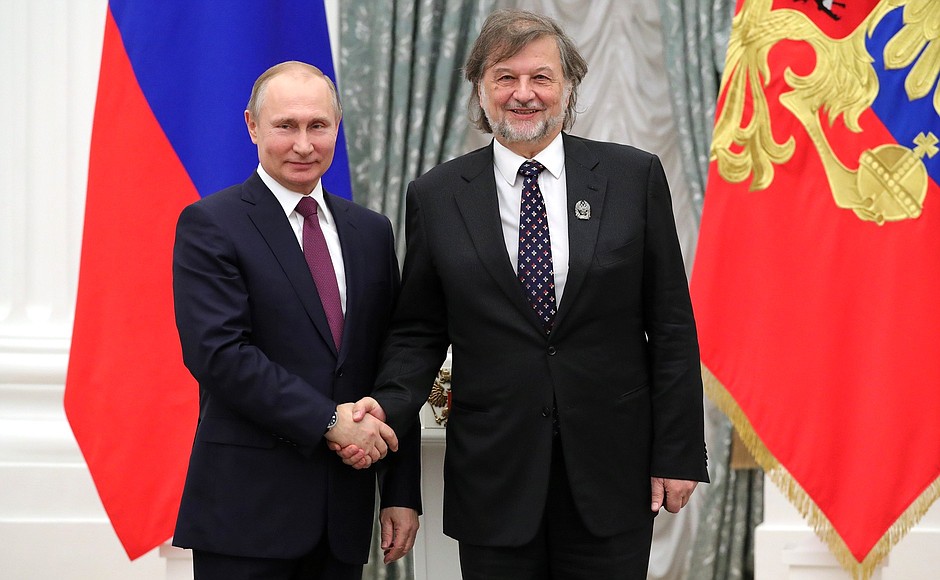 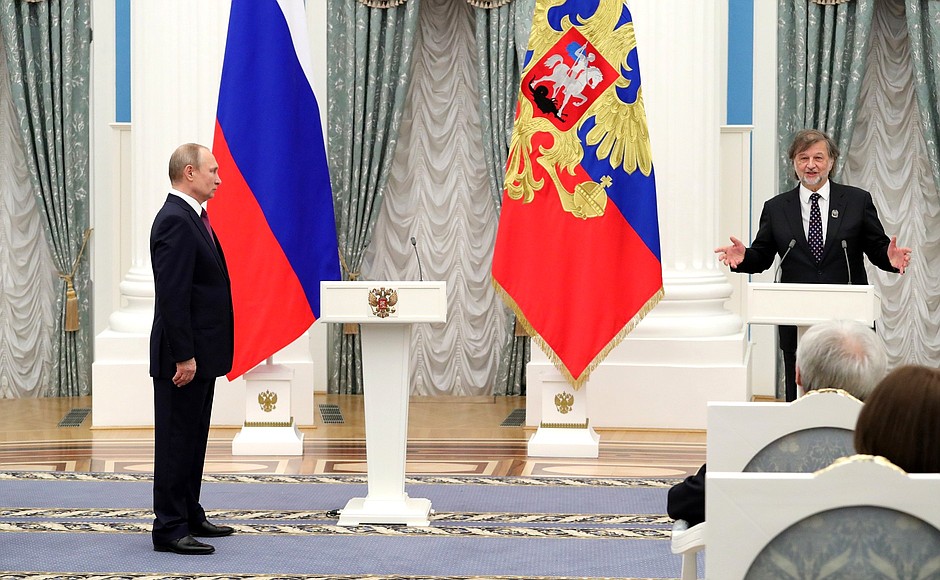 Friends, you come from different generations. You began your creative careers in different periods of our history. But all of you have a keen feeling of the times. You see what is truly good and important for people, and you awaken their desire for creation and knowledge. You awaken lofty sentiments in them. 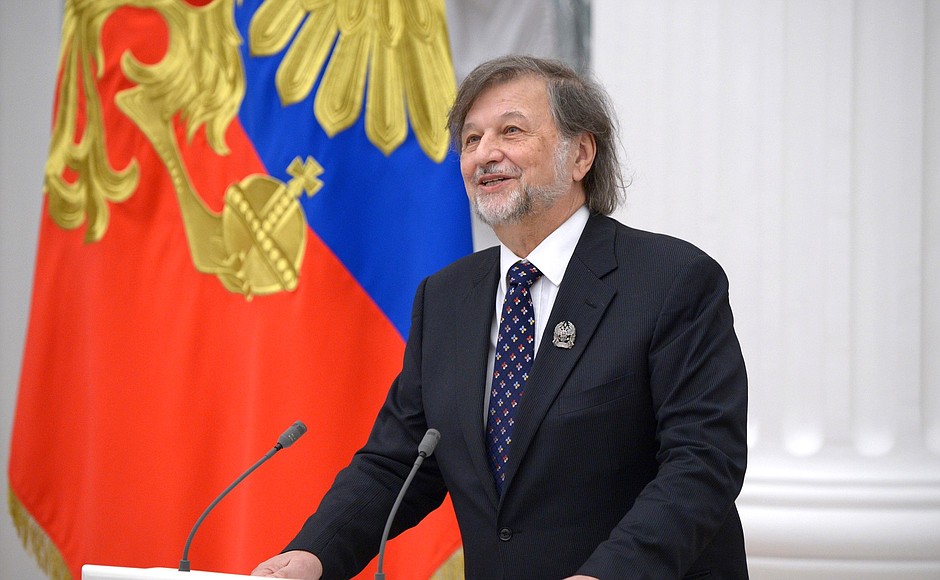 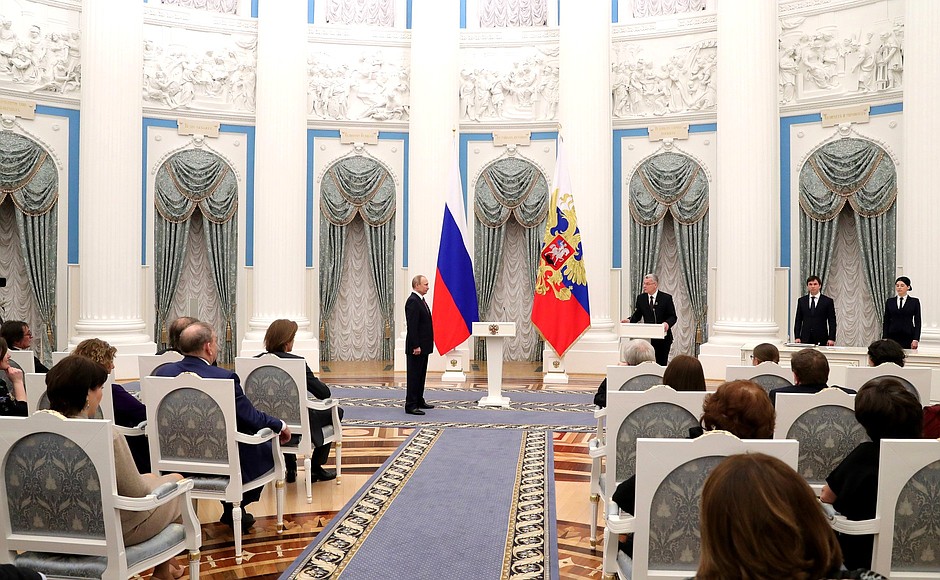 You are also united in your loyalty to the Russian culture, its noble humanitarian mission, and its importance for the survival of Russia and the Russian people. You serve culture honestly and selflessly, and your achievements have added many bright and inimitable pages and facets to our culture. 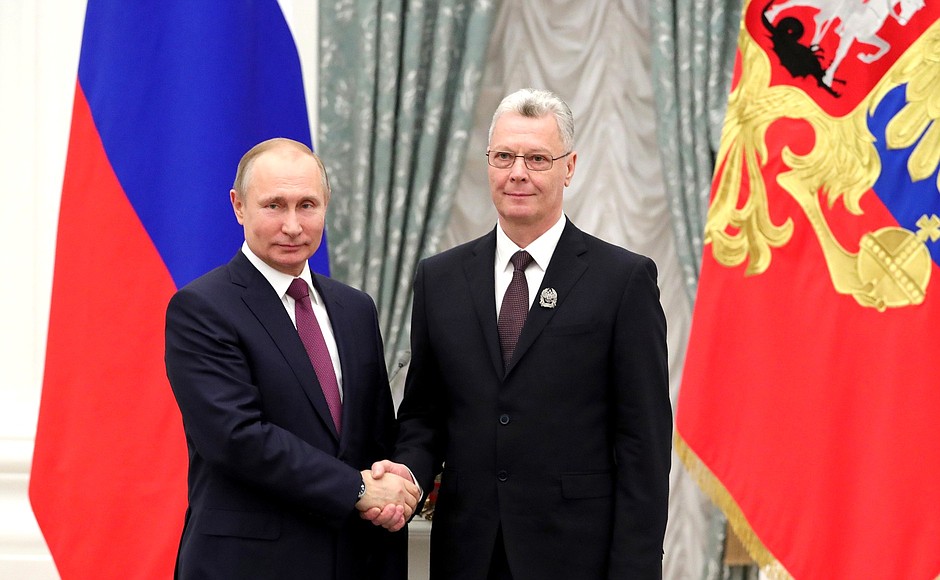 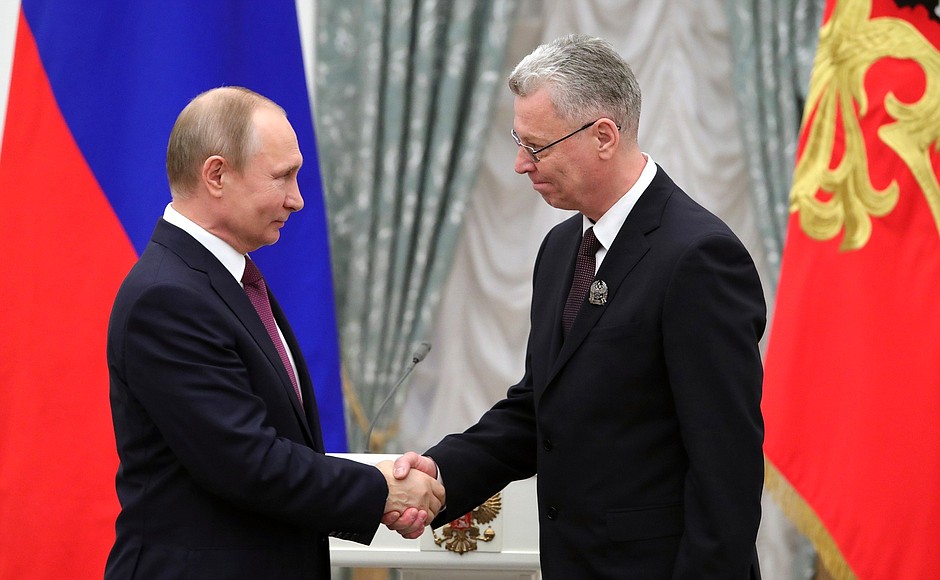 I wholeheartedly wish you further creative success, and all the best. Thank you. Thank you very much. <…> Vladimir Putin: Friends, 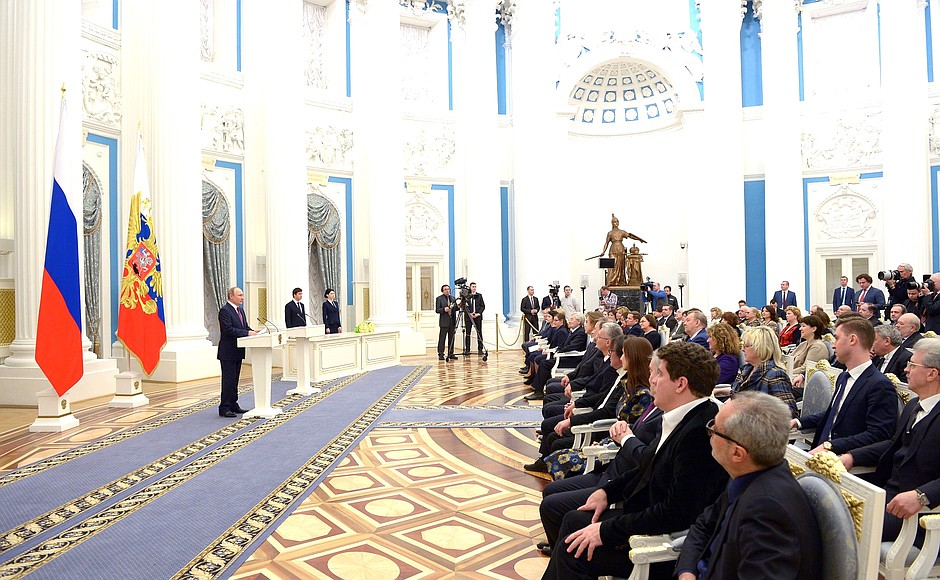 I once again wholeheartedly congratulate you on winning these prizes. Congratulations to our winners, nearly all of whom spoke about their families today, about their teachers and their children. The first winner we celebrated today spoke very well about a code that makes us special. This code is developing from one generation to another, and each generation adds a tiny new element to this code, making it even stronger and more sustainable and viable. You are making a huge contribution to this. Thank you very much. The source of information - http://en.kremlin.ru/events/president/news/57212 Security Council meeting The President held a Security Council meeting to discuss draft Basic Principles of the State Border Policy of the Russian Federation and measures to improve national security as they apply to protecting the country's borders. April 6, 2018 - 15:30 - The Kremlin, Moscow 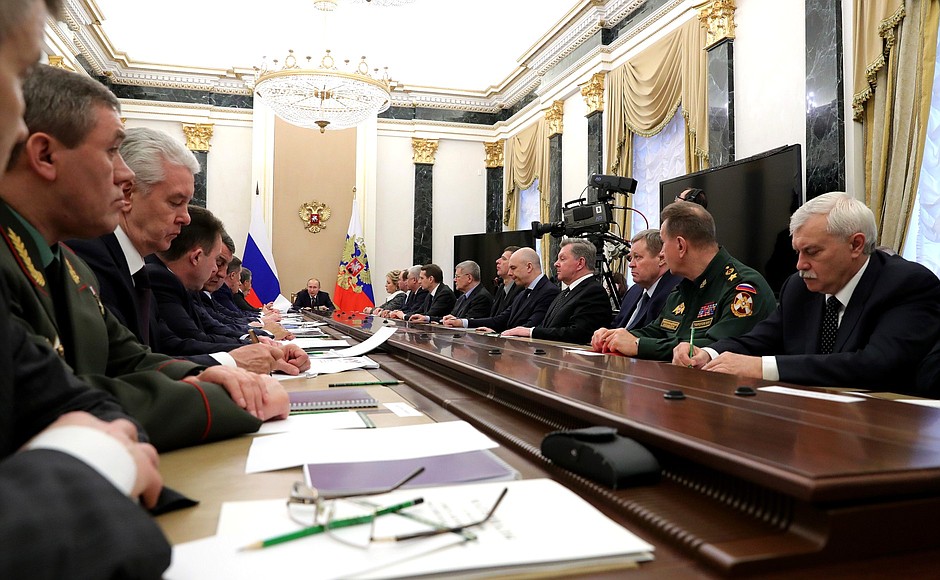 President of Russia Vladimir Putin: Good afternoon, colleagues. Today, we will review the draft Basic Principles of the State Border Policy of Russia. We will discuss a wide range of current and long-term goals outlined in this strategic planning document. These issues are exceptionally important. The border remains the most important statehood attribute and the advanced frontier for ensuring the country’s security. Therefore, our actions and plans in this sphere must be well considered and effective, meet modern and future challenges, and be consistent with the national development goals. 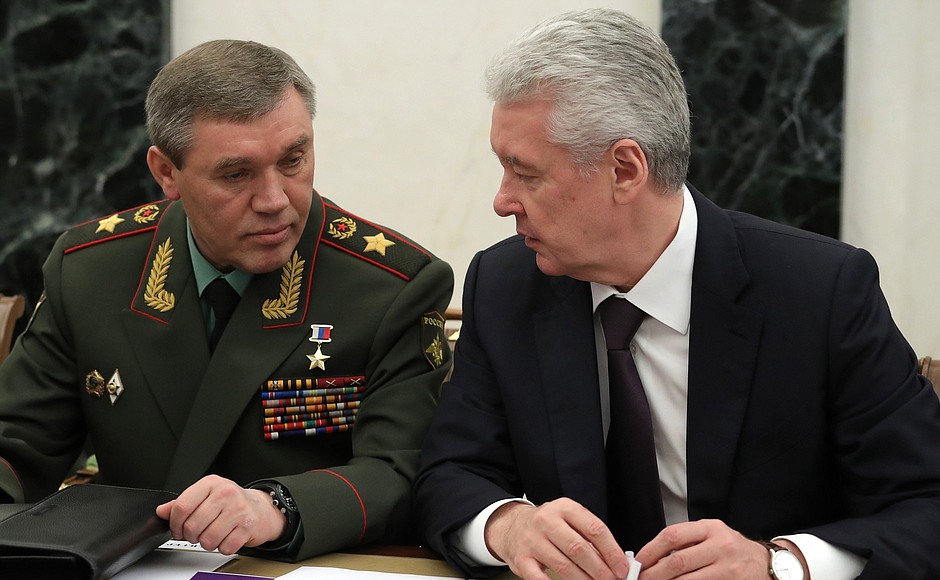 The current Basic Principles of the Border Policy were adopted in 1996 and are clearly in need of a major update given the changes around the world and Russia’s greatly improved capabilities, as well as the great amount of work that has already been done. Thus, the necessary regulatory framework in the border protection sphere has formed over the past years. The international legal registration of the border with neighbouring countries and the delimitation of maritime areas were carried out on the principles of mutual respect. Since the 2000s, a number of complex border areas have been technically re-equipped and modernised, primarily in the Caucasus region and the strategically important regions of the Arctic and the Russian Far East. 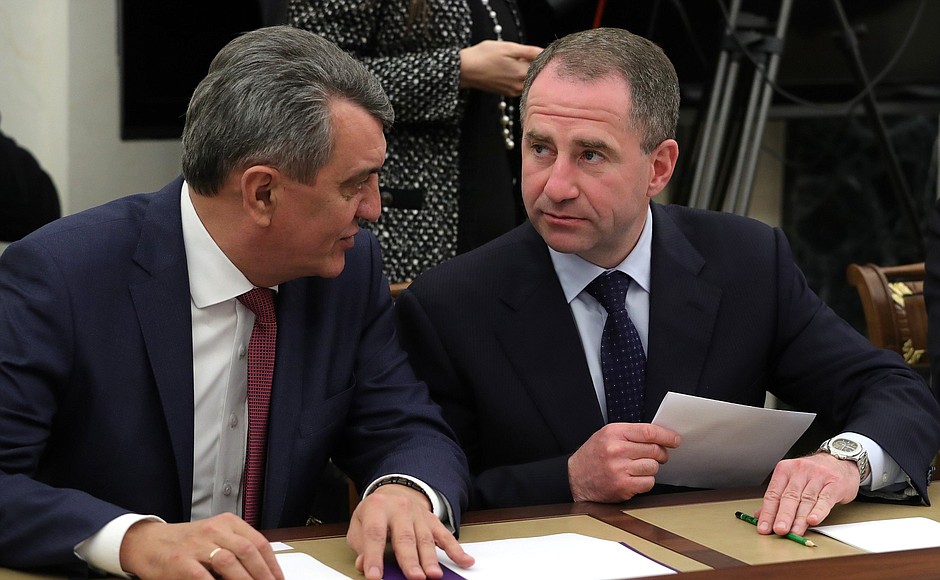 The streamlining of the structure and the composition of federal executive bodies involved in implementing the border policy and border authorities was an important step. In this regard, I would like to note that the level of equipment of the border units with weapons and equipment has been brought to 80 percent, and the share of modern equipment has grown from 10 percent in 2003 – as little as 10 percent of modern technology – to 54 percent in 2017. Overall, these measures have helped us stabilise the situation in the border regions, reduce the risk of terrorists and extremists entering the country and enhance the efficiency of combating cross-border crime. On the other hand, the situation is changing rapidly and continuously, as I have said, so that new challenges and threats appear in the border regions and other areas. 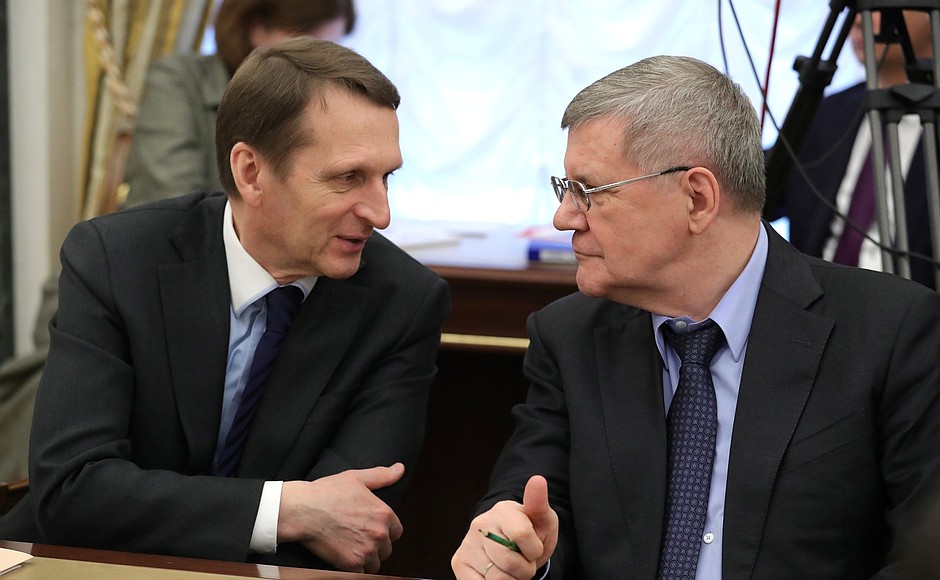 In particular, NATO is increasing its military capability on our border, and attempts are being made to hinder integration processes that involve Russia and to provoke new and fuel old conflicts in the post-Soviet space and in the regions that border with Russia. The consequences of this include military and political instability, growing smuggling and crime rates, as well as acute humanitarian problems. In this situation, our priorities are to ensure reliable protection and defence of our borders and to effectively neutralise potential threats. At the same time, we must continue to enhance the country’s openness. We keep saying that the Russian borders must be safely protected and yet as transparent as possible for all those who enter the country legitimately and with good intentions. I see this as a vital element of Russia’s international image and the quality of our business climate and national jurisdiction, as well as a major factor of economic, humanitarian and cross-border cooperation and the development of integration in Eurasia. 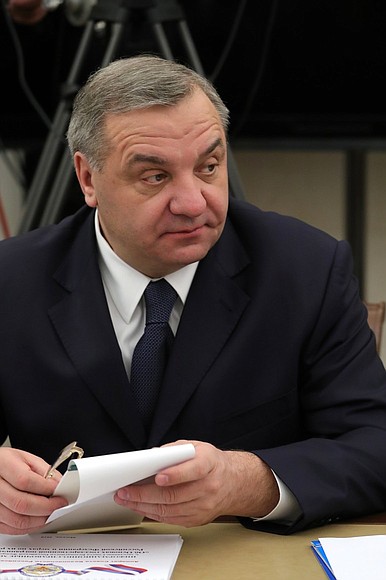 All these approaches have been incorporated in the draft Guidelines of the National Border Policy, which we will be discussing today. What areas do I consider the most important? First if all, it is necessary to use a comprehensive approach when mitigating risk and threats to border security. It is necessary to reliably protect our territory from terrorists and extremists, transnational and trans-border crime and to curtail channels of drug trafficking, illegal migration and the smuggling of items of cultural value, strategic raw materials and biological resources. 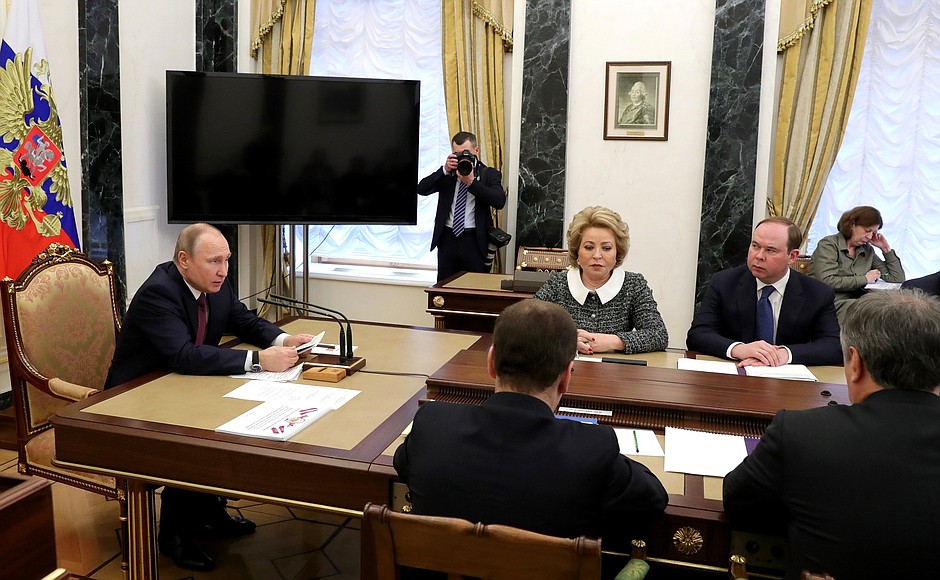 Obviously, the results of these efforts directly depend on clear-cut and effective coordination and the concerted efforts of all agencies and services that work directly at the border and are responsible for the security of our state and citizens in general. The heads of all the services are represented here today. Secondly, it is necessary to consistently develop bilateral and multilateral border cooperation, relying on the experience that has been accumulated in this area in the last few years. In the process, it is important to develop well-orchestrated and clear methods of cooperation between the border agencies and suggest new forms of partnership, primarily with our colleagues from the CSTO, the SCO and the Eurasian Economic Union. Let me emphasise that this cooperation must be as broad as possible – from the mutual exchange of information to the holding of joint operations, and in perspective, the formation of an integral system of border security and stability on the external borders of the associations of our countries. In the process, it is necessary to gradually remove excessive barriers on the internal borders within our integration associations. Needless to say, this should be done carefully, not to the detriment of the interests of our country, our business and the security of the citizens of the Russian Federation. 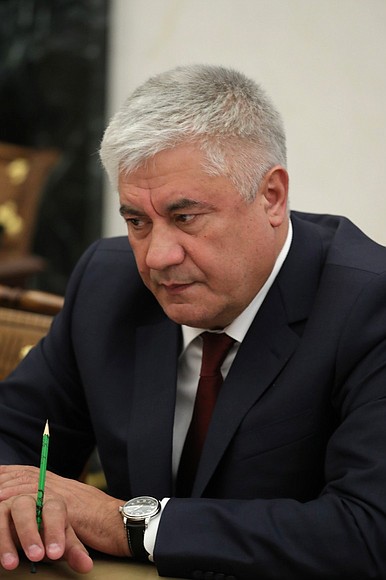 Thirdly, one of the key tasks is consistent development of Russia’s border infrastructure – naturally, based on a new, advanced technical format with the use of modern technology and best practices, including automated control and monitoring of the situation, equipment and procedures for the operation of border checkpoints. Cutting-edge equipment, communication and digital technology, as well as the agencies’ integrated databases must be used to create comfortable conditions for our citizens and for Russian and international business, to promote inbound trade and tourism, as well as to enhance the competitiveness of national exports and transit routes. One of our priorities is the development and implementation of an integrated one-window/one-stop border crossing system for goods and vehicles. These specific and practical measures must help us implement one of the tasks set out in the Presidential Address, that is, to accelerate the movement of cargo within Russia and to enhance Russia’s position as a global logistics hub. 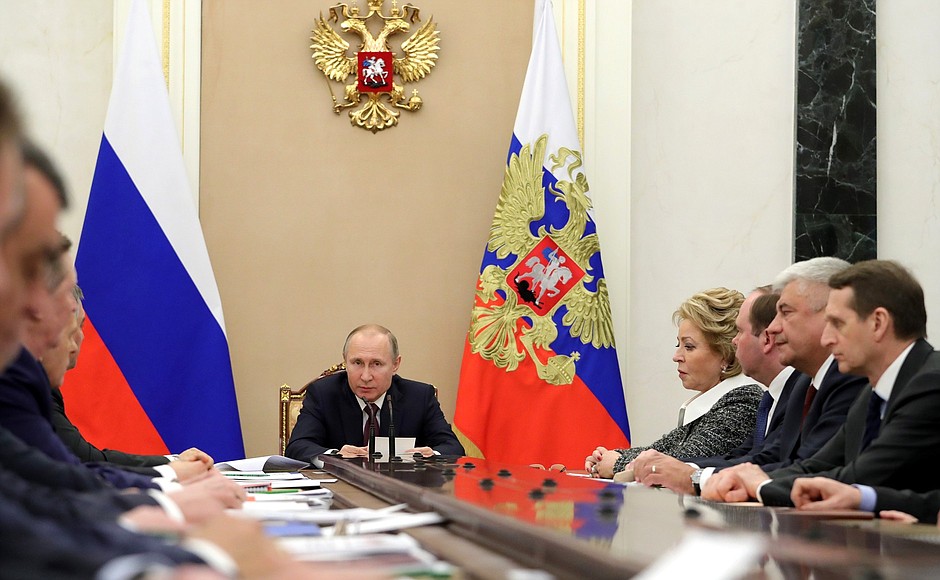 I must point out, however, that the speed of construction and renovation of border checkpoints is unacceptably low. Finished facilities remain idle for a long time, and the installation of automated systems and other modern technology takes too long or is delayed. At the same time, the prosecutor’s offices say that budgetary allocations are not always used efficiently. I ask you to analyse the implementation of the State Border of the Russian Federation 2012–2021 federal targeted programme. We must pinpoint the problems that are hindering this and take measures to resolve them. Overall, the programme should be adjusted to the Guidelines of the National Border Policy, which we are discussing today. And finally, we must continue working on an international legal framework for the state border and maritime delimitation, including the external border of Russia’s continental shelf. We must act consistently and rely on solid arguments to protect our national interests, especially since we have accumulated considerable experience in this area. I am referring to the international recognition in 2014 of Russia’s right to the part of the Sea of Okhotsk that had been previously open to other countries. Let us proceed to our discussion. The source of information - http://en.kremlin.ru/events/president/news/57213
__________________
Where should they dig the Very Deep Pit? Piglet said that the best place would be somewhere where a Heffalump was, just before he fell into it, only about a foot farther on. (c) Alan Alexander Miln |
|
|
#808 |
|
Senior Member
|
Greetings on Russia and Belarus Unity Day
Vladimir Putin congratulated President of Belarus Alexander Lukashenko on the Day of Unity between the Peoples of Russia and Belarus. April 2, 2018 - 10:10 In his message of greeting, the President emphasised that Russians and Belarusians have been building the Union State for more than twenty years, and the results of these joint efforts are becoming more tangible. The Russian President specifically pointed out the smooth coordination of the two states’ foreign and defence policies, their dynamically developing links in trade and the economy, science and technology, humanitarian and inter-regional matters. Vladimir Putin also noted the importance of the experience that Russia and the Republic of Belarus have accumulated in building a union that helps to promote integration on a larger scale across the Eurasian community. The President also expressed confidence in the fact that Russia and Belarus will act together to ensure the further strengthening of the Russian-Belarusian alliance as well as mutually beneficial cooperation in all spheres for the benefit of the two brotherly peoples. The source of information - http://en.kremlin.ru/events/president/news/57171 Greetings to participants of events to mark Russia and Belarus Unity Day Vladimir Putin sent a message of greeting to participants of official events on the Day of Unity between the Peoples of Russia and Belarus. April 2, 2018 - 19:00 The message reads, in part: “I would like to greet you all on the Day of Unity between the Peoples of Russia and Belarus – a wonderful holiday that symbolises the inseparable bonds of fraternal friendship, and spiritual and cultural kinship linking the peoples of our countries. Established over two decades ago, the Union State represents the closest integration in the post-Soviet space. Owing to its development, Russia and Belarus have considerably enhanced their bilateral cooperation in all areas. They have closely coordinated their efforts in foreign policy, defence and national security and are carrying out joint projects in infrastructure, energy, science and technology, and cultural cooperation, among other areas.” The two countries are rapidly developing inter-regional ties, parliamentary dialogue, contacts between business and academic circles and ties between public organisations. Their priority tasks include forming a common legal space, making their educational systems more compatible, and improving mechanisms of trade and economic exchange. I am convinced that through joint efforts we will further advance the productive cooperation and integration of Russia and Belarus in the interests if our fraternal peoples.” The source of information - http://en.kremlin.ru/events/president/news/57177 Telephone conversation with President of Egypt Abdel Fattah el-Sisi There was a telephone conversation between Vladimir Putin and President of Egypt Abdel Fattah el-Sisi at the initiative of the Russian side. April 2, 2018 - 21:10 Vladimir Putin warmly congratulated Abdel Fattah el-Sisi on his overwhelming victory in the presidential election in Egypt. He reaffirmed Russia’s intention to further develop mutually beneficial cooperation in many areas, including energy, industry and transport. In view of the upcoming tripartite Russia–Turkey-Iran summit in Ankara, the leaders discussed the Syrian settlement and the overall situation in the Middle East, in particular in Palestine and Israel. They noted both countries’ close and identical views on the above issues. Overall, the conversation was constructive and friendly. The source of information - http://en.kremlin.ru/events/president/news/57176 Greetings to the 7th Moscow Conference on International Security Vladimir Putin sent his greetings to the participants of the 7th Moscow Conference on International Security, which will be held on April 4 and 5. April 4, 2018 - 09:30 The message reads, in part: “Your conference has won well-deserved respect throughout the world. There are delegates from nearly 100 countries who have come to Moscow to take part in it, including heads of military agencies, chiefs of general staffs, prominent researchers and experts, as well as high-ranking representatives from the UN and other international organisations. This year you will focus on a topic of vital significance for the international community: the development outlook in the Middle East following the routing of ISIS in Syria. It is clear that this terrorist group, despite its military defeat, still retains considerable destructive potential and the ability to quickly change its tactics and plan attacks in various countries and regions. Other extremist organisations are very dangerous as well. In this context, we must get together to consider forms of multilateral cooperation that would enable us to consolidate the successes we achieved in the fight against terrorism and to preclude the proliferation of this threat. I am confident that your discussions will be substantive and fruitful, that you will be able to exchange valuable practical experience as well as analytical achievements and will make a major contribution to the international efforts towards international security and stability.” The source of information - http://en.kremlin.ru/events/president/news/57198 Meeting with Special Envoy of the President of China Wang Yi Vladimir Putin received Special Envoy of the President of the People’s Republic of China, Member of the Chinese State Council and Foreign Minister Wang Yi at the Kremlin. The prospects for further developing and strengthening Russian-Chinese relations were discussed. April 5, 2018 - 17:00 - The Kremlin, Moscow 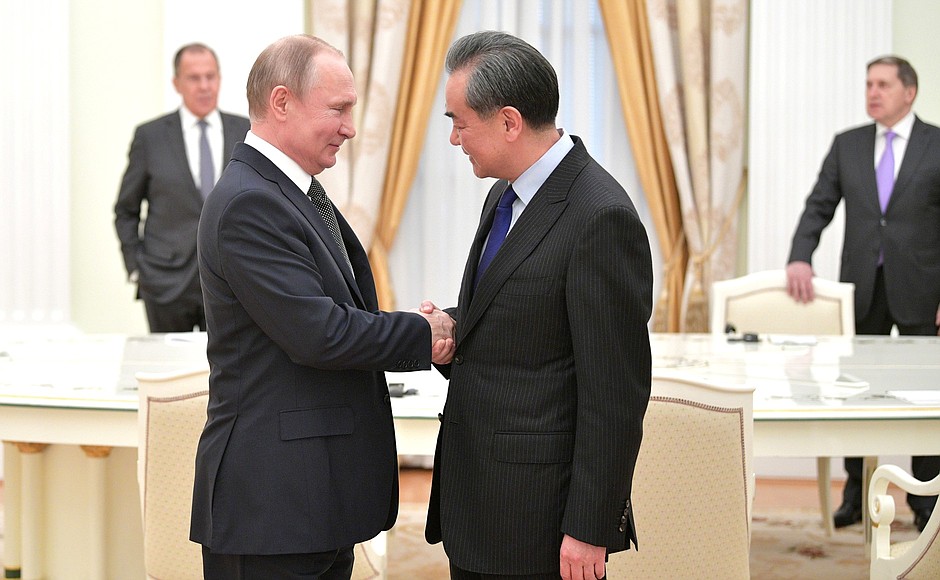 President of Russia Vladimir Putin: Mr Minister, friends, good afternoon and welcome to Moscow. I am very glad to see you again. There is no need for us to speak in general terms about the character of our relations. We have noted many times that they are of an unprecedented close nature, close in all senses of the word, both economically and politically. 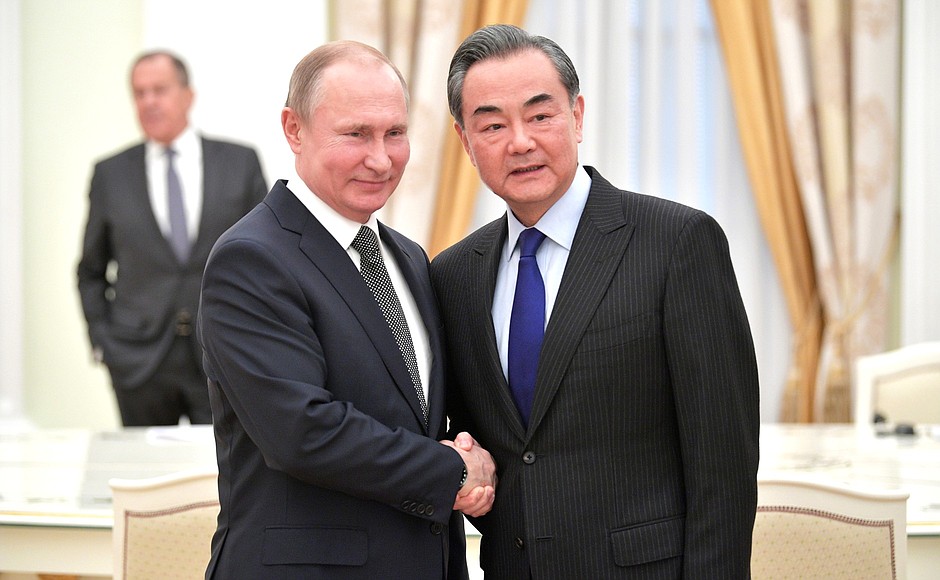 This year, we are planning a series of meetings with the President of the People's Republic of China. In June, the SCO Summit will be held in China, so I will pay a visit to the country. Then a series of meetings on the sidelines of major events, including BRICS, the G20 and APEC. And of course, we will communicate as needed at any time. First of all, to begin our conversation today, I would like to congratulate you and all the Chinese people on the successful conclusion of a very important event – the National People's Congress, where a number of decisions that are very important for the development of the People's Republic of China were adopted. 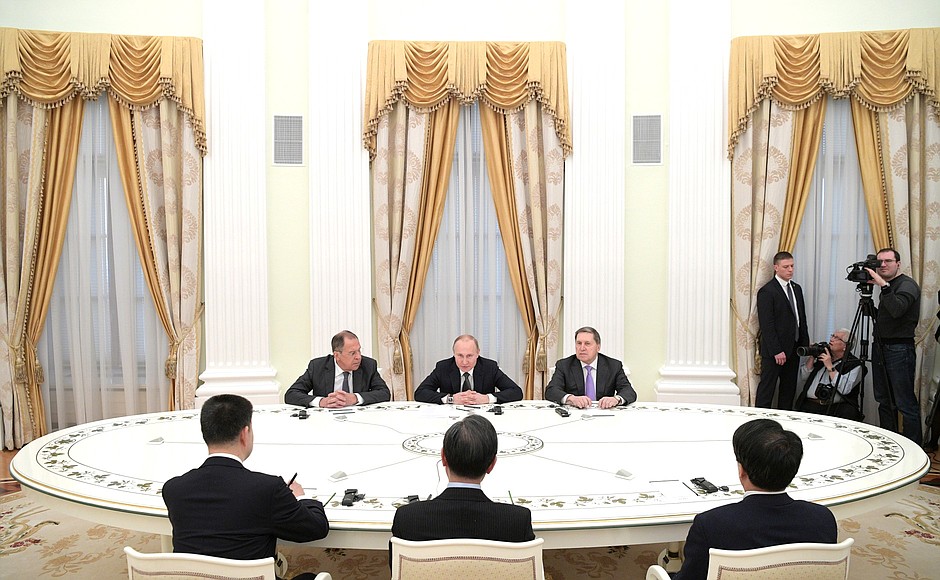 We are sure that all these decisions will benefit the Chinese people, help strengthen Chinese statehood and make China even more stable and prosperous. I would like to express my hope that after the Russian presidential election, and after the important domestic political events in the People's Republic of China, we will continue our policy of strengthening bilateral ties and friendly relations. I am very glad to see you. Welcome to Russia! Special Envoy of the President of the People’s Republic of China, Member of the Chinese State Council and Foreign Minister Wang Yi (retranslated): Thank you very much, Your Excellency, Mr President. Despite your busy schedule, you took the time to meet with me. This time, as a special envoy of President Xi Jinping, I have arrived in Russia to personally report to you on our approaches to issues of mutual interest. 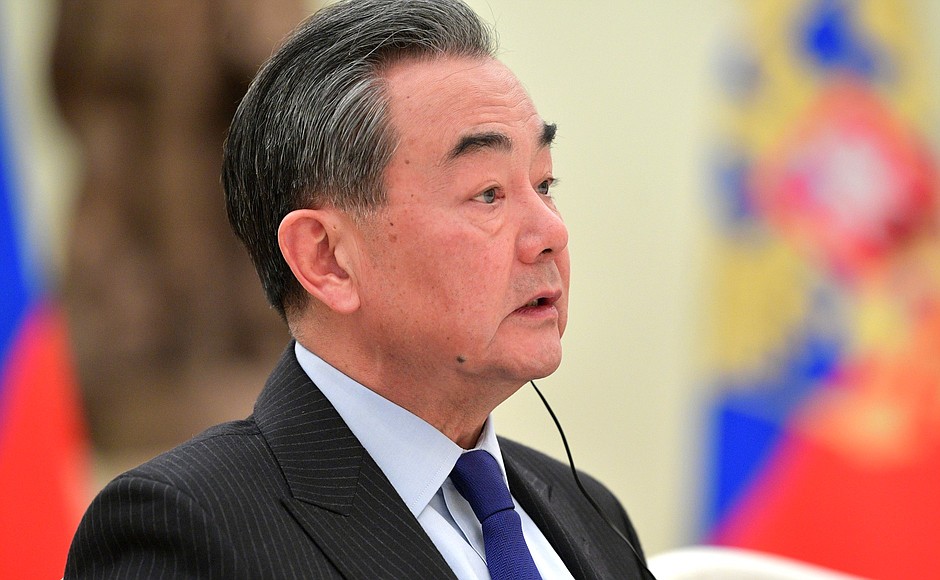 Recently, Russian Kemerovo suffered from a deadly fire that resulted in significant loss of life. As friends of Russia, we took it to heart. We mourn with the Russian people. The President instructed me once again to convey the deepest sympathies of the Chinese people. Let me also once again convey to you the sincere congratulations of President Xi Jinping on your re-election as President. You won with a record result, which fully reflects the immense authority of the President of Russia and the broad support you enjoy among Russian citizens. Your re-election meets the expectations of China and the needs of China-Russia relations as they continue to develop. 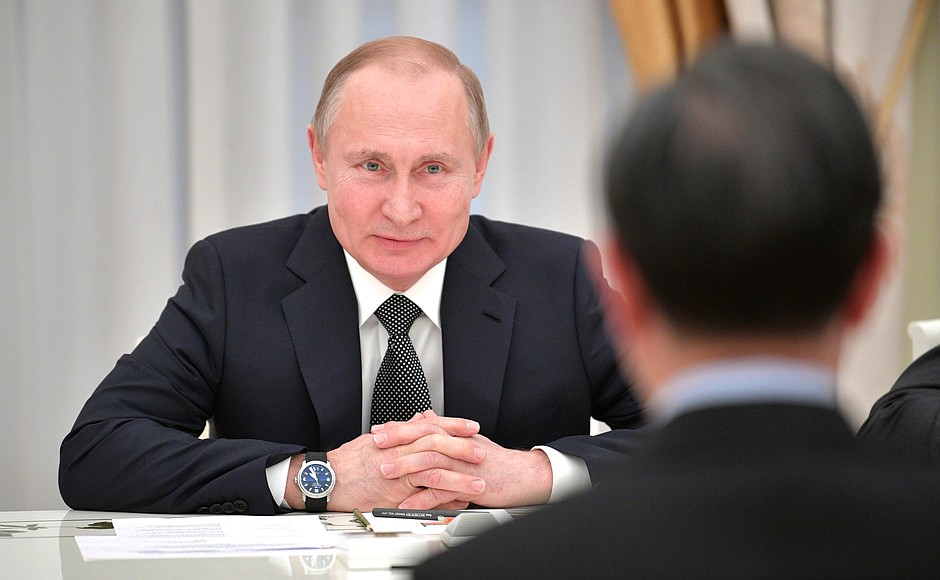 We are absolutely convinced that a bright new future awaits Russia under your leadership. We are also absolutely convinced of the bright future of China-Russia relations under the guidance of our leaders. The source of information - http://en.kremlin.ru/events/president/news/57207 Meeting with Inspection Commission of the International Exhibitions Bureau Vladimir Putin met with members of the Inspection Commission of the International Exhibitions Bureau (BIE). April 5, 2018 - 18:10 - The Kremlin, Moscow 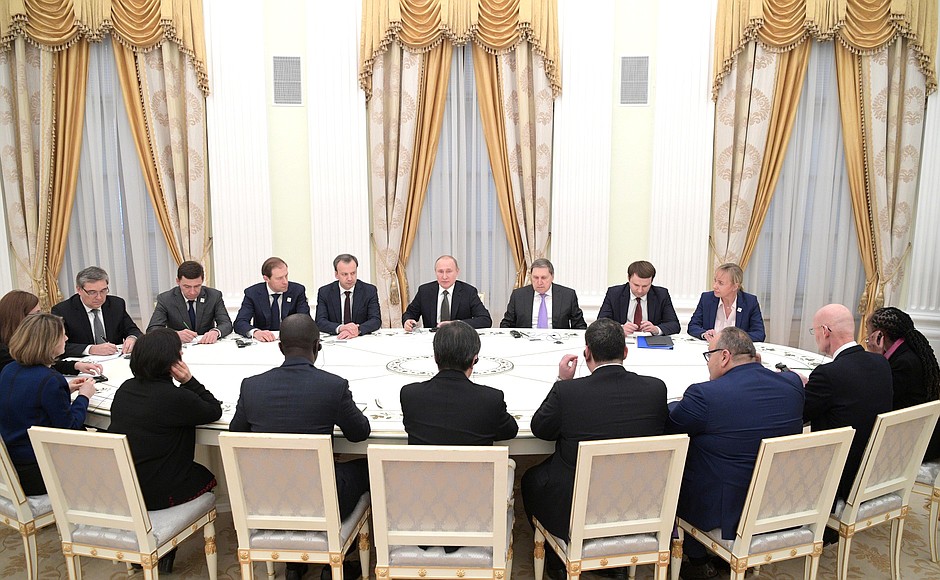 The commission is in Russia to consider Yekaterinburg’s readiness to host World Expo 2025. President of Russia Vladimir Putin: Ladies and gentlemen, I welcome you to Moscow. I know that you have a busy agenda. You have visited Yekaterinburg, the city that is bidding to host World Expo. You probably already know everything I am about to say, but I wish to emphasise it. Russia has been taking part in these exhibitions for a long time. We participated in the first exhibition in the 19th century, and last year, in 2017, we were partners of the Expo 2017 business agenda in Astana. We regularly take part in such events held at various venues, but Russia has not hosted an event this large yet. You have seen for yourselves that Yekaterinburg is a large Russian industrial centre where most leading industrial companies are represented and have headquarters. There are many joint enterprises; I think almost 400 international enterprises involving foreign capital. 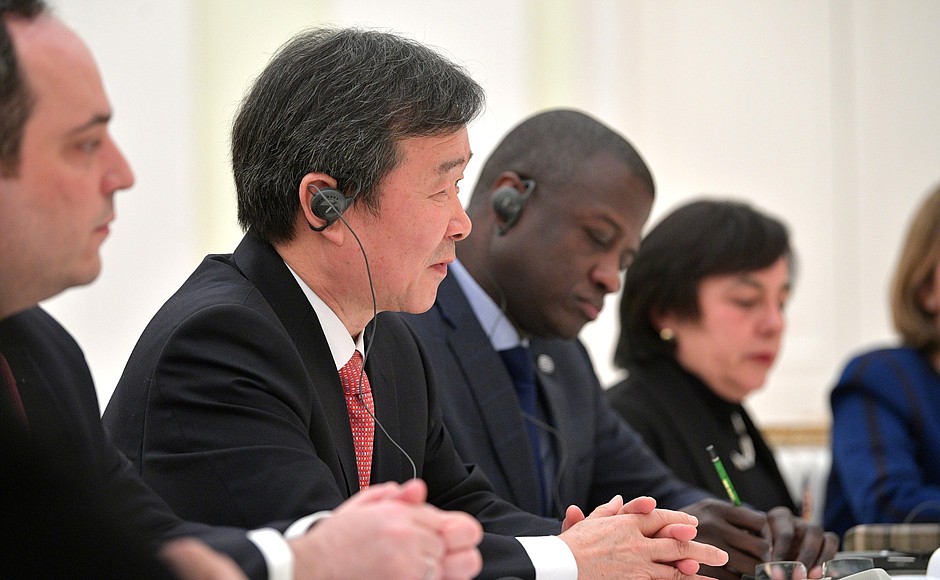 We believe that an additional 500 hectares will be allocated for the exhibition if it takes place in Russia. I believe you have seen the location: it is conveniently located between the city centre and the airport. If this happens, we are planning to welcome people from at least 140 countries. This is approximately 14 million people, or 10 times more than the population of the city and its suburbs, which is about 1.4 million with the adjoining areas. The construction of the facilities will cost about 1.5 billion euros. The funds will be allocated from the federal and regional budgets. We are planning to balance these expenses with the activities of the exhibition venue and partly by attracting private companies that are interested in this. You have probably been told that we are planning to launch a campaign to improve the urban environment. This includes transport infrastructure, city development, metro and monorail upgrades and expansion and the park zone. Of course, all of this will benefit the region’s development. And the region, as I said, is well developed in terms of industry. 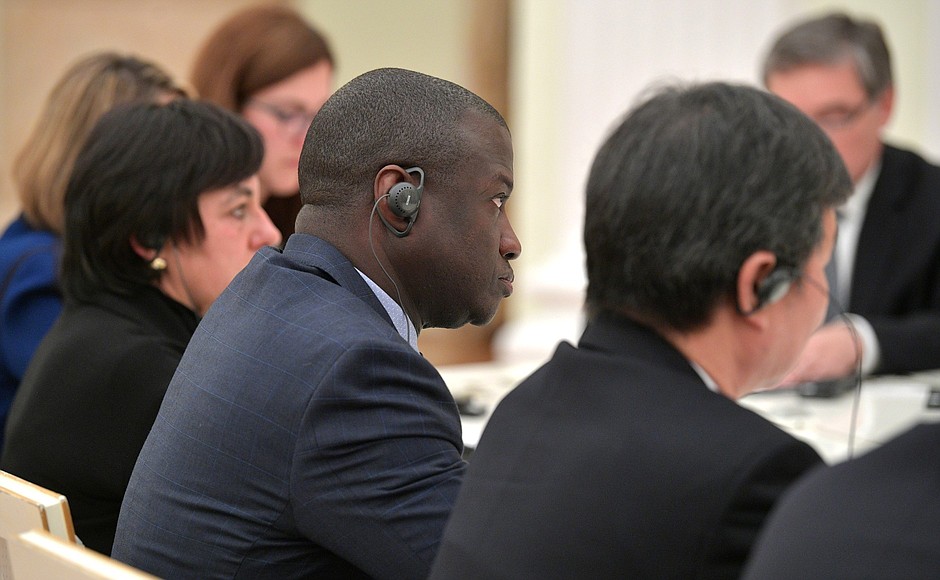 I would like to point out another fact. We propose an agenda for people from developing economies in this exhibition. In addition, we are ready to pay a large part of the expenses that their participation would involve. In this case, I believe Yekaterinburg’s exact location between Europe and Asia is important. As you have noticed, it is situated almost in the centre of Russia’s huge territory in the Urals. I think this is an advantage: the travel time to get there from various parts of the world is almost the same. This is what I wanted to say. I would like to welcome you once again and hear your opinions about what you have seen and your impressions after visiting Yekaterinburg. 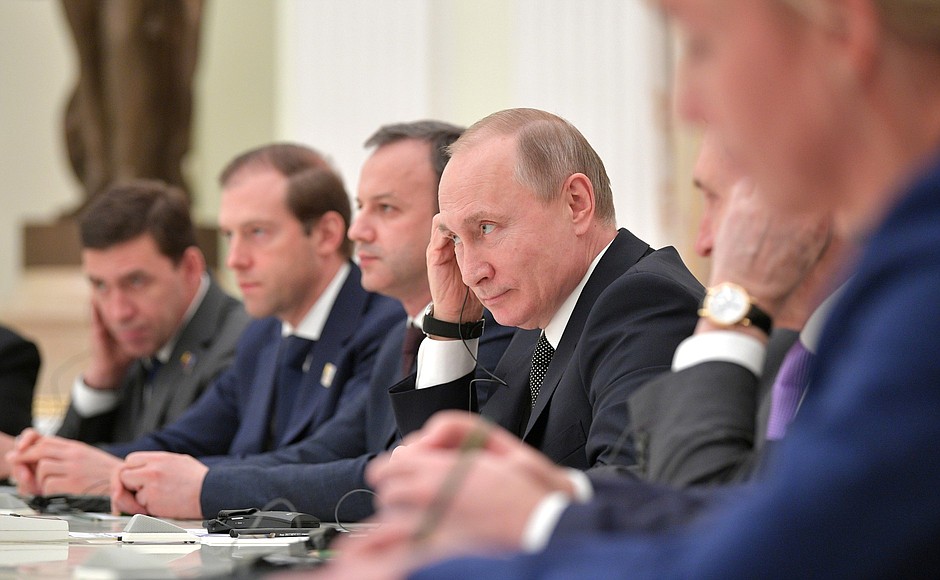 Chairman of the BIE Executive Committee Jai-chul Choi: Your Excellency, Mr President. Thank you very much for receiving our Enquiry Mission in spite of your busy schedule. First of all, I wish to express our deep condolences to the victims and their families of the tragic Kemerovo fire incident. Our thoughts are with you and your people. Having said this, I take this opportunity to report to you that the Enquiry Mission has successfully accomplished its mandate given by the BIE. 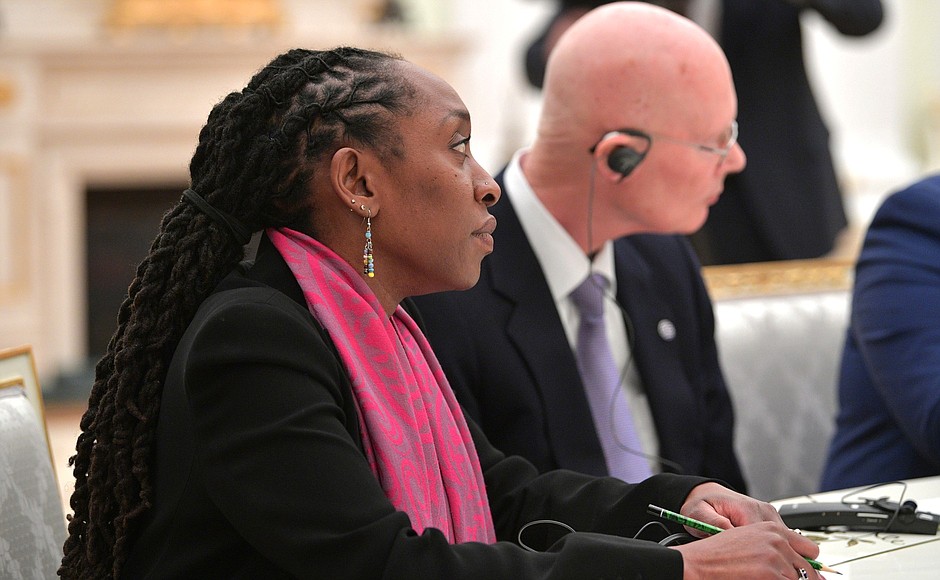 Since our arrival here last Monday we have had a series of working sessions with your team, headed by Deputy Prime Minister Arkady Dvorkovich. And everything is excellently arranged and well prepared. So, our preliminary finding is very positive. First, the project proposed by Russia is viable and feasible, with the strong support of the federal government. The second point is that the theme proposed by Russia has strong relevance for the global agenda. Also it is very appealing to the international community. And third point, we met with representatives of various groups. This morning, we had a meeting with political leaders of the State Duma as well as the Council of Federation. Also we were well received by your Prime Minister, and we confirmed strong political support and assurance for this project. At the same time, in Yekaterinburg we met with representatives of civil society organisations. It is very impressive to witness their active participation and strong support for the success of this project. 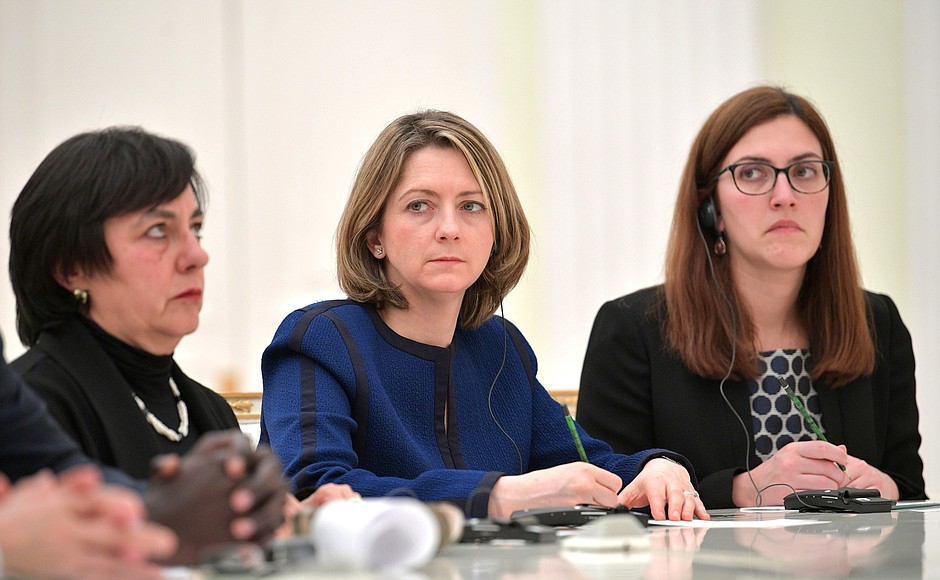 So everything is very much encouraging to us. Also we got to know that Russia has a wonderful strong track record of successfully hosting global events such as the Olympics, and also the G20 summit and APEC summit. Russia has successfully participated in the International Expo. In some cases the Russian pavilion has been elected one of the best pavilions. So in this case we believe Russia has the capacity and the capability to successfully host the 2025 World Expo. So, our preliminary finding will be submitted to the BIE Executive Committee meeting scheduled for early May. If the Executive Committee approves our report, then this report will be submitted to the General Assembly for further consideration. And the final vote to select the host country will be decided in November at the General Assembly, Your Excellency. That is the summary I wish to report to you at this stage. 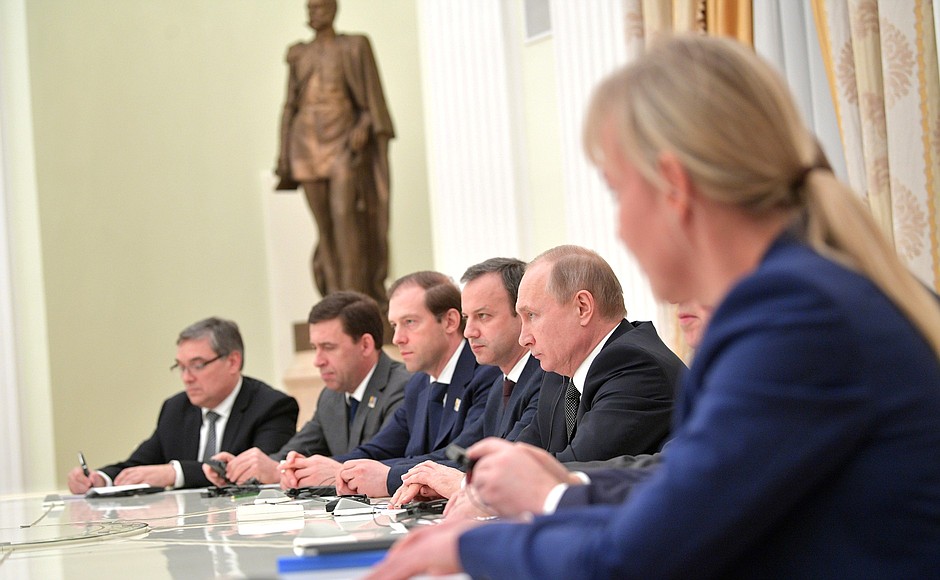 Vladimir Putin: Mr Jai-chul Choi, ladies and gentlemen, I would like to add something else. We have a lot of expertise in holding international events of this scale. We have almost completed our preparations for the FIFA World Cup. At the beginning, when we started this work, we adopted a federal law structuring all the work to prepare for the World Cup. If Yekaterinburg’s bid wins, we are ready to adopt a similar federal law, which we will draft in cooperation with the organisers in order for this work to be structured and systematised. The source of information - http://en.kremlin.ru/events/president/news/57208 Telephone conversation with President of France Emmanuel Macron Vladimir Putin had a telephone conversation with President of France Emmanuel Macron, at the latter’s initiative. April 6, 2018 - 13:15 The two leaders continued their exchange of opinions on the Syrian issue. Vladimir Putin informed his counterpart about the agreements reached at the meeting between the leaders of Russia, Iran and Turkey in Astana on April 4 regarding further efforts to ensure long-term stability in Syria and to strengthen its sovereignty, unity, independence and territorial integrity. The presidents noted the importance of promoting political settlement through the implementation of the decisions reached at the National Syrian Dialogue Congress in Sochi, as well as the importance of establishing the Constitutional Committee in Geneva under the aegis of the UN as soon as possible. With regard to the situation in Eastern Ghouta, President Putin and President Macron focused on the unprecedented large-scale operation to rescue civilians and evacuate the militants who refuse to surrender, which is reaching completion. The President of Russia stressed the central importance of consolidating efforts of the global community in providing humanitarian aid to those in need across the Syrian Arab Republic pursuant to UNSC Resolution 2401. The leaders expressed their readiness to continue Russian-French consultations on key aspects of the Syrian settlement. The presidents also covered some topical issues of Russia-France relations in view of Emmanuel Macron’s upcoming visit to Russia in May 2018. The source of information - http://en.kremlin.ru/events/president/news/57211
__________________
Where should they dig the Very Deep Pit? Piglet said that the best place would be somewhere where a Heffalump was, just before he fell into it, only about a foot farther on. (c) Alan Alexander Miln |
|
|
#809 |
|
Senior Member
|
Vladimir Putin arrived in Ankara
The President of Russia arrived in Ankara on a working visit at the invitation of President of Turkey Recep Tayyip Erdogan. April 3, 2018 - 16:00 - Ankara 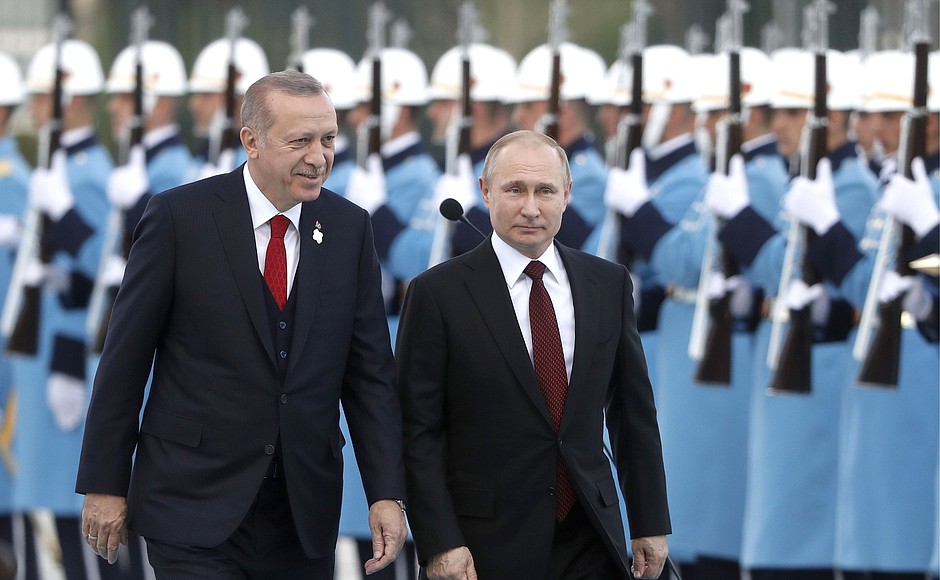 The President’s two-day working visit began with an official welcoming ceremony from the Turkish leader. 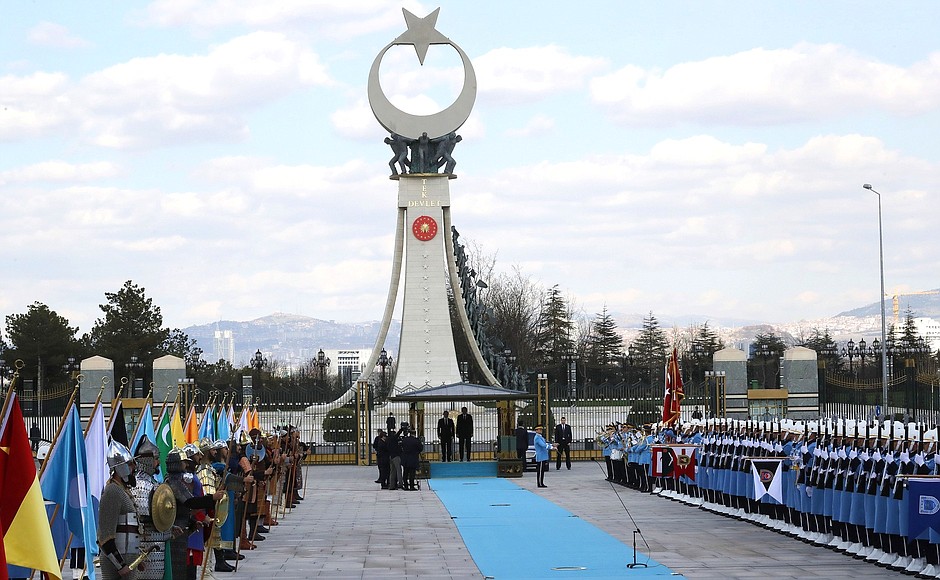 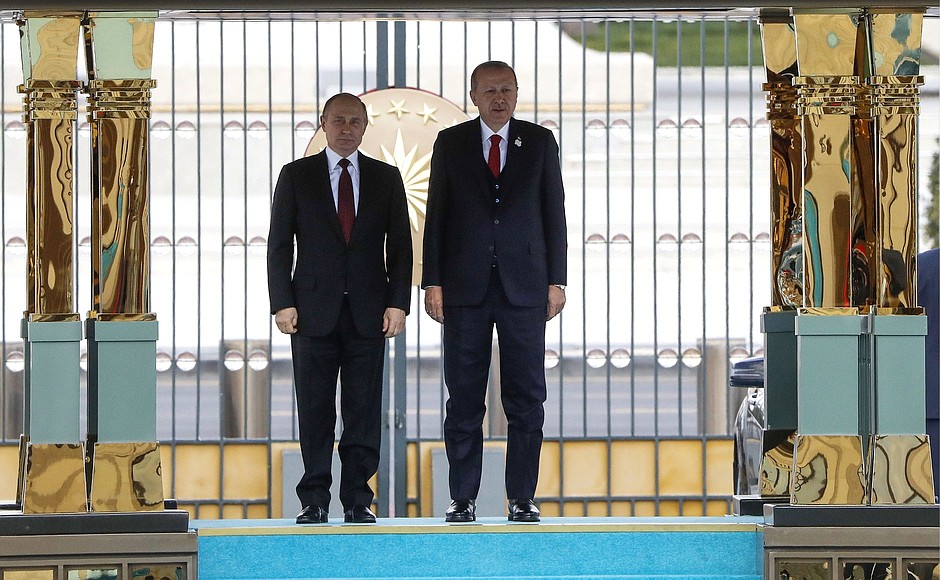 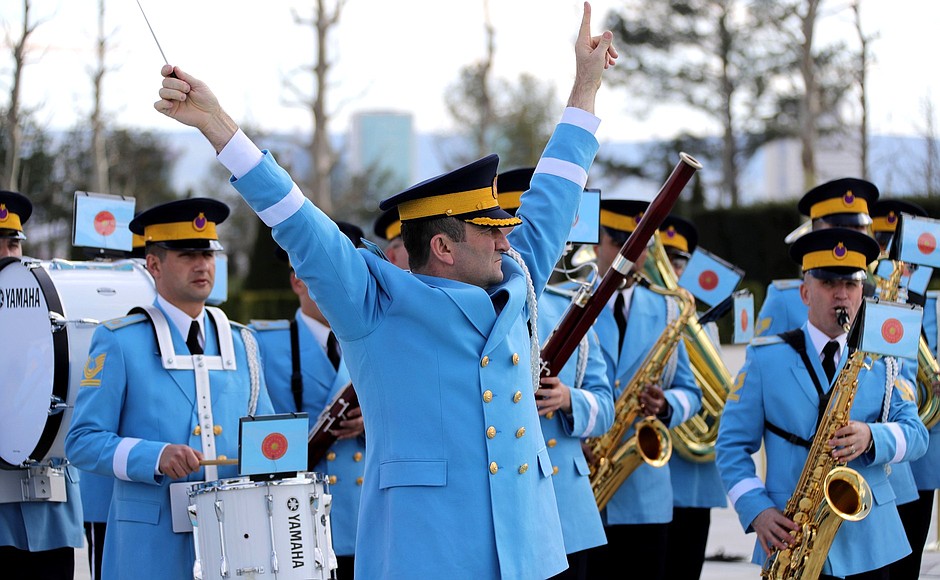 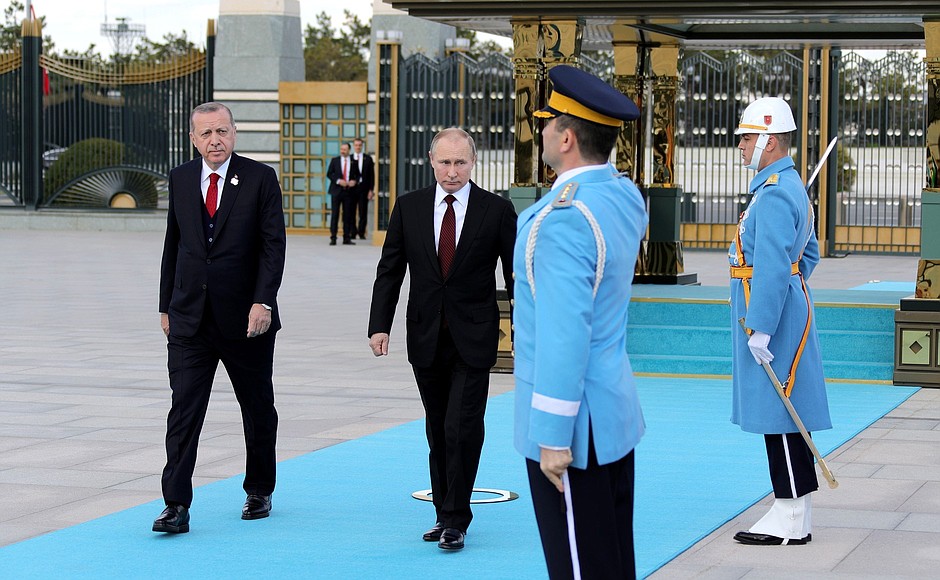 After that, Vladimir Putin and Recep Tayyip Erdogan will launch the construction of the first power unit of the Akkuyu Nuclear Power Plant via videoconference. Akkuyu is the world's first nuclear power station project developed under the BOO (Build, Own, Operate) model (Russia is responsible for the financing, operation and management of the station). 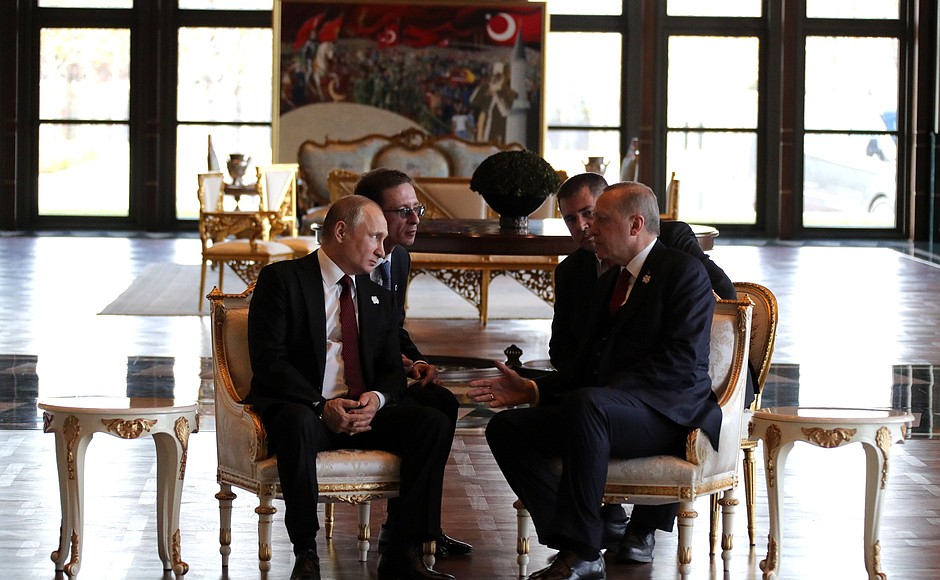 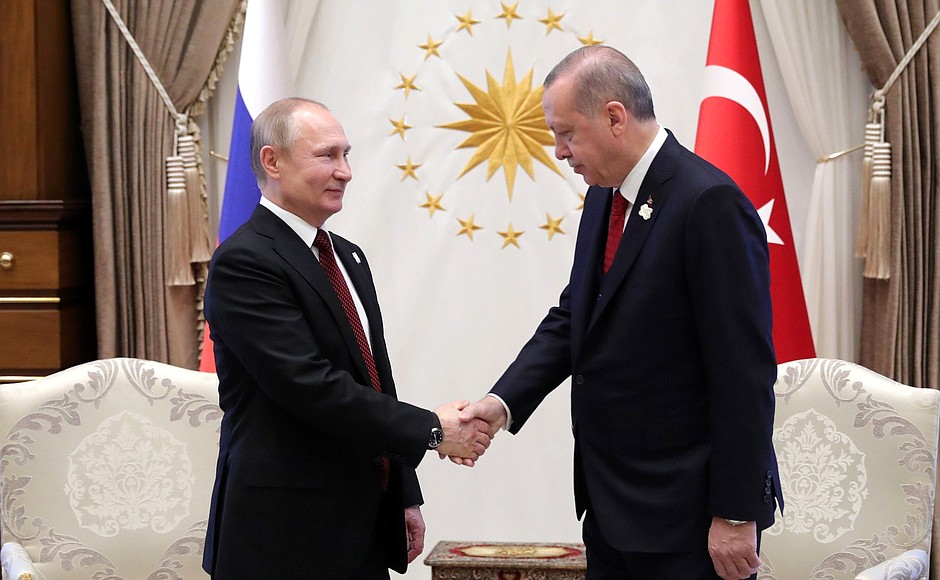 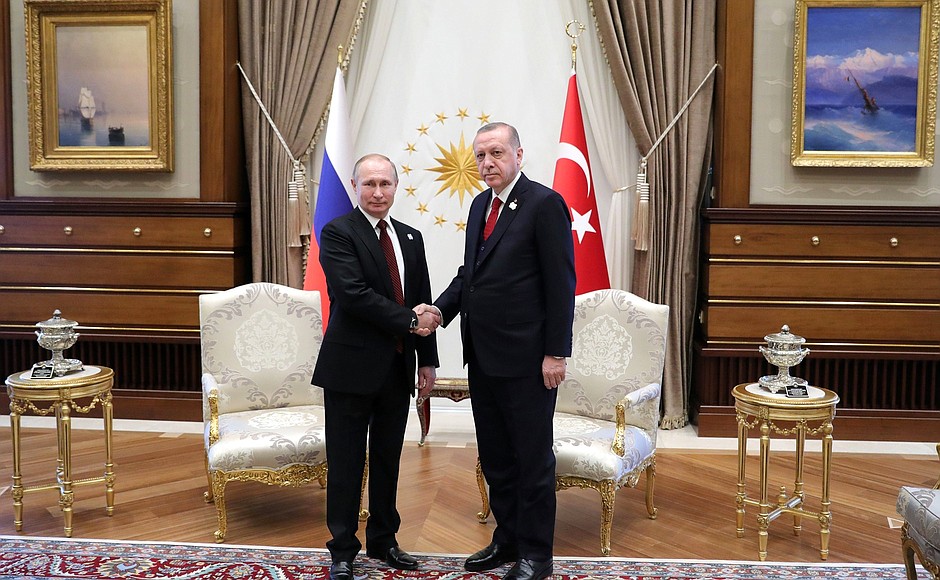 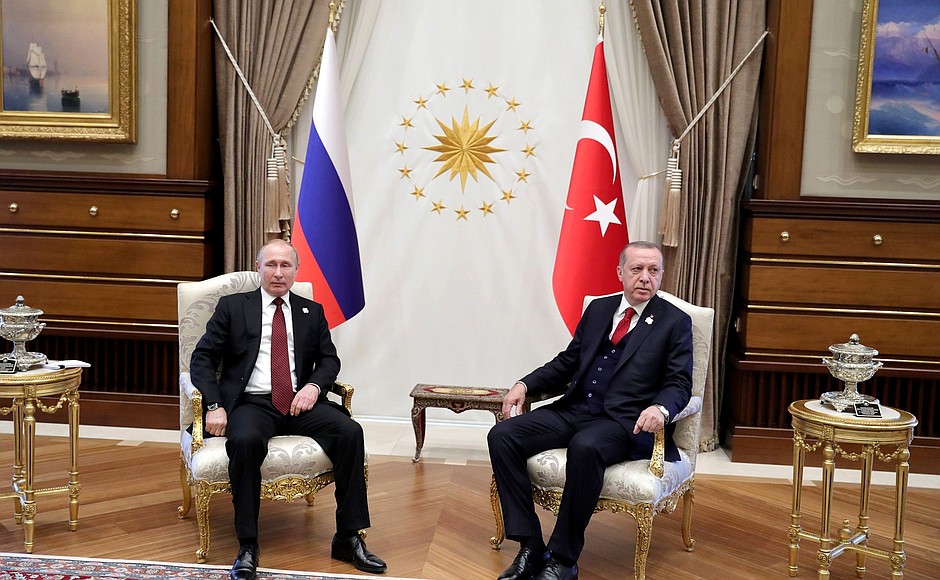 On the same day, the two leaders will attend the seventh meeting of the High-Level Russian-Turkish Cooperation Council, which will examine the current state and prospects for the development of bilateral trade and economic cooperation, the implementation of joint strategic projects, in particular in the energy sector, and other current regional and international issues, such as the joint fight against terrorism and the situation in Syria. The source of information - http://en.kremlin.ru/events/president/news/57189 Akkuyu Nuclear Power Plant ground-breaking ceremony Vladimir Putin and President of Turkey Recep Tayyip Erdogan launched the construction of the Akkuyu Nuclear Power Plant, via videoconference. April 3, 2018 - 16:45 - Ankara 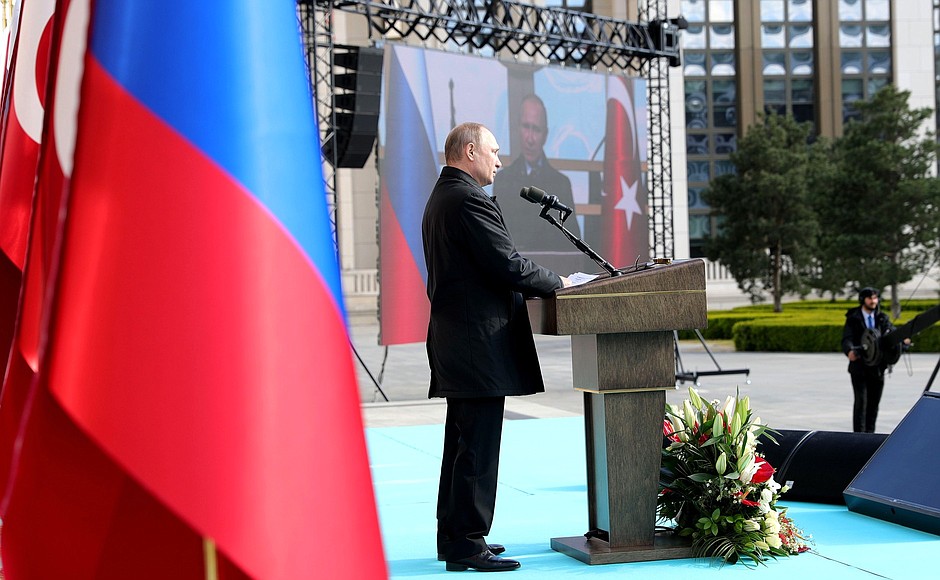 The Akkuyu Nuclear Power Plant with four power units will be built in Mersin Province on the Mediterranean under a Russian-Turkish agreement signed in May 2010. Currently, the project is fully financed by Russia. It will be the world’s first nuclear power plant to be built using the BOO (Build, Own, Operate) project financing model. Russia will finance the project and operate the plant. 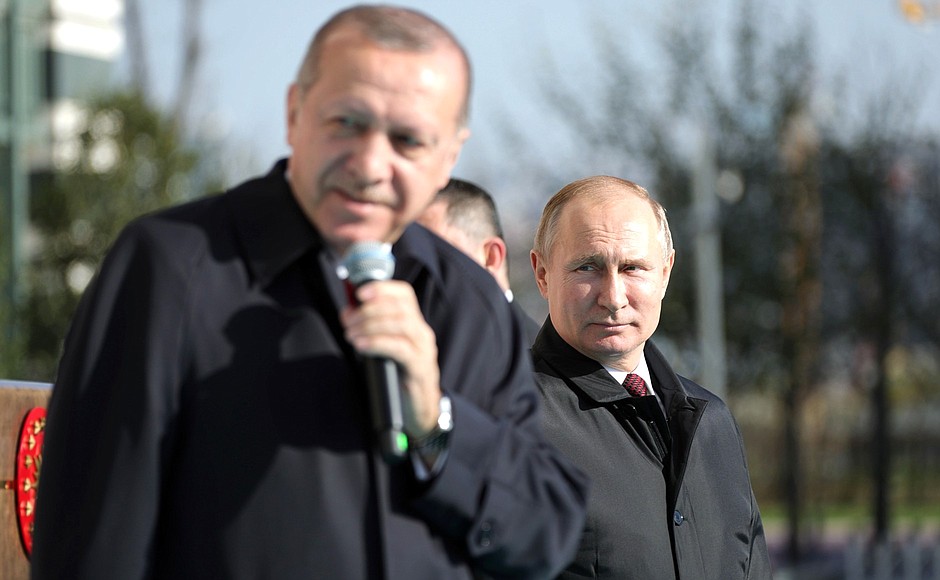 President of Russia Vladimir Putin: Mr President, our Turkish friends, ladies and gentlemen, First, I would like to sincerely congratulate all of you on the start of the construction of the first power unit of the Akkuyu Nuclear Power Plant. The significance of this great innovative project is hard to overestimate. In fact, today we are not simply present at the construction of the first Turkish nuclear power plant, but we are witnessing the laying of the groundwork for Turkey’s nuclear industry. We are creating a new industry. Turkey is a highly developed country in terms of technology and economics, but this is a new phase, a new step in the development of the Turkish economy. Russia is one of the recognised leaders in the peaceful use of nuclear energy. The Akkuyu project will involve the use of the most advanced engineering techniques, the most cost-effective and reliable technologies – the technologies we use for our own projects in Russia. The highest safety standards and the most stringent environmental requirements will also be observed. The opening of the plant will serve the development of the Turkish economy, its research and production potential, and will provide Turkish consumers with inexpensive and ‘clean’ electricity. According to expert estimates, this nuclear power plant will account for about 10 percent of Turkey's overall power generation, as was already mentioned. I would like to note that Russian contractors are planning to attract Turkish small and medium-sized businesses to the project; they intend to contract a significant part of the resources for the future station in Turkey. More than 350 Turkish companies have already applied for inclusion in the list of potential suppliers. The Akkuyu project will create new, modern and, very importantly, highly paid jobs in Russia and Turkey, as well as boost the development of advanced producers and technologies. We also intend to closely cooperate in training skilled personnel to operate the plant. As mentioned, over 220 Turkish young people are studying nuclear engineering at Russian universities. The 35 Turkish citizens who have graduated from one of the world’s leading universities in this area, the National Research Nuclear University MEPhI, have received employment offers from Akkuyu Nuclear, the plant’s project company. I am glad that some of them are attending this ground-breaking ceremony. 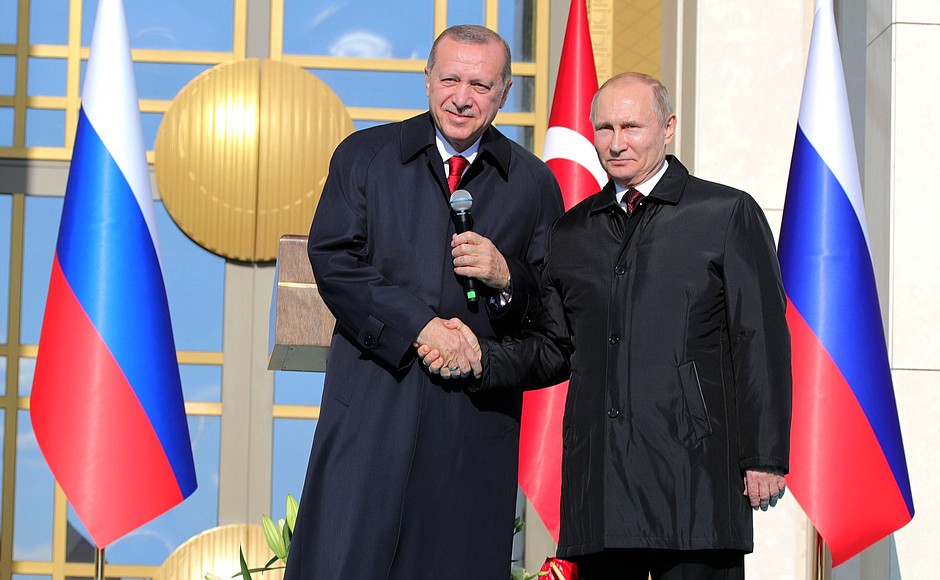 We are grateful to our Turkish colleagues for designating this project a strategic investment project and for expanding the list of tax incentives and preferences. I would like to thank all our Turkish friends for this decision. It has made our project economically expedient and profitable. I would also like to thank members of the Turkish parliament. What you have done will make the project much more attractive to potential investors. Dear friends, we are facing the ambitious goal of launching the first power unit in 2023, the year of the 100th anniversary of the Republic of Turkey. My dear friend Recep Tayyip Erdogan and I have agreed that we will do our best to attain this goal. I am confident that our plans will be implemented thanks to close interaction between the Russian and Turkish professionals involved. The successful implementation of this project will become a symbol of the dynamic and consistent development of Russian-Turkish interaction, partnership and friendship. I wish success to all participants in this project. All the best. Thank you. President of the Republic of Turkey Recep Tayyip Erdogan (retranslated): Mr President, my friend, guests, ladies and gentlemen, I cordially welcome all of you. First, I would like to welcome Mr Putin, the President of the Russian Federation, as well as the members of his delegation to our country. Today, we are witnessing a historic event from the point of view of both the development of our country and energy cooperation between Turkey and Russia. Today, my friend Mr Putin and I are pleased that together we are laying the foundation of the Akkuyu Nuclear Power Plant. I also want to express my gratitude to all members of the delegation and Mr Putin for the opportunity to be here at this ceremony. We have come a long way over the past 15 years, and this provides a good basis for developing relations between our countries. Today, we will also hold the 7th meeting of the High-Level Cooperation Council, which can be rightfully called a symbol of relations between our countries. We are implementing other strategic projects with Russia as well, including the S-400 and the Turkish Stream. The nuclear power plant is one of these projects. In addition, we can say that we are working closely with the Russian Federation to address terrorist threats and all the dangers arising from the conflict in Syria. Friends, the Turkish economy has been growing by 5.8 percent on average from 2003 to 2017. In 2017, our economy grew by 7.4 percent. By 2023, when we celebrate the 100th anniversary of our country as a republic, we have set ourselves the task of becoming one of the top 10 largest economies in the world. This means we will need more energy – oil and natural gas, as well as renewable energy sources. Over the past 15 years, we have carried out previously unthinkable major projects. On the other hand, investment in the energy sector to improve our energy security is also ongoing. Our country’s energy security is stable. This nuclear power plant is of great importance for our future in this regard. Currently, 31 countries are generating electricity at 450 nuclear power plants. Also, 55 nuclear power plants are being built in 16 countries around the world. We can say that the Akkuyu Nuclear Power Plant, the purpose of today’s groundbreaking, is the 56th plant. In 2023, we will commission the first reactor at this plant, and Turkey will thus join the countries that use atomic energy. In 2023, we will mark the 100th anniversary of our republic with the successful completion of this project. When all the reactors are operational, 10 percent of Turkey’s electricity will be generated at this plant. Today, our energy basket is largely dependent on oil, natural gas and coal, but we will become healthier once we have this plant. Nuclear power plants do not emit carbon dioxide; they produce clean and environmentally safe energy. This nuclear power plant will make a major contribution to our energy security and play a big role in combating climate change. This experience will undoubtedly lead to a greater number of employees with innovative skill sets. Importantly, hundreds of our students are currently studying at Russian universities. They will return home upon completion of their studies and start working here. Friends, I must also say that we will realise our half-century dream and build Akkuyu just as we have with many other projects. From the moment we decided to go ahead with Akkuyu, we have been in close cooperation with, above all, Mr Putin and the corresponding Russian authorities. Notably, we have experienced very good and close cooperation with our Russian colleagues. 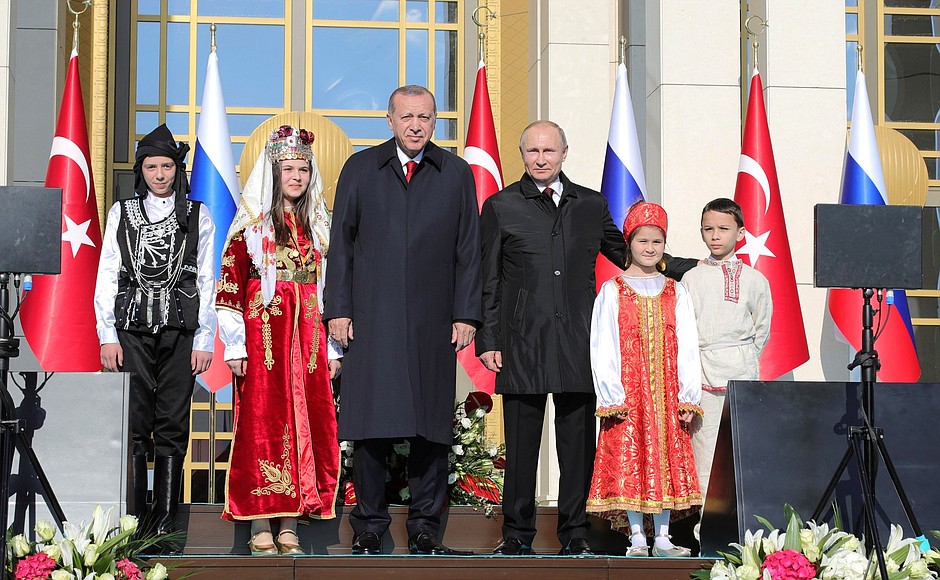 During such a difficult time, we have come a long way in a short time as a result of showing our will and serious approach to the matter. In this regard, I want to express my gratitude, first to my friend Mr Putin, and to all of our Russian colleagues. I also want to express my gratitude to our Prime Minister, Chairman of Parliament, as well as the deputies who assisted and supported us during this process. I want to thank the Minister of Energy and Natural Resources of Turkey separately. In addition, I want to express my gratitude to all those who supported us in this process. Our goal is to commission the first reactor in 2023. Once the project is completed, four nuclear power reactors will be commissioned. We continue our cooperation with Russia on all regional matters, and this cooperation is expanding every day. I believe that the construction of this project will be completed soon, and it will benefit our countries and our peoples. I greet you all cordially, from the bottom of my heart. The source of information - http://en.kremlin.ru/events/president/news/57190 High-Level Russian-Turkish Cooperation Council meeting Vladimir Putin and Recep Tayyip Erdogan chaired the seventh meeting of the High-Level Russian-Turkish Cooperation Council in Ankara. April 3, 2018 - 20:20 - Ankara 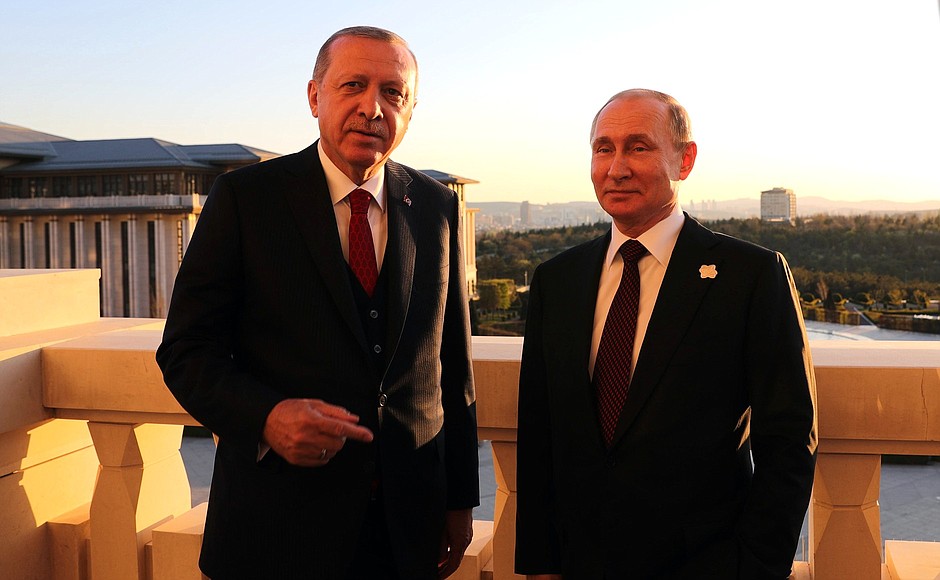 The discussion covered the current situation and prospects of bilateral trade and economic cooperation and the implementation of joint strategic projects, in particular, in the energy sphere, as well as current regional and international issues, including joint counterterrorism efforts and developments in Syria. The meeting of the High-Level Russian-Turkish Cooperation Council was followed by the signing of bilateral documents. The Russian Direct Investment Fund signed a Co-Investment Agreement with the Turkey’s Sovereign Wealth Fund. In addition, corresponding agencies of the two countries signed memorandums of cooperation in information technology, physical fitness and sports, social policy, and the rights of women, families and children. 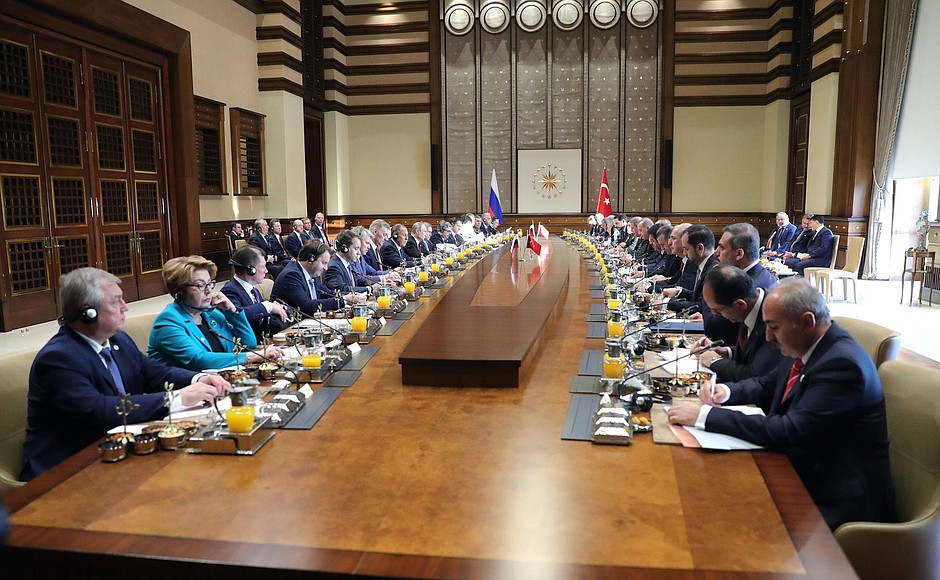 President of Russia Vladimir Putin: Mr President, ladies and gentlemen, The President of Turkey and I had businesslike and constructive talks in a restricted format. I hope that the High-Level Cooperation Council meeting will be as substantive. Our Turkish partners have put together an extensive agenda. With the participation of government members and representatives from the business community, we will discuss in detail a range of bilateral issues and outline concrete plans for the future. Notably, the Cooperation Council has the important task of ensuring the coordination of Russian-Turkish partnership in various fields based on the principles of mutual respect, equality and consideration of each other's interests. Notably, in preparation for this meeting, many contacts have taken place at all levels, during which bilateral and international issues were discussed openly and constructively, and arising issues were promptly resolved. The special mechanisms that have been created within the Cooperation Council maintain intensive dialogue and are in constant interaction. The Intergovernmental Commission coordinates cooperation in trade and investment. It is gratifying to know that by the end of 2017, trade between our countries increased by an impressive 40 percent to $22 billion. I am convinced that we can do even better. Our countries are increasing the volume of mutual investment. Reciprocal direct investment is approaching $10 billion from each side. The Russian-Turkish partnership in the energy sector has taken on a truly strategic dimension. Today, our countries made an important step towards strengthening cooperation in nuclear energy. During a videoconference, we gave the start for the construction of the first power unit of the Akkuyu Nuclear Power Plant. We expect Rosatom and our Turkish partners to launch the first unit in 2023, the year of the 100th anniversary of the Republic of Turkey. Russia is also a major supplier of natural gas for the needs of the Turkish economy. Last year alone, 29 billion cubic metres of gas were shipped. The Turkish Stream gas pipeline is being successfully implemented, and work on the offshore section has been completed. In the military-technical sphere, the contract for the delivery of S-400 Triumph anti-aircraft missile systems to Turkey is our priority. We believe that the prospects for further deliveries of modern Russian military products to Turkey will be substantively discussed during the forthcoming meeting of the corresponding intergovernmental commission. The Russian-Turkish Public Forum’s activities are designed to expand cultural ties between the two countries. Tourism is an important area for us. Last year, over 4.7 million Russian citizens visited Turkey to enjoy its resorts and rich cultural and historical heritage. Contact between people will be further promoted by holding a cross-year of culture and tourism in 2019. Ladies and gentlemen, I am confident that today's meeting will be held in a constructive and businesslike atmosphere and reflect the commitment of the leaders of both countries to further strengthen the partnership between Russia and Turkey. Thank you. 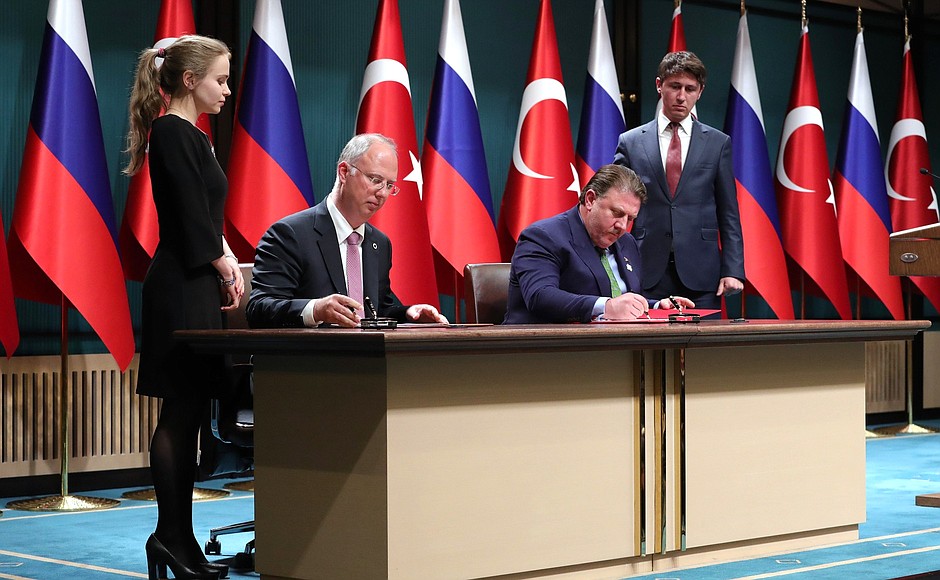 President of Turkey Recep Tayyip Erdogan (retranslated): I would like to say that we are glad that my dear friend, Vladimir Putin, and his delegation are attending the seventh meeting of the High-Level Cooperation Council. I would like to once again congratulate Mr Putin on his re-election as the President of Russia by the majority of votes. Also, I would like to take this opportunity to offer our condolences over the Kemerovo tragedy. Our heartfelt condolences to our Russian friends. Since the previous Council meeting, our relevant agencies have held other meetings and talks, which have produced positive results. They concern trade, tourism, relations between our people, as well as regional conflicts and a wide range of other matters. Today we have held the ground-breaking ceremony for a very large project, the Akkuyu Nuclear Power Plant. We have just completed one-on-one talks with my dear friend Mr Putin on so many not only regional but also international topics. At the same time, our relevant agencies held their own meetings as well. And now we will summarise the results of our talks and exchange views on the future of our relationship. I would like to say in this connection that our energetic efforts to restore peace, tranquillity and stability in the region will be continued. I hope that all our meetings will be beneficial for our region. Once again, welcome. The source of information - http://en.kremlin.ru/events/president/news/57191 Joint news conference of Vladimir Putin and Recep Tayyip Erdogan The news conference with the leaders of the two countries took place at the close of the first day of the working visit by the head of state of the Russian Federation to the Republic of Turkey. The presidents of Russia and Turkey made statements for the press and fielded questions from journalists. April 3, 2018 - 20:30 - Ankara 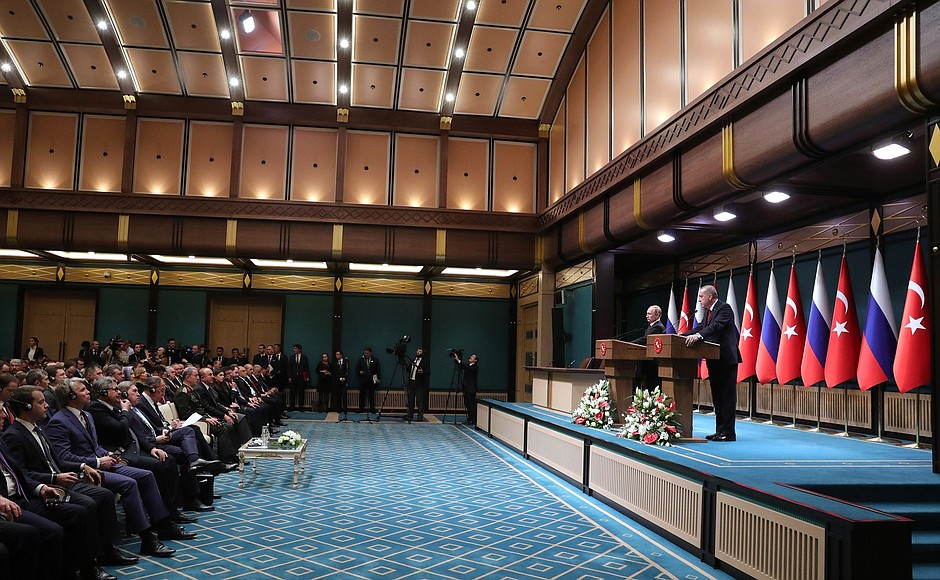 President of Turkey Recep Tayyip Erdogan (retranslated): Mr dear friend Mr Putin, ladies and gentlemen, I wholeheartedly welcome all of you. First of all, I would like to once again say with satisfaction that we are happy to welcome Mr Putin and the accompanying delegation to our country. I would like to again congratulate Mr Putin, who is my friend, on his victory in the presidential election. It is highly significant that Mr Putin has made his first foreign visit following the election to Turkey. This visit is evidence of the high level of relations between Turkey and the Russian Federation. I would like to offer our condolences to the Russian people over the Kemerovo tragedy. It is especially painful because the majority of the fire victims were children. We have completed the seventh meeting of the High-Level Cooperation Council. We have compared views on many issues at the Council meeting and in the one-on-one format. The Council members also held separate meetings. I would like to point out that our political dialogue is having a positive effect on the economy, trade and cultural ties. Compared to last year, our trade turnover has increased by 31 percent and exceeds $22 billion. Of course, we have a more ambitious goal. We want trade between our countries to grow to $100 billion. On the other hand, the talks on services and investment agreements should be completed as soon as possible, which will accelerate our movement towards the $100-billion target. As you know, today we launched the construction of the foundation for the Akkuyu Nuclear Power Plant. We plan to complete the first stage of this project in 2023. I hope we will be able to accelerate this process and so complete this project ahead of plan. As of now, we intend to invest some $20 billion or possibly more in this project. In the future, this plant will satisfy 10 percent of Turkey’s electricity needs. Work is underway on the second line of the Turkish Stream. We are also developing cultural and social relations. In 2019, Russia and Turkey will hold events within the framework of cross-years of culture and tourism. I believe that the Yunus Emre Cultural Centre, which opened in Moscow and the Russian Centre for Science and Culture in Ankara will seriously contribute to this. The number of Russian tourists coming in Turkey reached 4.7 million in 2017. This is the largest number of foreign tourists from any country. I believe the figure will increase to 6 million this year. We are willing to resume the efforts to liberalise the visa regime as soon as possible. Friends, The agenda of our talks included not just matters relating to bilateral relations but also and primarily the Syrian question, as well as other regional matters. As you know, we have coordinated the establishment of de-escalation zones during the Astana process. Tomorrow we will hold a trilateral summit with our Iranian friend to exchange opinions. I think that we will be able to discuss Syria and other topics at this summit. We will discuss ways to resolve the Syrian conflict. I would like to take this opportunity to say that we have held consultations with our dear friend regarding Operation Olive Branch. I have personally updated Mr Putin about this operation in Afrin. It was launched to ensure the security of Turkey and the territorial integrity as well as the national unity of Syria. We will continue to work together with Russia to restore stability, tranquillity and security in this region. This has to do with the Syrian problem. We continue to cooperate with our Russian friends and to discuss our concerns. Ladies and gentlemen, Over the past 15 years, the rapid development of Russian-Turkish relations was promoted by neighbourliness, common interests along with mutual respect. Of course, this has not just benefitted the citizens of Turkey and the region, who faced major tribulations. Certain forces certainly wanted to poison Russian-Turkish relations. Praise be to Allah, we have withstood this test. None of these provocations have attained their goals. Our relations continued to strengthen and have become strong as steel. I believe that we have managed to further strengthen our relationship during the meeting of the High-Level Cooperation Council held today. I would like to once again welcome our friend, Mr Putin, and the accompanying delegation to Turkey. I hope that our meetings will be beneficial for our nations. Thank you very much. 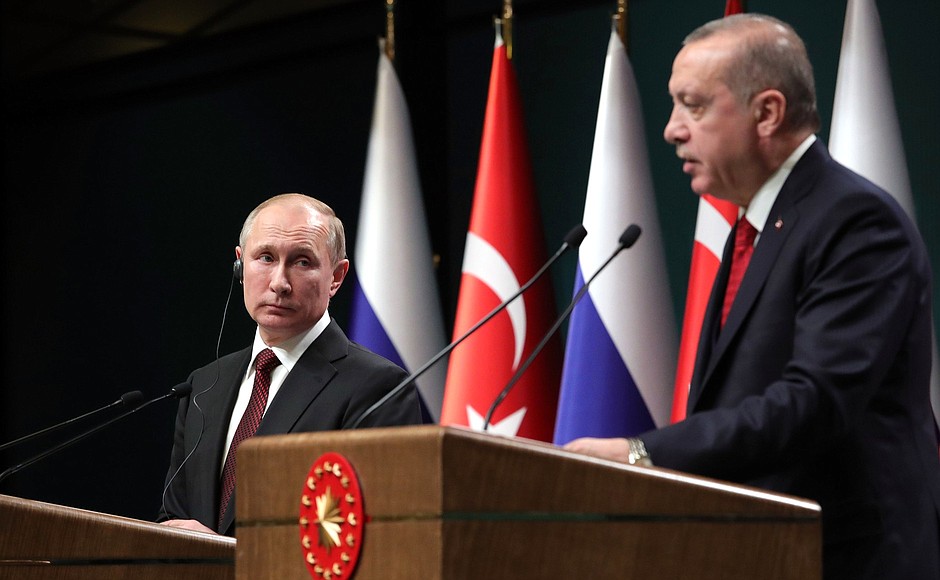 President of Russia Vladimir Putin: Mr President, ladies and gentlemen, To begin with, I would like to say that the programme of today’s visit was fairly intensive and substantial. At a restricted format meeting, the President and I discussed bilateral issues and a number of urgent international and regional matters. Later on, we reviewed the entire range of issues related to cooperation in politics, security, the economy, and the cultural and humanitarian area at a meeting of the High-Level Cooperation Council, which was attended by key ministers and heads of major companies. We mapped out areas for further joint work. A package of interdepartmental agreements and commercial documents was signed following the talks. Relevant ministries were instructed to draft a number of new agreements. I will note that cooperation between Russia and Turkey is making steady headway. Our political dialogue is intensive. Last year alone President Erdogan and I held eight full-scale meetings. Our foreign and defence ministries are in close contact, in particular, in the Joint Strategic Planning Group. Industry-specific ministries and parliamentarians are consolidating their ties. Our business circles are engaged in productive discussions of joint initiatives. I would like to add that today we focused primarily on economic and investment cooperation. The Mixed Intergovernmental Russian-Turkish Commission is playing an important coordinating role in the consolidation of economic ties. I would like to note with satisfaction that Russian-Turkish trade increased in 2017. Mr President cited the figures, but, according to our information, our trade grew even higher, by 40.5 percent to $22.1 billion. Russia has become the third largest market for Turkish exports after Germany and China. Meanwhile, Turkey has risen to 7th place among Russia’s largest foreign economic partners. We also intend to build up mutual investment. This will facilitate the creation of a joint investment platform with the participation of the Russian Direct Investment Fund and the Sovereign Wealth Fund of Turkey. Our cooperation in nuclear energy has reached the level of strategic partnership. As you could see today, Mr Erdogan and I have launched the construction of the reactor building of Akkuyu, Turkey’s first nuclear power plant. Our common task is to ensure that it becomes operational by 2023, the 100th anniversary of the Republic of Turkey. Work is proceeding on schedule on the Turkish Stream gas pipeline. We are building two lines of the pipeline’s underwater section. We will soon start implementing the onshore part of the pipeline, which will not just bring gas to the Turkish market and other countries in Southeast Europe, if they want this, but will also enhance the energy security of the region as a whole. There are good prospects for promoting our cooperation in the iron and steel sector, automobile manufacturing, the agricultural industry and the production of agricultural equipment, as well as in finance, innovation, high technology and research. We also discussed Russian-Turkish cooperation in the sphere of military technology, including the implementation of a contract for the supply of S-400 Triumf anti-aircraft weapon systems to Turkey. We have decided to accelerate the delivery of these highly effective Russian defence systems. We also talked about other promising military technology projects. We prioritise expanding cultural and humanitarian contacts and ties between our countries’ civil societies. The flow of Russian tourists to Turkey continues to grow and develop dynamically. As we have already said, almost five million people (4.7 million) visited Turkey last year. We believe this figure may grow to six million next year. In this connection, we have been discussing liberalisation of visa regime and negotiating what documents would allow visa-free travel. Today, we heard the proposals of the heads of relevant agencies. We discussed possible joint efforts to help resolve the crisis in Syria, to consolidate the ceasefire regime and to create favourable conditions for the intra-Syrian negotiating process in the context of the results of the Syrian National Dialogue Congress, which was held in Sochi, and the recent trilateral contacts in the Astana format. Mr President has already noted this. Tomorrow, we will discuss these matters further at a trilateral meeting with President of Iran Hassan Rouhani. We conducted a detailed exchange of opinions on other regional and international matters. In conclusion, I would like to thank our friend, President of Turkey Recep Tayyip Erdogan, for the detailed talks and hospitality that was accorded to our delegation. I would like to note that expanding Russian-Turkish cooperation fully meets the interests of both countries and helps maintain peace and stability in our region and beyond. Thank you. 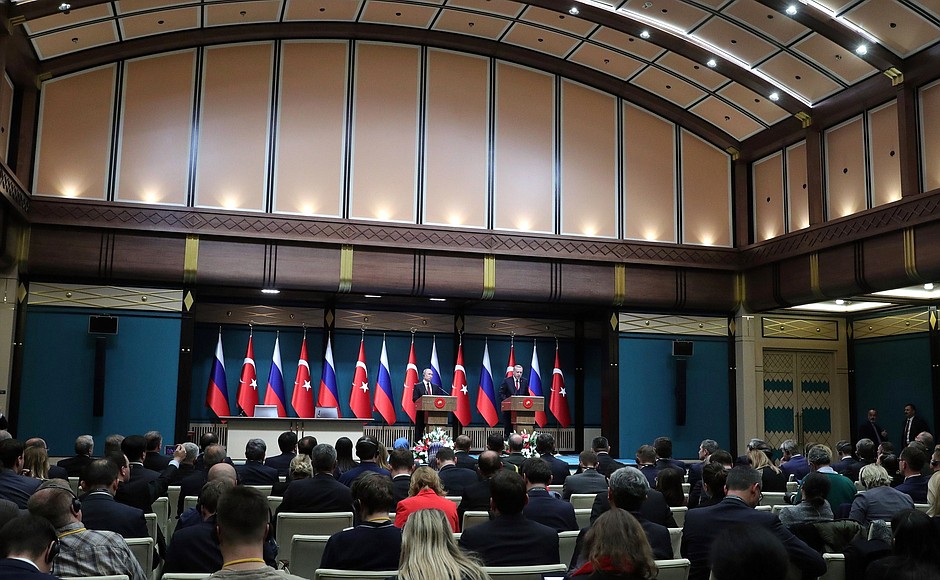 Question: I have a question for both leaders. You said today that the main drivers of bilateral relations are the largest projects, such as the Akkuyu Nuclear Power Plant, Turkish Stream and the supply of the S-400 systems. Given the negative and even confrontational agenda regarding Russia, do you see any factors that can hinder the implementation of these plans? Vladimir Putin: You mentioned negative and even provocative factors in international affairs. There are no such factors in our relations with Turkey. On the contrary, our bilateral relations are developing highly constructively. You can see the result in our trade and economic cooperation and in the speed with which we are implementing large projects, as I have just said. This concerns Turkish Stream and our nuclear projects. As concerns the supply of gas to Turkey and the Turkish Stream pipeline project, negotiations with our European partners regarding the second line of Nord Stream 2 have been underway for years. I hope these negotiations will produce a positive result, but we are still in talks, whereas a similar project with Turkey will be completed soon. It has entered the final stage. Turkey is a priority and highly reliable partner in this and in all other spheres. This includes compliance with our agreements on many large regional problems that we face and want to resolve. I do not see any problems that would hinder the further development of our relationship with the Republic of Turkey. Recep Tayyip Erdogan (retranslated): First of all, I would like to tell our dear friend that Turkey took the decision regarding the S-400 missiles independently. And our dear friends in the Russian Federation gave an affirmative answer to our request, as a result of which we have reached an agreement on the supply of the S-400 systems. This matter is closed. The missiles we are to receive are being manufactured. I would also like to say that our Russian partners have expedited the supply of these missiles to Turkey. As for your other question, regarding the Akkuyu NPP, I can tell you that we should have launched this project sooner, because this power plant will generate 10 percent of the electricity Turkey needs. Russia has taken a decision that has facilitated this project. Moreover, I would like to say that this decision will also help us increase the number of skilled personnel. Taken together, this shows that our cooperation in this sphere has been fruitful. We are satisfied. Today we launched the construction of the reactor building. This will help create a new international image of Turkey. Question: I have a question for the Russian President. Have you discussed the so-called Skripal case and the British position on this matter at today’s meeting with Mr Erdogan? How do you assess this situation, given the latest information coming from the UK? Vladimir Putin: We have broached this subject in passing. Mr President asked some questions in this regard, and I set out our position. As you may know, I myself learned about this incident from the media; I said so time and again. I would only like to add that, according to international experts, about twenty countries in the world can manufacture these neuropathic substances – twenty countries! Scotland Yard, as you know, went on record as saying that it needed no less than two months for a full-scale investigation. Finally, as I have been informed just now, the general director of the laboratory in Porton Down – it is located within eight kilometres of the incident site – told Sky News that his laboratory staff had failed to identify the country of origin of this neuropathic substance. They are unable to identify the country of origin. Neither are they able to say that this substance was produced in the Russian Federation. In this connection, first, one is surprised by the speed, with which they whipped up an anti-Russia campaign, and I would like to inform you, although we have mentioned this already: We are convening a session of the Executive Council of the international Organisation for the Prohibition of Chemical Weapons tomorrow to analyse this situation in the minutest detail. We brought up at least 20 questions, and I hope that this discussion will draw the bottom line under what has happened. We are most certainly interested in a full-scale investigation and we would like to have access to this; we hope to receive the relevant material, because Russian Federation citizens are involved. As you may know, the Investigative Committee of the Russian Federation has opened a criminal case and it will definitely be investigated. 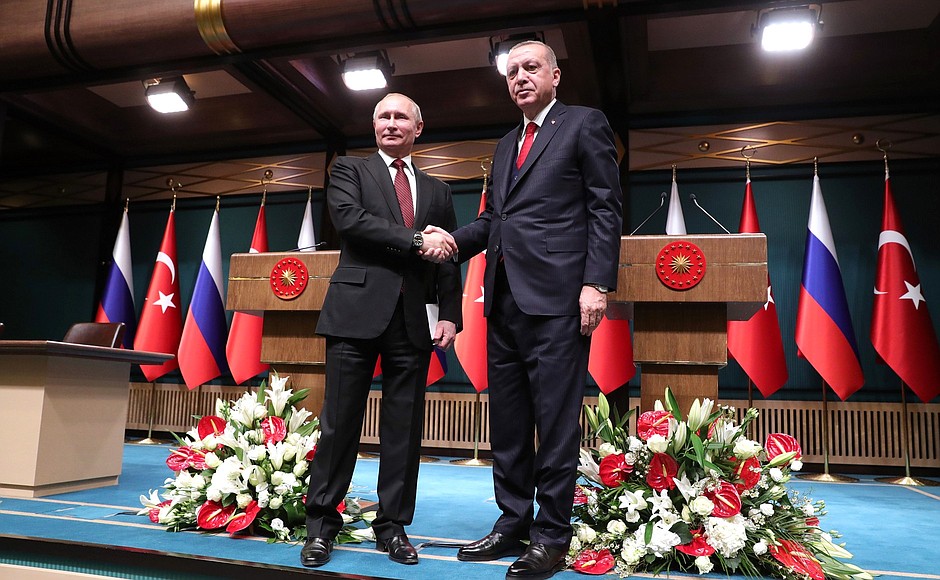 Question (retranslated): My first question is for Mr Putin. It is a fact that Turkey conducted Operation Olive Branch and closely coordinated its actions in Syria with Russia. What does Russia think about the future of organisations such as the Democratic Union Party in Syria? My second question is for Mr Erdogan: What do you expect Russia to do in this respect? Vladimir Putin: This is how we address the task of combating terrorism. We are working together with Syria and several other countries that are interested in resolving the Syrian conflict, first of all to ensure Syria’s territorial integrity and sovereignty and to root out terrorism in its territory. We intend to continue to cooperate with Turkey in this sphere. As for the future of Syria and the future and ongoing political dialogue, we believe that Kurds are part of the multinational people of Syria and so have the right to take part in all political processes there and to find their place in Syria’s future. On the other hand, we believe that all processes in this sphere must be coordinated by the parties concerned as closely as possible. Otherwise, the desired result will not be achieved. As for who exactly must take part in these political negotiations and which place each of Syria’s ethnic groups will hold in the future, this is for Syrians themselves to decide. Question (retranslated): Mr Putin, you have said a decision was taken to accelerate the delivery of the S-400 systems. What do you think about the idea of the joint production of these systems? Mr Erdogan, I would like to ask you if you discussed any other issues of military cooperation apart from the S-400. Vladimir Putin: I have said that we discussed various issues, including the possibility to expand our cooperation in the sphere of military technology. As for the accelerated delivery of the S-400 systems, we have taken this decision at the request of our Turkish partners and friends. We have accelerated the manufacturing of these systems and coordinated the price, which is very important. As for joint production, the transfer of technology is not a matter of trust or political interaction. It is a purely commercial issue that is decided between economic entities. There are no military or political considerations or limitations in this sphere. Recep Tayyip Erdogan: Friends, as Mr Putin has said, we have an agreement regarding the S-400. The manufacturing company will work on this project, and as for the price, we have reached an agreement. There is no problem with accelerating the deliveries. We have an agreement on this issue as well. It should be said that different opinions regarding defence projects are considered when such decisions are made. I believe that Russian companies are also transparent in this regard. Our agencies and defence companies will conduct and are conducting meetings on these issues. We are definitely monitoring the situation. Thank you very much. The source of information - http://en.kremlin.ru/events/president/news/57192 Telephone conversation with Patriarch Bartholomew I of Constantinople As part of his visit to the Republic of Turkey, Vladimir Putin had a telephone conversation with Patriarch Bartholomew I of Constantinople. April 3, 2018 - 23:55 - Ankara 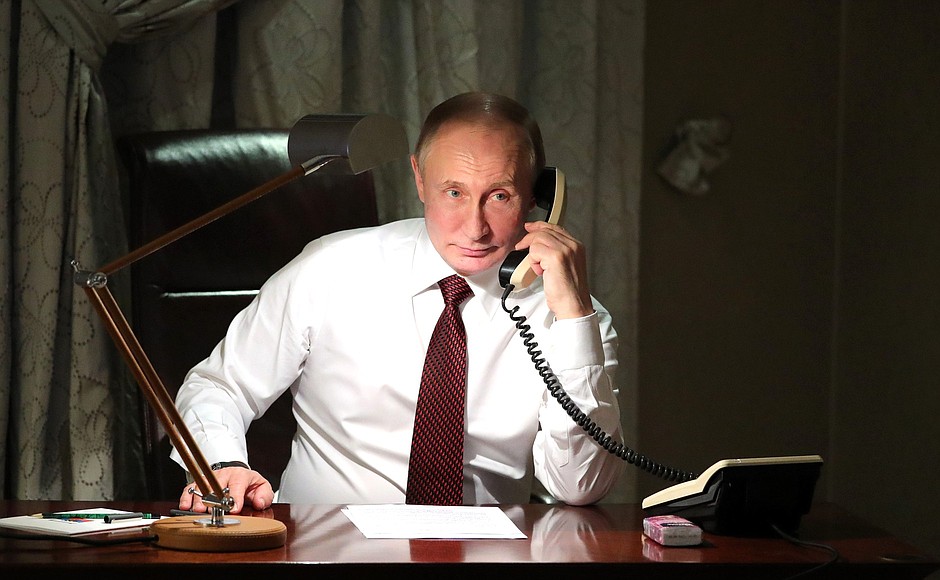 The Patriarch of Constantinople congratulated Vladimir Putin on his victory in the presidential election and wished him a happy Easter. The President of Russia conveyed to Bartholomew I best wishes from Patriarch Kirill of Moscow and All Russia and expressed special gratitude for his constant efforts to support unity of the Orthodox world. Vladimir Putin went on to highlight proactive social and charitable activity by the Patriarch of Constantinople, specifically his major contribution to enabling the Russian-speaking community in Turkey to satisfy its religious needs. The source of information - http://en.kremlin.ru/events/president/news/57193 Meeting with President of Iran Hassan Rouhani The second day of Vladimir Putin’s working visit to Turkey began with a meeting with President of Iran Hassan Rouhani. April 4, 2018 - 12:20 - Ankara 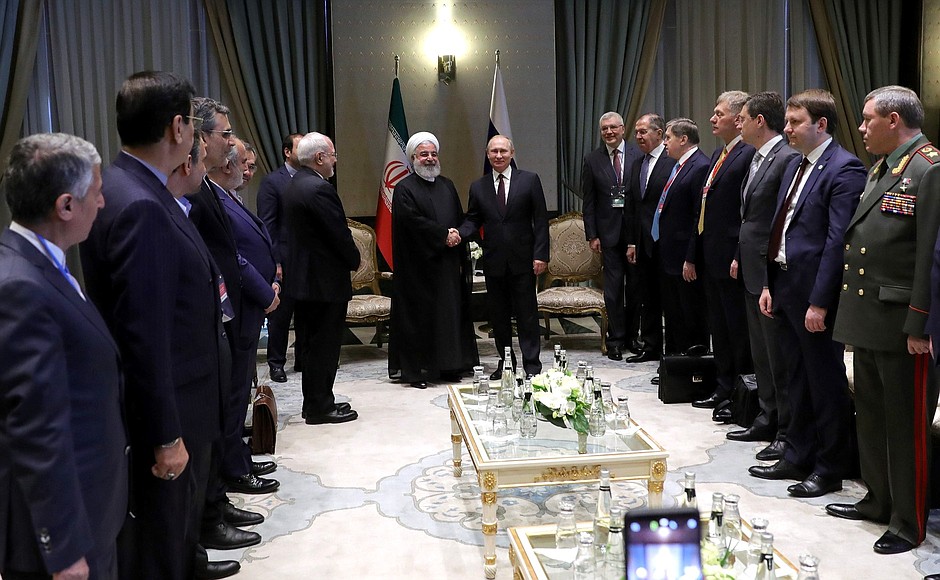 The two leaders discussed current matters relating to bilateral relations, as well as international and regional topics. A trilateral meeting of the presidents of Russia, Iran and Turkey will be held later on. 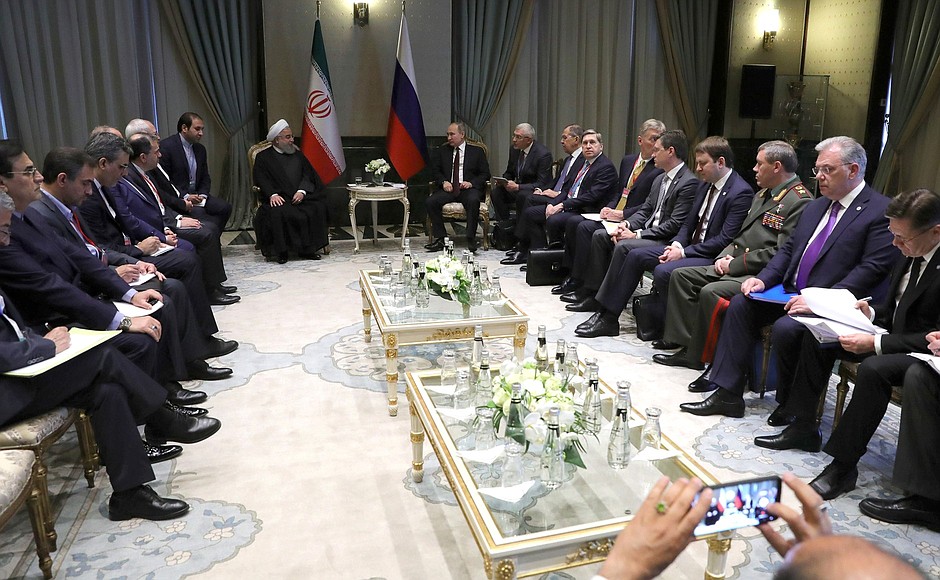 President of Russia Vladimir Putin: Mr President, friends, I would like to wholeheartedly welcome you, this time within the framework of a trilateral meeting. We maintain regular dialogue at practically all levels and in all spheres of our interaction. 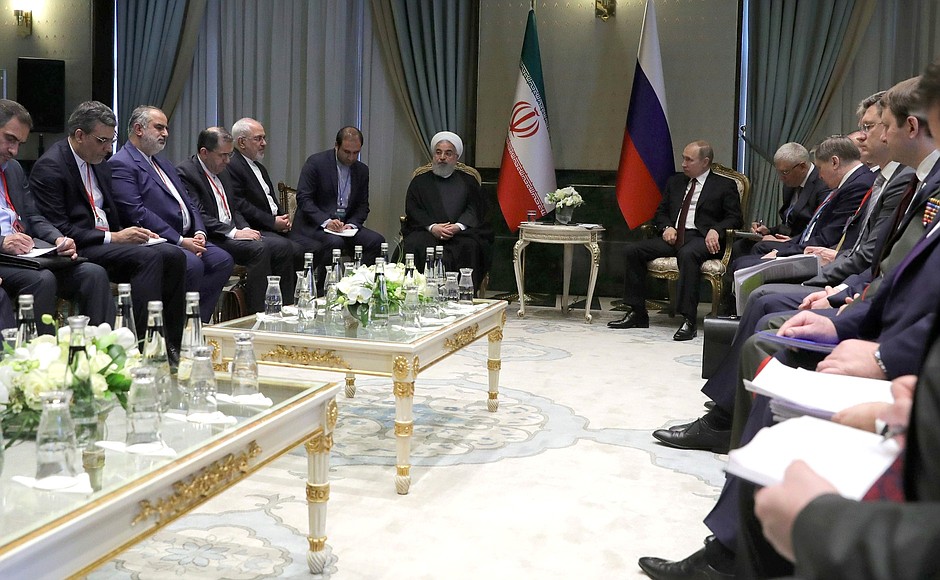 We maintain regular political contacts, including personally with you. I also met with Iran’s spiritual leader during my visit to your country. Our foreign ministers work in close contact, as do our defence officials as well. We are working together on the most painful current subjects, including that of the Syrian problem. 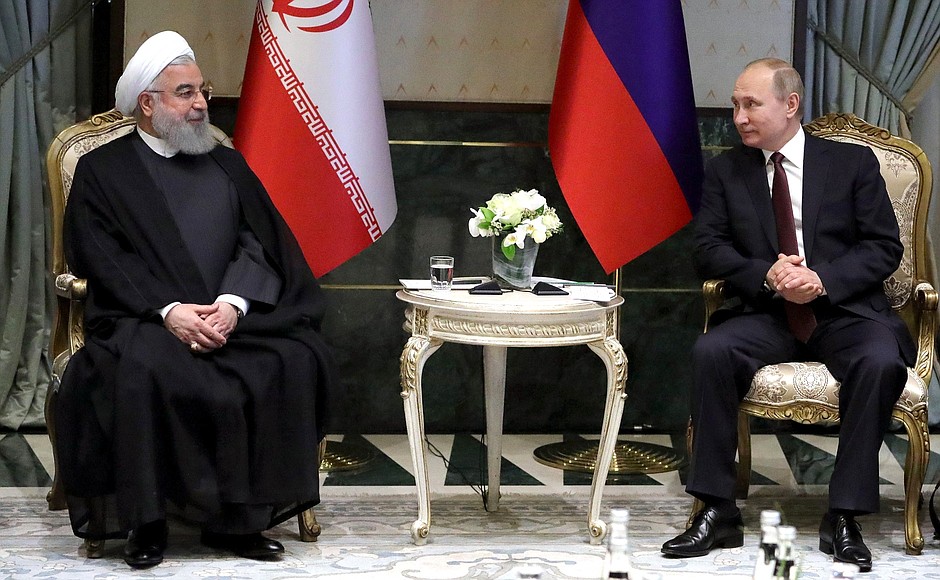 I am very glad that we have met once again, because such meetings offer us an opportunity to talk about bilateral ties and what we can do to develop them, as well as about international affairs, primarily in the region. 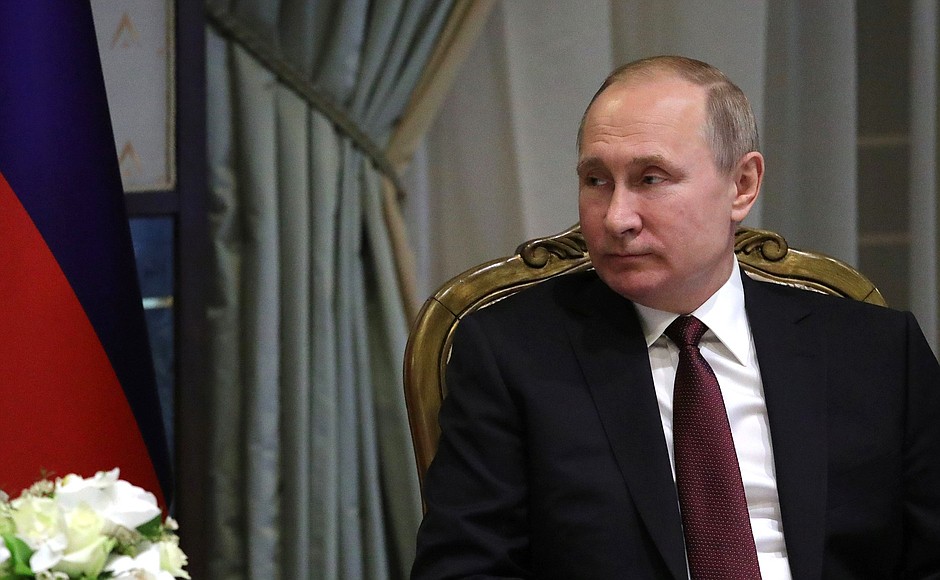 President of Iran Hassan Rouhani (retranslated): Mr President, I am very glad to have this opportunity to meet with you again. It is our 12th meeting over the past four years and several months. This shows that our countries hold similar views on bilateral matters as well as international topics. 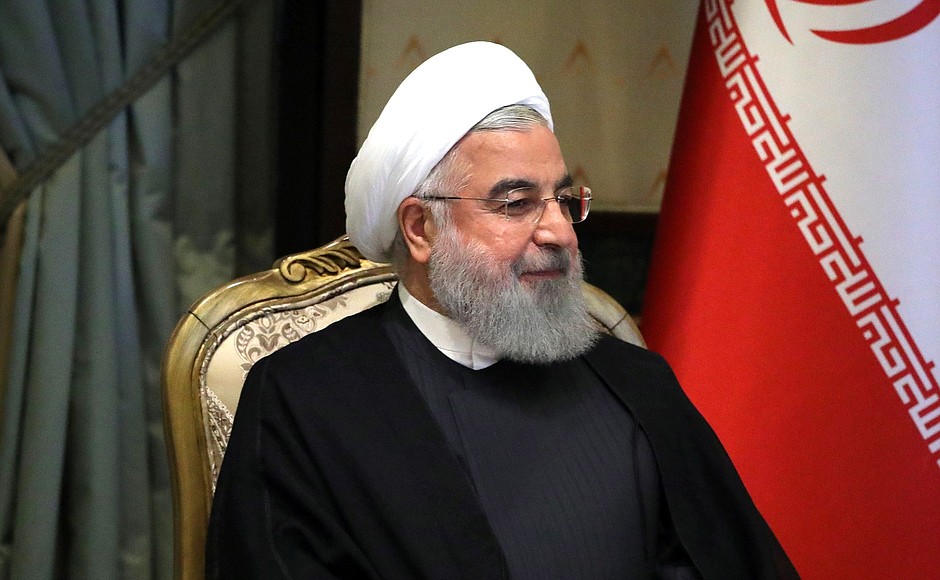 Speaking about regional affairs, we maintain close cooperation, in particular regarding the Syrian settlement. I would like to say that the summit that was held in Sochi at your initiative has launched our movement towards the settlement of the Syrian crisis. After that summit meeting, you hosted the Syrian National Dialogue Congress in Sochi, which has produced good results. 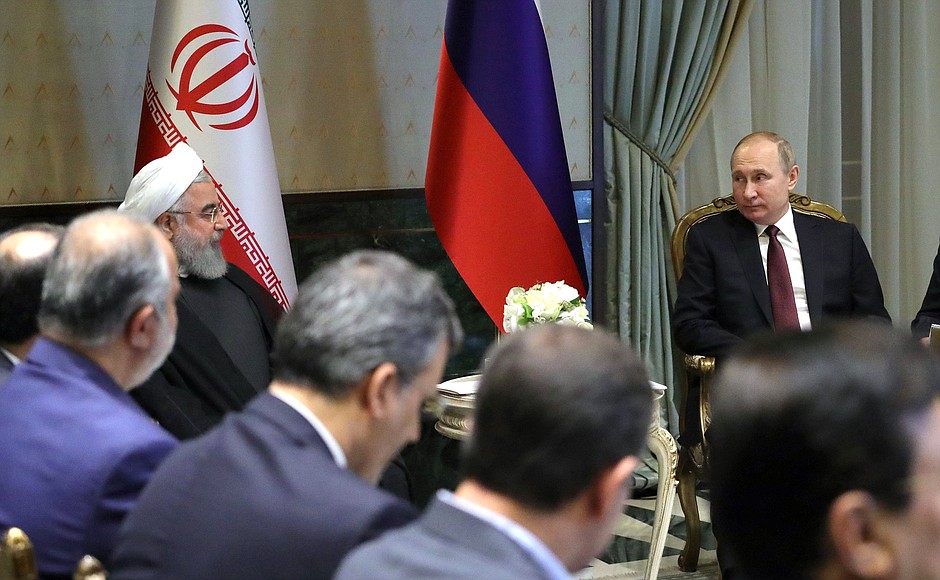 I am very glad that the second round of our three countries’ summit is being held in Ankara. We have three ambitious goals: security and stability, the repatriation of refugees, and the choice of Syria’s future by Syrians themselves. I hope that our meeting today will facilitate the restoration of peace and security in our region. The source of information - http://en.kremlin.ru/events/president/news/57197 Meeting of the presidents of Russia, Turkey and Iran The second trilateral meeting of the heads of state, guarantors of the Astana process for facilitating the Syrian peace settlement, was held in Ankara. April 4, 2018 - 16:15 - Ankara 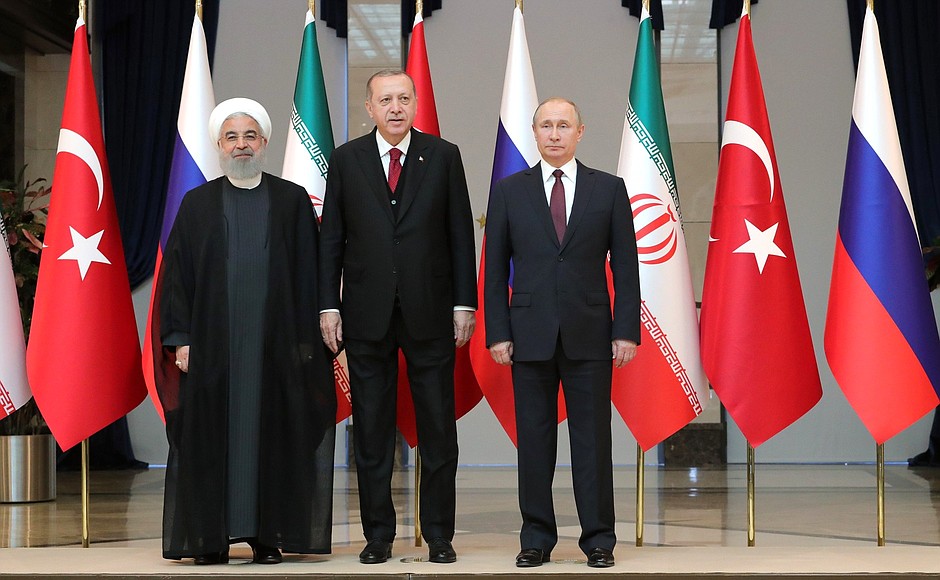 The meeting between President of Russia Vladimir Putin, President of Turkey Recep Tayyip Erdogan and President of Iran Hassan Rouhani took place at the Presidential Palace. 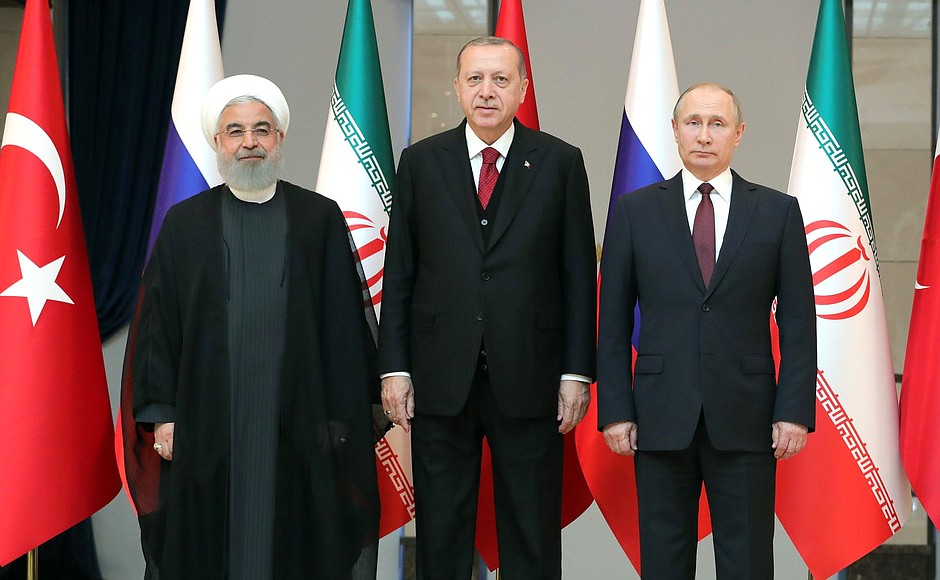 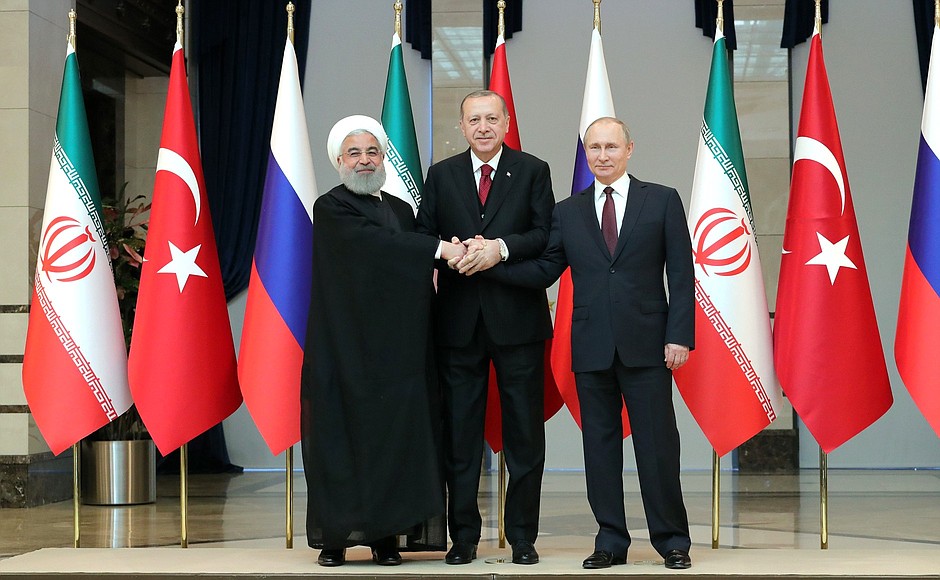 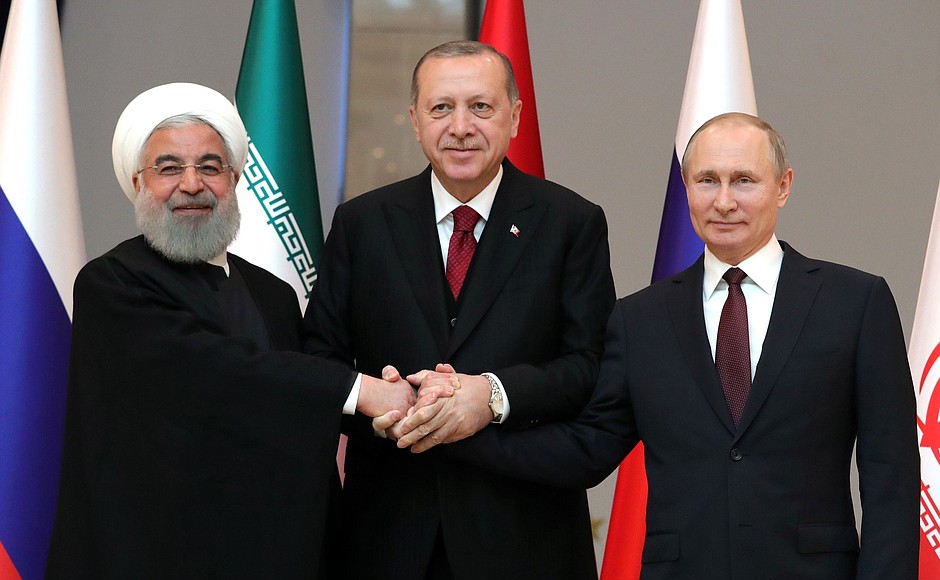 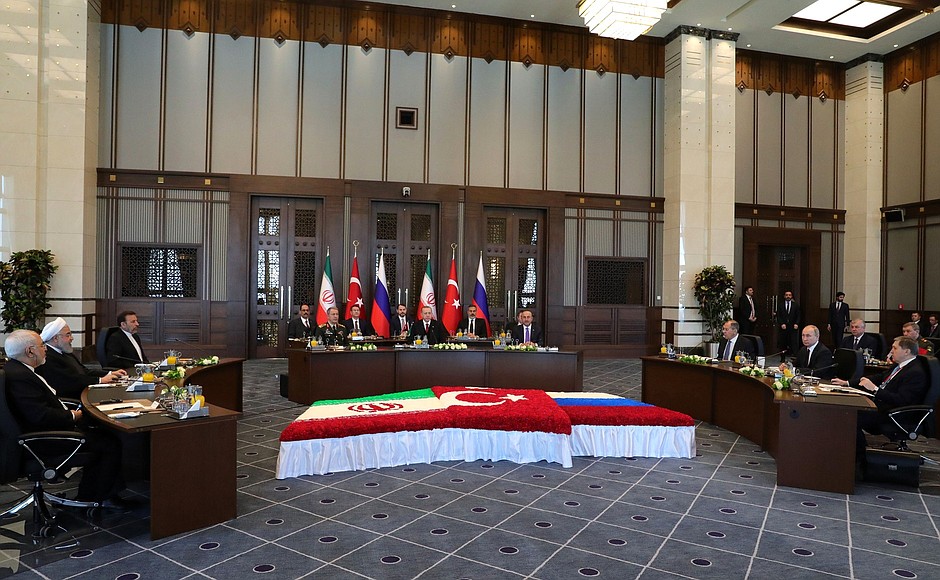 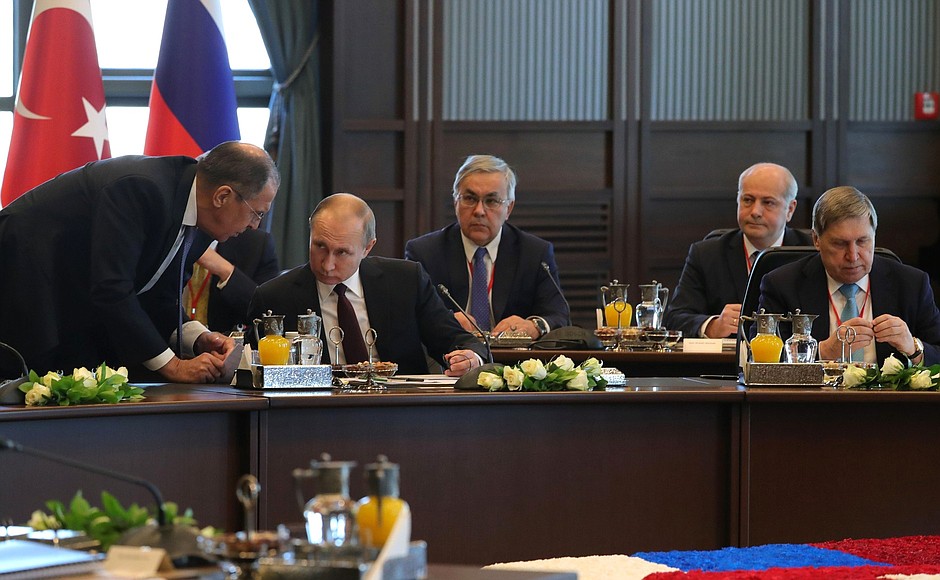 Following the summit, the three leaders adopted a joint statement. 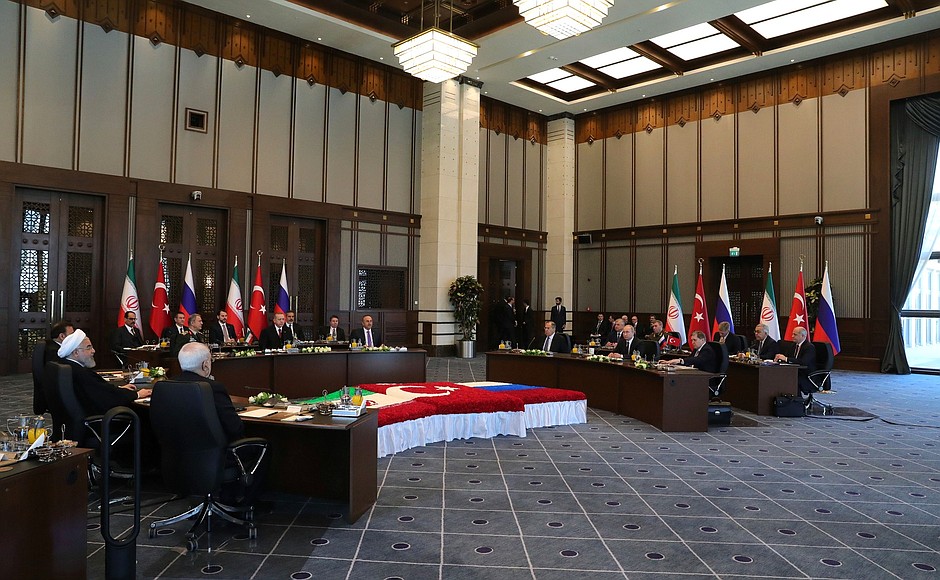 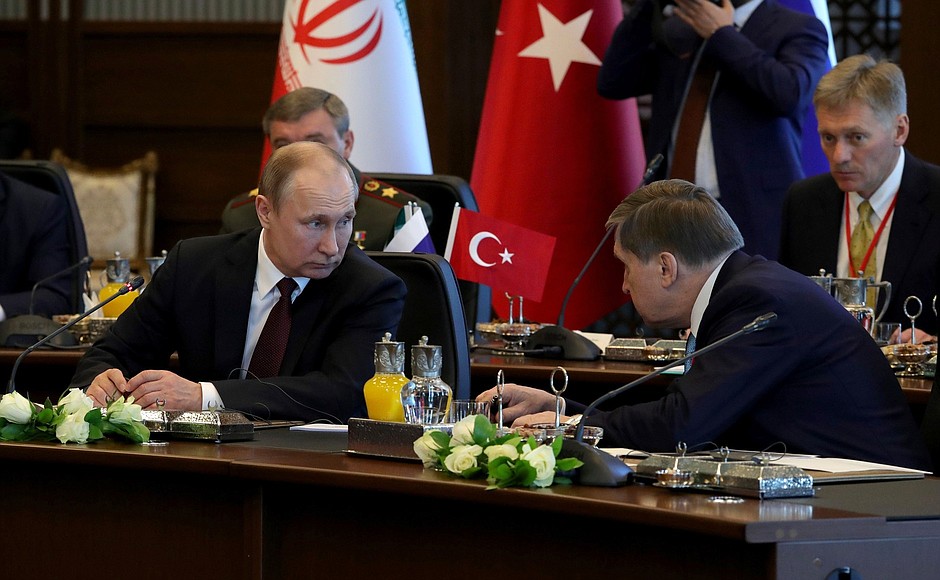 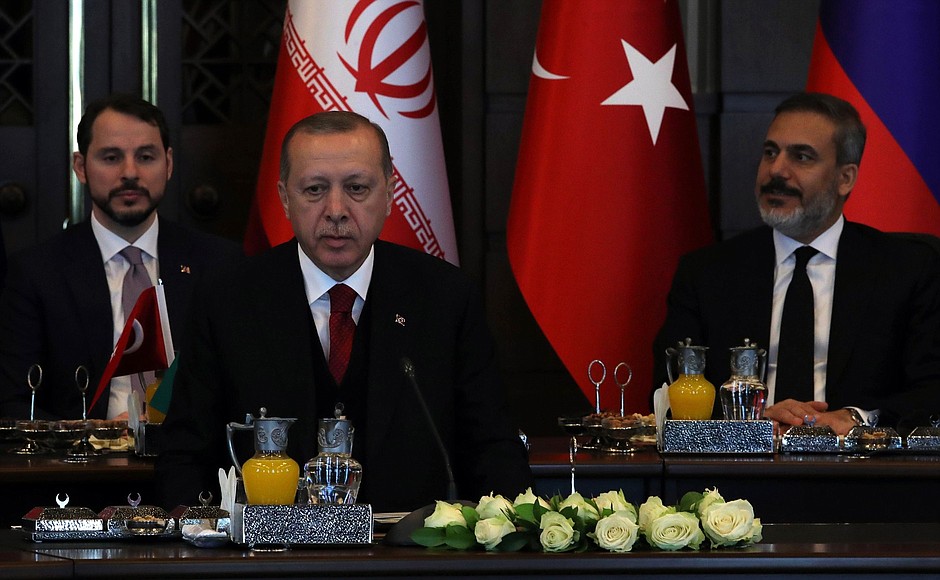 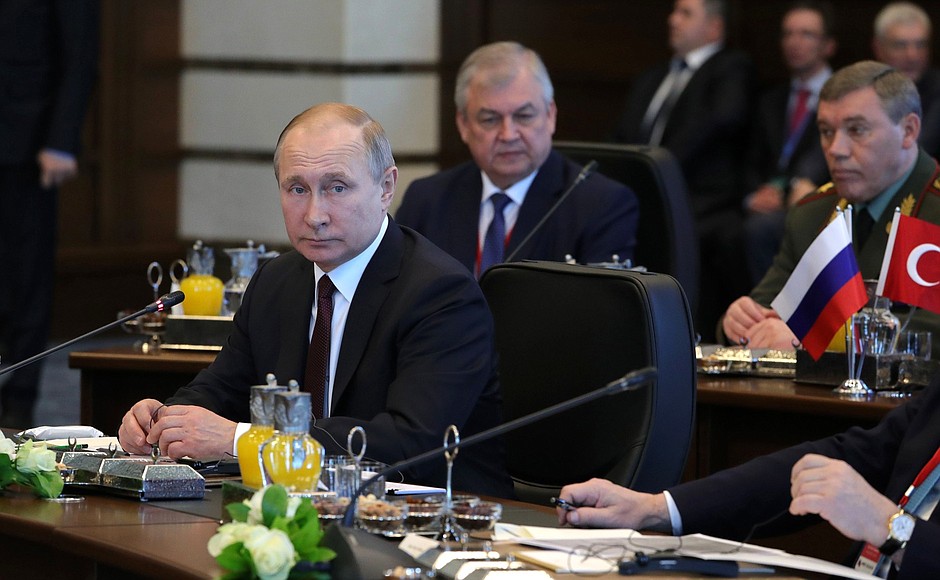 The presidents of Russia, Turkey and Iran also gave a joint news conference. The source of information - http://en.kremlin.ru/events/president/news/57199 Joint Statement by the Presidents of the Islamic Republic of Iran, the Russian Federation and the Republic of Turkey April 4, 2018 President of the Islamic Republic of Iran H.E. Hassan Rouhani, President of the Russian Federation H.E. Vladimir Putin and President of the Republic of Turkey H.E. Recep Tayyip Erdoğan gathered in Ankara on 4 April 2018 for a tripartite meeting. The Presidents Took note of the developments regarding Syria since their last meeting on 22 November 2017 in Sochi; Expressed their satisfaction with the outcomes of the first year of the Astana meetings held since January 2017, underlined that the Astana format had been the only effective international initiative that had helped reduce violence across Syria and had contributed to peace and stability in Syria, giving impetus to the Geneva process in order to find a lasting political solution to the Syrian conflict; Reaffirmed their determination to continue their active cooperation on Syria for the achievement of lasting ceasefire between the conflicting parties and advancement of the political process envisaged by the UN Security Council Resolution 2254; Emphasized their strong and continued commitment to the sovereignty, independence, unity, territorial integrity and non-sectarian character of Syria. They highlighted that none of the actions, no matter by whom they were undertaken, should undermine these principles, confirmed by relevant UN resolutions and by the will of the representatives of all segments of the Syrian society. They rejected all attempts to create new realities on the ground under the pretext of combating terrorism and expressed their determination to stand against separatist agendas aimed at undermining the sovereignty and territorial integrity of Syria as well as the national security of neighboring countries; Expressed their conviction that the Syrian National Dialogue Congress, which was convened in Sochi on 30 January 2018, constituted an important milestone in paving the way for the political process, reiterated their commitment to follow up on the results of the Congress, reflecting the will of representatives of all segments of the Syrian society, in particular the agreement to form a Constitutional Committee, supported by the UN Secretary-General and the international community. They reaffirmed their support to facilitate the beginning of the Committee’s work in Geneva as soon as possible with the assistance of the United Nations Secretary-General’s Special Envoy for Syria and in coordination with three guarantor states; Called upon the representatives of the Government of the Syrian Arab Republic and the opposition committed to the sovereignty, independence, unity, territorial integrity and non-sectarian character of Syria as well as the international community to support the results of the Syrian National Dialogue Congress; Expressed their conviction that there could be no military solution to the Syrian conflict and that the conflict could be ended only through a negotiated political process; Reiterated the necessity to assist the Syrians in restoring the unity of their country and in achieving a political solution of the ongoing conflict through an inclusive, free, fair and transparent Syrian-led and Syrian-owned process based on the free will of the Syrian people and leading to a constitution enjoying the support of the Syrian people, and free and fair elections with the participation of all eligible Syrians under appropriate UN supervision; Reaffirmed their determination to continue their cooperation in order to ultimately eliminate DAESH/ISIL, Nusra Front and all other individuals, groups, undertakings and entities associated with Al-Qaeda or DAESH/ISIL as designated by the UN Security Council in Syria and underscored the success of their collective efforts in the fight against international terrorism; Underlined that, in the fight against terrorism, separating the above-mentioned terrorist groups from the armed opposition groups that had joined and would join the ceasefire regime bore utmost importance with respect to preventing civilian casualties; Welcomed the UN Security Council Resolution 2401 in response to the grave humanitarian situation all across Syria, including in Eastern Ghouta, Yarmouk, Foua and Kefraya, Idlib Governorate, Northern Hama Governorate, Rukhban and Raqqa; strongly urged the conflicting parties to comply with the provisions of the said Resolution, including by refraining from ceasefire violations; Underscored their joint determination to speed up their efforts to ensure calm on the ground and protect civilians in the de-escalation areas as well as to facilitate rapid, safe and unhindered humanitarian access to these areas and emphasized that the creation of de-escalation areas was temporary as provided for by the Memorandum of 4 May 2017; Called upon the international community, particularly the UN and its humanitarian agencies, to increase its assistance to Syria by sending additional humanitarian aid, facilitating humanitarian mine action, restoring basic infrastructure assets, including social and economic facilities, and preserving historical heritage; Welcomed the convening of the first meeting of the Working Group on the release of detainees/abductees and handover of the bodies as well as the identification of missing persons in Astana on 15 March 2018 with the participation of three guarantors as well as the UN and ICRC, and emphasized the importance of the effective functioning of the Working Group which would help build confidence between the conflicting parties; Decided to hold their next meeting in the Islamic Republic of Iran upon the invitation of the President of the Islamic Republic of Iran H.E. Hassan Rouhani. The Presidents of the Islamic Republic of Iran and the Russian Federation expressed their sincere gratitude to the President of the Republic of Turkey H.E. Recep Tayyip Erdoğan for hosting this Tripartite Summit in Ankara. The source of information - http://en.kremlin.ru/supplement/5297 News conference following a meeting of the presidents of Russia, Turkey and Iran Vladimir Putin, Recep Tayyip Erdogan and Hassan Rouhani held a joint news conference following the second trilateral meeting of the heads of states, guarantors of the Astana process for facilitating the Syrian peace settlement. April 4, 2018 - 16:20 - Ankara 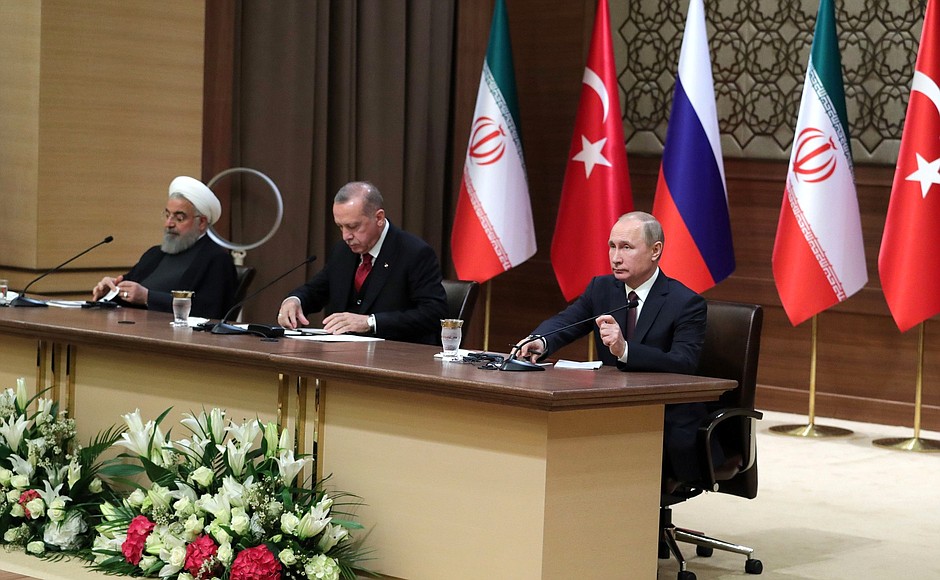 President of the Republic of Turkey Recep Tayyip Erdogan (retranslated): Friends, President Putin, President Rouhani, ladies and gentlemen, I cordially greet all those present here. In the presence of all our friends, I once again welcome my dear friend Mr Putin and Mr Rouhani to our country. Today, we welcome our guests here at the summit, which is the expression of our efforts towards establishing security, peace and calm in Syria. Last November, Mr Putin welcomed us to Sochi during the first summit to resolve the Syrian conflict. Today, we held talks and identified some steps that, we believe, will show us the way to the future of our region. Turkey is strictly complying with its commitments regarding the de-escalation zones. Having recently established the 8th observation post in Idlib, we, I believe, have thus demonstrated our determination. We hope that the entire world will pay attention to one point with regard to Syria. We believe that ensuring the territorial security and territorial integrity of Syria depends on whether we treat all terrorist organisations on an equal footing. However, terrorist organisations that pose a threat not only to Syria, but also to Turkey and other neighbouring countries in the region, must be eliminated from the game. As a result of the Euphrates Shield military operation, Turkey eliminated about 3,000 terrorists and thus demonstrated that it is doing more than others to fight the terrorist organisation DAISH. However, Turkey is also a country that has sacrificed much during the attacks by DAISH. A military operation codenamed the Olive Branch was equally important. During this operation, we fought against the so-called people's self-defence forces, YPG, which represented threats to Syria’s territorial integrity. We have liberated about 4,000 square kilometres from the terrorists. Thus, we are not only ensuring the security of this region but are building infrastructure in liberated areas and are returning these territories to their actual residents, the people of Syria. Everyone is aware that over 3.5 million Syrian refugees are residing in Turkey. After liberating Jarabulus and Al-Bab, 160,000 Syrian refugees returned to the liberated territories. Once we are done demining Afrin, we will also help rebuild the infrastructure. We expect hundreds of thousands of Syrians to return to their homes. Alongside our Russian and Iranian friends, we will work together to build the infrastructure. As for, above all, the Manbij region, we would like to repeat that we will continue our operations until we liberate these territories from the YPG, the so-called people's self-defence forces. The struggle against YPG, against these terrorist groups is no obstacle in the fight against DAISH, on the contrary, it adds to the struggle. These terrorist organisations, like DAISH, like the YPG and the so-called Democratic Union constantly complement one another and impede the establishment of peace and stability in the region. Attention should be paid to this. First a terrorist organisation like DAISH is formed, then what looks like a fight against that organisation continues. The YPG and the “Democratic Union” seem to start fighting this terrorist organisation. But the thing is that the path is opened for DAISH precisely by the circles that want chaos to continue there. Allegedly the fight against DAISH continues, but then a second terrorist organisation is formed. We have special relations with the Syrian people, so what happens in Syria has special significance for us. In the course of continuing Turkish operations in Syria we do everything we can to minimise civilian casualties. If one compares the fighting and liberation of cities from terrorist organisations with other operations, that is, when other forces are waging this kind of struggle, it can readily be seen that we do everything we can, we make every effort to minimise civilian losses. After these operations Syrian citizens in the liberated territories live in calm, stability and peace. On the territories controlled by terrorist groups, chaos and bloodshed continue, this is obvious. As guarantor countries we must ensure Syria’s territorial integrity and stop the bloodshed. The guarantor states have agreed on that for the sake of Syria’s new future. As a result of this crisis and these clashes, the people of Syria and the countries in the region are the losers. And we all know who the winners are. Ahead lies an arduous path, but we also see some success. We cannot leave the region to several terrorist organisations, neither Syria, nor the region as a whole. As guarantor states we will continue our resolute work in accordance with our common principles. We will not give in to provocations and fall into traps. The international community should also pay attention to this. Once again I urge the international community to make every effort to ensure justice and a political resolution to the issues. In conclusion I would like to once again welcome our guests to our country. I believe that our consultations and the measures and steps taken will benefit the oppressed people of Syria and the whole region. Again, I would like to thank my dear friend Mr Putin and my dear brother Mr Rouhani. I give the floor to President Rouhani. You are welcome. 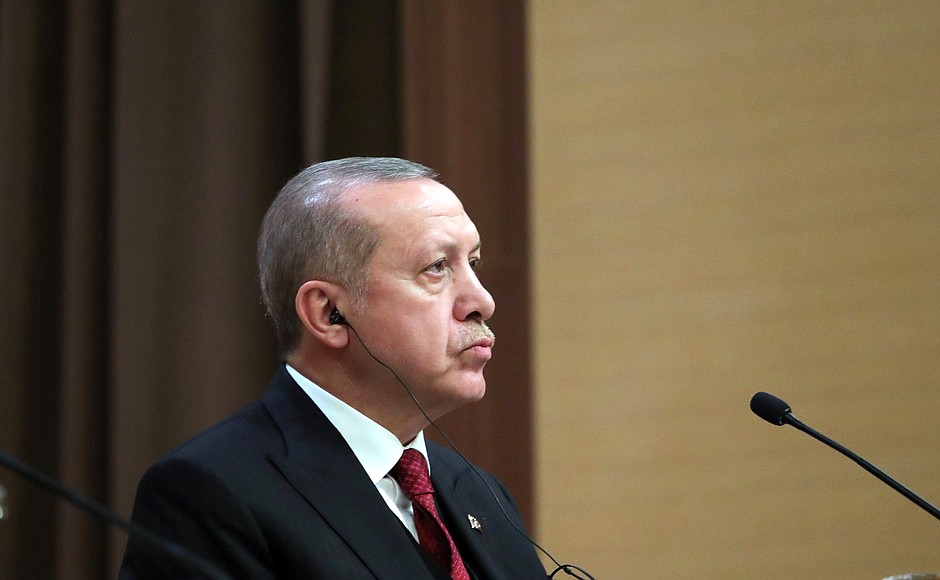 President of the Islamic Republic of Iran Hassan Rouhani (retranslated): In the name of God, the Most Merciful! First, I must thank Mr Erdogan, the Turkish President, the Turkish Government and the Turkish people for receiving us and for the hospitality accorded to me and the other guests from Iran and Russia. Today and yesterday you received both Russians and Iranians. In the last few years our region has been facing the very serious crisis that is called terrorism. Regrettably, these terrorists are supported by some Western countries. Certain states are funding them and equipping them with new weapons. These are the same terrorists that produced and sold Syrian oil, and destroyed Syrian museums and, unfortunately, freely sold the artefacts they found in these museums. It is highly regrettably but some super powers, including the United States, would like to use the terrorist groups of DAISH and Jabhat al-Nusra as an instrument of controlling this region. Such large nations as the Iraqis and the Syrians have neutralised this conspiracy with the assistance of friendly countries. DAISH no longer exists as a force. There are leftover parts of it but they are no longer a force, not a big force. Now after several years of fighting the terrorists the region’s nations have more hope than before. Meetings that determined how to resolve this crisis, led to a ceasefire and reduced tensions in four zones started in Astana 15 months ago in the course of the struggle against terrorists. The Russian Federation, Iran and Turkey played a very important role in the adoption of these decisions. In addition to regular talks at the expert and ministerial levels, the first summit of the guarantor states took place in the Russian city of Sochi. I can mention some very important results of this summit – the holding of the National Dialogue Congress between Syrian representatives of the most diverse groups, including representatives of the Syrian state and the opposition. This was the most important measure that we must promote and continue. Other very important events have taken place since then. Some are positive, while others are, regrettably, very bad. But I am very glad that as a result of this, today the hopes of the Syrian people are greater than yesterday. They hope that peace will be established in their country and they will be able to return to their homes that will soon become safe. I am very happy that today the heads of these three states held a second summit in Ankara. We discussed very useful issues and were very open in talking with each other. We talked about the future of Syria. The brightest moment today is that the leaders of the three states agreed to grant humanitarian and medical aid to the Syrian people. Today we have agreed as never before and are ready to help the Syrian people. I very much hope that these agreements will be carried out. I hope that we will still be able to help the Syrian people that are suffering today and need medicines and food. In the opinion of the Islamic Republic of Iran, the Syrian issue does not have a military solution. We must resolve the Syrian crisis only by political process. All of us should help to end the war in Syria. We should continue the peace processes. We should do what we can for the refugees to return home. The current humanitarian situation in Syria is terrible – I can express this in one word. We should all help so that the Syrian people feel at least a little safe to return home. Let me emphasise once again that all of us should respect, as the most important principles, the territorial integrity, sovereignty, unity and independence of the Syrian Arab Republic. This is what the Syrian people want. It is necessary to fight terrorism and eliminate the remaining elements in Syria. What we must do today is help build the future of Syria. Not a single country has the right to make decisions on the future and destiny of Syria. The destiny of Syria is in the hands of the Syrian people alone. It is the Syrian people that must ultimately choose a constitution and vote for their destiny at a democratic presidential election. The Three, in which we are the guarantors of the Astana process, will do all we can. I think the best holiday of our region will be the announcement of the end of the war. This will be the day when terrorists leave Syria and it will be open for a homecoming and be ready to hold free and democratic elections at which the Syrian people will be able to choose their destiny. And once again I would like to thank Mr Erdogan for hosting this summit and also Mr Vladimir Putin, the Russian President, for his participation in this summit and for coming to terms in it. I am grateful for the agreements and hope that we will do everything to help the Syrian people and to establish peace and security in this region. God grant. Thank you. 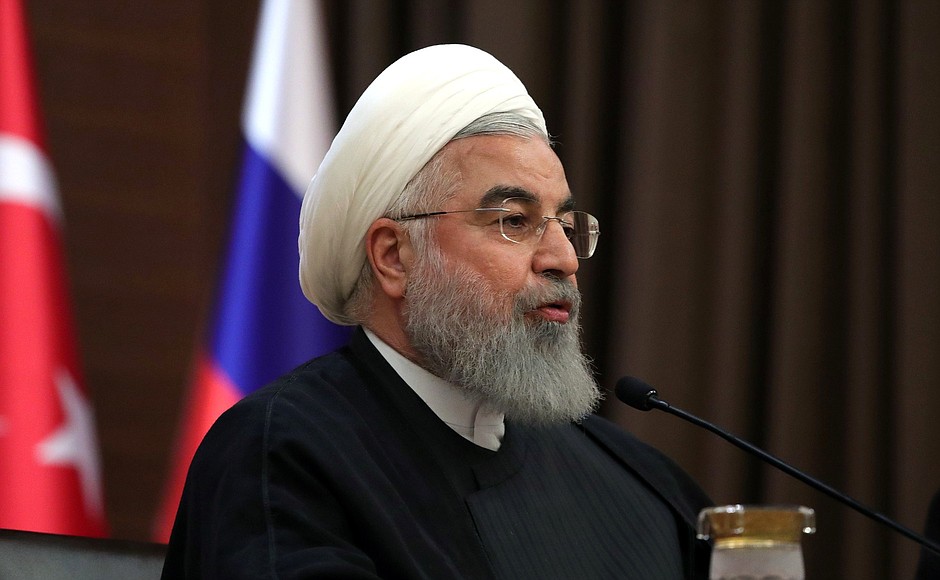 Recep Tayyip Erdogan: I am grateful to Mr Rouhani for his wonderfulspeech and am now giving the floor to Mr Putin. President of Russia Vladimir Putin: President Erdogan, President Rouhani, ladies and gentlemen, Our trilateral talks were held in a business-like and constructive spirit. We had an in-depth discussion on the main aspects of the Syrian situation, exchanged opinions on the further steps that must be taken to bring about a lasting normalisation of the situation, and reached vital agreements that were incorporated in the Joint Statement on the results of our meeting. I would like to point out that the Joint Statement emphasises the firm resolve of Russia, Iran and Turkey to help strengthen the sovereignty, independence and territorial integrity of the Syrian Arab Republic, as my colleagues have said. This position of principle is much needed today, considering the growing number of attempts to deepen ethnic and religious differences in Syrian society in order to break up the country and to preserve the conflict potential of the Middle East for years to come. We have agreed to expand the entire range of our trilateral cooperation in Syria, primarily within the framework of the Astana process, which has proved its effectiveness more than once. Thanks to close coordination between Russia, Iran and Turkey as the guarantor states of the Astana process, the level of violence in Syria has radically diminished. The main ISIS forces have been defeated, and the combat capability of the other terrorist groups has been seriously undermined. Refugees and internally displaced persons are returning to their homes, and the reconstruction of social and economic infrastructure is underway. We intend to keep the focus of the Astana process on the political settlement of the Syrian crisis, or more precisely, promote an inclusive intra-Syrian dialogue in keeping with UN Security Council Resolution 2254. We believe that the results of the Syrian National Dialogue Congress, which has no alternative so far, are crucial for our purpose. We discussed with our Iranian and Turkish colleagues steps on implementing the decisions of the Sochi forum as soon as possible. This includes forming the Constitutional Committee under the aegis of the UN in Geneva, within which the Syrians can independently determine the main parameters of state structure for a new Syria. Humanitarian issues were a major part of our discussion. The participants stated that politicisation of this issue is unacceptable and that it is necessary to strictly comply with the UN Security Council Resolution 2401 that is aimed at alleviating the suffering of civilians in all of Syria. We informed our colleagues about Russia’s efforts in this regard, in particular, the unprecedented operation in Eastern Ghouta on saving thousands of civilian lives and removing militants that refuse to lay down their arms. Humanitarian aid is regularly delivered to the area of hostilities. Some of it is paid for by the donations of Russian citizens. Thus, 77 tonnes of food and basic necessities were sent to Syria in February at the expense of religious groups. Russia, Iran and Turkey will more closely coordinate their steps on resolving the humanitarian issues in Syria. This subject has already been discussed here. These three countries made a practical contribution to these efforts by establishing a working group in Astana on March 15. The group will deal with the liberation of hostages, the transfer of the dead and a search for the missing. Today President Erdogan proposed additional initiatives in the humanitarian area. We also agreed to consolidate our efforts on the post-conflict recovery of Syria, primarily, the construction of social and infrastructure facilities. Russian companies are already taking an active part in this. Indicatively, they have begun some projects in areas that were only recently run by militants. We consider our common strategic goal the complete rout of the terrorists that have not stopped their attempts to destabilise the situation on the ground and are still trying to derail efforts to promote the peace process. They will not stop at anything. We have irrefutable proof that they were preparing to use toxic agents. In this context, we agreed to step up trilateral coordination in all aspects of anti-terrorist activity and increase information exchange. In conclusion, I would like to thank all of my colleagues, President Erdogan and President Rouhani for these substantive and constructive talks. I am sure that necessary practical measures will be adopted following the summit and they will facilitate further productive work in the interests of lasting peace and stability in Syria. As you know, ladies and gentlemen, along with the Russian delegation, I am in Turkey for the second day. On the first day we held bilateral talks as part of the official visit. The official visit was a great success. I would like to thank President Erdogan for organising our time during these two days. Thank you very much for your attention. 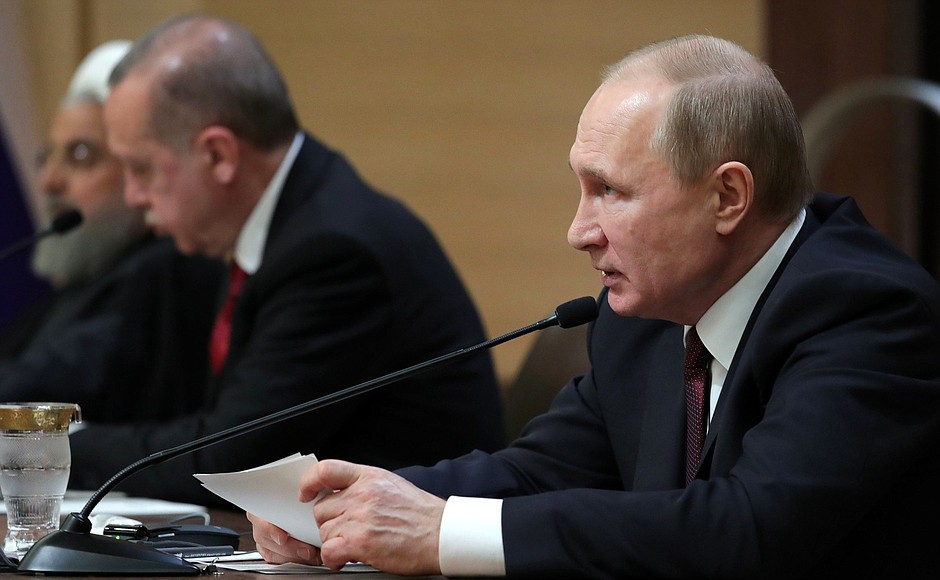 Recep Tayyip Erdogan: Thank you, Mr Putin, for your remarks. Yes, everybody knows that we laid the foundation of the Akkuyu Nuclear Power Plant in Mersin yesterday. We took part in the ceremony together. The cost of the project will be around $21 billion. Inshallah, construction will be completed by 2023, the centenary of our Republic. Future workers have already started contributing to the project by continuing to study in Russia. They will be returning gradually and will work on this project. We held a trilateral summit, and we all want peace and calm to prevail in Syria as soon as possible and to see a new and prosperous Syria. To date, together with non-governmental organisations we have invested $30 billion and these refugees live in camps, in containers. Now 160,000 refugees have returned to northern Syria, to these regions, Jerabulus, Al-Bab (2,000 square kilometres have been liberated). We have built social infrastructure there and refugees have returned. As of now the European Union has promised some funds, but I can tell you frankly, unfortunately – they had promised at least 3 billion euros – the money has not come. If we get this money – or even if we don’t get it – all the same we will continue investing in the region. We think it is our duty to do this work. And now as a result of the military operation in Afrin, Russia and Iran were the first to express solidarity. The relevant agencies, our ministers, chiefs of the general staff and intelligence chiefs were involved in this work and making efforts. I believe that we have laid the foundations of a peace infrastructure here. The first meeting took place in Sochi, the second was held here in Ankara and the third, Inshallah, we will hold in Teheran. No exact date has been fixed, but we will be working together towards the Teheran summit. Now media from Iran, Russia and Turkey can ask two questions each. 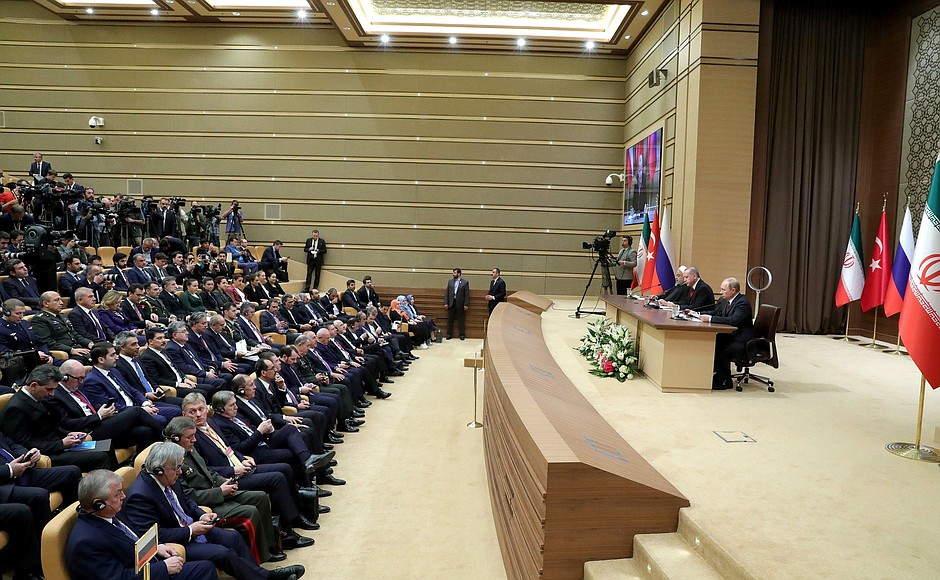 Question: The need for the peace process, the political process has been mentioned many times. I would like to ask a question about the economic process. Early this year Russia signed a road map for building energy infrastructure. I would like to know if any steps have been taken and whether they have been taken by all the parties. Vladimir Putin: Once again, and louder please. Question: I said that a road map on energy matters in Syria was signed early in the year. I would like to know if all the participants are taking steps on the issue. Thank you. Vladimir Putin: Honestly, I still do not understand what you have asked. Are you asking about economic recovery? Remark: Yes. Vladimir Putin: To be sure, this is the key issue. In addition to a political settlement, people must be able to live in normal conditions. Nothing can be done without massive capital investments, including from outside. So, we call on all the countries to get more actively involved in deed and not only in word. Everybody is talking about the need to join the humanitarian relief effort for starters, but no one is doing anything practical except Iran, Turkey and Russia. We see minor supplies from the United Nations, but this is clearly not enough. And definitely there needs to be joint work to restore Syria’s economy, restore the infrastructure. We very much hope that after the end of the political processes work to restore the Syrian economy will gain in scope. Question: It is a little off topic, but still relates to the international agenda. You already answered yesterday a question about the Skripal case. Your representatives, Mr President, said yesterday that Britain will now have to apologise. What kind of apologies do we expect? Simply, “Sorry, we made a mistake” or some official document, full restoration of cooperation? Thank you. Vladimir Putin: We do not expect anything other than for common sense to ultimately prevail and for international relations not to be damaged the way we have seen recently. This goes not only for this case, the attempt on Skripal’s life. This has to do with other aspects of international relations as well. We should stay within the framework of healthy political processes based on fundamental norms of international law, and then the situation in the world will become more stable and predictable. 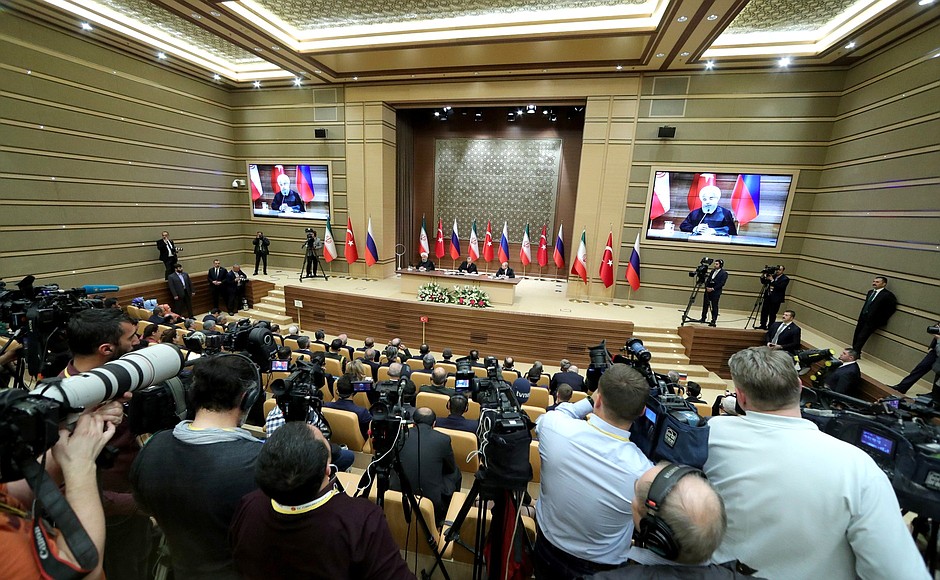 Question (retranslated): President Erdogan, I am from Iran. The Islamic Republic of Iran, Russia and Turkey had two rounds of summits in Sochi and Ankara, they are addressing the Syria issue by political means. I would like to ask you the following question. These three powers are offering help to establish peace; however, the West keeps coming between you. Which conclusion have you drawn from the fact that they get in the way of your efforts to achieve a settlement and establish peace in Syria. What decisions did you take and what conclusions did you reach? Hassan Rouhani: What we have seen so far is that the Americans, the Israelis were unsuccessfully trying to get in our way. I can say that in the past years they wanted the Damascus government to fall. They wanted it. They wanted to help terrorists so that they could govern the region, and they wanted to make it so that the threat would linger on till the present, as this would be in the interests of the USA and Israel. They create a lot of problems for us. And not only for us but also for the Syrian people. But so far, they have not achieved any major success. Since the start of events in Syria, Iran has had only one position: terrorism must be countered and governments fighting terrorism should be helped. We must support the legitimate governments of these regions. Moreover, the geographical configuration of our region should not change, and the opinions of each people regarding the future of their countries should be taken into account. This is exactly what we have agreed on today. The adversaries of our region planned to ruin Syria but they are failing, and we will not let this happen. I think they will not be able to spread terrorism throughout the whole region. We will shortly see security restored in the region with the help of the three nations – Russia, Iran and Turkey. With the help of these three powers, our region is becoming more secure. Recep Tayyip Erdogan: Yes, undoubtedly, Syria’s territorial integrity is of great importance for us. There are certain circles that have divided this territory among themselves, but this will not do for us. We are not taking it seriously. The people of Syria have paid a huge price for that, but terrorism may not be used as a weapon against our country, we will never consent to that. There is no other country that can be compared to us – we have over 900 km of common border with Syria. This is why all those attacks were staged against our country. And they did not stop at that. There were over 100 rocket attacks. But how long can we tolerate this? Ultimately, as you all know, we launched an operation against the terrorists. First there was Jarabulus, and then, as is known, Operation Olive Branch. We have concluded this operation, and now Jarabulus and Al-Bab are liberated territory of 2,000 square kilometres where 160,000 refugees have returned. We have restored the infrastructure there. Those who lived in the refugee camps have returned home. The situation in Afrin will be similar. Those refugees, residents of Afrin proper, who live as refugees in our country, Inshallah, they will come back after the infrastructure is restored. But I want everyone to know one more thing. We are carrying out the rebuilding process, all the three guarantor states. The process was launched, as you know, in Sochi. We – Turkey, Iran and Russia – will move forward together confidently. We have never said that the Astana process is an alternative to the Geneva process. No. It was complementary. If someone claims that the Astana process is meant as an alternative, that is wrong. What matters for us is achieving results. We will take steps because we are obliged, we recognise our responsibility, we must achieve results to spare people’s lives. We all know, we witnessed children die in Eastern Ghouta, children are killed there cruelly and ruthlessly. We cannot tolerate this. We are all parents. I am President of the Republic of Turkey. Such things are intolerable. We must be human, in my opinion. Thank you very much. Question (retranslated): I would like to thank the three presidents of Iran, Russia and Turkey. Before this summit some of the Americans said they would leave Syria soon. Indeed, the decision of the Americans may affect the events in Syria and the region as a whole. What do you think about these events? We would be very glad to hear your opinion on a response to these decisions. Thank you. Hassan Rouhani: The Americans, the current US administration says one thing today and another tomorrow. It is impossible to rely on their decisions, words or statements. Every day there is a new person and every day there are new words. At first, they said they would leave Syria and then they said they would like to receive more money and demanded that other countries pay them to stay longer. We understand they want to milk some states in order to stay longer in the country. This is how this problem looks from the outside. Recep Tayyip Erdogan: My dear brother Rouhani does not mention the amount – seven trillion dollars. Can you imagine? It is necessary to return this money to the region. If this money is raised – the process will obviously be facilitated. Let us turn to the Turkish press. Go ahead pleased. 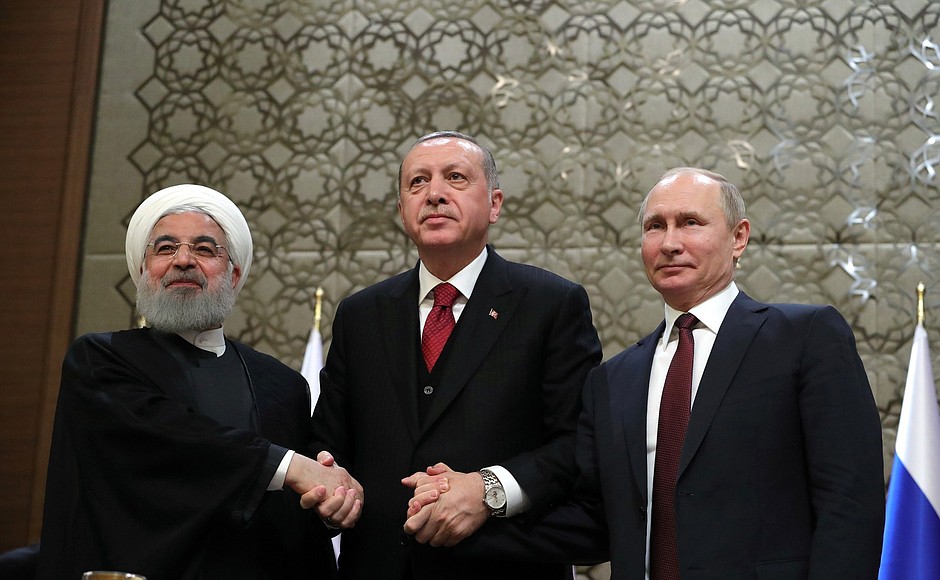 Question (retranslated): A question for Mr Rouhani. Turkey has been receiving refugees for a long time. The European Union made promises but did not keep them. What do you think about its failure to fulfil its promises? Mr Erdogan, Mr Putin said that Turkey has some new proposals. What are they? Vladimir Putin: If some parties in international life fulfil or fail to fulfil their promises, you should address this question to them. We are trying to fulfil all that we promise. If we do not fulfil something we explain why we do not get it right, and when we will eventually fulfil what we agreed on. Turkey is really shouldering a heavy burden in connection with the flow of refugees from Syria. But I must say that this is truly a unique situation. There is also a problem with refugees from Palestine and many countries are also carrying a heavy burden. Russia is carrying it because of refugees from Ukraine. It is necessary to settle conflicts and then there will be no refugees. We met today in the trilateral format to resolve the Syrian problem and these issues. I hope that ultimately our efforts will produce positive results. As for the proposals of President Erdogan, he suggested stepping up humanitarian efforts, in particular, pooling our efforts to help the people who need this aid, to use our medical services, our combat medics where we are already working together – both in the de-escalation zones and the country as a whole. We need to discuss all this in practical terms. I think this proposal is very timely and proper. The President of Iran, Mr Rouhani, supports it as well. We will address this issue and will definitely work to this end. Hassan Rouhani: Supporting refugees and migrants from Syria is the most important obligation and not just for Muslims as an Islamic religious obligation. I would like to thank all countries that hosted refugees and Syrian migrants, especially the Turkish people and the Turkish Government that are going through hard times because of refugees. Indeed, in Iran we know well how difficult it is to receive refugees. For almost 39 years over three million Afghan refugees have lived in our country and we understand the refugee situation perfectly well. This year over 400 Afghan children are studying in Iranian schools for free, and we have more than 20,000 Afghan students in our universities. So we know fairly well that these are difficult times. During the Iraq-Kuwait War we also received Iraqi and Kuwaiti refugees. We understand full well what hosting refugees means. The European countries should help. If they make promises, they should fulfil them and keep their word. Recep Tayyip Erdogan: As for the proposals made by Mr Putin and Mr Rouhani, I can also supplement them. We can provide assistance – both the Russian Armed Forces and our Armed Forces – to the wounded arriving from Eastern Ghouta after the construction of a mobile hospital. We can also provide food relief. Maybe bread and other flour products for refugees are already being made in this region. We are granting them this opportunity. However, I would like to emphasise one more point that I suggested to both Mr Putin and Mr Rouhani. I unveiled this same proposal earlier to the international community. It is about the construction of housing in the safe area both in the north of Syria and on our territory. This means we will be able to ensure the construction, and the refugees will able to leave refugee camps and live under normal decent conditions in those safe areas, to improve their living conditions in housing in an area of 500 square kilometres, which matches local architecture. We can offer such an opportunity. By taking this step, we will be able to restore normal life for those refugees. Some countries made certain promises on this issue. But the point is that this step has not been taken yet. If we could undertake and implement it, this step will be good and significant, it will give an impetus to the people of Syria. And we will able to do good for Syria’s people. Question (retranslated): Mr President, each time you express your resolve, and we should expect new operations against terrorist organisations. Did you manage to hold consultations on those operations with Mr Rouhani and Mr Putin during the summit? Recep Tayyip Erdogan: Friends, the fight against terrorists, against terrorist organisations does not follow plans or schedules. We must take out terrorists wherever we find them. If terrorists are destroyed, stability and calm are ensured, which means we should not wait for some plan or schedule. But if there is terror, terrorists, the state is bound to do exactly that, the state should counter this activity. Turkey continues its fight both inside the country and abroad. Yes, the state is waging this fight. And this fight will continue until terrorism is no more. Thank you for your attention. The source of information - http://en.kremlin.ru/events/president/news/57201
__________________
Where should they dig the Very Deep Pit? Piglet said that the best place would be somewhere where a Heffalump was, just before he fell into it, only about a foot farther on. (c) Alan Alexander Miln |
|
|
#810 |
|
Senior Member
|
Condolences to leaders of the Federal Republic of Germany on the tragedy in Munster
Vladimir Putin expressed condolences to the Federal President of Germany Frank-Walter Steinmeier and Federal Chancellor of Germany Angela Merkel on the tragedy in Munster. April 7, 2018 - 22:00 In his message the President of Russia asked the German leaders to convey words of sympathy and support to the victims’ families and friends and wishes for a speedy recovery to the injured. The source of information - http://en.kremlin.ru/events/president/news/57216 Telephone conversation with President of Turkey Recep Tayyip Erdogan Vladimir Putin had a telephone conversation with President of the Republic of Turkey Recep Tayyip Erdogan. April 9, 2018 - 15:20 The two presidents discussed progress in implementing agreements reached at the High-Level Russian-Turkish Cooperation Council meeting in Ankara. Vladimir Putin and Recep Tayyip Erdogan spoke highly of the meeting of the heads of state, guarantors of the Astana process: Russia, Iran and Turkey. Taking into account the results of the international consultations, the leaders exchanged views on the Syrian settlement and agreed to continue contacts on this issue. The source of information - http://en.kremlin.ru/events/president/news/57227 Telephone conversation with Chancellor of Germany Angela Merkel Vladimir Putin had a telephone conversation with Chancellor of the Federal Republic of Germany Angela Merkel. April 9, 2018 - 17:10 Vladimir Putin once again expressed condolences in connection with the tragedy that occurred on April 7 in Munster. The situation in southeastern Ukraine was discussed, with the understanding that the implementation of the Minsk Agreements is the only possible basis for settling the crisis peacefully. In particular, both leaders noted the importance of keeping the Easter truce and expressed readiness to continue supporting the OSCE Special Monitoring Mission (OSCE SMM) on the contact line. Issues related to the possible establishment of a UN mission to protect OSCE observers were also discussed. The importance of continuing efforts to secure swaps of prisoners and illegally detained persons based on the “all for all” principle was underscored. Vladimir Putin and Angela Merkel agreed to continue joint efforts in the Normandy format to settle the internal crisis in Ukraine. The two leaders also discussed the situation in Syria, including chemical attack accusations made by a number of Western states against official Damascus. Russia’s position – that it is unacceptable to use this as an opportunity for provocation and speculation – was conveyed. The President of Russia stressed the importance of consolidating the efforts of the global community in providing humanitarian aid to those in need across the Syrian Arab Republic pursuant to UN Security Council Resolution 2401. The positions of Russia and Germany on implementing Nord Stream 2, a major and mutually beneficial gas project, were reaffirmed. The source of information - http://en.kremlin.ru/events/president/news/57228 Condolences to President of Algeria Abdelaziz Bouteflika April 11, 2018 - 14:35 Vladimir Putin expressed his condolences to President of Algeria Abdelaziz Bouteflika on multiple casualties caused by a military plane crash near Boufarik Airport. The President of Russia conveyed his sympathy and support to the families and friends of those killed in the crash. The airplane of Algeria’s armed forces crashed soon after take-off from a military base 50 kilometres from the country’s capital. Over 250 people were killed in the crash. The source of information - http://en.kremlin.ru/events/president/news/57236 Presentation of foreign ambassadors’ letters of credence Vladimir Putin received the credentials of a number of foreign ambassadors in Alexander Hall of the Grand Kremlin Palace. April 11, 2018 - 17:40 - The Kremlin, Moscow A total of 17 new heads of diplomatic missions presented their credentials to the President of Russia: Steve Davies Ugbah (Federal Republic of Nigeria), Amjad Odeh Adaileh (Hashemite Kingdom of Jordan), Lesley Akyaa Opoku Ware (Republic of Ghana), Woo Yoon-keun (Republic of Korea), Ihab Ahmed Talaat Nasr (Arab Republic of Egypt), Raed bin Khaled Qrimli (Kingdom of Saudi Arabia), Jainaba Bah (Republic of The Gambia), Johannes Eigner (Republic of Austria), Maadhad Hareb Al Khaili (United Arab Emirates), Efren Arnoldo Bernal Chevez (Republic of El Salvador), David Maduka (Republic of the Congo), Gerardo Penalver Portal (Republic of Cuba), Ngo Duc Manh (Socialist Republic of Vietnam), Ramiz Basic (Montenegro), Pasquale Terracciano (Republic of Italy), Roger Gnango (Republic of Cote d’Ivoire), and Noukpo Clement Kiki (Republic of Benin). President of Russia Vladimir Putin: Ladies and gentlemen, I am happy to welcome you to the presentation of credentials ceremony and congratulate you on the official start of your diplomatic work in Russia. You are entrusted with a very responsible and important mission – to do everything you can to facilitate the development of ties between the countries you represent and Russia, to enhance the political dialogue for this purpose, to expand trade and economic ties and to promote humanitarian and cultural contacts and exchanges between people. For our part, we are ready to support your constructive initiatives. You may rely on the assistance of Russian leadership, our government bodies, business circles and the public. Today, the role of diplomacy and the diplomat has taken on special significance. Indeed, the state of affairs in the world is a cause for concern. The situation in the world is becoming more chaotic, nevertheless we still hope that common sense will eventually prevail, and that international relations will take a constructive course, and the entire world system will become more stable and predictable. Diplomacy includes a wide field of activity; its hallmark is the development of optimal solutions based on a balance of interests. Diplomats try to facilitate a collegial search for answers to large-scale challenges and threats, such as terrorism, drug trafficking, organised crime, the proliferation of weapons of mass destruction and climate change. As for Russia, we will continue to consistently advocate the strengthening of global and regional security and stability and continue to rigorously comply with our international obligations, and build cooperation with our partners in a constructive and respectful manner, guided by international legal standards and the UN Charter. We will promote the world’s positive, forward-looking agenda and work to ensure the sustainable development, prosperity and wellbeing of humankind. Ladies and gentlemen, today, the heads of 17 diplomatic missions are here. Per tradition, I will say a few words about the interaction with each of the states you represent. We very much appreciate our relations with Nigeria, an important partner for us on the African continent. We support the further expansion of mutually beneficial Russian-Nigerian ties, including cooperation on hydrocarbon extraction and aluminum production, as well as in the military-technical field. This year marks the 55th anniversary of the establishment of diplomatic relations between Russia and Jordan. We are satisfied with the positive results achieved in the main areas of interaction. In September 2017, a memorandum on cooperation between the Eurasian Economic Commission and Jordan was signed. We support the regular and constructive dialogue with King Abdullah II. During our regular talks in February in Moscow, key issues related to the further deepening of bilateral relations, as well as the coordination of joint efforts in the Syrian settlement, were discussed. We appreciate the contribution of our Jordanian partners to the sustainable functioning of the de-escalation zone in southern Syria. The foundation for the cooperation between Russia and Ghana was laid over 60 years ago. We have accumulated a great deal of experience in working together in both the trade and economic sphere and in politics. Currently, we are developing promising projects in the nuclear and oil industries, and we are discussing the prospects of supplying Ghana with Russian airplanes, helicopters and automobiles. Friendly relations with the Republic of Korea are being maintained. There are positive dynamics in trade and economic relations. Last year, trade between the two countries grew by more than 27 percent to over $19 billion. Korean investors are participating in programmes on the accelerated development of Russia’s Far East. We are planning to discuss matters of bilateral cooperation, as well as a range of international issues, including the situation on the Korean Peninsula, with President Moon Jae-in during his visit to Russia this June. The strategic partnership with Egypt is being strengthened. In August, our country will mark the 75th anniversary of the establishment of diplomatic relations. Cooperation between Russia and Egypt is very active and includes the construction of the first nuclear power plant in Egypt, the establishment of a Russian industrial zone in the Port Said region, and the deepening of military and defence industry cooperation. I would also like to point out that regular flights between the capitals of the two countries have been resumed. We continue to work on resuming the rest of the flights. In December, fruitful talks with President el-Sisi were held in Cairo. We maintain regular dialogue on a range of topics, including relevant international and regional issues that our countries have close or similar positions on. I heartily congratulated the President of Egypt on his resounding victory at the recent elections. The state visit by King Salman of Saudi Arabia, which took place last October, gave a significant political impulse to cooperation between our two countries. We are steadily developing mutually beneficial cooperation in various spheres, promoting various joint trade and economic projects, and coordinating our steps in the global hydrocarbons market. Cooperation between the Russian Federation and Saudi Arabia is an important factor in ensuring security and stability in the Middle East and North Africa. Our ties with the Republic of The Gambia are traditionally constructive. The Russian side is interested in expanding economic cooperation, including by increasing the supply of machinery and agricultural products to the republic. We will continue to expand the practice of training Gambian specialists at Russian universities. Relations between Russia and Austria have a rich history and are developing in a fruitful and friendly manner. Federal Chancellor Sebastian Kurz’s recent working visit to Moscow is evidence of this. Russia appreciates Austria’s policy of permanent neutrality, as well as its balanced position on current issues on the European and global agenda. June will mark 50 years since our country began supplying natural gas to Austria. At that time, a large-scale energy project that was not subject to fluctuations in the political climate was launched. Its implementation has ensured the reliable export of Russian gas to European states and guarantees their energy security. Relations with the United Arab Emirates are developing steadily. These relations are multifaceted, including the implementation of joint projects in the space and nuclear industries, agriculture and tourism. Established investment cooperation has particular importance. Moscow and Abu Dhabi maintain a useful dialogue regarding the situation in the Persian Gulf region and the Middle East as a whole. We are interested in expanding ties with El Salvador. This undoubtedly will be facilitated by the visa-free travel policy between our countries, contacts through foreign-policy and defence departments and inter-parliamentary cooperation. It is important that representatives of Salvadoran business regularly participate in the St Petersburg International Economic Forum. Taking into account the fact that El Salvador is a member of the UN Security Council in 2018–2019, we will build up contacts on current international issues. Friendly cooperation is maintained with the Republic of the Congo. Bilateral cooperation covers a number of major projects, including the construction of a 1,334 km oil pipeline. In February Rosatom and the Science Ministry of the Congo signed a memorandum of understanding. Over 7,000 citizens of the Congo have received higher education at Soviet and Russian universities. The Republic of Cuba is Russia’s long-standing and reliable ally. Our peoples are bound by firm ties of friendship and solidarity and our bilateral cooperation is of a strategic character. We are jointly carrying out large projects in the power industry, metallurgy, transport infrastructure and medicine and are expanding our cultural and humanitarian exchanges. Today Cuba is conducting a consistent course towards socio-economic renewal. This opens additional opportunities for promoting trade and economic cooperation. Cuba has traditionally enjoyed high international prestige. We are satisfied with the quality of the Russian-Cuban dialogue on foreign policy issues. Russia and Vietnam are successfully developing a strategic partnership. We maintain active political contacts at high and top levels. We have coordinated our efforts primarily in multilateral organisations in the Asia-Pacific Region. Vietnam is one of Russia’s leading trade partners. Our trade increased by one-third last year. We also maintain close military and military-technical cooperation. The relevant intergovernmental commission is functioning effectively. In general, our bilateral cooperation is increasing. The current state of relations between Russia and Montenegro is obviously failing to reflect our centuries-old traditions of fraternal friendship and the sense of community of our peoples. Russia favours the development of mutually beneficial ties with Montenegro. We attach great importance to cooperation with Italy, one of our key partners on the European continent. We have accumulated considerable experience of working together in various fields. We know that Italian businesses are interested in building up trade and economic ties with our country. Promising projects in aircraft construction, chemical, gas processing and other industries are underway. The Russian side is ready to step up cooperation with Italy on international issues, including as part of its OSCE chairmanship this year. Cultural exchanges have always been wide-ranging and profound, and have served as a model for many other countries. This year, a large-scale initiative, Russian Seasons, is being implemented in Italy. The programme includes 250 events in various Italian cities. We mainly interact with the Republic of Côte d'Ivoire in the trade and economic sphere. Russia supplies to this country chemical and food products and imports cocoa and its derivatives. As part of our humanitarian efforts, medicine and medical equipment from Russia are regularly sent to the Republic. Currently, Côte d'Ivoire is a non-permanent member of the UN Security Council. We also stand ready to work with the Ivorian side at the UN. Relations with Benin are developing in a constructive spirit. We cooperate on energy and transport. Russia exports food and chemical products. Over 2,500 citizens of Benin have graduated from Russian universities. Ladies and gentlemen, what I have said only partially reflects the multifaceted nature of relations between Russia and the states you represent. We expect that with your active participation these relations will develop dynamically for the benefit of the peoples of our countries and in the interests of international stability and security. I am confident that your time in Russia will allow you to better know our country and its rich history and culture, and will leave you with new unforgettable impressions. I would like to once again wish you success in your difficult, but very important, necessary work and thank you for your attention. Thank you. The source of information - http://en.kremlin.ru/events/president/news/57238 Telephone conversation with Indian Prime Minister Narendra Modi Vladimir Putin had a telephone conversation with Prime Minister of India Narendra Modi at the Indian side’s initiative. April 11, 2018 - 19:25 The two leaders had a constructive and friendly discussion of several current issues related to developing the privileged strategic partnership between Russia and India. They agreed to continue contacts. The source of information - http://en.kremlin.ru/events/president/news/57239 Telephone conversation with Israeli Prime Minister Benjamin Netanyahu Vladimir Putin had a telephone conversation with Prime Minister of Israel Benjamin Netanyahu at the Israeli side’s initiative. April 11, 2018 - 20:15 The two leaders discussed issues dealing with Syria, including in the context of recent missile strikes by the Israeli Air Force at the T4 airbase in Homs province. Vladimir Putin emphasised the importance of respecting Syria’s sovereignty and called for refraining from any steps that could further destabilise the situation in the country and threaten its security. In light of Holocaust Remembrance Day, which is observed on April 12, both leaders unambiguously declared again that attempts to distort history and revise the results of World War Two are unacceptable. In this context, Benjamin Netanyahu pointed out that Israel will officially celebrate Victory Day on May 9 this year for the first time. The sides agreed to continue contacts. The source of information - http://en.kremlin.ru/events/president/news/57240 Congratulations to Ilham Aliyev on his re-election as President of Azerbaijan Vladimir Putin sent a message of greetings to Ilham Aliyev on his re-election as President of the Republic of Azerbaijan. April 12, 2018 - 10:30 The President of Russia pointed out that the results of the voting are evidence of Ilham Aliyev’s political standing and public recognition of his achievements in attaining the socioeconomic as well as foreign policy goals facing Azerbaijan. Vladimir Putin praised the efforts of Ilham Aliyev to strengthen the friendly and neighbourly relations between Russia and Azerbaijan and expressed confidence that the joint efforts taken by the two states would boost their fruitful cooperation in all spheres and partner-like interaction on regional and international affairs in the vital interests of the Russian and Azerbaijani people. The source of information - http://en.kremlin.ru/events/president/news/57243 Telephone conversation with President of Azerbaijan Ilham Aliyev Vladimir Putin had a telephone conversation with President of the Republic of Azerbaijan Ilham Aliyev at Russia’s initiative. April 12, 2018 - 12:50 Vladimir Putin sincerely congratulated President of Azerbaijan Ilham Aliyev on his re-election and wished him success in his high post. The parties reaffirmed their mutual resolve to further promote strategic partnership between Russia and Azerbaijan and to expand the mutually beneficial cooperation in various areas. Earlier the President of Russia sent a message of greetings to Ilham Aliyev. The source of information - http://en.kremlin.ru/events/president/news/57244 Telephone conversation with President of Turkey Recep Tayyip Erdogan Vladimir Putin had a telephone conversation with President of the Republic of Turkey Recep Tayyip Erdogan. April 12, 2018 - 17:10 The sides voiced concern over the developments in and around Syria due to allegations of chemical weapons use in the city of Douma. The importance of providing the necessary conditions for the OPCW experts going to Syria was stressed. Both leaders spoke in favour of stepping up the political settlement process in Syria based on UN Security Council Resolution 2254 and the decisions made by the National Dialogue Congress in Sochi. The two presidents agreed to continue bilateral contacts in various areas. The source of information - http://en.kremlin.ru/events/president/news/57248 Telephone conversation with President of France Emmanuel Macron Vladimir Putin had a telephone conversation with President of the French Republic Emmanuel Macron. April 13, 2018 - 15:50 The two leaders continued to exchange opinions in connection with the current situation in Syria that has become aggravated due to the claims about the alleged use of chemical weapons in the city of Douma. Vladimir Putin underscored the need for a thorough and objective investigation and noted that it would be appropriate to avoid hurling groundless accusations at anyone until the end of the investigation. Most importantly, it is necessary to refrain from ill-conceived and dangerous actions that would rudely violate the UN Charter and would lead to unpredictable consequences. Both sides voiced satisfaction with a decision to send OPCW experts at the invitation of the Syrian Government. They discussed specific opportunities for joint Russian-French efforts to help the OPCW mission in its work. Both leaders instructed their respective defence and foreign ministers to maintain close contacts for the purpose of de-escalating the current situation. The source of information - http://en.kremlin.ru/events/president/news/57253
__________________
Where should they dig the Very Deep Pit? Piglet said that the best place would be somewhere where a Heffalump was, just before he fell into it, only about a foot farther on. (c) Alan Alexander Miln |
|
|
#811 |
|
Senior Member
|
Meeting with Agriculture Minister Alexander Tkachev
Vladimir Putin had a working meeting with Agriculture Minister Alexander Tkachev to discuss the spring sowing campaign. April 9, 2018 - 14:30 - The Kremlin, Moscow 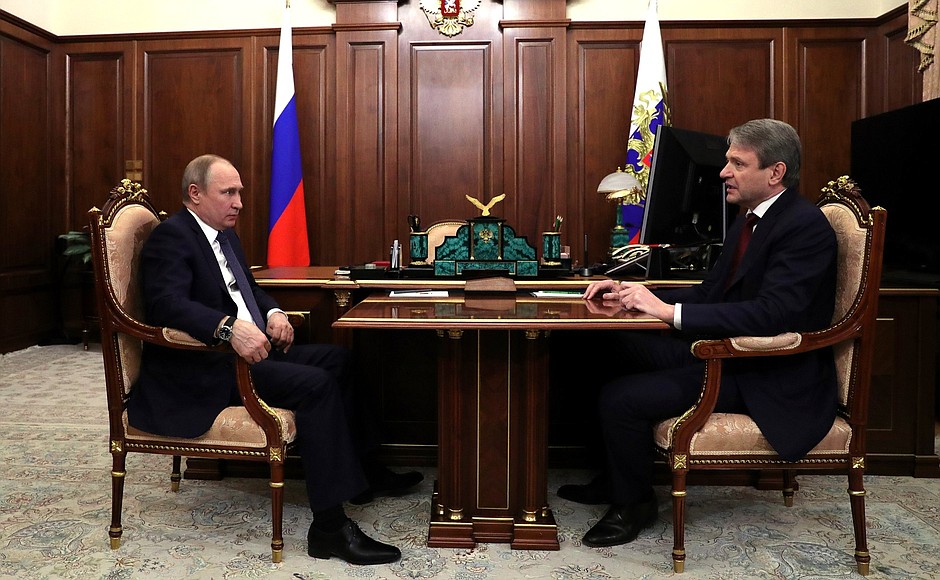 The Minister reported to the President that the spring sowing campaign is fully underway and that barley, flax, rape, soybean and vegetable planting is increasing. The system of subsidised loans is working. Lending already amounts to 114 billion rubles. 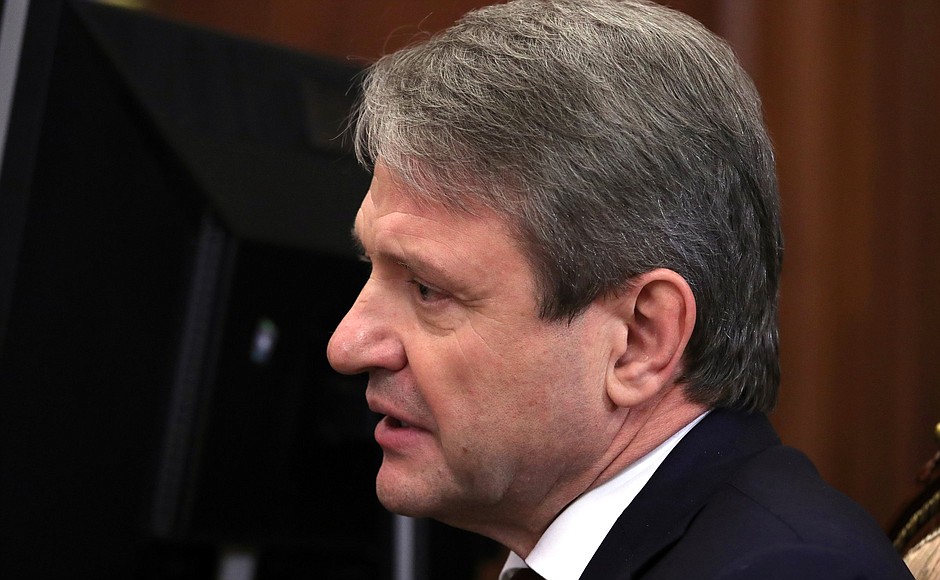 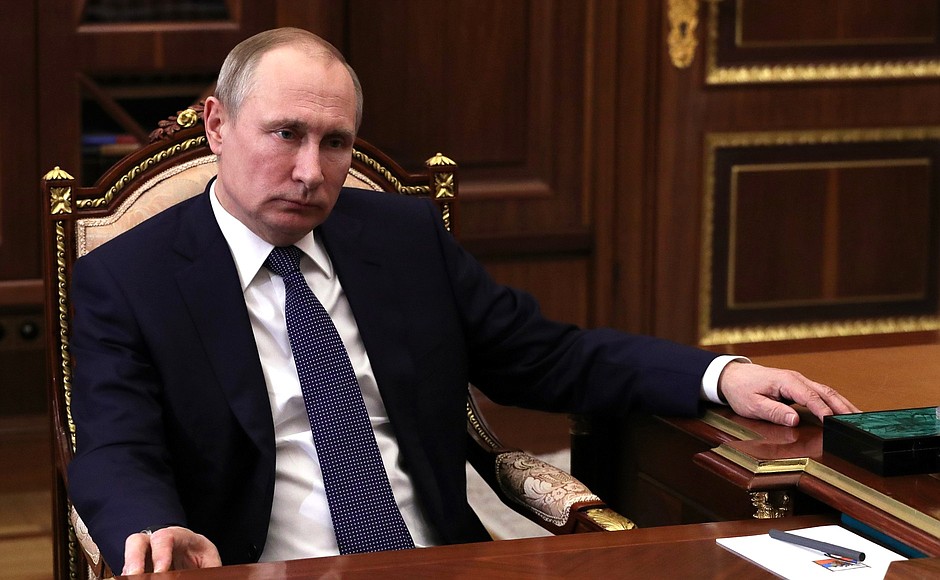 Answering the President’s question about financial assistance to farmers in their current work related to fertilisers, fuel and lubricants, Alexander Tkachev said that the material and technical issue at the farms is being resolved well this year. The source of information - http://en.kremlin.ru/events/president/news/57225 Meeting with Prime Minister Dmitry Medvedev Dmitry Medvedev informed the President about the main topics of the 2017 Government performance report he will present to the State Duma on April 11. April 10, 2018 - 16:45 - The Kremlin, Moscow 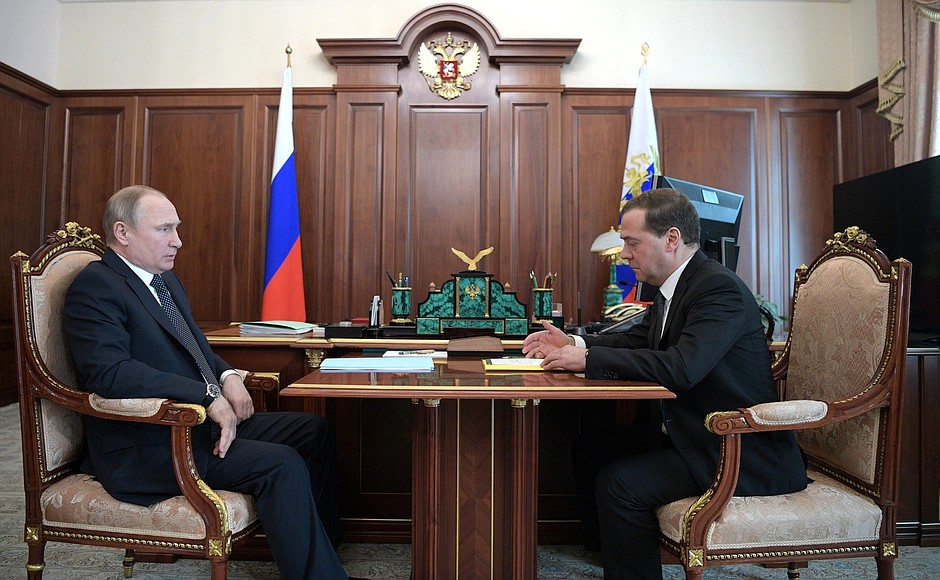 President of Russia Vladimir Putin: Mr Medvedev, tomorrow you are presenting an annual Government report to the State Duma. Thank you for the draft report. However, I would like to talk about the points you will prioritise in your speech at the State Duma. Perhaps we can go beyond 2017 and cover several years. Prime Minister Dmitry Medvedev: Mr President, indeed, this report to the State Duma is to a certain degree special. First of all, this is the tenth Government report to the parliament. Second, I would like to present a picture of the country’s development not only over the previous year, as the Constitution requires, but beyond this period, for the period of cooperation between the Government and the State Duma of the previous and current convocations, which is almost six years. This was a very difficult period and the resulting picture is rather colourful. We started with a period of economic recovery when everything was developing generally well. Then we faced some very serious problems due to both external factors such as energy price drops and the sanctions, plus domestic factors and some disproportions that have accumulated in the economy over the past decades. Nevertheless, I will report to the parliament that overall, the economic situation post-2017 is stable and the macroeconomic indicators are at proper levels and are moving towards the goals set by the President. Specifically, as you know, the GDP is growing – perhaps, not as fast as we would wish, but the growth is obvious and tangible. Our task is to maintain this. Inflation is at an absolute low, which gives us room to develop the loan sector in and for solving most crucial tasks. The state debt, both domestic and foreign loans, is low, which is also conducive to stable economic development. I would also like to note, to emphasise the fact that our social obligations for 2017 were carried out in full, as promised. The Government took as guidelines all presidential instructions and fulfilled them in full. Considering that this report is extended in nature, I would also like to tell the deputies that it is already possible to present some results of implementing the Presidential executive orders of May 7, 2012. You have held several meetings on this, but it is still necessary to present the whole picture, including the most important indicators that have been reached, for instance those showing an increase in salaries for the categories that were mentioned in the executive order. Despite difficulties and disproportions and the situation in some regions, the planned figures established by the executive orders have been achieved. I think that in general this is a very good result. 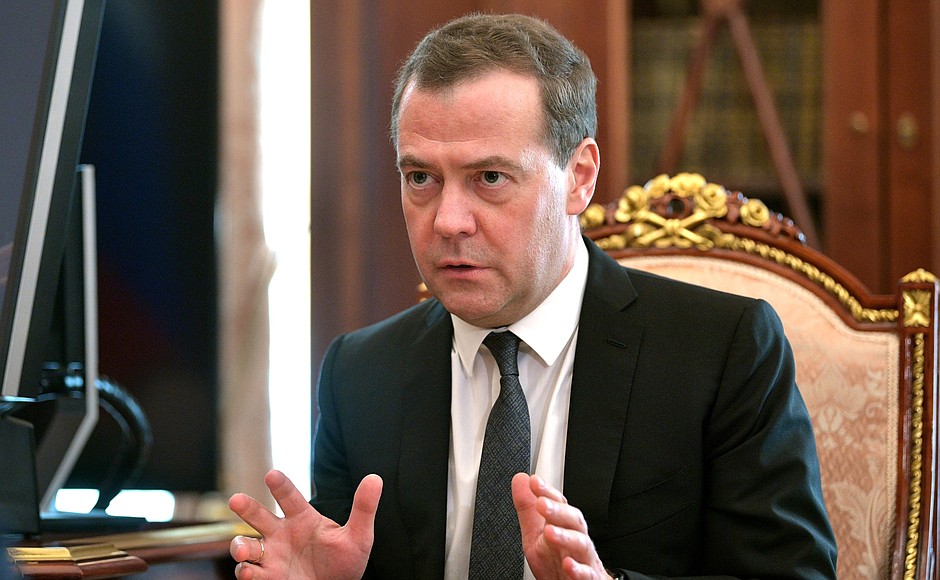 Vladimir Putin: But look, not everything has been done to 100 percent in every area. I would like to ask you to analyse this and discuss it with your colleagues. Dmitry Medvedev: We will analyse this by all means, Mr President. Practically everything has reached the established level in this respect. True, this was done not in the end of the last year but in the beginning of this year. We managed to catch up on some things during the past few months. Naturally, these issues should be focused on in the Government. This is absolutely true. Our industries, like chemicals, petrochemicals, pharmaceuticals and high-tech produced a number of good results in the areas also established by the relevant executive order. I will tell my colleagues, the deputies about all this. There are some areas that need more work. In your Address you spoke about investment in fixed capital because for the time being growth in this investment is fairly sluggish. This needs to be resolved soon. I would also like to inform the deputies of other issues based on the document you have in front of you. 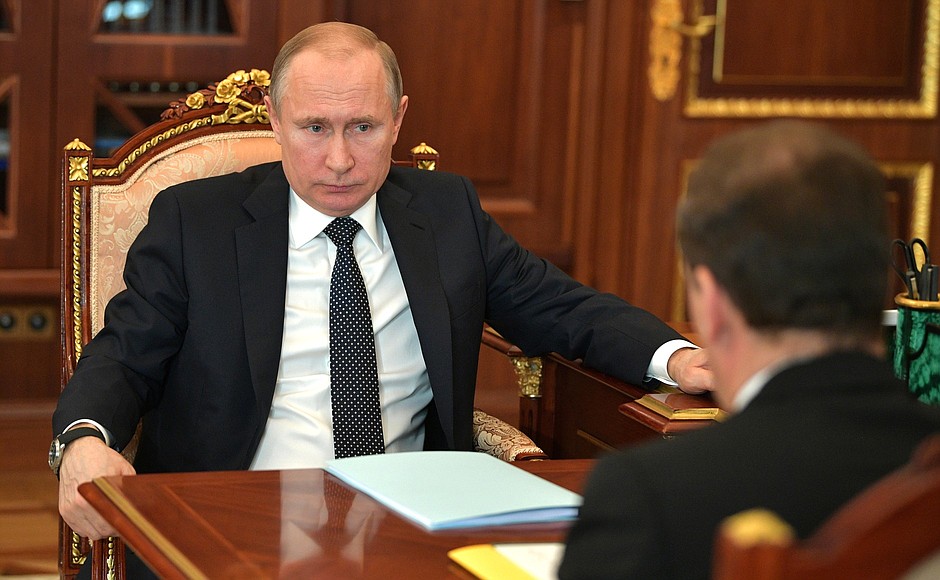 Vladimir Putin: All right. I wish you good, positive and constructive work with the deputies in the State Duma. Dmitry Medvedev: Thank you, Mr President. The source of information - http://en.kremlin.ru/events/president/news/57234 Meeting with Volgograd Region Governor Andrei Bocharov Vladimir Putin had a working meeting with Volgograd Region Governor Andrei Bocharov to discuss flood relief and social work in the region. April 13, 2018 - 14:50 - Novo-Ogaryovo, Moscow Region 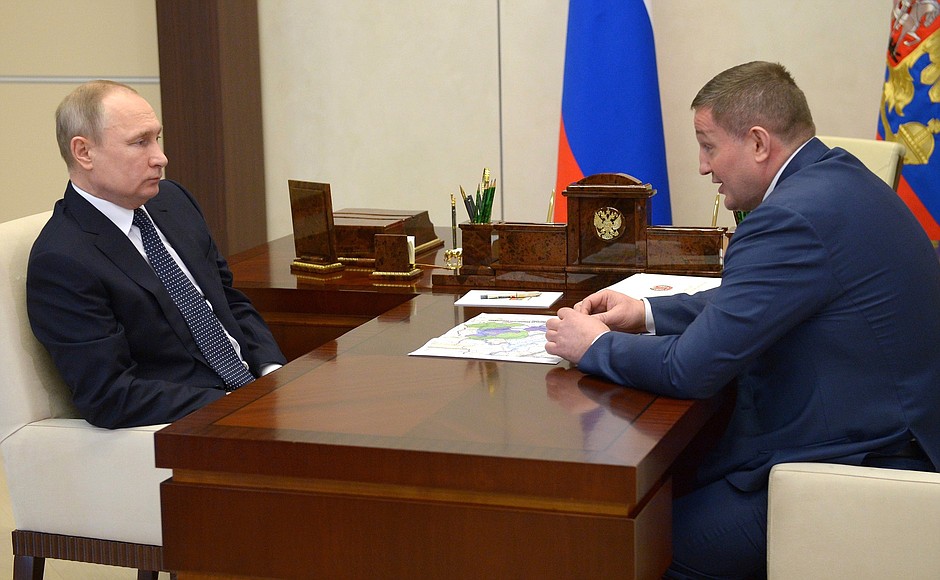 The President instructed the Governor to pay more attention to promptly restoring infrastructure and providing help to the people whose property was damaged in the flood. Vladimir Putin also noted that he would give instructions to study the expertise of the Volgograd Region, where a regional Social Code has been developed. President of Russia Vladimir Putin: Good afternoon, Mr Bocharov. There are many issues. As far as I know, you run an interesting and effective system to support people who need support from the state. I will ask you to tell me more about it. Still, I propose starting with the flooding. What is happening and what kind of help do you need? Volgograd Region Governor Andrei Bocharov: Mr President, a state of emergency was introduced in the Volgograd Region on April 4. The floodwater levels in the upper reaches of the Volgograd Region rivers Medveditsa, Tersa and Buzuluk went up anywhere from one and a half metres to three metres, which is a lot. We put government bodies on high alert in late March, and on April 2 we resolved to put all municipal entities and authorities on high alert as well. On April 4, we declared an emergency. All of that minimised losses resulting from high waters. Vladimir Putin: How many people live in this area? Andrei Bocharov: About 360,000. Of the 12 municipalities exposed to the flood, six remain flooded. Of the 81 settlements, 21 remain flooded. Of the 868 people relocated from the flooded areas, 111 have not yet returned home, of whom 27 people, including seven children, remain in temporary housing. They have all the necessary supplies, and we are in touch with them at all times. The flood levels have stabilised, and the situation is improving. We have begun inspecting municipalities, settlements and households to assess the damage and provide aid to the people. 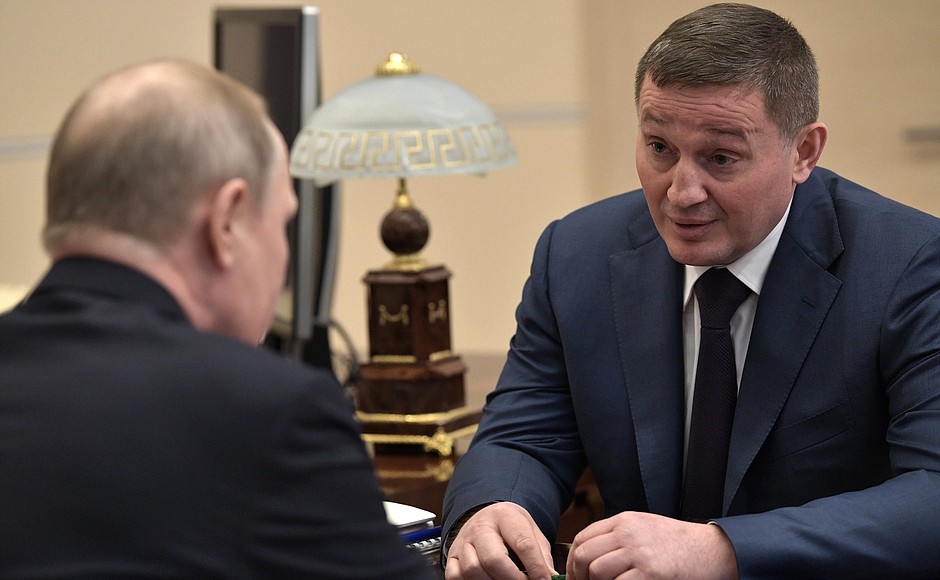 Vladimir Putin: We need to take a look at the infrastructure and see what needs to be done to restore it and provide targeted assistance to the people affected by the flooding. Andrei Bocharov: Mr President, just recently, on Thursday, we had a situation which was basically an emergency; a critical situation in one of the municipalities – I am talking about Alexeyevsky District, the Cossack village of Alexeyevskaya. There was a shift in wind direction towards the dam. We have a dam there, which is 1.7 kilometres long. It completely encloses the village. The shift in the wind direction towards the dam and gusts with speeds of 16 to 20 metres per second put essentially the entire local community at risk. The Volgograd Region has not seen a flood like this since 1964. At night, we had to take response measures, deployed forces and allocated money, and together with the local residents, employees of the Emergencies Ministry and other authorities we managed to protect the village, and prevent the water from entering it. Back in 1964, 80 percent of this village wound up under water. In fact, we must praise the coordinated work of the people, local residents, who were directly involved, the Cossacks, and officers of law enforcement agencies – together, we managed to do that. Now, the situation is stable and improving. Your order will be carried out, but, Mr President, I simply have to take this opportunity to also thank you for the help you provided to the Volgograd Region residents during the fires of August and September of 2017. I would like to report that the goals that you set for us have been met: 26 families were provided with housing certificates. Some of these families already purchased new housing, while others are going to obtain it in the near future. Vladimir Putin: Good. Make sure this goal is fully met. But life sets new goals, creates new problems, and they have to be solved, too. So, I ask you to get personally, actively involved this process, to find out what can be done for the people in order to support them in this difficult situation. Let us move on to the second question. Andrei Bocharov: The task that you set forth within the framework of the 2018 Presidential Address is, in fact, very important and very complicated. One of the tasks, which, in my opinion, is the most complicated, is to continue fighting poverty. This is a problem with a lot of factors and angles. Today, measures are being adopted and part of the problem has been tackled directly by federal and regional structures and local governments. But it is, indeed, a fairly large problem, so as the saying goes, it has to be all hands on deck. Today, naturally, steps are being taken to create jobs, open new production facilities, create highly paid jobs. All this is absolutely as it should be, it must continue. We are working on it, and my colleagues are working on it. But one of the most important tools, in our view, is government support for people who have found themselves in a difficult situation, in tough living conditions. Mr President, in your 2014 Presidential Address you placed special emphasis on social assistance to every person who needs it. On a fair basis. This is the point at issue. The same message featured in the 2016 Presidential Address. Starting from 2014, we began implementing this approach. We thoroughly studied the laws of all entities of the Russian Federation, studied the principle of approaching this problem and here is what we concluded. Let us suppose that we had 150 laws regulating social welfare, plus around 40 related regulations. If we try to imagine it, this would be a big table heaped with papers. Even a specialist would find it hard to get through it, while for an ordinary citizen it would be much harder. And so, in 2015, following the principles of targeting and need, we put to a nationwide debate issues connected with social assistance to people of those very categories. Over a year, we conducted hearings through the Civic Chamber. It is not a matter of one day or one month. It is a complicated process. We brought to one table representatives of the public, recipients of benefits, representatives of political parties, representatives of labour collectives and entrepreneurs, and discussed these issues. A decision was adopted in the wake of discussion, and at the end of 2015, the regional duma passed a law on assistance. We called it the Social Code of the Volgograd Region, which consolidated some 100–150 laws and regulations into a single almost direct assistance system. Every resident of the Volgograd Region can independently study the Code to figure out which category they belong to and what kind of government assistance they can expect depending on the circumstances. Now we have in place criteria to determine need, targeting and fairness. This was not easy, but it proved effective. True, there has been much debate, and disputes, especially in 2015–2016, and they are still going on. We are still making adjustments. It is not an ideal law, but works as a basis for specialists to do their job and for people to figure out which laws and regulatory acts they can count on for additional assistance. A very important issue. In fact, it was a serious step for the Volgograd Region. We understood the risks, but public discussion of this law, of this issue, gives us a very good opportunity to continue our work. 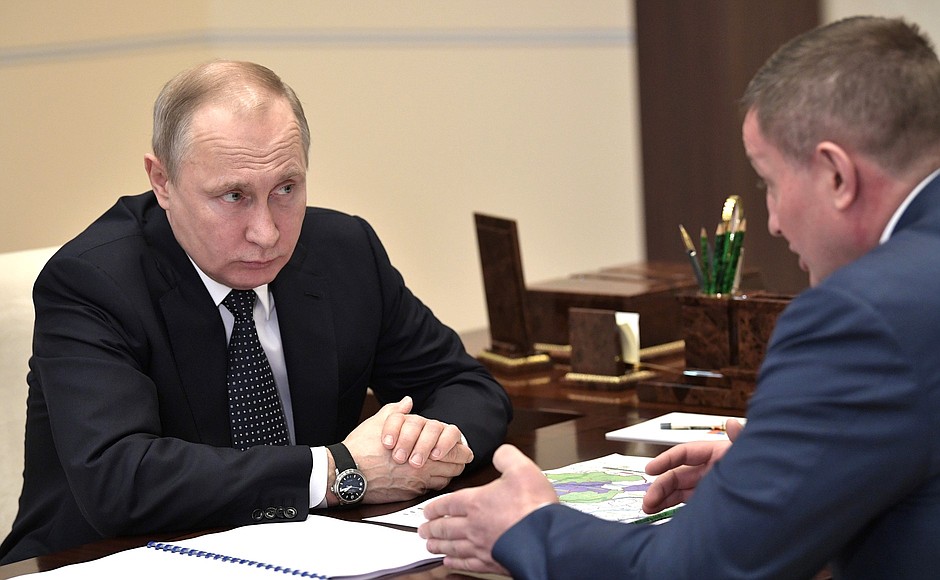 Vladimir Putin: Right. It will have to be studied. I will ask my colleagues in the Executive Office to look at this positive practice, with a view to replicating it. Andrei Bocharov: Using that experience, we plan to discuss another important issue this year that concerns every citizen of Russia and residents of the Volgograd Region – pricing in the utilities sector. We constantly have questions about why these bills go up, not down. This year we received support, including from the parliament. We will also discuss this issue at the Civic Chamber, so that people understand how prices are formed. We will all sit down at a table, so that everyone can look each other straight in the eyes: the authorities, and those who allocate resources, and the customers of various utilities services. Vladimir Putin: I agree, this is important. This will need to be studied. The source of information - http://en.kremlin.ru/events/president/news/57252 Meeting with Chairman of the Federation of Independent Trade Unions Mikhail Shmakov Vladimir Putin met with Chairman of the Federation of Independent Trade Unions of Russia Mikhail Shmakov to discuss the labour market and implementation of labour legislation. April 13, 2018 - 16:20 - Novo-Ogaryovo, Moscow Region 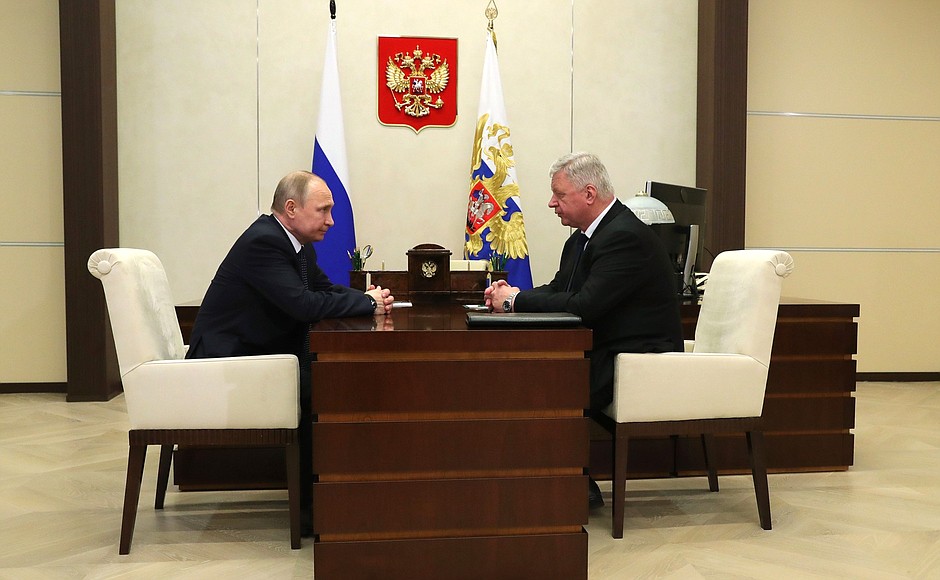 President of Russia Vladimir Putin: Mr Shmakov, there are many unions, and there are many problems and challenges. I know that you are going to talk about the ones you consider the most important. But today I would like to start with your assessment of the situation in the labour market. Chairman of the Federation of Independent Trade Unions of Russia Mikhail Shmakov: Of course, the labour market mostly depends on economic development, so today we see some negative trends: a number of companies, regardless of the latest decisions and sanctions, are in difficult situation; they are reducing staff and closing facilities. In this sense, of course, the latest decisions and statements by the government about the need to invest more in the Russian economy and provide better access to loans, because it’s critical that a company be able to refinance, give us some cause for optimism. Moreover, the policy to increase people’s income will, of course, boost the entire economic mechanism, and small and medium-sized businesses will have more work; so by increasing demand we will see better performance in the labour market as well. 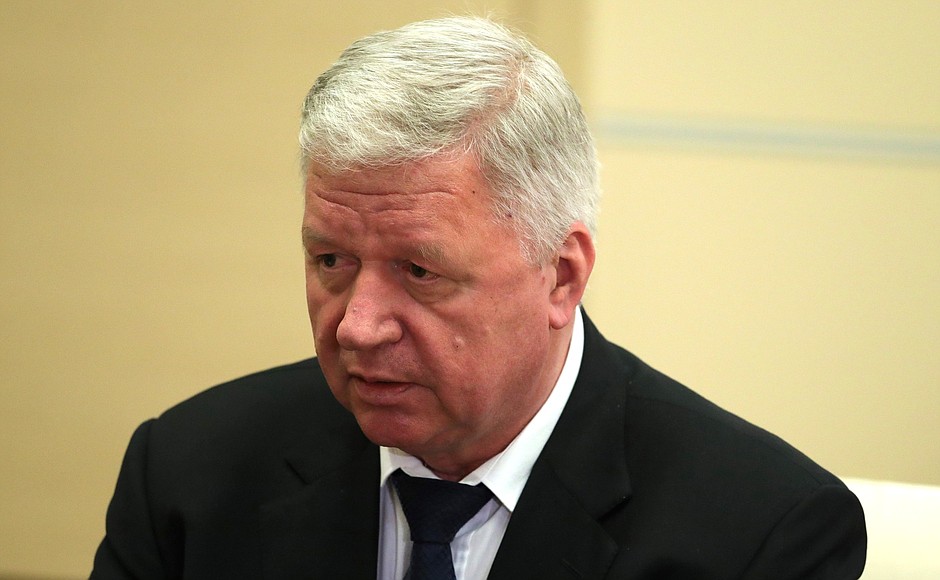 Vladimir Putin: How do the unions see the implementation of the current law and regulations in this area? Mikhail Shmakov: In general, it is being used quite actively. Of course, there are certain instances at some companies and in some regions where the Labour Code is not followed. Vladimir Putin: This is what I am talking about: stopping illegal layoffs and paying salaries in full, among other things. How is this going? 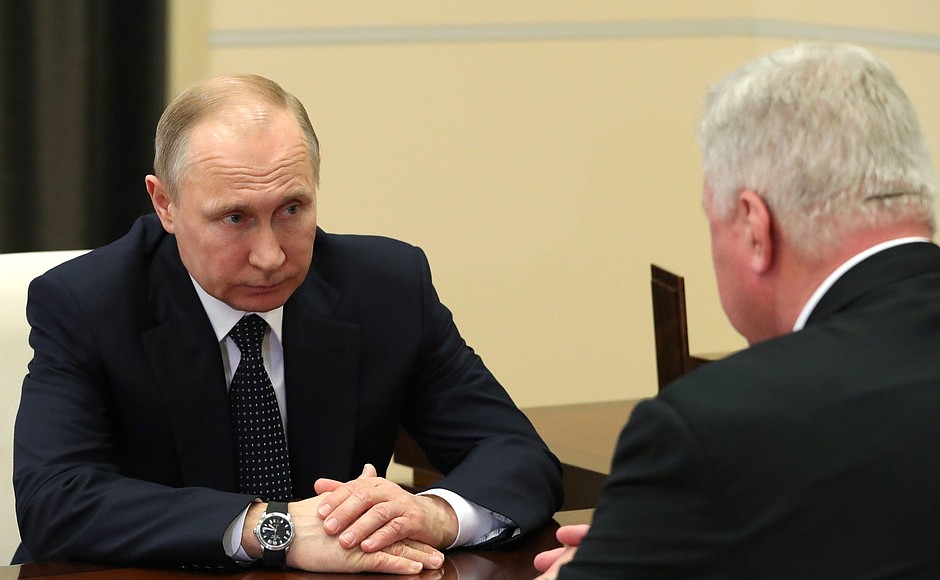 Mikhail Shmakov: As for the payment of wages at companies that have gone bankrupt, there are gaps in our legislation. Wages owed to employees are not considered a priority debt, not even second in line and are sometimes pushed back to a later stage. Therefore, many people – thousands, tens of thousands of employees of bankrupt enterprises – cannot get the wages they earned for years. Of course, the Labour Code is a living document and certainly needs to be adjusted depending on the real situation. Vladimir Putin: The priority of wage arrears – we have repeatedly discussed this with you – we actually need to think this through, talk it over with the Government and with your specialists, and look at this order. Because in this case it is important to protect the rights of people who have found themselves in a difficult situation through no fault of their own. 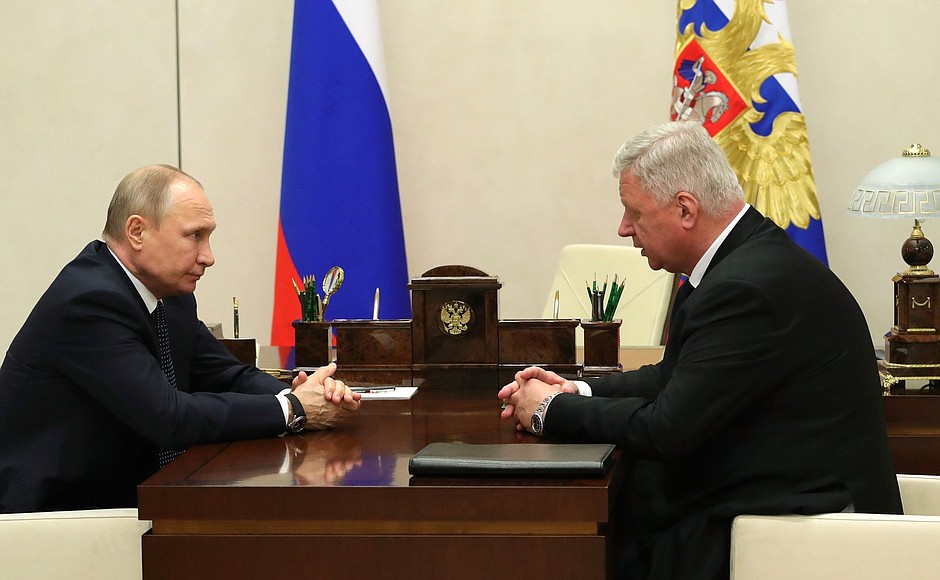 Mikhail Shmakov: Yes, of course. Moreover, we have talked about this, and there has been some progress – that wages owed should be paid before taxes. Then it would even be possible to motivate the tax authorities to ensure that wages are paid, because they would then be interested. Otherwise, they will not be able to collect taxes from companies that are struggling with difficulties. These companies are a minority, but there are some; the tax authorities collect the taxes owed by the company through their influence and other tools, but wages remain unpaid. This is a very important point, which certainly needs to be corrected and clearly stipulated in the law. We are doing this, are working with the State Duma and with the Government. Vladimir Putin: Good. The source of information - http://en.kremlin.ru/events/president/news/57251 Information on incomes, expenditure and assets of the President, the Presidential Executive Office staff, and of their family members has been published April 13, 2018 - 18:00 Information on incomes, expenditure, assets and liabilities of the President, the Presidential Executive Office staff appointed to their posts by the President, the Security Council staff, and of their family members is published in accordance with Presidential Executive Order No. 613 of July 8, 2013. The source of information - http://en.kremlin.ru/events/president/news/57254
__________________
Where should they dig the Very Deep Pit? Piglet said that the best place would be somewhere where a Heffalump was, just before he fell into it, only about a foot farther on. (c) Alan Alexander Miln |
|
|
#812 |
|
Senior Member
|
Congratulations to Orthodox Christians and all Russians celebrating Easter
Vladimir Putin congratulated Orthodox Christians and all Russian citizens celebrating Easter. April 8, 2018 - 09:00 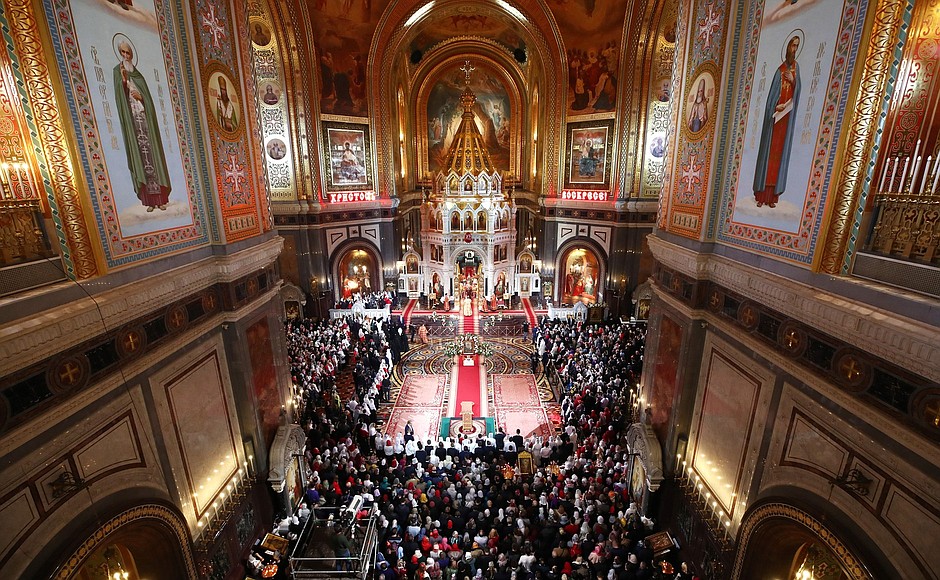 The congratulatory message reads, in part: “The great holiday of Easter symbolises the triumph of life, good and love, and has immense moral significance. It evokes faith, hope and inspires people to do good and help the neighbour. It brings people together around spiritual values and ideals. These days of spring are filled with joy and help us seize the importance of our long-standing traditions and customs. 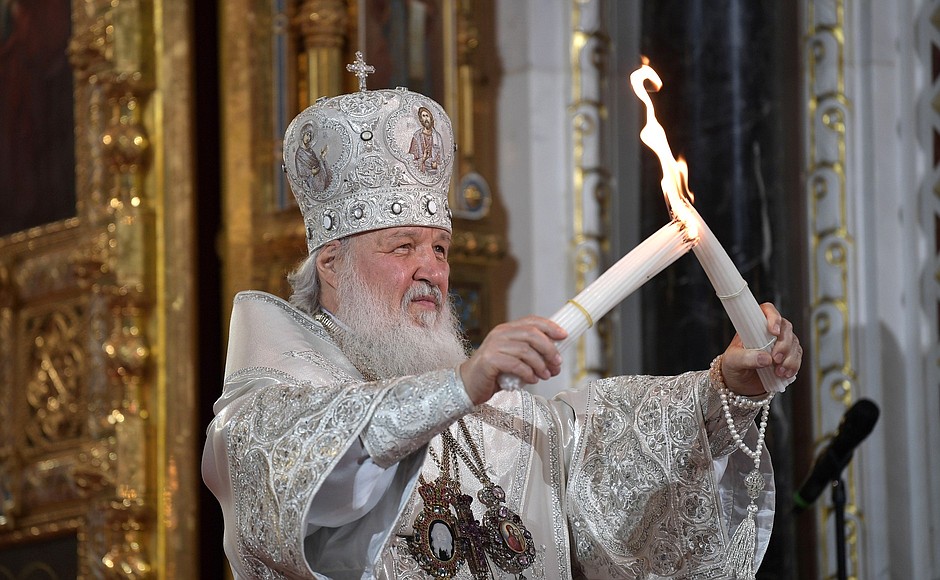 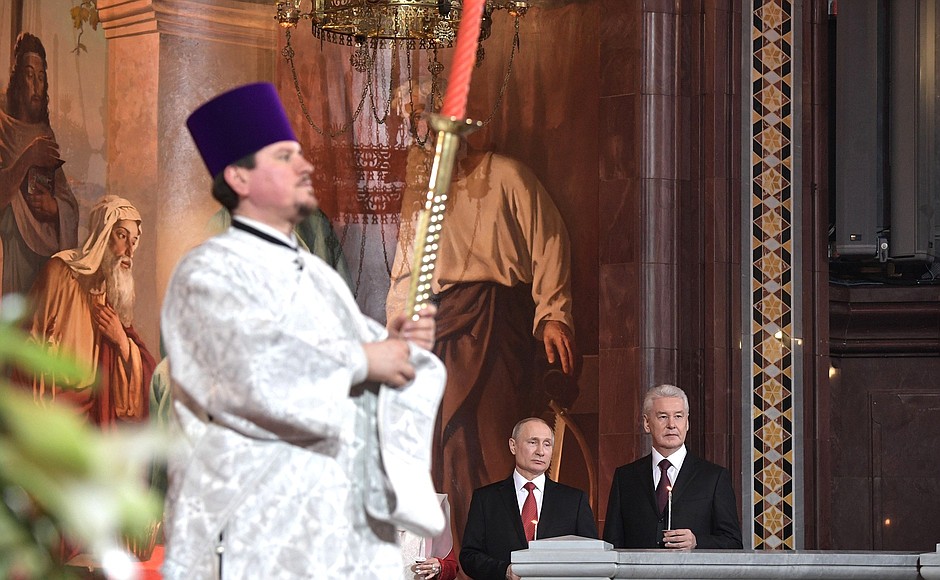 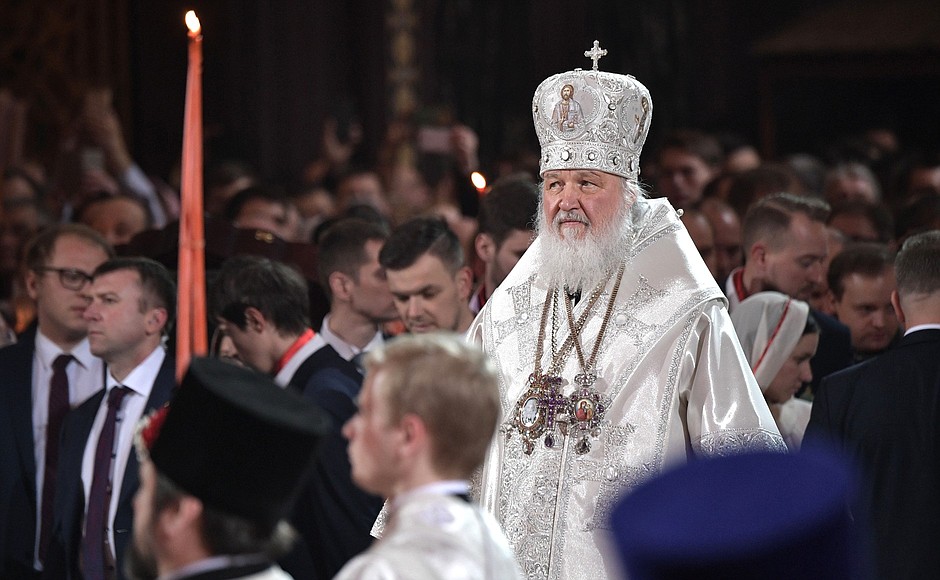 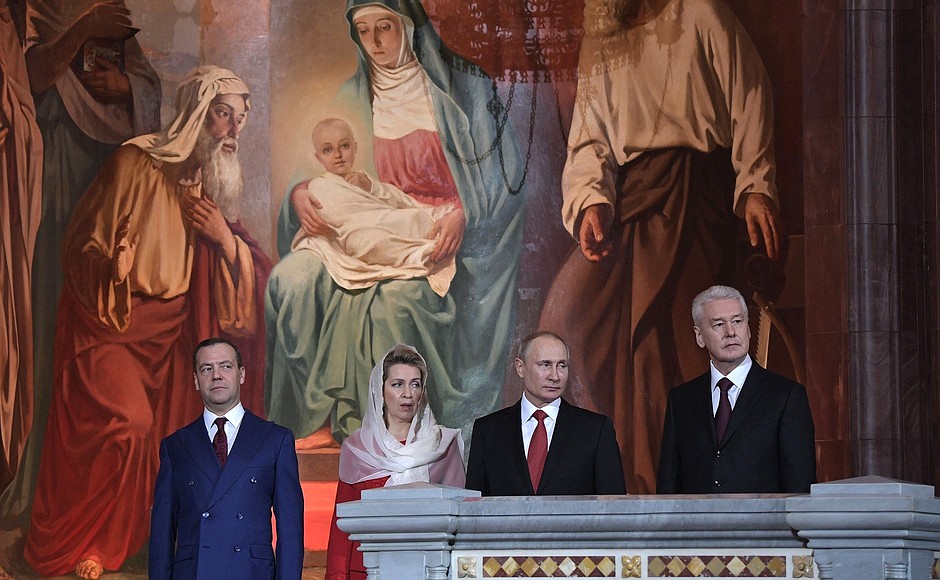 It is with satisfaction that I note the tireless efforts by the Russian Orthodox Church to strengthen social harmony, support the institution of family and educate the younger generation, as well as its contribution toward overcoming pressing social challenges. The Russian Orthodox Church should be praised for its extensive and multi-faceted work.” 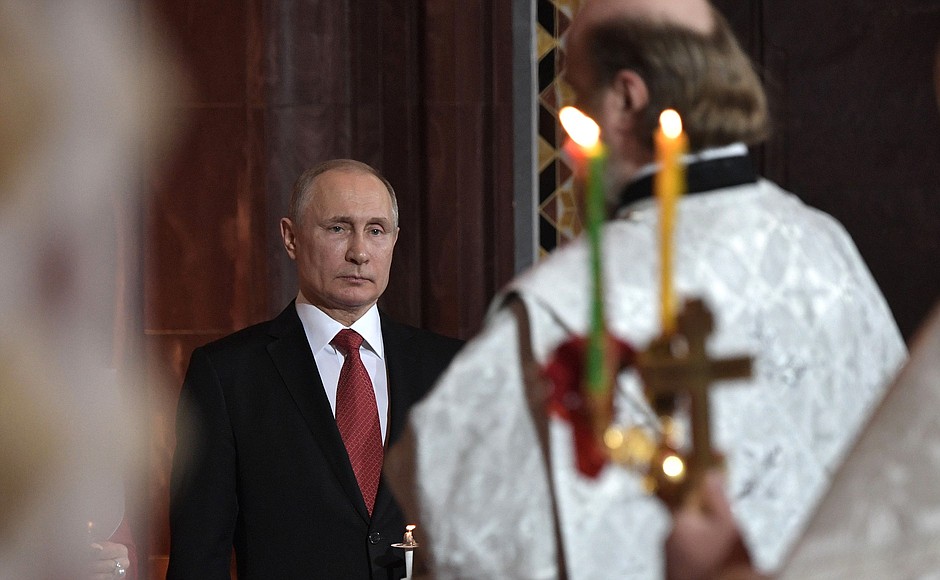 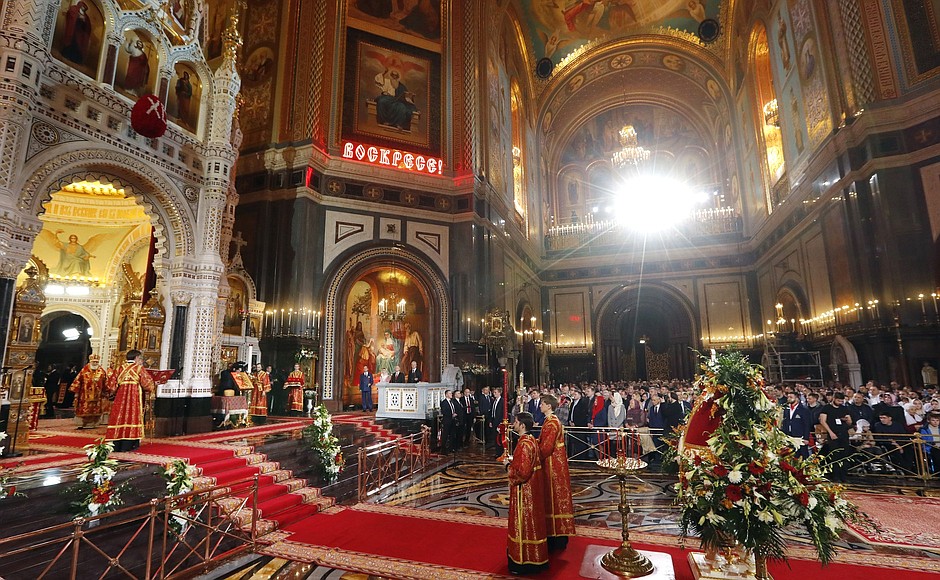 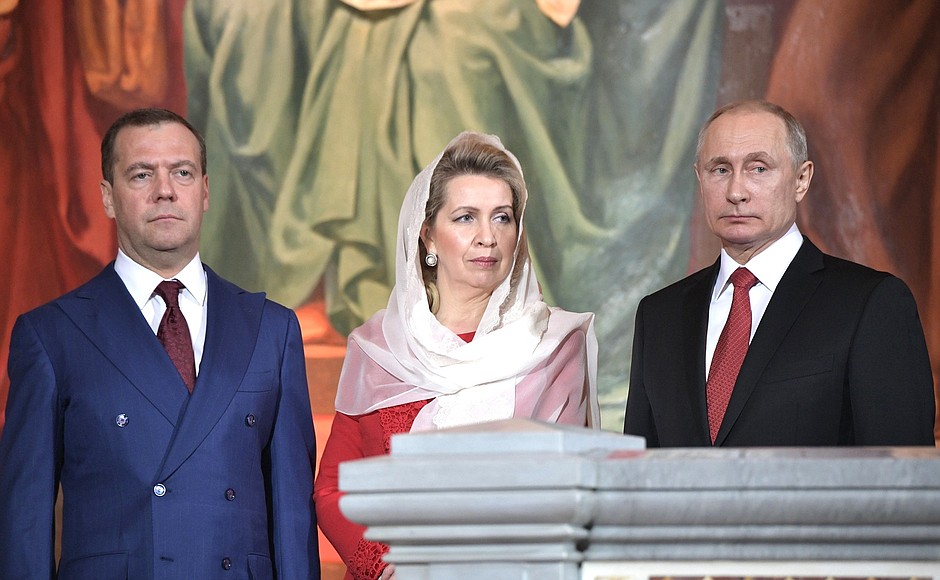 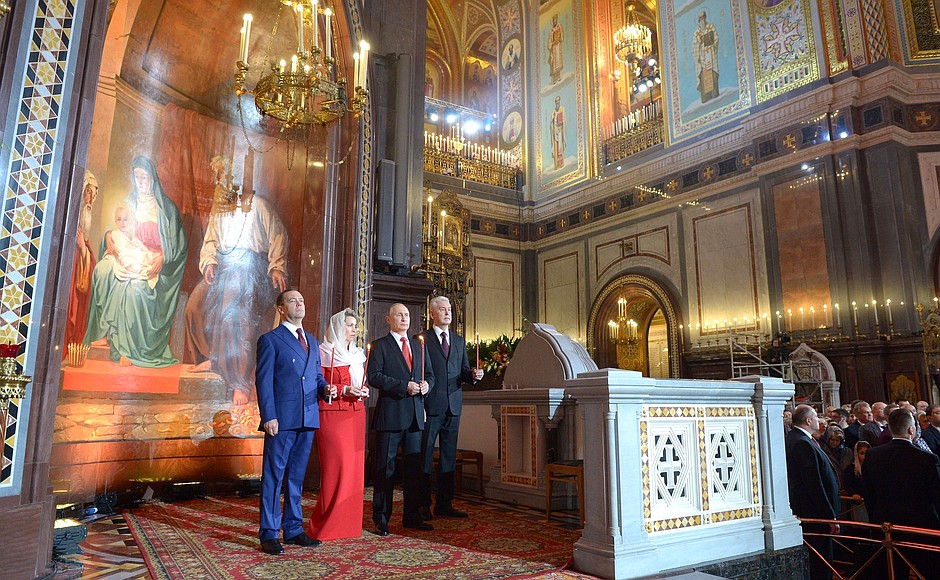 Vladimir Putin attended the night Easter service at the Cathedral of Christ the Saviour. Patriarch Kirill of Moscow and All Russia led the service. According to tradition, the President and the Patriarch each gave the other an Easter present. The source of information - http://en.kremlin.ru/events/president/news/57221 Congratulations to Patriarch Kirill of Moscow and All Russia on Easter Vladimir Putin wished Patriarch Kirill of Moscow and All Russia a happy Easter. April 8, 2018 - 09:05 The message reads, in part: “The great Easter holiday awakens the most sincere and noble feelings and aspirations in the hearts of millions of believers and inspires them to do good. It is gratifying that under your leadership the Russian Orthodox Church strives to strengthen and promote centuries-strong spiritual and cultural traditions of our people, and carries out important social work, doing a great deal to educate the younger generation and sustain social harmony and accord.” The source of information - http://en.kremlin.ru/events/president/news/57222 Greetings to participants and guests of the 17th Moscow Easter Festival Vladimir Putin sent his greeting to the participants and guests of the 17th Moscow Easter Festival. April 8, 2018 - 10:00 The message reads, in part: “It is gratifying that a brilliant creative concept conceived by maestro Valery Gergiev took shape as a wonderful initiative of annual Easter Festivals. For many years, this festival has been a landmark social and cultural event in Russia. Covering huge distances, it introduces people in Russian regions to the masterpieces of Russian and foreign classical music, performing arts and choir singing. Of course, I cannot omit to mention the forum’s charitable mission and its major contribution to preserving the wonderful traditions of enlightenment and promoting timeless moral and patriotic values. I strongly believe that the creative and inspired atmosphere of this grandiose celebration and its wonderful concert programme alongside the masterly skills of the renowned Mariinsky Theatre Symphony Orchestra and world-famous musicians and singers taking part in this festival will leave the most positive and unforgettable impression on the spectators.” The source of information - http://en.kremlin.ru/events/president/news/57223 Visit to Kurchatov Institute Vladimir Putin visited the National Research Centre Kurchatov Institute, which celebrates its 75th anniversary this year. April 10, 2018 - 14:45 - Moscow 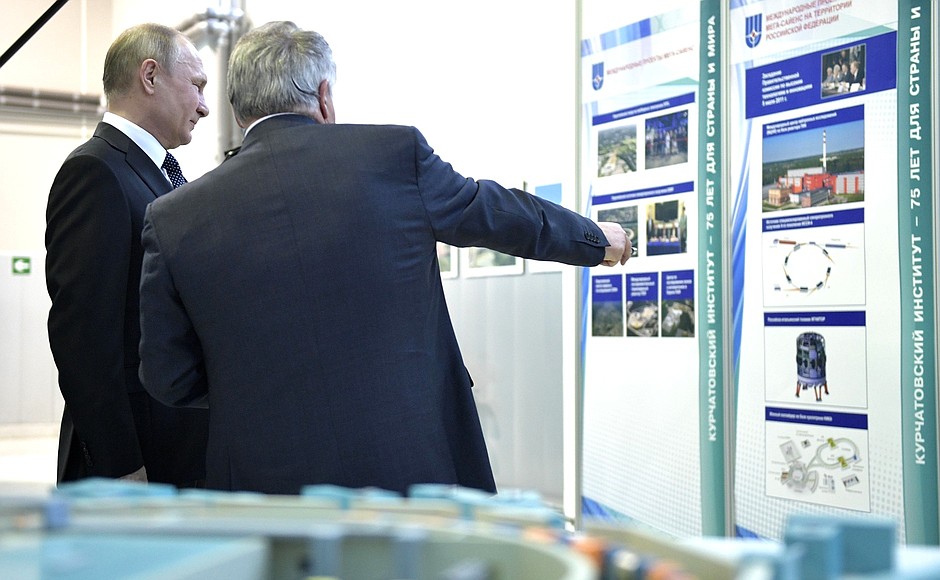 The President was told about the institute, including its infrastructure, laboratories and installations which provide a unique basis for interdisciplinary research. 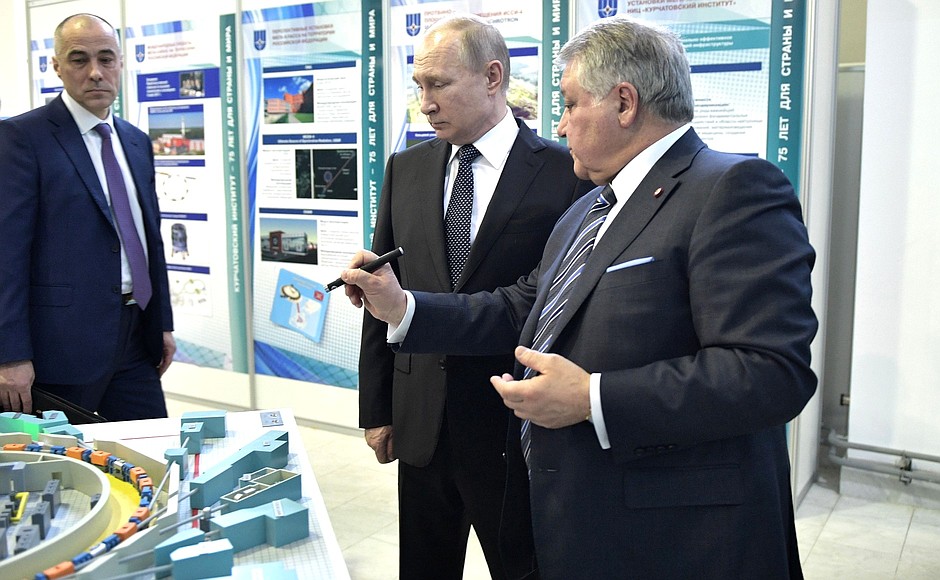 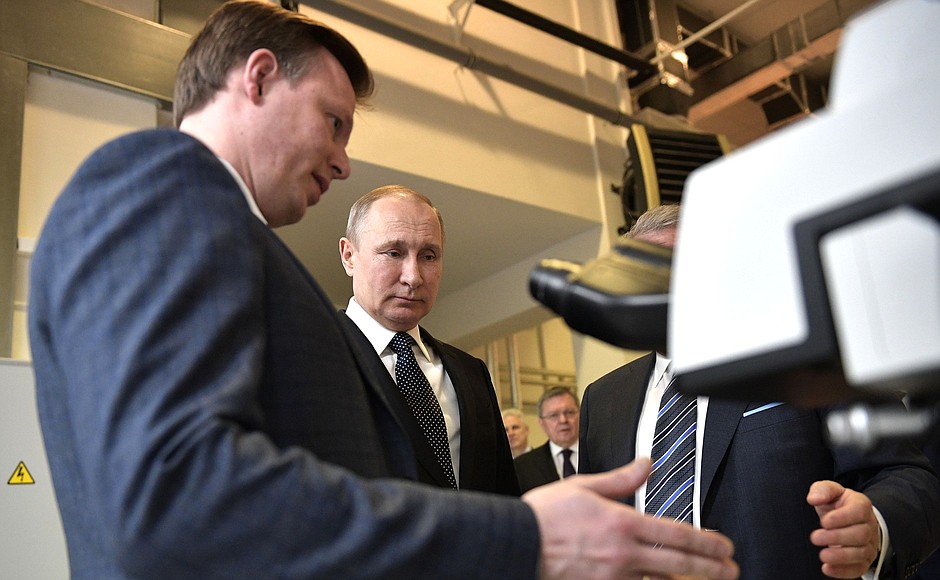 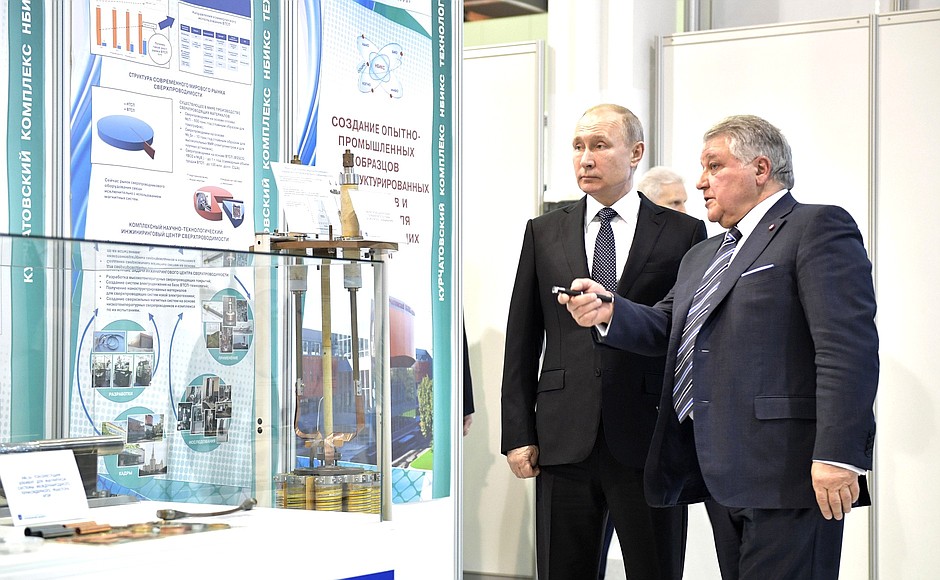 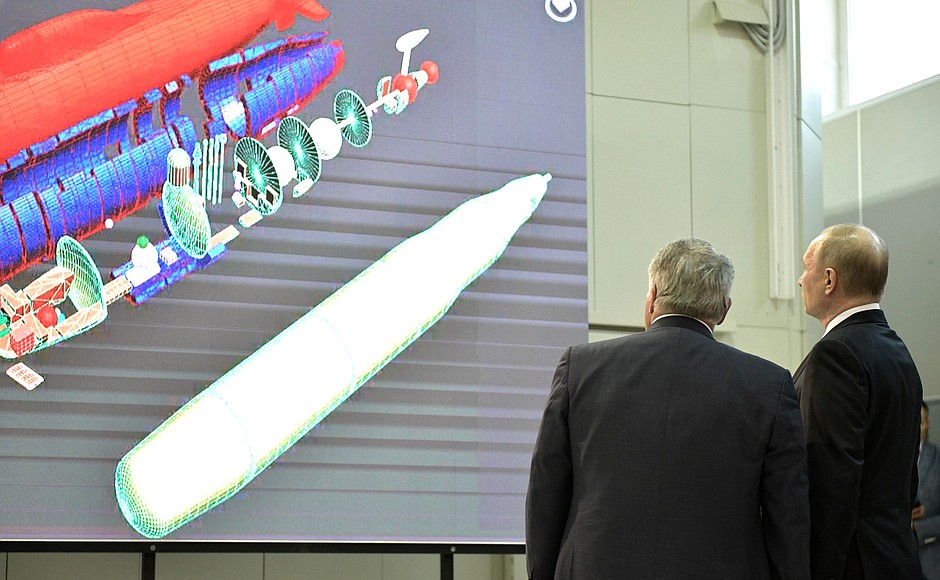 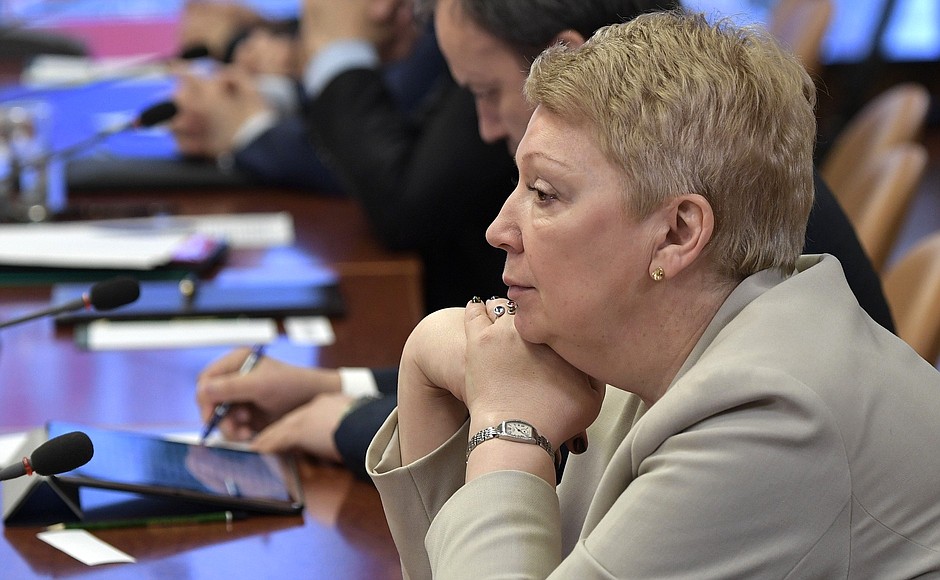 Vladimir Putin was shown around the experimental stations of the Synchrotron Radiation Source, including a plant using X-ray diffraction methods. The Synchrotron Radiation Source has brought about a new approach to the study of physical phenomena, because it accelerates electrons as only the world’s largest colliders can. 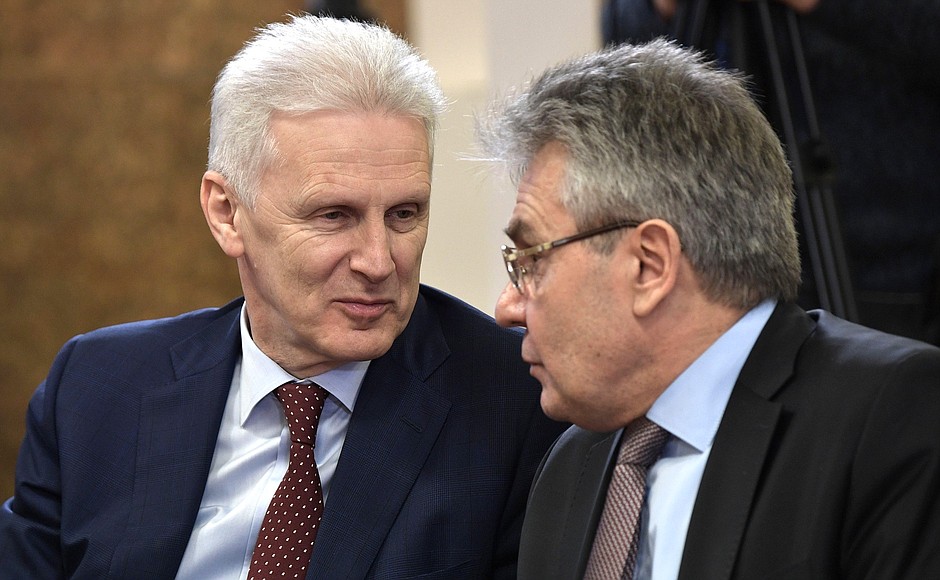 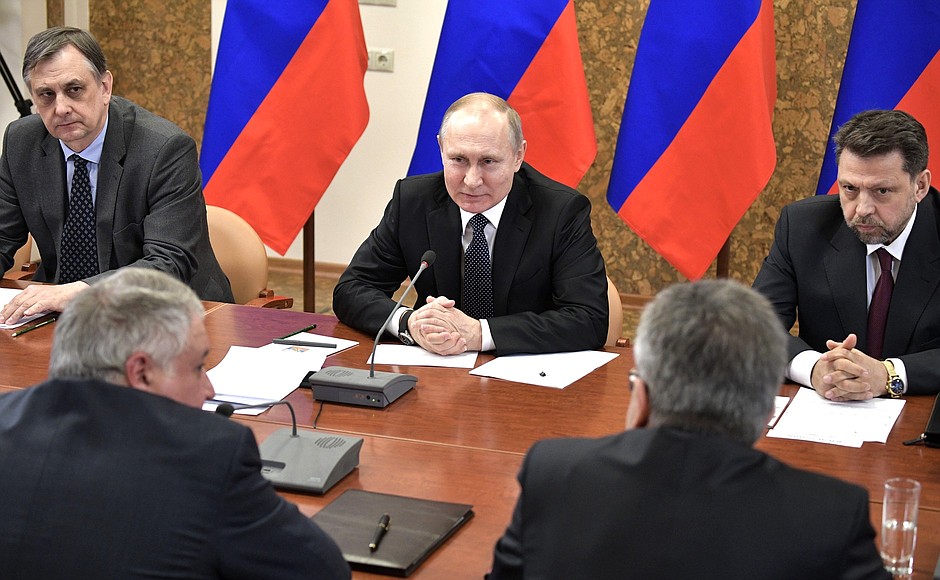 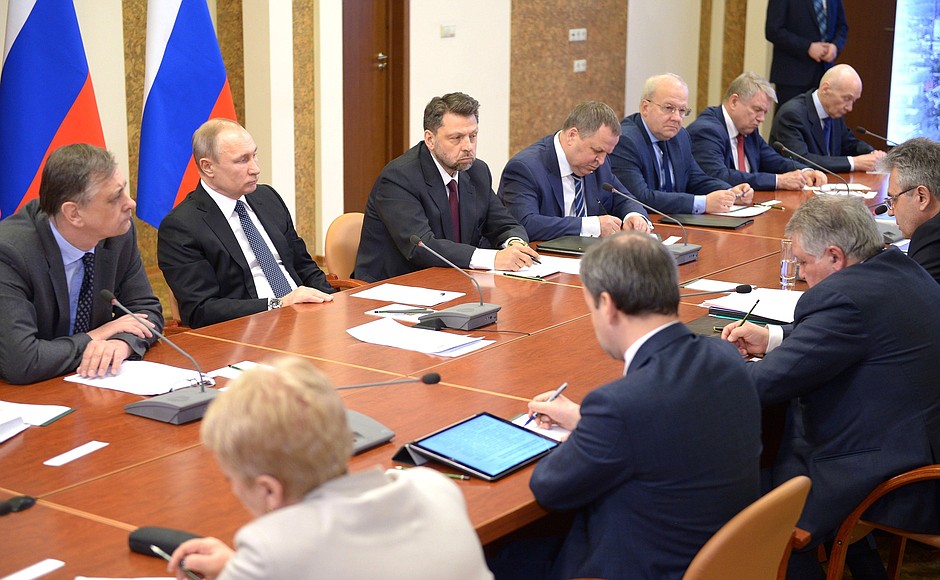 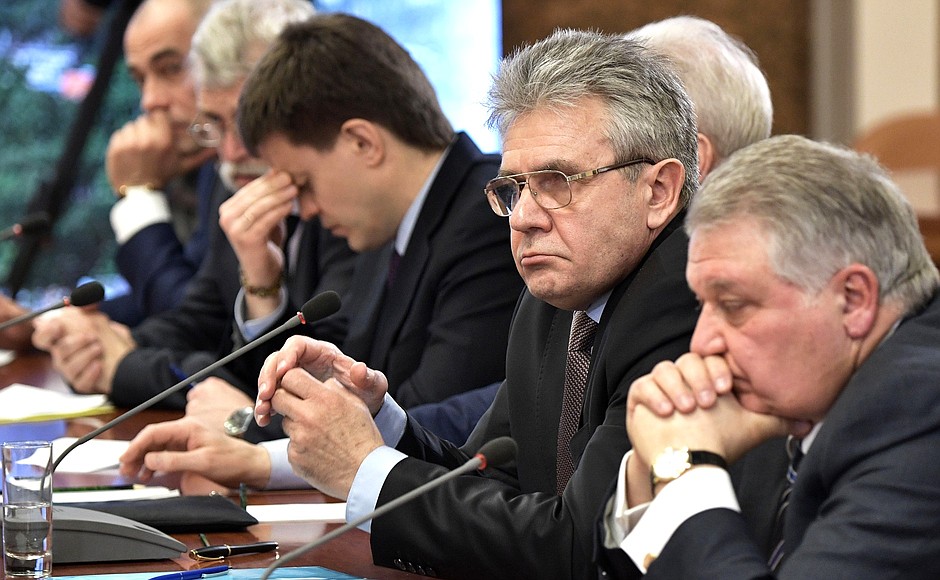 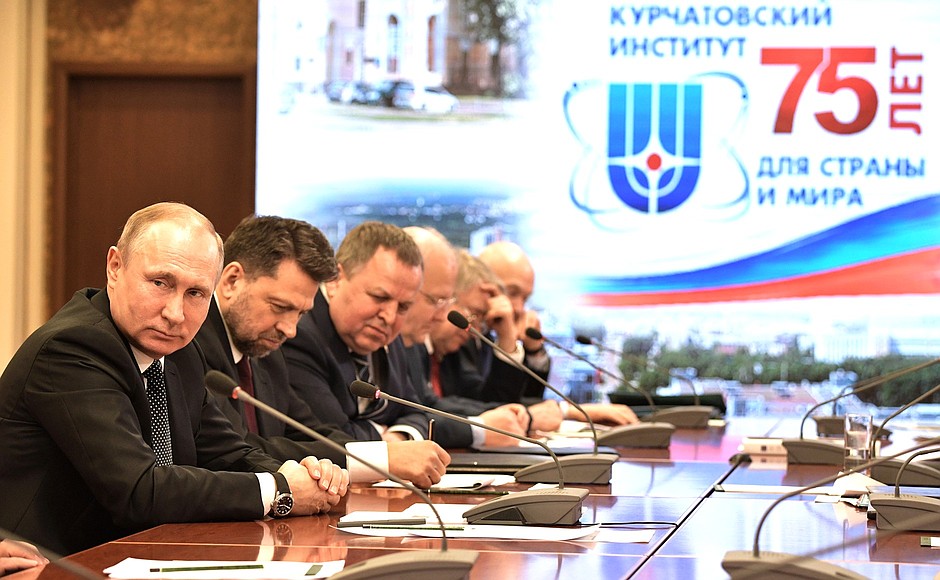 The President learned about the application of the latest knowledge in the field of physics to the creation of nanotechnologies, such as biodegradable endovascular implants that disintegrate in the body after doing their job. Vladimir Putin was also informed about promising mega-class facilities for physical research. 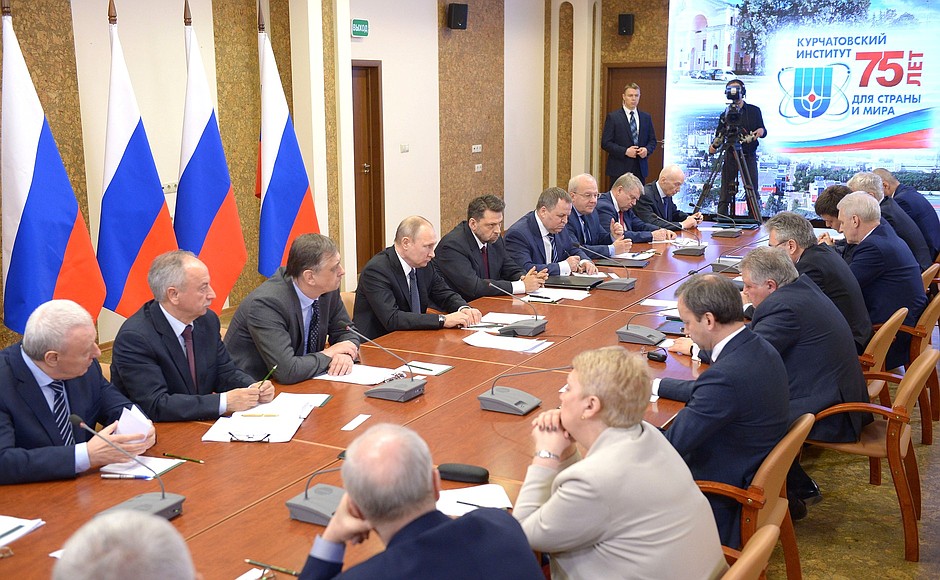 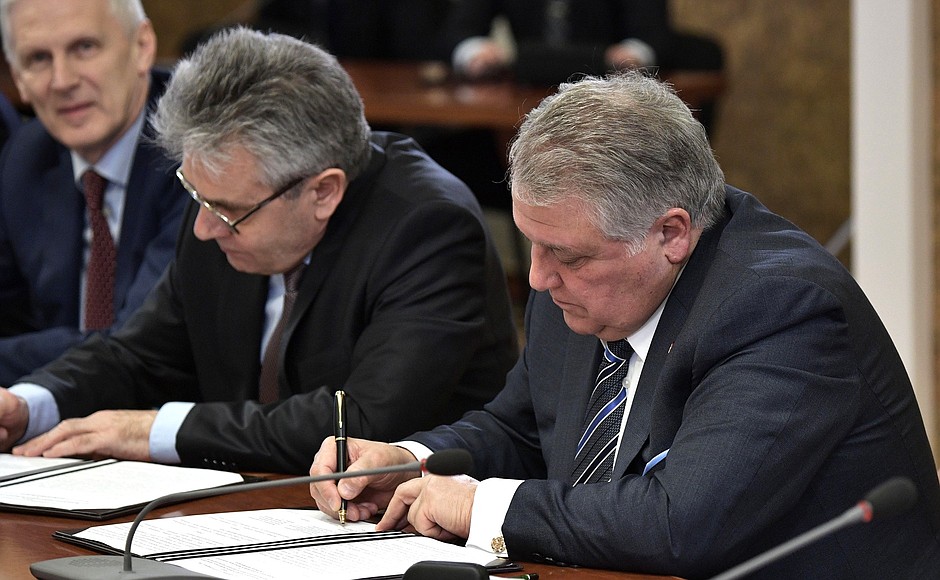 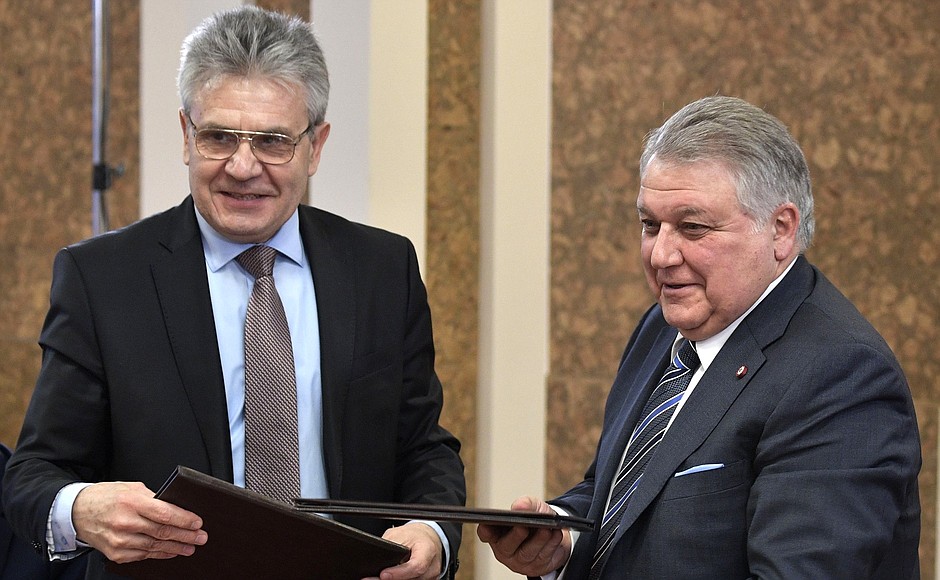 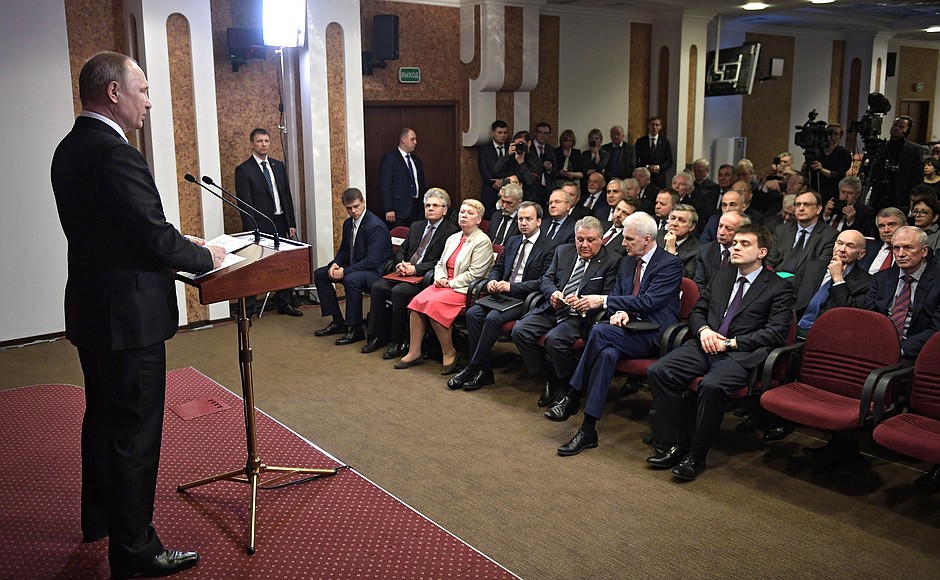 During his visit to the Kurchatov Institute, the President met with the leaders of the Russian Academy of Sciences (RAS) and NRC Kurchatov Institute, during which a cooperation agreement was signed between the RAS and the Kurchatov Institute, and also spoke at the joint meeting of the RAS Presidium and the NRC’s Scientific Council. The source of information - http://en.kremlin.ru/events/president/news/57230 Meeting with the leadership of the Russian Academy of Sciences and Kurchatov Institute While visiting the Kurchatov Institute, Vladimir Putin had a meeting with the leaders of the Russian Academy of Sciences and National Research Centre Kurchatov Institute. April 10, 2018 - 15:10 - Moscow President of Russia Vladimir Putin: Good afternoon, friends, Today we are meeting at the Kurchatov Institute, a research centre with an incredible history that continues its rapid development today. We were talking about this right now, and Mikhail Kovalchuk told me about it in detail and showed me around the centre. It is necessary to have such research centres, not only in Moscow or the leading regions, but throughout Russia. Over the past few years, we have worked hard to build up our research potential, and we have achieved noticeable success in this. We have developed a research infrastructure, including at our universities. By creating a network of federal universities, we have strengthened not only our education system but also our research sphere as a whole. I would like to say that Igor Kurchatov, the founder of the Kurchatov Institute, graduated from Crimean Federal University, then Taurida University. Measures to boost the development of science across Russia were outlined at the meetings of the Council for Science and Education and in the Presidential Address to the Federal Assembly. We also talked about this at a recent meeting with the President [of the Russian Academy of Sciences Alexander Sergeyev]. We decided to create mega-science centres in Novosibirsk and in Protvino in the Moscow Region. Large research centres will be established at leading universities in Kaliningrad, the Volga region, in southern Russia, in Siberia and the Far East. In fact, they are being created as we talk. They will greatly enhance our competitiveness and become centres of attraction for the best international scientists and young Russian researchers. Not just prominent leading universities and research centres should be used as the basis for the establishment of new technology centres. In fact, our spatial development programme, about which I also spoke in the Presidential Address, is designed to provide conditions for the people’s creative endeavours and to encourage them to form new research communities, so that conditions for self-realisation, interesting jobs and a full-bodied life will be available across Russia. Of course, we must also continue to improve the social status of our researchers, designers and engineers, who are moving our science forward and making genuine breakthroughs. Let us hold a general discussion on these issues. And then we will hold one more meeting. Let’s proceed, please. President of the Russian Academy of Sciences Alexander Sergeyev: Mr President, colleagues, The draft law introduced by the President to amend Federal Law No. 253 grants the Russian Academy of Sciences significant additional authority. Among other things, the Academy will be instructed to forecast trends in science and technology, socioeconomic development, and to submit proposals to government agencies. This is a great responsibility. Quite often, government and society rely on the Academy in creating new large projects. One of the strategic goals set in the Presidential Address to the Federal Assembly was the country’s spatial development, ensuring regions’ connectivity and sustainable development, overcoming gaps in the quality of life. Spatial development has always been and will always remain, I think, our country’s national idea. In our minds, Russia’s vast territory has always been synonymous with its greatness. Developing the country’s territory at a new scientific and technological level is vital today. I want to tell you about several projects that we are discussing and proposing right now. Researchers from the Russian Academy of Sciences, Lomonosov Moscow State University and highly respected experts, in close cooperation with the public and private sectors, recently finished developing a concept for a strategy for spatial transit and logistics corridors across Russia that would connect the Asia-Pacific region and the European Union. The concept includes fostering conditions for the multidimensional development of Siberia, Russia’s Far East and the Arctic by building two spatial transit and logistics corridors based on a new high-speed railway and the Northern Sea Route. Between these corridors, there will be a grid of transit, energy, information and communication infrastructure facilities that will provide a foundation for creating economic zones, building high-tech enterprises and creating jobs for local people. The concept provides for the possibility of extending the corridors to Japan and South Korea, and onward towards the United States. Our feasibility studies have shown that this project is more efficient economically than a group of smaller projects that address economic modernisation piecemeal. The Security Council, the Government and the Federation Council, as well as several ministries have already discussed the project. Mr President, we need an opportunity in the near future to report to you in more detail on the project, including all the developments. A national space monitoring system covering the entire territory of our country – a kind of interactive electronic map with a spatial resolution of about one metre – could be another strategically important spatial development project. Modern space radio electronic, optoelectronic and satellite communication technologies make it possible to update such a map several times a day. In the future, it could be updated every few minutes. That way, we can monitor the dynamics of our country's life. The next class of major projects includes network projects for territory development based on innovation technologies in specific science and technology areas. Building dozens of nuclear medicine centres with domestic equipment across the country could be one such example. Unfortunately, to date we have to admit that our country – a recognised world leader in both high energy physics and nuclear physics – became dependent on foreign makers in almost every area and missed a vast global market. This is particularly unacceptable in a situation where the Government set a goal to combat oncology related challenges and achieve an average life expectancy of 80+ by 2030. Importantly, Russia’s fundamental science and industry-specific research possess all the competences and technologies that are needed to produce domestic positron emission tomography units, CyberKnives, proton therapy units and radiopharmaceuticals. These competencies must be launched as soon as possible and used throughout the country. This is a major national project, which could be jointly operated by the Academy of Sciences, Kurchatov Institute, Rosatom, and the Healthcare Ministry. We discussed this project with Mr Kovalchuk, Rosatom, and the Healthcare Ministry. We will be ready to submit proposals soon. Speaking about our country’s spatial development, it is imperative to focus on the uneven level of regional development. There are regions that are traditionally research-oriented; these are metropolitan regions and cities like Novosibirsk, Tomsk or Kazan. However, there are also regions that, for a variety of reasons, have special needs. I would like to briefly discuss two of them, the Russian Far East and Crimea. These regions need a separate scientific and technological development programme supported by the federal authorities. We are aware of the demographic pressure faced by the Far Eastern Federal District, on the one hand. On the other hand, the outflow of young and well-educated professionals to central Russia continues unabated. What should we do to retain our young researchers? We must create good living conditions, a high salary and a comfortable urban environment. But it is no less important to launch large anchor projects that will be interesting to them. These must be competitive and rapidly growing projects that are technologically better than in the industrialised neighbouring countries. We propose three such projects. We have coordinated them with Mr Trutnev and discussed them at the Academy of Sciences and also with Mr Kovalchuk for the past few months. First, we propose creating a pilot nuclear medicine centre. Second, a comprehensive project for the development of deep-water resources in the Pacific Ocean. And third, building a synchrotron on Russky Island. Mr Kovalchuk talked a little about this today. The regional authorities have supported these proposals and are ready to co-finance these projects. A research and technology development programme for Crimea deserves special mention. Crimea had not received the necessary resources for this kind of development from the Ukrainian authorities for a long time, yet it has preserved a major research community. Moreover, the support Crimean scientists have received from Russia has given them the necessary incentive. We must support them. The Russian Academy of Sciences is mainstreaming the Crimean projects that include both fundamental research and practical projects for technological, socioeconomic and cultural development. These projects include the search for water resources, offshore development, ecology and the creation of the Gate of Crimea research, historical and cultural cluster in Kerch. Mr President, I would like to thank you for your assistance with these pilot projects. There will be many other projects, including the development of alternative energy sources in Crimea, a health resort centre for children in Yalta, and the construction of a Crimean Technology Valley. We hope that you will continue to support these projects. A very important issue in the country’s spatial development is supplying resources to researchers and scientists in the regions. Pursuant to the May Executive Orders, in 2018 salaries in research and science have been raised to 200 percent of the regional average. This is, of course, an important and long-awaited measure in itself. However, as I reported before, the strict correlation between the scientists’ pay level and the regional average has resulted in a wide discrepancy between the incomes of the scientists who are working in similar research and who are equally recognised in the scientific community. Obviously, this situation could cause the additional migration of scientists to the capital centres and the weakening of regional intellectual resources, which we cannot allow. I just want to remind everyone here that in the past, wages in the regions were intentionally slightly higher than in Moscow, in order to support regional development. There were regional coefficients. We believe that this gap needs to be closed as soon as possible. The absolute majority of scientists believe that researchers in federal institutions must receive equal pay for equal quality and performance. A slight difference is fair based on the consumer basket in specific regions. I think this can be achieved in several ways. First, by allocating more funding for pay increases as part of state-ordered research. We all believe that the economy will grow and that this money will mainly be generated by the regions. Second, by redistributing state-ordered research based on performance and quality, something we are currently pursuing with the Federal Agency for Scientific Organisations. Finally, some projects and tenders supported by our foundations, the Russian Foundation for Basic Research and the Russian Science Foundation could support specific large initiatives in the regions. Now, it is clear that it is necessary to negotiate with large companies – and we are also taking this on. The funds these companies allocate for applied science should be distributed to the regions that require support. The Russian Academy of Sciences, for its part, will do its best to discover new and the most promising projects for the spatial, scientific and technological development of the country, provide a scientific basis and ensure that these projects are implemented and supplied with necessary resources. Thank you. Vladimir Putin: Thank you. Mr Kovalchuk, is there anything to add? President of the National Research Centre Kurchatov Institute Mikhail Kovalchuk: First of all, I would like to thank you, Mr President, and the Academy’s leadership for joining us on this important day for the Kurchatov Institute. This is an honour for us, and it is important. Thank you very much. This is the first point. Second. I would say that our joint meeting – the leadership of the Kurchatov Institute and the Presidium of the Russian Academy of Sciences – is also a landmark event, because in fact there is a chance to merge these two potentials – the most significant in the country. And that is how it should be really. There has never been any controversy between us. Today there was quite a big coincidence. I’ll let you in on a little secret. We discovered that we have both prepared gifts for each other. Our gift is a portrait of Anatoly Alexandrov who was the Kurchatov Institute director and the president of the Academy of Sciences – and they also brought Alexandrov’s portrait. We take “our Christ to meet their Mohammed.” That is, it turns out that we have the same way of thinking, which is very important. I said this jokingly, but it actually says a lot. We grow from the same root system. The Kurchatov Institute – you all know, we have been working for the country and the world for 75 years – originated from an academic institute, after one lab split from the Leningrad Physico-Technical Institute. I mean, this root system is the academy. The Kurchatov Institute originated because ideas, research and people were concentrated in the academy. And then, the Kurchatov Institute in turn fertilized the academy, even giving it a president. So, I would like to say, I think that our reunion today (I hope that you will approve, and that we will sign the agreement officially at the end), I think it is a symbolic step in raising our science, our scientific environment to a fundamentally new level. We do not have any controversy, but we do have a foundation for unity. Mr Sergeyev has cited many examples here. It is actually quite obvious that your initiative to support the development of mega-science will involve great projects. They make us attractive to the world; they make us significant when it comes to joining foreign projects. We actually have an association we have created together with the Academy – we created it many years ago – which unites academic institutes and universities. We have a separate association of universities working with mega installations. We have a core. And if you support the idea that I am proposing together with Mr Sergeyev – to build another synchrotron in the Far East – then we will have an absolutely harmonious structure throughout the country. It will lead to the emergence of centres of excellence that will attract people – both Russians and foreigners. In this sense, this is one single project. The network of nuclear medical centres is the second project. Then we also talk about the logistics corridors, but I would like to say that there is one more important thing left. You talked about Crimea, the Far East, all things deep-sea. And now, as you instructed, we are working on deep submersibles. You have submerged before, in the south, and in the Baltic Sea, too. Now, together with Gazprom and the Russian Geographical Society, we are developing these deep submersibles, and I think they will be applicable in every area, which you talked about. Moreover, in addition to everything you have just said, there is one more thing. Since our fleet, both civil and military, is actively developing, there are plenty of interesting things, nature-like technologies, which are currently being developed; we have enormous potential. For example, one such place is in the Far East, in the Pacific Ocean. The second thing. Russia has Kaliningrad. The Baltic Sea, too – the entire Northwestern Federal District. And Arkhangelsk, and Leningrad, and Severomorsk as well. Furthermore, we also have Crimea; the academy has a base in Gelendzhik, plus the Ministry of Industry’s base, and Crimea, too. This means we can establish climatic (let us call them that for the sake of discussion) stations. They already exist, but we can bring them together into a network under the auspices of the Russian Academy of Sciences and the Kurchatov Institute and initiate comprehensive research there. Today, when we talk about nature-like technology, we must pay special attention to what is called biomineralisation. Here is a simple example. Take, for instance, starfish or sea urchins – it actually is a kind of protein, which hardens in order to form a shell, which can withstand tremendous pressure. These are natural materials, which are formed from, roughly speaking, proteins and polymers, and later turn into ultrahard materials, and so forth. So, the phenomenon of biomineralisation in only studied in two or three places in the world, and one of these places is located here, in Russia – I am talking about the Far East. And if we consider our location and our access to the seas, we can extend biomineralisation, which can become a new leap in nature-like technology, to all these seas. Plus there already are climatic studies on materials; there is a very good centre, too. I believe that under the auspices of the Russian Academy of Sciences, and I hope that the Kurchatov Institute will gladly participate in this, too, we can recreate and formalise this network. There is one more important thing. The Kurchatov Institute is using a great number of mega installations. In this sense, they are available for use by the Academy. We signed the papers a while back, this took place. I think that we can create a high-quality movement like this right now. Thank you. Vladimir Putin: Thank you. Colleagues, does anyone want to add anything? Vice President of the Russian Academy of Sciences Andrei Adrianov: To add to my colleagues’ statements, I would like to say a few words about the creation of attractive areas in Russia’s regions, primarily in the Russian Far East. Mr President, several major projects have already been implemented, with your support, in the Far East. Some projects are now being planned, I will not talk about this international collective use centre, but it calls for creating a synchrotron system. Indeed, the Kurchatov Institute operates the main unit, and there is another one at the Siberian Branch of the Russian Academy of Sciences. If Vladivostok receives its own synchrotron, it would greatly expedite the development of science as an ambitious multi-disciplinary area in the Far East. A few words about the deep-sea project that was mentioned: this Russian Academy of Sciences’ initiative could unite many Russian institutes. As the latest research, including projects with Russian involvement, shows, the ocean’s depths conceal tremendous biological resources and great biodiversity. In fact, we had not suspected this before. Today, our neighbours in the Asia-Pacific region, including Taiwan, China and the Republic of Korea, are building their own fleets and special-purpose ships for deep-sea submersibles. As you know, the shelf has been divided, and now we should expect attempts to demarcate deep-sea sectors of the world’s oceans. This is the largest habitat in the world with the greatest concentrations of biological materials. This is not just reserve biological resources for future generations. Today, these deep-sea resources provide us with unique biologically active compounds for developing new types of medications, including those for treating cancer, and new-generation antibiotics. At the same time, antibiotics made from “land-based” feedstock are no longer as effective. A good fleet of self-contained deep-sea robotic submersibles is now deployed in the Far East, and an experimental facility for manufacturing these submersibles has even been established there. We have a good fleet of remote-controlled submersibles. We and our foreign partners have already become involved in this area. If we continue to expand this programme, the creation of a vessel for transporting deep-sea submersibles in the Pacific would, of course, greatly spur the programme. Thus, we would never lose our leading position in this region. We hold a strong position today. We occupy at least one leading position in the Pacific theatre. At least. Indeed, these discoveries can also spur biomimetic research, as mentioned by Mr Kovalchuk. This implies new materials and new medications from the ocean’s depths. And we have also discussed this with the Federal Agency for Fishery. They are interested in developing technology for using deep-sea biological resources in the near future. This interesting project would help all of us work together. This is happening even as interest in deep-water research in the international scientific community is growing. So, if you supported the creation of a synchrotron centre in Vladivostok… A centre of radiation medicine in the Far Eastern Federal University is yet another project that will get off the ground soon, this is also extremely important because we have 30,000 registered cancer patients in Primorye Territory. About 7,000 new cancer patients are diagnosed every year, and the creation of such a centre on Russky Island would enable at least 1,200 patients to get high-tech care. These three projects indicated by Mr Sergeyev, the synchrotron, radiation medicine centre as well as the deep-water project, would be very interesting for us in the Far East. Vladimir Putin: Thank you. Colleagues, over to you. Vice President of the Russian Academy of Sciences Yuri Balega: Mr President, under the Strategy of Scientific and Technological Development of our country, the funds for science are to grow two percent by the year 2035. We believe for our part that if we are to overcome the technological lag, it would make more sense to achieve the 2 percent level by 2024 (which is feasible) and at the same time retain the funding of fundamental research in the spending structure. Fundamental science would be funded to the tune of 0.35 percent of the GDP. We link the solution of this task with the improvement of the technological base of science. We have some problems here. While the funding of research in nuclear physics is considerable (international mega-projects and projects in this country), things are not as well in other research areas. I have worked for 23 years in the Caucasus as the director of an observatory with a telescope built in St.Petersburg (former Leningrad) at the Leningrad Optical-Mechanics Association. It was the biggest telescope in the world, but that was back in the early 1970s, half a century ago. Since then not a single major astronomical instrument (truly big instrument) has been constructed. The world sees enormous breakthroughs in this field and it would be great to invest in this sphere, like in other research fields. We believe it would be realistic to renew research equipment in this country by some 50 percent by 2024. To this end between 5 and 7 billion rubles need to be invested every year in order to renew much of our scientific equipment and achieve a decent level of research. We are ready to work out a special programme of modernisation of our stock of research equipment. We’ll try. Vladimir Putin: As regards overall spending on science, everything we have been speaking about, and the plans that we have – we are designing them proceeding from economic development forecast. Yuri Balega: It’s not all that easy. Vladimir Putin: Yes. But things keep changing, so we always bear in mind that we can add something in the breakthrough, vital areas of the country’s development depending on the situation concerning the world economy as well as the Russian economy. Of course science overall, fundamental science is one of our priorities. So, give us your proposals so that we can take them into account in our joint work. Is that all right? Now over to you. Vice President of the Russian Academy of Sciences Valentin Parmon: Mr. President, In Siberia, we have worked intensively to streamline the rapid development of the Novosibirsk Science Centre and the Tomsk Science Centre. This was done in line with our conversations when you came to Novosibirsk and especially after March 1. The Siberian Branch, FASO and regional leaders elaborated this concept. We are focusing on the development of pure science and the creation of a powerful technological foundation for Russia. And we are absolutely confident that, given the Government’s support, and we are expecting such support, it will take us ten years to establish… We do not want to call this a “Silicon valley,” a “Golden Valley” exists in Novosibirsk’s Akademgorodok, but we guarantee that Siberia will receive a “Silicon Taiga.” At any rate, the first facilities are to be established in the next 3–5 years. What will seriously hamper our efforts, and what help do we need, apart from financial and administrative support? Novosibirsk State University ranks among the top three to five universities, and it trains skilled personnel. We would like this university to work more effectively for the Siberian region, and we would like Novosibirsk State University to have the same status as Lomonosov Moscow State University and St. Petersburg State University. It appears that the university deserves this status, and, if the relevant proposals are examined, the people of Siberia guarantee that everything will be recouped 100 times over, including the best-trained personnel. Thank you. Vladimir Putin: Thank you. We will not resolve this issue today, but let us take a closer look, OK? You have the floor, please. Vice President of the Russian Academy of Sciences Valery Charushin: Mr. President, colleagues, We have already noted the importance of regional scientific development. I would like to draw attention to the Ural region where very interesting partner-like relations between the Academy’s institutes and Ural Federal University have long been established. In the past few years, we have been working with Mikhail Kotyukov [Head of the Federal Agency for Scientific Organisations (FASO)], to establish joint laboratories, and this practice has won a reputation for itself. However, I would like to draw attention to another important aspect, without which it would be impossible to develop regional science. I am talking about housing for research associates. In the past five years, the Ural region has witnessed major positive changes, and we acted together with the Federal Agency. We have issued hundreds of certificates to early-career scientists, and the Federal Agency has received hundreds of flats after the implementation of investment projects. We have been carrying out a major construction project in the Akademichesky district for the past ten years. Last year alone, we set aside 300 federal properties, including 100 for the Federal Agency, and 200 for other federal agencies, including the National Guard of Russia, Investigative Committee divisions and prosecutors’ offices. It appears that we are doing a good job. But we do not have the required resources today. The Academy of Sciences has now been deprived of this non-core function, which was relegated to FASO, the body that controls our administrative directorate. And now, we need support from the region and probably from FASO because we find this task to be rather burdensome. When everything proceeded smoothly, we generally had no problems, but in the past few years, an investor went bankrupt and difficulties began to snowball. Anyway, this could be a long story. I am simply asking for effective assistance. Maybe, the Governor who knows these issues can help. We are implementing a multi-billion-rouble project that would profit us, the university and federal-agency employees. This is my request. Vladimir Putin: Please. Deputy Prime Minister Arkady Dvorkovich: We have a mechanism for resolving this issue via the Housing Mortgage Agency. I will link up with our colleagues, so that they can resolve this with the Governor. Vladimir Putin: Just formulate the issue and give me a document. I will forward it to my colleagues, and we will start working. It goes without saying that this is the most important aspect. I have already said a few words about the social wellbeing of scientists; this concerns their wages and the provision of housing. The Kurchatov Institute started with 20 kilogrammes of uranium, two grammes of radium and only ten flats. Although Kurchatov had his own office on Lubyanka Square, they allotted only ten flats. Please formulate all these issues, and we will address them. Vice President of the Russian Academy of Sciences Vladimir Chekhonin: Mr President, colleagues, I am in charge of fundamental medicine at the Academy of Sciences’ presidium, so I will only focus on this area. Mr Sergeyev has already said here that the nuclear projects that we hope to undertake with the Kurchatov Centre are extremely promising. However, your Address to the Federal Assembly laid special emphasis on life expectancy. It should grow, in essence, up to 78 years within six years. This is a super-task, Mr President. We are aware of its complexity, yet it is solvable. It can be resolved through cooperation with the Health Ministry, with Russian Academy of Sciences institutions, FASO, with executive bodies at all levels. Our analysis indicates that life expectancy in Russia is 35 percent contingent on the GDP, 35 percent on the people’s lifestyle and 30 percent on healthcare funding. The top priorities in public health care at the current stage must be the underperforming categories of the population such as men and children under the age of 14, since these are the categories that underperform most. We have achieved a lot in terms of establishing a healthy life style thanks to your initiatives in the previous eight years. However, a breakthrough in this field would require setting up an inter-agency council, probably, with a respective deputy Prime Minister to head it. The Russian Academy of Sciences in this respect is ready to engage all available resources in diagnostics, primarily of therapeutical diseases and socially significant diseases such as cardio-vascular, oncological and infectious diseases, which mainly account for the mortality rate in our country. I think we will be able to establish momentous interaction, broad cooperation with the Kurchatov Centre because fundamental science is being developed in enormous strides here. We believe, Mr. President, that the Health Minister jointly with the Russian Academy of Sciences should report to you on a quarterly basis on the aspects related to the programmes and the reaching of the targeted goals in this respect. This is crucial. Vladimir Putin: This matter also needs thinking over and articulating. We have a number of councils, however, you are right, this is one of the major spheres of our job. So let us consider at which level and how we should set up this mechanism. Generally speaking I have nothing against this. Vice President of the Russian Academy of Sciences Alexei Khokhlov: Mr President, colleagues, I would like to say a few words about human resources in the Russian research community. Considerable assistance is being provided to young researchers aged under 35 years, thanks to the presidential programme of research projects that was proposed at the President’s meeting with scientists who received mega-grants for scientific research. Overall, they receive different types of assistance in the form of grants. Vladimir Putin: But the volume of such assistance may vary. Alexei Khokhlov: Yes, it may vary. But scientists aged between 35 and 50 do not receive this type of assistance. I can tell you from my own experience and the experience of my colleagues that the most productive period intellectually is between the ages of 35 and 50. This is the time when researchers have learned all they could from their teachers and can implement their own projects. Regrettably, these people do not always receive an opportunity to implement their own projects or create their own laboratories. I believe it could be reasonable to develop a programme for supporting the establishment of new independent laboratories in various places, including in the regions. It is a fact that those who accept positions in the regions, where they create new laboratories, are in the worst situation, because they have limited access to information resources, research equipment and devices, and the like. Therefore, I believe this programme could become a good addition to the presidential programme of research projects. At the regional level, it could increase connectivity in the Russian research environment. I believe that the Russian Academy of Sciences could effectively contribute to these efforts. It is a programme we can easily implement now, or at least contribute to its implementation if the Government takes on this crucial programme. Vladimir Putin: We created a system of mega-grants and other grants long ago, and it has been working quite well. As for young researchers, our reasoning was, first, to keep young researchers in Russia, second, to create conditions for them, and third, we thought that this is very important because of their vulnerability in terms of income and professional opportunities. We believed that we should create special conditions for them, so that they gain a footing in their research preferences and also financially. However, nothing is perfect, and new questions arise in the process of implementing approved programmes. Let us discuss all this together. You have the floor now. Presidential Aide Andrei Fursenko: Just for your information, a targeted programme is used to support young specialists, it is an overall sum amounting to under one percent of the budget funds. It is a matter of targeted issues. All the other budget money is allocated largely on a competitive basis, and there are no age limits there. It is at the discretion of each institute, laboratory and the Academy in general to identify their priorities. Vladimir Putin: It is a matter of funding research. Our colleague was speaking about those percentage points, this is what it is about. Now it is clear. Please, go ahead. Vice President of the Russian Academy of Sciences Nikolai Makarov: Mr President, colleagues, I would like to address the issue of cultural heritage preservation, although it may seem somewhat odd for the Kurchatov Institute. Yet it is an important issue because you spoke in your Address to the Federal Assembly about the significance of preserving the faces of our cities, about the importance of creating new museum sites in the regions, and we should certainly rely on our heritage as we develop the spatial structures of Russia, and re-develop our country. This work mostly goes unnoticed, but many archaeological digs at new development sites are conducted by our archaeological institutes, and whatever was discovered in Crimea in the past years was for the most part found at new construction sites. They are brilliant achievements and outstanding finds, made possible thanks to the legislative provision that requires a preliminary historical and cultural analysis of the territory prior to large-scale construction. There are proposals to scrap this provision from the legislation. They have been voiced by the Ministry of Construction and are to be submitted to the State Duma shortly as a draft law, as amendments. On behalf of my colleagues – historians and philologists who are very concerned over this potential development – I would like to ask you to keep the provision requiring historical and cultural expert assessment because it is an effective tool to ensure the preservation of cultural heritage. Meanwhile, our Academy is ready to submit proposals on how to make the procedure more efficient, to streamline it, to possibly speed it up but not at the cost of heritage preservation. Mega projects in the Humanities face a lot of difficulties, however, setting up a museum and research cluster in Kerch is an ideal format for a mega project. Because a “gate” to Crimea, the new transport infrastructure is being established on the territory of the capital of the Bosporus Kingdom, it is Kerch that emerged on the site of Panticapeaon. It is the territory of grand Scythian and Greek mounds, the treasures of which made up the collections of the Hermitage and the Historical Museum. The place has much to display. And this project could also blend a new museum and an academic laboratory on in-depth inter-disciplinary study of antiquities with international participation. And it will also rectify the socioeconomic situation in Kerch, which is now an industrial town concealing its historical face. So this could become a blend of academic science together with practical improvement of the territory. I would like to ask you to support this project. Vladimir Putin: Submit the project and we will look into it separately. This undoubtedly sounds interesting and important. As to amendments to the law, I think the second part of the question you raised is crucial. Concerning the activities that should be acceptable in terms of time, cost, so that the activities (which are apparently utterly important) do not turn into a quasi tax on construction work. But I completely see eye to eye with you that the expert assessment should remain. Let us move along. Vice President of the Russian Academy of Sciences Valery Bondur: Mr President, colleagues, I would like to go back to spatial connectedness. I would like to underline a peculiarity of our country. It has a land border of 61,000 kilometres whereas maritime border space amounts to 8,600 kilometres. If we all line up along the border, there will be gaps between us. Ten Chinese and five to six Europeans and Americans will be facing us. It means we have to apply different means in order to… Vladimir Putin: They will not face us, do not worry about that. Valery Bondur: What means can be suggested to solve the problem? We have a peculiar country, with many regions hardly accessible because of poor weather conditions. We have polar regions and the polar night. And there is a method of using modern promising techniques of remote probing and creating spatially distributed monitoring systems including space monitoring. That is, today’s space ships, unmanned probes and other devices generate huge streams of information in different spectral bands with different devices which use electromagnetic waves, magnetic fields, gravitational fields, particle streams, which makes up a good subject to develop with the Kurchatov Institute. What are the main trends today? One trend is creating multi-satellite small-scale systems; we are talking about satellites like SkySat and CubeSat, the smaller ones. They are not costly, but you have to launch a lot of them. As Google stated today, a new system has been created that updates its data on a daily basis. So far, it is for medium resolution only, but soon one-metre resolution will become available, and our country could take a big step forward. The next trend is, importantly, radar systems. Our country was the first to launch a radar satellite into orbit, but, unfortunately, we have no active radar satellites today. The first satellite was designed for marine space reconnaissance and target designation; a 5.5-kilowatt nuclear reactor was used to power it. Together with our organisation, where I used to work, researchers from the Kurchatov Institute worked on creating such a system. Today, many European countries, and even Korea, have their own radar systems. If we use our country’s experience in creating small-scale radar facilities with a synthetic aperture, which has already been tested with unmanned aerial vehicles, we will be able to form a multi-satellite group based on such radar systems. They are all weather, which means that clouds are not a problem. Seventy percent of the time, our country is covered with clouds. Everyone knows this: today, and yesterday, too, the weather was fine, but before this, we hadn’t seen the sun for almost two months. What kinds of problems do we face here? First, the enormous amounts of data that we receive from satellites. Today, it is Petabytes; tomorrow, or in the near future, it will be Exabytes. We need special methods and tools to process this amount of data (which is big data): I am talking about computational tools, algorithms, parallel algorithms, cloud systems, methods for database creation. And here, we have good ideas, and projects, too, which are currently being implemented at the Ministry of Education and Science and the Kurchatov Institute. The Russian Academy of Sciences has similar concepts, too. What is the most important thing today? Not only to receive this enormous amount of data, but to update it every day, several times a day, even, with a resolution of several metres or even better – we need to process and deliver this data to users, and do it quickly. In order to do this, we need very specific databases, which will allow us to process all this data and present it in 4D using GIS-systems to create the geospatial data that will be of use to not only the regions, but also to the federal authorities and various branches of the economy as well – I am talking about natural resources, agriculture (and I think more will be said about that later), the security of the country, for preventing technogenic and natural disasters, monitoring the environmental status of the territory, and so forth. That is the kind of project I believe our country can easily implement, meaning that we already have the technical foundation. But this requires certain organisational activities. And we would like you to support this programme. Vladimir Putin: I must see this concept in a full representation. Agreed? We need to discuss this between departments, too. Arkady Dvorkovich: We started discussing this within the framework of the Digital Economy programme. Together with our colleagues, we will be able to submit our proposals for your consideration soon. Vladimir Putin: Good. Vice President of the Russian Academy of Sciences Irina Donnik: May I? Vladimir Putin: Of course. Irina Donnik: I am responsible for the agricultural sector, therefore I will be speaking about our daily bread. Mr President, colleagues, Mr Sergeyev spoke about Crimea, where the main priority of the Agriculture Ministry can be implemented, that is, selective breeding and seed generation programmes, including sugar beet seed generation. According to the approved indicators, import substitution should reach 20 percent by 2025. However, our scientists have devised a technology under which Crimea’s unique environmental and weather conditions can be used to breed these seeds, Russian seeds, in half the time, by reducing the generation process from two years to 12 months. This would allow us to reach 40 percent in seed import substitution within three years. But the success of this project depends on water supply for irrigation. Our scientists can and are working on a technology for the use of weakly salinized surface water and wastewater for irrigation. It is definitely not a cheap project. Its cost has been estimated at some 700 million rubles. But its implementation would enable us, first, to implement the plant-breeding programme, and second, to create a source of stable income for Crimea. We hope you will support our project despite the costs involved. In general, I would like to say the following about Crimea. There are three research institutes in our sphere there: the Magarach Institute of Vine-Growing and Wine-Making, the Institute of Agriculture and the Nikita Botanical Gardens. We strongly hope they will preserve their unique identities and will not be deformed during the merger, because they have different goals and spheres of operation. We hope very much for your support. Vladimir Putin: Are there merger plans? Irina Donnik: Yes, mergers are a permanent trend, or merger ideas are proposed. Mr Kotyukov is smiling, but we have discussed this issue with him many times, and we have prevented the proposed mergers so far, because Magarach is a unique institution that must be preserved in its current form. These institutions must not be merged. It is my personal opinion and also the opinion of our colleagues and the department of agricultural sciences. And there is another matter of major concern that I would like to speak about. Some people may see this as a minor thing, but we believe it concerns the country’s strategic security, biosecurity. I am referring to veterinary science. We face the ever-present danger of animal and plant infections. And we need to provide regular and major scientific support to every veterinary problem. At least this is how it was done in the past, even though it has become inappropriate to bring this up. Regrettably, the number of research institutions concerned with this problem has decreased several-fold. There are only four such institutes left and they are to be found in Moscow, the Moscow Region and there is also one in Voronezh. All the others have been reformed or merged with agrarian centres. Practice shows that a change in the specialisation of such institutes leads to a decrease in the number of veterinary subjects and scientific schools. In the past 10 to 15 years, 64 scientific schools have disappeared. We believe that this testifies to the destruction of Russian veterinary science, which used to be very strong. But we still need to address these matters, especially in light of the tough requirements needed to train veterinary specialists at universities. The main complaint concerns a lack of practical training, which we cannot provide. We propose setting up veterinary research centres in Siberia, the Urals, the Far East, as well as in southern and central Russia. The Russian Academy of Sciences, the remaining veterinary research departments at universities and business associations would coordinate the operations of these centres in the field of veterinary practice. Graduates could be involved in this work. Vladimir Putin: Am I right in thinking that currently veterinary control is the responsibility of the regions? Arkady Dvorkovich: Yes, for now, but we have issued instructions at the forum in Krasnodar to develop proposals on the federal consolidation of this sphere. Vladimir Putin: It happened when we delegated veterinary control to the regions, which led to the appearance of this problem. Colleagues at the Krasnodar forum proposed reinstating federal control. We will do this, and the programme on veterinary control you have proposed will be pertinent. Irina Donnik: Thank you. Otherwise we will react to epidemics instead of preventing them. Thank you. Vladimir Putin: Please, formulate your proposals, because the country needs them, and our Crimean colleagues will implement them. Mr Fursenko, please monitor this matter and report back to me on how it’s getting on. Irina Donnik: Thank you. Vladimir Putin: You have the floor. Vice President of the Russian Academy of Sciences Valery Kozlov: Mr President, colleagues, In his remarks Mr Sergeyev mentioned the draft federal law amending Federal Law No. 253 on the Russian Academy of Sciences that you, as President, have submitted to the State Duma. You have designated me as your envoy in relation to the adoption of this draft law. For this reason, allow me to provide a brief update. For us and for everyone who expressed their views on this matter, including in the State Duma, this federal law is extremely important. It is viewed as a step in the right direction that follows up on the reform to streamline relations in the area of fundamental research. As you probably well know, the draft law already passed the first reading in the State Duma, and was supported unanimously. Everyone agreed that it was heading in the right direction. Preparing for the second reading, the only thing I asked members of the State Duma was not to try to amend, improve or change the text too much. There is always an urge to do just this, but, honestly speaking, we need to refrain from pushing too hard and follow what the mathematicians call a successive approximation procedure. This law is extremely important for us as well. Of course, it vests us with new authority across a broad range of areas, but we all understand that with it comes new responsibility for the Academy. How can all this be done effectively? I would like to make two points here. The Academy of Sciences is charged with overseeing research and methodological work in all fields of research in the Russian Federation. This is not an easy task, to put it mildly. After all, this requires being completely immersed in this activity in order to be able to analyse, understand everything and issue recommendations, assessments and expert reviews. It is obvious that this would be impossible without the involvement of research institutions that used to be part of the Academy. In this sphere, we definitely need to work together with the Federal Agency for Scientific Organisations in order to reach out to experts, our colleagues, working for Russia’s leading research and academic institutions. There is also a question on a provision from Federal Law No. 253 whereby the Russian Academy of Sciences is entitled to do research on its own. However, there are currently no research fellows within the Academy. But the legal provision exists, and we must get to the bottom of this matter and develop an understanding of the subject. I would like to quote a saying by Anton Chekov who famously said that if in the first act you have hung a pistol on the wall, in the final act it should be fired. So if we establish a norm of this kind, it means that we believe that such prospects exist, so the Academy and all of us must understand this. Mr President, colleagues, Looking at the situation in terms of legislation, we see that we must continue our efforts. Mr Sergeyev has already reported on a project to streamline and enhance the legal status of the Russian Academy of Sciences. Today, we have the opportunity to congratulate our colleagues from the Kurchatov Institute on the occasion of its 75th anniversary. This is a remarkable event for all of us, including the Academy of Sciences. That said, in 2024, as Mr Balega already pointed out when he spoke about funding opportunities, we will be celebrating the 300th anniversary of the Academy of Sciences, which is a major landmark. It goes without saying that we would very much like to make sure that the Academy of Sciences is integrated into the legal framework. Mr President, allow me to say something even my colleagues here may not know: up until 1998 the Russian Academy of Sciences was not a legal entity. It was registered as the country’s supreme research institution without being an independent legal entity. And we managed to get along quite well (Laughter in the audience). It seems though that all the problems we have followed our decision to register as a legal entity. Why am I bringing this up? What I would really like to say is that the legal status of the Russian Academy of Sciences, the country’s oldest and most unique research institution, is not only challenging but also very captivating, to be honest, including for our colleagues who specialise in law who could take up all these matters. Vladimir Putin: Thank you. Regarding the provision on independent research by the academy, this was the proposal of the academy. We took it into consideration and decided to accommodate this request. It is clear however that research is mostly carried out by academic institutes, not the academy. Nevertheless, if the academy wanted to have this option in the law, I did not oppose it. Of course, we can think of how this legal provision can be implemented. This is understandable. If you see any threats during the review of the draft law by the State Duma, come to me directly, since you are my direct envoy. You can also work with Mr Sergeyev and Mr Fursenko. We will try to come up with a response without delay. Colleagues, Mr Sergeyev and Mr Kovalchuk wanted to sign a document. We are happy to provide you with a wonderful opportunity to sign a cooperation agreement between the institute and the Academy of Sciences on the occasion of the anniversary of the Kurchatov Institute. Congratulations! The source of information - http://en.kremlin.ru/events/president/news/57231 Speech at the joint meeting of the RAS Presidium and the Kurchatov Institute’s Scientific Council During a visit to Kurchatov Institute, the President addressed the joint meeting of the Russian Academy of Sciences Presidium and the Kurchatov Institute’s Scientific Council. April 10, 2018 - 15:40 - Moscow President of Russia Vladimir Putin: Colleagues, We are meeting at the famous Kurchatov Institute, which will mark its 75th anniversary this year. I wish all the best to the institute’s staff on this date. Laboratory No. 2 was established in 1943, at the most difficult period of the war. It is here that the Soviet nuclear project was launched. It is difficult to overestimate its importance and the incredible achievements of our scientists, designers and engineers. They have made a huge contribution to the country’s defence capability. Speaking plainly, they have probably saved the country with their achievements. The parity they have created made an invaluable contribution to global security. It is important that we not only preserve our unique competencies but continue to move forward. I would like to remind you that Laboratory No. 2 began with a few lathes, a small room, 20 kilograms of uranium and 10 flats allocated to Kurchatov’s personnel. The laboratory itself was located in a Moscow suburb. Today Kurchatov Institute is the world’s only research centre that has a synchrotron, a super-powerful laser, as well as nuclear energy, plasma and genetic complexes. This high concentration of research infrastructure allows you to conduct unique multidisciplinary research. I hope that our meeting at this historical venue with the Kurchatov Institute’s Scientific Council and the RAS Presidium will provide an opportunity to discuss our priorities at the current stage of technological development. Friends, Igor Kurchatov said it was important to chart the high priorities in any project because secondary, although essential, work will otherwise sap our strength. According to Kurchatov, we must deal with only the most important aspects of our work and life. We need a real breakthrough; this is our most important task today. We must use technological progress for developing our vast territories, for boosting economic, industrial and agricultural efficiency. Obviously, science is beginning to play a crucial role in national development. And we have the potential for addressing top-level research, design and technological tasks. As you have probably noticed, in my address to the Federal Assembly, I discussed new Russian strategic weapons systems in great detail. No other country has such a system today. Dozens of companies, design bureaus and research centres, including Kurchatov Institute and other academic institutions, helped develop them. A new generation of scientists, engineers and skilled workers also made a substantial contribution to this effort. I repeat, we were able to develop these technologies only because Russia boasts a powerful fundamental research sector, with great research, technological and industrial potential and, most importantly, a powerful human resource potential. It would be impossible to address these tasks without this system. Today, we need to use advanced defence technologies in high-tech production sectors. Likewise, nuclear energy is now used for peaceful purposes, including power generating, the icebreaker fleet, etc. Today, it is important to elevate Russian civilian science to a competitive international level using our accumulated potential. Russia must rank among the leading countries in numerous key research areas. First of all, this is mathematics, the foundation of the digital economy. We have always led the way in this field, and we must continue to consolidate and strengthen our positions. We need to take a dramatic step forward in genomic research and materials science, to reach a new level in the development and implementation of convergent, nature-like technologies. In fact, we are talking about broad interdisciplinary research at the juncture of mathematics, physics, biology, and information, cognitive and other sciences. New discoveries will enable us to create qualitatively different methods of preventing, diagnosing, and treating diseases, including those that are still incurable, developing effective and environmentally safe technologies for generating energy and recycling domestic waste, and also making significant progress in the development and implementation of artificial intelligence systems, to increase their energy efficiency, replicating principles and processes found in nature. Existing and newly created resources in theoretical research will help us reach new horizons in the study of our planet, outer space including deep space, and the history and origin of the universe. Our scientists can and should achieve significant results in these areas, which are among the most important for the whole of civilisation. Colleagues, in the coming years, we must implement a national science project comparable with the nuclear and space projects in scale and historical significance for the country. What are the key points here? First. It is necessary to build an effective, modern system for the management of scientific and technological development that will unite the capabilities of research institutes, universities, and high-tech companies, and will support large-scale interdisciplinary research and rapid commercialisation of advanced solutions. In the restricted format meeting just before, we recalled how, prior to 1998, the Academy did not even have a legal entity. I do not know whether this is good or bad, but it is necessary to integrate into the existing system, otherwise effective work will not be possible. Second, we must increase funding for research and at the same time ensure that these funds are used efficiently. Money should go to organisations that produce considerable practical results. We will do our best to increase budgetary allocations for fundamental research by 50 percent in the next few years. During the restricted format meeting, we spoke about gradually increasing funding for research and design from 1.1 percent to 2 percent of GDP. You know that this is a challenging task. It is challenging not because we do not want to do this or because of the money involved. Not at all. It is a challenging task because 70 percent of the total spending is funded from the budget. In other industrialised countries, 30 percent of funds come from the budget, but it is 70 percent in our case. We have to take this into account. We can hardly increase budgetary allocations rapidly. But we can and will create additional incentives for businesses to invest in research and design, additional incentives for big and small high-tech companies. In short, we must create an investment climate that can spark a genuine technological boom. This is something we simply have to do. Third, we must upgrade at least a half of the equipment and research infrastructure at leading research organisations. We have talked about this here. I fully agree that this must be done, and I think that we can do it. We must continue to develop mega-science projects in Russia. I have mentioned the creation of such systems in Protvino in the Moscow Region and Akademgorodok in Novosibirsk. It has been proposed today that such cutting-edge infrastructure also be created in Vladivostok. I support this proposal. We will act on it. Fourth, we need to create a comprehensive system for training researchers and creating conditions for the professional advancement of young researchers, so that they will have better conditions for research, for setting up research laboratories and teams, as well as for the practical application of their solutions and ideas. Fifth, talent, competences of scientists and engineers and, of course, their social status are a key factor in technological breakthroughs. All this must develop, and their social status must increase. At the same time, I would like to emphasise that a researcher’s remuneration must, first of all, be pegged to the results of his or her work. They have also discussed this matter today, and they have noted that hard working people that achieve certain results, regardless of their official place of work, must receive equal incomes, and not just at major centres. These incomes must be equal, regardless of what region they work in. We must pay adequately for a substantial contribution to accomplishing research tasks. Living conditions for those creating and introducing engineering solutions must also be competitive. Equal research and creative opportunities have principled significance. I agree completely with what has already been said here. No institute or any single Russian region can monopolise science. We must do our best to create attractive places for dedicated professionals, for people fascinated with the idea of a technological breakthrough, for our young researchers, for world-famous foreign scientists, including our compatriots, all over Russia. We will continue to consolidate our federal universities and other higher education institutions and Academy institutes, and we will establish powerful research centres, including in such areas as the digital economy, the humanities, healthcare and agriculture, as well as in other sectors and disciplines. I hope that Kurchatov Institute and the Russian Academy of Sciences will become most actively involved in this work, and that they will jointly address research tasks and achieve technological breakthroughs. The Academy and the institute have signed the relevant agreement today. I assume that all this will effectively promote the development of Russian science and that of the entire country. Thank you very much for your attention, and I wish you all the best. Thank you. The source of information - http://en.kremlin.ru/events/president/transcripts/57233 Greetings on 75th anniversary of National Research Centre Kurchatov Institute Vladimir Putin congratulated the staff and veterans of National Research Centre Kurchatov Institute on its 75th anniversary. April 12, 2018 - 12:00 The message reads, in part: “The Institute’s establishment was a significant milestone for our country, setting the main development vector for research and strategic industries for decades to come. You have every right to be proud of the outstanding researchers, academics, engineers, constructors and specialists, and their discoveries and spectacular achievements. The nuclear reactors designed by this institute are used in the manufacturing, shipbuilding, medicine, space and defence sectors, symbolising the power of our country and serving as an example of true teamwork and professional commitment of the Institute’s staff to national undertakings. It is gratifying that today you are building on the wonderful traditions set by your predecessors. Being at the forefront of scientific research, you work to deliver on objectives that are critical for the future of Russia and all of humanity. The fact that the results of your fundamental pioneering research find their way into real life deserves praise. This approach meets the requirements of our time, and enables our country to succeed and achieve a breakthrough in its development.” The source of information - http://en.kremlin.ru/events/president/news/57247 Visiting Cosmos pavilion at VDNKh exhibition On Cosmonautics Day, Vladimir Putin visited the renovated Cosmos pavilion at the VDNKh exhibition. April 12, 2018 - 15:10 - Moscow 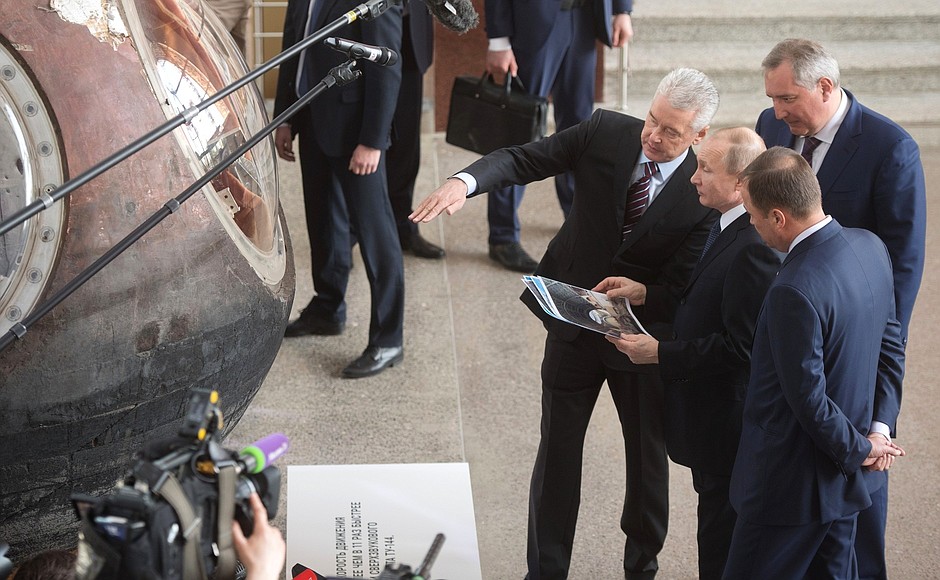 The President looked at some of the exhibits, including the Vostok-1 descent vehicle in which Yuri Gagarin landed, and the exhibit devoted to the international Moon Mission. 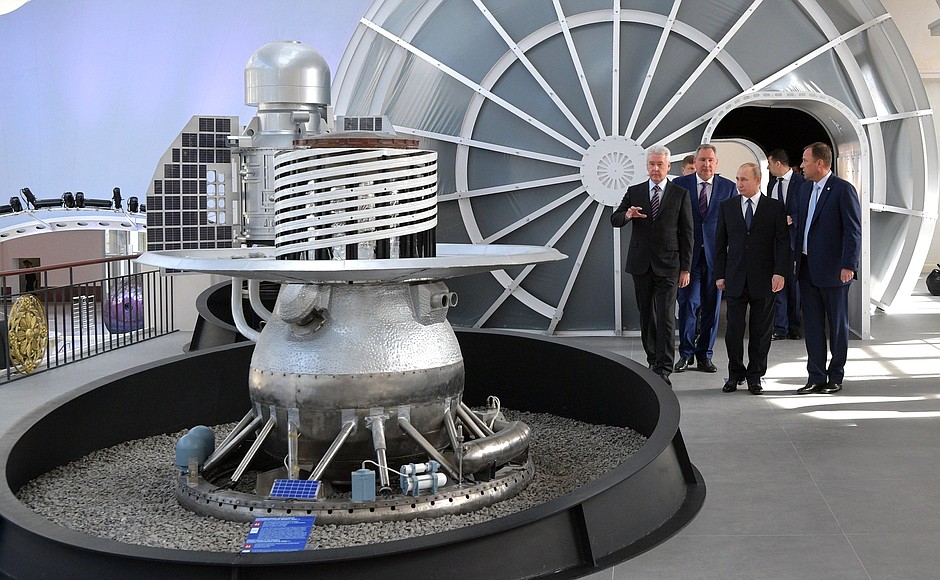 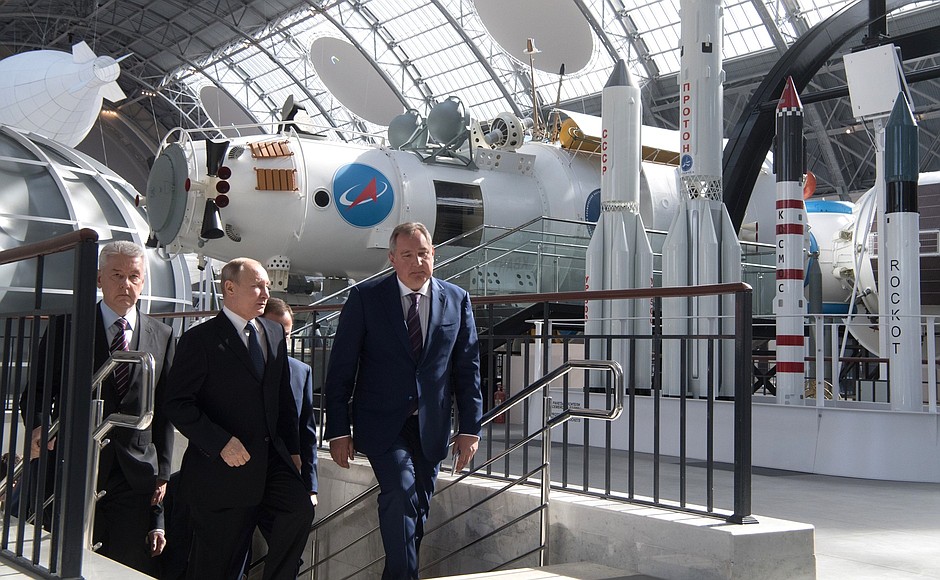 Vladimir Putin was also shown around the Cosmonautics and Aviation Centre in the Cosmos pavilion. The centre is divided into several areas, including a museum and exhibition area, an educational and research section for the implementation of projects proposed by children and young people, and recreation and family entertainment areas. 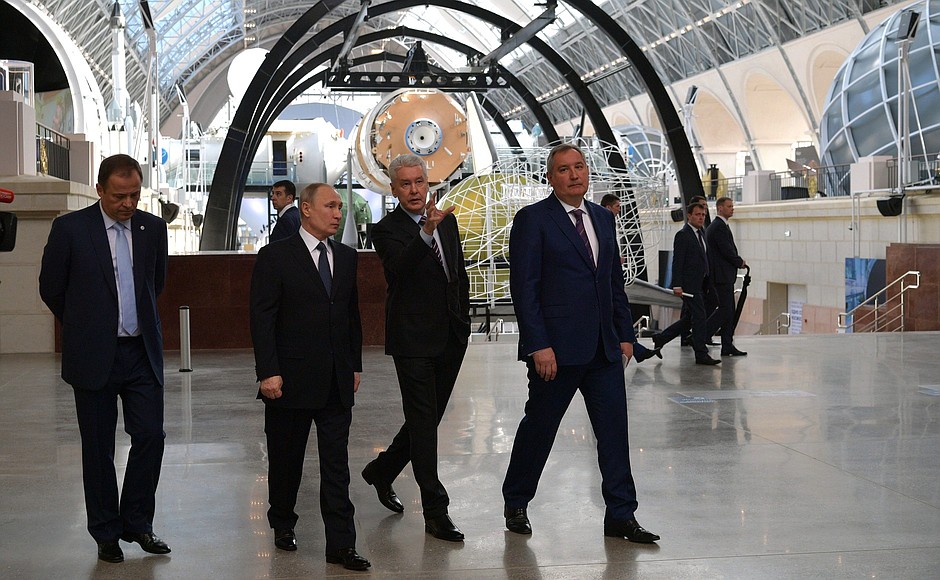 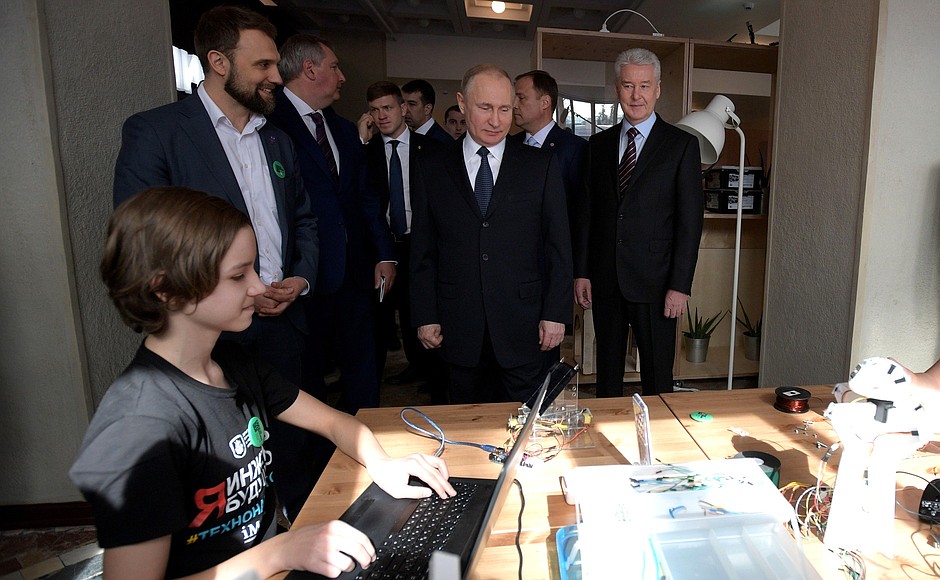 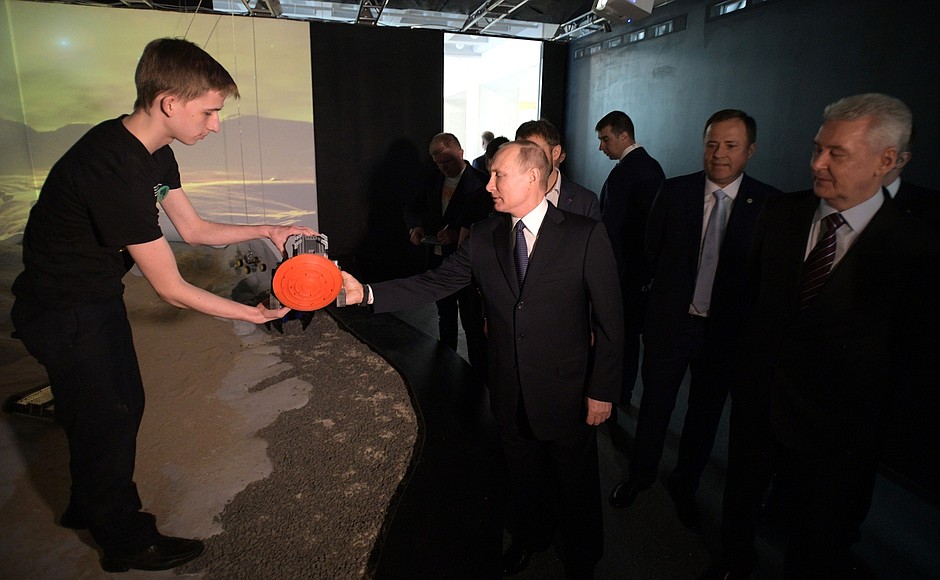 The decision to create the Cosmonautics and Aviation Centre, designed to be the largest space museum and exhibition centre in Russia and the world, was taken in 2015. The project was implemented by the Moscow government with support from the Roscosmos and Rostec state corporations, the United Aircraft Corporation and several defence companies. 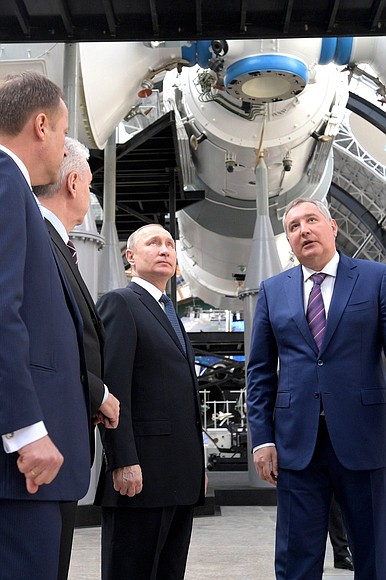 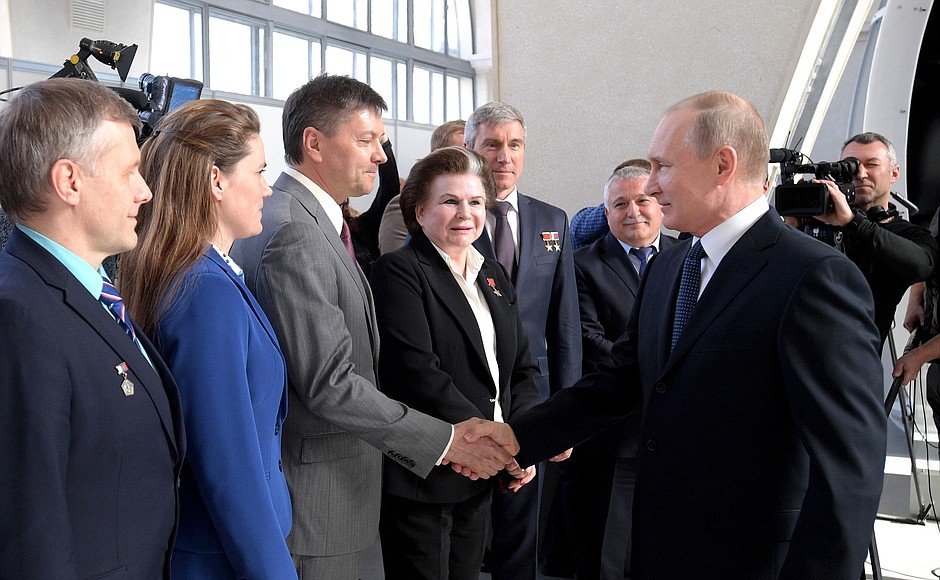 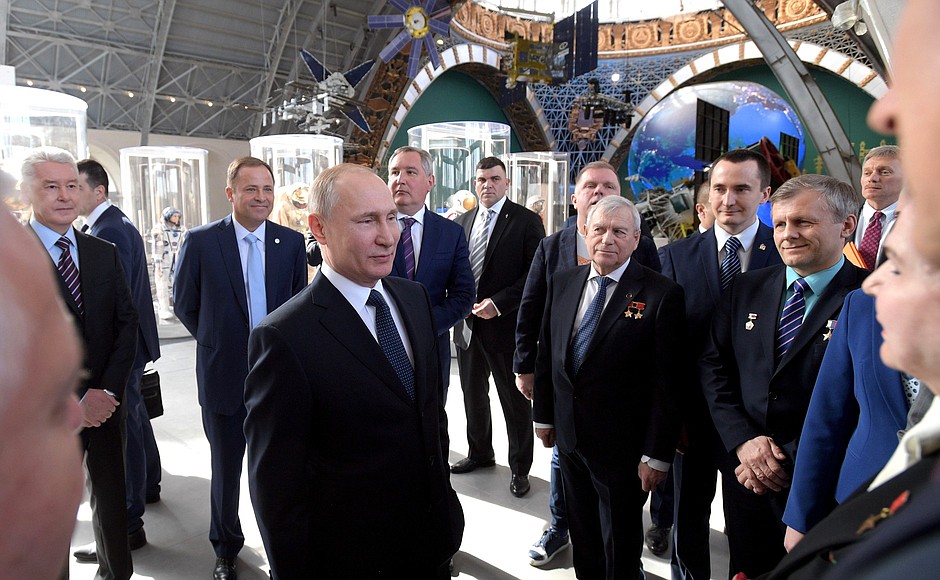 Accompanying the President during the tour of the Cosmos pavilion were Moscow Mayor Sergei Sobyanin, Deputy Prime Minister Dmitry Rogozin and Roscosmos head Igor Komarov. 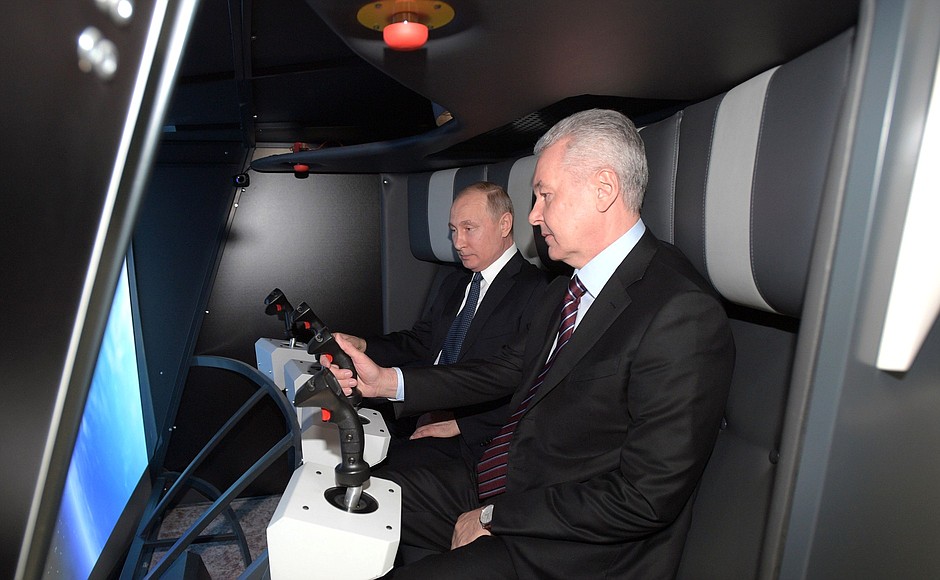 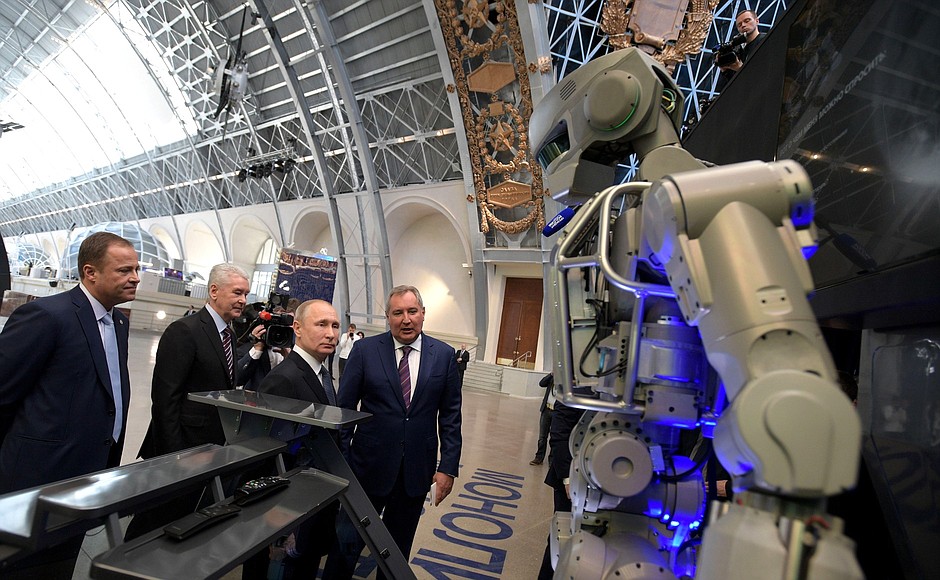 Vladimir Putin also talked to cosmonauts and veterans of the space industry and congratulated them on their professional day. The source of information - http://en.kremlin.ru/events/president/news/57245 Conversation with cosmonauts and space industry veterans During his visit to the renovated Cosmos pavilion at VDNKh Vladimir Putin met with cosmonauts and space industry veterans to congratulate them on their professional holiday. April 12, 2018 - 15:20 - Moscow President of Russia Vladimir Putin: Good afternoon. I would like to congratulate current and former space industry workers on Cosmonautics Day. I would like to tell space industry veterans that the Soviet Union benefited and Russia still benefits a great deal from the advances you achieved. Despite the challenging times we are all aware of, we are expanding operations in this sector, gradually and steadily. This is essential for the country’s defence capability, as well as economic development. You know this better than I do. We will keep improving communication, observation and other such things. You also know that a new space launch centre has been built in Russia. World’s first woman cosmonaut Valentina Tereshkova: Yes, we have been there. Vladimir Putin: An entire city will gradually grow around this facility. But this is not just about a new launch pad. I expect this initiative to bring about the emergence of a new high-technology cluster in Russia’s Far East. We will be proactive in our efforts to achieve this vision. Valentina Tereshkova: Mr President, first of all, on behalf of my colleagues, those who are here today and those who are absent, let me congratulate you on your re-election. Vladimir Putin: Thank you very much. Valentina Tereshkova: We are pleased that you will support space science development, and we are glad that with your help we will be developing the Moon exploration programme and the outer space exploration programme, including Mars exploration. Vladimir Putin: Of course. You may know that in February, if I am not mistaken, an executive order was signed on creating a super-heavy rocket, which will be designed for outer space – first in a near-moon orbit, and then to deliver cargo to the Moon to create an appropriate station there. Executive Director for Manned Space Programmes of the Federal Space Agency, veteran cosmonaut Sergei Krikalyov: And then for manned flights. Vladimir Putin: Then for manned flights; we need a manned transport spacecraft. So we will continue to explore both geostationary and lunar orbits. And a more remote perspective, but it will also be implemented, of course, is working on Mars programmes. There are two programmes. Hopefully, we will take part in them. Corresponding agreements have been signed with our partners. Thank God, this field of activity is not being influenced by problems in politics. Therefore, I hope that everything will develop, since it is in the interests of everyone, in the interests of all humankind. Valentina Tereshkova: They fly on our ships. Vladimir Putin: Yes, they do… Sergei Krikalyov: In fact, we fly together. We take risks together and help each other. Vladimir Putin: Yes. This is a sphere of activity that unites people. I hope it will continue to be this way. Valentina Tereshkova: We hope that this programme will bring not only new achievements, but also glory to our country. Thank you very much for your support. Vladimir Putin: Don’t mention it. Valentina Tereshkova: And we will do our best. Why are you so silent, everyone? Will we do our best? Test-cosmonaut of the Gagarin Research and Test Cosmonaut Training Centre Anna Kikina: Yes. Mr President, you said that we are going to fly to the Moon, didn’t you? Vladimir Putin: Yes. You know that this programme is designed until 2030, at least its first part. The Federatsiya spacecraft is now nearing completion, while work has begun on creating a super-heavy rocket for the Moon projects. So there are no doubts here, we will keep working at it and will keep carrying out this programme. Anna Kikina: That is great, thank you. Vladimir Putin: First the lunar orbit, circumnavigation, there are space stations to build for the lunar orbit. First, the space station, and then the modules on the Moon itself. In any case, this is how we plan to proceed. We will be able to do this, I have no doubt. Valentina Tereshkova: It is sad that the years go by so quickly. Vladimir Putin: Do you want to fly to the Moon? Valentina Tereshkova: No, Sergei Korolyov and I once agreed to go to Mars. Vladimir Putin: It will not be easy to go to Mars. Instructor-test-cosmonaut of the Gagarin Research and Test Cosmonaut Training Centre Fyodor Yurchikhin: There will be apple trees blooming on Mars (line from a popular Russian song). Vladimir Putin: Yes, exactly. Here, people used to grow apple trees for planting on Mars, sold apple tree seedlings, too. Sergei Krikalyov: By the way, have things changed here, in the pavilion? It actually looks the way it used to. Vladimir Putin: It looks better. Sergei Krikalyov: Better than before. Vladimir Putin: More advanced technologies are being used. Sergei Krikalyov: Speaking of future programmes: we will always need new staff, so this pavilion could become a great place to interest young people in this area. Vladimir Putin: Exactly. Sergei Krikalyov: Perhaps, we should start hosting annual conferences of some sort here? Vladimir Putin: There is a conference room seating 300 people, so I think it will be used, I am sure it will. See, there are people from tech-parks sitting there downstairs, working their magic. Valentina Tereshkova: We could make these conferences international events. Vladimir Putin: Of course. Why not? Valentina Tereshkova: And invite our colleagues from other countries, cosmonauts. Sergei Krikalyov: We already have annual cosmonaut meetings, perhaps we could organise similar meetings in a place like this. Vladimir Putin: And, speaking of the ExoMars programme, the next part of the programme – the documents with our partners have already been signed; no one is backing out yet. So we will implement it. Fyodor Yurchikhin: Today, Mr Rogozin suggested that we set the date, October 4th, to host the annual international symposium on manned spaceflight right here. Vladimir Putin: This can be done. Fyodor Yurchikhin: And again going back to the Moon. Mr President, will Russia continue to be an active participant in international projects, programmes and, in particular, the widely discussed international Deep Space Gateway? What do you think? Vladimir Putin: I just said, I can confirm this. We are not going to disrupt anything here, to pull out of these programmes. We intend to cooperate. Our partners in Moon and Mars exploration are the United States, Canada, Japan and the European Union. Sergei Krikalyov: In fact, everyone who is working at the ISS. We continue working with them, discussing how to move forward. Vladimir Putin: Those who have the technology and the desire to do this. We have both the technology and the desire, and our financial opportunities are increasing. So all these plans will be implemented. They are interesting for the country, and in general for all of humanity. This programme is very good, as I said, the first part is designed until 2030. Although the first tests of the super-heavy rocket are expected to be held in about 10 years, if we can accelerate it, we will. One more launch pad needs to be created at the Vostochny Space Launch Centre. Sergey Krikalyov: The launch-site complex. Vladimir Putin: The launch-site complex, launch pad. Valentina Tereshkova: Will it be launched from Vostochny? Vladimir Putin: From Vostochny, yes. And a launch pad needs to be built there. But we are already planning and, probably, we will get down to work soon. There is already a pad for a heavy rocket, and now we need a pad for a super-heavy rocket. It will be done simultaneously. When we discussed all these issues, we agreed that one project should be synchronised with the other, so that we can have the launch pads and rockets simultaneously. Otherwise it makes no sense. And a good city can be built there, the city of Tsiolkovsky; it is starting to grow. Valentina Tereshkova: The construction is already underway: we saw it and met with the builders. Vladimir Putin: Yes, foundations have been laid, it will be beautiful, and hopefully, it will be convenient and comfortable for people to live and work there. And it is very important that we do this in the Far East – we are creating an additional cluster there. We have always had an aviation cluster there, which is being re-created and strengthened, first, combat aircraft – Su jets; we are reviving the shipbuilding centre in the north, and now we are creating a completely new aerospace cluster. Valentina Tereshkova: Yes, development of the Far East is a great thing. Vladimir Putin: Yes, yes, of course. And I want training programmes to be adjusted for those areas of activity that will be relevant for the Far East – shipbuilding, aircraft building, cosmonautics and marine biology. I am referring to the training programmes at Far Eastern Federal University. In fact, all the directions and all the components of this programme are available; they have been worked out, and it is only necessary to increase our efforts for implementation. I am sure it will be so. Valentina Tereshkova: We were lucky. Vladimir Putin: I congratulate you once again. Remark: I wish all the best! Good health! Vladimir Putin: Goodbye. Greetings to you on your day! Remark: Greetings to you too! The source of information - http://en.kremlin.ru/events/president/news/57246
__________________
Where should they dig the Very Deep Pit? Piglet said that the best place would be somewhere where a Heffalump was, just before he fell into it, only about a foot farther on. (c) Alan Alexander Miln |
|
|
#813 |
|
Senior Member
|
Statement by President of Russia Vladimir Putin
April 14, 2018 - 10:35 On April 14, the United States, supported by its allies, launched an airstrike against military and civilian targets in the Syrian Arab Republic. An act of aggression against a sovereign state that is on the frontline in the fight against terrorism was committed without a mandate from the UN Security Council and in violation of the UN Charter and norms and principles of international law. Just as one year ago, when the Shayrat Airbase in Syria came under attack, the US used as a pretext a staged chemical attack against civilians, this time in Douma, a Damascus suburb. Having visited the site of the would-be chemical attack, Russian military experts did not find any traces of chlorine or any other toxic agent. Not a single local resident was able to confirm that a chemical attack had actually taken place. The Organisation for the Prohibition of Chemical Weapons dispatched its experts to Syria in order to investigate all the circumstances. However, in a sign of cynical disdain, a group of Western countries decided to take military action without waiting for the results of the investigation. Russia condemns in the strongest possible terms the attack against Syria, where Russian military personnel are assisting the legitimate government in its counterterrorism efforts. Through its actions, the US makes the already catastrophic humanitarian situation in Syria even worse and brings suffering to civilians. In fact, the US panders to the terrorists who have been tormenting the Syrian people for seven years, leading to a wave of refugees fleeing this country and the region. The current escalation around Syria is destructive for the entire system of international relations. History will set things right, and Washington already bears the heavy responsibility for the bloody outrage in Yugoslavia, Iraq and Libya. Russia will convene an emergency meeting of the UN Security Council to discuss the aggressive actions by the US and its allies. The source of information - http://en.kremlin.ru/events/president/news/57257
__________________
Where should they dig the Very Deep Pit? Piglet said that the best place would be somewhere where a Heffalump was, just before he fell into it, only about a foot farther on. (c) Alan Alexander Miln |
|
|
#814 |
|
Senior Member
|
Greetings to 12th International Judo Tournament for Police and Army
Vladimir Putin sent his greetings to participants, organisers and guests of the 12th International Judo Tournament for Police and Army. April 14, 2018 - 10:00 The message reads, in part: “Today, Moscow is once again proud to host a gathering of the best combat athletes from various countries, representing law enforcement agencies, the military and rescue services. This tournament is renowned for spectacular and tense encounters, and the masterly skill, character and willpower demonstrated by its contestants, all of which contributes to the popularity of this event. Holding large-scale and standout competitions of this kind helps judo reach a wider audience and raise awareness among young people, attracting them into the sport by its beauty, aesthetics and philosophy. It is essential that while strengthening the traditions of a brotherhood in arms and camaraderie, you also perpetuate the memory of heroism and courage demonstrated by your colleagues who lost their lives while on duty. You also support the families of those who fell. A noble deed of this kind deserves the deepest respect.” The source of information - http://en.kremlin.ru/events/president/news/57259 Telephone conversation with Turkish President Recep Tayyip Erdogan Vladimir Putin had a telephone conversation with Turkish President Recep Tayyip Erdogan. April 14, 2018 - 23:00 The presidents discussed the situation around Syria escalated by missile strikes carried out by the United States its allies on the territory of this country. The President of the Russian Federation stressed that the actions carried out by this group of Western countries are in severe violation of the UN Charter and fundamental standards and principles of international law. The Russian and Turkish sides proceed from the fact that, in light of recent events, cooperation aimed at the actual advancement of a political settlement in Syria must be ramped up. The source of information - http://en.kremlin.ru/events/president/news/57262 Greetings to participants of League of Arab States Summit Vladimir Putting sent his greetings to participants of a top-level pan-Arab meeting – the heads of state and government of the League of Arab States (LAS) member states. Saudi Arabia is hosting the LAS summit this year. April 15, 2018 - 11:00 The message from the President of the Russian Federation reads, in part: “Your meeting is being held against a background of a very complicated situation in the Middle East and North Africa. Armed conflicts in Syria, Iraq, Libya and Yemen continue to take away human lives and are accompanied by a severe deterioration of the social and economic environment. These challenges require coordinated collective efforts on the part of the international community and naturally increase the importance of such multi-lateral structures as the League of Arab States. Russia is ready to develop cooperation with the League of Arab States by all possible means to ensure regional safety. I expect that, in the conditions that have taken shape following the devastation of ISIS’s main forces in Syria and Iraq, we will be able to facilitate the activisation of a political settlement and post-conflict restoration in these countries, while solving vital humanitarian tasks. At the same time, the struggle against terrorist groups should be sustained, all the while showing unwavering respect to the sovereignty and territorial integrity of Arab states. We proceed from the fact that long-term normalisation of the situation in the Middle East is impossible without the fundamental resolution of the Palestinian issue. Russia’s position remains unaltered: all issues dealing with the status of Palestinian areas, including Jerusalem, must be settled within direct Palestinian-Israeli talks, which are to be based on the universally recognised foundation provided by international law, including the corresponding resolutions of the UN Security Council and General Assembly as well as the peaceful initiative approved by the League of Arab States. I am convinced that further extension of the partnership between Russia and the League of Arab States meets our common interests, and will be in line with the consolidation of peace and stability on our planet.” The source of information - http://en.kremlin.ru/events/president/news/57264 Telephone conversation with President of Iran Hassan Rouhani Vladimir Putin had a telephone conversation with President of the Islamic Republic of Iran Hassan Rouhani at the initiative of the Iranian side. April 15, 2018 - 16:40 The two leaders exchanged opinions on the situation following missile strikes carried out by the United States and their allies on Syrian territory. The presidents stated that this illegitimate action has seriously damaged the prospects for a political settlement in Syria. Vladimir Putin, in particular, emphasised that if such actions continue in violation of the UN Charter, this will inevitably lead to chaos in international relations. They also discussed the overall state of affairs in the Middle East, including the situation in Yemen. Both sides expressed their interest in the further development of Russian-Iranian multilateral cooperation and in the expansion of mutually beneficial links in trade and economic spheres. The source of information - http://en.kremlin.ru/events/president/news/57263 Telephone conversation with Chancellor of Germany Angela Merkel Vladimir Putin had a telephone conversation with Chancellor of the Federal Republic of Germany Angela Merkel. April 17, 2018 - 13:25 The two leaders had a detailed discussion of the aggravated situation in Syria and around it. The President of Russia pointed out once again that the actions taken by a group of Western countries that committed an act of aggression against the Syrian Arab Republic, were in flagrant violation of norms of international law, including the UN Charter, and greatly damaged efforts towards a peaceful settlement of the Syrian crisis. Also highlighted was the importance of conducting a careful and objective investigation by the OPCW mission, which is currently in Syria. Both sides expressed readiness to facilitate the resumption of political and diplomatic efforts regarding the Syrian problem, including at the Geneva and Astana venues, and also to carry on bilateral contacts on this matter. The two leaders also exchanged opinions on topics related to the implementation of the Nord Stream 2 pipeline project. The source of information - http://en.kremlin.ru/events/president/news/57270 Telephone conversation with President of Kazakhstan Nursultan Nazarbayev Vladimir Putin had a telephone conversation with President of the Republic of Kazakhstan Nursultan Nazarbayev. April 17, 2018 - 16:30 The leaders exchanged views on the developments around Syria, and condemned the recent missile strikes by the United States and its allies on Syria. They emphasized that these aggressive actions were carried out without the sanction of the UN Security Council and in direct violation of the UN Charter, and norms and principles of international law. The source of information - http://en.kremlin.ru/events/president/news/57272 Telephone conversation with Prime Minister of Armenia Serzh Sargsyan Vladimir Putin had a telephone conversation with Prime Minister of the Republic of Armenia Serzh Sargsyan at the initiative of the Russian side. April 17, 2018 - 21:00 Vladimir Putin warmly congratulated Serzh Sargsyan on his appointment as head of government of Armenia and wished him success in this high government position. Both officials emphasised the importance of further developing allied partnership and cooperation in all areas. Earlier, the Russian head of state sent Serzh Sargsyan a message of greetings on his accession as Prime Minister of the Republic of Armenia. The message reads, in part: “Your appointment to this responsible post reaffirms your high political authority and broad support for the reforms aimed at solving the socioeconomic challenges facing Armenia. I am certain that your activities as head of government will facilitate the further consolidation of friendly, allied relations between our countries and the continuation of mutually beneficial integration processes in Eurasia. I would like to reaffirm our interest in close cooperation on pressing international and regional issues.” The source of information - http://en.kremlin.ru/events/president/news/57274 Telephone conversation with Federal Chancellor of Austria Sebastian Kurz Vladimir Putin had a telephone conversation with Federal Chancellor of the Republic of Austria Sebastian Kurz. April 18, 2018 - 17:20 Mr Putin and Mr Kurz discussed the situation in Syria, which has been aggravated by the missile strikes conducted by the United States and its allies, underlining the primary importance of providing humanitarian aid to the Syrian population and expressing their readiness to facilitate the resumption of inter-Syrian negotiations under the auspices of the United Nations. Other topics of discussion included implementation of the agreements reached during the talks between Vladimir Putin and Sebastian Kurz on February 28 in Moscow, as well as preparations for the 50th anniversary of the start of natural gas deliveries from Russia to Austria. The source of information - http://en.kremlin.ru/events/president/news/57276 Greetings on the opening of the 4th Yalta International Economic Forum Vladimir Putin sent his greetings to the participants, organisers and guests of the 4th Yalta International Economic Forum. April 19, 2018 - 10:00 The message reads, in part: “Today, prominent politicians and representatives of business and expert communities and public organisations from many countries will meet in Yalta once again to discuss the comprehensive development of Crimea and other socioeconomic issues. The busy agenda of the forum has been composed so as to provide more information to investors about the huge potential of southern Russia and favourable conditions for investing in its economy. The forum participants will have an opportunity to launch direct dialogue with Russian businesses and the heads of federal, regional and local authorities, as well as to present practical proposals to improve the business climate and map out plans for strengthening cooperation. I hope that this year the forum will again stir the interest of our foreign partners and lead to the launch of new projects in high-tech industries, culture, the environment, tourism and construction.” The Yalta International Economic Forum is an annual international business event held in Crimea. This year the forum is being held from April 19 to 21 in Yalta. The source of information - http://en.kremlin.ru/events/president/news/57302 Message of greetings to Miguel Diaz-Canel Bermudez on his election as President of the Council of State of Cuba Vladimir Putin sent a message of greetings to Miguel Diaz-Canel Bermudez on being elected President of the Council of State of the Republic of Cuba. April 19, 2018 - 17:20 The Russian President expressed his confidence that under the leadership of Miguel Diaz-Canel Bermudez, Cuba would steadily move towards the goals proclaimed by the Cuban revolution and would reach new targets of socioeconomic development. Vladimir Putin emphasised that Russia highly values its relations with Cuba, which are based on the deep-rooted traditions of friendship and mutual respect, and reaffirmed the desire to maintain close cooperation to further strengthen Russian-Cuban strategic partnership and constructive cooperation in all areas. In addition, the Russian President sent a message to Raul Castro, thanking him for the long-term productive cooperation that has facilitated the steady development of Russian-Cuban relations. Vladimir Putin emphasized that Raul Castro enjoys high respect as a true friend of Russia and a wise and far-sighted politician who has done much for resolving the socioeconomic problems facing Cuba, protecting its sovereignty and consolidating its positions in the international arena. The Russian President expressed confidence that the activities of Raul Castro as the leader of the Communist Party of Cuba would continue facilitating the consolidation of strategic partnership between the two states. The source of information - http://en.kremlin.ru/events/president/news/57304 Greeting on the opening of the 40th Moscow International Film Festival Vladimir Putin sent greetings to participants and guests at the 40th Moscow International Film Festival. April 19, 2018 - 19:15 The message reads, in part: “The Moscow Festival is always a great, bright and truly festive event, attracting the attention of both professionals and film-lovers from many countries. This film festival is known for its remarkable history, rich palette of entries, and its friendly and hospitable atmosphere. Performing a high spiritual, educational and enlightening mission, the MIFF holds to its traditions and presents the audience with high-quality, deep cinema. And of course, I would like to note the festival’s important role in strengthening international humanitarian and human contact and its significant contribution to the popularisation of outstanding achievements in domestic and world cinematography. I am confident that the 40th Moscow Film Festival will be a success; it will please participants and guests with great premieres and leave positive and unforgettable impressions.” The 40th Moscow International Film Festival is being held on April 19–26, 2018. The source of information - http://en.kremlin.ru/events/president/news/57306 Telephone conversation with President of Uzbekistan Shavkat Mirziyoyev Vladimir Putin had a telephone conversation with President of Uzbekistan Shavkat Mirziyoyev at the initiative of the Uzbekistani side. April 20, 2018 - 12:40 The officials reaffirmed their mutual resolve to further promote strategic partnership and cooperation between Russia and Uzbekistan in all fields. They also stressed the importance of the launch of the Kandym Gas Processing Complex – one of the largest in Central Asia – that took place on April 19, 2018. This high-tech enterprise built with support of the Russian company LUKOIL will promote effective development of Uzbekistan’s oil and gas industry. The schedule of upcoming contacts at the top level was also discussed. The source of information - http://en.kremlin.ru/events/president/news/57309 Telephone conversation with First Secretary of the Central Committee of the Communist Party of Cuba Raul Castro and President of the State Council and Council of Ministers of Cuba Miguel Diaz-Canel Vladimir Putin had a telephone conversation with First Secretary of the Central Committee of the Communist Party of Cuba Raul Castro and President of the State Council and Council of Ministers of Cuba Miguel Diaz-Canel. April 20, 2018 - 20:30 When discussing the results of the April 18–19 session of the National Assembly of People's Power of the Republic of Cuba, Russia’s readiness to assist the Cuban leadership in carrying out its policy of socioeconomic modernisation of the country was confirmed. The President of Russia warmly congratulated Miguel Diaz-Canel on his election to Cuba's highest office and on his birthday. He wished him good health and success in his important work. Miguel Diaz-Canel emphasised his commitment to the policy of deepening multifaceted ties with Russia in all respects. The shared commitment to consistent implementation of bilateral projects, especially in the fields of energy and transport infrastructure, was underscored. Vladimir Putin also expressed his sincere gratitude to Raul Castro for many years of joint work and his great personal contribution to strengthening the strategic partnership between Russia and Cuba. The source of information - http://en.kremlin.ru/events/president/news/57312
__________________
Where should they dig the Very Deep Pit? Piglet said that the best place would be somewhere where a Heffalump was, just before he fell into it, only about a foot farther on. (c) Alan Alexander Miln |
|
|
#815 |
|
Senior Member
|
Working meeting with Moscow Mayor Sergei Sobyanin
The Moscow Mayor briefed the President on the socioeconomic situation in Moscow. In particular, the President discussed with the Moscow Mayor the development prospects for the city’s transport infrastructure, measures to support small and medium-size enterprises, research institutions and high-technology companies in Moscow. April 14, 2018 - 13:00 - The Kremlin, Moscow 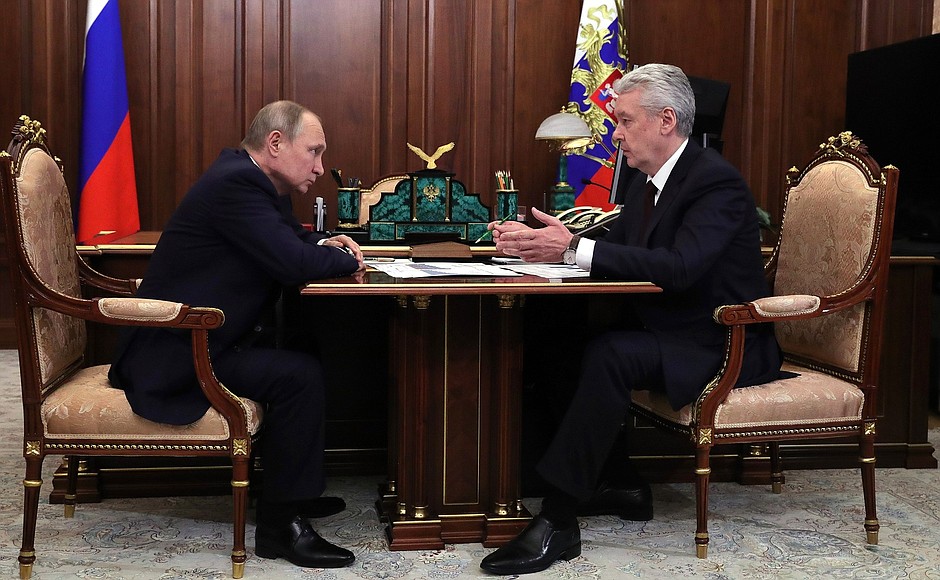 President of Russia Vladimir Putin: Mr Sobyanin, there is no need to state Moscow’s role and importance for the country, so instead of making lyrical pronouncements, I propose that we discuss the development of this metropolitan area and the challenges it faces in the process. Speaking about positive developments I can highlight the city’s financial standing. It is clear that it is attributable not only to the fact that so many people are registered in the capital, but also to the way the city is managed. The size of the available funds is not as important as the way they are used. Overall, your team has been highly professional in its activities. Moscow has very high indicators in terms of population prosperity and boasts the lowest unemployment rate in the country, which is also noteworthy. Fixed capital investment is above the national average. These are all positive developments. That said, there are also recurring challenges that you know all too well, including traffic congestion and the need to better regulate migration flows. There are also other issues that we have discussed on numerous occasions. You have also undertaken a number of major projects, including the development of the transport system. The effort to expand the metro is underway and a new station has opened recently. There is the central circle line, a new rail line with new trains that we launched together, helping ease congestion in the city. There are also many other projects underway. Let us discuss all this. 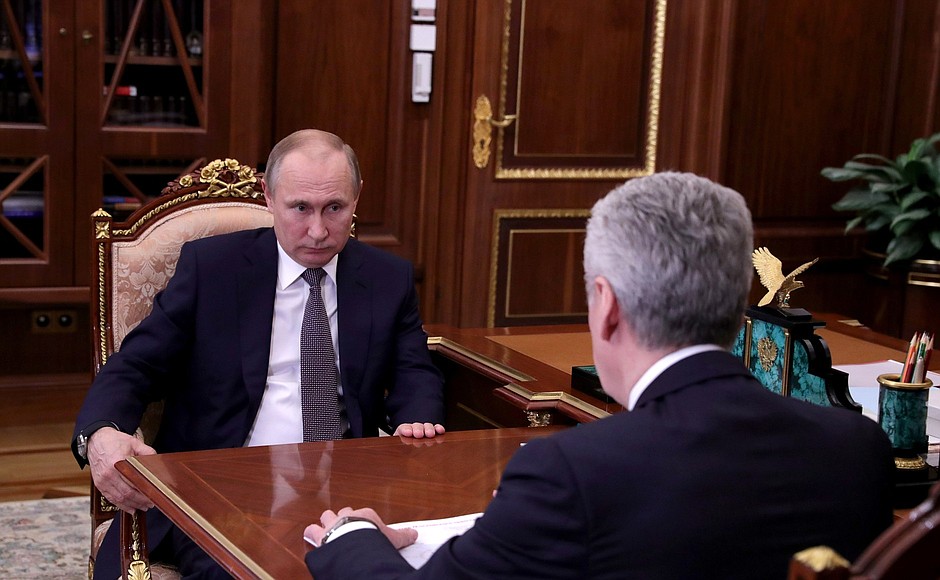 Moscow Mayor Sergei Sobyanin: Mr President, as we have discussed earlier, Moscow is gradually recovering from the economic crisis and steadily developing its economy. In the past year, all indicators without exception showed positive momentum, including investment, trade, wages and industrial output. As you said, we invest substantial resources in infrastructure development in order to resolve one of the major challenges the city is facing, which is to enhance its connectivity and develop transport communications. You attended the launch ceremony of the Moscow Central Circle, which operates as an above-ground metro line. We have now launched the construction of a major underground circle line. Its first segment, from the Moscow International Business Centre to Dinamo, was launched in 2018, and from now on new segments are expected to be put into operation every year. Almost all sections of this circular line are now under construction, be it drilling by tunnelling machines, construction of metro stations or design work. That is to say that we are working on all sections of the new line, which will enable us to complete it within four or five years at the most. As a result, we will have two new circular lines that will serve as the foundation of the city’s core transport infrastructure. As the city invests in the development of roads, commuter rail and metro, we are receiving feedback from investors. If you look at this chart, the numbers highlighted in red represent government investment in transport and social infrastructure: schools, hospitals and housing. At the same time, we are getting a lot of private investment. Since 2010, fixed capital investment increased by 176 percent in comparable prices, or from 700 billion to 2 trillion. This investment is channelled into various sectors, including manufacturing, research, innovation, automobile construction, etc. The funds are distributed evenly among various sectors without any of them getting a significant edge over the other in terms of investment. This is supported by the recent growth data. In the main sectors of the city’s economy, growth rates range from 113 and 162 percent. This applies to the processing industries, the production of trade and office furniture, various other segments, and rail transport. Along with stepping up manufacturing, we can say that indeed we are filling the niche that was freed from imports, but apart from saturating the domestic market this sector has begun to actively work for exports. The export trend – non-resource exports, mostly the processing industries, science and information technologies – has gone up by 31 percent. This is generally an impressive trend. This has been contributed to, as you rightly said, the progress of small and medium-sized businesses that we spoke about at the last State Council meeting. It brings both extra revenues to the budget and boosts the innovative economy. As you remember, in 2013 you set significant tasks in developing and supporting small and medium-size business. Look at the dynamics of public tenders with the participation of small and medium-size businesses. We set out with four percent. Small and medium-size businesses had a four percent share in the state procurement orders, and it hardly changed through 2013. Then there was a leap, and you see the figures we have reached: practically a third of the state procurement order goes to small and medium-sized businesses. They definitely create a new economy, export flows and so on, and it is a considerable addition to the budget. It is not only the share of small and medium-sized businesses in the state procurement order that is growing – but also the number of companies has gone up by 22 percent in three years. And we can see that this is not just a “dead,” formal number. The volume of lending testifies to the fact that this business is on the upswing, it is attracting investments for its development and, correspondingly, contributes to the city’s growth. In 2017 alone, it contributed 26 percent of budget revenues. You keep saying that small business growth should accompany the region’s economic development. Here is a vivid example of what creates extra growth. The figures are very substantial for Moscow. Tourism has also begun to actively develop alongside with small and medium-sized businesses. Despite all the sanctions, restrictions and overall a tough and at times biased attitude towards our country, we nevertheless see that even foreign tourism grew by 40 percent in the past years whereas domestic tourism went up by 80 percent. In 2010, we welcomed 12.8 million tourists in the city while last year there were 21 million of them. The economy has grown respectively: receivables grew from 200 to 700 billion rubles. This is a huge sector of the economy: hotels, services, retail, and so on and so forth, and a good contribution to the budget. That is, the funds we once allocated to the city’s infrastructure, improvement, parks and streets, now keep returning directly to the budget owing to the turnover, increased number of tourists, their purchasing power and so on. Mr President, small and medium-sized business gave a large boost also to the growth of the innovative economy. During that period, 33 techno parks were set up in the city where thousands of small and medium-sized enterprises operate. Thirty-nine industrial complexes have been registered which also have innovative development as their basis. We started looking into where innovative business is located in Moscow and which enterprises represent it. It is generally believed that we only have one large techno park, several small techno parks, and some institutes, thus it is not easy to see the complete innovative picture of Moscow. When we summed up all that information beginning with techno parks, high-tech IT companies, business incubators, institutes and academic institutions, it transpired the all of Moscow, the whole map of Moscow is dotted with innovative infrastructure facilities. 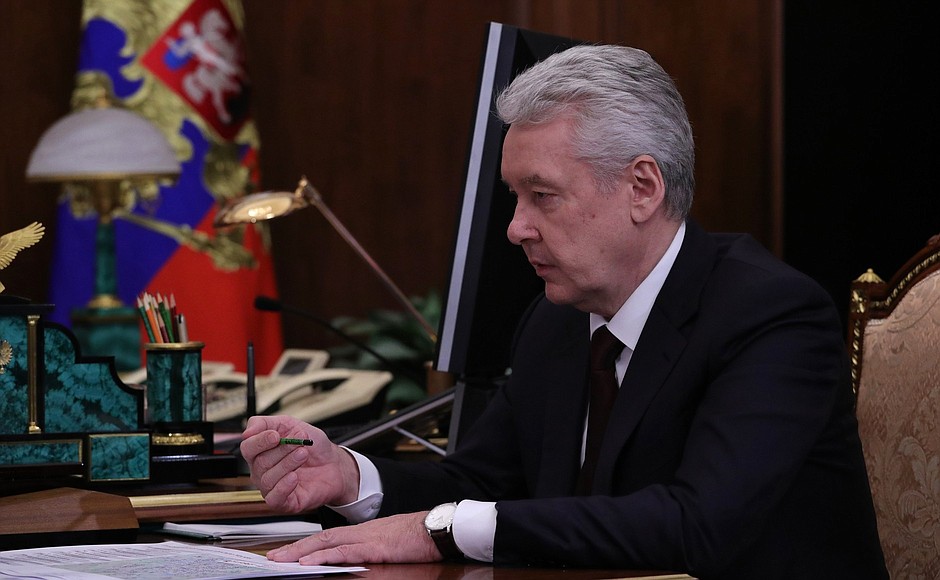 Vladimir Putin: Does it include children’s techno parks? Sergei Sobyanin: Yes, it does. But there is a problem: as of today, they operate separately. There is federal property, there is regional property, private property, there are academic institutions, industrial, manufacturing and sectoral institutes and so on. Many of them have never even heard of each other. There emerged an idea (we discussed it with the Ministry of Industry) to set up a research industrial cluster in Moscow. This would be done in such a way that it would become a single integrator of all that infrastructure, help them find each other, create a unified information system for us to understand what help they need, what kind of support in order to create a synergy of this tremendous potential. It is one of the biggest clusters in the world in terms of its power, potential, the number of projects and designs, and the number of researchers involved. This is why we would like to ask you to draft an executive order to set up such a research industrial cluster so as to unite all those separate entities to create synergy for the development of Moscow’s research and industrial potential. Vladimir Putin: It should be thoroughly thought out so that the implementation of the suggested idea – which is definitely very interesting – would not interfere with anybody in any way, would not tie hands but rather help all the participants in this wonderful process. Sergei Sobyanin: This is the key plan – to help them develop and make them recognisable, to set up a venue where they could present themselves to attract investments and cooperate with each other. The source of information - http://en.kremlin.ru/events/president/news/57258 Meeting with Human Rights Commissioner Tatiana Moskalkova Tatiana Moskalkova presented to the President the annual report on the situation concerning human rights. April 16, 2018 - 15:15 - Novo-Ogaryovo, Moscow Region 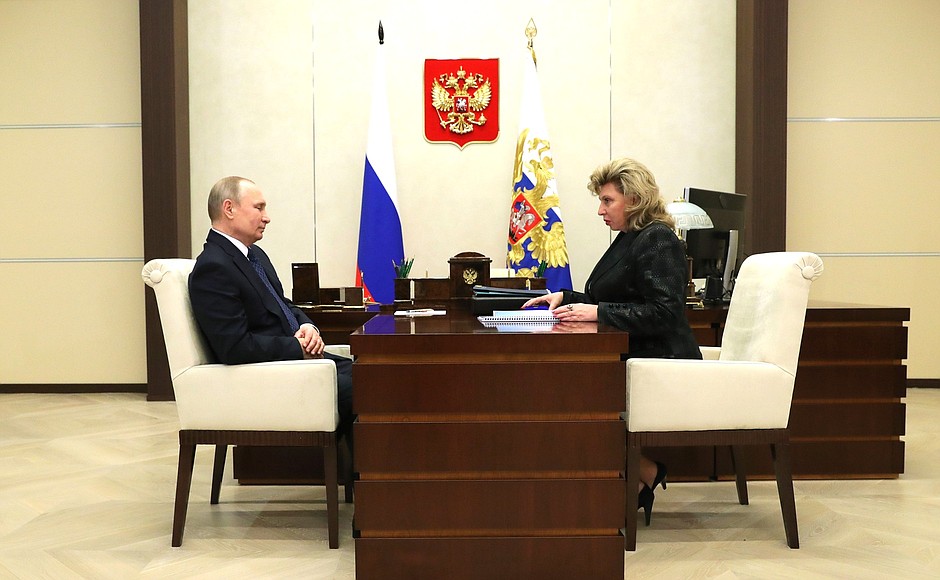 President of Russia Vladimir Putin: Ms Moskalkova, you are here to present the annual report. Human Rights Commissioner Tatiana Moskalkova: You are absolutely right. But first, I would like to congratulate you on your re-election as the President of Russia. Speaking for myself and also on behalf of human rights commissioners from all the Russian regions, as well as our expert community, I would like to wish you strength of spirit and also, since you are the guarantor of the Constitution and human rights, the fortitude to strengthen democracy, justice and law. And lastly, we wish you to have a good team by your side, personal happiness and reliable support at home. Vladimir Putin: Thank you, Ms Moskalkova. Tatiana Moskalkova: Mr President, I would like to present the report of the Human Rights Commissioner for 2017. It is now much bigger and weightier than before. We have added new chapters on human rights in individual groups, an in-depth analysis of the human rights situation and the protection of these rights, with concrete examples, conclusions as well as recommendations, including for the Government, the supreme judicial authorities and our governors. I hope this report will help you to deal with both economic and political matters. We have revealed an interesting regularity. We have conducted our first serious analysis of the number of human rights appeals in the regions. We have compiled an index and found that it directly depend on social tension and emergencies that result in large-scale and numerous violations of human rights. I am presenting you with a symbolic memory card with our report together with 7,000 pages of material that contains detailed information for all the Russian regions. Why did I say that it is a symbolic memory card? Because the interactive human rights card has become available to everyone on the website of the Human Rights Commissioner this year, and it is extremely popular. It is a platform for exchanging experience and for creating new technology. Vladimir Putin: I see that the structure of complaints remains the same. Most of them concern criminal and procedural law; housing legislation comes second and the criminal and penal law takes third position. These are three matters that concern people the most. The last one is labour legislation. 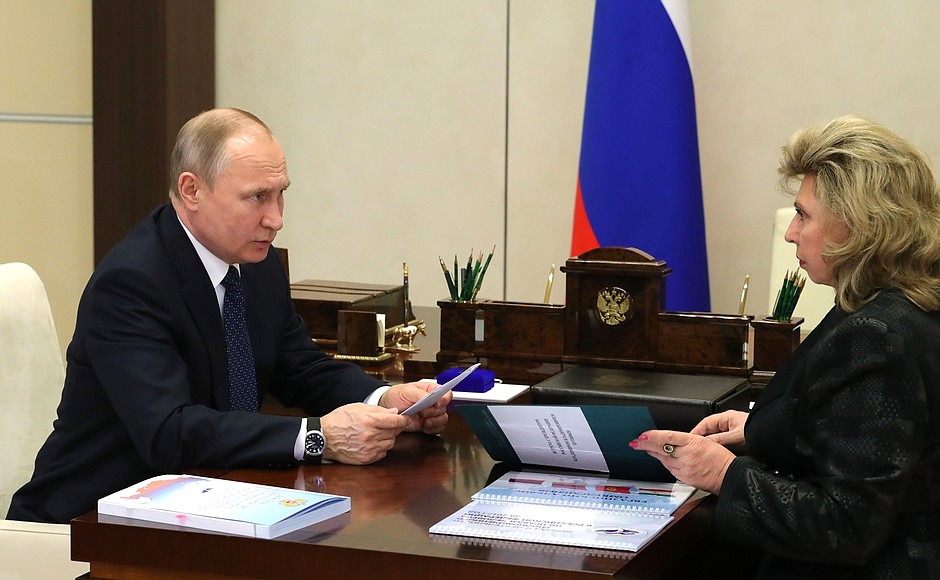 Tatyana Moskalkova: Yes, this is correct. If we combine labour, education and healthcare, then social matters dominate the picture, just as it was last year. But I must say that the situation has improved somewhat when it comes to public opinion. This can be seen in addresses to the Human Rights Commissioner, and in surveys conducted by the Public Opinion Fund. We can see that the people’s attitude towards human rights has stabilised, it is more positive now and it has even improved. Last time I raised a series of pressing questions related to foreign currency mortgage borrowers, labour relations, the difficulties in the registration of former Ukrainian military personnel in Crimea, and Baikonur. I would like to say that pursuant to your instructions all of these matters have been resolved. A large interdepartmental group was established, I am a member of it together with the employees of the Government Staff. Thanks to our efforts, 1,300 people who faced eviction did not lose their flats. We considered every case individually, took into account whether it was the only roof over their head, if they were in a difficult situation and if they required the help of the state. At your initiative, a fund was established and it operated well. Not everybody was satisfied with the solution of their problems, but 1,300 people would like to thank you for such an approach to their human rights problems. Your executive order regarding Crimea, where the registration of former Ukrainian military personnel had been impossible, has solved the problem. All military personnel now can be registered with military commissariats and they are again included on the waiting list for housing. This is a very positive result. As for Baikonur and the other many issues, there are positive developments, as well. But, unfortunately, we did not succeed in solving all the problems. As you said, the matter of social protection, especially delays in salary payment to personnel, are dominating. Today, every tenth complaint regarding labour relations is a complaint filed by a work-group. We managed to almost double the efficiency of our work, launch instruments and reinstate the rights of citizens who did not receive pay, in particular, at the Baikonur Space Centre. With your participation and that of the Defence Ministry and local commissioners, we helped over 4,000 people who had not received any wages because the companies they worked for went bankrupt. I have prepared an address for you. After analysing the issue of non-compliance with labour obligations to personnel, we came to the conclusion that it often happens that company owners bear no responsibility for their workers while having good real estate and significant funds. Vladimir Putin: We are witnessing the same in the area of finance: bank owners bear no responsibility in the case of a bad scenario and the bankruptcy of their banks. We have to analyse very carefully this practice and find ways to correct it, so that all members of the process would be responsible and strive to meet their obligations to their clients and employees. It is a very serious, large matter we need to keep working on. The source of information - http://en.kremlin.ru/events/president/news/57265 Meeting on economic issues Vladimir Putin chaired a meeting on economic issues, which was attended by Presidential Aide Andrei Belousov, Finance Minister Anton Siluanov, Economic Development Minister Maxim Oreshkin as well as Central Bank Governor Elvira Nabiullina. April 17, 2018 - 13:55 - Novo-Ogaryovo, Moscow Region 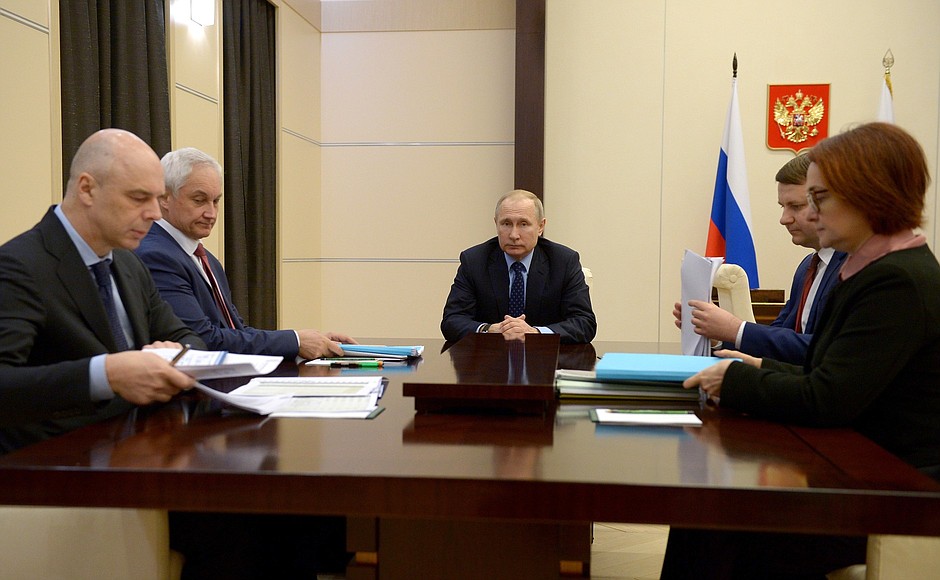 President of Russia Vladimir Putin: Good afternoon, colleagues. 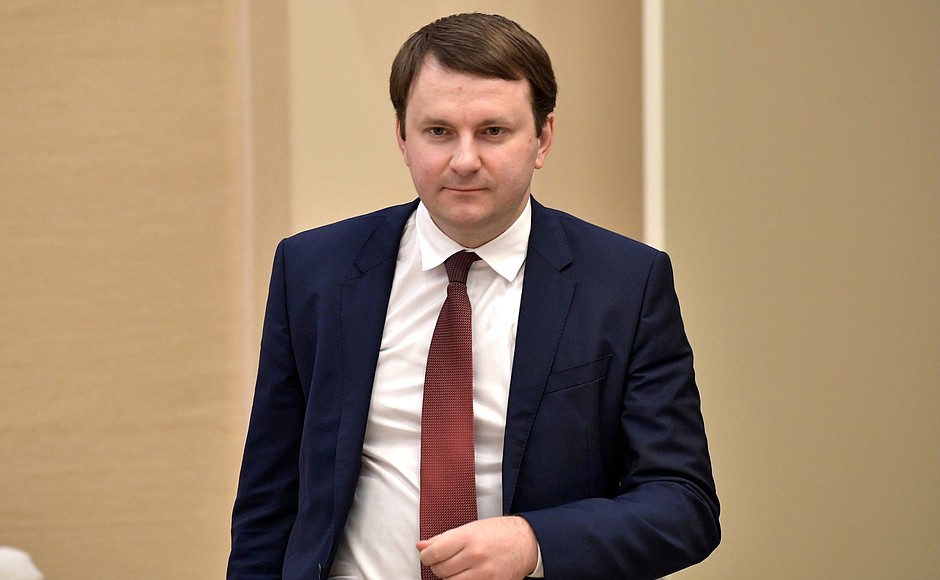 As per our tradition and practice, today we will be talking about the economic situation, short- and medium-term development prospects and measures to boost the country’s economic development with due regard for the current factors in the country and beyond it, as well as the situation on the domestic and international markets. 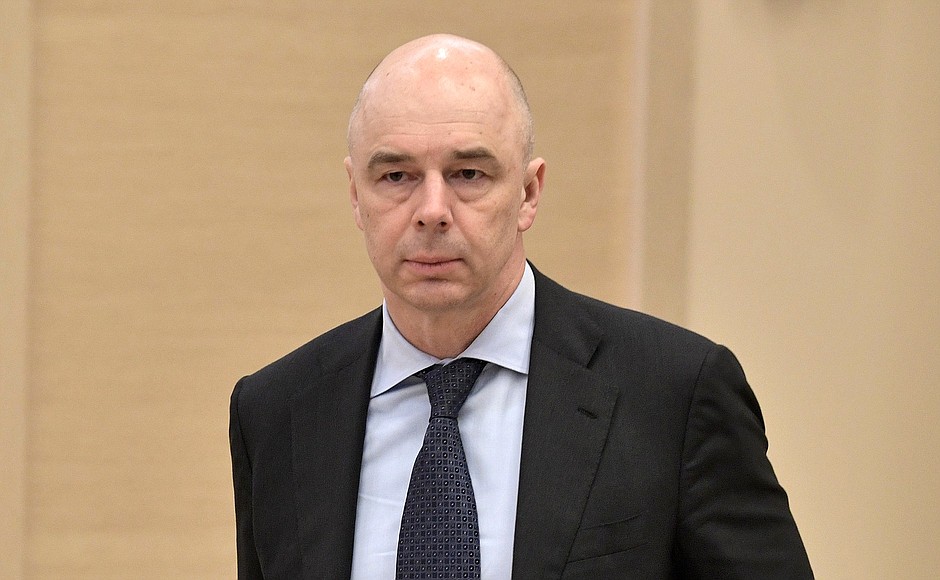 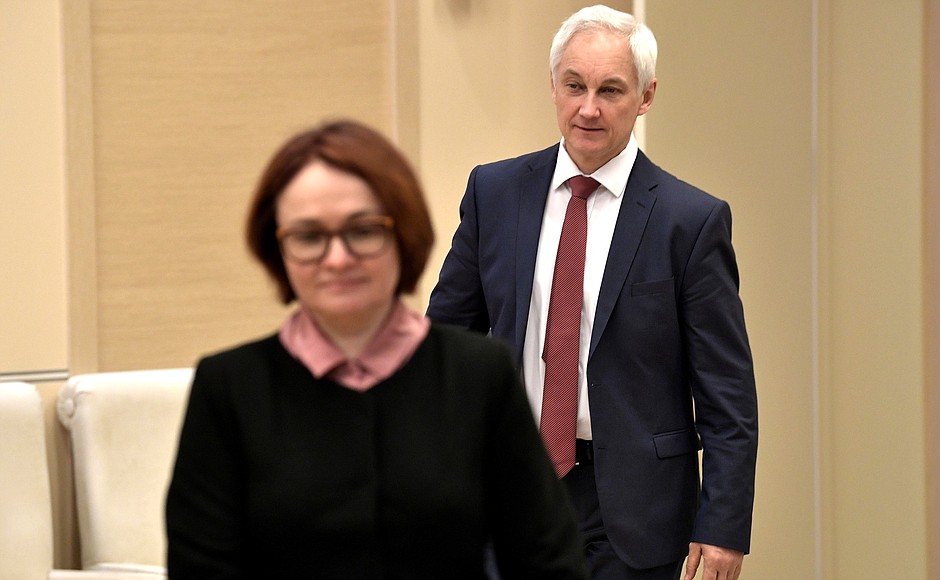 I would like to hear reports by the Central Bank Governor [Elvira Nabiullina], the Finance Minister [Anton Siluanov] and the Economic Development Minister [Maxim Oreshkin], and I also expect comments from our colleagues from the Presidential Executive Office. 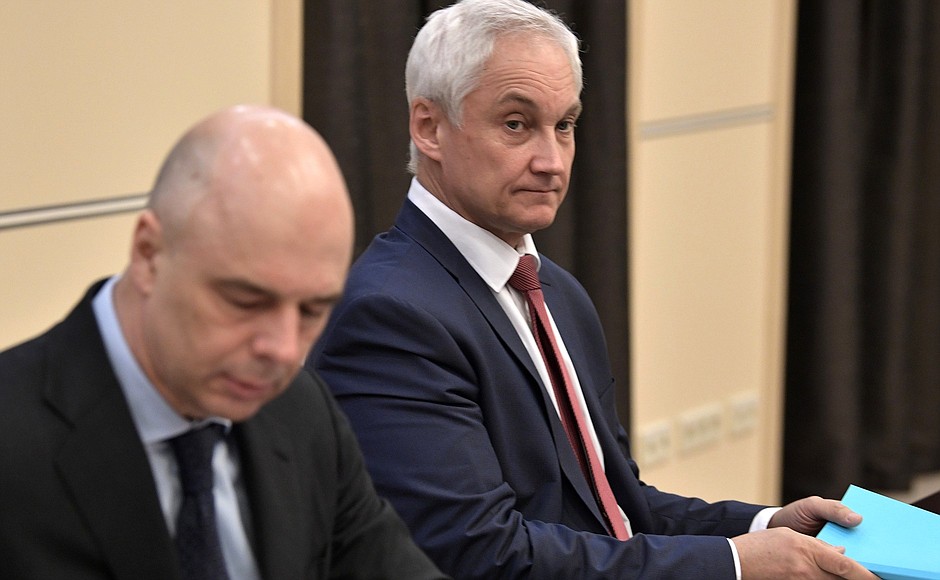 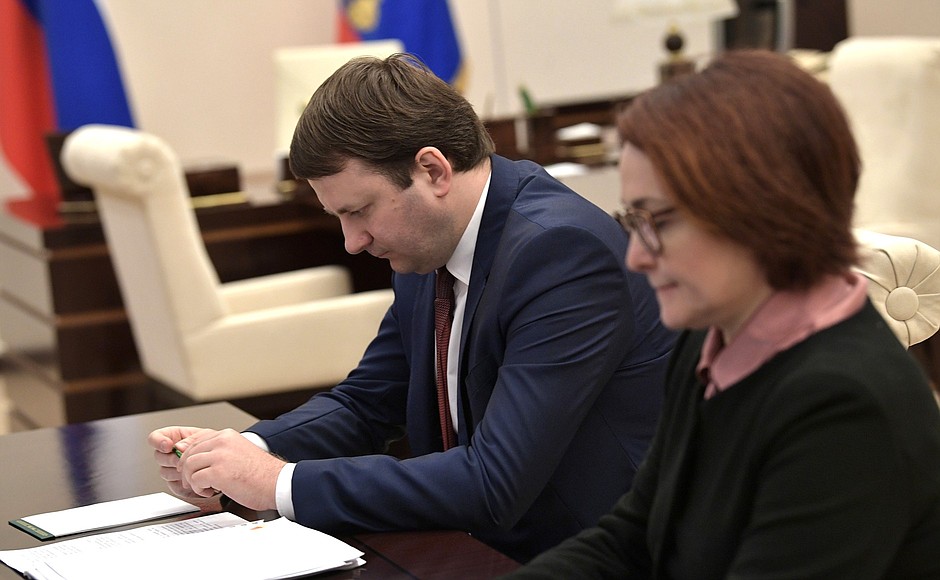 We will discuss all these topics in detail, as well as our steps to promote the economic development of the country. 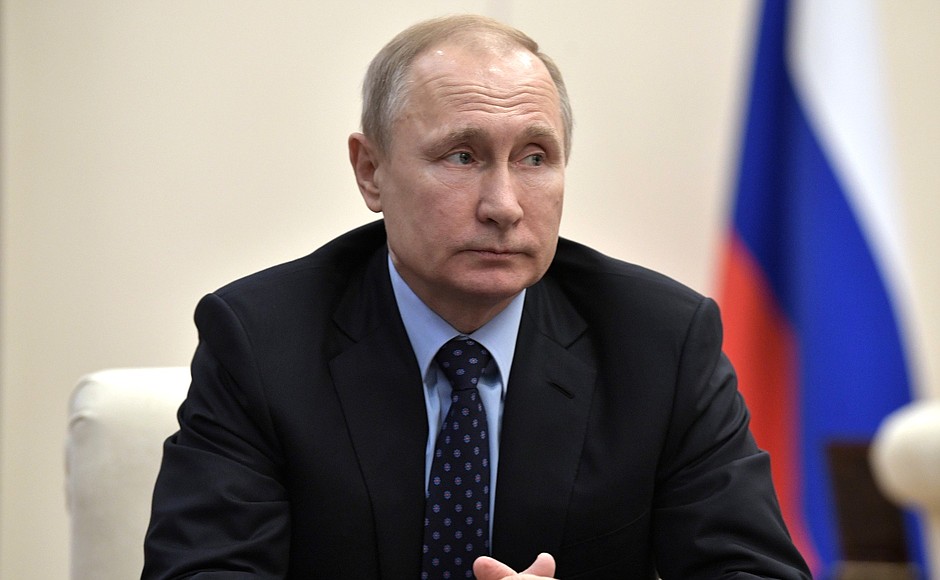 Let’s get down to work. The source of information - http://en.kremlin.ru/events/president/news/57269 Meeting with Government members The President held a regular meeting with Government members. The meeting participants discussed measures to promote the use of natural gas as motor fuel. April 18, 2018 - 15:30 - Novo-Ogaryovo, Moscow Region The President also heard a report by Emergencies Minister Vladimir Puchkov about the measures against flooding and the preparations for the wildfire season, as well as reports by Natural Resources and Environment Minister Sergei Donskoy and Industry and Trade Minister Denis Manturov about the measures to reduce the negative impact on the environment and industrial modernisation. Deputy Prime Minister Olga Golodets delivered a report on the recent efforts to support mothers and children that have been implemented since January 1. 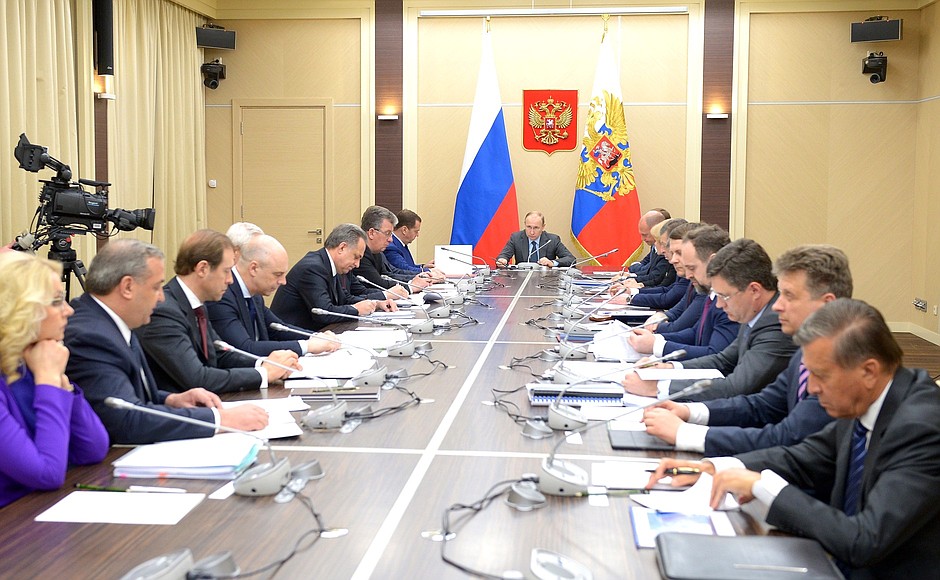 President of Russia Vladimir Putin: Good afternoon, colleagues, Today we will be discussing the expanded use of gas as motor fuel. This is why we have Mr Zubkov with us [Viktor Zubkov, Chairman of the Board of Directors at Gazprom and Special Presidential Representative for Cooperation with the Gas Exporting Countries Forum]. He will tell us what Gazprom is doing and what we intend to do in this sphere in general. I have said this before, but I will repeat that we must clearly pay more attention to environmental issues, considering global trends, in particular in automobile manufacturing, such as the growing use of electric cars. However, the use of gas as motor fuel appears to be preferable in Russia, including for environmental reasons, because you need to produce electricity before you can use it. A considerable part of electricity is produced at coal-fired plants. It is a major element which few people take into account. Before we get down to the main issue on our agenda, I would like to ask [Emergencies Minister Vladimir] Puchkov to tell us about the spring flooding relief efforts and preparations for the forest wildfire season, which has actually begun. Go ahead, please. 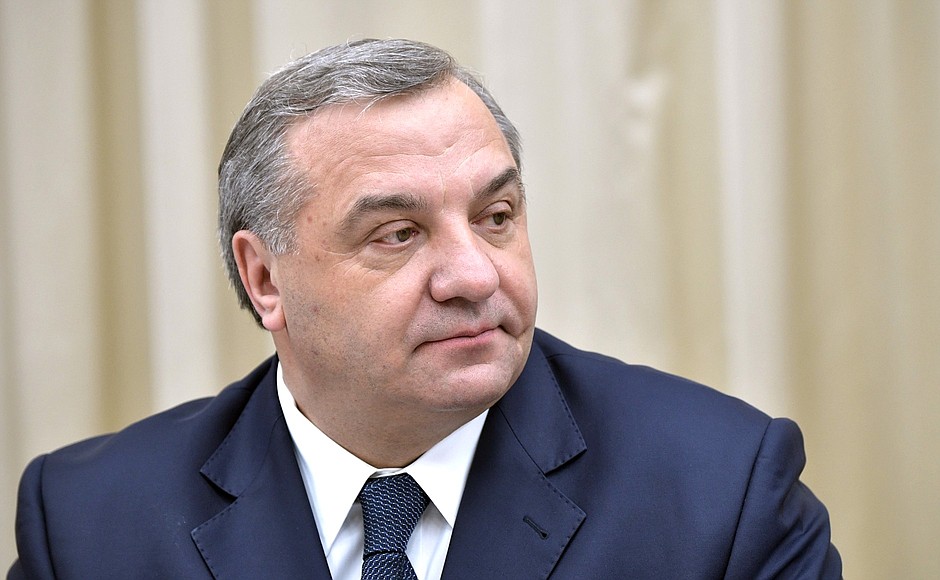 Minister of Civil Defence, Emergencies and Disaster Relief Vladimir Puchkov: Mr President, colleagues, Acting to implement the decisions of the February 15, 2018 meeting of the Security Council, the Emergencies Ministry together with federal and regional agencies is taking the necessary measures to protect populated areas and social infrastructure from spring floods and wildfires. Spring floods are the key priority. First, we placed the emergencies monitoring and forecasting system on high alert. We have additionally deployed 3,000 stream flow measuring stations throughout the country, prepared temporary placement sites for the public and taken other social, medical and food support measures, especially in remote areas that have been cut off by floods. We are discharging water from reservoirs ahead of the spring floods, reinforcing dams, preparing water intake facilities and checking ponds, as well as taking a number of other measures. We are paying special attention to the anthrax burial sites, tailing dumps and biothermic pits that can be flooded. We have deployed an emergency control system and a large group of flood prevention forces under the Unified State System of Emergency Prevention and Elimination. These forces comprise over 720,000 people, 147,000 vehicles (including aircraft) and 13,600 water crafts. We also have on hand 13,500 airborne rescuers and over 150 mobile groups of demolition personnel with experience of working in emergency conditions, as well as water reserves and other basic necessities. Second, spring flooding has entered an active phase in southern Siberia, the Volga region and central Russia. Over 400 populated areas with over 5,000 buildings, private households, bridges and social facilities have been flooded, affecting over 18,000 people. Water is receding in southern Siberia and central Russia, but floods are rising in northwest Russia and the northern regions of the Urals and Siberia. We have put these regions on high alert for emergencies and taken additional measures to help people in the flooded areas. This has allowed us to stabilise the situation in the Republic of Altai, the Volgograd, Voronezh and several other regions. Emergencies Ministry rescue workers and local administrations are providing targeted aid to the people in the flooded areas. After the water subsides, they will systematically restore the roads, power lines, and the other communications. They are distributing targeted aid to residences, primarily large families and people living alone. They are also monitoring the distribution of pensions and the provision of the necessary social services. The most complicated situation is in the Volgograd Region, but the well-coordinated efforts of the federal centre, the emergency services and commissions in the Volgograd Region and the work of the local authorities made it possible to quickly take the necessary measures. These efforts have been organised in the Voronezh, Lipetsk, Penza, Ivanovo and Nizhny Novgorod regions, to name a few. Temporary crossings have been set up and material and human resources are being transferred to the flooded areas, depending on the forecast. There were problems in some farmsteads and other populated areas. This year we streamlined the procedures for directly addressing the Emergencies Ministry and regional governors for the first time, which allowed us to promptly take the necessary prevention measures. Additional measures were taken in anticipation of the northward movement of the flood: explosives were used to clear 170 jam-prone sections of the rivers, and over 300 km of ice on the rivers were cut up. Some sections of ice were blackened and a number of other measures were taken to weaken the ice sheet and monitor the engineering protection system. Any bottlenecks are promptly removed. The fourth important task is to ensure the safe operation of 375 ice crossings and winter trails. In cooperation with the regions, and with consideration for the weather forecast, we adjusted the schedule for removing the ice crossings and winter trails while observing safety measures. Many rescue operations were carried out already this year. In all, we evacuated 387 fishermen from ice floes in April in the Sea of Okhotsk, the Far East, Lake Ladoga, the Gulf of Finland, and the Volga River, to name a few. In general, the Unified State System of Emergency Prevention and Elimination has been working well. Personnel have been deployed and infrastructure is on standby as we monitor the development of the flooding and the weather forecast, to minimise the damage. Second, the protection of populated areas and social infrastructure from wildfires. Comrade President of the Russian Federation, we have put out over 700 wildfire sources in the Far East and Siberia. The situation is currently complicated in the Amur Region, the Khabarovsk Territory, Trans-Baikal Territory and several other regions in Siberia and the Far East. Emergency situation regime has been declared in the forested areas of the Amur Region and 10 other Russian regions, and 253 municipalities have introduced fire prevention plans. We are also taking a number of other measures. Second, we maintain around-the-clock space and ground fire monitoring as one of our crisis management measures. We are using the International Charter on Space and Major Disasters for this. As a result, we promptly receive comprehensive information from both Russian and international satellites. A strong group of over 1.2 million firefighting rescuers with the necessary equipment, gear and tools have been deployed and are working to fulfil their tasks. Comrade President of the Russian Federation, acting in compliance with your instructions, we have reviewed the readiness of the federal aviation group, the aircraft of the Emergencies Ministry, the Defence Ministry and the National Guard Service. On April 25, we held an exercise on the interoperability of these federal services and the relevant ground forces that are in charge of preventing and taking emergency measures to put out fires. The local governments are working on this as well. Our third priority is the monitoring of the 8,000 populated areas and over 3,000 farming associations located in forested areas. We have taken measures to inspect the local governments’ emergency fire preparedness. These inspections revealed over 2,500 violations. We are monitoring the efforts to correct these violations. The majority of them are being corrected. This is being done very quickly based on complaints from local residents and heads of municipalities. The Emergencies Ministry, in cooperation with federal agencies, is holding events on fire safety and natural and man-made disaster relief in the 2018 FIFA World Cup host cities. The measures also include the prevention of man-made and wildfires in the entire European part of Russia, from Sochi to Kaliningrad and Yekaterinburg. Comrade President of the Russian Federation, the set of additional measures to protect the population and social infrastructure from flooding and wildfires allows us to reduce losses in a difficult situation and help boost the efforts of the relevant agencies with regard to this situation. The management and forces of the Unified State System of Emergency Prevention and Elimination continue to fulfil their tasks. Our priority is to provide assistance to the victims and implement the range of other measures. This concludes my report. 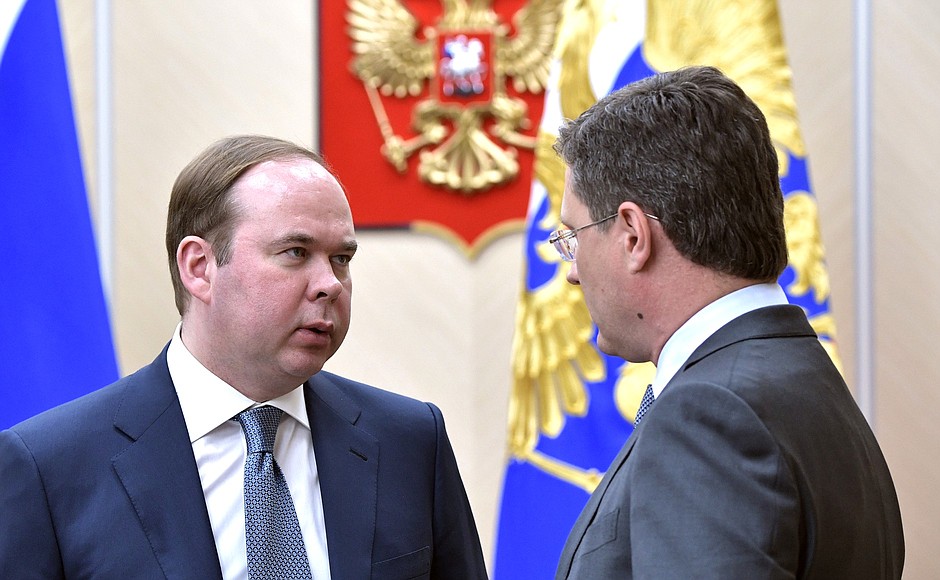 Vladimir Putin: Regarding assistance for flood victims, your agency is not the only one that organises this work, but you are working actively at this, too. In your opinion, how is it going as far as providing help to the victims is concerned? How does your agency see it? Vladimir Puchkov: Comrade President of the Russian Federation, as for EMERCOM, we held additional inspections on the preparedness of the local governments in the Russian regions: they are actively helping people. I met with some flood victims in the Voronezh and Volgograd regions. In general, they have a positive attitude and appreciate what the local government is doing for them. There were, of course, some problem areas, but the targeted and meticulous work, especially at the local level, will allow us to take the necessary measures quickly. We will increase the potential of this work, Mr President. Vladimir Putin: Mr Medvedev, I ask the Government tokeep this under control. Prime Minister Dmitry Medvedev: Yes, Mr President, certainly. 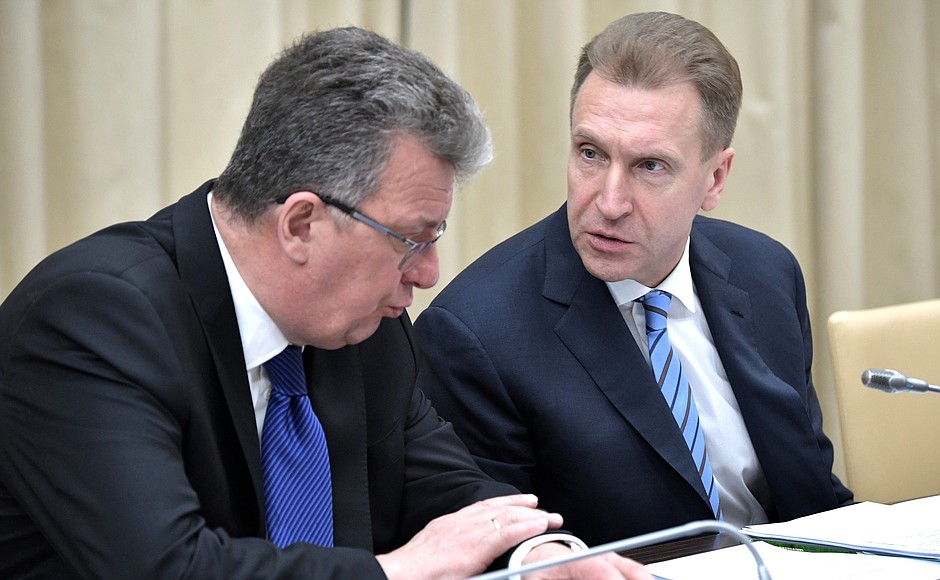 Vladimir Putin: There is one more issue that I would like to discuss today. It is directly linked with environmental problems. As you know, in the last few months we have been deciding what should be done on compliance with environmental regulations and how. We also know well that this is a particularly urgent issue in a number of cities, such as Bratsk, Krasnoyarsk, Lipetsk, Magnitogorsk, Mednogorsk, Nizhny Tagil, Novokuznetsk, Norilsk, Omsk, Chelyabinsk, Cherepovets and Chita. The largest emissions into the atmosphere have been recorded there. I also asked you to pay attention to the enterprises that dump untreated sewage into the Volga River and Lake Baikal. We agreed to launch a new programme in 2019 introducing a new system of environmental regulation. It is necessary to compile a list of 300 enterprises. All others will be added to it later on. I would like to ask Mr Donskoy about this work. 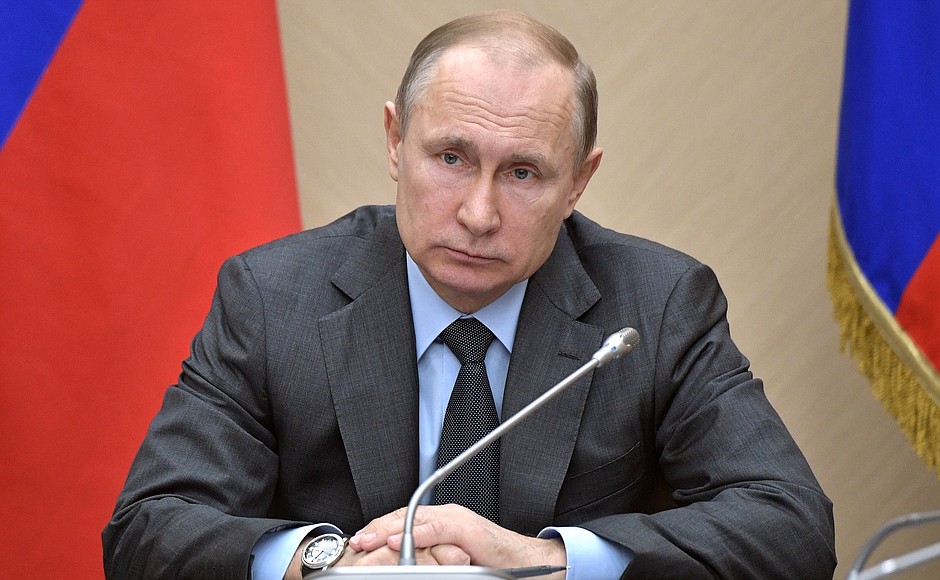 Minister of Natural Resources and Environment Sergei Donskoy: Thank you. Mr President, In your Address to the Federal Assembly you spoke about the need to ensure high environmental standards of living for our people, primarily in large industrial centres. As you have already said, we launched environmental reforms on industry with the adoption of the law on best available technology (BAT) in 2014. As part of this, all enterprises with a negative impact on the environment were divided into four categories depending on the extent of their impact. Under this law, enterprises of the first category – with the highest environmental risk – are obligated to transition to BAT. Today, over 6,500 such enterprises have been added to the state registry. The law provides for the phased transition to a new regulatory system: these 300 enterprises should be the first to adopt BAT in the period from 2019 to 2022 as their share of emissions and discharge exceeds 60 percent. We have compiled and endorsed this list that includes major chemical and metallurgical plants, ore-dressing facilities, pulp-and-paper mills, thermal and hydro-electric power plants, and sewage treatment works. The list includes enterprises that are the main polluters in major industrial centres. You mentioned them: Chelyabinsk, Krasnoyarsk, Nizhny Tagil, Magnitogorsk, Norilsk, Bratsk and some other cities that require special environmental attention. The Volga River is our priority project as well. Mr President, in addition, to support the enterprises we have introduced incentives, including discounted fees for negative environmental impact. For example, they may reduce fees for emissions and discharge by adopting BAT. Meanwhile, starting on January 1, 2020 the coefficients on rates for excessive emissions and discharge will quadruple – from 25 to 100. It is also necessary to install automated emission control systems at these enterprises as part of the transition to new regulatory rules. The Ministry has drafted corresponding legislative amendments and submitted them to the State Duma. We hope the deputies will support this document during the spring session. This will complete the overall regulatory system in this area. Thank you for your attention. 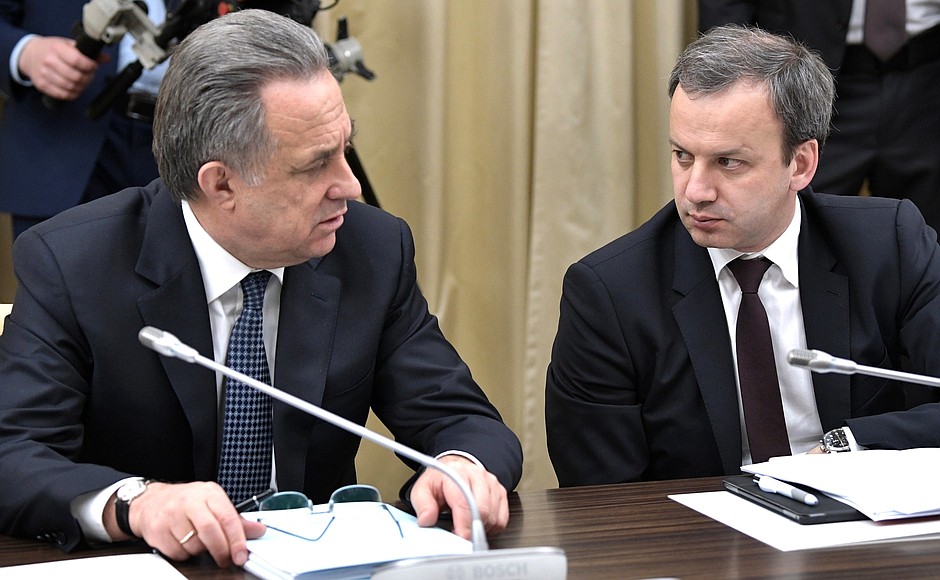 Vladimir Putin: Mr Manturov, how does your Ministry assess this work? Minister of Industry and Trade Denis Manturov: Mr President, As part of the transition to the latest available technologies, we are working to reduce the negative impact on the environment, and we are also carrying out a large-scale modernisation of the industry as a whole. We have completed a three-year plan with the business community to develop 51 BAT reference books, and since 2015, under import replacement programmes, the necessary domestic equipment has been developed; the list was approved by the Government the other day. This equipment will be distributed. The law provides for accelerated depreciation. The most important models of new equipment will be manufactured in 2019–2020 and will be used in the technical re-equipment of the 300 pilot companies you mentioned. In general, the modernisation of 6,500 companies, according to preliminary estimates, will require about 9 trillion rubles in additional private investment. Thanks to this, we will be able to keep enterprises busy in different engineering sectors that are oriented toward new means of production. 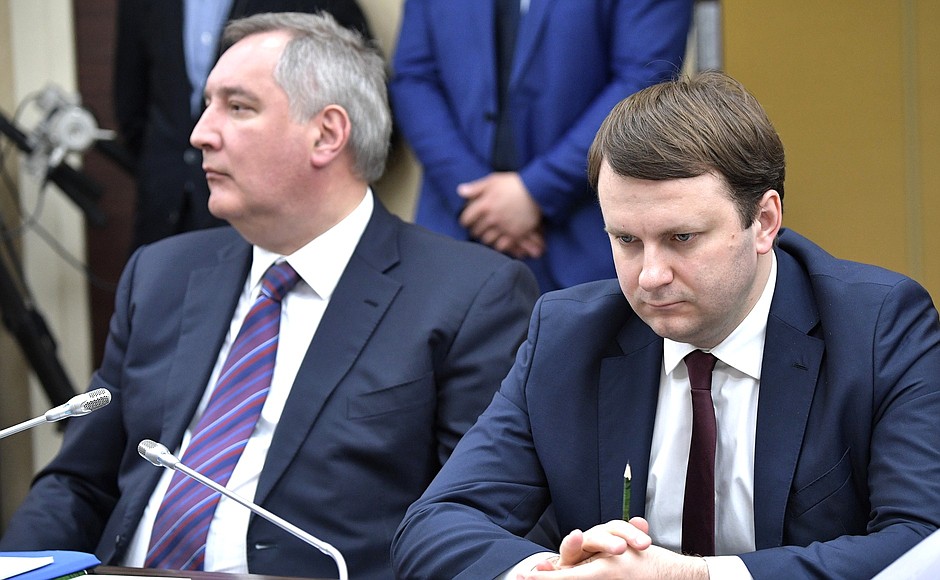 Vladimir Putin: Are you planning any more rescheduling? Denis Manturov: No, we are not. Vladimir Putin: Alright, let’s go from here. And I would like to address one more subject at the beginning of our meeting that I consider extremely important – support for motherhood, childhood, and consequently the related problems of demographic development. As you know, on January 1 of this year, we launched new mechanisms to support motherhood and childhood; families with modest incomes now have the right to receive a monthly cash benefit in the amount of a child's subsistence minimum based on regional norms, which average approximately 11,000 rubles. And two additional opportunities for using maternity capital: the benefit for a second child with maternity capital, and benefits for day nursery for children from two months old. I would like Ms Golodets to tell us how using these new tools, mechanisms and opportunities is going. 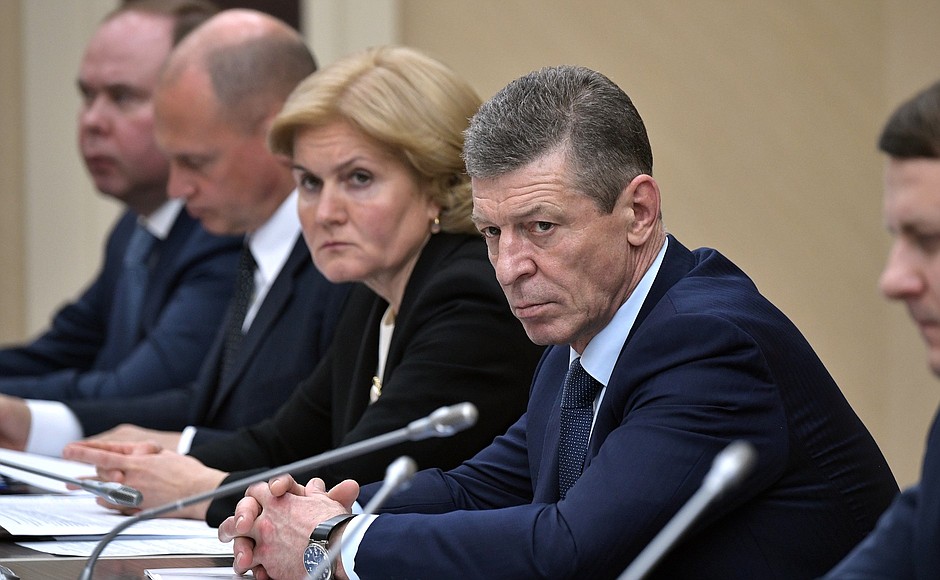 Deputy Prime Minister Olga Golodets: Mr President, colleagues, Indeed, starting January 1, measures have been taken pursuant to your instruction of December 2, 2017, across all Russian regions. Currently, there is no region where benefits are not being provided. The measure most highly in demand is the first child allowance. Some 27,965 families are already getting this money. Every day we receive more applications, and there have been some positive changes. Eighteen regions showed an increase in the birth rate over February, which has not happened for quite a while. So, the new benefits are working and are good support for young families. Some 2,083 families decided to use maternity capital to support and raise a second child. It was surprising to us that a large number of families (more than we expected) are using maternity capital to pay for day nursery. This means that new mothers these days want to go back to work. We can accept more children into day nurseries. In addition, I would like to mention that we have adopted a document that distributes money for the construction of day nurseries among the regions and now day nursery benefits are being used by 3,896 families. The Government supervises the programme. We are monitoring this as it is being implemented in different regions. The most active areas in this respect are the Rostov Region, the Stavropol Territory, the Krasnodar Territory and Moscow. But every region is paying the benefit. There are no disruptions in the programme. Notably, information about this programme is easily available to families. Women learn about it at prenatal clinics and directly in maternity hospitals. The programme will be supervised further and we will report on future results. Vladimir Putin: Thank you. Let’s move to the main issue of gas engine fuel use. The source of information - http://en.kremlin.ru/events/president/news/57275 Meeting with permanent members of the Security Council Vladimir Putin chaired a meeting with permanent members of the Security Council to discuss Syria and certain issues on the domestic socioeconomic agenda. April 19, 2018 - 15:45 - Novo-Ogaryovo, Moscow Region 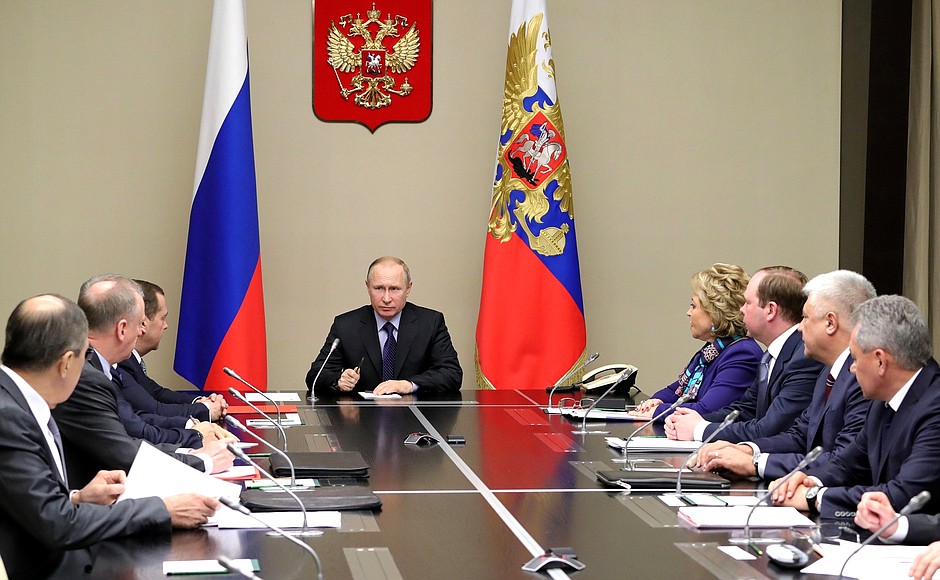 The President updated the meeting participants about the discussions on Syria he had with foreign heads of state and government in the past few days following the recent Western airstrikes. 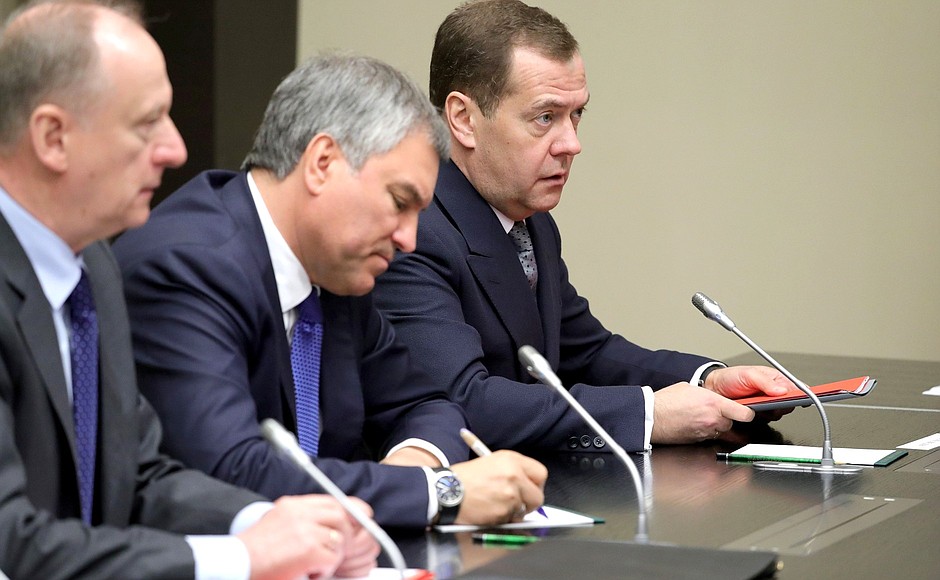 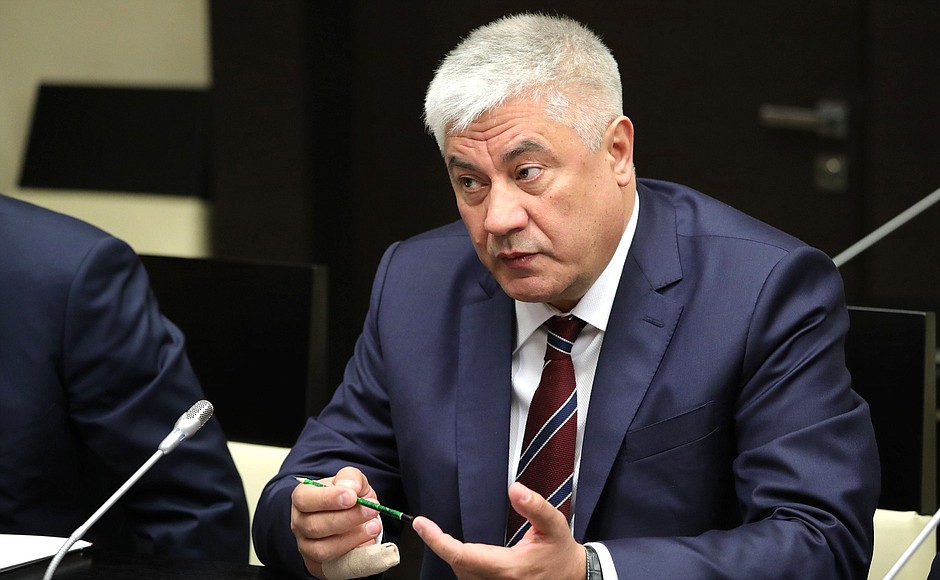 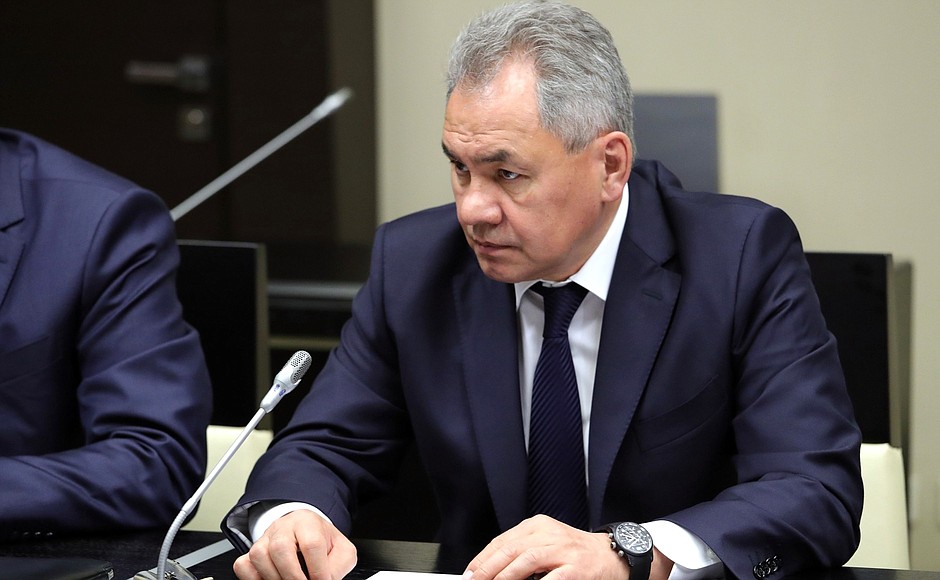 The council members also exchanged opinions on flood and wildfire relief efforts. During a recent meeting with Government members, the Emergencies Minister Vladimir Puchkov reported to Vladimir Putin on measures to prevent floods and wildfires. 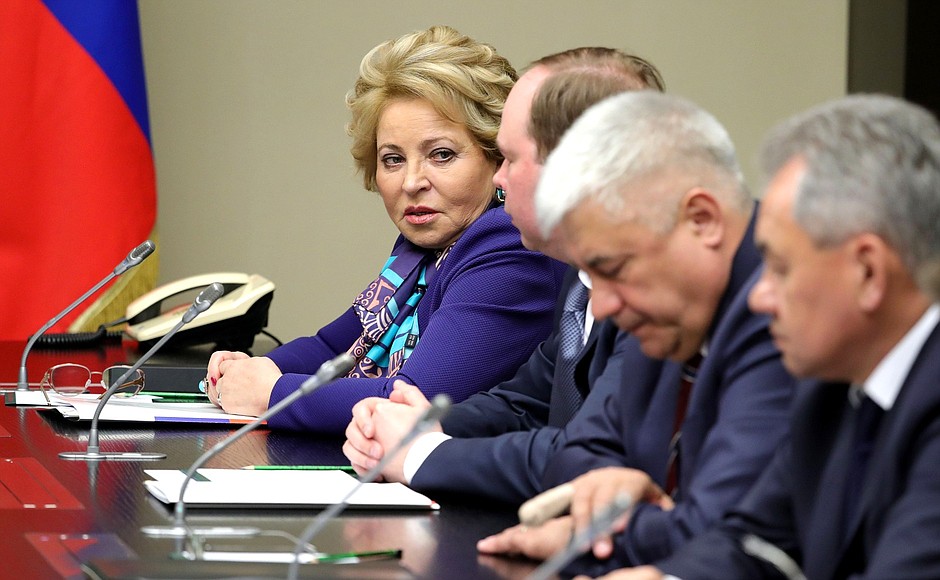 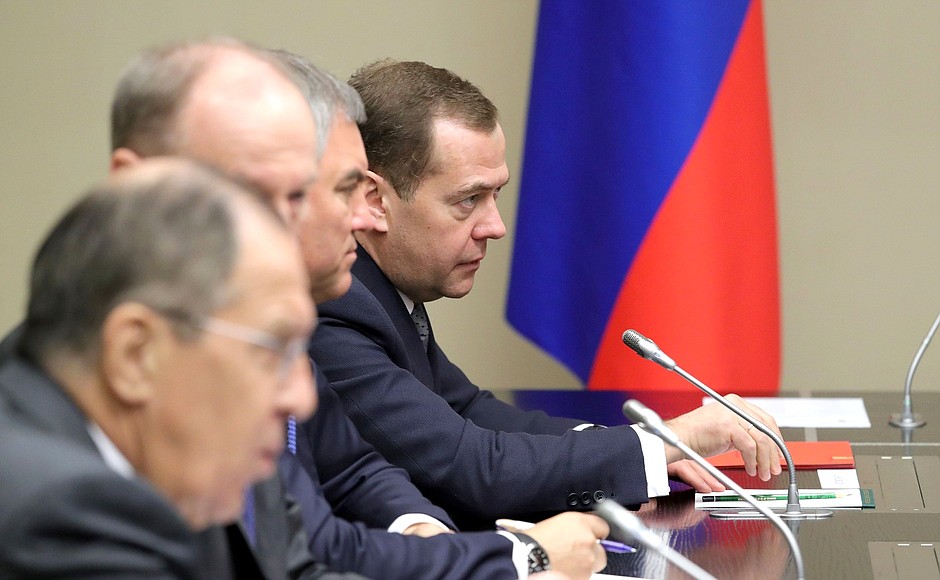 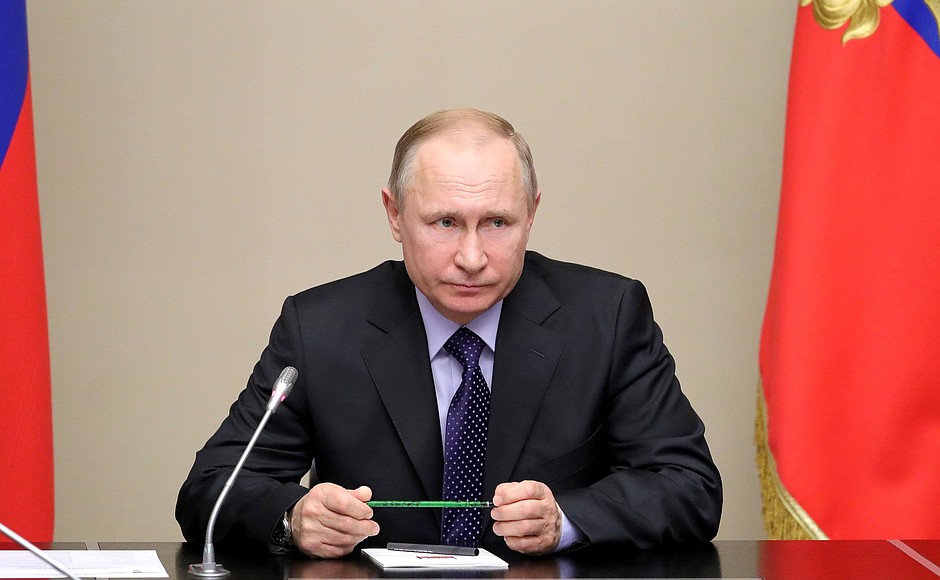 The meeting was attended by Prime Minister Dmitry Medvedev, Federation Council Speaker Valentina Matviyenko, State Duma Speaker Vyacheslav Volodin, Chief of Staff of the Presidential Executive Office Anton Vaino, Security Council Secretary Nikolai Patrushev, Interior Minister Vladimir Kolokoltsev, Foreign Minister Sergei Lavrov, Defence Minister Sergei Shoigu, and Director of the Foreign Intelligence Service Sergei Naryshkin. The source of information - http://en.kremlin.ru/events/president/news/57303 Greeting to participants, organisers and visitors of the 12th Golden Belt National Award in martial arts Vladimir Putin sent greetings to the participants, organisers and visitors of the 12th Golden Belt National Award in martial arts, which is held annually by the Russian Union of Martial Arts. April 19, 2018 - 19:10 The message reads, in part: “It is gratifying to see experienced mentors, coaches and organisers alongside the outstanding, talented athletes among the nominees for this high award. Indeed, thanks to intense, hard work and commitment to their profession, Russian wrestlers perform impressively at the most prestigious international competitions, demonstrating excellent preparation with a focus on the results. I sincerely congratulate the winners and wish them successes in the arena and in their serious, demanding work to develop the national martial arts school and promote its victorious traditions.” In 2017, Russian martial artists won 108 gold, 54 silver and 47 bronze medals at world and European championships. The source of information - http://en.kremlin.ru/events/president/news/57307 Meeting with Sergei Shoigu and Valery Gerasimov Vladimir Putin held a meeting with Defence Minister Sergei Shoigu and Chief of the General Staff of Russia’s Armed Forces and First Deputy Defence Minister Valery Gerasimov. April 20, 2018 - 16:40 - Novo-Ogaryovo, Moscow Region 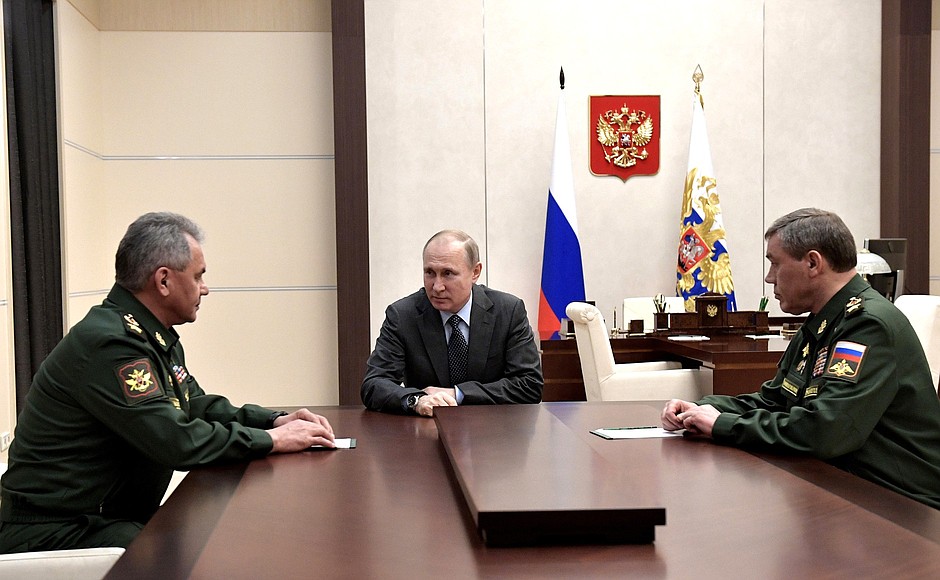 The discussion covered military development issues. Sergei Shoigu and Valery Gerasimov reported to the President about the course and results of the exercises in the Far East Federal District. They also talked about certain aspects of the situation in Syria. 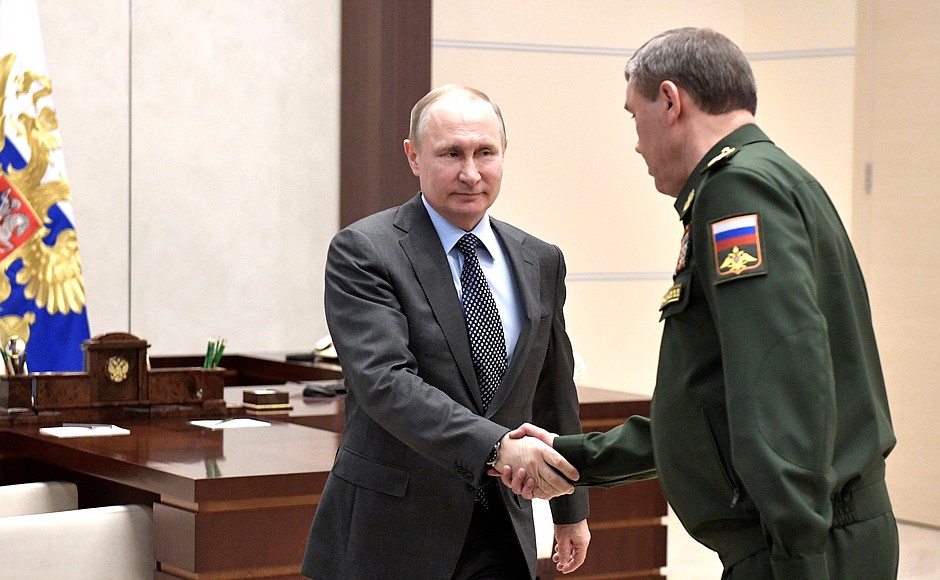 Following the meeting, the President made a decision to hold another session of meetings with representatives of the army and the defence industry in Sochi in the middle of May. The source of information - http://en.kremlin.ru/events/president/news/57311
__________________
Where should they dig the Very Deep Pit? Piglet said that the best place would be somewhere where a Heffalump was, just before he fell into it, only about a foot farther on. (c) Alan Alexander Miln |
|
|
#816 |
|
Senior Member
|
Telephone conversation with President of France Emmanuel Macron
Vladimir Putin had a telephone conversation with President of the French Republic Emmanuel Macron. April 23, 2018 - 13:40 The two presidents discussed the situation in Syria after the missile strikes by the United States and its allies. The Russian President stressed that the campaign, which was an extremely grave violation of international law, resulted in extra complications of the political settlement of the Syrian crisis. In this context, the parties noted the importance of the OPCW experts’ mission in Syria. President Putin and President Macron agreed to continue joint efforts by Russian and French representatives in order to resume the peace talks based on UN Security Council Resolution 2254 and in view of the outcome of the Syrian National Dialogue Congress in Sochi. Vladimir Putin informed his counterpart about the steps being taken by Russia, including in cooperation with its partners in the Astana format, to relieve the humanitarian situation in Syria. Indicatively, the Russian and French presidents spoke out in support of further implementation of the Joint Comprehensive Plan of Action with respect to Iran’s nuclear programme, an important factor in ensuring international security. The presidents also addressed some topical matters of Russian-French relations in view of Emmanuel Macron’s upcoming visit to Russia in May. The source of information - http://en.kremlin.ru/events/president/news/57330 Greetings to participants in the international forum Victory Forged by Unity: The Heroism of Partisans and Resistance Fighters in the Great Patriotic War Vladimir Putin sent his greetings to the participants and guests of the international forum Victory Forged by Unity: The Heroism of Partisans and Resistance Fighters in the Great Patriotic War, which is underway in Bryansk. April 25, 2018 - 10:00 The message reads, in part: “Your traditional meetings held ahead of Victory Day are a major consolidating element in the life of people in the CIS countries. These meetings, which bring together prominent public figures, veterans, members of the research and expert communities and creative and youth organisations, have a noble mission of promoting continuity and encouraging the upcoming generation to respect the enduring spiritual and moral values and the heroic pages from the shared history of our peoples, including the courageous struggle of the partisans and resistance fighters during the Great Patriotic War. It is our duty to protect the truth about heroes and to firmly resist any attempt to falsify historical facts. I am confident that the sacred memory of our victory in May 1945 and the heroism of our fathers and grandfathers, who defended the freedom and independence of our homeland and saved the world from Nazism, will always provide a solid basis for partnership and neighbourly relations between the CIS nations.” The source of information - http://en.kremlin.ru/events/president/news/57357 Telephone conversation with President of Armenia Armen Sarkissian Vladimir Putin had a telephone conversation with President of Armenia Armen Sarkissian. April 25, 2018 - 19:25 The current situation in Armenia was discussed. Vladimir Putin and Armen Sarkissian emphasised that to overcome the domestic crisis as soon as possible, all political forces in the country should display restraint, responsibility and a willingness to resolve the current issues through constructive dialogue and strictly within the constitutional framework. The source of information - http://en.kremlin.ru/events/president/news/57365 Telephone conversation with Acting Prime Minister of Armenia Karen Karapetyan Vladimir Putin had a telephone conversation with Acting Prime Minister of the Republic of Armenia Karen Karapetyan. April 26, 2018 - 18:20 It was noted that the crisis in Armenia must be resolved within the legal framework, in line with the existing constitution and on the basis of the results of the legitimate parliamentary elections held in April 2017. In this context, the leaders emphasised the importance of electing a new Armenian prime minister by the parliament on a planned date of May 1, 2018. The source of information - http://en.kremlin.ru/events/president/news/57368
__________________
Where should they dig the Very Deep Pit? Piglet said that the best place would be somewhere where a Heffalump was, just before he fell into it, only about a foot farther on. (c) Alan Alexander Miln |
|
|
#817 |
|
Senior Member
|
Message of greetings on the opening of the 17th Russian Junior Delphic Games
Vladimir Putin sent a message of greetings to the participants, organisers and guests of the 17th Russian Junior Delphic Games, which are underway in Vladivostok. April 21, 2018 - 10:10 The message reads, in part: “Over the past years this wonderful endeavour has been enriched with interesting ideas, brilliant initiatives and innovations, and has become a major unifying event for creative young people. I am satisfied to note that many winners of the previous Games have managed to sensationally realise their potential, achieved impressive results in different arts, and gained professional recognition and truly worldwide fame. I am confident that their example will inspire the current Delphians, will allow them to perform well at the Games and display their talent to spectators and the expert jury.” The source of information - http://en.kremlin.ru/events/president/news/57315 Congratulations on Local Government Day Vladimir Putin sent a message of congratulations to municipal heads and deputies and local administration personnel on Local Government Day. April 21, 2018 - 10:30 The message reads, in part: “Local government in our country has long traditions dating back to the so-called Charter to the Towns signed by Empress Catherine the Great on April 21, 1785. In modern Russia, local councils bear a large responsibility for the social and economic development of towns and communities, and for improving their infrastructure and territories. It is to local authorities elected by the people that local residents address their most urgent problems and concerns. Our common task is to strengthen local government and expand its resource potential. Naturally, it is also important to provide support to significant public initiatives, and to involve the population in the implementation of municipal projects and programmes. Such participation promotes civil society and direct democracy institutions.” The source of information - http://en.kremlin.ru/events/president/news/57316 Meeting with Head of Ingushetia Yunus-Bek Yevkurov Vladimir Putin had a working meeting with Head of the Republic of Ingushetia Yunus-Bek Yevkurov to discuss the region’s socioeconomic situation. April 23, 2018 - 13:30 - Novo-Ogaryovo, Moscow Region 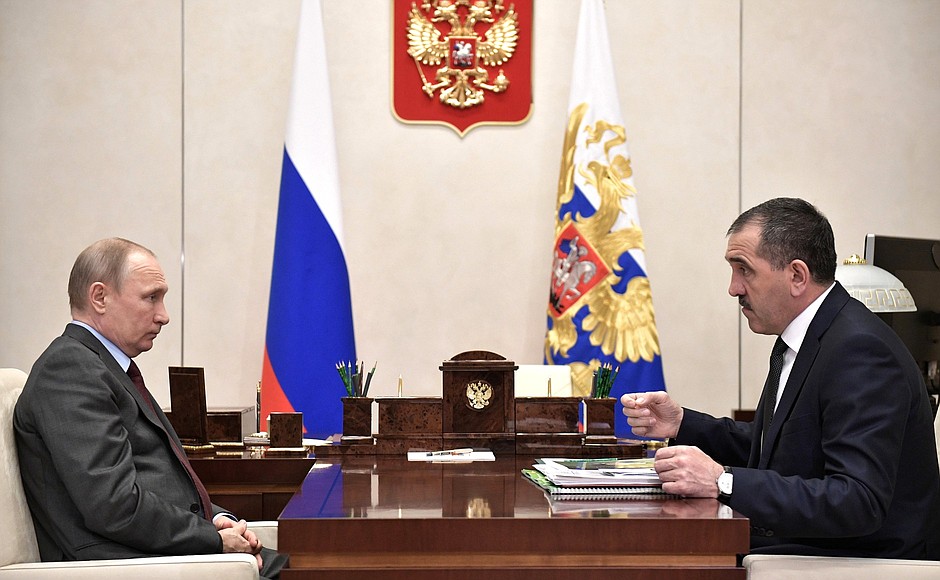 According to Mr Yevkurov, regional GDP has increased by 1.7 percent. Two more aluminium frame as well as cement and concrete mix production plants have opened. Recently the region demonstrated some good results in the agricultural industry. Specifically, the republic boasts one of the country’s best wholesale distribution centres that currently stores 32,000 tonnes of products and plans to expand its storage capacity to 60,000 tonnes. 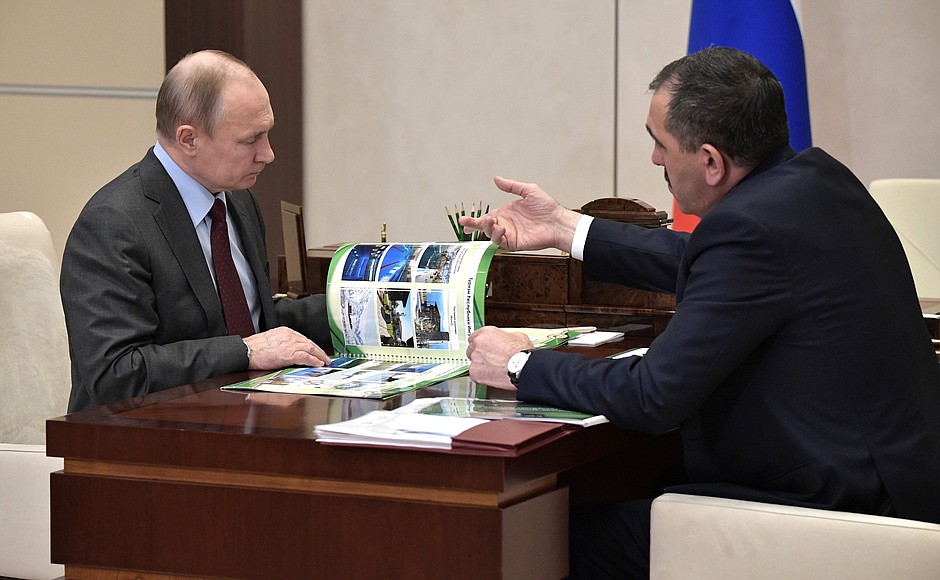 The Sad-Gigant Ingushetia farming corporation creates intensive-growth fruit gardens. A large vegetable greenhouse has been finished. Local travel industry is developing as well. 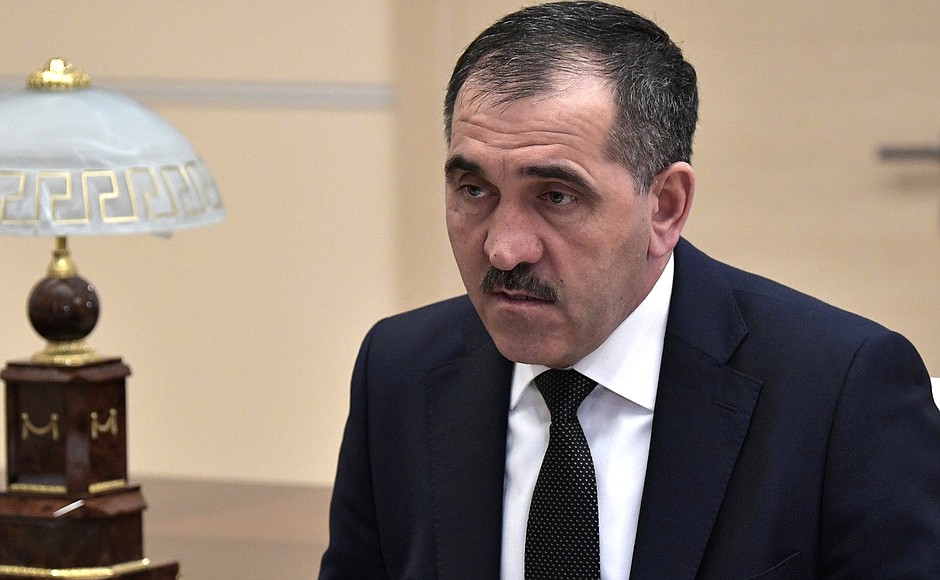 The Head of Ingushetia reported that the entire public transportation fleet in the republic has been running on gas for 18 months. With support from Rosneft, construction of three more petrol stations will begin this year. 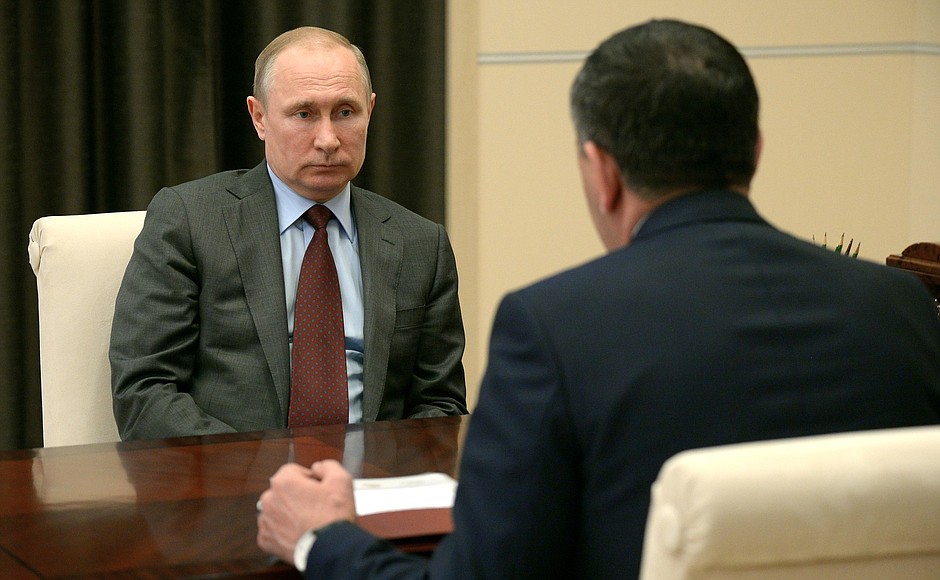 There is progress in healthcare. Infant mortality has dropped by 50 percent. The new perinatal centre has already delivered 1,500 children. New schools and kindergartens are under construction. The source of information - http://en.kremlin.ru/events/president/news/57322 Working meeting with Deputy Prime Minister Dmitry Rogozin Vladimir Putin had a working meeting with Deputy Prime Minister Dmitry Rogozin, who briefed the President on the development of navigational/data-exchange technologies of the GLONASS global navigation satellite system. April 24, 2018 - 14:30 - Novo-Ogaryovo, Moscow Region 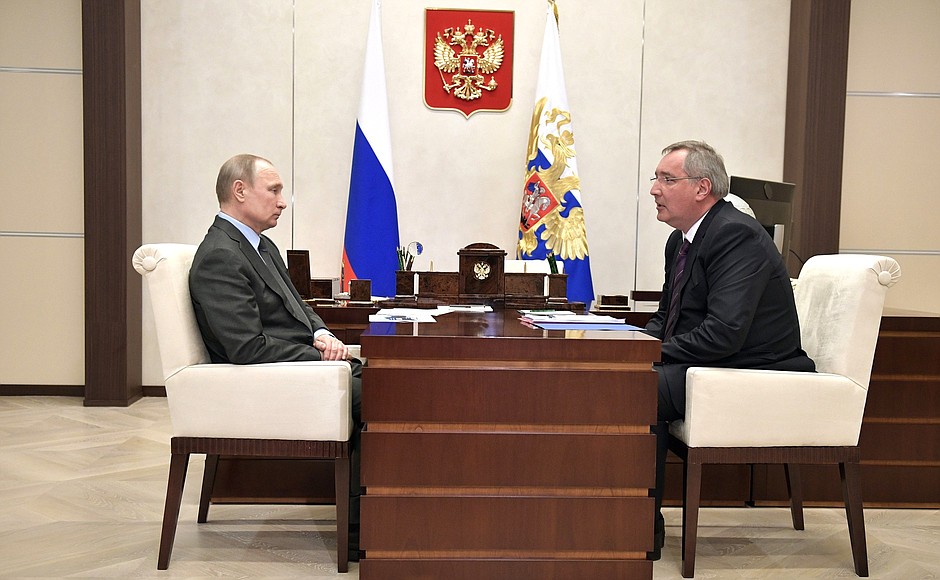 President of Russia Vladimir Putin: Mr Rogozin, you wanted to discuss the GLONASS system’s ground-based components. Go ahead, please. Deputy Prime Minister Dmitry Rogozin: Mr President, I would like to hand you this presentation. First, I would like to say a few words about the space segment, which has attained its design parameters. It consists of 24 spacecraft, including 23 older-generation GLONASS-M satellites and one new-generation GLONASS-K satellite. We also have one reserve spacecraft in orbit. We have six spacecraft on the ground; if necessary, we can expand this segment right away and launch the required number of satellites. There are plans to launch the more accurate new-generation GLONASS-K2 satellites with improved mathematical parameters starting in 2019. We are working on the task you set to improve the quality of navigational signals. Vladimir Putin: How long will they stay in orbit? 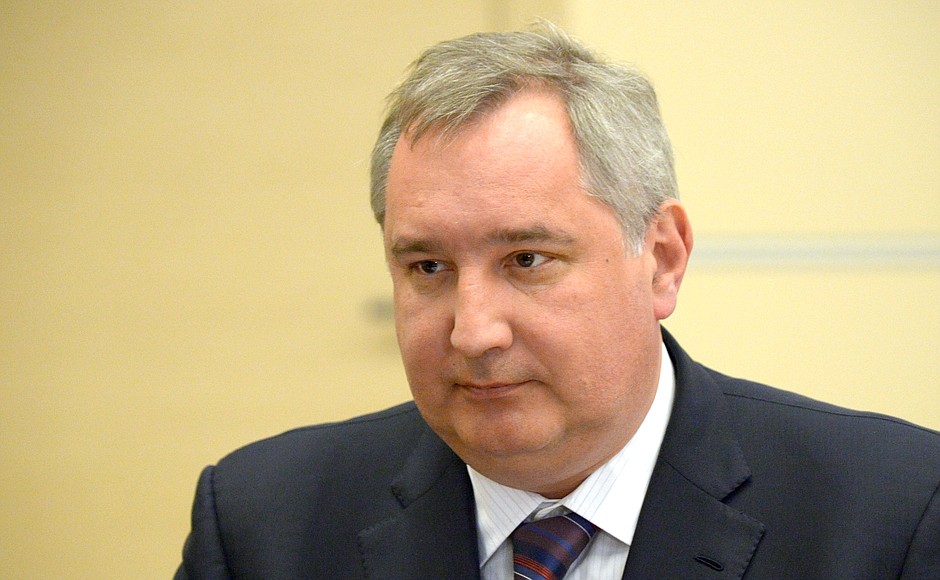 Dmitry Rogozin: Although their service life is seven years, they can operate longer. Therefore, the number of ground-based spacecraft is quite impressive, and there is no need to change anything so far. Regarding ground-based spacecraft, you told us a year ago that we must actively utilise the GLONASS cluster’s potential in the civilian economic sector. I would like to report on this. The Russian satellite navigation equipment market was worth 2.4 billion rubles in 2015. Last year it reached as much as 15 billion rubles. Thus, the market is growing fairly quickly. At present, in Russia differential correction systems are installed in 107 airfields out of 182, 43 seaports out of 67, and 33 on inland waterways. This year we will fully equip all seaports in Crimea with these systems. Do you remember how you criticised us for lagging behind in GPS? We have caught up with this backlog and will not have it anymore. Likewise, priority measures were taken on the Northern Sea Route. In all, 8,791 ships, including over 2,000 sea vessels, are fitted out with the GLONASS navigation equipment. All ships and vessels that operate in our basin have this equipment, as well as 670 aircraft, 113 of which are foreign. Mr President, I would like to say the following in this context. When we introduced the ERA-GLONASS system, a law was adopted according to which all vehicles imported to Russia after a certain date, should be equipped with these systems, modules and chipsets. Today our airlines have over 600 foreign aircraft. I would like to suggest making the requirement that if a plane is bought by a Russian airline, it is obligatory for it to have this module. 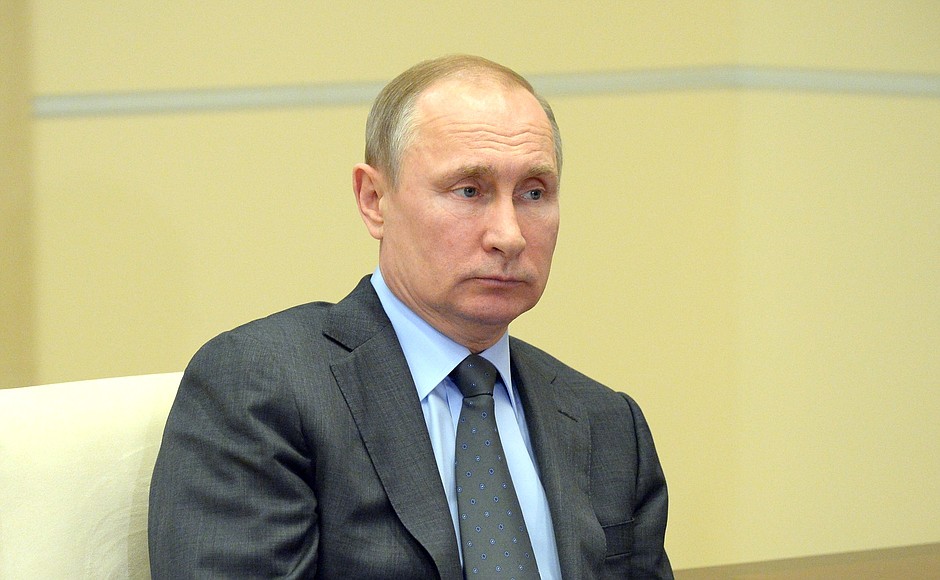 Vladimir Putin: You mean that the manufacturer should install these systems? Dmitry Rogozin: Of course. After all, it is not such a big issue but it is important for us. What is the point for us to equip our airports with GLONASS if aircraft are not equipped with this system? Vladimir Putin: You are absolutely right. Dmitry Rogozin: Furthermore, over 1.8 million cars in the Russian Federation have been equipped with the ERA-GLONASS systems. By the end of the year this figure will increase to 3.5 million cars. Some 838,000 emergency calls were received and processed. In over 10,000 cases prompt response was made, which means that hundreds of human lives were saved. We both know the meaning of the notion “golden hour” – the quicker aid is rendered, the better the chance of saving lives. This is why we are actively introducing these systems. Joint Stock Company GLONASS, which is a federal operator of these systems is fully owned by the state. I would also like to tell you that state financing will end this year because this organisation will become self-sufficient. This is very important because it highlights the success of commercialisation opportunities offered by Russian orbital systems. I would also like to tell you that we consider the combination of the ERA-GLONASS, Safe City and System-112 to be technically compatible. These will be nationwide call centres with equal opportunities to switch from Safe City to Smart City. In other words, GLONASS will also be introduced in this technology. 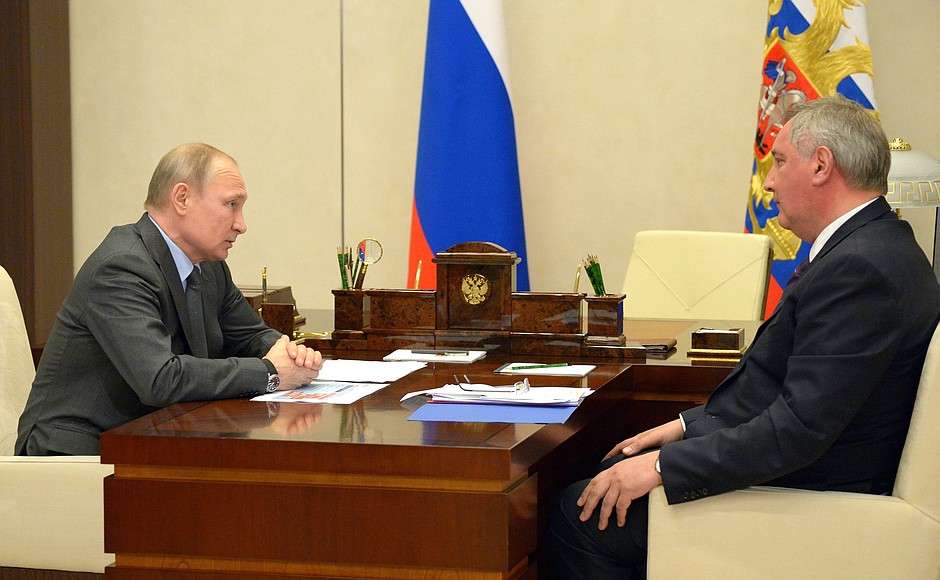 Vladimir Putin: This is what should be done, considering the positive results that the introduction of GLONASS has produced in preventing traffic accidents. As far as I see from the submitted documents, death rate from traffic accidents has decreased by 32 percent. Dmitry Rogozin: That is absolutely right. Vladimir Putin: This is a very serious achievement and this is the way to go. The source of information - http://en.kremlin.ru/events/president/news/57350 Vladimir Putin congratulates Aeroflot Russian Airlines on its 95th anniversary Vladimir Putin congratulated current and former Aeroflot Russian Airlines workers on the occasion of the company’s 95th anniversary. April 25, 2018 - 09:30 The message reads, in part: “Over this period, legendary Aeroflot has had a long and eventful history, and the company has been with the country and its people in peace and during times of trial. The heroic participation of civilian airline pilots in the Great Patriotic War is a special page in the company’s history. They bravely defended the Fatherland from the ruthless enemy, supplied frontline units with food and ammunition, evacuated wounded soldiers and maintained contact with besieged Leningrad. “Today, Aeroflot is a recognised passenger flag carrier and one of the oldest airlines in the world. You have every right to feel proud of the wonderful traditions of many generations of your predecessors, who primarily and sincerely loved their work, who showed exceptional professionalism and competence, as well as responsibility and concern for the safety of passengers. “I am happy to note that, while marking its 95th anniversary, the company is on the rise, confidently implementing promising long-term projects, setting high service-quality standards and therefore enjoying well-deserved trust not only in Russia but all over the world.” The source of information - http://en.kremlin.ru/events/president/news/57358 Greetings to the Fifth Congress of Russian Notaries Vladimir Putin sent a message of greetings on the opening of the Fifth Congress of Russian Notaries, dedicated to the 25 anniversary of the private notary system in Russia. April 25, 2018 - 12:00 The message reads, in part: “The Foundations of Russian Notary Legislation were endorsed on February 11, 1993, and became the legal framework for the formation of one of the key institutions of the Russian legal system. During the past years, the private notary system – which is based on the principles of objectivity, independence, impartiality and responsibility – has gone through an important period of development, attracted top-tier professionals and convincingly demonstrated its efficiency and importance. Today, Russian notaries remain committed to the traditions of their predecessors and are successfully carrying out their tasks, the main of which are protecting the lawful interests of citizens and legal entities, supporting safe economic activity, and performing the functions of preventive, pre-trial defence. Of course, is extremely valuable that you are using cutting-edge technology in your work, which makes it possible to considerably improve the quality of your services and better preserve legally significant information.” The source of information - http://en.kremlin.ru/events/president/news/57366 Presentation of Hero of Labour medals The Kremlin is the venue of a ceremony to present Hero of Labour of the Russian Federation medals which were presented to five Russian citizens for their outstanding service to the state and its people. April 25, 2018 - 13:45 - The Kremlin, Moscow 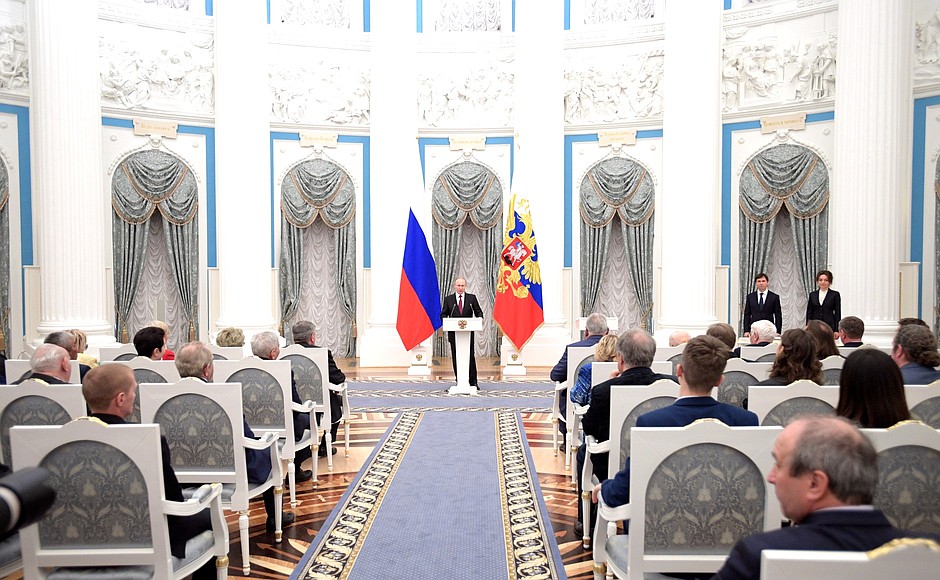 The medals were presented to Yevgeny Dronov, general director of TULAMASHZAVOD Production Association; Mark Zakharov, artistic director of the Lenkom Theatre; Nikolai Karpol, head coach of the Uralochka-NTMK volleyball club; Alexander Kulichenko, shaft sinker at the Taldinskaya-Zapadnaya-2 mine of SUEK-Kuzbass; and Galina Savelyeva, a professor at the Pirogov Russian National Research Medical University. The title of the Hero of Labour was established in March 2013. It is awarded for outstanding achievements in public, social as well as economic activity; for contribution to the country’s socioeconomic development, including industrial production, agriculture, transport, construction, science, culture, education, healthcare and other spheres. 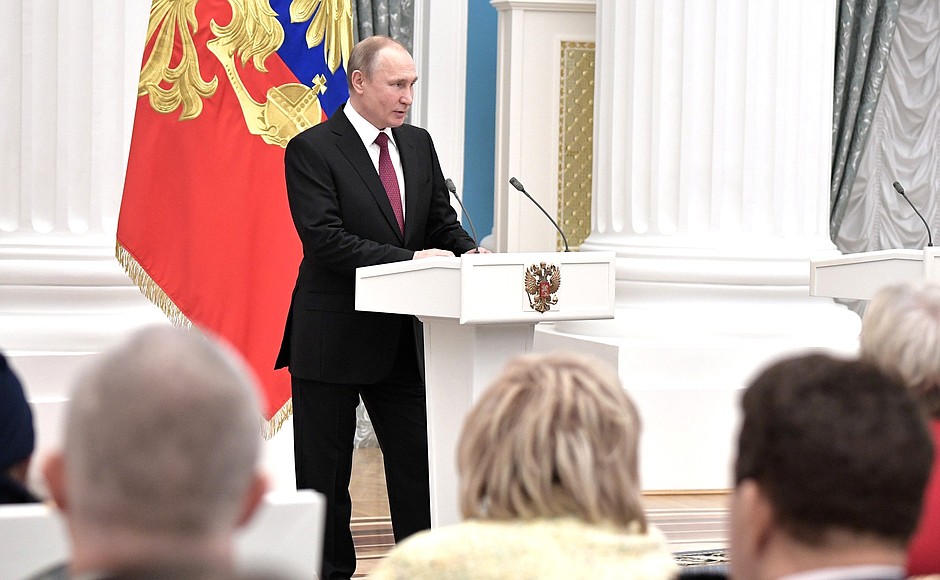 President of Russia Vladimir Putin: Good afternoon, friends! Today, here at the Kremlin we are honouring prominent citizens of Russia who are by right bestowed with the high title of the Hero of Labour of the Russian Federation. This award reflects our deep respect for those who are opening new pages in the history of our Fatherland with their self-sacrificing labour. Russia has always been known for its talents, accompanied by diligence, determination and responsibility. The highest and seemingly inaccessible summits can be conquered when there is a person who is sincerely determined to contribute to the common good for the benefit of our Motherland. At all times, these qualities have helped our compatriots to achieve positive results in various fields: in science and technology, education and medicine, culture and arts, and thereby increase the strength and greatness of our country. Our country has always had and will have such people. Today’s laureates are a good example of this. I am happy to say a few words about each of them. Unique skills and gifted hands of Tula armourers have long been famous both in our country and worldwide. Yevgeny Dronov devoted all his life to the continuation of these glorious traditions and made a great contribution to the strengthening of the country’s defence capacity as well as the development of the national industry. Born in Tula, the son of a World War II veteran, he rose from a shop foreman to the Tulamashzavod general director and learned all about the work of the production association which is a complex mechanism, occasionally encountering various difficulties. He also has to deal with some sensitive social issues concerning the workers. Under the leadership of Mr Dronov, the production of modern military equipment supplied to the army and the navy has been mastered in recent years, and the plant proves the competitiveness of its products and its readiness to work at the highest possible technical level. Our outstanding cultural figures also set the highest standards in their work, their service to art. Their creative gift cannot but be admired. The constellation of such legends includes Mark Zakharov. His theatrical, acting and director's talent earns love from millions of admirers, and Lenkom Theatre, the main brainchild of Mr Zakharov, is called legendary. For many decades now, it has been one of the brightest stars in the firmament of cultural life not only in the capital, but in the whole of our country. Lenkom is always trying to discover new ideas, and the audiences always respond with love and gratitude. We really have a lot of amazing, extraordinary people. And the name of Nikolai Karpol is probably well-known even to those people who have nothing whatsoever to do with sports. The world’s most titled volleyball coach, the most titled coach of Russia in sports Mr. Karpol brought so much joy to the people and inspired more than one generation of fans. He is like victory himself, he inspires volleyball fans, and, most importantly, the players. Nikolai Karpol has trained many champions. With his energy, character and words, he can create a real team and can rally people together to achieve a common goal, and this is the key to success. The team spirit and the camaraderie are important not only in sports. They are simply vital in difficult and occasionally dangerous jobs such as mining. Kuzbass resident Alexander Kulichenko has been working in the coal industry for 26 years now. He is head of a mining brigade at the Taldinskaya-Zapadnaya-2 mine. The coal mining techniques are changing and becoming more sophisticated, but the result still depends primarily on the miners’ skills. The team led by Mr Kulichenko shows high performance results and repeatedly sets mining speed records. To do so, one needs not only experience and courage, but also one must always be prepared to bear the responsibility for colleagues. One also needs leadership skills and a pinpoint approach to the organisation of work. Having mastered the mining techniques, Alexander Kulichenko shares his knowledge with young miners, thus ensuring the future of the coal industry. Galina Savelyeva devoted herself to a good, noble and rewarding cause: she helps the miracle of motherhood to become a reality. A highly qualified obstetrician-gynecologist and internationally renowned researcher, Ms Savelyeva helped develop the many fields of research and methods of modern perinatology doing her best to preserve the health of the newborns and their mothers. Galina Savelyeva is not only a GP and a researcher, but also a brilliant teacher. She has been heading the Department of Obstetrics and Gynecology at the Pediatric Department of the Pirogov Medical University for over 40 years now, and trained many excellent specialists. Such continuity is a reliable foundation for further development of domestic medicine. Friends, colleagues, we still have a lot to accomplish and to achieve when it comes to breakthroughs in a variety of spheres. The solution to all these things directly depends on the energy of the people, their focus on the result, together with a desire to improve the life around them. Friends, you open up new horizons and set an example of professionalism and enthusiasm for your colleagues and all those who want to contribute a part of their personal achievements to the country's overall success. You have followed your own path to professional heights. At the same time, I think you share something in common. Each of you is aware that only those who genuinely love their work and are never satisfied with what they had accomplished, and keep setting new and more ambitious goals, enjoy real success and, by and large, can really be happy. I wholeheartedly congratulate you on your well-deserved awards and I want to sincerely thank you all for what you have done and will certainly do for our country. Thank you. 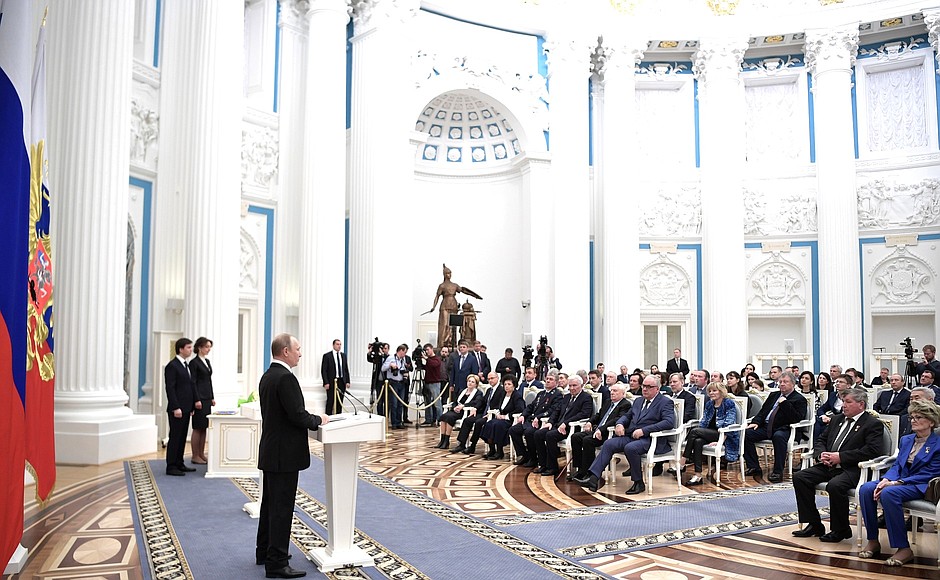 <…> Vladimir Putin: Friends, once again I want to congratulate you on your awards today. Of course, each of you has your own team behind you, but still you are in the limelight today as someone who has achieved really outstanding results in your careers. Mark Zakharov said that, thank God, there was no such thing as major challenges in his over 40 years as theatre manager. I would like to build on what Mr Zakharov said and say that I believe that your entire life is a sequence of challenges. (Applause). That goes for all of our awardees present today, because every day you do something to promote not only your own personal success but the success of your teams as well as our country. Thank you very much. My congratulations. The source of information - http://en.kremlin.ru/events/president/news/57356 Congratulations to Leonid Roshal on his birthday Vladimir Putin congratulated Leonid Roshal, director of the National Research Centre for Emergency Children's Surgery and Traumatology, on his 85th birthday. April 27, 2018 - 11:00 The message reads, in part: “You dedicated your life to medicine and have been faithful to your calling, performing your high, self-sacrificing mission of the most humane profession in the world with dignity. Both in Russia and abroad you are known as a prominent member of medical community, a major healthcare administrator and a man of great courage.” The source of information - http://en.kremlin.ru/events/president/news/57372 Greetings to participants of the event marking the 95th anniversary of CSKA (Central Sports Club of the Army) Vladimir Putin congratulated CSKA athletes of all generations and their supporters on the club’s 95th anniversary. April 27, 2018 - 17:00 The message reads, in part: “Over the past years, CSKA has made a long and eventful journey from Vsevobuch (Universal Military Training) to one of the country’s most award-winning sports clubs and written many brilliant and unforgettable chapters in the triumphant history of Russian and international sport. CSKA has raised a constellation of winners in the most prestigious international competitions, Olympic champions and medallists. Their outstanding achievements are our common pride and national legacy. It is important that the current CSKA athletes respect their predecessors’ glorious traditions and strengthen the authority of their home club and Russia’s status of a great sports nation with their success by remaining leaders in gymnastics and figure skating, demonstrating excellent results in track and field and martial arts as well as such popular sports as football, ice hockey and basketball. I want to sincerely thank everybody and the club’s veterans for their selfless and tenacious hard work for the benefit of their country.” The source of information - http://en.kremlin.ru/events/president/news/57380 Meeting with Alexander Kalyagin Vladimir Putin met with Chairman of the Russian Theatre Union and Artistic Director of Moscow Et Cetera Theatre Alexander Kalyagin. April 28, 2018 - 13:10 - The Kremlin, Moscow 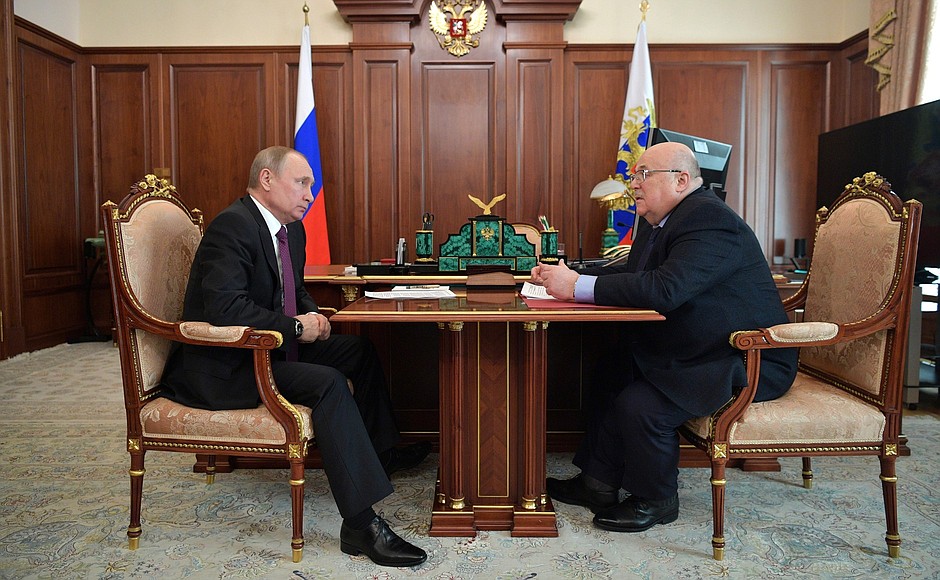 President of Russia Vladimir Putin: Mr Kalyagin, I believe we drafted the theatre development concept in the Russian Federation until 2020 back in 2011, and I approved it when I was Prime Minister. Chairman of the Russian Theatre Union and Artistic Director of Moscow Et Cetera Theatre Alexander Kalyagin: Yes, exactly. Vladimir Putin: The Russian Theatre Union, which you head, is the driving force for the events mentioned there. How do you assess today’s situation? 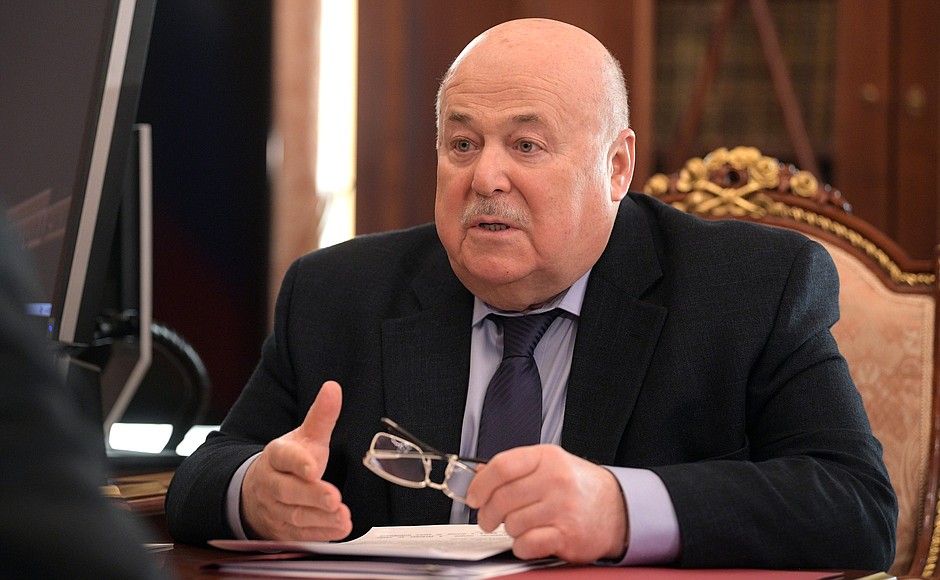 Alexander Kalyagin: Mr President, I am glad that you remember that year. Of course, I am eternally grateful for your attention to addressing the issues facing the theatre. One manifestation of your attention, and this is something we want very much and have lobbied for some time, is to declare 2019 the Year of Theatre. I understand that there are difficulties, but this would be done for theatre, for the community, for culture in general, for our country and for the audiences. It is very important that people go to theatres. Besides the problems we could solve during the Year of Theatre, we would also map out a way and design a strategy until 2030. It is true that there are many problems, and if you were to declare the Year of Theatre, I have prepared possible ways to address these problems. Here they are, there are three pages here with the main approaches to organising the Year of Theatre. I understand that life will not end next year, and people will continue going to theatres. But the new edition of the Law on Culture and amendments to the Tax, Budget and Civil codes… As you know, many theatres are in need of major renovation work. There are many things. We could solve education issues, raise wages and improve theatres’ technical resources, because it is really a great asset for the audiences and for the people of Russia. For example, in your Address to the Federal Assembly you mentioned the cultural centres that would be built at every possible place in a city. That would be excellent. Young people and children start going to theatres when they are little: theatre clubs, school drama, theatre school and so on. It fosters growth and elevates morality, if you can forgive me for such lofty words, but you know this yourself. For example, my grandson – an amazing mathematician – is a brilliant cello player. We should do what the Japanese did: send everyone to art school, because this leads to an entirely different mentality. 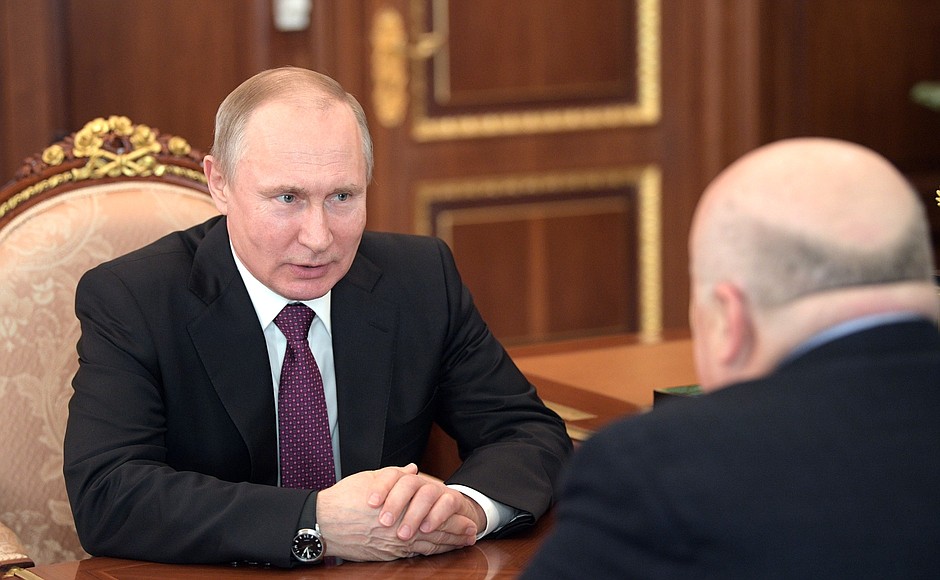 Vladimir Putin: Music is directly connected with mathematics. Alexander Kalyagin: Yes, this is true. Vladimir Putin: Mr Kalyagin, I agree. I know that you have been thinking about this for a long time. We have discussed it, too. Let’s do it, let’s make 2019 the Year of Theatre in Russia. Alexander Kalyagin: Hooray! 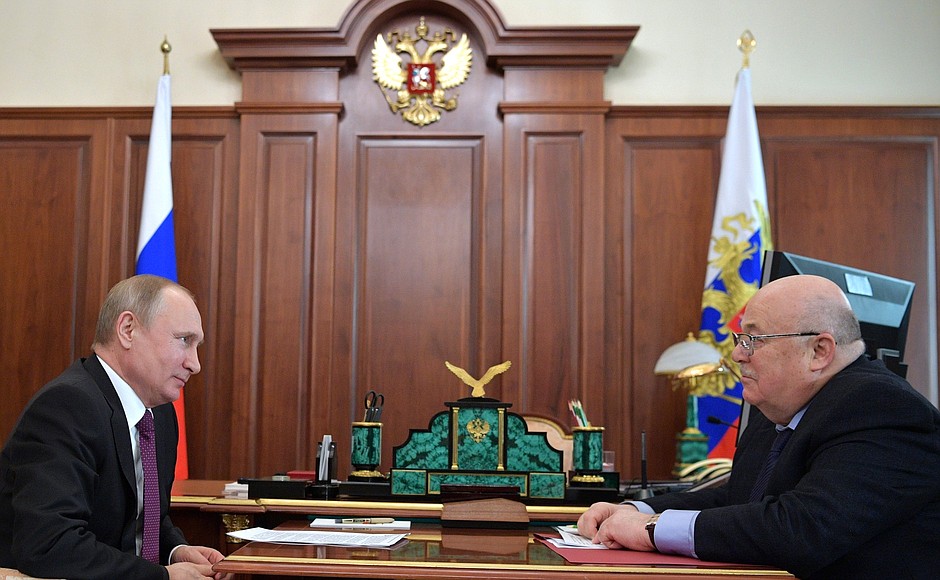 Vladimir Putin: We will see. Of course, you should develop your proposals for the year’s programme. Alexander Kalyagin: Almost all the solutions are in these papers. I can add more. The Year of Theatre would be great. Vladimir Putin: Good. Alexander Kalyagin: You cannot imagine how happy the theatre community and the theatre will be. This really is very important. The source of information - http://en.kremlin.ru/events/president/news/57379 Executive Order on holding the Year of Theatre in 2019 The President signed Executive Order On Holding the Year of Theatre in Russia. April 28, 2018 - 15:00 The President resolved to hold the Year of Theatre in the Russian Federation in 2019 in order to further develop the art of theatre. The Government has been instructed to establish an organising committee for the Year of Theatre and to develop and approve a plan of the main events by June 1, 2018. Executive bodies in the Russian regions are recommended to hold the necessary events as part of the Year of Theatre. The source of information - http://en.kremlin.ru/events/president/news/57378
__________________
Where should they dig the Very Deep Pit? Piglet said that the best place would be somewhere where a Heffalump was, just before he fell into it, only about a foot farther on. (c) Alan Alexander Miln |
|
|
#818 |
|
Senior Member
|
Meeting with Management Personnel Pool graduates appointed acting governors of Russian regions
April 25, 2018 - 15:45 - The Kremlin, Moscow 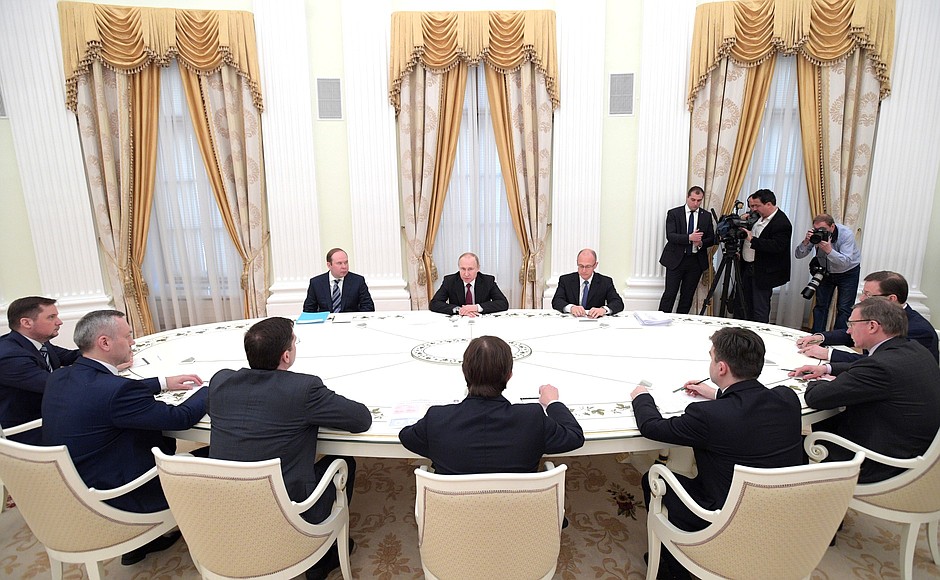 President of Russia Vladimir Putin: Good afternoon, colleagues, I want to once again congratulate you on your graduation, on completing the first public administration training programme. From among the participants of this programme, seven people present here were appointed to the high positions of regional leaders, acting governors of major regions with great industrial, agricultural and scientific potential, while they were still in training. You are now responsible for the quality of people's lives; I can even say, without exaggeration, for the future of the people, because the well-being, and sometimes the lives of the people in the territories that you are currently running will depend on the efficiency of the services entrusted to you. I very much hope that both your background knowledge and your life experience, which is ample, as well as the knowledge gained during training, will be used as much and as effectively as possible to address the tasks facing the regions that you are now heading. 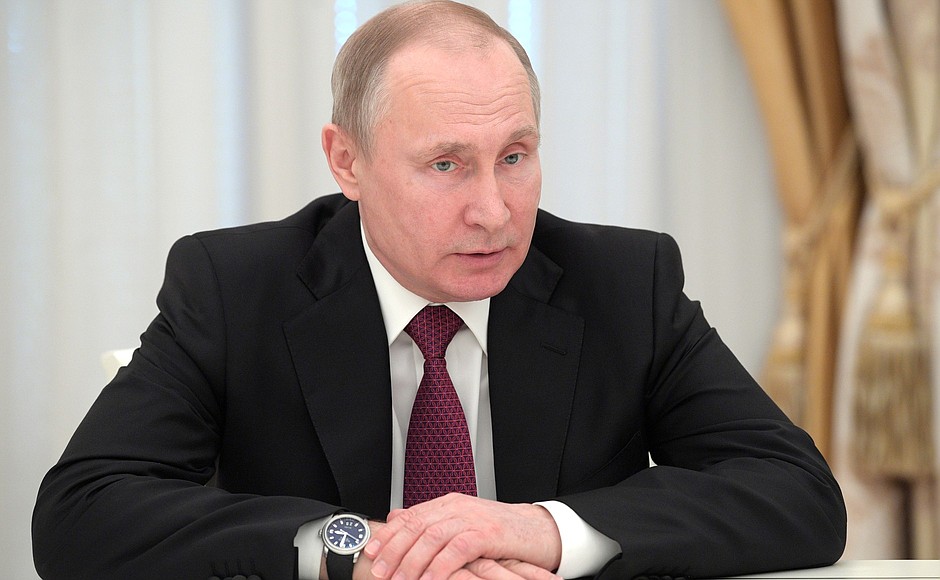 I would like to draw your attention to two things and discuss them with you today. First, you have completed your training and started work. You are aware that that we will continue this programme in June, and I would like you to tell me how this programme can be improved to make the training of young public servants even more effective and focused. Second, this request is related to your current activities – please, use open competitive methods for selecting public administration personnel at all levels in your work as you go about your functions. Of course, the necessary influence can and should be exerted, within the confines of current law, on the formation of the municipal level of government. However, the regional level of government must also include ambitious, in the best sense of the word, and goal-oriented public administrators who love their work and treat people with respect. I believe this is how you will form your teams. This is what I wanted to say in my opening remarks. Now, I would like to hear what you have to say about the question that I asked about training public administration personnel as part of the programme that you completed, and I would also like to hear your opinion on the situation in the regions where you work, and the goals that you have set for yourselves. 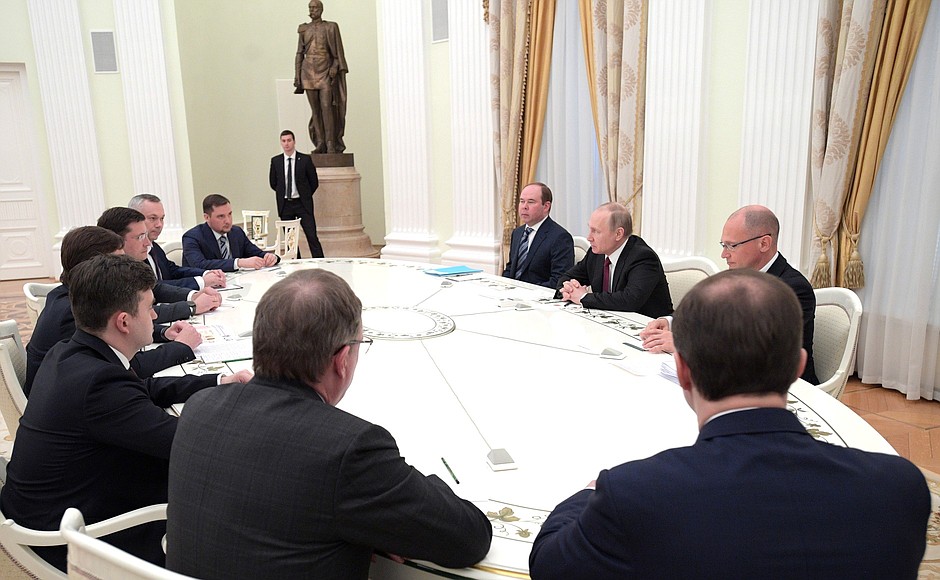 <…> Vladimir Putin: First of all, thank you very much for the proposals to improve the Management Personnel Pool programme. We will absolutely keep them in mind. I think they are correct. This concerns holding classes in the regions and inviting specialists from other countries. Indeed, it is critically important to listen to them and to go there, especially for our colleagues who work in regions close to the CIS countries, and those who are part of our economic union. This is something we will absolutely have to do. This is my first point. Second, I can see that despite the limited time you have been in these regions, you are making quite good progress in getting up to speed and are already familiar with the situation. I am pleased to know that. You have already come up with specific proposals. There have also been requests, and the very nature of the questions and the requests clearly shows that you are familiar with the situation. This is good to know. I want to wish you success in your practical work. I hope that your practical activities will be appreciated by the residents of your regions during the upcoming September elections of leaders of the regions where you are currently serving as acting governors. The source of information - http://en.kremlin.ru/events/president/news/57363 Meeting with the graduates of the Management Personnel Pool programme Vladimir Putin met with the first graduates of the Management Personnel Pool programme. The President congratulated them on completing the course. April 25, 2018 - 16:00 - The Kremlin, Moscow 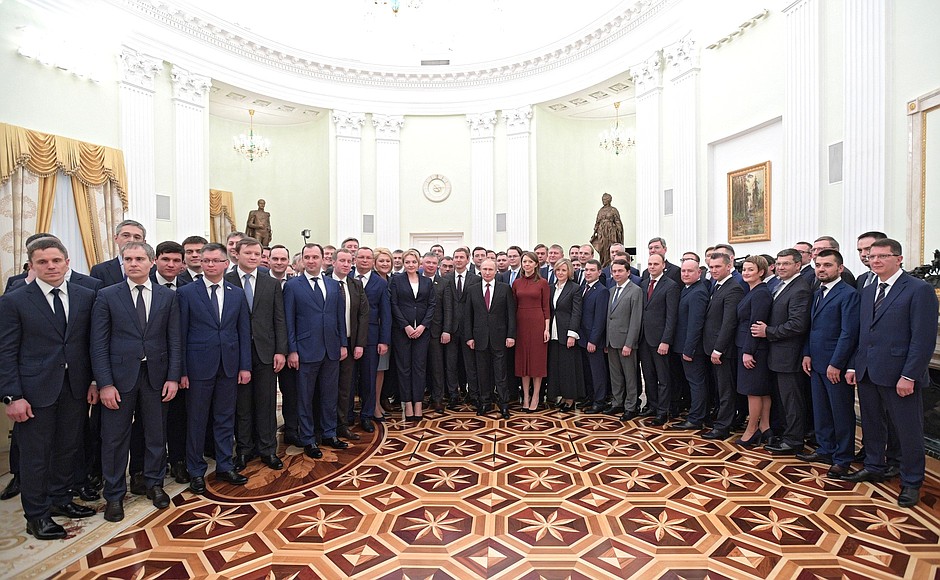 The President also held a separate meeting with those graduates who were appointed acting governors of the Orel, Ivanovo, Samara, Omsk, Nizhny Novgorod and Novosibirsk regions and the Nenets Autonomous Area during their studies. The meeting was also attended by Chief of Staff of the Presidential Executive Office Anton Vaino and First Deputy Chief of Staff of the Presidential Executive Office Sergei Kiriyenko. 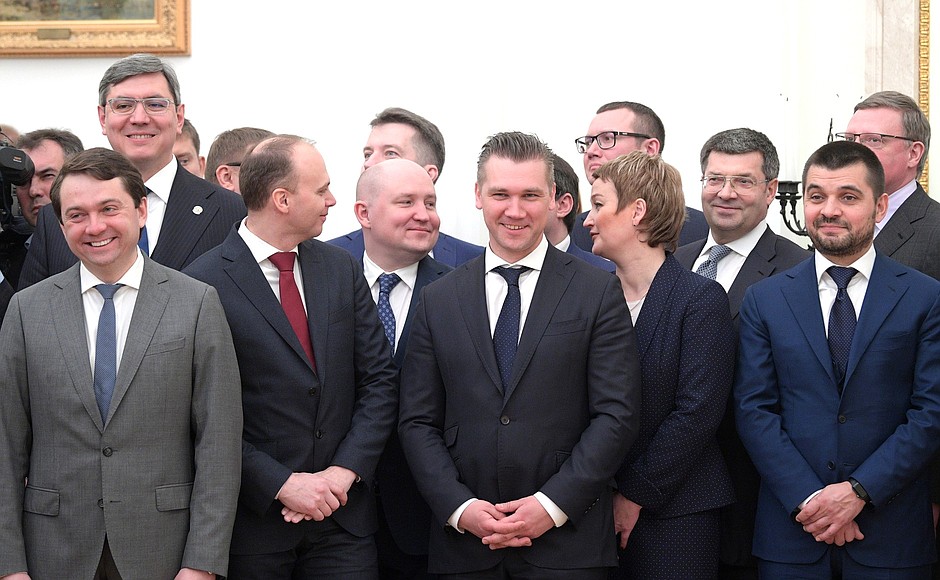 The Management Personnel Pool programme was established upon the President’s instruction. In June 2017, the first group began studies at the Graduate School of Public Administration at the Russian Presidential Academy of National Economy and Public Administration, in cooperation with the country’s major education institutions, including Sberbank Corporate University, Moscow School of Management SKOLKOVO and the Higher School of Economics. 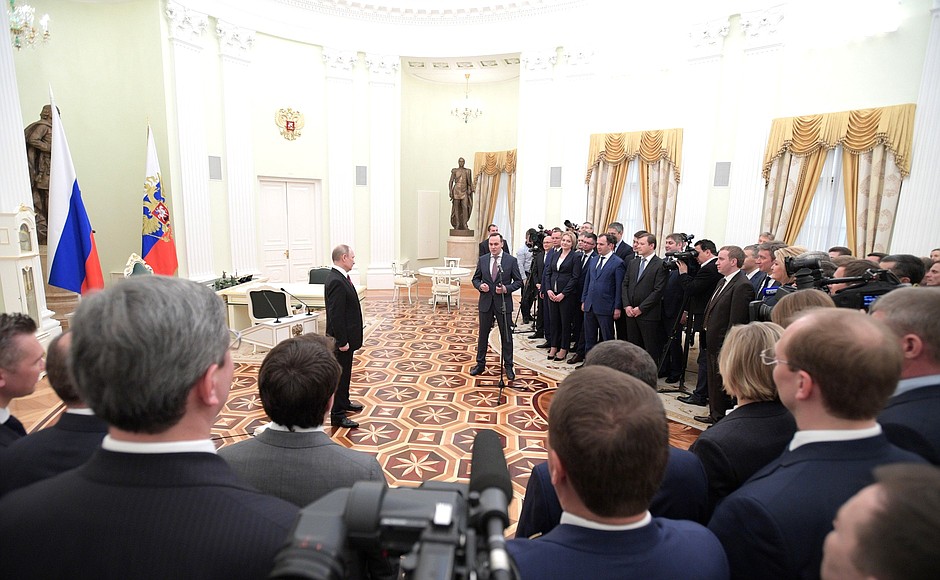 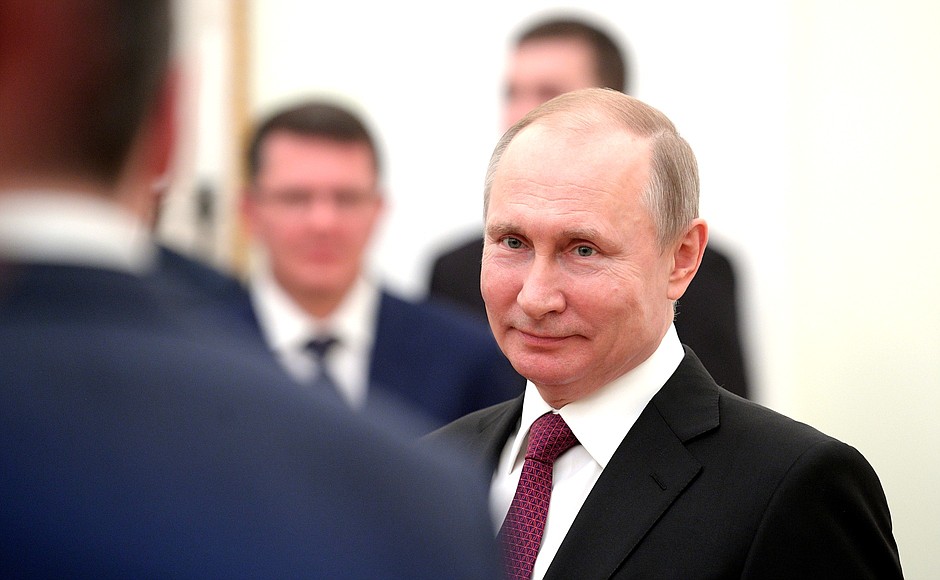 The 74 participants admitted for the first programme included heads of federal and regional government bodies, local governments and companies that are partially owned by the government. The source of information - http://en.kremlin.ru/events/president/news/57359 Start of the meeting with graduates of the programme on the training of personnel management reserve April 25, 2018 - 15:30 - The Kremlin, Moscow 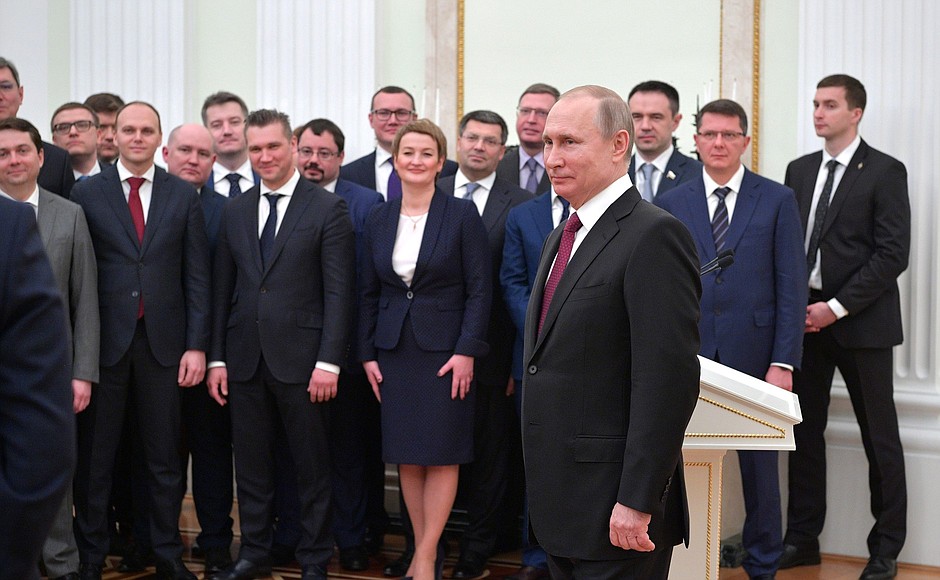 President of Russia Vladimir Putin: Good afternoon, colleagues and friends. I would like to congratulate all of you on the completion of what I think – and you will probably confirm this – is an interesting and useful undertaking linked with the upgrading of your skills. This is the first class of graduates of this kind, but I must say right away – and you know this – that seven graduates have already been appointed governors of large and very important regions of the Russian Federation. We do need modern, smart specialists that are able to formulate tasks and achieve implementation, and in all areas: production, science, education, medicine and management. I am very pleased to say that this is what all of you are. I would like very much to see your careers match your potential, which is great. All of you are people with much potential. As they say, your lives are ahead of you and I would like to wish you success. You probably know that we will continue this programme and the second enrollment will take place in June. I would like to see not just seven graduates appointed and working but all of you find yourselves in your professions and careers, and for our part we will do everything we can to help and support you. I hope that the time you have spent was not in vain and that all this will be used to resolve the major challenges facing this country. I wish you success! The source of information - http://en.kremlin.ru/events/president/transcripts/57362 Meeting with Council of Legislators On the Day of Russian Parliamentarism, Vladimir Putin met with the Federal Assembly’s Council of Legislators. By tradition, the meeting took place at the Tavrichesky (Tauride) Palace. April 27, 2018 - 16:00 - St Petersburg 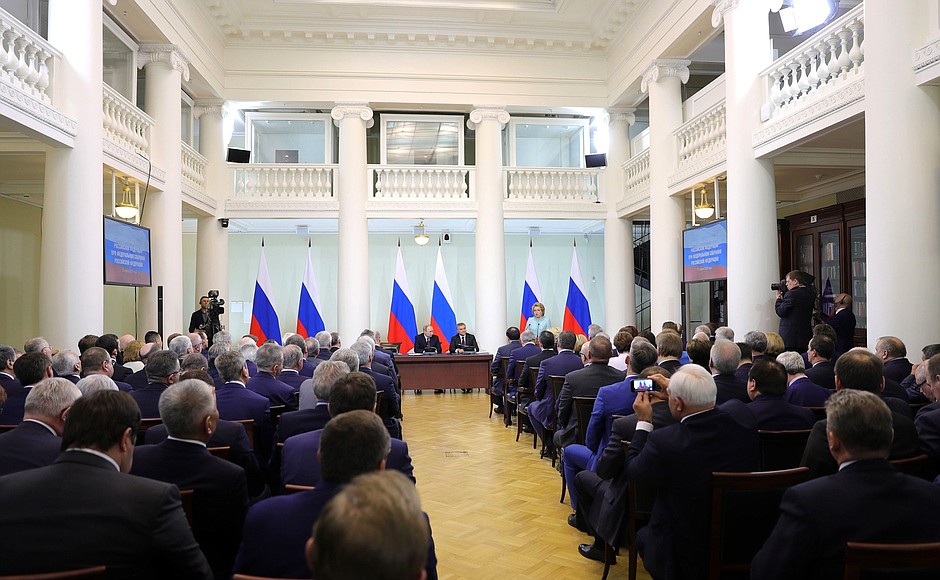 The discussion focused on the implementation of the Presidential Address to the Federal Assembly by representative bodies of state authority, the development of the legal framework to control the quality of medical services and the development of digital economy in the regions. Co-chairs of the Council of Legislators, including Federation Council Speaker Valentina Matviyenko, State Duma Speaker Vyacheslav Volodin, Kaliningrad Regional Duma Speaker Larisa Orgeyeva and Chair of the Vladimir Region Legislative Assembly Vladimir Kiselev delivered reports. 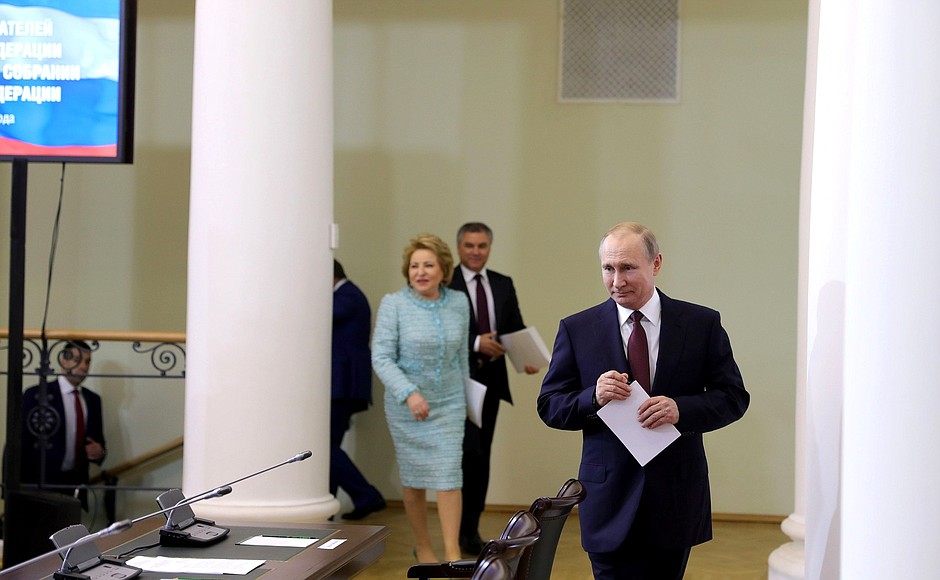 President of Russia Vladimir Putin: Good afternoon, colleagues, First of all, I congratulate you, the entire deputy corps of the country and members of the Federation Council on Russian Parliamentarism Day. The Council of Legislators is meeting here, in the Tauride Palace, the historical palace where Russia’s first State Duma began its work 112 years ago. Not only do we honour such important historical traditions of our country, but also do everything necessary for the development of modern Russian parliamentarism, to strengthen this most crucial independent branch of power. I would like to thank the Council of Legislators for your multidimensional work and especially for your significant contribution to maintaining the unified legal space in the country. This year, on December 12, the Russian Constitution and the Federal Assembly will mark their 25th anniversary. Over these years, the legislative bodies of the federal and regional levels have acquired a huge amount of positive experience. They have improved their parliamentary professionalism both in legislative activity and in the implementation of their representative function. Notably, our Constitution contains a legal framework for a strong, responsible, influential and authoritative legislature. Clearly, there is a great potential for increasing the efficiency and quality of law-making activities. I will dwell on this topic a little later. In the year of the 25th anniversary of the Constitution, I would like to ask you to pay special attention to raising awareness and clarifying key norms and provisions of the Fundamental Law during the meetings with the voters and citizens of our country, its importance for the country, society and each individual. Colleagues, In the coming years, we will have a big and important job to do which is outlined in the Address. I emphasise once again: achieving the goals is a historical necessity. I am using this word to stress the importance of this. Providing breakthroughs across almost all areas of our lives is a matter of our country’s future. I am aware that you not only substantively analysed this document, but already prepared plans for implementing it. I would like to hear from you today what is planned specifically and what is being done in the sphere of law-making. I think that the Council of Legislators can improve the coordination of this work, since practically all the work must be done locally in the regions, and active, focused and competent participation of regional parliaments is absolutely necessary. Today, we need flexible and modern legislation aimed at promoting high technology across all areas. This means expanding the freedom for entrepreneurs, scientific and creative research, and innovation. Without this, nothing will happen. However, we should stick to one approach and share the understanding of our joint work. It is necessary to create a single and harmonious legal system, where regional and local regulatory acts are an integral part of the overall concept and do not erode federal regulations, but reasonably supplement and expand them. As we move along this path, we will ultimately significantly improve the overall competitiveness of national jurisdiction, which is critical, and open new opportunities for domestic businesses and foreign investors. Of course, much depends on close and constructive interaction of legislators with the future Government during the implementation of the Address. I hope that such work will be effective and harmonious, and that the best practices of cooperation and dialogue between the executive and legislative branches of power will be developed. 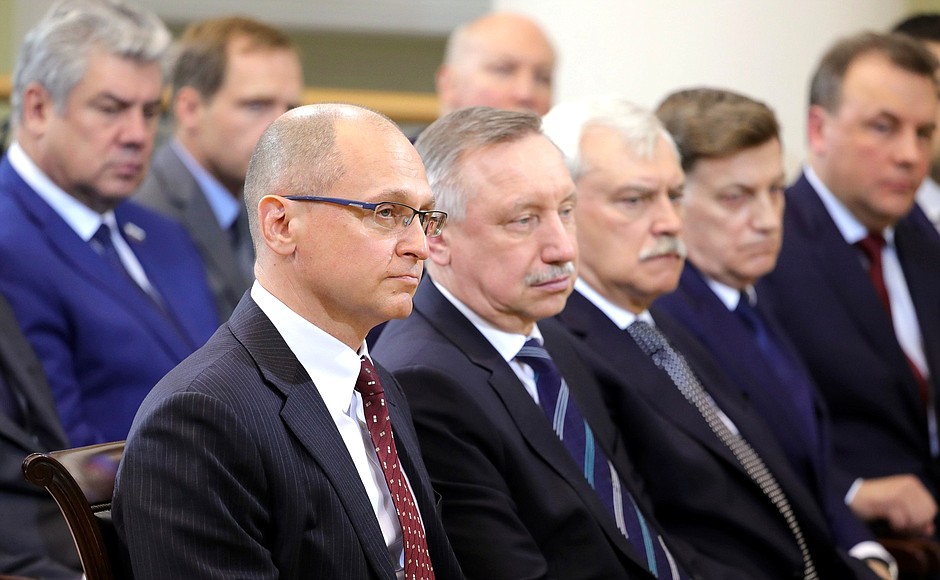 Colleagues, Here, at the Council of Legislators we have repeatedly spoken about the general problems of our legislative framework and judicial technique, and the strict observance of requirements on the structure of acts, their language and the law-making culture. All of these things are highly important and cannot be relegated into the background or lost in the flood of routine work. In this context I suggest thinking about the consolidation of your council’s contacts with the judicial research community. I believe this will be useful for all, make law-making more solid and help draft clear-cut and transparent rules for many years to come. This is the kind of regulation we are seeking – without rush or fuss. Government bodies, business and all citizens of this country are interested in such a fundamental approach. In this context, there is one more issue – the need to ensure feedback from voters. Of course, all of you are dealing with this but I would like to point out again that for parliamentary institutions – both federal and regional – the representative function is no less important than the legislative one. Therefore, it is necessary to communicate with the people as much as possible and to meet with them on a regular basis. To be near them, within reach, especially in the times of trouble. Only this open and honest communication can produce ideas that are much in demand, and draft laws meeting the real aspirations of society and strategic tasks of the development of our state. For instance, this applies to building the digital economy or effective monitoring of the quality of medical aid, and housing and utilities. I know that these and many other important issues are discussed today at the Council of Legislators. I consider it important for you to start working on these meaningful issues of national development without delay. Colleagues, I cannot omit to mention that Victory Day is approaching. I would like to congratulate you on this holiday that is sacred for all of us. Festive events in honour of our veterans are already taking place but it is very important to pay constant attention to them. Any issue, any request should be treated with invariable respect and attention. This is our shared sacred duty. I wish success and all the best to you. Thank you for your attention. 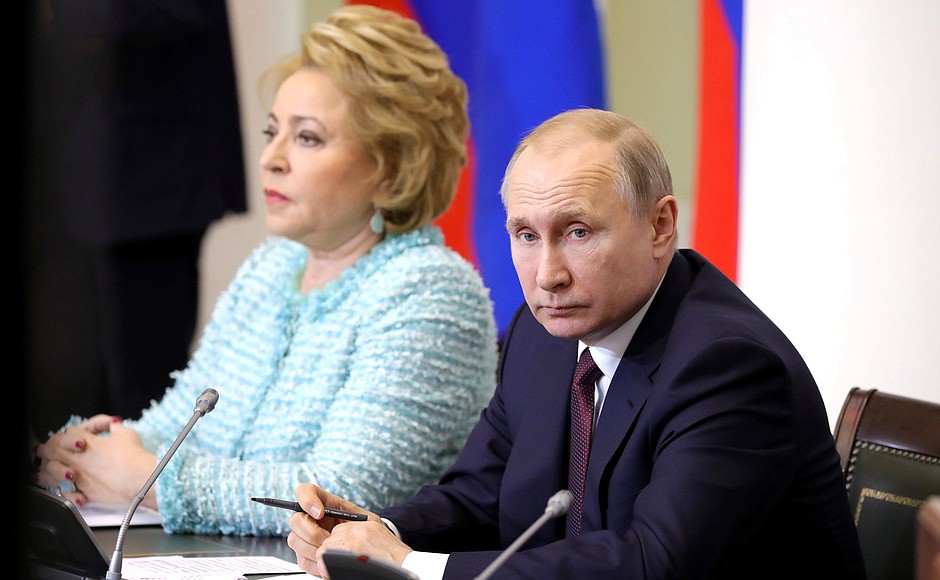 Speaker of the Federation Council Valentina Matviyenko: Mr President, I would like to sincerely thank you for your constant attention to the Council of Legislators and for supporting our work. Gathered here today is a collective legislature made up of federal and regional bodies of legislative and representative power. Of course, I was instructed by the Council of Legislators to congratulate you on your landslide victory in the election. Our citizens expressed their unconditional trust in you as a national leader and voted for the powerful programme of the country's development which you presented in your Address to the Federal Assembly. Vladimir Putin: Thank you very much for the joint work. Thank you. Valentina Matviyenko: Mr President, for us, members of your team, the implementation of your Address, current and future work, is at the top of our agenda. Undoubtedly, strong regions are the most important prerequisite for achieving the goals set in the Address. A number of key documents in the field of state regional policy have been adopted in recent years on your instruction. Work is underway to inventory powers, and model budgets are being formed. However, unresolved problems remain. First of all, the system of inter-budgetary relations is not efficient enough. We propose improving it so that the distribution of tax powers becomes fairer, and most importantly, so that it stimulates the economic development of the regions. We consider it advisable to legislatively establish the mandatory use of the ”two keys“ rule when introducing preferential treatment for federal taxes credited to regional and local budgets. It is also necessary to continue to improve model budgets. It is proposed to calculate them using benchmarks in the sphere of labour, employment, culture, environment, education and healthcare. This, in turn, would provide all citizens with a certain baseline standard of living regardless of their place of residence. The implementation of Russia’s spatial development programme was among the most important tasks identified in the Address. Active discussions are underway; the Ministry of Economic Development has done a lot to prepare the documents. But the prevailing opinion in these discussions is that we should put the main emphasis on developing agglomerations. Of course, this is a valid point of view that has been acted on in a number of countries, but I do not believe it suits our conditions. Small towns and villages cannot be assessed only from the point of view of economic efficiency. The preservation of our unique identity, our culture and traditions largely depends on them. And, of course, we have a huge amount of territory, let’s not forget. Among other things, the spatial development strategy should determine the specialisation of each region taking into account its concrete advantages. The misaligned economic policies we see in regions today do not encourage successful development, but often result in huge losses. I will cite only one example recently mentioned by the Tambov Region governor. Several regions of the Central Black Soil Region started growing sugar beet at the same time. This resulted in overproduction; companies incurred enormous losses and all levels of the budget lost a significant share of income tax revenue. In order to avoid such cases, we need to solve issues related to production quotas, territorial planning and the smart and effective allocation of production capacities. Let me note that the Federation Council and our committees have been involved in the active work on the Spatial Development Strategy. You have already noted in your speech that today we have discussed the implementation of the Digital Economy programme together with Minister of Economic Development Maxim Oreshkin. Many useful proposals on harmonising the federal and regional efforts, bridging the digital inequality gap and digitalising state management at all levels have been voiced. It was stressed that we must draw up an inventory of all the state information systems and, following this, introduce uniform regulations for all the federal and regional state agencies working with data and figures. We also noted that it was necessary to educate the population on new technology, its applications and so on. Mr President, as for the implementation of the state programme for digitisation, as legislators we see our part primarily in taking part in the legal support. A very solid package of laws will have to be adopted. I am afraid that if we follow the established procedure for approving draft laws we will certainly make no breakthrough. I think we need to be proactive. As you noted in your speech, this should not be done at the expense of quality, of course, and it is necessary to consider international experience in this area. I believe this is a case where we need to establish a special organisational mechanism, maybe in the form of a specialised interdepartmental working group with experts, scientists and lawmakers and determine their tasks and deadlines. Maybe they could work in a separate building and not be allowed to leave until all tasks are carried out, or else I am afraid that… Vladimir Putin: I am writing down your proposals. (Laughter.) 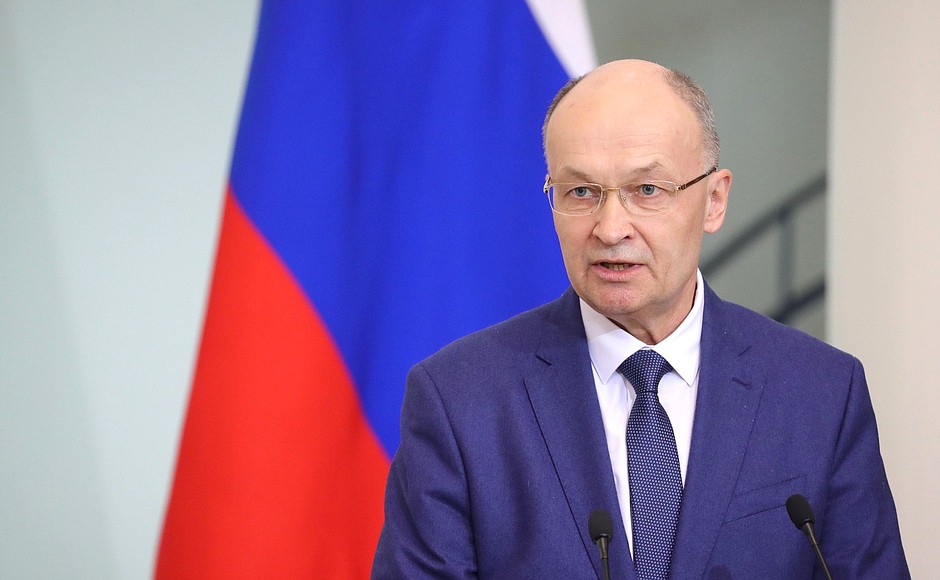 Valentina Matviyenko: …this process will be drawn out to great lengths. I think one of the important conditions for resolving the task you set for a breakthrough in innovative development is clear legislative regulations on intellectual property and commercialisation. We have the Intellectual Property Commission at the Federation Council, which unites the best minds in this area. All of them insist – logically – on the need to draft a strategy on intellectual property, about the need we have been talking about for five years. Today, Russia is the only BRICS country that does not have a national development strategy in this area. This is largely explained by the lack of a uniform state policy on managing intellectual potential. Today, ten federal ministries and departments have competences in this area. But as we know, too many cooks spoil the broth. This is why I would like to address you, Mr President with a request to instruct those in charge to expedite the development of this vital document (serious preliminary work has already been done), and also a relevant law. The said law has already received practically all the necessary approvals, but we have been unable to adopt it for over three years. There are some objective reasons related to the Defence Ministry. But we are already past this stage. Without a strategy, without a law, it is simply impossible to create a competitive market for intellectual rights in Russia that will meet the challenges of the times. I would also like to ask you to determine, sometime in the future Government a uniform control body that will be primarily authorised to draft and implement state policy and legislation in this area. Now, with regard to quality control as it applies to medical care. Of course, much has been done to improve healthcare in recent years. The Ministry of Healthcare and the regional authorities allocated major funds to expand this sector. Today, with the participation of the Minister, Ms Skvortsova, we discussed quality control issues. Today, the quality of medical care has become a matter of utmost importance. The limited effectiveness of insurance-based medicine remains one of the key issues. Vast amounts of money are spent on maintaining funds, insurance companies and intermediaries, which, unfortunately, do little to ensure quality control of medical care, or to protect the rights of patients. No one is proposing to destroy anything or take some revolutionary measures. Nevertheless, it is necessary to develop measures to make the financing system for medical care more efficient. The Federation Council Commission on Regional Healthcare is developing such measures. Many have an illusion that insurance-based medicine is used everywhere. In fact, this is not the case. The UK, Finland, Poland and a number of other countries are using our system developed by Dr Semashko in his time, which involves public funding of medicine, so there are things to think about and work on. The vast amounts of money being allocated must be spent efficiently and ensure the quality of medical services. Mr President, you already mentioned that the most cherished holiday for all Russians – Victory Day – is fast approaching. The Federation Council has reached out to a number of parliaments with an idea to jointly submit an initiative at the UN, UNESCO and other international organisations of high standing to recognise the victory over Nazism in World War II as the international heritage of humankind, and to recognise the monuments to those who fought Nazism in all countries as an international memorial to World War II. This would form a reliable barrier against attempts to rewrite and falsify the history of the 20th century in general and of the Great Patriotic War, in particular. We are getting more and more support in this. In addition, we are promoting an initiative to hold, in conjunction with the UN, a World Conference on Interreligious and Interethnic Dialogue by the Inter-Parliamentary Union. Heads of state and heads of parliaments, as well as religious leaders, could take part in it. Such a conference would help us develop common approaches to this sensitive issue and reduce tensions in international relations. We look forward to the UN adopting a corresponding resolution in May, where our joint initiative with the Inter-Parliamentary Union should be included. We also hope that you will support these initiatives. Thank you. 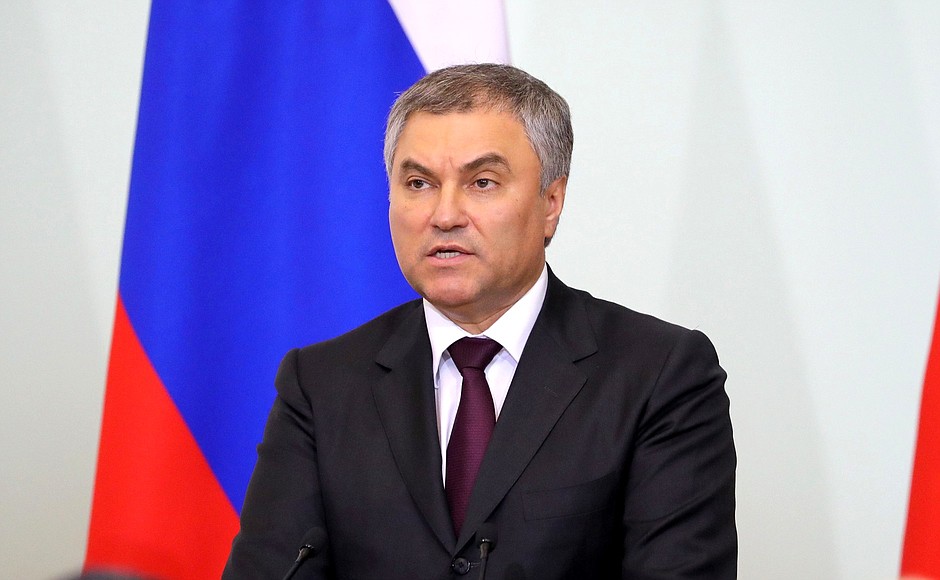 Speaker of the State Duma Vyacheslav Volodin: Mr President, colleagues, In a follow-up to this conversation, I would like to propose a number of approaches we discussed with the State Duma Council deputies. We think that the application of these approaches will allow for a more efficient implementation of the tasks set forth in the Presidential Address. The existing practice is that although the Presidential Address is presented to the Federal Assembly, it is generally considered primarily as instructions to executive bodies. The deputies will then have to wait until the government drafts laws and submits them to the State Duma whereupon their discussion will start. Even after the laws are passed, as a rule, another year is spent on adopting bylaws after which the legislation is passed in the regions. In our view, this hinders the effectiveness of the work to implement the Presidential Address. We do not have that much time to arrange our work like this. In this regard we feel it necessary to make the drafting of laws on implementing the Presidential Address more efficient both at the federal level with the Government and by interacting with the regional legislatures at the same time. First, this would raise the decision-making quality; second, it would speed up the adoption of decisions; and third, it would let regional laws be drafted at an early stage, and ultimately, this approach would create a systematic basis for efficient implementation of all the tasks set forth in the Presidential Address. The State Duma has already set up a working group on legislative support for the implementation of the Presidential Address, a tentative work schedule has been made. About 70 draft laws were selected for priority discussion. To organise the work in a systematic way, we have suggested that our colleagues in the regions think about setting up similar working groups in all the legislative assemblies of the constituent entities of the Russian Federation. Working groups have already been established in ten regions including the Altai Territory Legislative Assembly, the Volgograd Region Duma, The State Assembly – Kurultai of the Republic of Bashkortostan, the Legislative Assemblies of the Tver, Penza and Rostov regions, the Krasnodar Territory, the Republic of Karelia, the Moscow City Duma and the Moscow Region Duma. This will allow us to more efficiently, and with consideration for local specifics, discuss particular questions of legislative support and implementation of the Address, to work on it in dialogue with regional and municipal deputies, representatives of different social areas and the business community. Such organisation and continuous feedback will us to reach a radically different dynamic in this process, and a different quality. Being accountable for our decisions is another important measure of our work. In this regard, I would be remiss not to touch upon another issue, which the President framed extremely clearly in his Address. It concerns the quality and accessibility of medical care, and the dwindling numbers of rural medical assistance centres. Indeed, we have been able to accomplish much to advance medicine in recent years, such as developing a modern system of high-tech medical care that meets international standards. However, serious issues have arisen with regard to primary care, including due to our shortcomings, colleagues, and due to lack of oversight as decisions are carried out. Precisely the representative branch failed to hear the people’s concerns and requests. As a result, many medical institutions shut down due to their perfunctory approach to the matter. The need to restore easy access to primary healthcare facilities was set by the President in his Address. Of course, there will be a programme, and funds will be allocated. However, our goal is not to repeat mistakes. What is important is not just to build and properly equip rural medical assistance centres, but, most importantly, the primary care network will not be operational without medical personnel – without a doctor, a medical assistant, and a nurse. 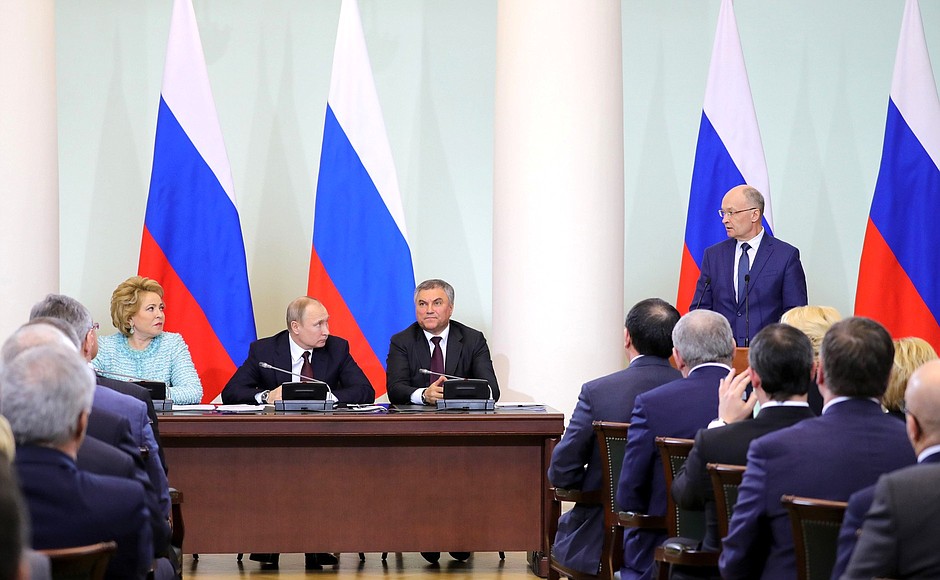 The current shortage of mid-level care providers at rural medical assistance centres and medical outpatient clinics in many regions stands at over 200,000. After the primary network is restored, this problem will become even more acute, especially in rural areas. And so, we recommend paying special attention to this issue, forming already this year a programme for targeted recruitment and targeted training of mid-level primary care providers. These issues would be better heard and discussed by regional legislative assemblies. Achieving the goals outlined in the Address is an undertaking in which everyone’s contribution matters, including the executive and legislative branches, the federal centre, and regional authorities. In his Address to the Federal Assembly, the President raised the issue of returning to assessing the cadastral value of citizens' property in order to prevent it from being assessed above market value. Calculations should be fair, and the cost affordable for people. Corresponding instructions were issued following the Address. This matter cannot be resolved without the regions. It is important to adapt federal laws – you just mentioned that, Mr President – to the local situation and its specifics. After all, the final cadastral value is determined by regional authorities. In this regard, we propose – in conjunction with the groups created in the regions by the legislative assemblies to ensure the implementation of the Address – analysing the implementation of the current version of the law on state cadastral appraisal in various regions. It is important to identify common issues and causes of distortions when determining the cadastral value of property in the regions. This will allow the Government to take the results of this monitoring and, together with our colleagues from the Federation Council, amend the legislation. 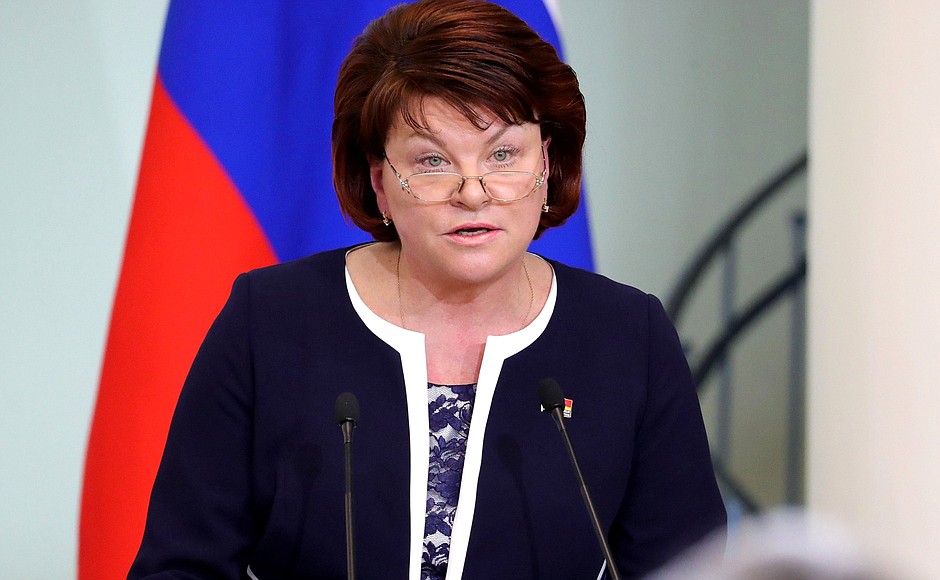 Mr President, In order to raise the efficiency of our representative institutions we need to seek new modern forms of work in other areas, too. It is important for the deputies to immerse themselves in the country’s development agenda, to better feel the problems in the economy, the social sphere and in regional development. This leads to greater awareness of their responsibility and their decision making. A new work format was introduced this week – we had the first on-site meeting of the State Duma Council. It was attended by the heads of State Duma factions, State Duma deputies representing all parties, chairmen of relevant State Duma committees, representatives of the regions and the business community. The meeting was held in the Yamalo-Nenets Autonomous Area in the town of Sabetta. This is the site of a large project that you supported, Mr President, when you were Prime Minister in 2010. Based on that initiative, a modern production facility was created under difficult conditions and within a very short period of time for projects of such magnitude. A new powerful centre for economic growth, the development of the Northern Sea Route and Russia’s global competitiveness are being established. Tens of thousands of new jobs were created not only in Yamal but also in other regions across the country. Our trip to Sabetta was very useful and productive. We saw a lot and heard a lot from specialists. In fact, these were directions for the deputies from the industry, from those who work and explore Yamal and the whole country. There is a clear need to lift barriers and create additional conditions for the implementation of large investment projects like this, which are important for the country. This form of dialogue – discussing the development issues of the regions and industries – appears to be very promising. We are set to continue this work and make this a regular format. We will hold the next meeting, on the issues of diversification of military industrial complex enterprises, with Rostec Corporation. We are planning to work out proposals that will lay the foundation for respective legislative decisions. It would be more appropriate if all bodies of power work more efficiently so their performance factor grows, otherwise even the most urgent decisions and tasks set forth by the President, will drag on. 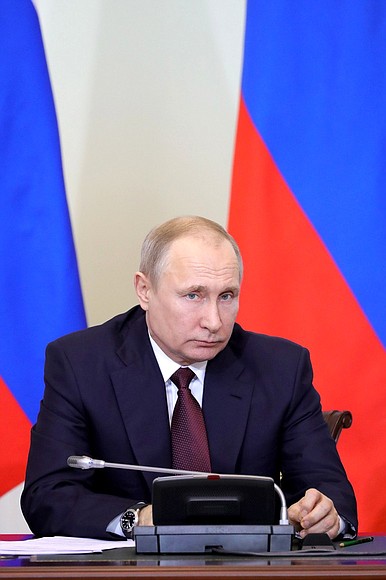 Colleagues, In conclusion allow me to again turn to the day that has gathered us here for a number of years – Russian Parliamentarianism Day. Parliament always means dialogue, a conversation, a discussion on all subjects to find common ground on different issues and ultimately to find the best solution. For this reason, parliamentarianism should not be a set form, it should develop. In this connection I would like to express words of appreciation to our President for everything he has done to promote the parliamentary system in Russia. The source of information - http://en.kremlin.ru/events/president/news/57376 Meeting of the Russian Geographical Society Board of Trustees Vladimir Putin chaired the tenth anniversary meeting of the Russian Geographical Society Board of Trustees at RGO headquarters. April 27, 2018 - 17:45 - St Petersburg 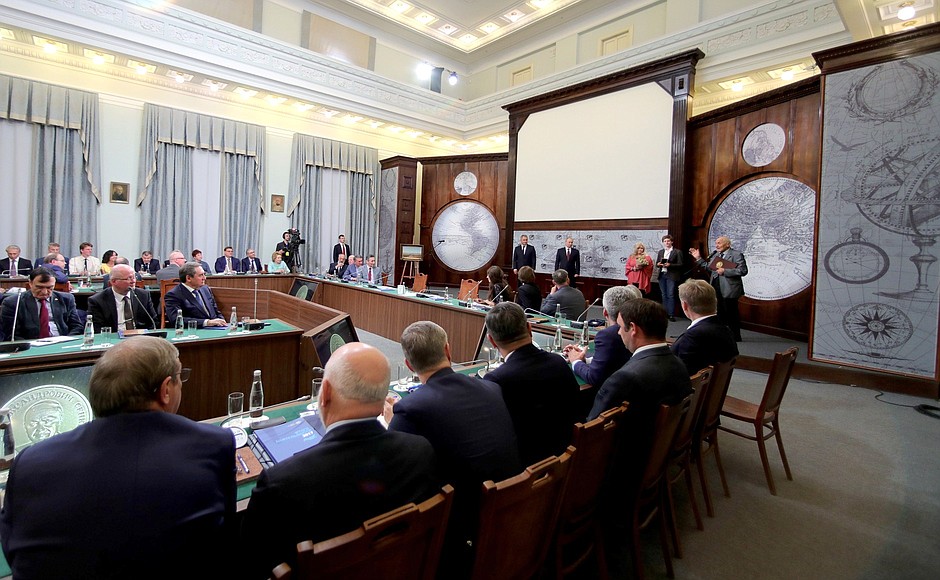 The meeting participants finalised the results of the society’s work over the past year and presented this year’s best projects. The Russian Geographical Society also awarded medals and letters of commendation. 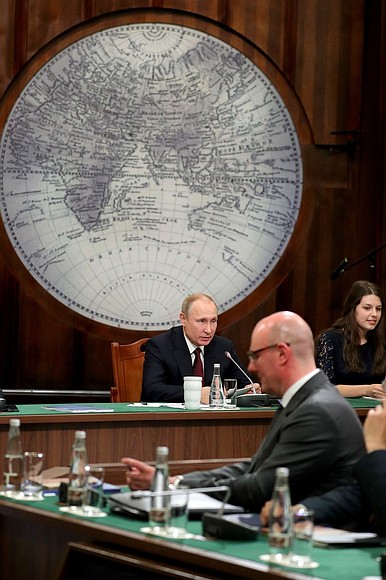 President of Russia Vladimir Putin: Good afternoon, friends, I am glad to welcome members of the Russian Geographical Society Board of Trustees and guests of this annual meeting. We are meeting again at the historical RGO headquarters. This beautiful building is almost 110 years old and for all these years it has been faithfully serving the causes of raising awareness, nature preservation, development of education, culture and local studies. It is good to know that these traditions continue. This place brings together passionate people pursuing certain goals and creates brilliant and popular projects in various areas. I would like to thank everybody who helps to fulfil RGO’s initiatives. It is you who can take credit for its success over the past years. 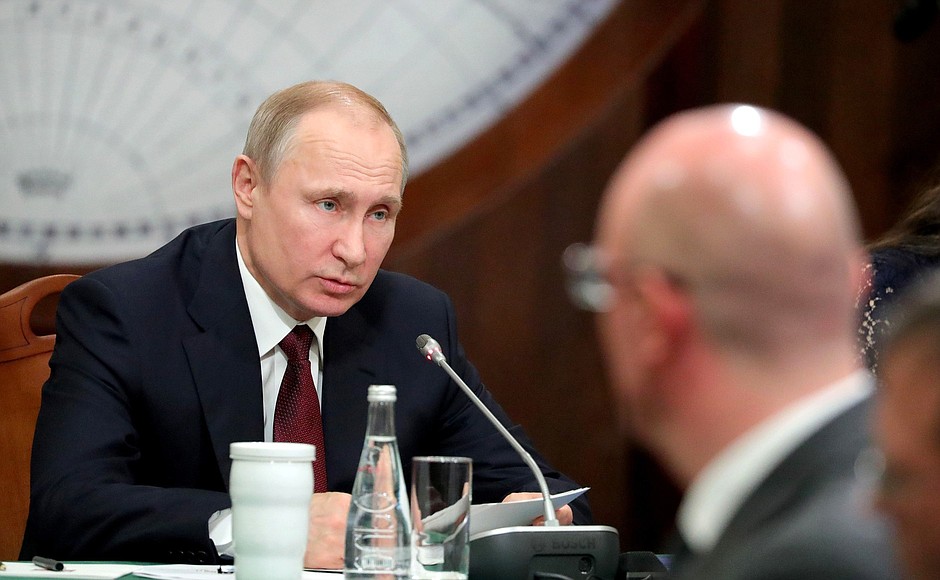 Support from the trustees, members of the Media Council, allows the RGO to be, as they say, in the thick of the country’s public life. I want to note the RGO’s significant contribution to the Year of the Environment that was marked last year. I am certain RGO members and partners will be as proactive during the Year of the Volunteer. Even more so because the selfless and socially important work for the benefit of the country has always been the spirit and the attitude of the Russian Geographical Society. The society’s educational activity is expanding. Lectures, meetings with prominent figures, exhibitions and film screenings have become a permanent part of the cultural scene in many Russian cities. 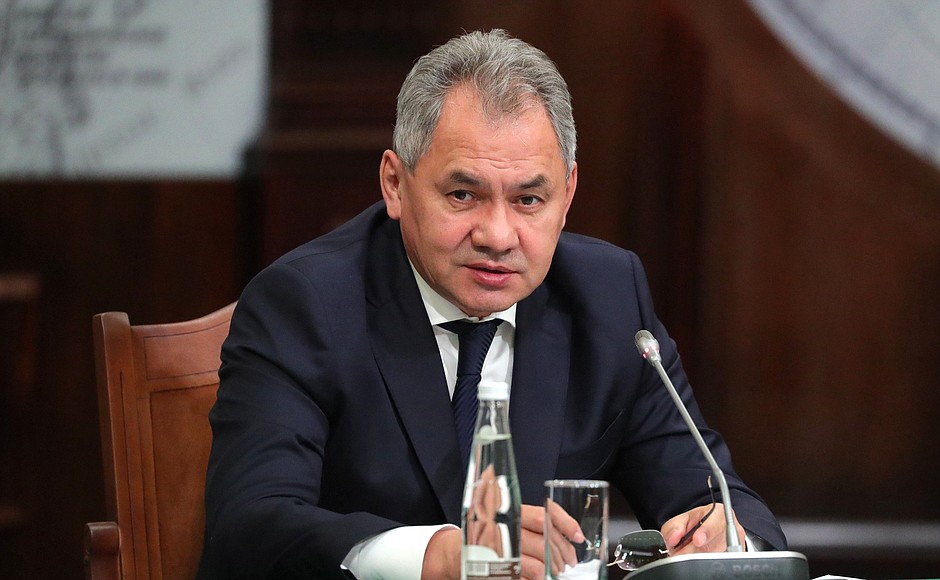 Of course, the Concept of Geographical Education developed by the RGS deserves special mention. Experts and teachers were talking about the need for this and now it is fully ready. I hope it will be endorsed by the Ministry of Education and Science very soon. I consider the RGS initiative to name new streets in Russian cities after our great geographers and travellers to be important. 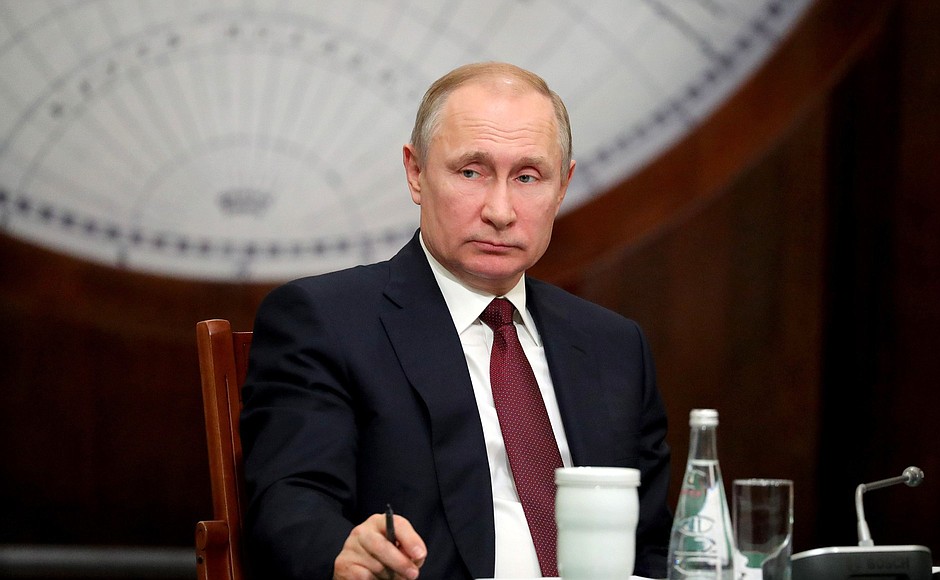 Moscow was the first to respond to this idea. Streets in the southwest of the capital have been named after Dmitry Anuchin, Pyotr Semenov-Tyan-Shansky, Mikhail Pevtsov and Alexander Voyeikov. The memory of other outstanding RGC members – Obruchev, Vavilov, Vernadsky and Miklukho-Maklai – has already been eternised there. A square and a lane have been named after the Russian Geographical Society in Krasnodar. I hope other regions will follow suit. Needless to say, this should not be done casually. Naturally, it is important not just to assign names related to our history to streets and city facilities but also to include some serious educational work, to place plaques with information on the streets about our national heroes and glorious events of the past. 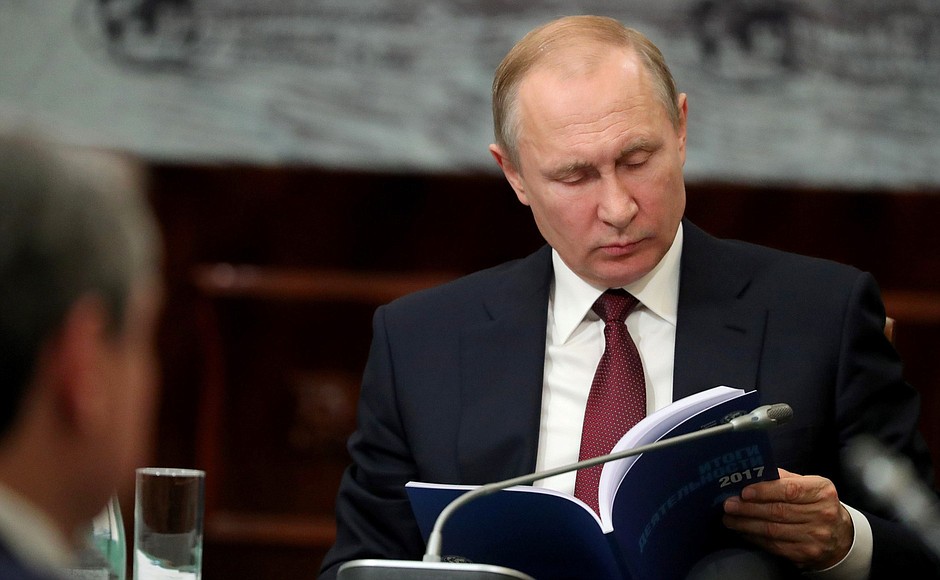 In general, toponymics – names of geographical and other places – require special attention. Today we are facing attempts to gradually remove from the world map Russian names given by our explorers and travellers in past centuries and decades. Let me emphasise that this erases the memory of Russia’s contribution to the exploration of the planet and developments in science. This s particularly striking in the Antarctic where the names given by the discoverers of the continent Lazarev and Bellinshausen have almost ceased to exist. Today very few people know that Borodino is the primordial, historical name of the island of Smith, that Snow is Maly Yaroslavets, Livingstone is Smolensk and so on. Meanwhile, we will celebrate the anniversary of the discovery of the Antarctic in 2020. This is the achievement of Russian seafarers. Examples of name substitution are not limited to the remote Antarctic, some are closer, but I will not dwell on them now. 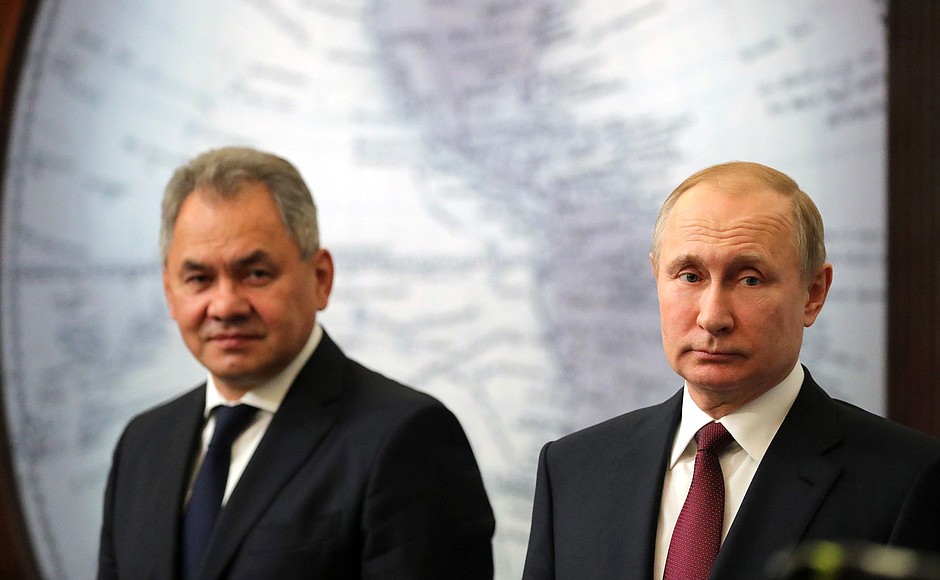 All this is the result, among other things, of the lack of modern domestically made maps. Only foreign ones are in the public domain, and they generally provide secondary names of geographical sites. As such, it is proposed to develop a new Russian Atlas of the World involving the Russian Geographical Society, so that all such cases will be addressed properly. We do not intend to impose anything on anyone, it is not necessary, but we do not have the right to condone or ignore the distortion of historical and geographical truth and justice in this case. 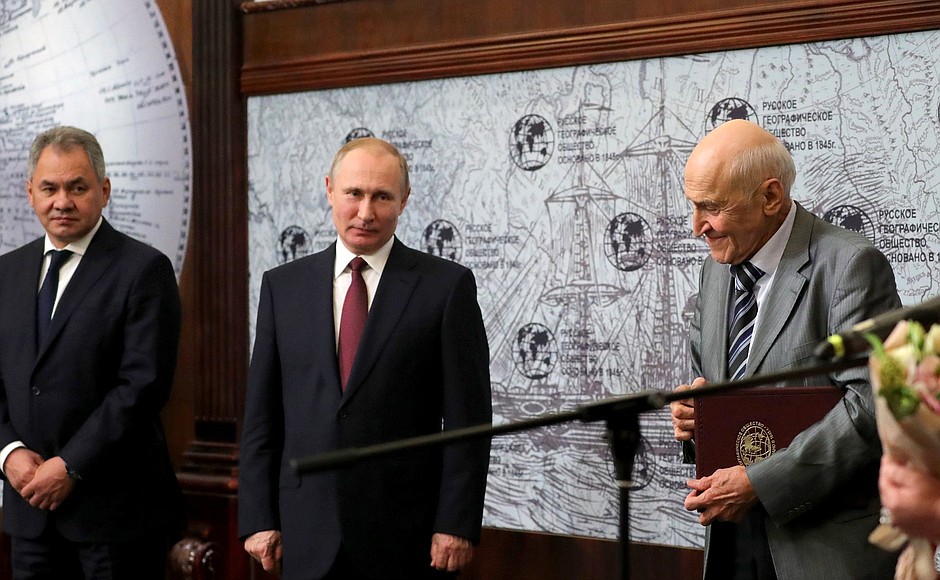 I would ask Rosreestr (Federal Service for State Registration, Cadastre and Cartography) to develop the atlas together with the Russian Geographical Society and the Defence Ministry, which – provided all necessary procedures are followed – should provide access to its cartographic materials for the atlas developers and for travellers, tourists and motorists, including via modern computer technologies. The classification label on many maps is clearly outdated and looks simply archaic. Colleagues, Our goal is to preserve what was done by our predecessors, and of course, to add new names and new amazing events to the annals of the Russian Geographical Society. I would like to take this opportunity to announce the start of the competition for the third Russian Geographical Society Award. 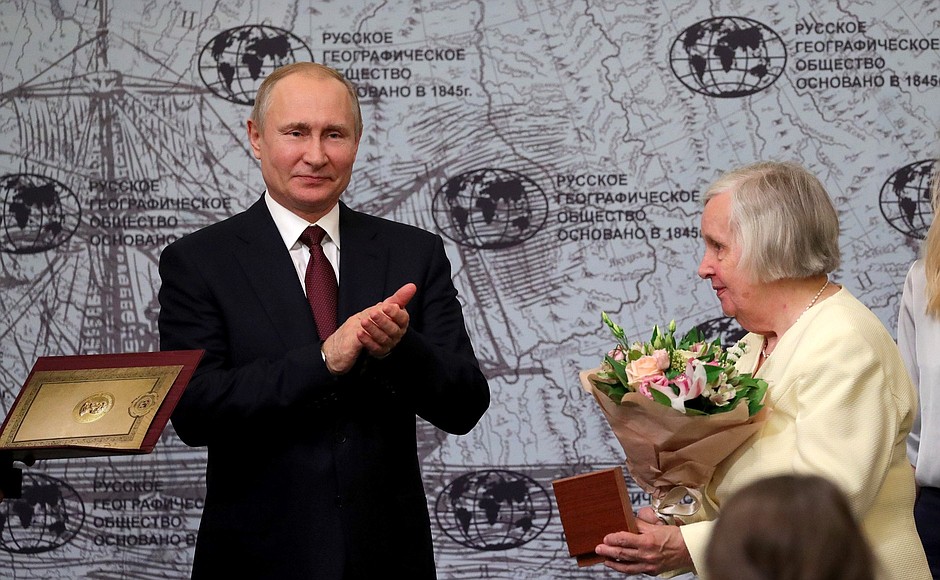 With the support of the Board of Trustees and Media Council, the Russian Geographical Society is carrying out more and more expeditions, educational events and documentary projects on Russia. At the end of the year at the award ceremony, we will learn the names of the best and most worthy of them. We will honour those who devote their lives to studying our traditional heritage, promoting environmental awareness and protecting our native nature. One such devotee is head of the Amur branch of the WWF Russia Pavel Fomenko. Three years ago, he was awarded the Small Gold Medal of the Russian Geographical Society for rescuing tigers. Unfortunately, recently he suffered an accident: one of his charges, a female tiger, seriously injured the researcher. Clearly, these things happen. We wish Mr Fomenko a speedy recovery, and once again I would like to thank all the specialists of the reserve for their selfless work. Of course, we are proud of their work and its results. Thank you very much for your attention. Let us begin. 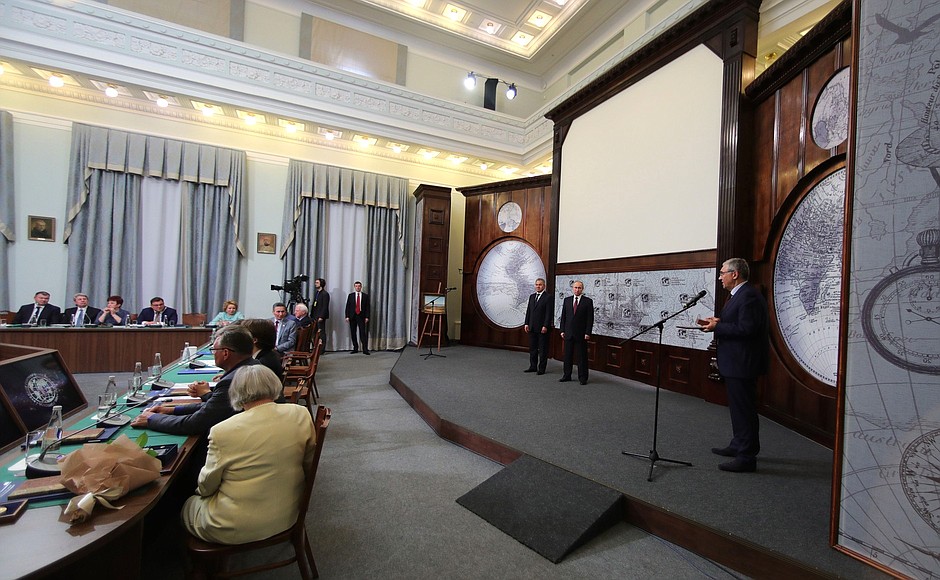 <…> Vladimir Putin: Colleagues, let me thank you all for the work you are doing together. I want to emphasise once again how important it is, and I am very pleased to note that we all do this work with pleasure and get satisfaction from it. We also conducted informal on-site activities. We will think about this and meet at some interesting site we are working on, where we can talk about what else can and should be done in addition to completing the tasks set by the Russian Geographical Society. Thank you very much. The source of information - http://en.kremlin.ru/events/president/news/57377
__________________
Where should they dig the Very Deep Pit? Piglet said that the best place would be somewhere where a Heffalump was, just before he fell into it, only about a foot farther on. (c) Alan Alexander Miln |
|
|
#819 |
|
Senior Member
|
Plenary meeting of the Russian Rectors’ Union Congress
Vladimir Putin visited Peter the Great St Petersburg Polytechnic University and attended a plenary meeting of the 11th Congress of the Russian Rectors’ Union. April 26, 2018 - 18:50 - St Petersburg 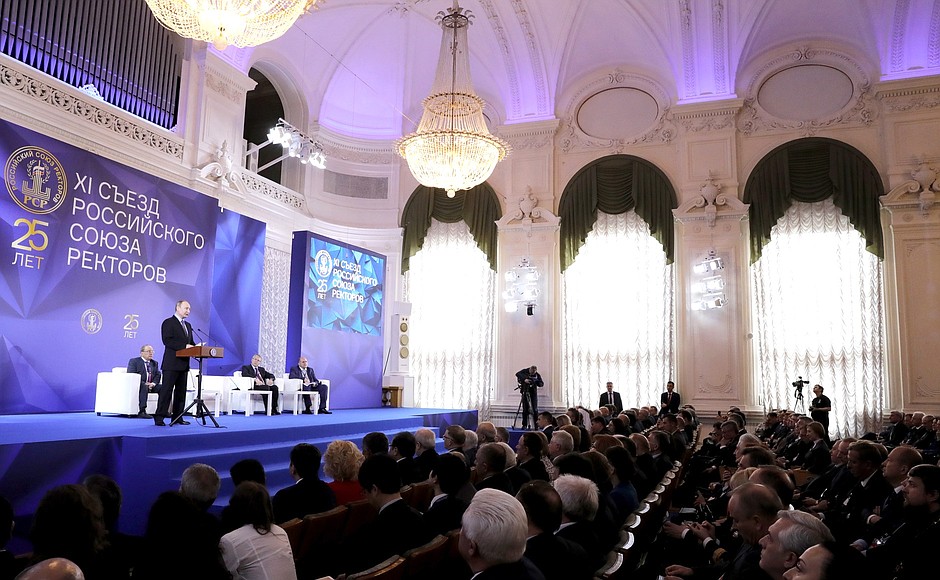 Some 600 rectors from Russian and international universities have come to St Petersburg for the Russian Rectors’ Union Congress to discuss the development of a common education space and Russia’s scientific and technological development strategy, as well as universities’ cooperation with general schools and society, and Russian universities’ international activities. After the plenary meeting, the President visited the Research Building at St Petersburg Polytechnic University, saw the university’s advanced R&D products and a miniature model of the technology valley being created on the basis of the university. President of Russia Vladimir Putin: Good afternoon, friends, colleagues, Mr Sadovnichy, I am happy to welcome all of you to St Petersburg Polytechnic University, which Sergei Vitte founded at the time of Russia’s rapid industrial and economic growth, the so-called first industrialisation period at the turn of the 20th century when the country badly needed its own technology and forward-looking professionals. As the rector told me, the best period in the university’s history was when its Board of Trustees was chaired by a finance minister. Today, here at this outstanding university, I propose discussing the goals of universities at the current development stage and exchanging opinions on what universities can and must do to achieve technical breakthroughs that can propel Russia forward, something we have been talking about a lot lately. From the very outset, let me make it clear that I would like to hear not just what challenges you face, but also specific, substantial proposals. Of course, it is natural to highlight issues that may exist, but I hope that you will focus on specific proposals. Starting from the year 2000, government spending on higher education in real terms has increased more than four-fold. Let me emphasise that I am speaking about an increase in real terms. From 2000 through 2016 spending on higher education from the consolidated budget went from 24.4 billion rubles to 523.3 billion rubles, which is equal to a 4.2-fold increase in real terms. These funds went toward increasing salaries for faculty and researchers, creating laboratories and research centres within higher education institutions, and some of them recruited leading international researchers. All these efforts are already bearing fruit. I would like to note the growing contribution by universities to research, new technology development, to implementing and training qualified personnel for projects at various levels, ranging from national to regional and municipal initiatives. We see that Russian universities can actually deliver, which shows us that change is underway, and we must make sure that this trend gains momentum. Colleagues, Sergei Witte, whom I have already mentioned, said that a well-thought-of university is the best mechanism for promoting research. Today, this message rings as true as ever. Of course, we have the unique framework provided by the Russian Academy of Sciences and its institutes, and we are proud of it. That said, promoting research within higher education institutions is what Russia, the national economy and all other sectors need. Let me emphasise that research cannot be limited to just a few academic centres or regions, or develop in isolated clusters. This is a critical point for Russia, taking into consideration its vast, boundless territory and unique human potential. Let me reiterate that universities and other higher education institutions across the country are expected to evolve into hubs of technology and human development, and serve as economic development drivers for economic sectors and regions. Universities should be at the core of a community of people eager to achieve a technological breakthrough. In this connection, I think that we need to develop regional models to facilitate interaction among innovators, high-technology companies, enterprises, and of course a university can provide a foundation for creating platforms of this kind. And, of course, it is necessary to create a comfortable environment for technological entrepreneurship throughout the country. It is important for our universities, businesses and academic institutions to pool their efforts for implementing large-scale technological tasks and working in the long-term priority areas that were outlined in the Address to the Federal Assembly. These are primarily breakthrough changes in the living standards of our people and our economic and social development. To achieve this, we will need new medical, industrial, digital and other technology, as well as advanced and effective decisions on environmental protection and the creation of a comfortable and safe environment in cities and other residential places. In a word, we will need unconventional ideas and innovation in all areas. We will certainly continue supporting the universities that are active and successful in research. We will continue upgrading their technological and instrumental plant and facilitating the involvement of our compatriots and leading scientists and professors from abroad in this work. This is the point I would like to make here. 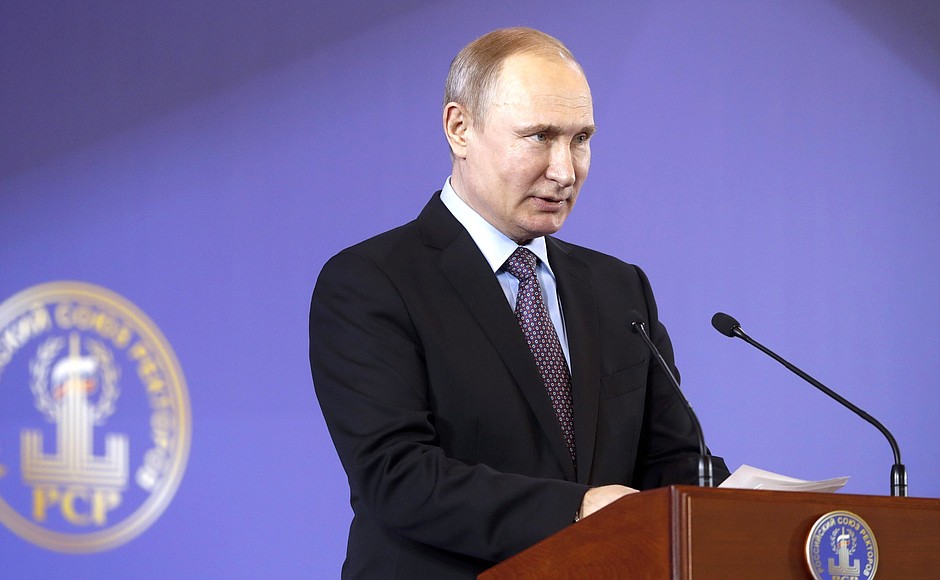 The Russian system of higher education has already formed a core of very strong universities and other higher schools. Naturally, this applies to Moscow State University, St Petersburg University, and federal and national research universities. A network of backbone higher educational institutions is being established in the Russian regions. However, along with this, many universities in capital cities and in the regions often fail to demonstrate their ability to resolve serious tasks and are not ready to meet the global changes that are taking place in science and technology and in all areas of life. Attempts to change the situation are often reduced to wishful thinking and more programmes that, let’s be straight, are fairly speculative and divorced from reality, and to requests to simply give them more money. It is no accident that I recalled Sergei Witte as the finance minister. Of course, it is great to lean on the Finance Ministry. This is clear. But it is also clear that the problems go beyond funding. The main role is played by a competent, modern approach to organising this work and, of course, by the personnel. I would like to ask the Russian Rectors’ Union and our leading higher education institutions to continue working on effective mechanisms for upgrading the professional level of the scientific and teaching staff at domestic universities. I will also briefly discuss our graduate school system, the purpose of which is precisely to train staff for higher education institutions and academic research. How is it possible to resolve any of these issues, if only 14 percent of graduate students defend their theses in a timely manner? What are the rest doing? What are their accomplishments? Where do they continue their activities? Do they eventually defend their theses? And while lots of PhD and DSc dissertations, especially in the humanities, are defended, if you look at their academic significance, questions often come up. Here is what I have to say about that. We have a good practice of open competition to distribute grants, including for young researchers. If a graduate student or his/her supervisor has serious plans to engage in research, rather that obtain a degree for the resume, let them take part in such competitions and submit work on the priorities of our country's scientific and technological development. I would like to emphasise once again that it is critically important for us to concentrate resources on supporting talented and goal-oriented researchers and teachers, to create an environment where the best Russian and foreign, and primarily young, researchers and promising graduates of universities seek to find employment with Russian higher education institutions. A really good institution of higher education not only gives its students knowledge and skills, but trains professionals who will be able to set the intellectual, scientific and technological agenda for the development of the entire country. The aspirations of undergraduate and graduate students to create and find applications for their own R&D products should be encouraged. At the same time, universities can train entire project and design teams that are capable of developing complex engineering and technological systems. I remember how long we argued, and eventually made the right decision about creating small enterprises, primarily, high-tech, at higher education institutions. I believe we made the right decision in the end and decided to drop unnecessary administrative window dressing. However, we need to further develop these areas. I think the right thing is to create the best conditions for start-up businesses at universities, as they can be the first step to creating successful high-tech companies. You know, it would be great if you could get this kind of work underway. Then, this sphere would be developing widely throughout the country, which is extremely important. Our youth have great potential to do so, by the way. I would like to take this opportunity to congratulate the Moscow State University team on their recent impressive victory in the ACM International Collegiate Programming Contest. Where is the applause? (Laughter. Applause.) This applause is meant for the students. I think they deserve it. As you may be aware, in April of 2018 Russian students won the ACM International Collegiate Programming Contest for the seventh straight year. In total, this is their 13th victory since 2000. I propose to start an additional programme to build student campuses so that talented and motivated young people, regardless of their place of residence and their parents’ income, would have opportunities for higher education. We must by all means build modern comfortable campuses. (Applause) The new Government, regional authorities and universities must thoroughly work out all aspects of this programme, in great detail. Of course, there is always the financial factor but we must find money for this project. It is the new Government’s job. Next. We need modern approaches to developing a common education space. The current trends in the economy, science and labour market require that young people have an opportunity to chart their own education trajectories, and to gain and integrate knowledge and skills from different areas. Therefore, we need to eliminate barriers between different levels of education. A gifted school student, for example, could take university courses or participate in research alongside postgraduate students. A vocational student could enter an applied bachelor’s programme. 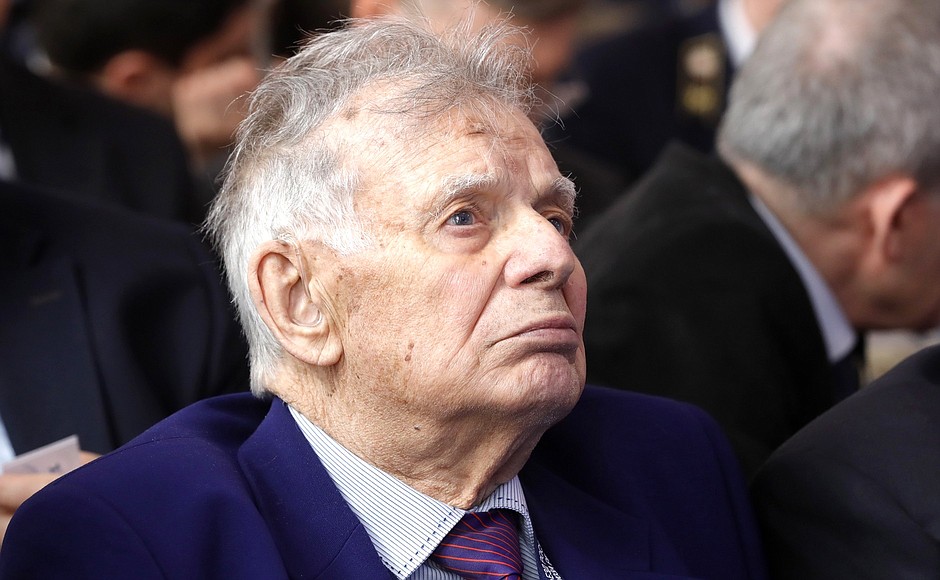 I want to say that Mr Alferov already built a similar environment. I saw it a long time ago, it is wonderful, enviable. I think many colleagues could learn about Zhores Alferov’s experience. Thank you, Mr Alferov. (Applause) There is another point I would like to make in particular. Within the next few years, we are to significantly improve the quality of the entire Russian education system. I am talking about improving academic programmes along with raising the qualifications of teachers at pre-schools, schools, colleges, vocational schools, further development of extracurricular education and the career guidance system, talent search and support. I expect that universities will be actively involved in this large-scale effort on which the future of the country and the success of the entire youth generation depend, without doubt. Colleagues, we are setting some very difficult tasks for Russian universities and expect they will be improving their performance and competitiveness, getting rid of outdated and moribund approaches. Once again, I want to repeat that Russia needs a strong, future-oriented higher education system. Only this way we can achieve a breakthrough in national development. Thank you. 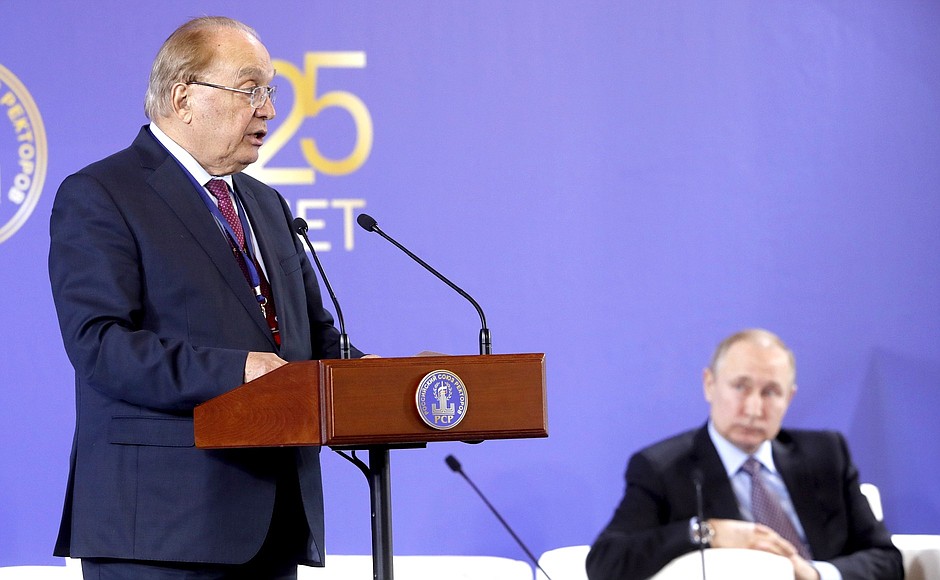 Rector of Lomonosov Moscow State University Viktor Sadovnichy: Mr President, colleagues, We met here at the 11th Congress of the Russian Rectors’ Union. About 600 rectors and presidents of Russian universities, as well as the rectors of universities from Abkhazia, Armenia, Azerbaijan, Belarus, China, Iran, Japan, Jordan, Kazakhstan, Lebanon, Slovenia, South Ossetia and Transnistria – about 50 foreign guests – participate in its work. Welcome to our congress, colleagues. Again, we are honored by the presence of President Vladimir Putin at our congress. We are grateful to our President for his constant attention to education in our country and his direct participation in meetings with rectors and other representatives of the education system. These meetings have become a good tradition. Mr President, thank you once again for joining us. Vladimir Putin: Thank you for your warm welcome. Viktor Sadovnichy: Five panels were held before our meeting. Their participants discussed university education. The panel moderators will report on the results of these discussions. During the past 10th Congress of the Russian Rectors’ Union, you, Mr President, raised a number of issues that are important for higher education. You issued a number of instructions that are important for the country in general. They concerned an independent assessment of the quality of education, creating national university rankings, and using federal property assigned to higher education institutions under operational management rights. There were a number of instructions concerning the affairs of universities and the activities of sports clubs. Over the past period, Russia’s rectors and universities have done a certain amount of work, and I'm pleased to announce that these instructions have been carried out, and I will focus on some of them in more detail. I would like to briefly go over one of your instructions, Mr President, which is related to upholding the interests of the Russian education system and its international position. It is about creating independent international university rankings. The Russian Rectors’ Union developed and created the Moscow international ranking entitled “Three Missions of a University.” That includes education, science and society. Significantly, after developing principles for assessing the performance of international universities, we invited over 20 experts from different countries. There were experts from Canada, the United States, Britain, India, China and others. They studied and supported our approach. The ranking is up and running, and it has been compiled. According to it, the top 100 universities include those from 39 countries, with 13 from Russia. This is significantly different from the results obtained by other rating agencies. By offering an alternative assessment of the Russian education system, we showed that it is really of high value. The Moscow international rankings, Three Missions, has already been recognised around the world. It offered its rules on a field where until now the game was played by other rules and, accordingly, prizes were awarded in a different manner. Colleagues, what is Russia’s university education system today? It comprises over 800 education organisations including two traditional universities, 10 federal and 29 national research universities, 17 of which focus on engineering. It comprises 260,000 professors and lecturers and almost 200,000 specialists in top qualifications – PhDs and Doctors of Sciences. It boasts 4 million students and 83,000 post-graduate students out of the total number of 92,000 post-graduate students in Russia. Thus 90 percent of graduate schools are at universities. This means a huge intellectual potential. And the most important thing is that this potential is constantly enriched by young and talented students and post-graduate students. Our organisation, the Russian Rectors’ Union, has been in place for 25 years. Throughout that time it has become an indispensable part of our education system. We are actively involved in legislative activities, interacting with the State Duma and Federation Council. We discuss many draft laws, which are reviewed by the Rectors’ Union. We have regional councils of rectors who also hold their discussions. We interact with leading state corporations, employer associations and businesses. We continue to expand our system of intellectual competitions among children and youth to find talented young people. Over 2 million schoolchildren, starting with first-graders, take part in the academic schoolchildren contests we hold each year; this is a powerful system of intellectual competitions. Numerous public organisations, Russian student construction teams, a football league, and athletic associations have been established with our participation. We are now supporting an important programme for volunteer projects and socially significant initiatives. Of course, I have not listed everything; it would take too long. But today we are not just looking back, which hasn’t been an easy road. We have gone through difficult trials, not without achievements and success. We have faced crisis periods, and we haven’t succeeded in everything. There are problems waiting for solutions, and some of them seem formidable. But it might be appropriate to quote Confucius here who said, “When it is obvious that the goals cannot be reached, don’t adjust the goals, adjust the action steps.” So the 11th Congress of the Russian Rectors’ Union is called upon to draft an action plan for the future. Our plan is also a response to the challenges life has confronted us with. They are of various scales, yet none of them should be left unanswered. They are global challenges in the information society, such as the advent of the digital era. They are tasks which are urgent for our huge country (Mr President talked about that) with consideration for current geopolitical conditions. And they are also professional tasks related to our community, our work. I will start with global things. The information revolution has the most direct bearing on our core activities. Today, one cannot talk about developing education without accounting for this factor. We live in a unique period of human history. The mathematicians have a term to describe it – singularity. It is about how our technological and social reality is changing at higher and higher speeds, but in increasingly less predictable ways. The environment around us is becoming increasingly digital. A report released last year by the international expert group, Digital McKinsey, entitled “Digital Russia: New Reality” noted that the digital economy in Russia is growing rapidly. It grew 8.5 times over from 2011 to 2015, which is faster than the growth of Russia’s economy in general. This growth of the digital economy accounted for a quarter of GDP growth in our country. However, the potential has not been fully tapped yet, and we must use it. Speaking at the St Petersburg economic forum less than a year ago, you, Mr President, said, and I quote: “The digital economy changes the format of education. It is imperative to seriously improve the education system at all levels from school to higher education.” And then you raised the question: what do these changes mean for education, young people, and us? Indeed, the very philosophy and even the ideology of education is undergoing critical changes right before our eyes. It is about what to teach and why. After all, occasionally we do not know what professional knowledge or skills our future students (Generation Z) will need, since they have been perfectly adapted to the modern technological environment since childhood. Clearly, we must give them the basic fundamental knowledge which they will use to engage in professional activities which we do not even know about today. These are completely new goals in the sphere of education and career guidance. 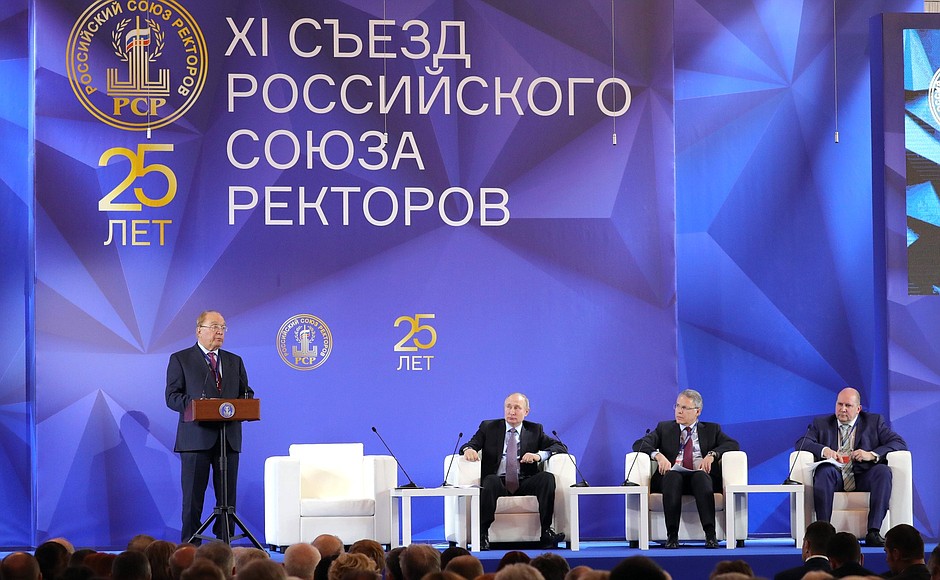 Our conclusion. The most important thing is to teach people how to learn and how to think. Fundamental knowledge is key. How should this be done? What is the role of the teacher today? The philosopher and teacher John Dewey, who lived almost 100 years, once famously said: “If we teach today’s students as we taught yesterday’s, we rob them of tomorrow.” Let’s continue with the questions. What should the textbook be like? It is clear that we need to use new digital formats in education, including hyperlinks, infographics and interactive text. But how can we deny Gutenberg’s legacy? And, do Shakespeare and Pushkin live better in a book than on a computer screen? Let’s not forget the recent Biblionight in Moscow, when 70,000 people went to libraries and bookshops on a single night, because they love books, which remain an unconditional value. At the same time, three quarters of all students spend time deep in the digital environment. What is it filled with? Questionable products or reliable and reputable sources created by leading professors at leading universities. Should we just abandon the teacher and the mentor, especially in an educational role? Knowledge is not the only thing we receive from our teachers; we are also working on pedagogic skills. We adapt a manner of speech as well as techniques and pass them on to our students. What measures should Russia take to train people for the digital world? The Government has adopted the Digital Economy programme. In 2020, higher schools must prepare 80,000 such specialists, and in 2024, as many as 120,000. This is, of course, a strategic goal. How should it be resolved? I would single out two aspects here: infrastructure and personnel training. Regarding infrastructure, I would like to say that we have quite good and up to date equipment; we have received and are receiving a lot of support. For example, we rank high in the supercomputer race: three Russian supercomputers, all of them at universities, are included in top international supercomputer rankings. Moscow State University’s supercomputer, designed by T-Platforma, is among the leaders. Today, this year, its capacity has reached five petaflops. The second most powerful supercomputer also belongs to Moscow State University and the third one is here, at St Petersburg Polytechnic University, which is our welcoming host today. It is crucial that ten years ago the supercomputer consortium of Russia was set up under the umbrella of the Russian Rectors’ Unions. It incorporated 62 members, 47 universities and also institutes and academies. Throughout all that time the consortium has been in fact a vehicle of the digital economy. It conducts work on digitalisation, including such an important topic as creating digital doubles which is currently a priority of technology proper. And for your information I will say that last week the US Government approved the budget of the programme for an exaflop computer, and they allocated 1.8 billon dollars to that programme. So the race goes on. But we have our own resource: we are stronger, we are ready to take up the challenge; we have the people and the brainpower. It is important not to cede the way. Actually, mathematicians have calculated that, according to Moore’s Law on the exponential growth of calculating capacity, the speed of computers in the twenty years from 1992 to 2012 increased by 8,000 times. But in the same interval, computers aside, the speed of calculation increased by 400,000 times thanks to advancements in mathematics. As we see, the effect of mathematical progress is more powerful than the effect of advancements in computer technology. I have given you this data in order to emphasise the significance of mathematical education – which our President also referred to – as the cornerstone of fundamental university education in this era. Russia has strong mathematics schools. And quite recently the Moscow State University team won first place and became the undisputed world champion, while the teams of the Moscow Institute of Physics and Technology (MIPT) and the St Petersburg University of Information Technology, Mechanics and Optics also got awards. I think such university contests should be streamlined in terms of organisation, and the Rectors’ Union is ready to lead the work on organising all international student contests. So far this work has been done at someone’s initiative only. Education quality depends primarily on the abilities of the teaching staff and their level as researchers. Education in Russian universities is intricately connected with research. Enormous research capacity is concentrated here since university professors are also researchers, they carry out important scientific research. And according to the Web of Science, in the past year, of the 50,000 scientific articles published by Russian authors, 22,000 articles were published by university researchers, which is practically half. This demonstrates our enormous potential. However, today the goal to translate research results into new technology is more important than ever. Last year, the federal law On the Innovative Scientific and Technological Development of Education and Research Organisations was adopted with cooperation from the Rectors’ Union. This law allows universities to establish innovative scientific and technological centres to implement scientific and technological development priorities, increase investment attraction and commercialise the research results. It is important to create all possible conditions at these centres to support university scientists’ creativity based on fundamental research to achieve breakthroughs in high technology. We must take a leading position in this field as well. The research and technological infrastructure at Russian universities has improved significantly lately. As of today, 582 collective-use centres have the latest equipment, with 343 unique installations. In addition, more than a half of what I mentioned is in university system. Of course, universities need to cooperate, and they do cooperate successfully with the Academy of Sciences. This is our common treasure. Of course, the development of universities, including scientific research, demand large investment. There are various estimates by liberal economists on the amount of such investment. But what is important? That we should not fall behind the world’s leading universities, and they, as we know, manage large sums of money. These are mostly investments coming from businesses. This is regular practice there, they have huge endowments. That said, we are not using the possibilities of public-private partnership and, what’s more important, partnership with businesses, as much as we should. This is also our common goal. Mr President, I would also like to talk about postgraduate studies. We saw that 90 percent of postgraduates study at Moscow State University. I am concerned that today postgraduate studies are the third education level, while in the past it was academic personnel training. The goal of postgraduate studies is to bring up academicians and get them to know the field and the school, so that a young person will immediately become an academician. But now it turns out that we have lost the quality of postgraduate students training. We agree with what you have said. There are various ways to improve the situation, but I believe that one of them is to return postgraduate studies to the previous scientific path. We discussed this with Alexander Sergeyev [President of the Russian Academy of Sciences] and I believe this is our common position. And, of course, postgraduate studies should have a targeted form of training that businesses or lecturers can encourage with grants. There are some postgraduates who cannot earn money while studying, no matter how hard they try, such as abstract mathematicians or biologists. It seems to me that the issue of increasing scholarship funding, which currently stands at a little over 2,000 rubles, is a serious need, as well as attracting businesses and targeted training. Of course, we believe that professionals need to address this matter. I will now say a few words about nationwide goals. Russia is a major power and the world’s largest country in terms of territory with very many unique cultural and socioeconomic features. This is a vital advantage of the Russian culture, which comprises and is a synthesis of both Western and Eastern world outlooks. Russia is an organic combination of numerous nationalities, religions, ethnic groups and peoples. The Russian language is playing a key role in this unity as a cementing factor of our nation. We must always pay attention to this national wealth. At the same time, we do see a certain imbalance in the development of the regions in the vast territory of our state, an imbalance that also affects our universities. It is obvious that our universities cannot have equal potentials and equally developed infrastructures, but all of them must graduate good professionals who are needed in their regions. Our young people must be able to realise themselves in the regions where they receive university education. Taken together, this must help to preserve the country’s unity and integrity. There is a group of Russian universities with world-class research and education standards, as well as with a corresponding faculty. We believe that there are between 30 and 40 such establishments. But there must be more of them. Given the scale of our country, there should be 150 such universities. This must be our goal. The question is how we can enhance the capacity of regional universities. The Russian Rectors’ Union has proposed the creation of research and education consortiums or clusters. For example, a parent university from the group of leading schools should assume obligations on a subject of concern for the given region, helping to organise respective branches and laboratories at this region’s universities. These leading and regional universities should prepare research projects, monitor post-graduate students, create a research school and research environment in the given region, as well as create conditions for supporting the young researchers who graduate from local universities. I propose that we name this programme of research and educational mobility after Vladimir Vernadsky, to celebrate a scientist who created research teams at a number of universities in what was then a great country. So, the Vernadsky Programme. It will naturally require funding for supporting regional universities. However, if our objective is to bring about steady and sustainable development for the region, which is a major challenge the country is facing, we need to find the means for delivering on this objective. Let me quote Gandhi, who said: “Find purpose. The means will follow.” Some resources could be invested by the regions themselves, since the regions must be interested in this initiative. There is also place for business investment from the industries operating in the regions. The innovation infrastructure created in the regions (business incubators, parks) could be put to a better use. If all these elements come together and are provided to the regional universities, this could serve as a good foundation for students and postgraduate students studying new technology to undertake projects that are relevant for the business, as well as projects in social sciences. By the way, talent search could become a separate, less daunting task if we think about it as a way to drive regional development. This would mean finding young talents in the region, putting them on the right educational trajectory and supporting them. Can it be that moving to Moscow or another city would not be necessary in this case? What we offer is different. We want to provide assistance and create an enabling environment in the regions. For that we need to establish specialised schools like Sirius, secondary schools at universities, as well as techno parks. Universities could provide a foundation for creating educational clusters. We need to merge the potential of schools, vocational training and higher education institutions in order to provide better career guidance and training. Of course, this programme mostly targets the regions, but we are ready to back it with the intellectual resources of the leading universities and stand ready to preserve and strengthen national unity. Universities must come to schools. This message has several meanings. First, young teachers with quality training and a positive attitude must come to schools in remote and rural areas. It is up to us, universities, to develop training programmes for these teachers taking into consideration what has been said about the current priorities in the development of education. We have experience of this kind. We hold conventions of teachers in specific subjects to enable university faculty members and teachers to exchange experience and discover new insights. All these efforts should be part of a single educational space, meaning that the regions, and Russia as a whole, should benefit more from them. Colleagues, Our country is part of the global science and education community. Universities are becoming more and more actively involved in international cooperation. The forms of cooperation and the academic mobility of scientists, professors and students is increasing. Joint projects, degree programmes – we know all that. Demography is an important factor that influences the education situation in the world. The number of young people in developing countries is growing much faster than in developed countries, Russia being one of them. From the global demography point of view the distribution of universities across the planet is not right. The population in the highly developed countries of North America and Europe is ageing fast whereas the young population in the developing countries of Asia, Africa and Latin America is burgeoning and knowledge-hungry, as highlighted by the Youth Festival, but there are few universities there. This situation favours the export of our education, which has great potential. We have huge potential. In recent years our community, aided by the state, has accomplished a great deal in expanding the range of services. For example, in 2000 Russian universities had a mere 54,000 foreign students, in 2010 there was three times that number (150,000) and in 2017 they had 244,000 students. Such mobility is very important, and it must be increased. It is not only about economics and increased revenues; the non-financial, human capital is important. The relations among classmates, students from various countries and future colleagues and friends endure. This is priceless capital. The number of leading Russian universities’ branches abroad has grown. The first joint Russia-China University opened in Shenzhen in 2017. Mr President, thank you for approving this idea. The branch is operating. Rather, not a branch but a cooperative university. Also very important, Moscow University opened the first branch in a NATO country, Slovenia, and it works. In 2017 we created an Association of Foreign Graduates who have stayed to work and live in Russia and they are very helpful in the export of our education system. Mobility is not only a unique thing to do with students. Rectors are also rather mobile too. Here are facts to prove this. Over the past three years, we held 13 – thirteen – international forums for rectors, which attracted about 2,000 Russian and international university rectors who discussed current education matters. Several international associations have been established in that period under the patronage of the Russian Rectors’ Union, including the Association of Classical Universities of Russia and China, the Association of Leading Universities of Russia and the Islamic Republic of Iran, the Association of Universities of Russia and Japan (you attended the signing of an agreement on its establishment in Japan) and the Association of Universities of Russia and India. One more interesting association has been created recently. In February of this year, we went to Beirut to establish a federation of university rectors of Russia and Arab countries. This federation now comprises rectors from 40 Russian universities and 44 universities of Jordan, Iraq, Lebanon, Syria, Algeria, Somalia, the United Arab Emirates, Yemen, Egypt, Oman, Kuwait and Palestine. During that trip to Lebanon, we opened a Russian school in the Beqaa Valley on the border with Syria. Its 500 pupils will study the Russian language. Russia has helped repair the school and supplied equipment for Russian language classes. I am pleased to say that Professor Sultan Abu-Orabi Al-Adwan, Secretary General of the Association of Arab Universities, is attending our meeting. The Association comprises 150 Arab universities. We carry on our international cooperation. In two weeks, we will go to Sapporo for a regular Japanese-Russian Forum of Rectors. Colleagues, I am about to conclude my report. Ours is a very interesting and responsible profession. We are nurturing our future, and every one of us can say what Mendeleyev used to say, Teacher’s pride is in his or her students. We have a lot to be proud of. Education and research professionals, we have students around us from morning till night. We know that they are active and open to innovation, talented, ambitious and ready to undertake new projects and implement their ideas. The Lomonosov international conference of students and young scientists, which was first convened 25 years ago, has been attended by 300,000 talented young people from 75 countries. Mr President, following your address at the 19th World Festival of Youth and Students in Sochi, I proposed the creation of an international union of young scientists on the basis of the Lomonosov conference. I am happy to report that we signed a memorandum on its establishment at Moscow State University on April 12. These young scientists will work on two projects: environmental analysis and big data analysis. The students from different countries who established this union are in this room right now and I would like to ask you to stand up so we can see you. Thank you to all of you, young people. The International Union of Young Scientists is our project. It has been established in Russia, but its goal is to promote research, friendship and cooperation among young people throughout the world and to create a common future for all of us. I would like to conclude my speech by wishing our young people as well as our universities every success and thanking you all for being here. Colleagues, as I have said, we have held a meeting of five sections, each of them comprising between 150 and 20 people. Their moderators will report to this conference about the results of their discussions. I would like to ask Mr Alexandrov, rector of Bauman Moscow State Technical University, to tell us about “The role of universities in the scientific and technological development of the Russian Federation.” Mr Alexandrov, please go ahead. Rector of Bauman Moscow State Technical University Anatoly Alexandrov: Thank you. Mr President, Mr Sadovnichy, colleagues, Among our five workshops is the engineering workshop, and we really discussed the role of our universities in Russia’s scientific and technological development. Both the President of the Russian Academy of Sciences Alexander Sergeyev and the Chairman of the State Duma Committee Vyacheslav Nikonov took part in the discussion. It was a long and interesting conversation. We did not give ourselves the goal of wording questions to our President and asking him for money, far from it. “We don’t need bread, give us work!” There were more questions about what we can do today in the most efficient way to fulfil the tasks you, Mr President, set forth in the Address to the Federal Assembly. And we realise, of course, that industry is in dire need of research engineers and designers capable of working in the new technological paradigm, in conditions of developing nature-like technologies. Solving this problem will probably require adjusting the current approaches to our universities’ performance and the assessment of that performance. Responses to big challenges are only possible through the integration of the fundamental and applied sciences, and high-tech industries. And this role of an integrator could be assumed by national research universities that have many years of experience in realising inter-disciplinary research breakthroughs. And we are perfectly aware that knowledge will never become technology without an engineer. Meanwhile, there are examples, and many of them, where knowledge, including fundamental knowledge, turned into technology. Let me present our example. Bauman Moscow State Technical University, for instance, annually produces innovative products worth four, five or six billion rubles, – it varies from year to year, while the St Petersburg Polytechnic – is about two billion a year. If we count all of us, it makes up a very large volume of practical designs, products which enter production, turn into iron, which means that they fly, shoot, feed, see, that is, the very products that let us build new approaches to tomorrow. And it would be reasonable here, probably, to form powerful research and education centres based on these universities, and later draw to them both regional and industry-based universities with a focus on digital capabilities and on the network character of interaction. Universities can also act as integrators in resolving major national tasks. Again, an example. Last year you instructed Bauman Moscow State University and the Moscow Institute of Physics and Technology to engage in advanced Arctic technology. And in a very short time we managed to create and integrate large-scale cooperation between research organisations, state corporations, and eight ministries and departments. We focused on the most urgent issues for people working in the Arctic. We succeeded in concentrating the funding and this programme is now underway. When we refer to such powerful centres or the experience of Russian National Research University (eight years of experience), the rectors say it is very important for these programmes to last for seven or eight years rather than one or two. In this time period it is really possible to establish leading engineering centres and labs at a global level. It is possible to form scientific schools and guarantee long enough periods of work for our Western colleagues that we might invite. There are many examples to this effect. We know how to do this today. Our facilities have become stronger over these years – they have become different. At Bauman Moscow State Technical University alone we have 20 engineering centres that are absolutely at a global level. This is why Western scientists, such as Gregor Morfill consider it an honour to come to us and head one of our centres. He had an amazing experience. Being number one or two in the world in the field of plasma he suddenly realized that the technology used in industry is stronger in Russia, that it has an edge over others. This kind of cooperation is producing very serious results and we should rely on it. Today, questions on postgraduate studies came up twice. Mr President, your strict words were painful to hear because this is a huge problem for us. The students lost their motivation, the conditions changed, but money is not the main point here although it is impossible to support one’s family on 2,000 rubles. But the main point is that people need to find their place on a scientific team. They should not be a student at the third or even the tenth level – this does not bring honour – but it should be in a team of scientists. When you see every day how your teacher works, how he makes mistakes, how he agonizes over the solution to some problem, and then some paradigm, product or scientific effect finally appears – only then it is possible… Only as part of a team, blending in, you are becoming a scientist without noticing this. There is simply no other way. But there is a solution to this. The universities that have laboratories conducting serious research attract even third-level students, but the amount of grants is not sufficient for all universities to involve their post-graduates in this work. We need to think about this. We should probably revise our position and think about organisational ways to help our post-graduates. But we definitely should not reduce the training of post-graduates. There should not be just one or two post-graduates, this would be a dead-end. There is only one [Sergei] Korolev, one [Andrei] Tupolev and one [Vladimir] Vernadsky per hundreds and even thousands of people. We need to understand that technological independence cannot be attained without top quality researchers. This is a serious problem. We are ready to work around the clock on it, but we need to combine our efforts. We also need assistance, including financial support, and also purely organisational changes. But this must remain the main part of our work, because we will not have a future without training young professionals. We do not want to think that this could happen, especially amid the growing global competition. We realise, and we have said so, that the volume of knowledge doubles every two years. Today we provided examples of this during our discussion. For example, absolutely all computers around the world were inferior to one iPhone 6. There are many other examples, but the main part is that modern computers are still inferior to the human brain. In other words, we can still make many discoveries and learn many new things. 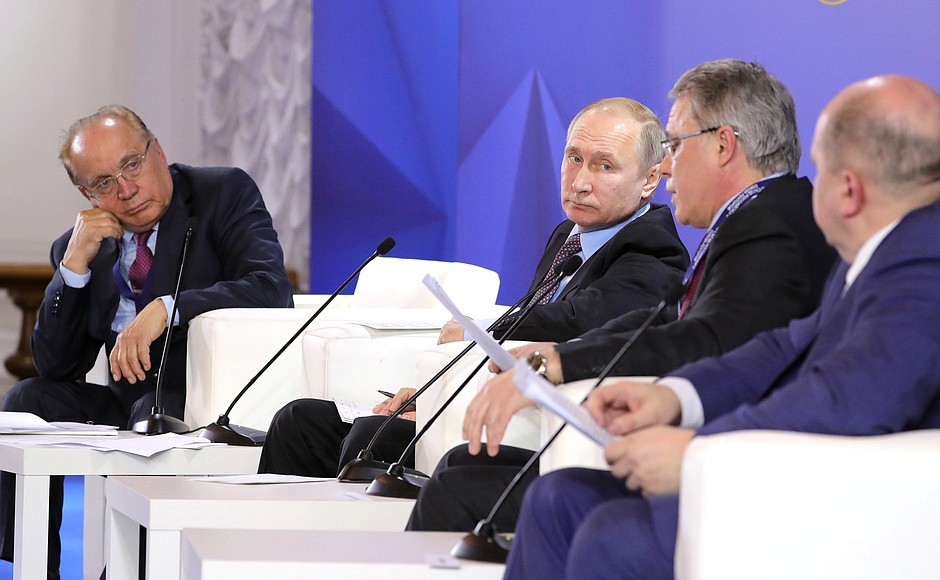 But we must ensure the lifelong training of engineers, which is primarily the task for universities. We can and must create a national system of advanced lifelong training of engineers. For this purpose, we should use the network methods of advanced training, digital systems, remote access and online courses. We have these capabilities, and we must use them to create a streamlined system of education. Engineers must work to improve their brains throughout their life. Speaking about these goals, it should be said that our publishing activity has increased over the past few years. The number of articles we publish is visibly changing. It is interesting that I met with the head of Elsevier Russia shortly before this meeting, it was yesterday, actually, and he told us that articles by Russian researchers are among the top 1 percent of the most interesting and even landmark articles published around the world. In other words, our researchers have incredible potential. We will continue this work by encouraging our researchers to publish their studies more extensively. But we should not forget about our own journals and improve their quality to meet the highest international standards. We must do everything to achieve this. We must have world-class academic journals and university journals published in English. Perhaps we have already mentioned this but we need to consider reviving the single national brand, a publishing centre. You gave us instructions two years ago regarding the Russian university ranking. We succeeded although there were some doubts about the outcome. It is now a recognised ranking. I think that if we set a goal for ourselves we can manage it as well. However, the Russian language must not disappear from our journals; it is our language after all. The quality of publications in Russian must be equal to the English publications if not higher thanks to the high level of our researchers and scientists. And the last but one point. It is very important right now that we specifically address the issue of universities cooperating with defence industry companies. It is a very difficult job, it is not something ordinary and requires excellent skills and capacities and many other resources. Obviously, this work is highly important today. We must particularly focus on ensuring that it is independent technology-wise and build up a science and technology reserve for the future years and decades that would be ahead of other industries, and search for new non-conventional technology solutions. Training professionals for the defence industry must be targeted. Study programmes must be developed in cooperation with leading experts, chief designers from respective areas, with the practices and experience followed and enhanced by industrial companies. The key role here must belong to respective schools and departments. It is important that we consolidate this experience. It is important that educational paths overlap. We need technicians to know about engineering when they operate unique machinery. We need bachelors who can be production managers at their level. We need masters who can conduct world-class research. We certainly need developers as that is the most complicated engineering job. But we also need people who can take responsibility for creating completely new, pioneering projects; people, who can look into the future. We are living in a difficult time, with economic declines, fluctuations and turbulence in international relations, with all these ‘Skripals’ and sanctions getting in the way. It is a time of making difficult decisions and a time of taking responsibility. On the other hand, it is a very interesting era that gives us huge opportunities. Mr President, you are building a great and prosperous Russia. It is anything but easy. In this demanding job you can surely rely on our engineers, the Russian engineering school. Thank you. Viktor Sadovnichy: Thank you, Mr Aleksandrov. I would like to ask Alexei Demidov, President of St Petersburg State University of Industrial Technologies and Design, to take the floor. His report is on universities and schools. Please, Mr Demidov. President of St Petersburg State University of Industrial Technologies and Design Alexei Demidov: Mr President, Mr Sadovnichy, colleagues, The issue of cooperation between universities and schools that was discussed during our section is one of the key issues for the education system. The review of the reforms in education in the past two decades prompts the following conclusion: a lot has been done but even more needs to be done. It seems that only recently each university had its own entrance examinations. Now everybody is used to the National Final School Exam (EGE). In the early 2000s most universities had their own competitions and trial exams. In the past 11 years, the school competition movement has reached a national scale. The Ministry of Education and Sciences releases an annual list of school competitions after thoroughly considering organisers’ requests and supervises the competitions at every stage. Let me remind you that the university community and the Russian Council for School Olympiads, established in 2007 at the initiative of and with support from the Russian Rectors’ Union, play a key role in the progress of the school Olympiad movement. As Mr Sadovnichy said, every year, more than 2 million students participate in school Olympiads organised by Russian universities. We believe it is also important to discover talent among foreign nationals and Russians living abroad. We have also proved the potential of professional competitions and project competitions in addition to conventional school subjects. For example, national competitions in technology and environment, Rosatom’s mathematics competition, the Teacher of the Future contest, the Nanotechnology: A Breakthrough competition, competitions in computer science and cyber security, math and cryptography, national technology initiative and many others. You may wonder if the existing school Olympiad community is big enough. Does it fully meet current objectives? The answer is the community does need further development, provided there is strict control and transparency. We, university rectors, believe that those applicants who are admitted to universities as champions and prize winners of school Olympiads are the true stars. Even if they cannot excel in all subjects these students surely have real talent in their chosen fields. Even if one in every ten enrolled students is a school Olympiad champion or prize winner it will be a truly significant result for universities. Colleagues, the school Olympiad movement has justified itself as a way to discover real talent. It is necessary to both expand the list of competitions and link them with priority areas of developing the economy. Colleagues, Without denying the fact that we should be open to foreign expertise, we should not see our role as those who are trying to catch up and thinking whose ideas we should adopt now. We can also offer our rich experience of real cooperation between universities and schools and show the achievements of our best gymnasiums, from which future winners of global and international competitions enrol in universities each year. It was said that the Moscow State University team won the programming contest. Colleagues, MIPT (Moscow Institute of Physics and Technology), and ITMO (Saint Petersburg State University of Information Technologies, Mechanics and Optics) placed in the top 10. The team from Massachusetts Institute of Technology came 11th in the contest. In addition, our ITMO University won gold in the last two world finals of the International Collegiate Programming Contest. There are many examples in maths and other subjects. Real education, like at School No. 239 or St Petersburg Lyceum No. 30, where we can find annual winners of international contests, is something we can be proud of and that is important for the entire county. Introducing the idea that we can and should serve as an example in some areas of the global educational space to our mind is as important as a winning mindset in sports. We are more than competitive in programming and maths. I can name many areas. Or we can simply remember how Russian hackers were discussed in the international media. But this base is formed at school, and the idea of cooperating with universities for continuous education still has plenty of potential. As a graduate of the Mathematics and Engineering Faculty, I can remember that, at our reunion 15 years later, we found out that almost half of our course was working, on a permanent or temporary basis, at leading foreign companies, and held key positions in resolving quite complicated and ambitious tasks. By the way, Grigory Perelman, who proved the Poincaré conjecture and declined the Fields Medal, and I think some other prizes too, was one of us. In addition, schools in St Petersburg, Moscow and other Russian cities, after which we went to universities, reaffirm their reputation as fundamental school educators today. We were saying that a teacher and a mentor, who plays a critical role in assessing a young person’s potential, is the main link in working with talented youth. The activities of such centres as Sirius or technoparks like Quantorium are an important element of this work. Such centres for talented youth should be created with the support of the university community in all the Russian regions in the near future. The role of the industry’s “sergeants” – let me quote the brilliant essayist Anatoly Agranovsky here – begins with a real career-guidance mentor at school and with resource support provided to this education link, which, as the writer would put it, is paramount today. 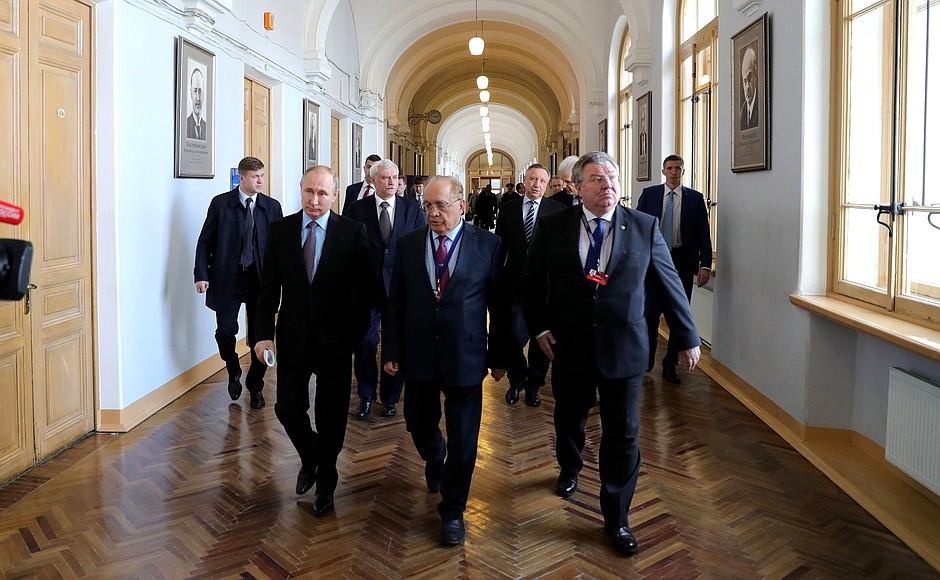 Introducing something like a table of ranks for the mentors who brought up and trained the medallists of professional contests and competitions and encouraging them to advance in such rankings is feasible, and the expert university community can do it in the years to come. There already are some cases when university gymnasiums have been created and proven their effectiveness. There are many training schools and colleges at universities, but we see the modern reserve in developing the school – college – university system. Lyceums and schools at several universities can serve as an example of success, such as the academic gymnasium at St Petersburg State University, Lobachevsky Lyceum at Kazan Federal University, the boarding school at Lomonosov Moscow State University, the research centre at Novosibirsk State University and the natural sciences lyceum at Peter the Great St Petersburg Polytechnic University. The times call us to offer more opportunities for establishing university gymnasiums. This is a demand of continuous education and an extension of advanced studies in priority scientific areas. Of course, the university community should thoroughly examine this. Special attention must be focused on a new form of cooperation between schools and universities ‒ preparatory courses for senior pupils taught by university lecturers. This helps us bring two education levels closer together and has great development potential. Colleagues, The modern system for selecting and training management and school principals, that a strong teaching staff and school atmosphere largely depend on, is a serious task that can be implemented in cooperation with universities. We can use this improvement and retraining system for middle-school organisation management, as well as the corresponding personnel pool structure, as part of the extra-curriculum faculties. By the way, regarding the extra-curriculum faculties, those in our session have seriously discussed the necessary federal license for additional education organisations. Everyone agreed on that. The Russian Rectors Union is a remarkable expert community and we talked about this as a possible subject for later discussion in our session. I would like to use the discussion of the mandatory subjects for the National Final School Exam (EGE) as an example. While the EGE in Russian and mathematics are mandatory for all school graduates, the exam in the history of Russia as well as some subjects in world history may be in the next mandatory exam. Again, we have already discussed the possible introduction of a mandatory exam in foreign language in the near future. The readiness to participate in the discussion and promote decision-making on such a level as actively as possible is an important element of cooperation between schools and universities. Colleagues, The education system in Russia faces serious challenges, and we can propose solutions that will allow us to face them and stay ahead of the competition even under quickly changing conditions. I hope that, after the implementation of these solutions, our filmmakers who created such films like Legend No. 17, Going Vertical and Ice, which many pupils remember as an example of our athletes’ exceptional will, will want to shoot films about the winners of the international student Olympiads, such as the programming and physics competitions, or today’s mathematician Grigory Perelman, or other serious scientists as well as about our best schools and gymnasiums and their cooperation with universities. In conclusion I would like to note that the development and expansion of the school Olympiad movement for possible talent selection, the establishment of gymnasiums at universities is a successful example of the continuous education system, resource support for teachers and mentors who trained winners of the competitions and Olympiads, the modern system of manager and school principal selection and training, creating the corresponding personnel pool, the expert community’s thorough discussion of the list of mandatory school final exams, the necessary licensing of extra-curriculum education and possible solutions are the tasks that can be resolved in the near future with cooperation between the universities community and Russian schools. Vladimir Putin: Before we take a break, let me share some thoughts about what our colleagues have said. I will start with what Mr Demidov concluded regarding promoting science, knowledge and scientific achievements. I have a somewhat personal story I would like to share with you because it has social importance and is also related to what was said today. I met with our wonderful writer Daniil Granin shortly before his death, just two weeks before he passed. You probably remember that I presented him with an award here in St Petersburg, and came to meet him because he could hardly move. We had a conversation for about 30 minutes, then he asked me to stay some more and we had an interesting talk. One of the things he said was that the state paid very little attention to science and education, including the promotion of the scientific knowledge and achievements of those who are engaged in it. I said that we had special programmes for this, and the writer said “Programmes are good, but we need propaganda in a wide sense, especially skilful propaganda. It is crucial that you talk about it. We need these goals to be formulated at the highest level.” So first of all, I am doing what he asked me to. And second, we will, of course, encourage cultural workers to pursue this too. Mr Demidov, you are absolutely right. This was the first thing I wanted to say. Now there were some comments. Mr Aleksandrov spoke about the need to create research and educational centres, such as the ones at Bauman Moscow State Technical University. I agree, we need to move in this direction. If we have already established 20 world class engineering centres, then my congratulations. Our other colleagues should work on this too. Of course, everyone has different capacities, but we should strive to implement this goal. Now, to postgraduate studies. You said places are not always available on research teams. But you know, it depends on you too, it depends on everybody here. How? Research subjects must be relevant, not just for the sake of defending a paper. Research subjects must be up to the first postgraduate level, with potential for extension and relevant for practical implementation or in big science. But when the head of Bauman Technical University is saying this, I understand he mostly means… Anatoly Aleksandrov: It is easier for us. Vladimir Putin: Easier but it still should be proposed. You must have a vision of what’s next. If the only point of the research is writing and defending it to get a line on a CV there is no desire. It will be dragged out. Deadlines will be missed. And this is not even about deadlines but about future development and practical implementation. Now, about scientific publications. I totally agree with you. Please submit your proposals on what the government should do to support it. I am sure it does not cost much money and we can definitely find it. But we need to understand the process, what extra measures are necessary for this to succeed. You are correct. Why is the percent of our publications low? There are few Russian papers published abroad but they are important. They get published because it is impossible not to publish them. Everybody wants to read them. Other papers get rejected because they have their own feast there and we are not invited to that feast of life. I agree we need to create our own [journals], let’s do this. Please work out your proposals. Now, about cooperation between universities and defence industry companies. You said this is difficult to arrange. Why? I do not see it as difficult. On the contrary, I thought this cooperation was already in place. Anatoly Aleksandrov: The work itself requires a high degree of responsibility and, experience shows, not everybody can do it. But we do need to attract more collaborators. We conducted a survey some time ago and already at that point, few universities could participate in this work while earlier, ten times more universities were involved. This is unfortunate. Vladimir Putin: Alright. Honestly, I just did not think this was the case. If you see a problem, please specify the exact weak points and we will try to resolve it. Frankly, I, on the contrary, had a positive experience and understanding of the situation. Here is one example. I think I already said this in public, in my Address, that we are creating state-of-the-art and unique, unprecedented arms systems. One of these systems was developed by a very young team. When I met them to present the state prize, I saw that they were really young. I asked them: “Where did you come from?” They said: “As soon as grants became available, our entire student group created a team.” Over seven years, they developed the world’s most powerful and advanced strike system. So, I have seen the examples. If something is required for you to continue and to enhance this work, please tell me. Now I am not speaking in order, but nevertheless, we will, of course, support the school Olympiad movement, that goes without saying. About our education system, including schools, not being any worse than others. Nobody says they are. You know, when people discuss something, they have different points of view. I think no one must be offended by this; we must look at this as adults. Everyone has the right to an opinion, and the most reasonable one should be used. In addition, of course, our education system should be open. We need to analyse where we lack something and what we can adopt from the best international practices. Of course, there is something to adopt. But this does not mean we have to cut everything we have achieved, as I have said many times. But, of course, we should always remain open and reasonable about our weak and strong points. There is nothing to be ashamed of. Regarding our work with talented people and talented youth – yes, of course. Perhaps this is a trivial phrase, but I can’t help it. Of course, it is very important to work with talented young people, but it is more important to discover a talent, to raise it, to support and give an impetus. Now, about what was said in the beginning. 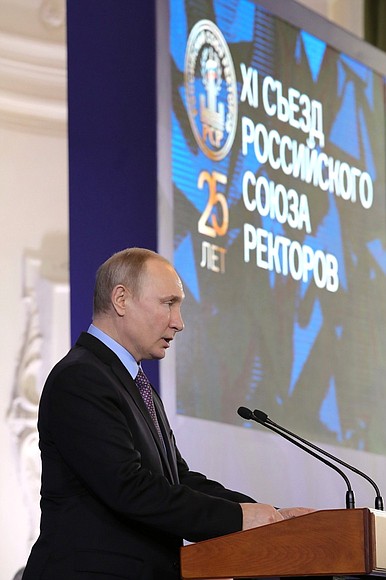 The more I work the more I grab various interesting terms. Singularity is a good word. If I use it I will look like a decent person. If I am correct, it is the increasing indeterminacy factor, isn’t it? Right. You were also right to cite Confucius here: When it is obvious that a goal cannot be reached, don't adjust the goal, adjust the steps of action. Something like that, right? In this regard, I have just recalled another Chinese proverb. The Chinese are a wise and ancient people, and one of their proverbs says: You need to ascend higher in order to see further. What would I like to say in this regard? Yes, there are more indeterminacy factors, but we must not be afraid of this, because if we want to see the final goal we need to rise to the point where we can see it. Speaking about education and higher school. What I am about to say is only segments, but still. What should be taught and how? You know better, because you are specialists. I must rely on your opinion. But I would like to begin with what has been said here, with the question of what should be taught. Look, if 3D technology is the future, if future components in the real production sector will be created by spraying and not by cutting, with advanced methods and advanced technology, then we should think about how we can train a specialist who can do this. We have such expertise, but it is fragmented and almost goes unnoticed. We should give this some thought, this is the world’s future. Of course, we must not use old teaching methods and standards or set goals that were relevant yesterday. If the future needs genome technology, digital technology, artificial intelligence or robotics, if the future needs the nature-like technologies you have mentioned here, we should think about how and why we should train a specialist who knows everything about this, who can do this and will implement this. We should just understand that other specialists are not needed today. I said in my Address that we needed a breakthrough. If we do not make a breakthrough, essentially, we will fall behind, really fall behind, do you understand this? The consequences will be dire. For some time, we will be making use of what I spoke about in the second part of my Address; we will feel quite secure for two or three decades. But we – in any case, people like you – should think beyond the horizon, and train people exactly for what I have just described. Of course, it is very important – I spoke about this in my opening remarks – not to stop at personnel training. We should act like Bauman Moscow State Technical University, we should establish these industrial clusters. Of course, in the areas that are natural for higher education. This is extremely important, and in this case, by the way, young people’s research would look different. If they see themselves that there are chances to apply their skills. Creating the scientific and education clusters that you mentioned, certainly, should be done and it requires financing, as you said. Certainly, we must use available resources accurately and within the bounds of current law, and improve the efficiency of our spending even though we can spare money for this, actually. If we see that the ball is gathering momentum, we will allocate funding for it. However, there is more to it than just budget expenditure. You know, if we speak generally, on a national scale, if we are talking about the whole university education system, the state budget will never be large enough for all of it. So, what does it come down to? Mr Sadovnichy also mentioned this in passing. We need to attract funds from the regions and the private sector. This is necessary, otherwise our sights will be set lower. You know, the situation is, sadly, still very limited here; it is difficult for us to work with our companies, including those that need high-tech trained employees. However, we need to do this. It is difficult to work with them because it is easier for them to buy everything from abroad, and that’s all there is to it. But, thank God, we are benefiting from the sanctions here. There is no chance to buy everything they need now, so they have to use their creativity and, as a matter of fact, it works, not only in agriculture but in high-tech industries as well. However, this is not enough. These bumps and obstacles from outside cannot be the general impetus for development; we need to create internal processes. We need to show our large companies the potential of our science and the higher school. Science and the higher school, in turn, should not stagnate. Let me explain. If someone has invented something important and interesting but difficult to implement, to put into practice, what happens then? I’ve repeatedly faced the following situation. Intelligent, remarkable people, good young researchers say: this must be done in this way, period, I don’t want to listen to your arguments. But manufacturers need to turn it to a slightly different angle. But no, they do not accept it, you see? “This is the best way. We know how it works, and push off!” But it may not work in practice and innovators, young or any age, should be taught to understand that if real life requires something, they need to be more flexible. It is indispensable that they make contact with the real sector of production. I believe we have just heard a very interesting and important thing. I would also like to comment on this. I have just spoken about start-ups and work with our industry and businesses. Do you know what is curious? I can share my observations. We can engage not only our business but also foreign businesses, especially from the countries with large financial resources and high interest in the innovations they do not have yet. In this regard, we can also use specialists from these countries trained at your universities and at the same time work with these or neighbouring counties and, of course, create platforms and start-ups on our territory. And this is, of course, my task, and I should involve the Foreign Ministry and other agencies working on this as well as your capabilities; this is a separate area of international activities. This is what we should definitely think about; we have good prospects here. It would also be useful for our partners, believe me, I can see that buying products is not enough for them; everyone is asking about transferring technology. But we have to develop some of it first, and here we have a good and promising field regarding the development of corresponding start-ups in Russia, but with financing from interested foreign states. There are many such resources. In conclusion: of course, education is not just about being witty. I spoke about it in my Address and many times since. It is one of Russia’s priorities for the near future. We must not segment it. At the administrative level, of course, this includes school and university, and science ‒ academic, university and in life in general, practical science; it should be a symbiosis of all these areas. School should grow into university, and university should train specialists, postgraduates, candidates and doctors of sciences with a connection to real life and the real production sector. And everything should operate as one organism. Then we will definitely succeed. Thank you very much. I wish you success! Viktor Sadovnichy: Colleagues, let us once again thank our President for his wonderful speech. Vladimir Putin: Thank you very much. All the best and goodbye. The source of information - http://en.kremlin.ru/events/president/news/57367
__________________
Where should they dig the Very Deep Pit? Piglet said that the best place would be somewhere where a Heffalump was, just before he fell into it, only about a foot farther on. (c) Alan Alexander Miln |
|
|
#820 |
|
Senior Member
|
Telephone conversation with President of Republic of Korea Moon Jae-in
Vladimir Putin had a telephone conversation with President of the Republic of Korea Moon Jae-in at the initiative of the South Korean side. April 29, 2018 - 13:20 The President of the Republic of Korea provided a detailed account of his meeting with the DPRK leader Kim Jong-Un in Panmunjom and its outcomes. During the conversation, the two sides gave a positive assessment to the agreements that were reached at the meeting, with special focus on the provision in the Panmunjom Declaration stating the intention to achieve the full denuclearisation of the Korean Peninsula. The two presidents expressed confidence that coordinated steps to promote cooperation between the two Koreas would help the region move toward peace and stability. Vladimir Putin reaffirmed Russia’s readiness to continue facilitating practical cooperation between the Republic of Korea and the DPRK, including through major trilateral projects in infrastructure and energy. Vladimir Putin stressed the importance for all the parties concerned to keep up their efforts to achieve a political and diplomatic settlement, including by following the principles set forth in the Russia-China roadmap for a settlement on the Korean Peninsula. The two presidents also discussed topical bilateral matters focusing on ways of expanding mutually beneficial cooperation in various areas. They also agreed on a schedule of future top-level contacts. The source of information - http://en.kremlin.ru/events/president/news/57386 Greetings to participants and guests of European Wrestling Championships Vladimir Putin sent greetings to participants and guests of the European Wrestling Championships taking place in Kaspiysk. April 30, 2018 - 10:30 The message reads, in part: “For the first time ever, the Republic of Dagestan, which is rightly renowned for its rich history and culture, the hospitality of its people and its unique school of martial arts, is hosting an international competition of this calibre. I am pleased to note that Russia pays great attention to the development of wrestling. We are by right proud of our wrestlers’ outstanding achievements and contributions to the promotion of this spectacular sport. We are confident that this championship will be held at the highest level. I want to express special gratitude to Nenad Lalovic, President of United World Wrestling, and to this international organisation for their openness, cooperation and support of the principle that sports and politics should not mix. Today, as ever, sports should bring people together and inspire them to new endeavours.” The source of information - http://en.kremlin.ru/events/president/news/57391 Greetings on opening of 7th International Jazz Day Vladimir Putin sent greetings to the organisers, guests and participants of the 7th International Jazz Day on its opening. April 30, 2018 - 11:00 The message reads, in part: “Every year, this memorable day brings together in what we may call a world jazz capital a plethora of devotees of this unique genre and gives them the joy of meeting popular musicians and hearing their favourite tunes. It is symbolic that this year’s event is taking place in St Petersburg. Russia is rightly proud of its long list of gifted singers, composers and conductors, true masters of jazz who perform at the best of venues and win over audiences with their inimitable talent, virtuoso technique and brilliant improvisations. It is thanks to their creative energy and sincere commitment that much is being done in our country for the professional development of young musicians and for the implementation of interesting projects in international cultural cooperation. Russia’s jazz school is gaining prestige.” The source of information - http://en.kremlin.ru/events/president/news/57393 Telephone conversation with President of France Emmanuel Macron Vladimir Putin had a telephone conversation with President of France Emmanuel Macron at the initiative of the French side. April 30, 2018 - 13:50 Emmanuel Macron spoke of the results of his visit to the US with an emphasis on the talks on the situation around the Joint Comprehensive Plan of Action on Iran’s nuclear programme. The Russian and French presidents called for preserving and strictly implementing the plan. They also discussed other current issues on the international and bilateral agendas. The source of information - http://en.kremlin.ru/events/president/news/57392 Telephone conversation with Prime Minister of Israel Benjamin Netanyahu Vladimir Putin had a telephone conversation with Prime Minister of Israel Benjamin Netanyahu, at the initiative of the Israeli side. April 30, 2018 - 22:45 The leaders discussed progress of the Joint Comprehensive Plan of Action on Iran’s nuclear programme, including in the light of Mr Netanyahu’s statement on the issue made today. Vladimir Putin confirmed Russia’s stance that the Plan of Action, which is of primary importance for ensuring international stability and security, must be meticulously observed by all parties. President Putin and Prime Minister Netanyahu continued to exchange opinions on the overall situation in the Middle East, including the developments in Syria. The parties agreed on further personal contacts. The source of information - http://en.kremlin.ru/events/president/news/57395 Meeting with FIFA President Gianni Infantino After a meeting of the Russia 2018 Local Organising Committee Supervisory Board, Vladimir Putin met with FIFA President Gianni Infantino. May 3, 2018 - 16:30 - Sochi 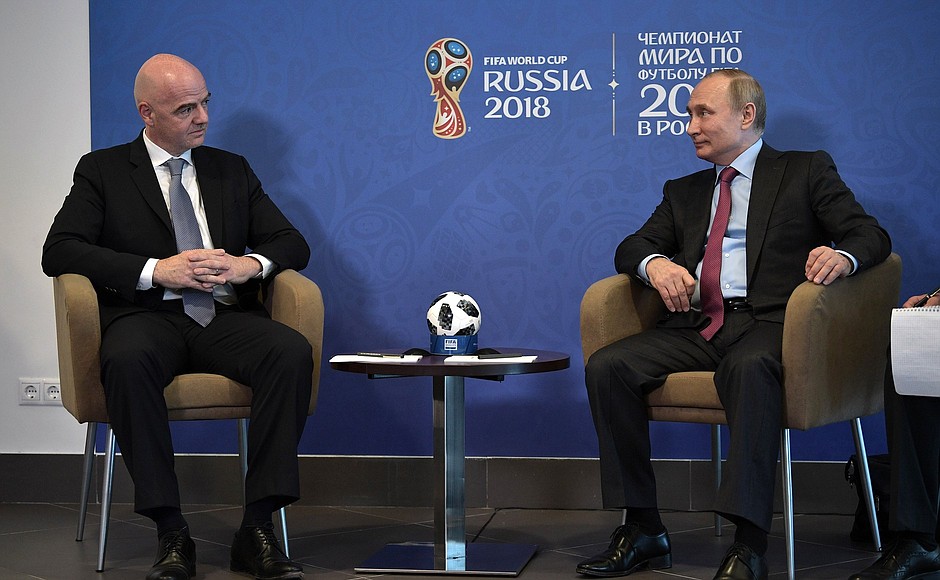 President of Russia Vladimir Putin: Mr Infantino, Together we attended one of the meetings with our colleagues who are engaged in preparations for the World Cup. I would like to thank you for the high marks you gave to our work so far to prepare for the championship. But I want to assure you that we understand our responsibility, we understand that more needs to be done. The big event is still a way off. 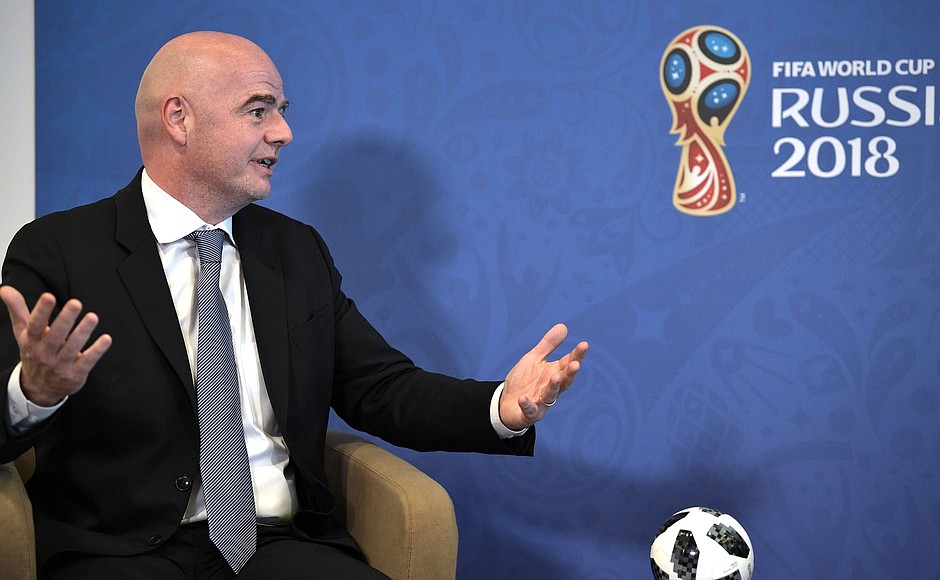 I hope that together, as you just said, together with you, with your team, we will manage to hold this championship at the highest level. In any case, we will do our best to make it so. Then, as I already told you, it is important for us that the World Cup leave behind a very positive, great legacy: facilities, buildings, infrastructure, logistics and children’s sports. Today we already had an opportunity to talk about this; we need to make a push in the development of children’s sports. So, a great deal of work – but positive and interesting work – still lies ahead. 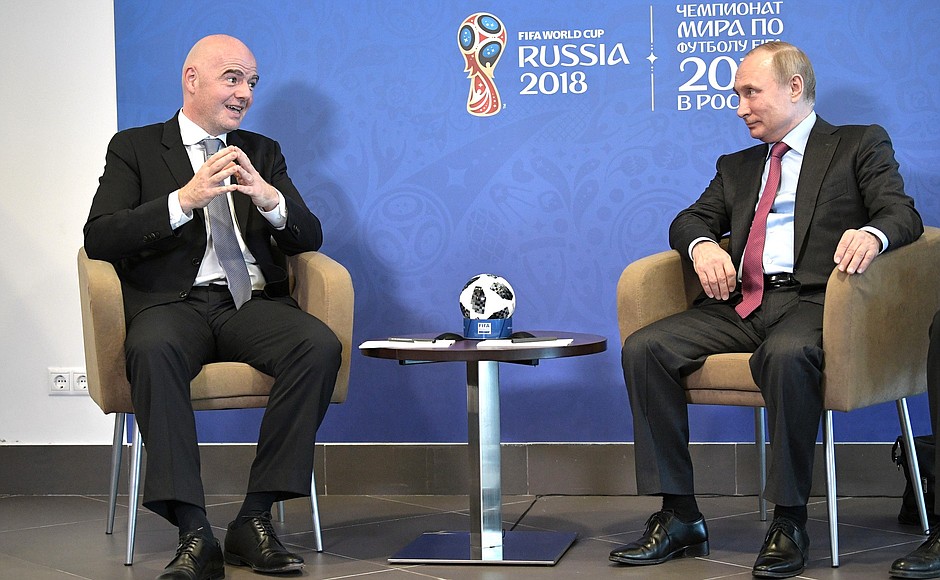 FIFA President Gianni Infantino: Spasibo. Thank you, Mr President. It has been for me a great pleasure and honour to participate in this meeting today. I have been witnessing with my own eyes that we are ready for the final sprint. Forty-two days to go. The adrenalin is starting to come up. The whole world is focusing more and more on Russia. And Russia is ready to welcome the whole world, to celebrate this summer here in Russia. 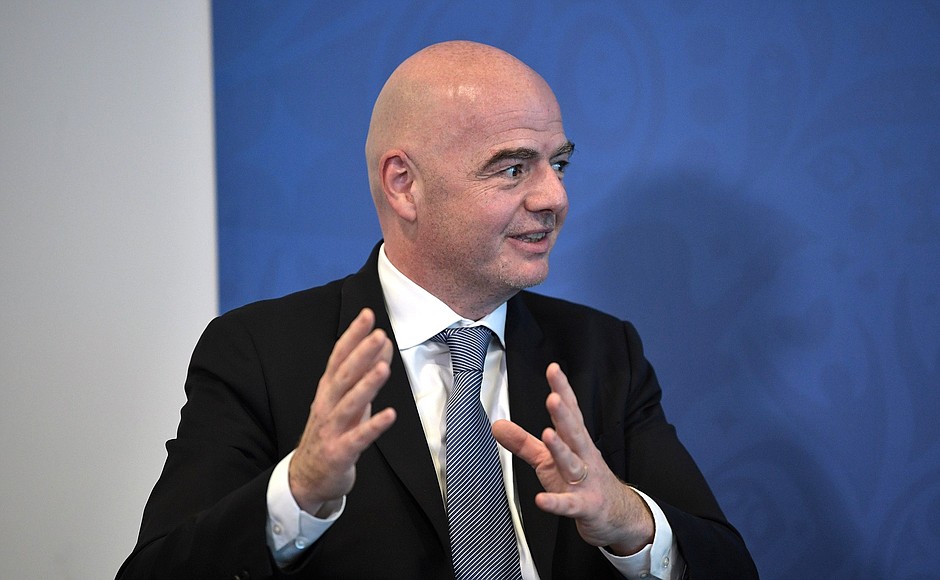 What has been done in Russia in the preparation for this World Cup, with the stadiums, the infrastructure, the airports, the hotels, but also and in particular, for welcoming of the fans from all over the world, is absolutely unique. The fans from all over the world who will come to Russia, and there will be many hundreds of thousands of fans, they will experience a summer of joy, a summer of celebration, a summer of holiday together with the people of Russia. And this is possible only thanks to the commitment, dedication and professionalism of the Russian Government, starting from the President to each and every single citizen of Russia. So, we cannot wait for the kick-off of the World Cup. And we know that we are all together ready to make this the best World Cup. Thank you. Spasibo. 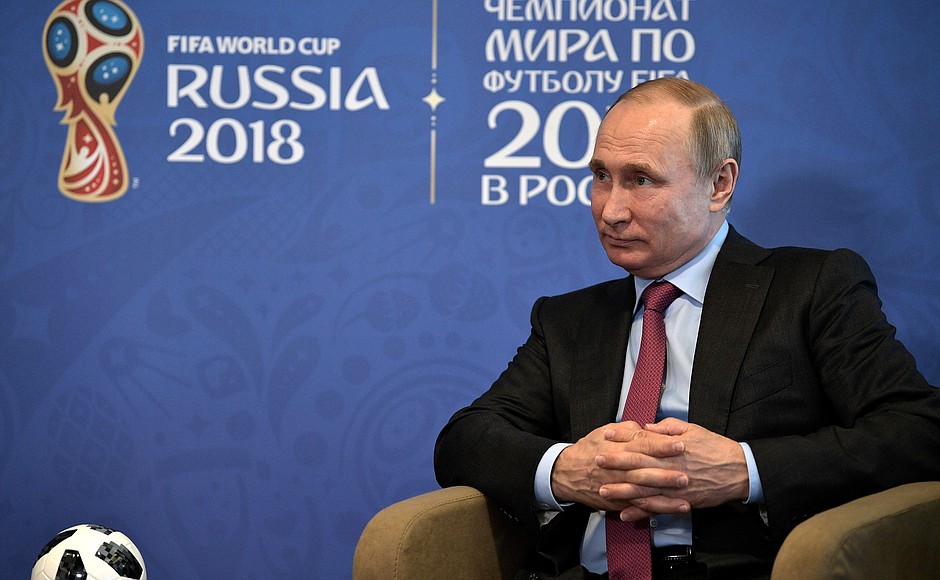 Vladimir Putin: Thank you. The source of information - http://en.kremlin.ru/events/president/news/57401 Telephone conversation with President of Kazakhstan Nursultan Nazarbayev Vladimir Putin had a telephone conversation with President of the Republic of Kazakhstan Nursultan Nazarbayev. May 4, 2018 - 15:30 The leaders exchanged greetings on the occasion of the upcoming celebrations of the Victory in the Great Patriotic War. They discussed matters concerning preparations for the Supreme Eurasian Economic Council’s meeting scheduled for May 14, 2018. Bilateral contacts at the highest level were agreed upon. The source of information - http://en.kremlin.ru/events/president/news/57407
__________________
Where should they dig the Very Deep Pit? Piglet said that the best place would be somewhere where a Heffalump was, just before he fell into it, only about a foot farther on. (c) Alan Alexander Miln |
 |
| Tags |
| putin, putin speech, vladimir putin |
| Share |
«
Previous Thread
|
Next Thread
»
| Thread | |
| Display Modes | |
|
|
All times are GMT -5. The time now is 02:04 AM.
Page generated in 6.50508 seconds.




 Linear Mode
Linear Mode
